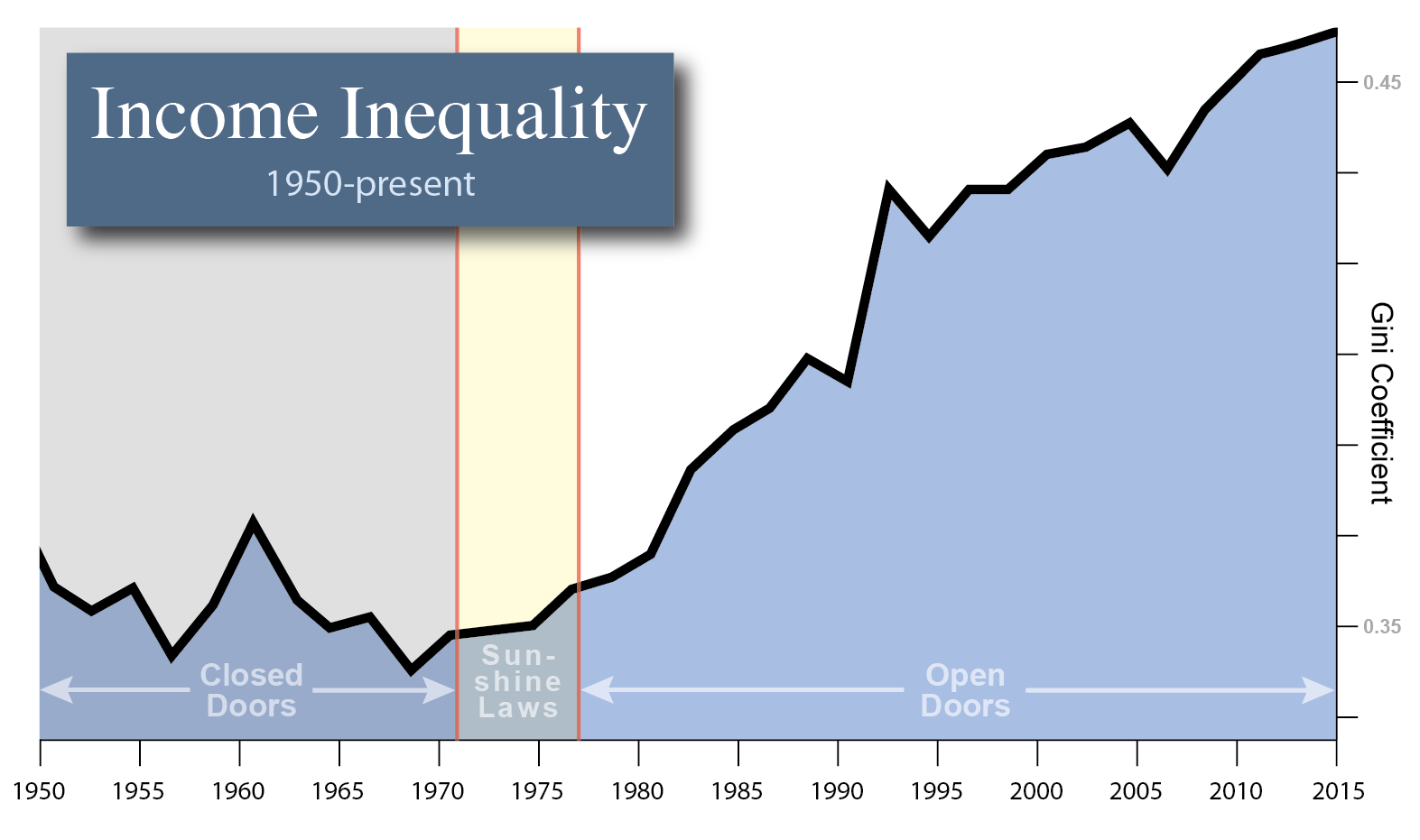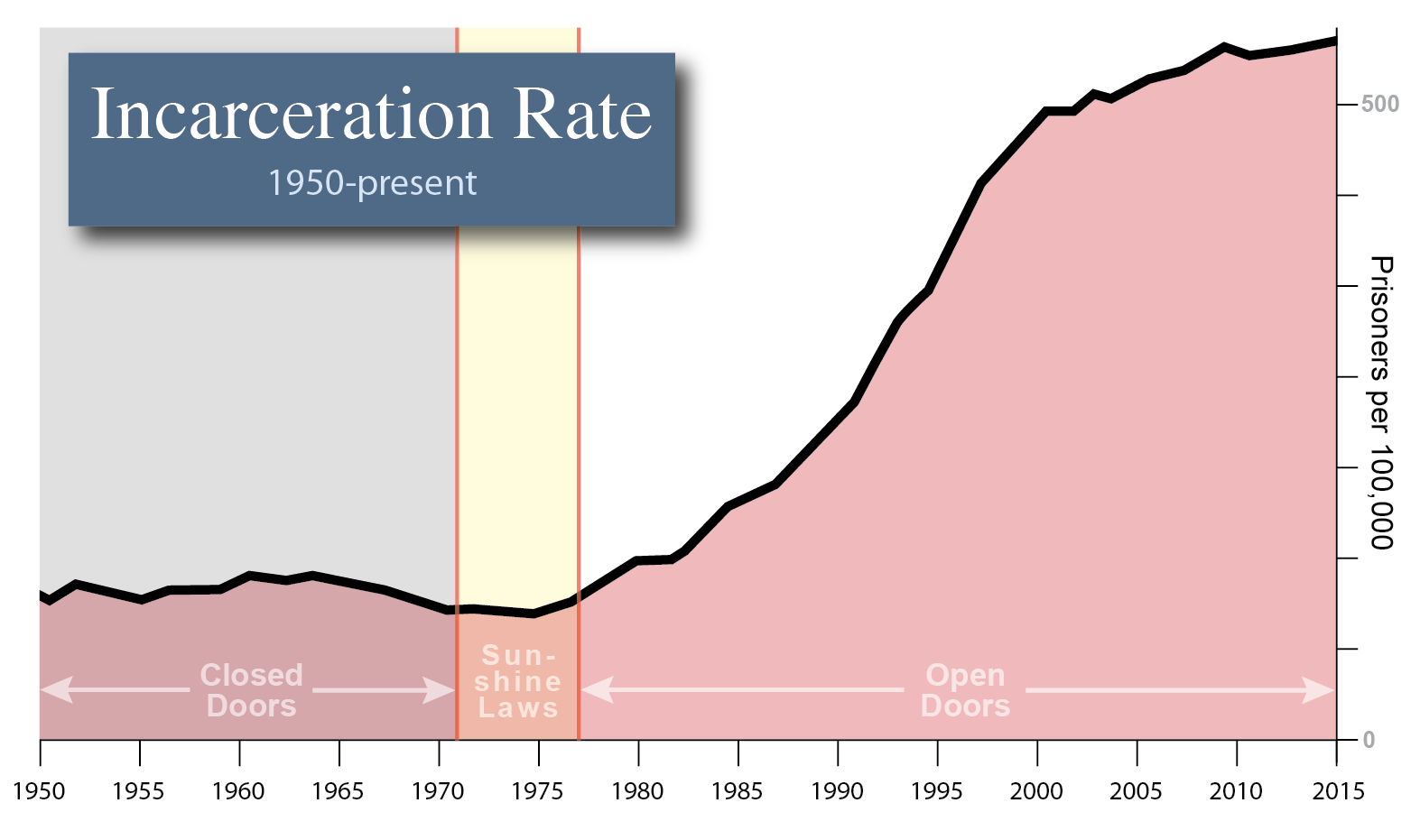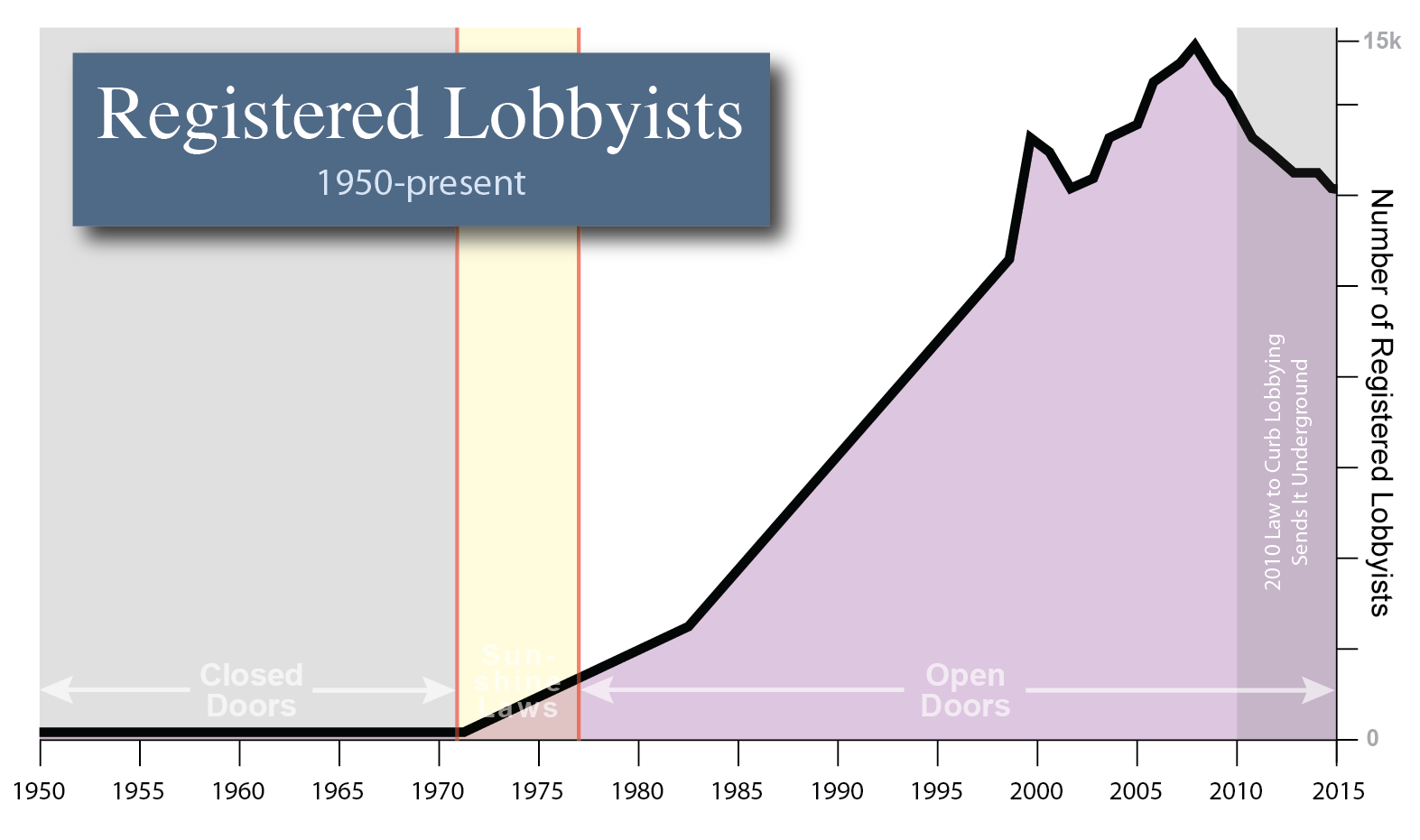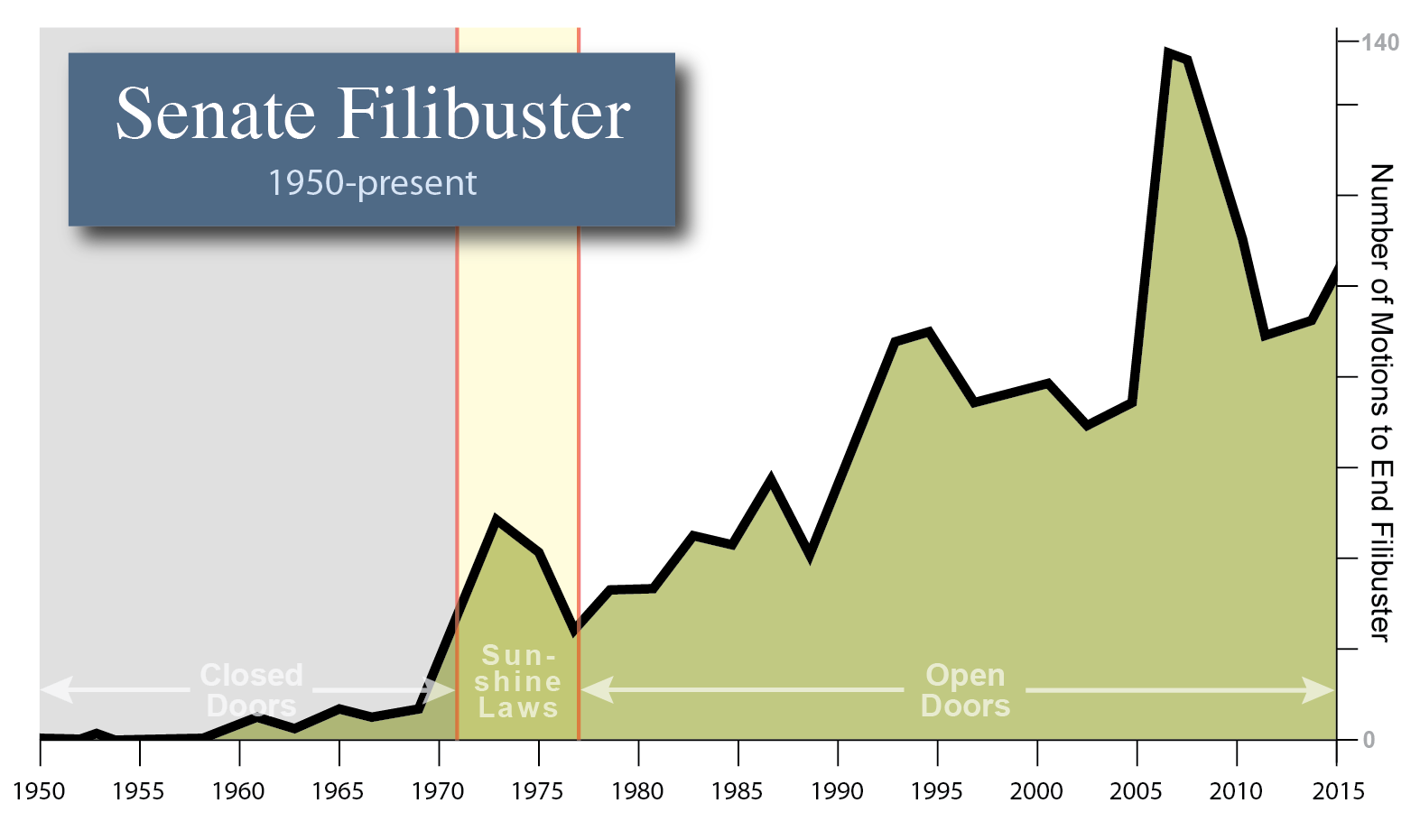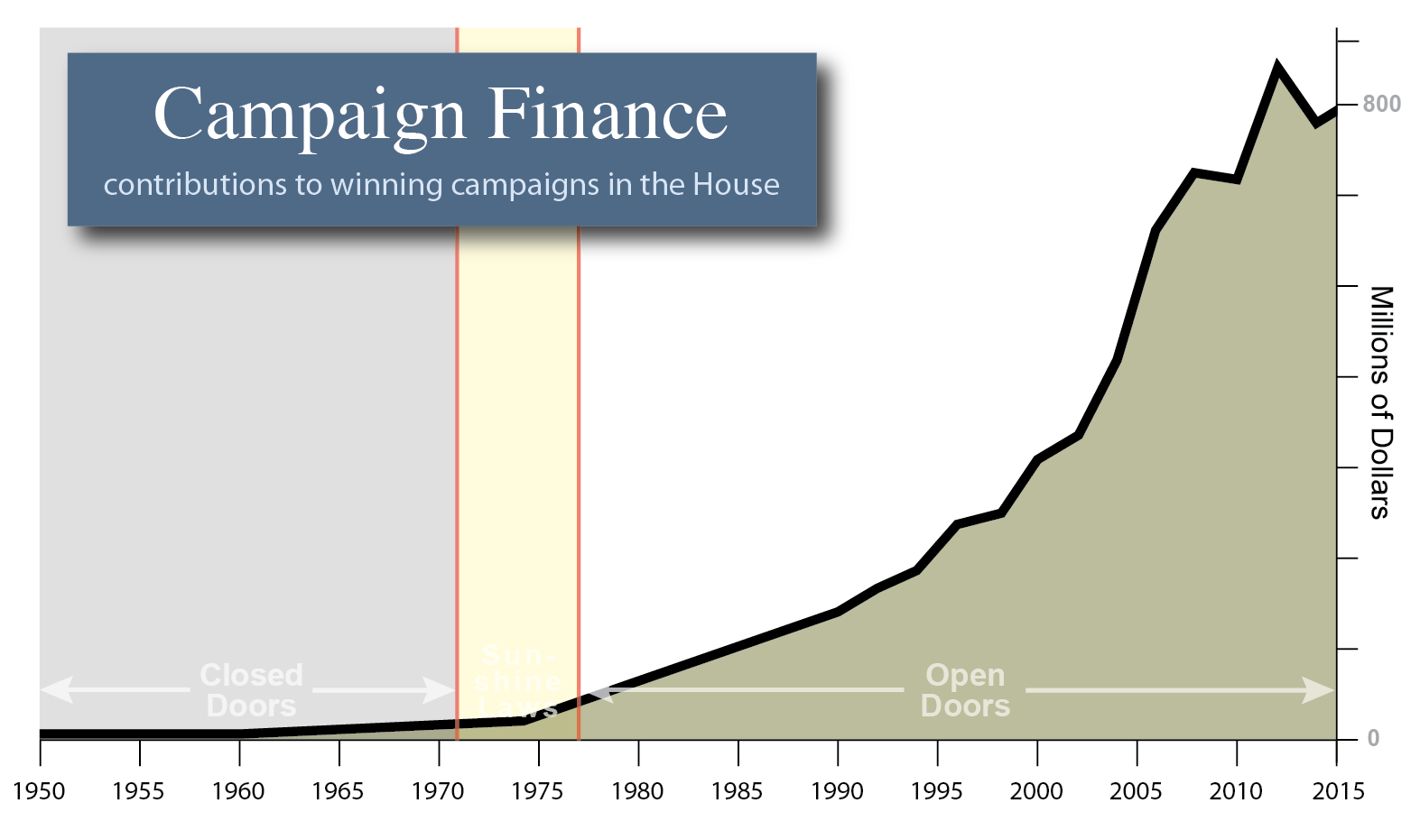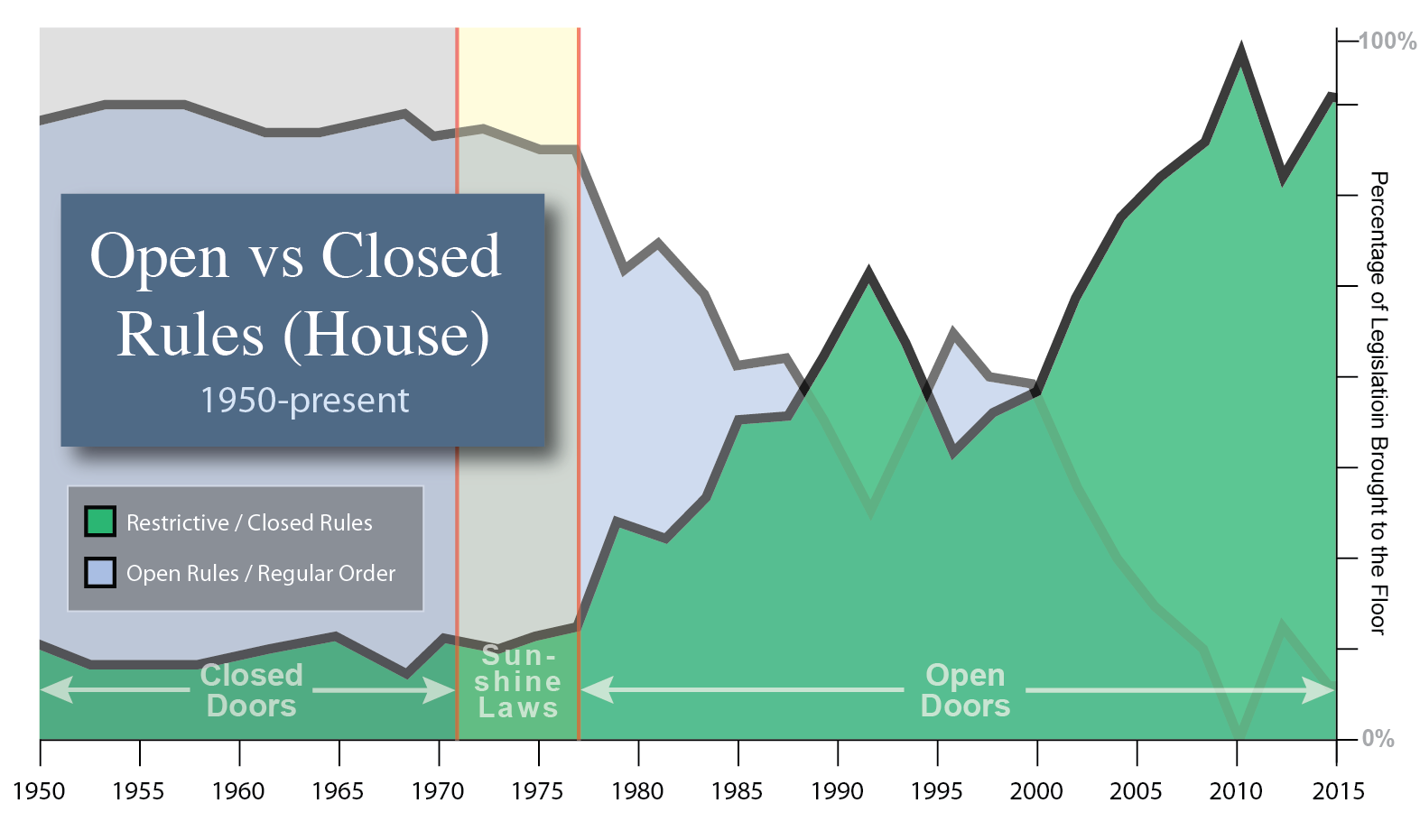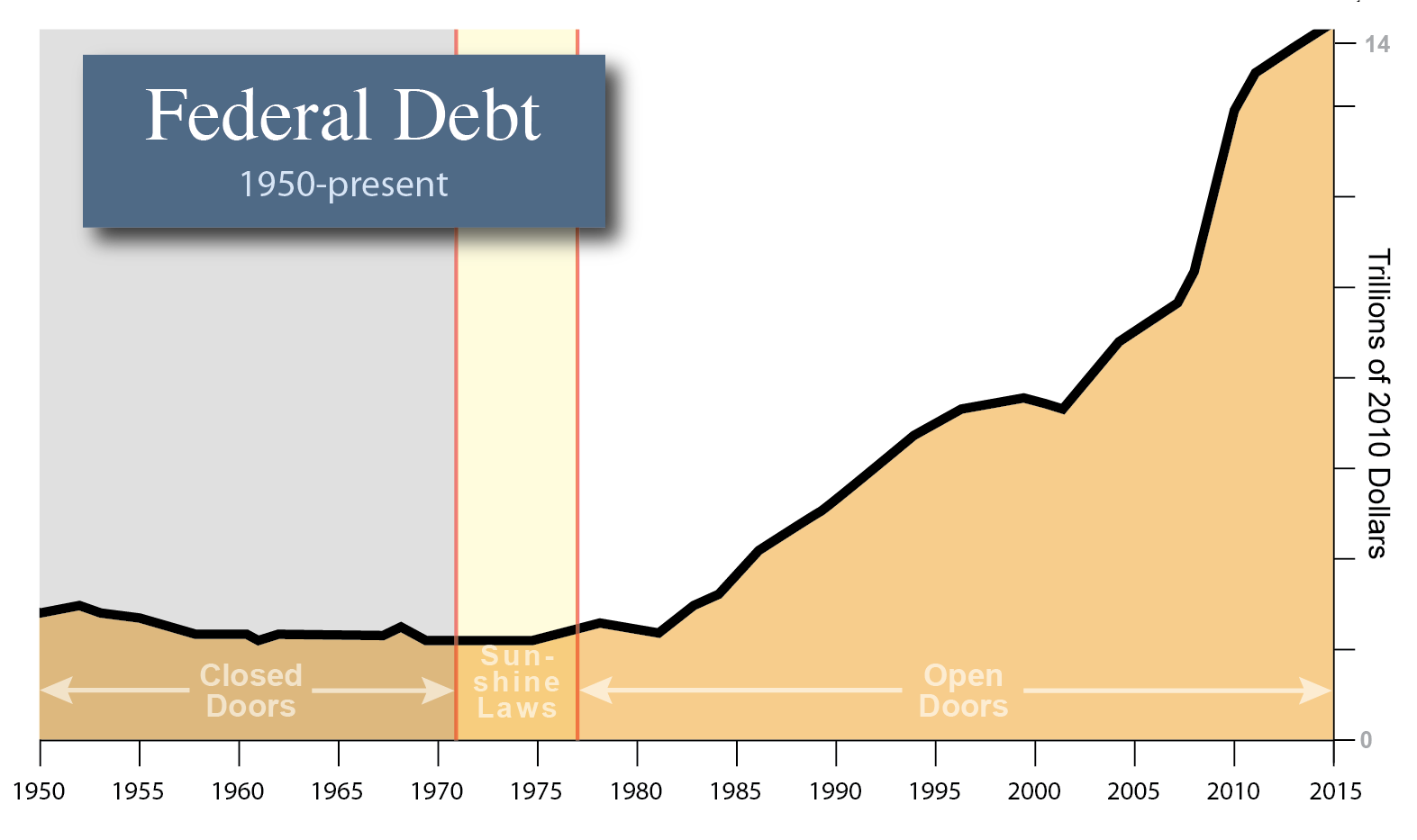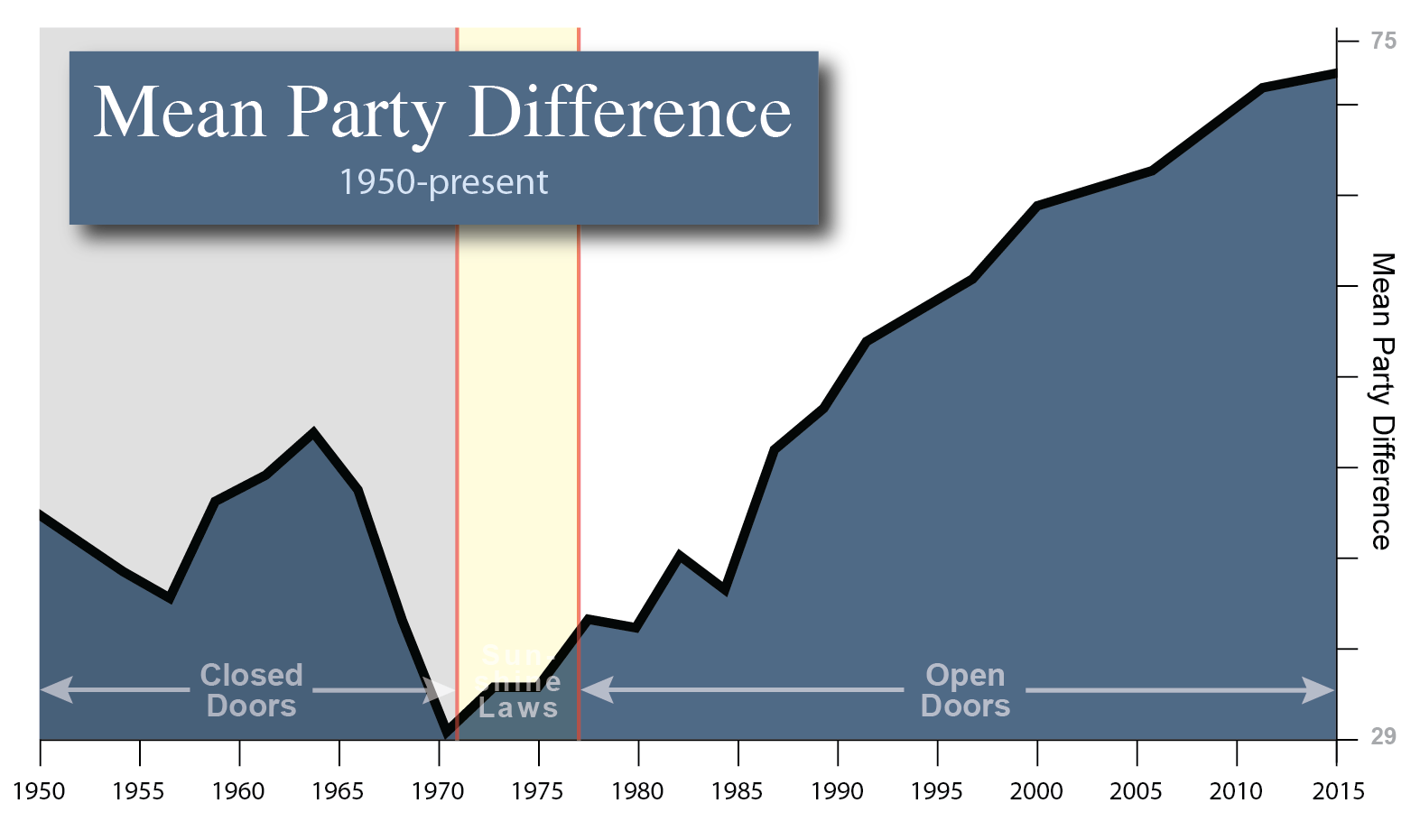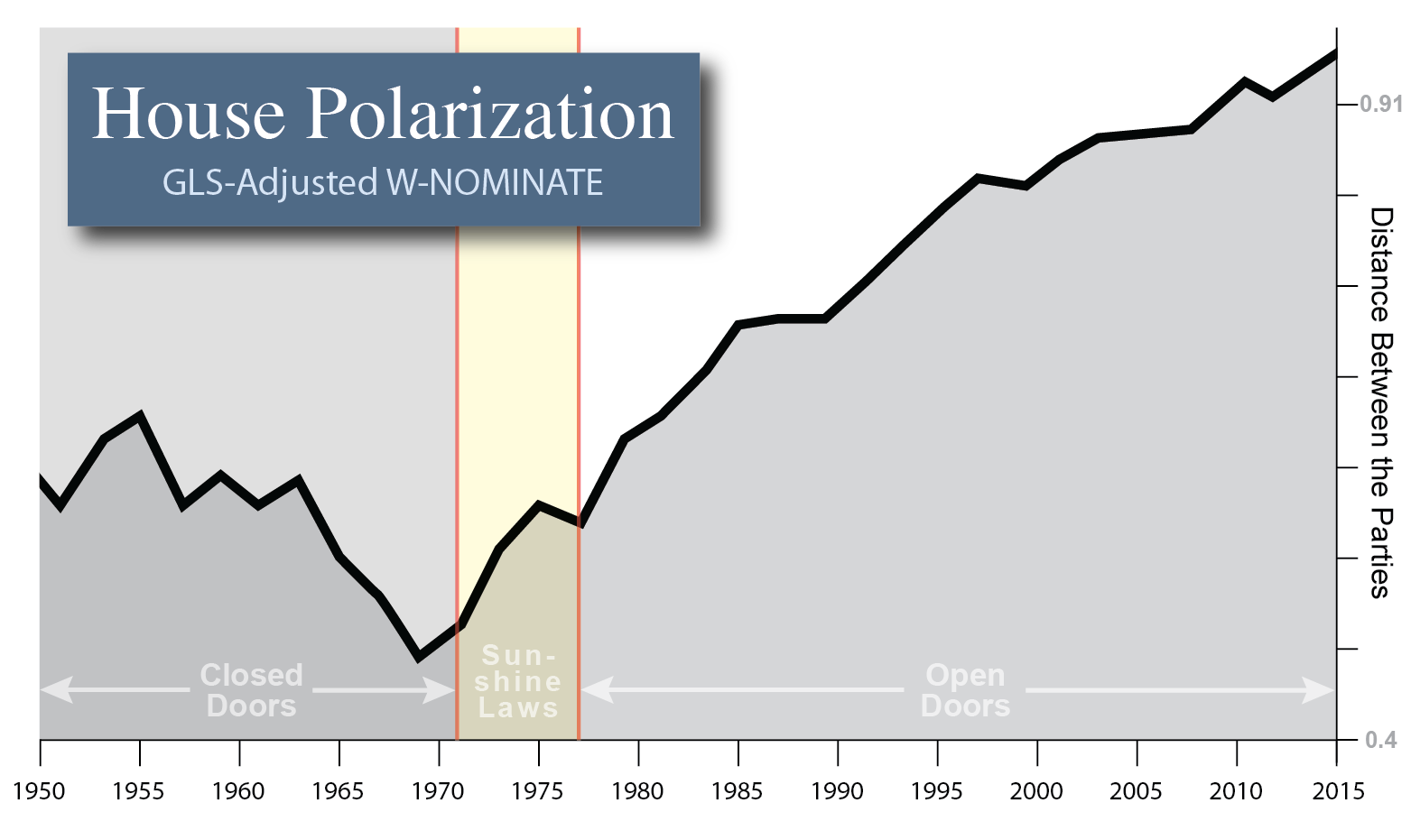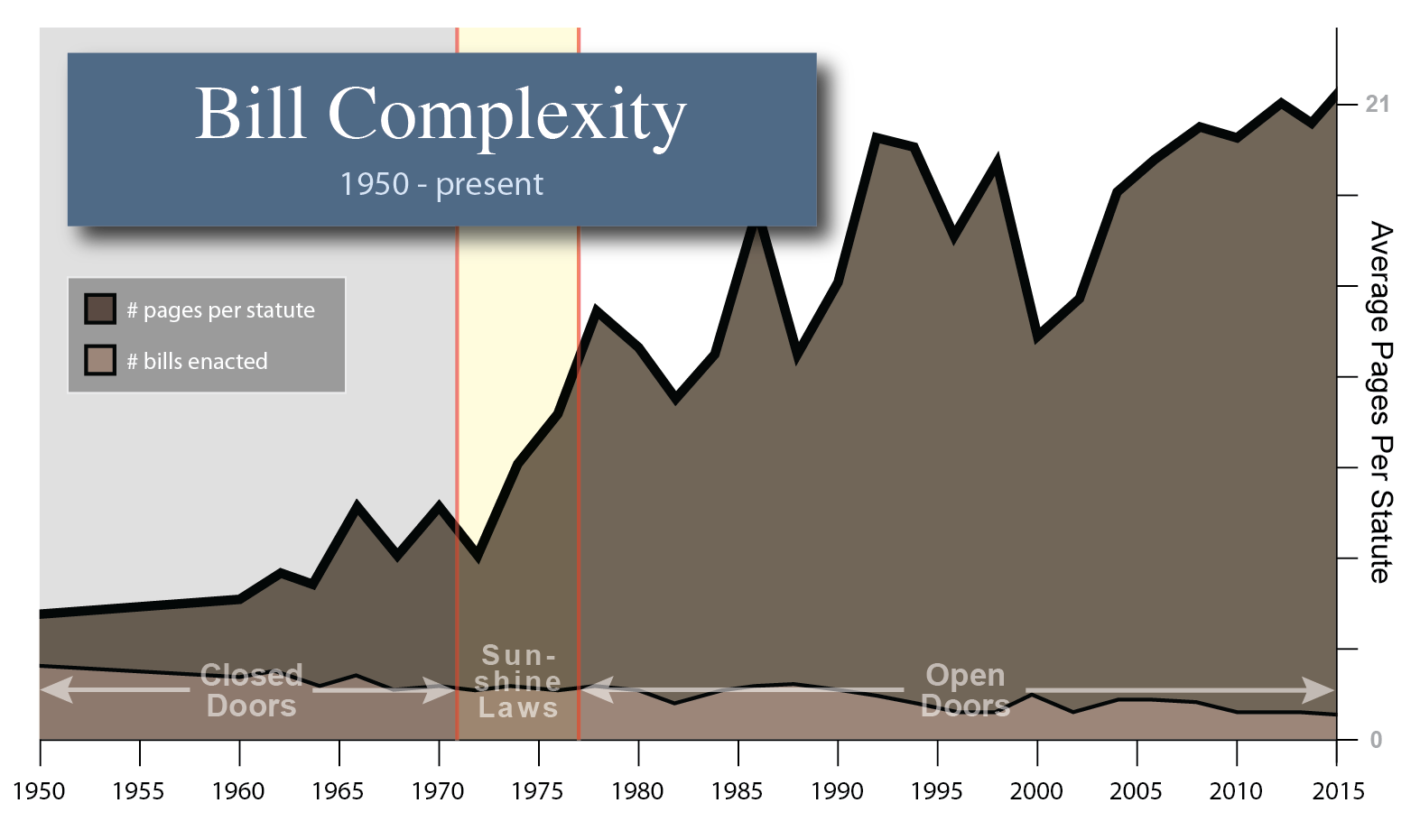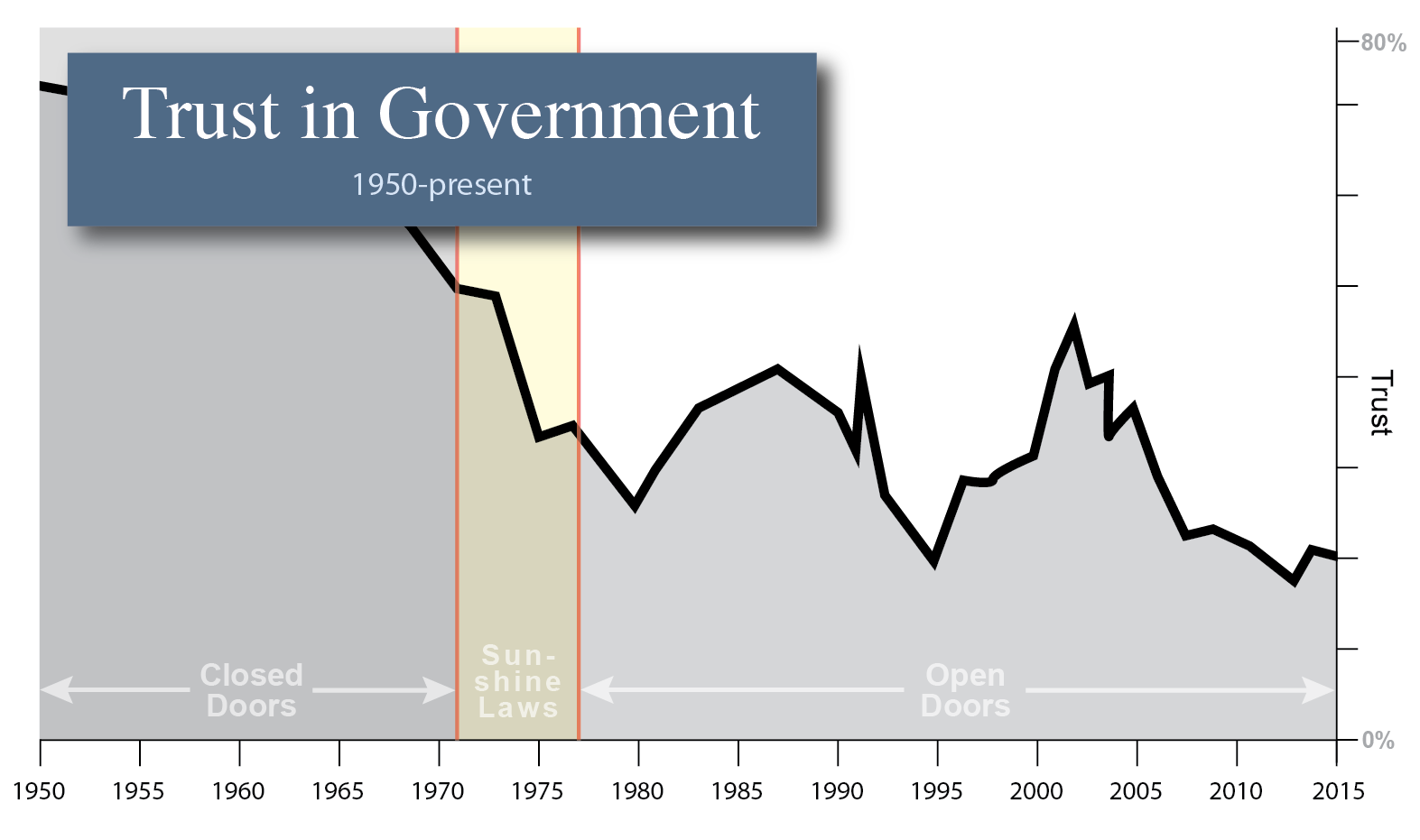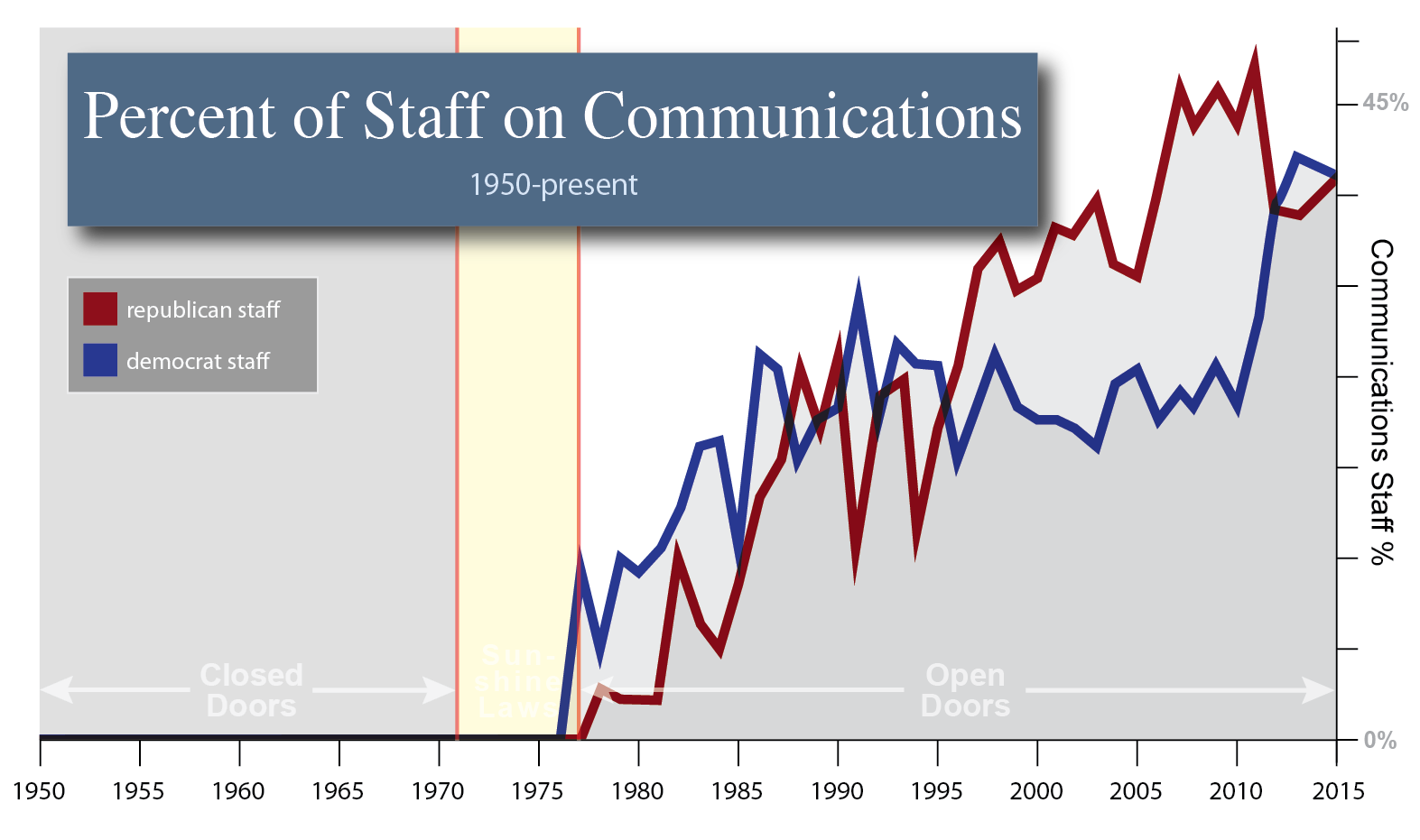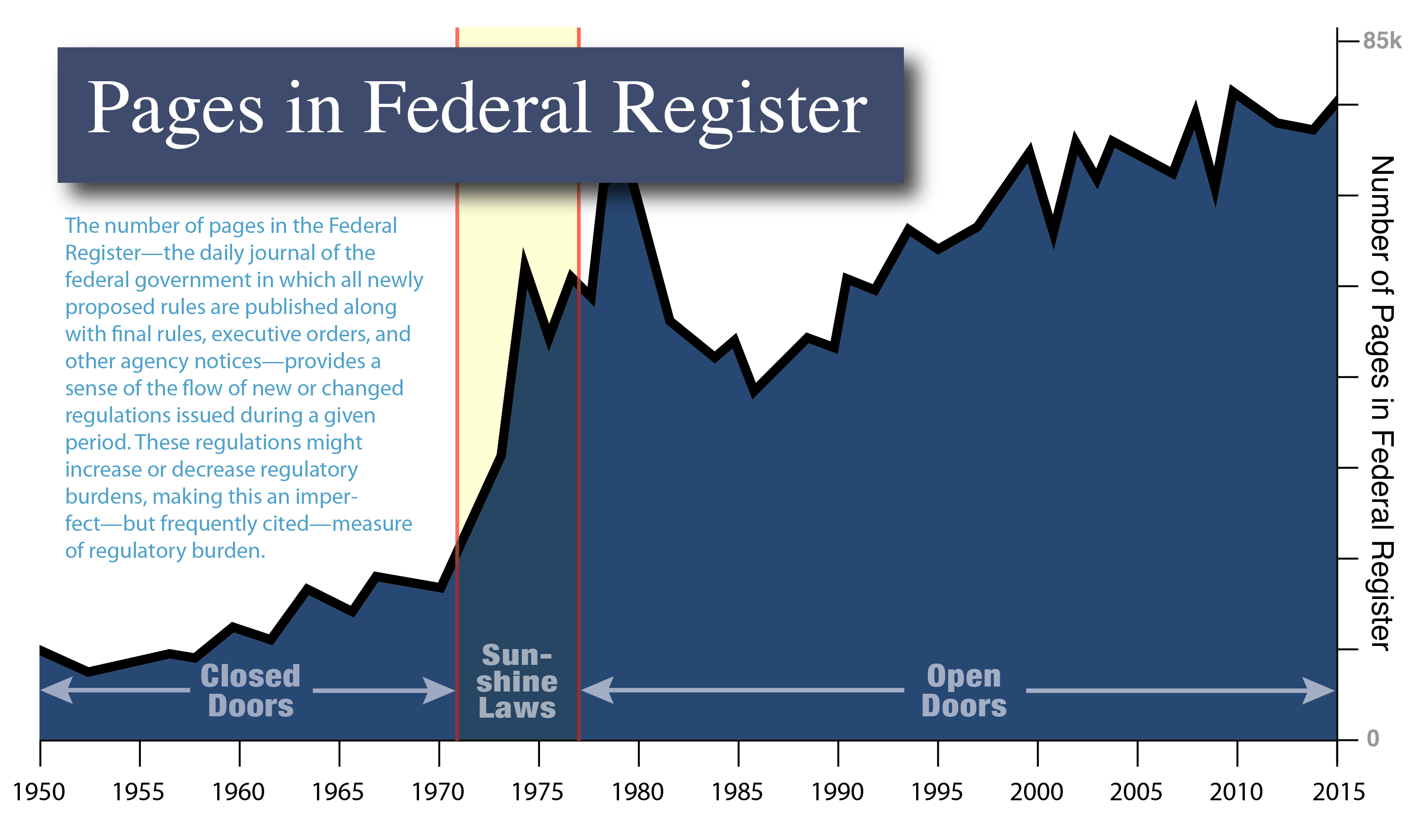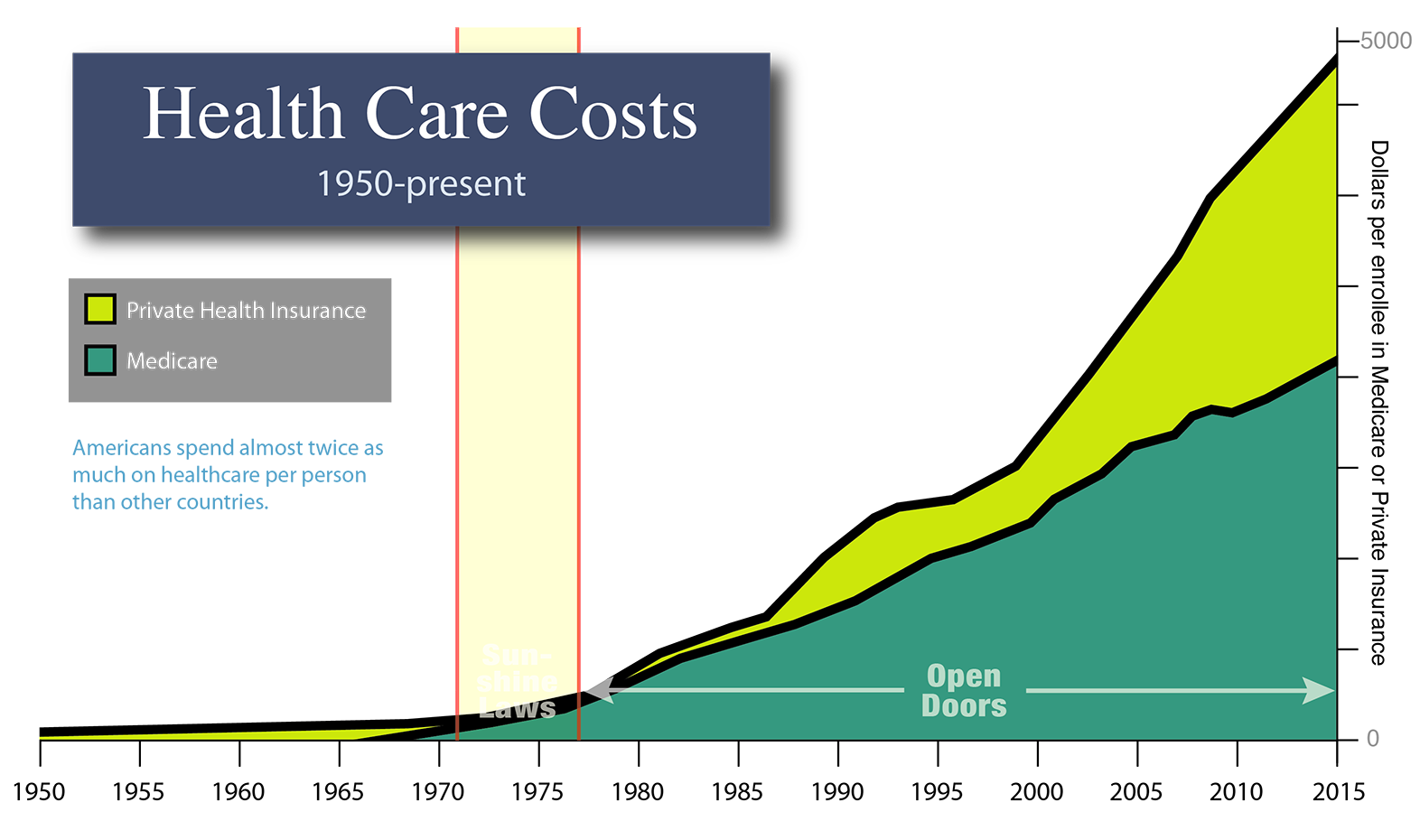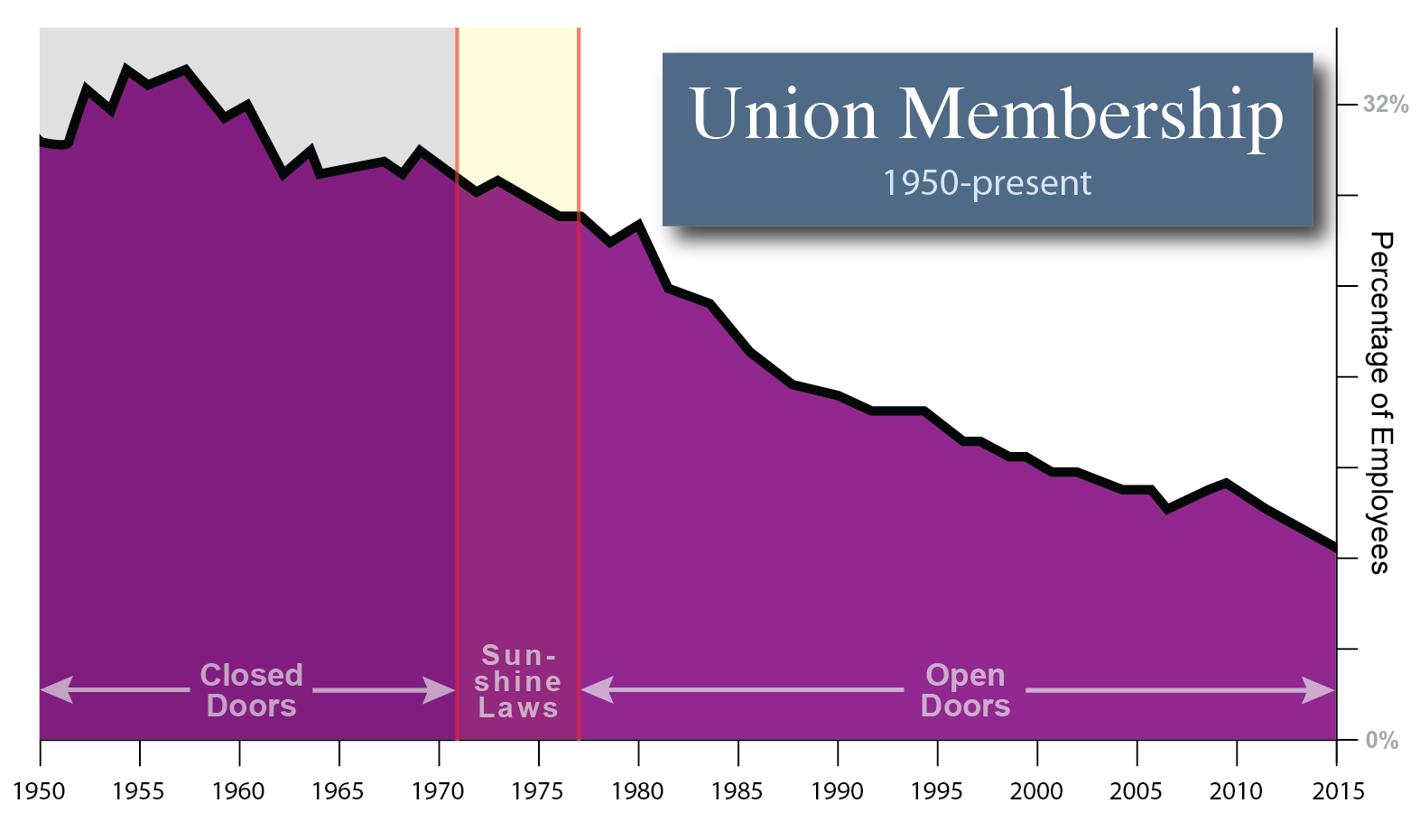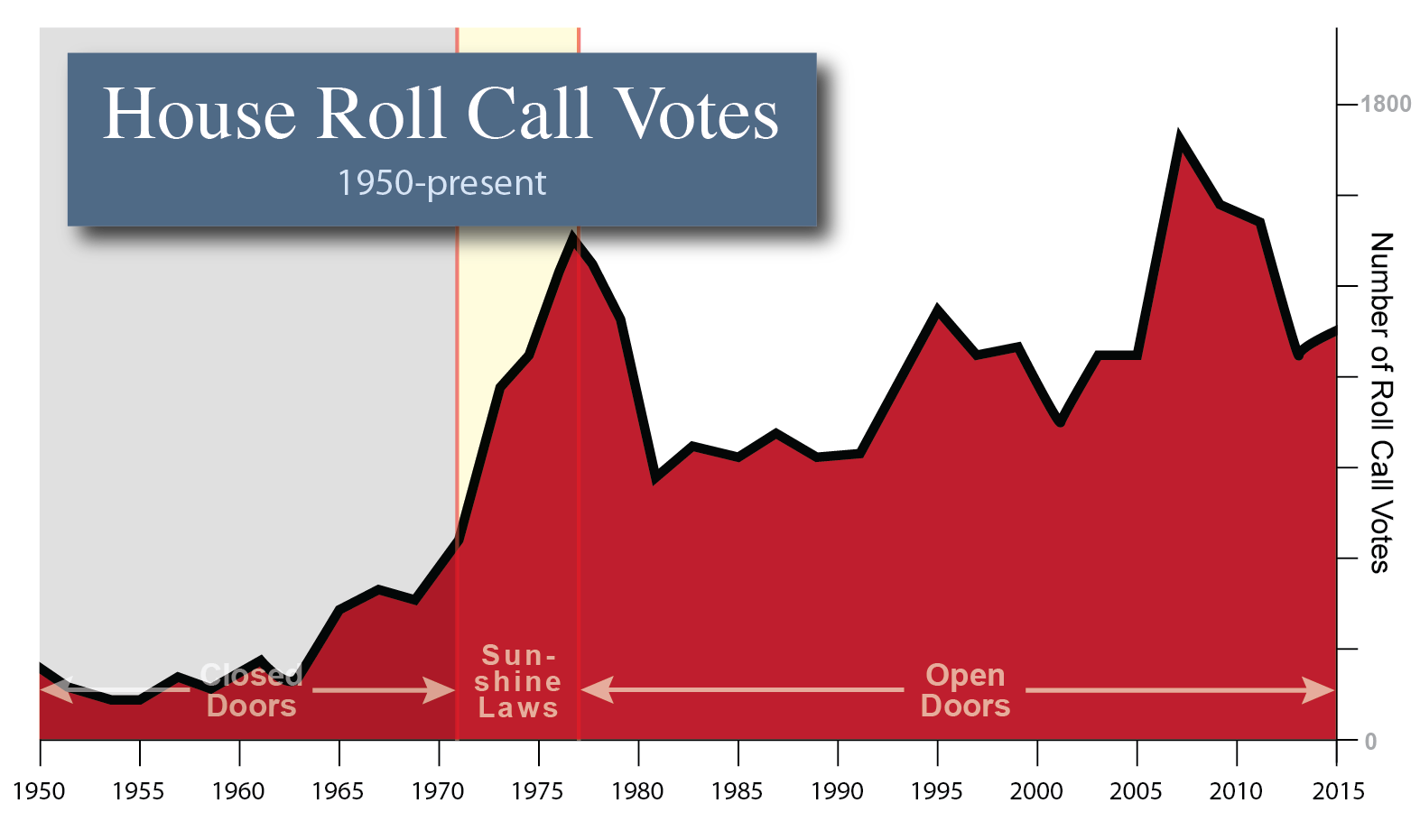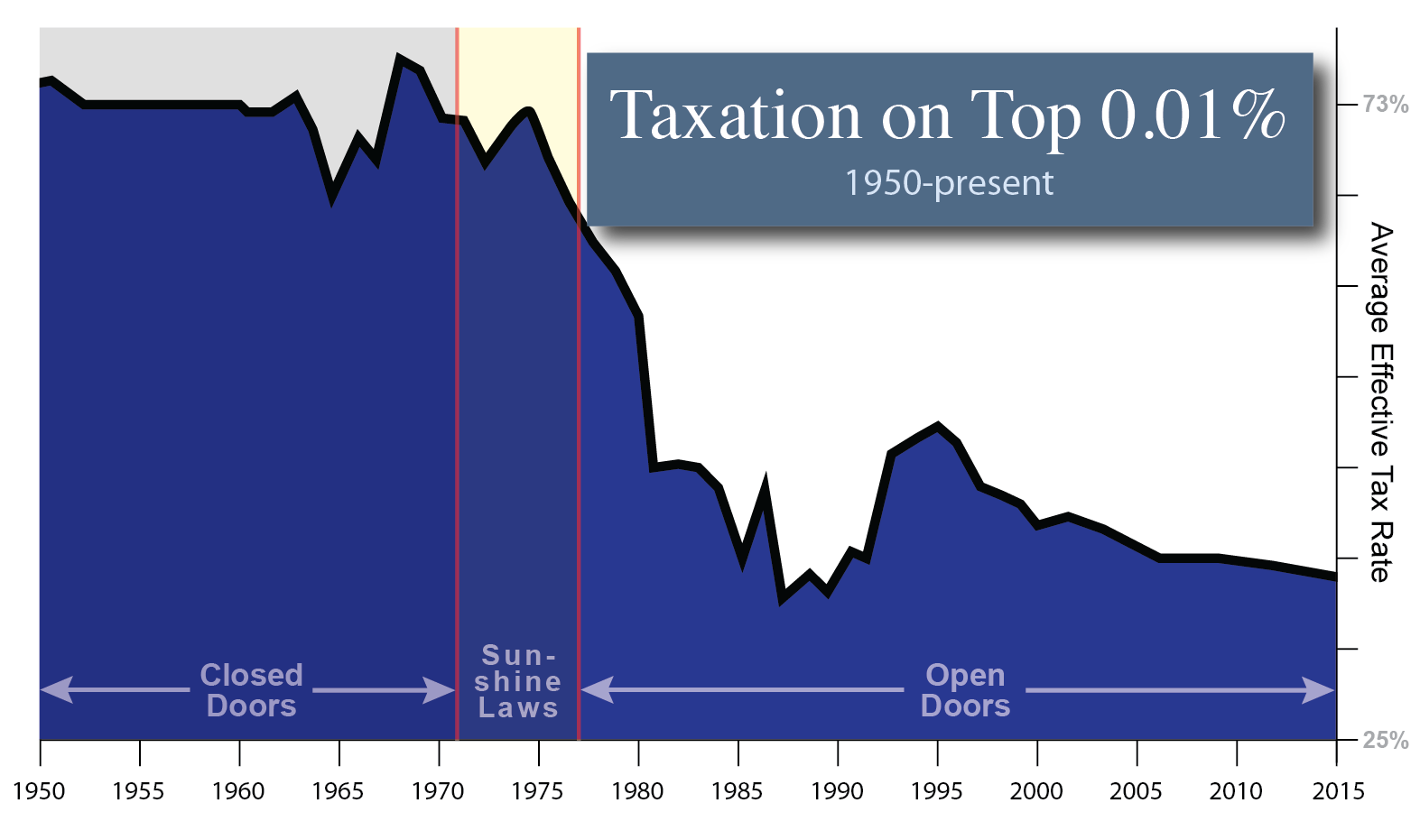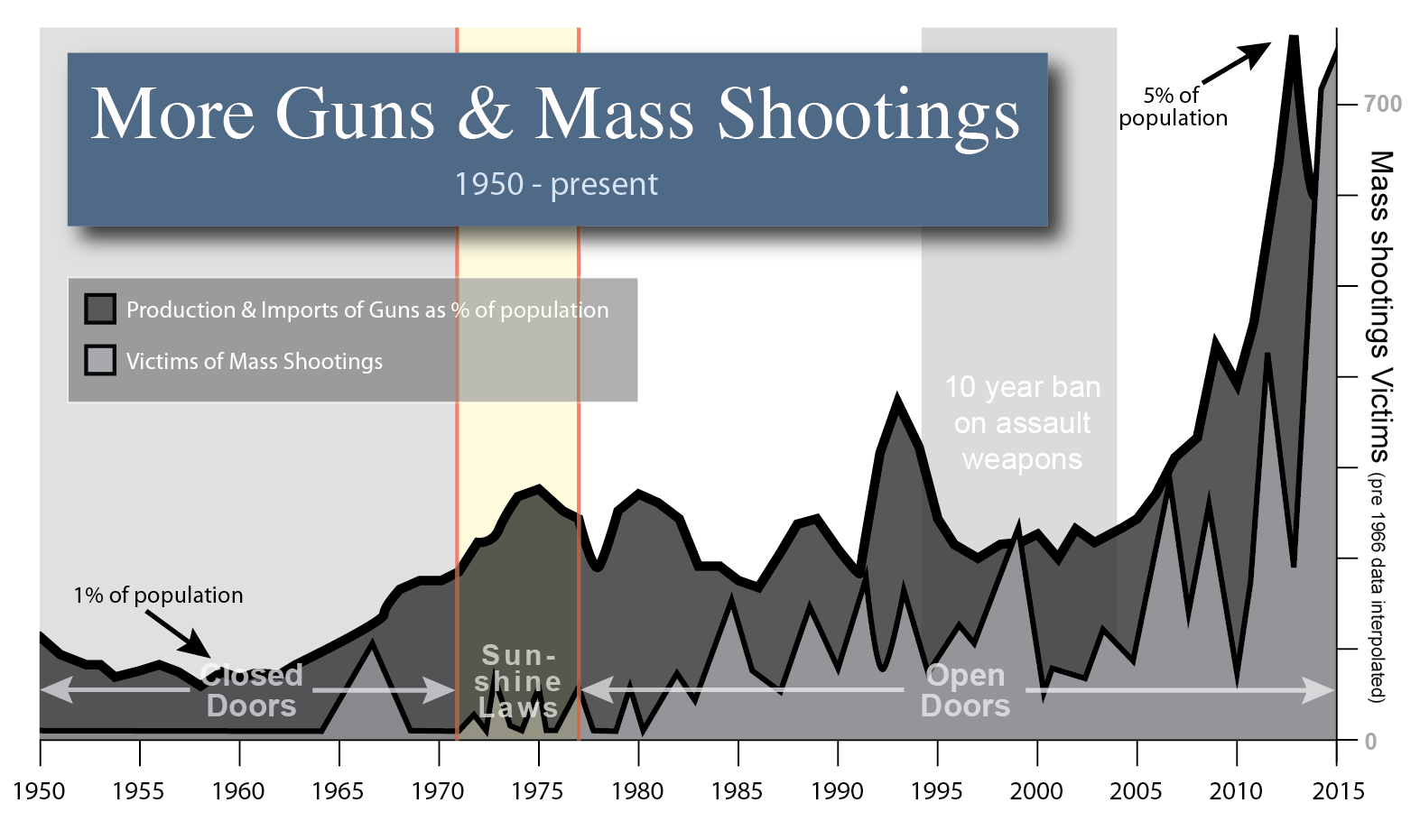1,250+ Academic Citations
The Pitfalls of
Congressional Transparency
How Lobbyists Thrive on Government Transparency
When drafting legislation, the Founding Fathers relied on secrecy. They wrote the Constitution and Bill of Rights in abject secrecy. This was no accident. As the following citations show, greater transparency has long been known to degrade the legislative process and provide benefits to powerful factions (lobbyists, partisan groups, and monied special interests).
Today, despite decades of pro-transparency funding by billionaires like Charles Koch, Jeff Bezos and Bill Gates, the tide is turning. In March 2022, Joe Biden became the first U.S. President to suggest the benefits of secret ballots in legislatures. In 2021, Republican Senator Ben Sasse and Democrat Chuck Schumer were the first two U.S. Senators to suggest the same. In 2019 Princeton’s Frances Lee became the first scholar to present the benefits of secrecy to the House of Representatives. She declared that transparency benefits lobbyists, destroys accountability and drives both partisanship and chaos. The members of the committee agreed, becoming also the first sitting members of the House to concede this point. In 2020, scholar James Curry presented similar findings.
On this page we collect over a thousand academic citations on the pitfalls of legislative transparency. These include comments from some of the most celebrated political scientists, journalists, and politicos including Cicero, Alexander Hamilton, and James Madison. In short, a surprising consensus appears – open door committees and public ‘roll-call’ voting leads to gridlock, partisanship, legislative warfare, soaring campaign finance and special interest capture. This is precisely what we see in the wake of the overlooked 1970 sunshine laws - laws which reject the Framers’ intentions and shun the ‘Secrecy Clause’ of the Constitution (Article I, Section 5, Clause 3).
By James D’Angelo and Brent Ranalli – October 16, 2024
Citations
On October 26, 1970, President Nixon signed the Legislative Reorganization Act into law. The LRA countered the express intentions of the Framers who, like most congressional committees for nearly 200 years, worked behind closed doors to limit the power of factions (special interests). These citations (with links to original sources) focus on how this vast increase in congressional transparency benefits lobbyists, special interests and the powerful.
For citations on how transparency is weaponized to drive partisanship, gridlock and poor legislative outcomes, dig into the other menu items above. There we provide collections of citations on the secret ballot, perverse accountability, brubery (the opposite of bribery), and the abject lack of citizen engagement. Finally, it is worth noting that despite the amount of well funded groups pushing for greater congressional transparency, we have yet to see evidence that sunshine confers any benefit on the political process.
The more open the internal operation [of Congress], the easier it is for external groups to interpose their wishes at all stages of the process.Richard Fenno 1977
Congress Reconsidered – 1st Ed
Sunshine reforms have proved more useful to lobbyists than to average Americans.Frances Lee (Princeton) 2019
Select Committee on the Modernization of Congress
Had the deliberations been open while going on, the clamors of faction (special interests) would have prevented any satisfactory result.Alexander Hamilton 1792
History of the Republic
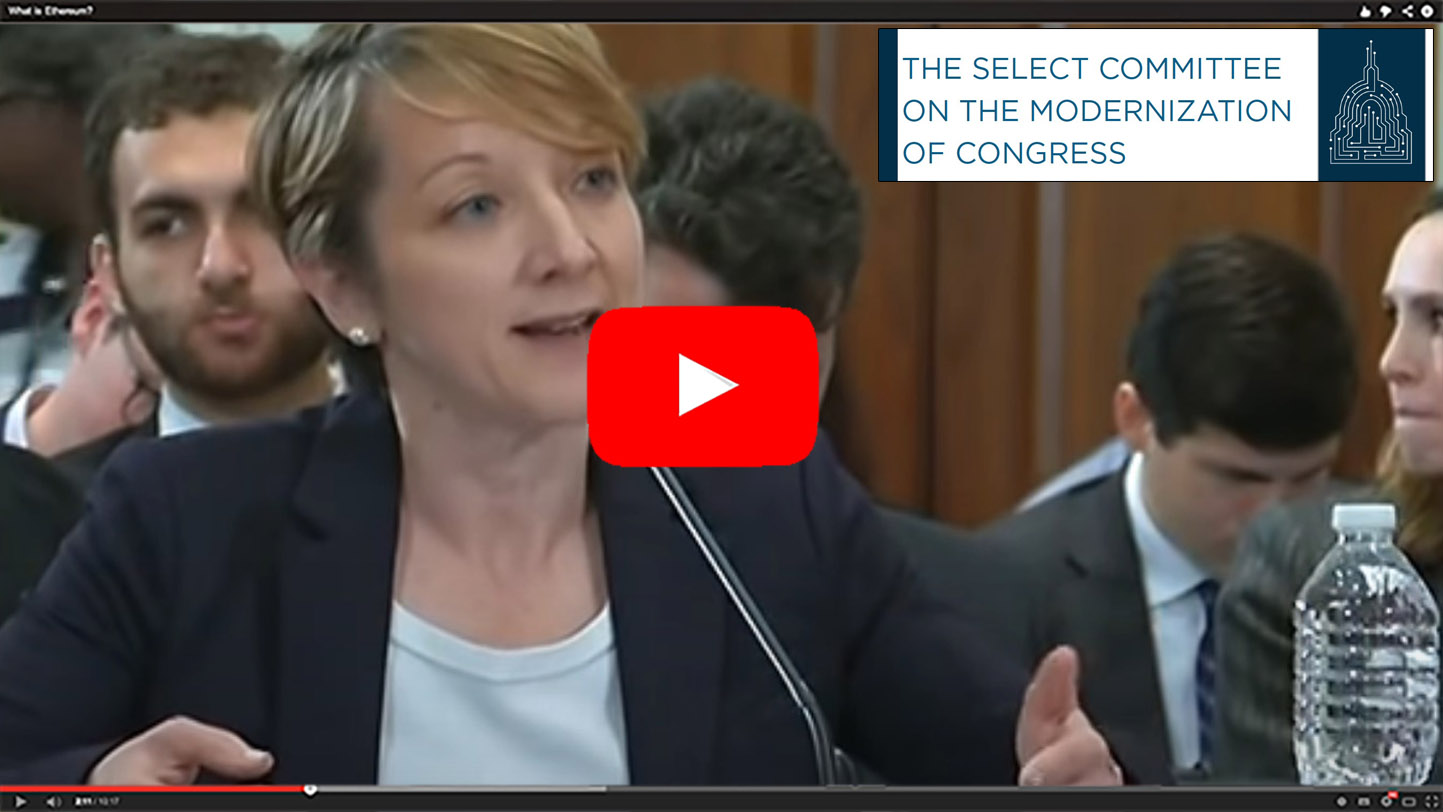
Frances Lee (Princeton) 2019 Congress: Problem with Sunshine

Frances Lee (Princeton) 2019 Congress: Problem with Sunshine
If we open up our [committees] to the public, every lobbyist in America is going to be there.Rep Harley Staggers (D-WV) 1973
Senate and House Open Up their Sessions
The secret to Congress’s success is secrecy.Russell Berman 2022 Atlantic Magazine
Shadow Congress
Some of the key [climate] issues debated over the past 20 years were resolved in Paris in secret meetings.Radoslav S. Dimitrov 2016
The Paris Agreement on Climate Change: Behind Closed Doors
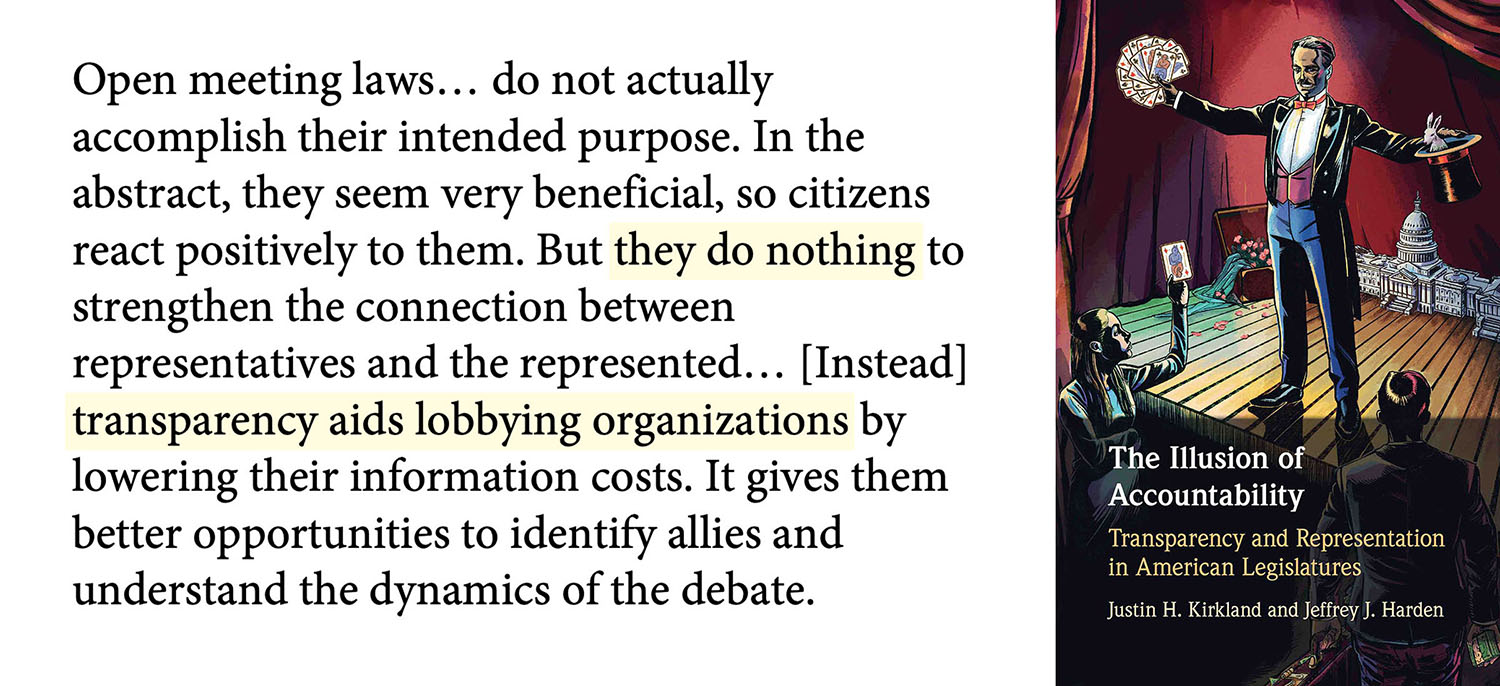
Justin H. Kirkland, Jeffrey J. Harden 2022 - The Illusion of Accountability - Transparency in American Legislatures
Text: Open meeting laws… do not actually accomplish their intended purpose. In the abstract, they seem very beneficial, so citizens react positively to them. But they do nothing to strengthen the connection between representatives and the represented... [Instead] transparency aids lobbying organizations by lowering their information costs. It gives them better opportunities to identify allies and understand the dynamics of the debate.

Justin H. Kirkland, Jeffrey J. Harden 2022 - The Illusion of Accountability - Transparency in American Legislatures
The more open a system becomes, the more easily it can be penetrated by money, lobbyists and fanatics… Congress can now be monitored and influenced as never before. As a result, lobbies, which do most of the monitoring and influencing, have gained power.Fareed Zakaria 2003
Future of Freedom
Transparency often exacerbates crises.Bernard Finel & Kristin Lord 1999
The Surprising Logic of Transparency
In places where open voting has been implemented, and especially in those countries where it is highly developed – such as the USA and also Norway - it has brought about considerable ills/drawbacks.Swedish Parliament 1899
Translation by Martin Söderholm
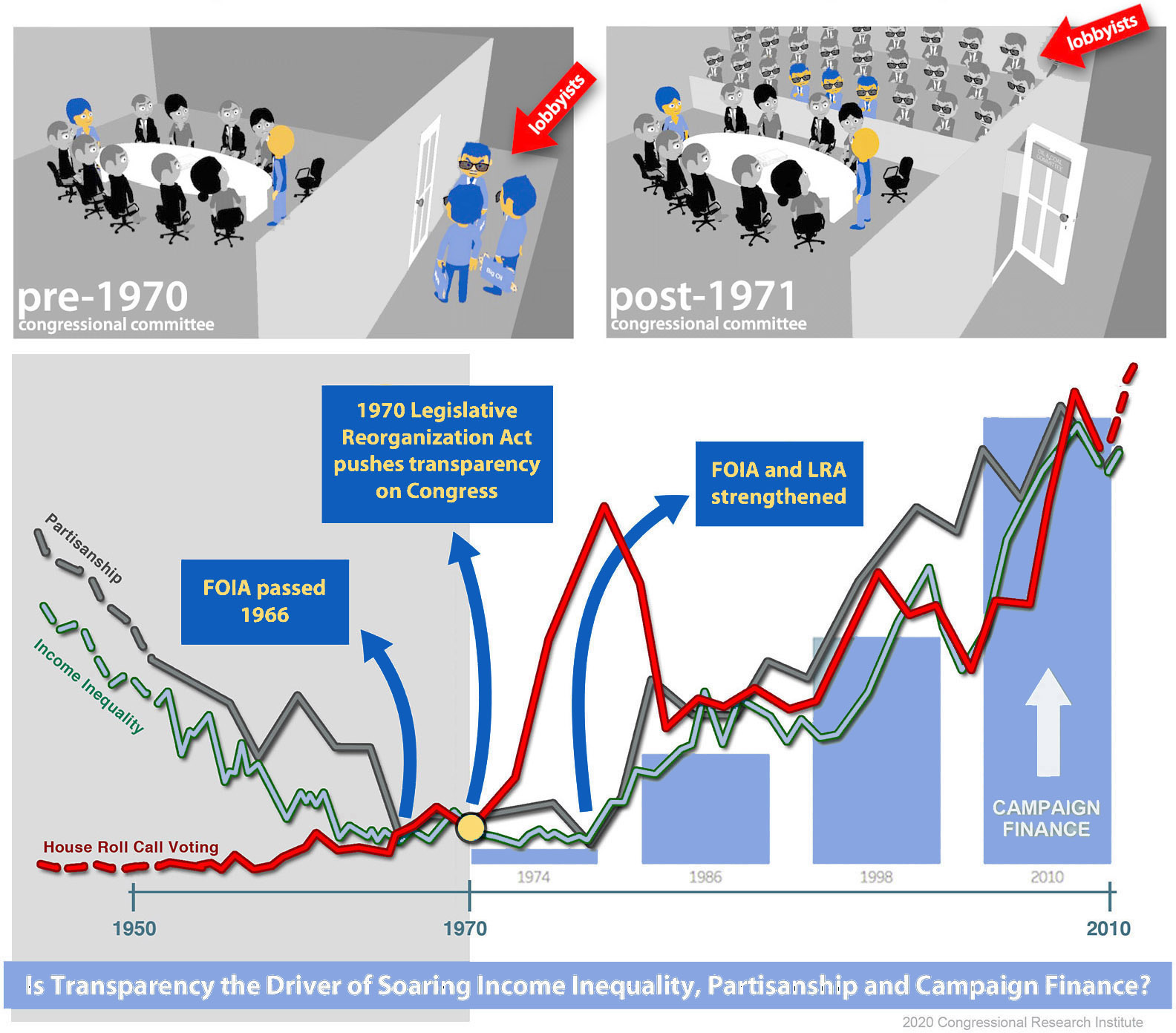
CRI 2020 - Is Government Transparency the Driver of Soaring Income Inequality, Partisanship and Campaign Finance?

CRI 2020 - Is Government Transparency the Driver of Soaring Income Inequality, Partisanship and Campaign Finance?
Greater political openness makes spending on lobbying more worthwhile, not less.Timothy Taylor 2019
When Special Interests Play in the Sunlight
Information is the currency of Capitol Hill, not dollars. And not friends.Lobbyist Jan Schoonmaker 1993
For New Lobbyists, It’s Now What They Know
We were a conquering army. We came here to take the Bastille. We destroyed [Congress] by turning the lights on.Rep. George Miller (D-CA) 2018
The Class of ‘74Full citation: Members of the Class believed that if they were able to make the institution and its procedures more transparent to the public, the House and American politics would change forever. “We were a conquering army,” recalled George Miller of California, “We came here to take the Bastille. We destroyed the institution by turning the lights on.”
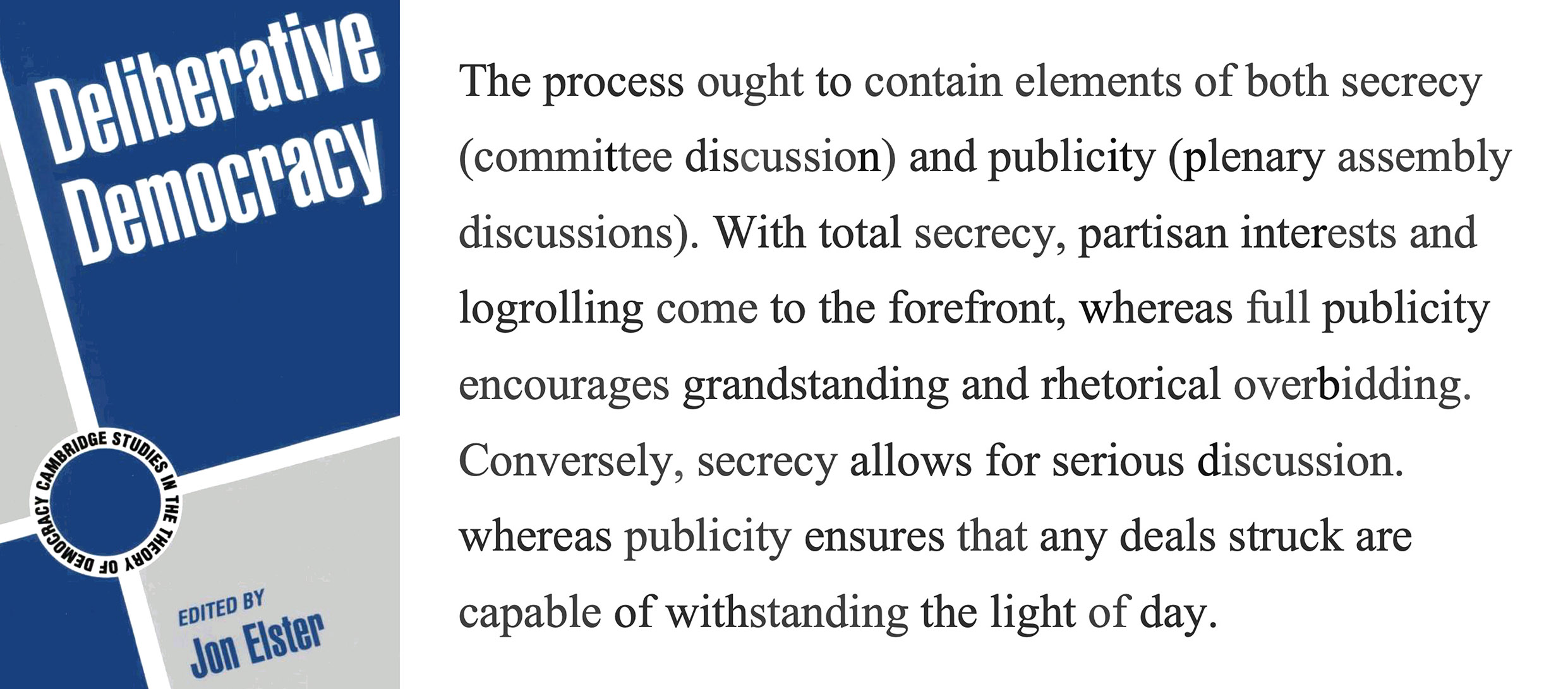
Jon Elster 1998 - Deliberative Democracy
Note: At CRI we agree with Elster’s prescription (secrecy in committees and transparency in the full chamber) though we don’t agree with his analysis as we don't see the increased logrolling or partisanship in secret regimes, instead we see the opposite. See our page covering partisanship and transparency.
The process ought to contain elements of both secrecy (committee discussion) and publicity (plenary assembly discussions). With total secrecy, partisan interests and logrolling come to the forefront, whereas full publicity encourages grandstanding and rhetorical overbidding. Conversely, secrecy allows for serious discussion. whereas publicity ensures that any deals struck are capable of withstanding the light of day.

Jon Elster 1998 - Deliberative Democracy
The process ought to contain elements of both secrecy (committee discussion) and publicity (plenary assembly discussions). With total secrecy, partisan interests and logrolling come to the forefront, whereas full publicity encourages grandstanding and rhetorical overbidding. Conversely, secrecy allows for serious discussion. whereas publicity ensures that any deals struck are capable of withstanding the light of day.
Interest groups never call for secret negotiations.Barbara Koremenos 2010
Open Covenants, Clandestinely Arrived At
Only the lobbyists, for good causes or bad, will really keep tabs. This [open process] will make their job easier!Nelson Polsby 1970
Ending Secrecy In House Voting
The idea that more transparency in government is always an unalloyed good is a dangerous populist illusion… The demand to see decisions being made is more often about giving reporters fodder for juicy stories or enabling groups to pressure decision-makers than helping voters make decisions.Francis Fukuyama 2015
The Limits of Transparency
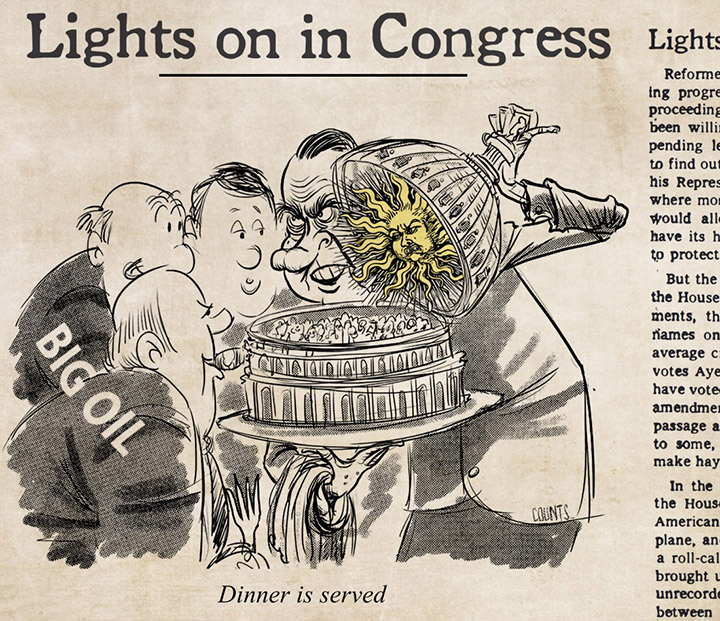
Dave Counts - Dinner is served
In 1970, President Nixon signed The Legislative Reorganization Act opening congressional committees to the glare of powerful interests.

Dave Counts - Dinner is served
Two decades later, after the advent of sunshine laws, we know better. Open markup sessions often give organized interests a powerful advantage over inattentive citizens, for they can monitor exactly who is doing what to benefit and to hurt them.Douglas Arnold 1990 (Princeton)
The Logic of Congressional Action
The groups that benefit most from fishbowl transparency and immediate access to details of ongoing negotiations are tightly organized groups seeking transfers to particular economic interests.Elizabeth Garrett & Adrian Vermeule 2006
Transparency in the Budget Process
There is a danger that too much transparency in many policy settings can weaken deliberation, violate privacy rights, and advantage well-organized interests that possess the resources and motivation to utilize opportunities to monitor government closely.Bruce Cain 2014 (Stanford)
Democracy More or Less
Consequences of Sunshine?
Interest groups have long treated voting records as the currency of legislators’ performance.John M. Carey 2009
Legislative Voting and Accountability
[Sunshine rules are] great for the lobbyists, but the members of Congress hate it. There in the back of the hearing room are all these lobbyists watching a markup session and giving a thumbs-up or a thumbs-down to specific wordings or provisions. It’s a fishbowl for them.Kay Lehman Schlozman & John T. Tierney 1983
More of the Same: Pressure Group Activity
As “sunshine” laws and rules opened markup sessions, hearings and conferences to the public, the lobbyist no longer was left hovering outside the closed door excluded from the action; rather he could be right there watching every move — in many cases suggesting legislative language and compromise positions.Congressional Quarterly 1982
The Washington Lobby
Recorded votes on amendments, and open knowledge of who introduced them, makes it easier for the lobbyist to monitor the action and apply pressure where most needed.Congressional Quarterly 1982
The Washington Lobby
When he had to thrash out a new clean air bill, [George] Mitchell, the Senate majority leader, feared lobbying by auto, oil, coal and steel companies would be nasty. He was nervous about squabbling between Midwestern and Eastern senators. So Mitchell decided to hide the messiness behind closed doors. Sandy Grady 1990
Pollution of Reality [secret meetings environment]
By opening committee proceedings, and making members’ actions verifiable, the conditions for a viable market for votes are created.John Ferejohn 1999
Accountabiliy and Authority
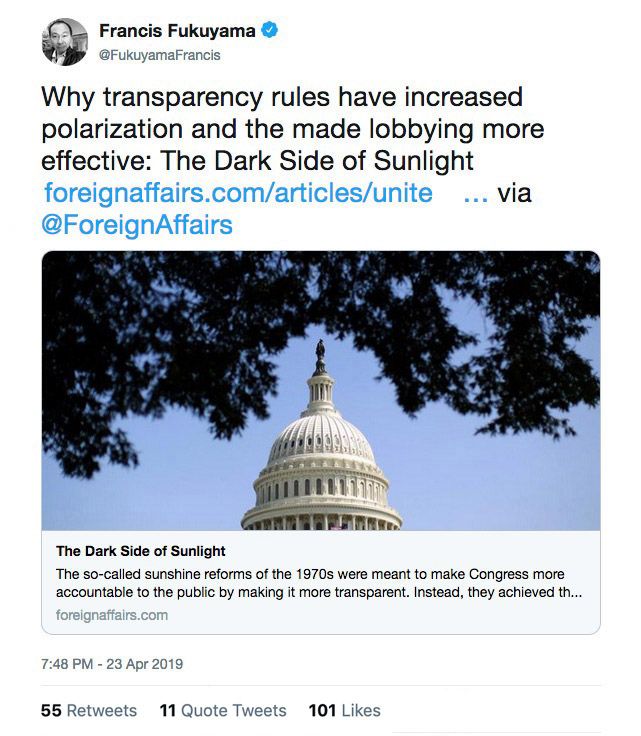
Francis Fukuyama (Stanford) 2019 – Via Twitter

Francis Fukuyama (Stanford) 2019 – Via Twitter
It must be recognized that there is no way to open up the legislative process to the people without also opening it up to lobbyists and interest groups.Joseph Bessette 1994
Mild Voice of Reason
Full transparency can do great harm. If implemented without a notion of why some part of a system should be revealed, transparency can threaten privacy and inhibit honest conversation. “It may expose vulnerable individuals or groups to intimidation by powerful and potentially malevolent authorities.”Mike Ananny & Kate Crawford 2016
Seeing without knowing: Limitations of the transparency ideal
If you wanted to track the growth of the deficit with the opening-up of committee markups to the public, you’d find there’s a direct correlation.James L. Payne 1991 (interview)
Culture of Spending
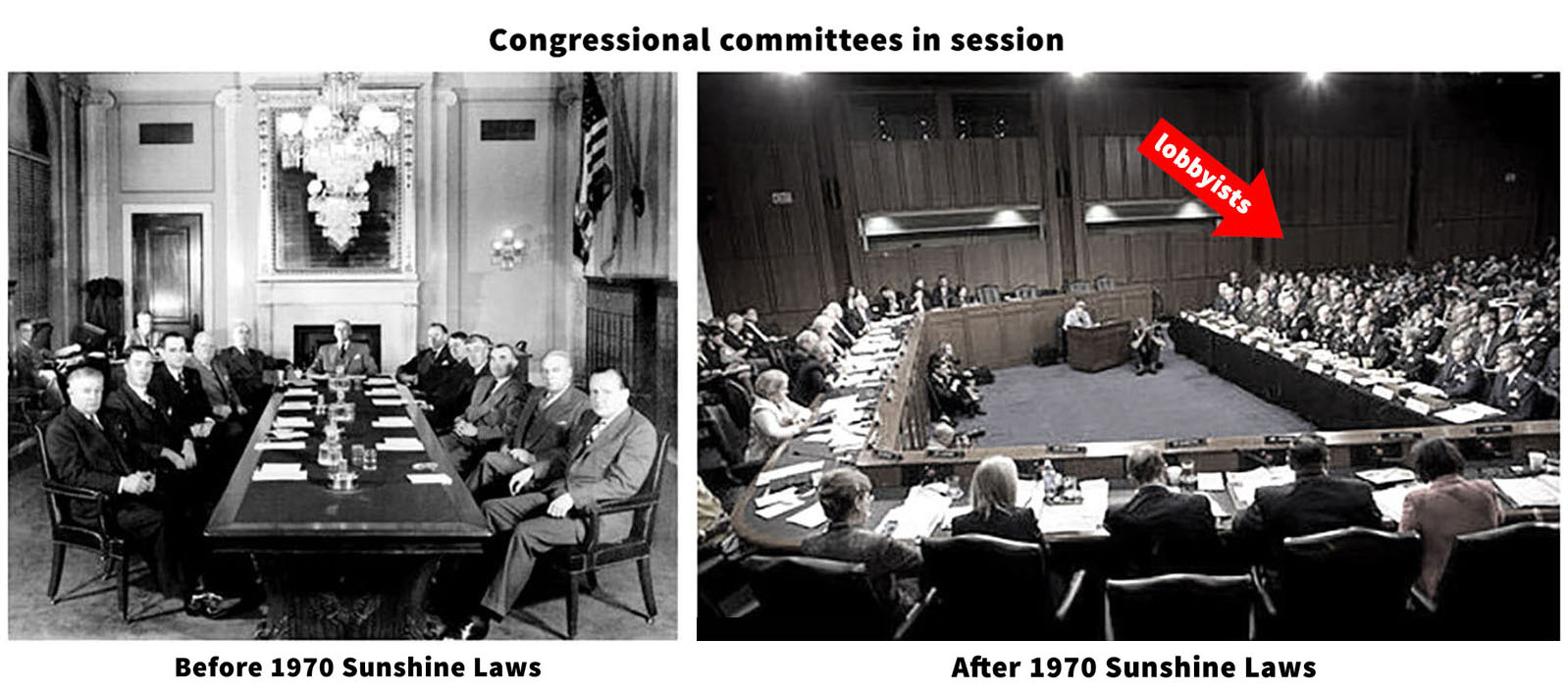
Committee rooms before and after the sunshine laws

Committee rooms before and after the sunshine laws
It’s the special interests that have the greatest investment in transparency, since that would allow them to pressure the negotiators and poison the political atmosphere in advance of any deal.Joshua Green 2011
Against Supercommittee Transparency
The motive for secrecy in early parliamentary debates was protection both from the Crown and from the electorate.Brian J. Caveney 1999
More Sunshine in the Mountain State
MSNBC Max Rose 2023 - Public Votes Drive Partisan Craziness
Text from October 11, 2023 on the Morning Joe Show with guest former Representative Max Rose - in a conversation about the secret ballot voting for the House speaker: "The thing with this vote behind closed doors, that's not gonna be the hurdle. Any time you get behind closed doors the extremists become somehow subdued. You know, they are not allowed their cameras, their phones, and not just because that leaks, but so they can't take a photo of their ballots. And so when they can't take a phot of their ballot, they don't have anything to show, whether its a text to Donald Trump, or to his people, or to his extremist base. But the danger will come when they have to go out in public and take that public vote."
MSNBC Max Rose 2023 - Public Votes Drive Partisan Craziness
An action performed in public is more susceptible to influence by other agents than an action performed in secret is. Therefore those with the most resources at their disposal are in a better position to influence the behavior of others if such behavior takes place in the open than if it is performed in secrecy.Bernard Manin 2015
Secrecy and Publicity
“We are now weaponizing the process by calling for the ‘ayes’ and ‘nos’ on each one of these amendments,” Zwonitzer said on the House floor, adding it’s happening, “With three lobbyists up in the north gallery staring over us with clipboards, taking photos of our every vote. It’s intimidation.”Leo Wolfson 2024
Legislator Says Wyoming Freedom Caucus Is ‘Weaponizing’ House Roll Call Votes
The original reason for secrecy was protection against interference with Parliamentary proceedings by the Crown.Harold Cross 1953
The People’s Right to Know
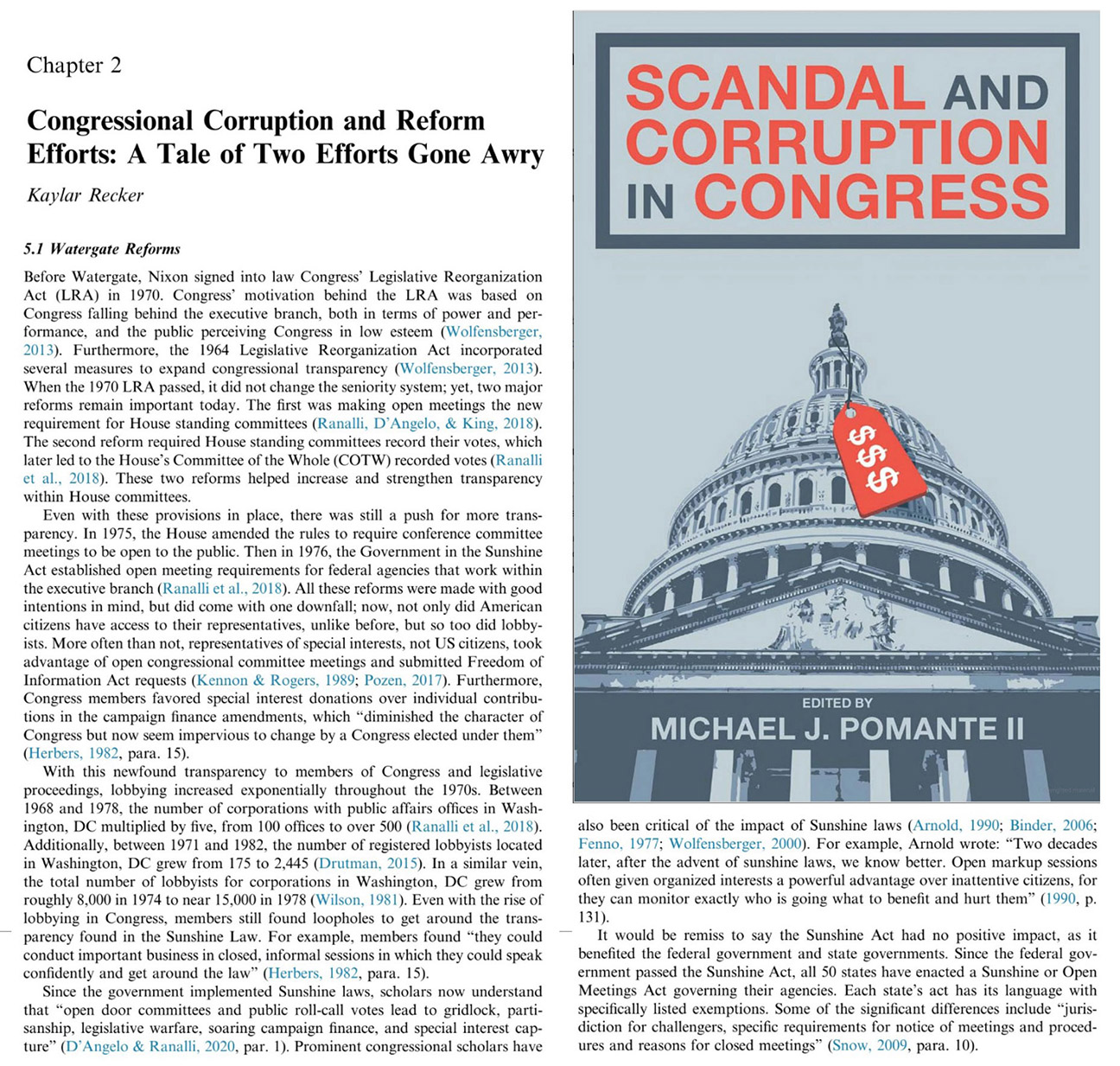
Pomante Recker 2023 – Scandal and Corruption in Congress

Pomante Recker 2023 – Scandal and Corruption in Congress
Secrecy is vital in the execution of some public policies.Karina Furtado Rodrigues
Unveiling the concept of transparency
The public enjoys no specific constitutional “right to know,” nor does Congress have an affirmative obligation either to disclose or to permit unlimited access to its materials or processes. On the contrary, materials and policy decisions that in Congress’ judgment require secrecy may be constitutionally withheld from the public.Daniel M. O’Brien 1980
The First Amendment and the Public’s Right to Know
Disclosure does not work, cannot be fixed, and can do more harm than good. It has failed time after time, in place after place in area after area, in method after method, in decade after decade.Omri Ben-Shahar & Carl E. Schneider 2014
More Than You Wanted to Know: Failure of Mandated Disclosure
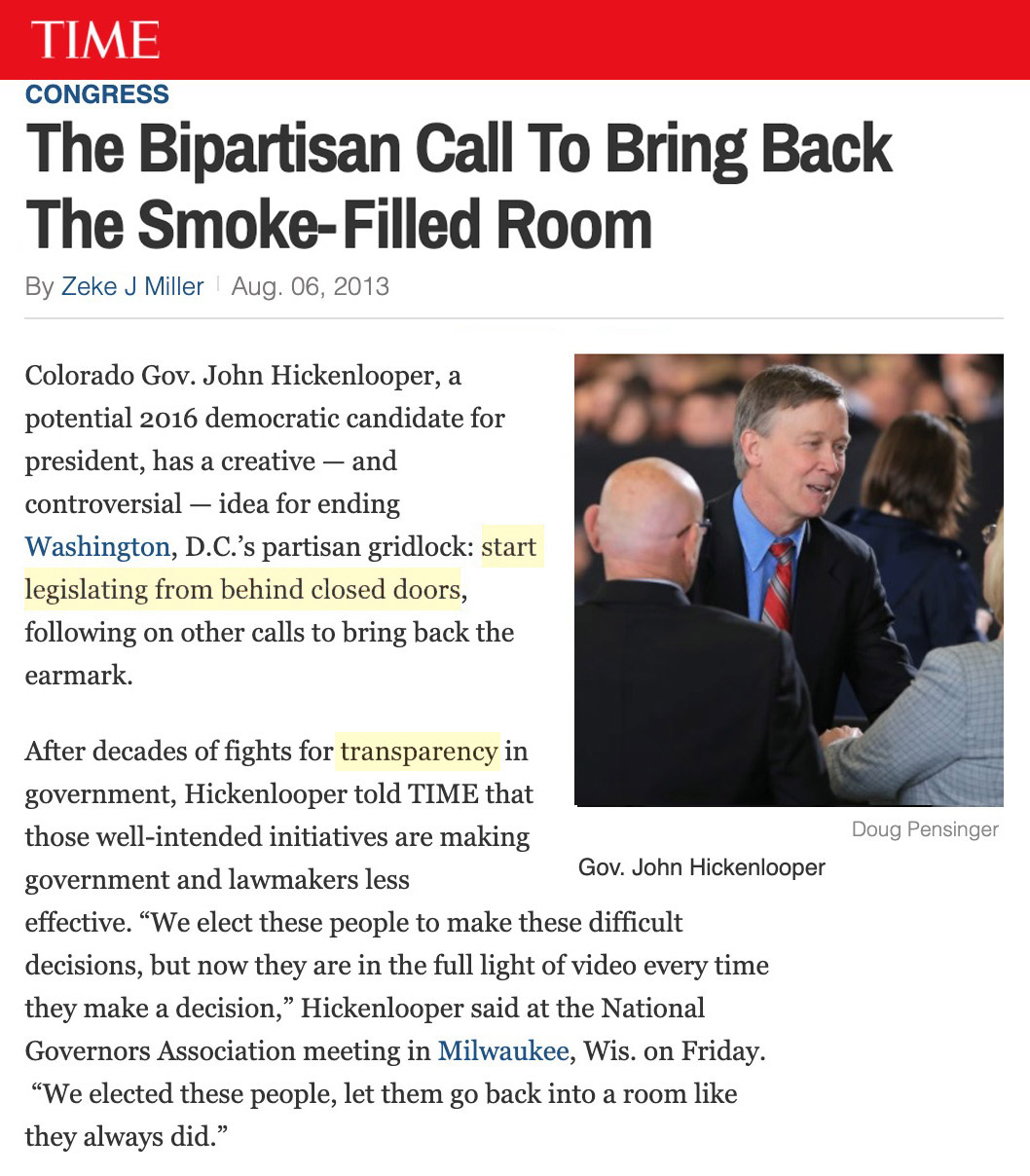
Zeke Miller 2013 - The Bipartisan Call To Bring Back The Smoke-Filled Room

Zeke Miller 2013 - The Bipartisan Call To Bring Back The Smoke-Filled Room
A lot of lobbyists really complain about closed meetings.Jaqueline Calmes 1987
Congressional Quarterly – Fading Sunshine Reforms
Deals are never reached in front of the television camera.David Frum 2010
Blame yesterday's reforms for today's gridlocked Congress
Journalists and lobbyists in the galleries were beginning to try to record the votes of individual legislators .Bibby & Davidson 1972
On Capitol HillNote: Even before the 1970s sunshine reforms, lobbyists, not the public, pushed to get the votes of legislators
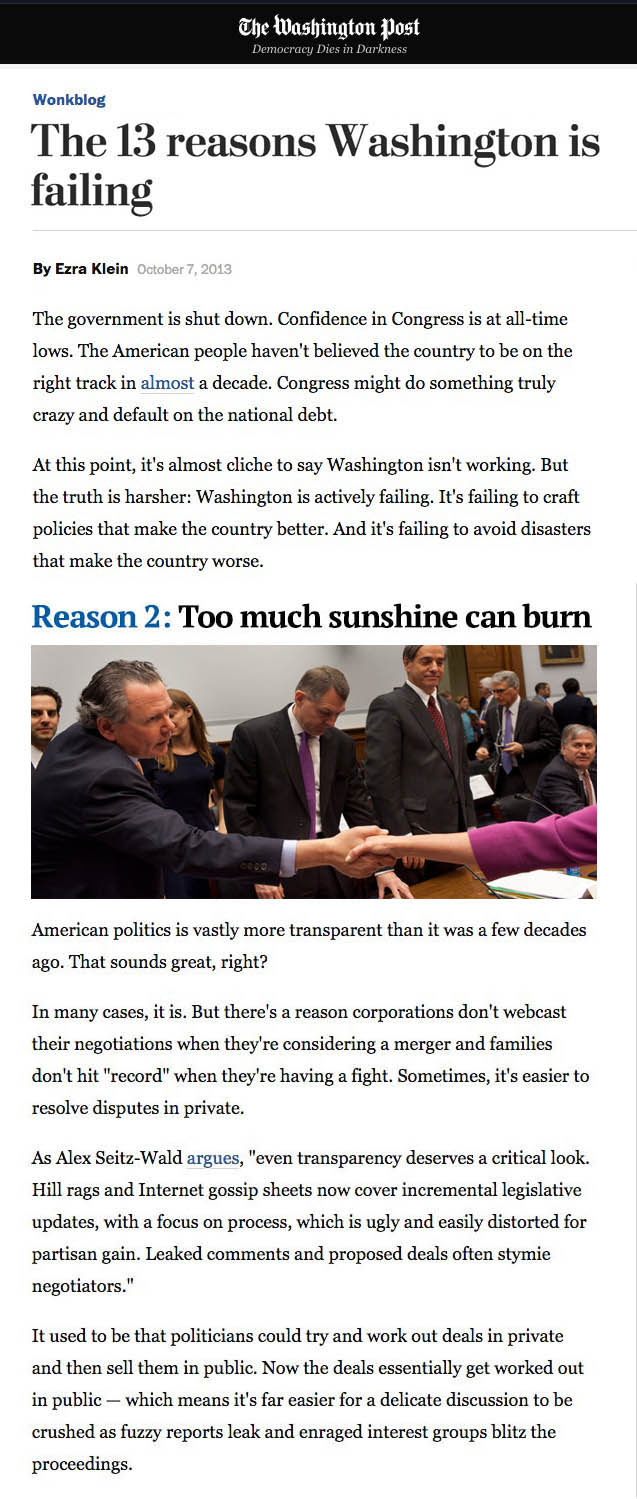
Ezra Klein – 2013 Washington Post

Ezra Klein – 2013 Washington Post
The final breakthrough in the civil rights struggle occurred behind closed doors.Julian Zelizer 2015
Fierce Urgency of Now
Negotiations often have to be private, and there's a place for frankness and private conversations in politics and in governing.John Wonderlich 2012 (Sunlight Foundation)
Open-Government Watchdogs OK With Closed-Door Fiscal Cliff Talks
The “secret congress” theory holds that a successful compromise can happen as long as no one makes a fuss over it. Economist 2024
The "Secret Congress" Theory
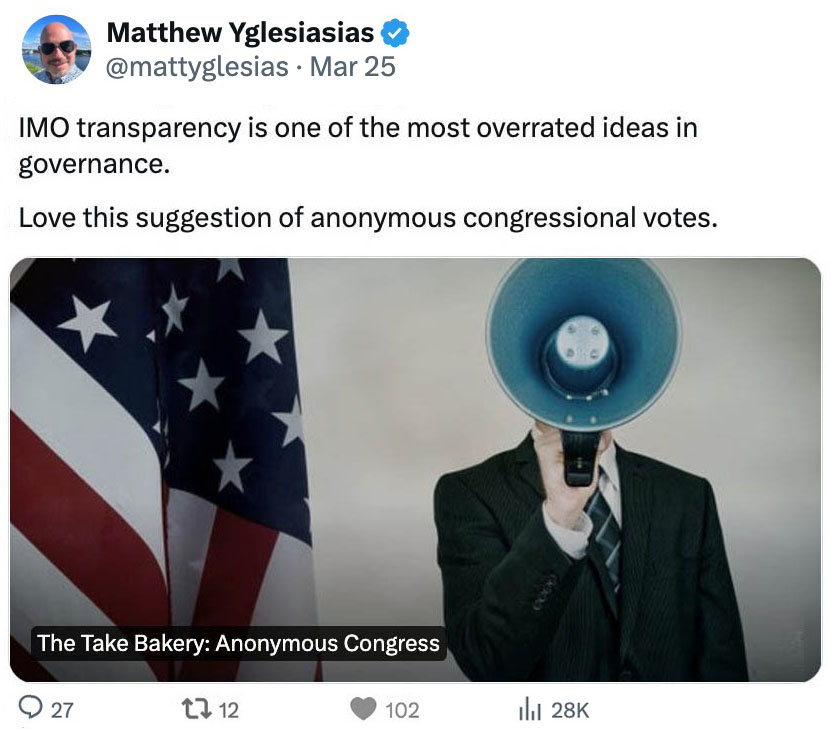
Matthew Yglesias 2024 - Transparency is Overrated

Matthew Yglesias 2024 - Transparency is Overrated
The House, heeding the demands of reformers, voted today to scrap the system under which it has shaped much of its legislation by secret vote since the first Congress in 1789.Marjorie Hunter July 28, 1970
House Backs End of Teller Votes on Amendments (New York Times)
The more Congress gives people voice, accountability, representation, and open, visible procedures, the more the people will be dissatisfied with Congress.John Hibbing 2002
How to Make Congress Popular (trust)
Then we had open mark-up sessions. And who came to open mark-up sessions? The press and the lobbyists.Timothy Kearley 1982
The American journal of tax policy
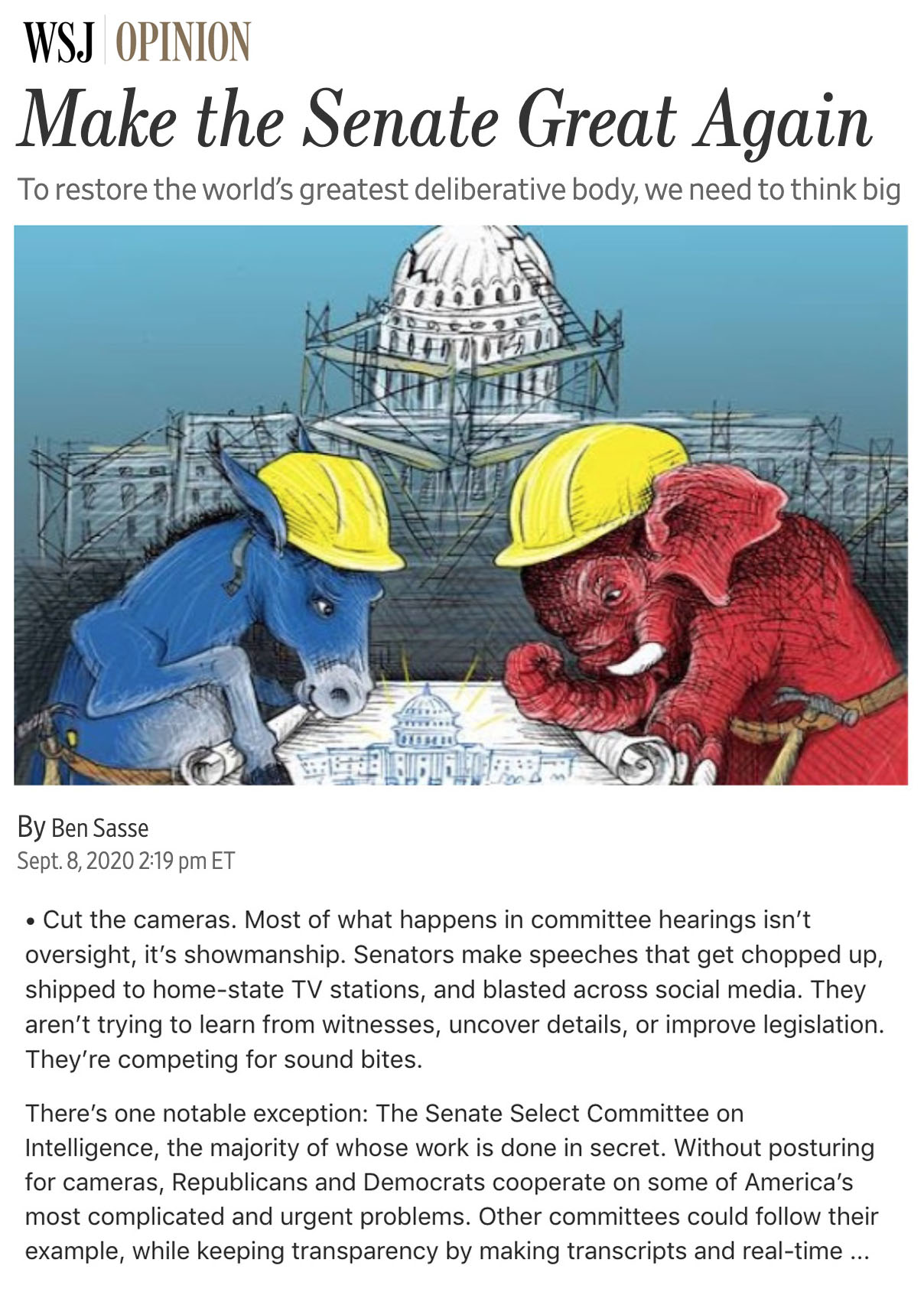
Senator Ben Sasse 2020 - Cut the Cameras
“Cut the cameras. Most of what happens in committee hearings isn’t oversight, it’s showmanship. Senators make speeches that get chopped up, shipped to home-state TV stations, and blasted across social media. They aren’t trying to learn from witnesses, uncover details, or improve legislation. They’re competing for sound bites. There’s one notable exception: The Senate Select Committee on Intelligence, the majority of whose work is done in secret. Without posturing for cameras, Republicans and Democrats cooperate on some of America’s most complicated and urgent problems. Other committees could follow their example, while keeping transparency by making transcripts and real-time”

Senator Ben Sasse 2020 - Cut the Cameras
If you would have a secret vote, 20 Republican Senators would not vote for the tax cut.Senator Arlen Specter 1995
Congressional Record
In a secret vote, the Colombian assembly votes 51-13 to ban extradition in a new Constitution, to take effect July 5. The same day Pablo Escobar surrenders to Colombian police.Frontline 1991
Thirty Yeas of American’s Drug War
Voting is electronic. Members put plastic cards in slots behind desks on the House floor, then press buttons to register a “yea” or “nay” vote. The lights are dimmed so that members can see their votes and those of their colleagues on the electronic tote board in the gallery… Exploiting a member’s indecision are lobbyists who station themselves outside the House and Senate chambers and signal members with a thumb up or a thumb down.Martin Tolchin 1983
Time to Vote: The Sound and the Fury
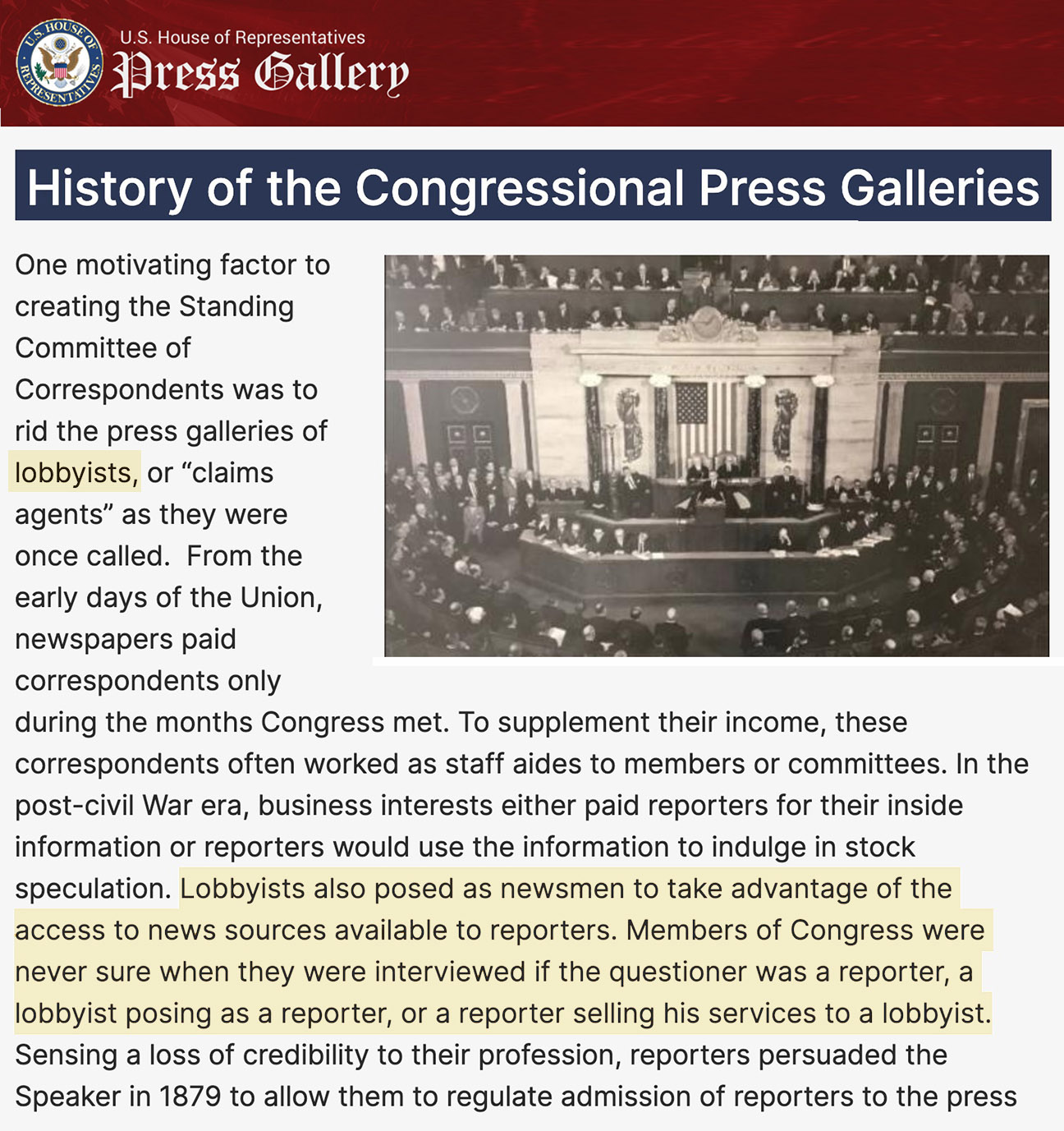
US House Press Gallery 2024 - Lobbyists Posing as Reporters
Text: One motivating factor to creating the Standing Committee of Correspondents was to rid the press galleries of lobbyists, or “claims agents” as they were once called. From the early days of the Union, newspapers paid correspondents only during the months Congress met. To supplement their income, these correspondents often worked as staff aides to members or committees. In the post-civil War era, business interests either paid reporters for their inside information or reporters would use the information to indulge in stock speculation. Lobbyists also posed as newsmen to take advantage of the access to news sources available to reporters. Members of Congress were never sure when they were interviewed if the questioner was a reporter, a lobbyist posing as a reporter, or a reporter selling his services to a lobbyist.

US House Press Gallery 2024 - Lobbyists Posing as Reporters
Public engagement and transparency may contribute to inferior regulatory outcomes as well as burdensome or ineffectual regulatory processes. Jennifer Nash & Daniel Walters 2015
Public Engagement and Transparency in Regulation
Yet, where there is so much information, others might argue that transparency is reduced, a result of information overload and noise...information overload implies that corruption and transparency can coexist.Albert Breton 2007
The Economics of Transparency in Politics
I think one of the most tragic things that has happened since I have been in Washington was making all the conferences open to us lobbyists.Lobbyist Carter Manasco 1975
Congressional Hearings on Lobbying
President Joe Biden 2022 - Secret Ballot Voting in Congress
Biden announces his support of secret ballots in legislatures during his March 2022 State of the Union address. His comments come at 2:07:26 (two hours, seven minutes and 26 seconds into this stream). He says ‘I may be wrong, but my guess is, if we took a secret ballot in this floor, that we’d all agree that the present tax system ain’t fair. We have to fix it.’ It is worth noting that Biden was a member of Congress in 1986 when Congress decided to take the tax legislation behind closed doors in order to close loopholes and prevent the arm-twisting of members by powerful groups.
President Joe Biden 2022 - Secret Ballot Voting in Congress
Sometimes we don’t want to take a recorded vote when there are a lot of lobbyists out there.Anonymous Member of Ways and Means Committee 1984
The New Ways and Means
Freedom of debate is best guaranteed by secrecy.Josh Chafetz 2007
Democracy's Priveleged Few
Open meeting laws, which choke off all means of communication on the subject of political issues, pose a threat to free discussion and are contrary to basic First Amendment principles.Christopher J. Diehl 2010
Open Meetings and Closed Mouths
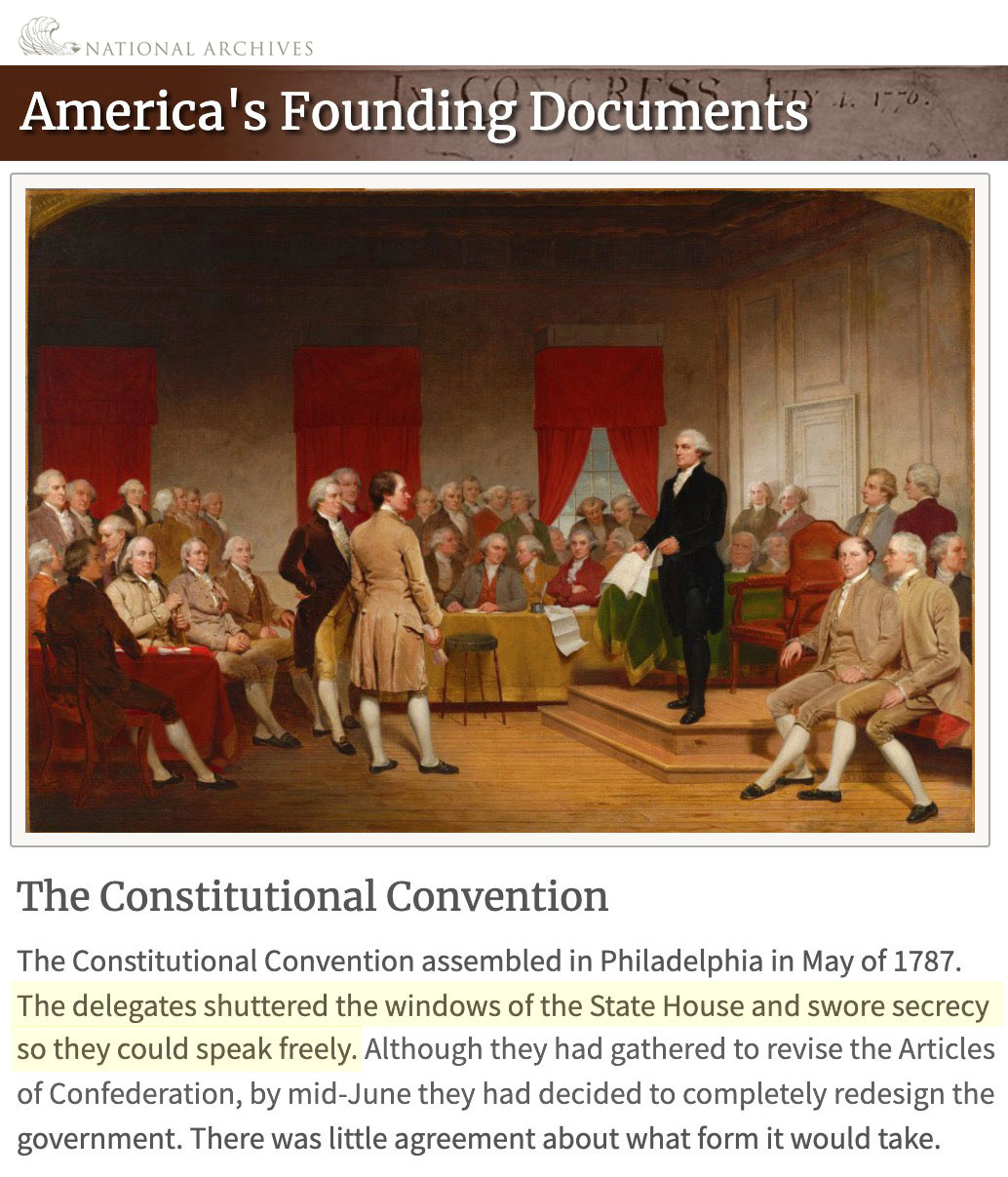
National Archives 2021 - Secrecy of Constitutional Convention

National Archives 2021 - Secrecy of Constitutional Convention
The push for more transparency is often advocated by lobbyists themselves.Harry Cooper 2017
Politico
The evidence suggests it doesn’t help to make earmarks more transparent. In fact, transparency may only encourage representatives to parade the local pork they are bringing into their districts, thereby boosting wasteful spending.Tyler Cowen 2018
Congress Needs to Bring Back Earmarks
Our analysis also suggests that by making fundraising easily observable, Federal Election Commission regulations may encourage candidates to overinvest time and resources accumulating large war chests instead of governing.David Epstein and Peter Zemsky 1995
Money Talks - Deterring Quality Challengers in Congressional Elections
A series of three meetings was called to acquaint lobbyists with the reform bill and the proposed floor amendments. The theory was that many lobby groups would profit from open sessions and votes. Not all the groups were interested, but a few were. “We got a big lobby effort going,” Conlon said. “But it is what you would call a ʻpublic interest lobby.ʼ They understand that this bill, with our revisions, is really going to revolutionize this place.” Actually, most of the help came from such liberal and labor organizations as the AFL-CIO , the National Education Association (NEA), Americans for Democratic Action, the National Committee for an Effective Congress, the National Farmers Union , and the Anti-Defamation League of Bʼnai Bʼrith. On July 10 AFL-CIO Legislative Director (and former representative) Andrew J. Biemiller wrote a letter to legislators saying that “the AFL-CIO urges you to be present on the floor when H.R. 17654 is before the House...” Letters on behalf of the antisecrecy provisions also went out from the National Farmers Union and the NEA.Bibby & Davidson 1972
On Capitol HillNote: It is hard to imagine a bigger smoking gun than this. They knew special interests would benefit from transparency and it was easy to convince the lobbyists and interest groups of this, as they readily hopped on board. Trouble was, their ties were only on the left. They failed to see - in this highly liberal environment - that special interests on the right would benefit just as readily. This is the beginning of capture, and it was well understood that this would be the result.
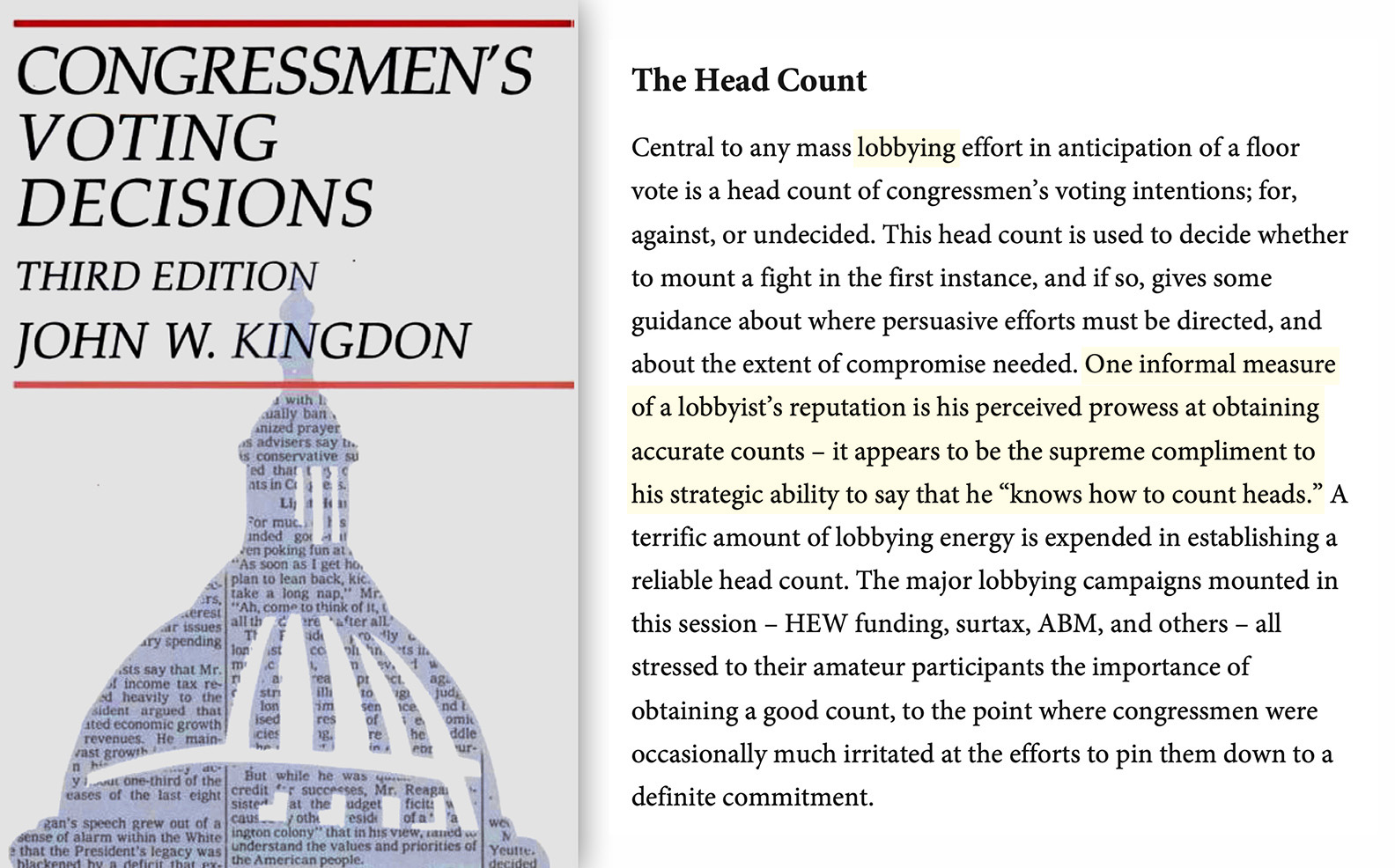
John Kingdon 1989 - Congressman’s Voting Decisions
Text: Central to any mass lobbying effort in anticipation of a floor vote is a head count of congressmen’s voting intentions; for, against, or undecided. This head count is used to decide whether to mount a fight in the first instance, and if so, gives some guidance about where persuasive efforts mus¬t be directed, and about the extent of compromise needed. One informal measure of a lobbyist’s reputation is his perceived prowess at obtaining accurate counts – it appears to be the supreme compliment to his strategic ability to say that he “knows how to count heads.” A terrific amount of lobbying energy is expended in establishing a reliable head count. The major lobbying campaigns mounted in this session – HEW funding, surtax, ABM, and others – all stressed to their amateur participants the importance of obtaining a good count, to the point where congressmen were occasionally much irritated at the efforts to pin them down to a definite commitment.

John Kingdon 1989 - Congressman’s Voting Decisions
Permitting open or easy access to legislators’ internal memoranda, legislative correspondence, recollections of caucus deliberations, and the like could quickly become a goldmine for disgruntled lobbyists and interest groups, as well as for political opponents.Steven F. Huefner 2003
The Neglected Value of the Legislative Privilege in State Legislatures
At first, lobbyists had no work to do on the legislation, since it was crafted by a task force in closed-door meetings… But they sprung into action after the proposal was released.Tory Newmyer 2005
Health Care Reform, 1994
Manchin never heard from lobbies or [foreign] governments about the controversial part of the law because his team drafted it in secret. No one, save for senior Democrats in the Senate, knew they were drafting the measure. Once it came to light, and proved the saving grace for President Joe Biden’s climate agenda, the legislative process moved so quickly that no one had time to react.Alexander Ward and Susanne Lynch 2023
Manchin faces Europe’s wrath (Environment)
Frontline 2020 - Intimidation of Federal Witnesses
PBS Frontline report suggests that Amazon intimidates potential witnesses in public antitrust hearings. Confirmed witnesses are terrified of speaking publicly. At the same time Amazon is one of the nation’s biggest lobbyists, and through Jeff Bezos’ purchase of the Washington Post, also one of the biggest proponents of transparency. Immediately after purchsing the paper, they added the ubiquitous tagline “Democracy Dies in the Darkness.”
Frontline 2020 - Intimidation of Federal Witnesses
Transparency imposes a temporality on political communication that makes slow, long-term planning impossible.Byung-Chul Han 2012
The Transparency Society
Lobbyists may see how a targeted congressman really votes, prompting the member to justify his or her vote out loud and at length… ‘Legislating can be kind of difficult’ says Chairman Dan Rostenkowski. And as every Hill person knows, it gets no easier with reporters and lobbyists watching.Ronald Elving 1993
Shade Settles Over Sunshine Ideals
While the people are entitled to the fullest disclosure possible, this right, like freedom of speech or press, is not absolute or without limitations. Disclosure must always be consistent with the national security and the public interest.US Attorney General William P. Rogers 1958
The Papers of the Executive Branch
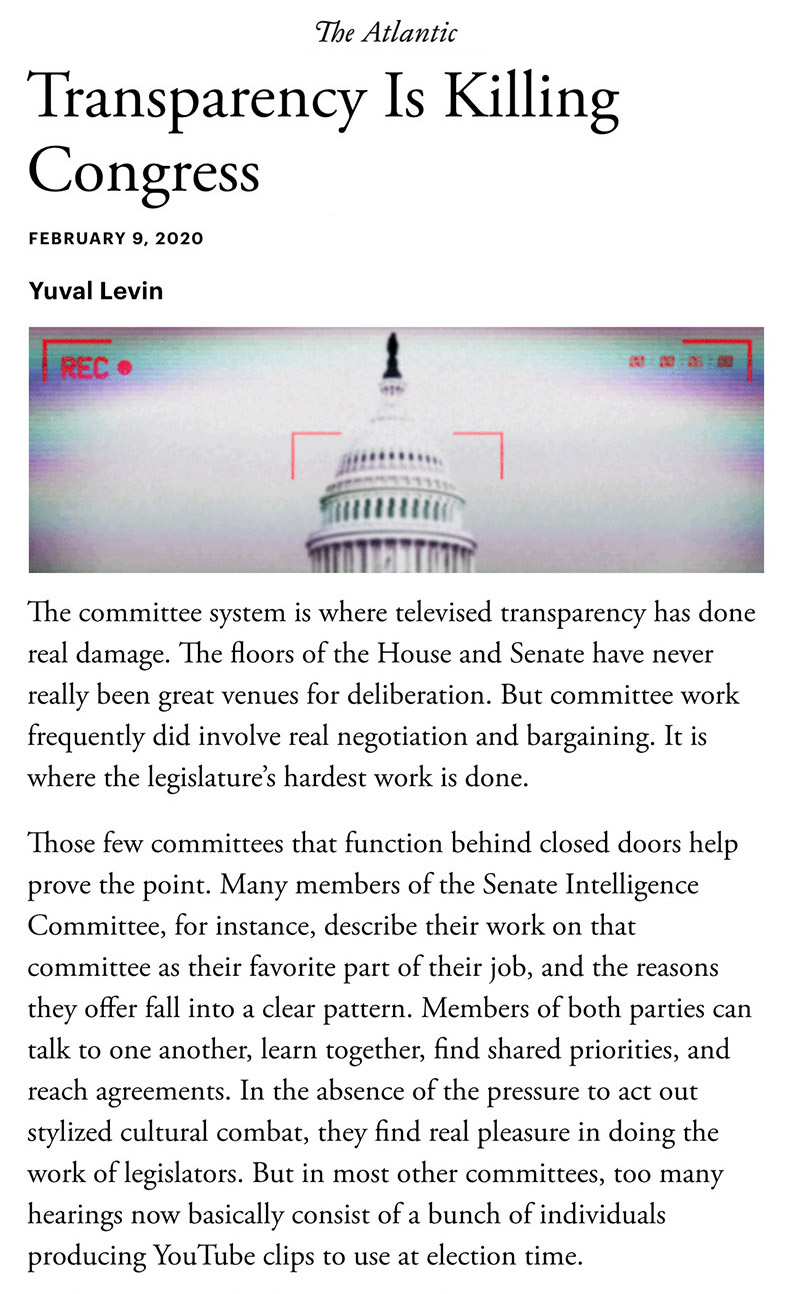
Yuval Levin 2020 - Transparency is Killing Congress
The committee system is where televised transparency has done real damage. The floors of the House and Senate have never really been great venues for deliberation. But committee work frequently did involve real negotiation and bargaining. It is where the legislature’s hardest work is done. Those few committees that function behind closed doors help prove the point. Many members of the Senate Intelligence Committee, for instance, describe their work on that committee as their favorite part of their job, and the reasons they offer fall into a clear pattern. Members of both parties can talk to one another, learn together, find shared priorities, and reach agreements. In the absence of the pressure to act out stylized cultural combat, they find real pleasure in doing the work of legislators. But in most other committees, too many hearings now basically consist of a bunch of individuals producing YouTube clips to use at election time.

Yuval Levin 2020 - Transparency is Killing Congress
The fact that committee meetings are now held in the open – a reform that was adopted in the mid-seventies – has strengthened the lobbyists’ hand and reduced the legislators’ ability to legislate.Elizabeth Drew 1983
Politics and money: the new road to corruption
The powerless will always be prevailed upon by the powerful; only secrecy can protect them from bribery and bullying.Jill Lepore 2008
Rock, Paper, Scissors
I have shown that legislators often vote one way when their actions are hidden and another way when the same actions are recorded for posterity.Douglas Arnold 2002 (Princeton)
The Press and Political Accountability
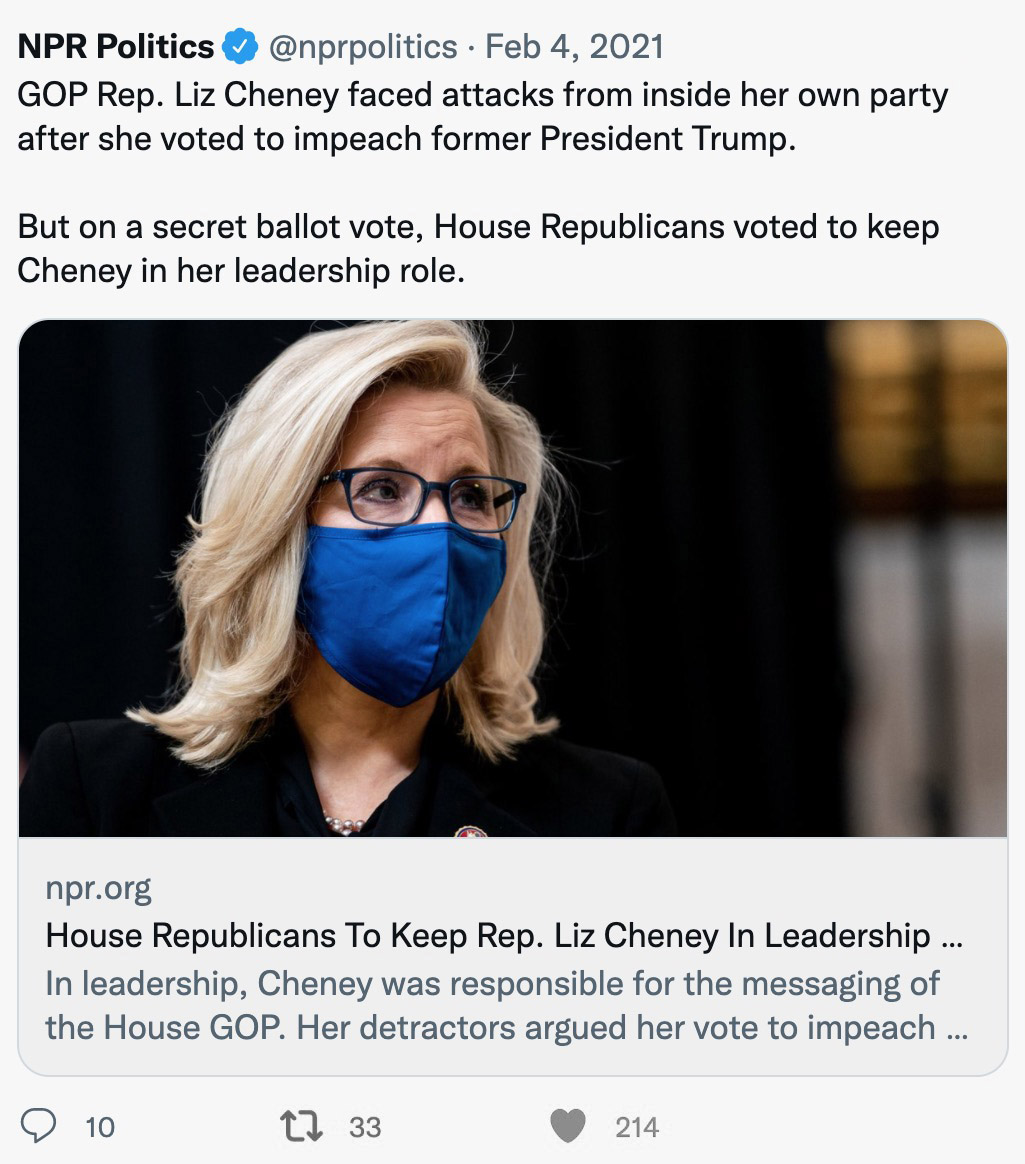
Despite attacks on President Trump, Liz Cheney retains GOP leadership role only via secret ballot of Republicans - 2021

Despite attacks on President Trump, Liz Cheney retains GOP leadership role only via secret ballot of Republicans - 2021
But, neither is there any support in congressional action for the populist view that if people only knew, if procedure was only democratized and opened up, everything would come right. On the contrary, there are abundant signs that the reform mood can play into the hands of unprincipled demagogues. The House could go on a stampede any day for such dubious propositions as a tax cut or a ban on busing.Joseph Kraft 1971
Reform Mood In Congress
There never was any legislative assembly without a discretionary power of concealing important transactions, the publication of which might be detrimental to the community.James Madison 1787
Debates in Convention
The idea was to make the process more ‘democratic’, but in practice sunshine measures intensified the access of lobbyists.James L. Payne 1991
Culture of Spending
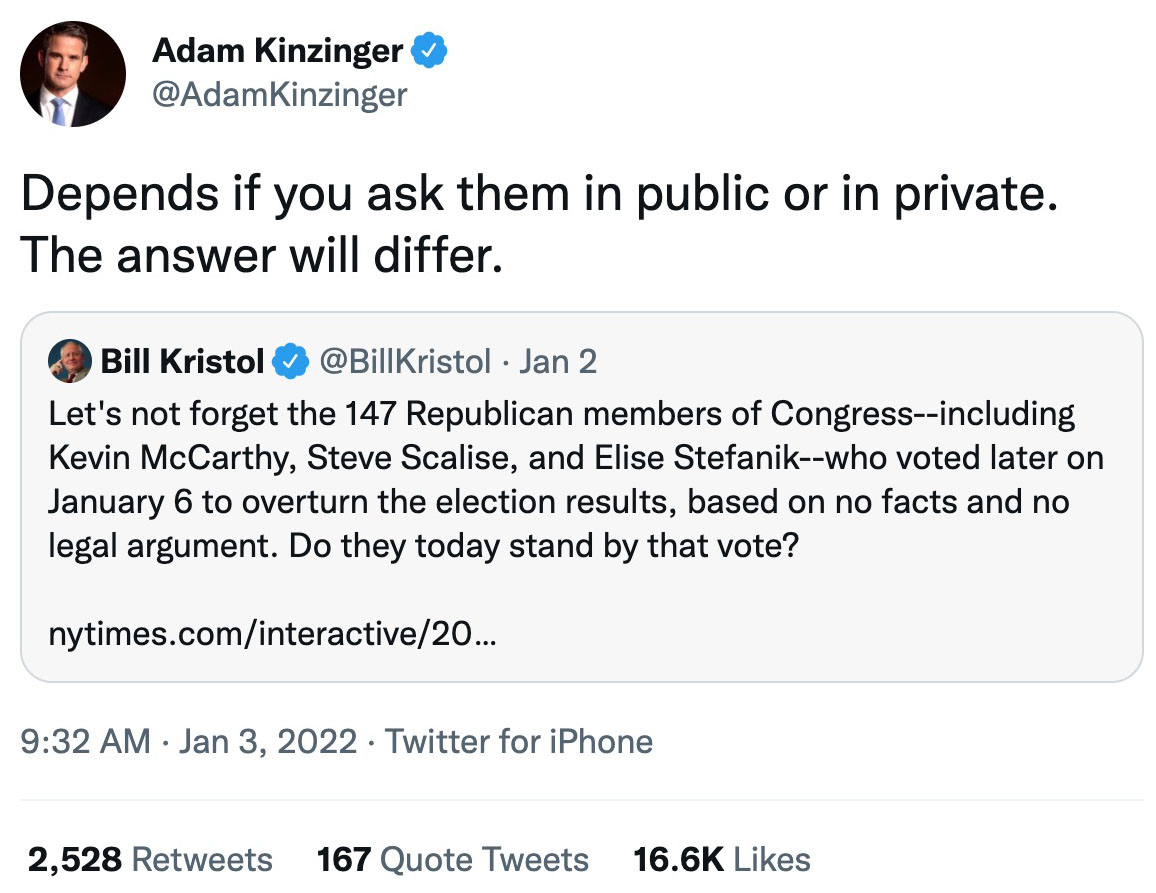
Rep Adam Kinzinger 2022 - Twitter

Rep Adam Kinzinger 2022 - Twitter
When the TV cameras are trained on them, most congressional Republicans express their complete support for Trump’s agenda. But when only C-SPAN is left recording, the same lawmakers are continuing to churn out bills expanding — in small ways — programs that Trump is trying to end fully.Gabe Fleisher 2025
How Congress Breaks with Trump in Quiet Ways
The enactment of the ‘sunshine’ laws, which had opened up committee legislative drafting sessions to the public in order to dilute the power of business lobbyists, had precisely the opposite effect. They enabled business lobbyists to monitor the votes of each elected official more closely.David Vogel 1989
The Political Power of Business
Some former sticklers for sunshine agreed with members who said bills were better when drafted away from lobbyists’ watchful eyes. Conversely, as some of these lobbyists sensed a slippage of their influence over the bill-writing process, they became the 1980s’ proponents of sunshine in Congress.Jaqueline Calmes 1987
Congressional Quarterly – Fading Sunshine Reforms
The history of US diplomacy has shown that secrecy often is essential for successGraham Allison 2018
The Case for Secret Diplomacy
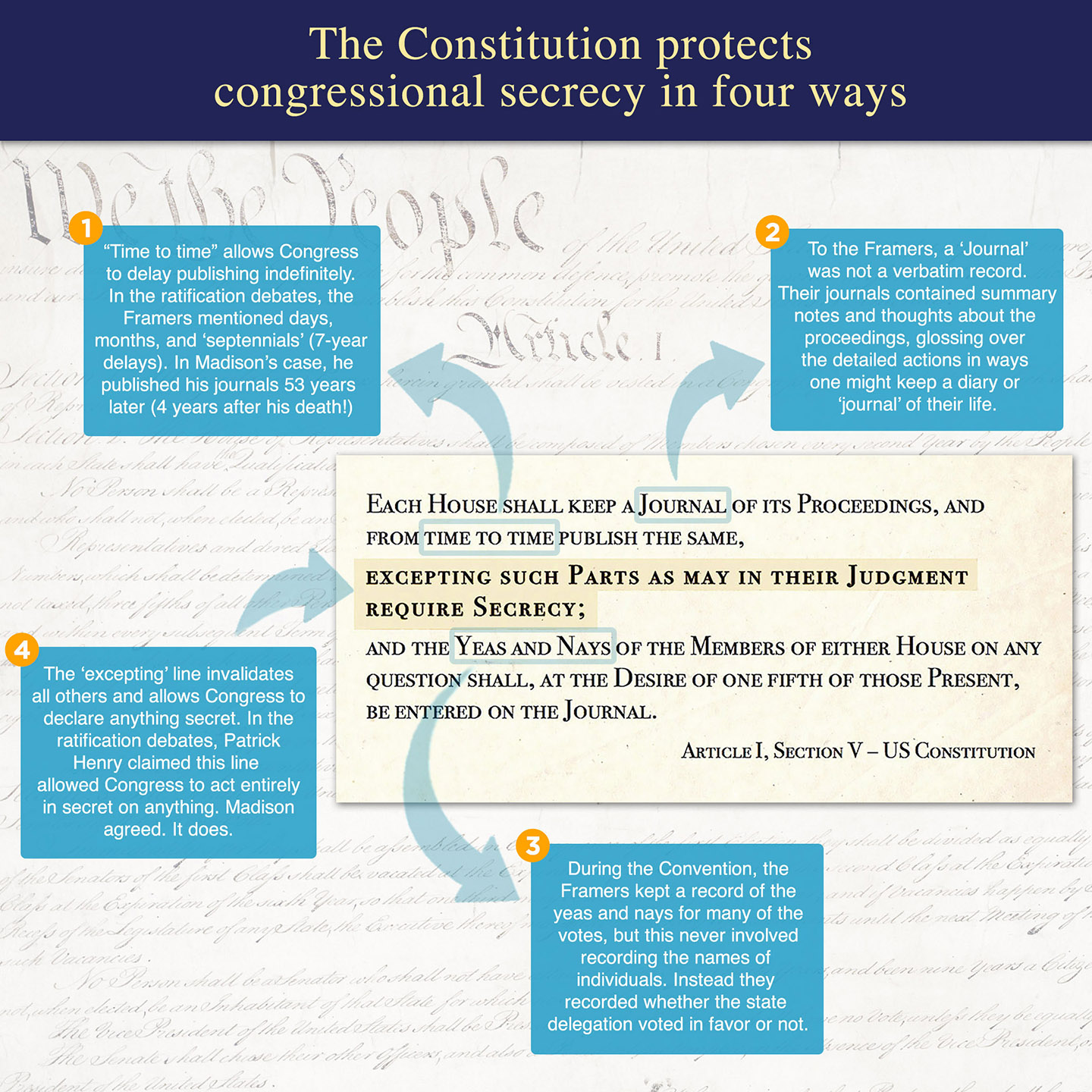
The US Constitution endorses Secrecy - Article I, Section V, Clause III
“Evil geniuses of darkness!” In 1787, while in session at the Constitutional Convention, hecklers railed into the Framers for their decision to draft the Constitution in abject secrecy - a closed-door process that took four months. But these jeers did not prevent the Framers from adding the ‘Secrecy Clause’ to the wording on the legislative branch. Article 1 Section 5 Clause 3 insures unlimited secrecy to Congress alone. Article II and Article III (executive and judicial branches) contain nothing with respect to ‘discretion’ or secrecy. And while lines 1 and 3 of the secrecy clause appear to lean on the side of transparency, line 2 (highlighted above) is the dominant line. Line 2 provides an unlimited exception to keeping and publishing the journal. This results in a clause that isn’t just wildly permissive of secrecy, but one that provides for as much secrecy as Congress may seek - be it secret ballots, executive sessions, closed door hearings, Committee of the Whole, etc. There are numerous pundits who get this wrong. Beginning with Supreme Court justice Joseph Story in the early 1800s, there has been an array of insiders suggesting that these lines instead require Congress to act transparently. Article 1 Section 5 Clause 3 is, as they argue, a requirement for both recording votes and publishing them. But these ‘transparency’ pundits generally have one thing in common: they provide their commentary on this clause as part of a larger commentary of the entire constitution. This is not an easy task. And these works (including Story’s and recently a video series by current Senator Mike Lee) usually requires volumes or hours of attention, as specific aspects of the Constitution (the Bill of Rights in particular) have generated thousands of pages of legal argumentation and interpretation. As such, these generalists often make quicker/glancing interpretations of the clauses that have received lesser attention in the courts and the press. The Secrecy Clause is one such under-the-radar clause. And nowhere in their commentaries do they tackle the clear exception to transparency provided by line 2. Further, even without the second line, the secrecy clause might still be seen as embracing secrecy. This is because there are two important and sometimes befuddling exceptions to transparency in lines 1 and 3. In line one, the Journal must be published from ‘time to time.’ Well, what does this mean? In the ratification debates, ‘time to time’ was understood as not just intentionally vague but also a way to delay publishing by septennials (7-years) or more. The wording ‘time to time’ is also a noted switch from what appeared in the Articles of Confederation, which required a ‘monthly’ publication. And Madison famously published his journals of the Convention posthumously, 53 years after the Convention. Clearly, he embraced long delays. In line three there is another befuddling clause. Line 3 requires that the ‘yeas and nays’ be entered in the Journal if requested by 1/5th of those attending. But what do the ‘yeas and nays’ mean? In the Framers’ time, it often required just a simple accounting of the vote totals – one total for those who for the provision and one total for those who voted against. Other times, the ‘yeas and nays’ meant a recording of the various delegates’ names with their individual votes attached. But the Constitution provides some clarity in a manner which sides on this notion of the simple printing of vote totals. This is because later in Article 1, Section 7, Clause 2 the Constitution again calls for the ‘yeas and nays’ and then states “and the names of the persons voting for and against the bill shall be entered on the journal.” This means that if the ‘yeas and nays’ were intended to be an individual recording of each member’s votes, this clause would have an odd redundancy that didn't appear earlier in Section 5. So even without line 2, the Secrecy Clause may be interpreted as providing for a broad amount of secrecy - publishing delays of up to fifty years and a Journal in which only vote totals are published. But these last two arguments are just that - arguments. As we cannot know the intentions of the Framers, we will have to accept that the ambiguity of lines 1 and 3 could easily be interpreted as an embrace of transparency. Line 2, however, doesn’t have the same amount of wiggle room. The exception it provides to all aspects of transparency is clear and strong. Hence the Secrecy Clause of the Constitution is just that, a guaranteed right to congressional secrecy. Even in the Ratification Debates of 1788, it was treated this way, when Patrick Henry railed against the unlimited secrecy this clause provided. The Journal Clause is the Secrecy Clause.

The US Constitution endorses Secrecy - Article I, Section V, Clause III
Members can make a decision they would not otherwise make with the lobbyists peering at them...Rep. Don Pease 1984
Privacy Called Spur to Tax Bill (NY Times)
Sunshine laws kid the public… legislative compromises and accommodations must also be provided for, and these require privacy [secrecy]. “If we have to meet in our wives’ boudoirs – if they still have such things – we will.”Richard Bolling (D.Mo) 1976
Reform Penetrates Conference Committees
Congressional reforms, particularly the Legislative Reorganization Act of 1970, reduced the power of committee chairs and opened Washington to a barrage of interest group activists, lobbyists, and campaign funders.Benjamin C. Waterhouse 2014
Lobbying America
Clarity and publicity kill… Officials who need to fear that their internal deliberations will be made public are less positioned to make effective public policy.Jerry Z. Muller 2018
The Tyranny of Metrics
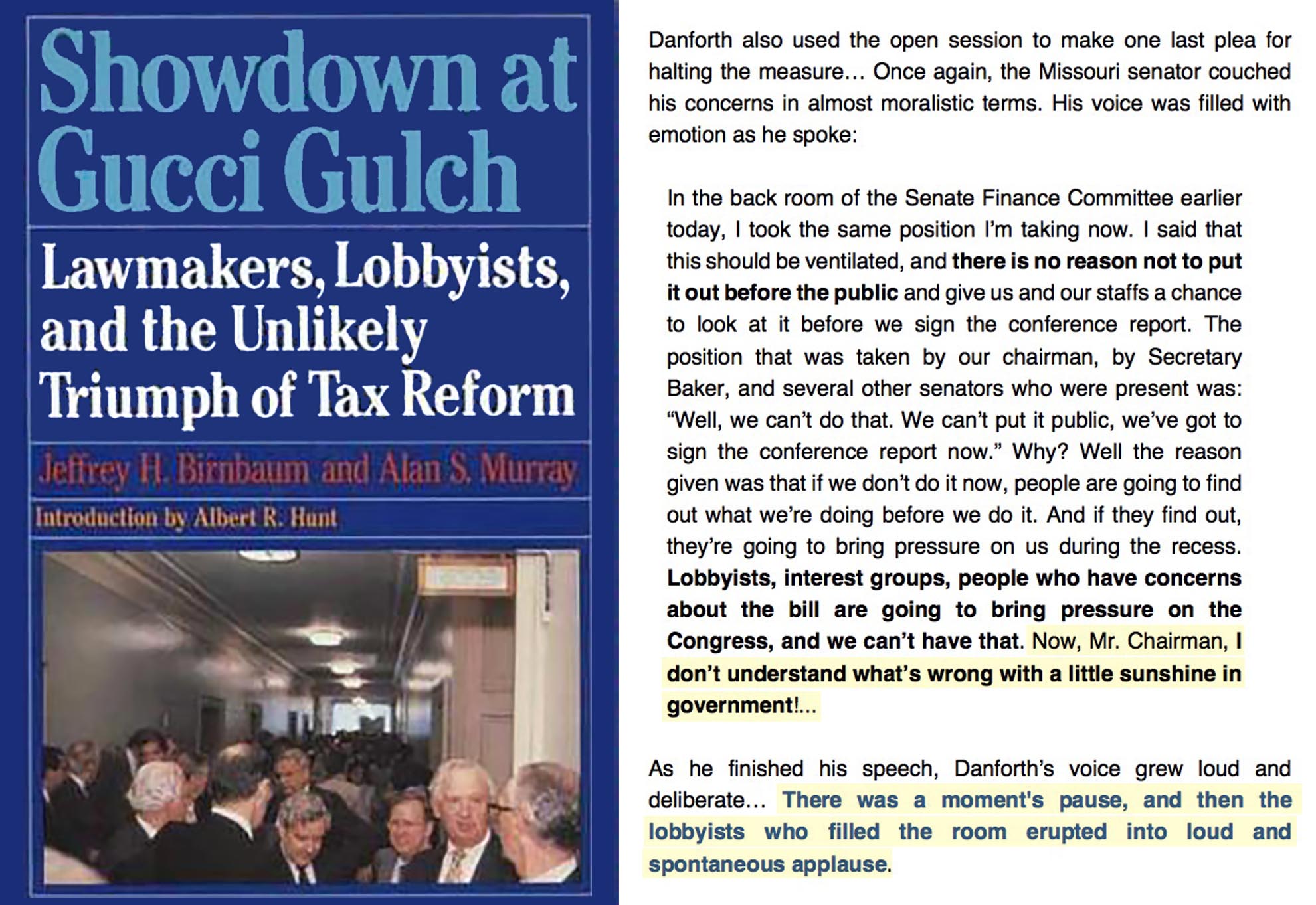
Jeffrey Birnbaum 1988 - Showdown at Gucci Gulch
Lobbyists applauding sunshine speech by Senator John Danforth

Jeffrey Birnbaum 1988 - Showdown at Gucci Gulch
Lobbyists applauding sunshine speech by Senator John Danforth
Since the Sunshine Rule, markup sessions are very popular events in the legislative process… Cueing up for a markup, and sweating the markup line is part of the lobbyist’s job. John Zorack 1990 (Lobbyist)
The Lobbying Handbook
In the 1970s, we junior members argued strongly for openness, as did the media. But we discovered that people posture and abandon the responsibility of legislating.Rep. Philip Sharp 1990
American Government and Politics
Intrigue and cabal are thus deprived of some of their main resources, by plotting and devising measures in secrecy...Mr. Justice Blackstone seems, indeed, to suppose, that votes openly and publicly given are more liable to intrigue and combination (corruption), than those given privately and by ballot.Joseph Story 1833 (Supreme Court)
Commentaries on the Constitution
For any speech or debate in either house, [members of the House and Senate] shall not be questioned in any other place.US Constitution 1789
Speech or Debate Clause - Article I Section VI
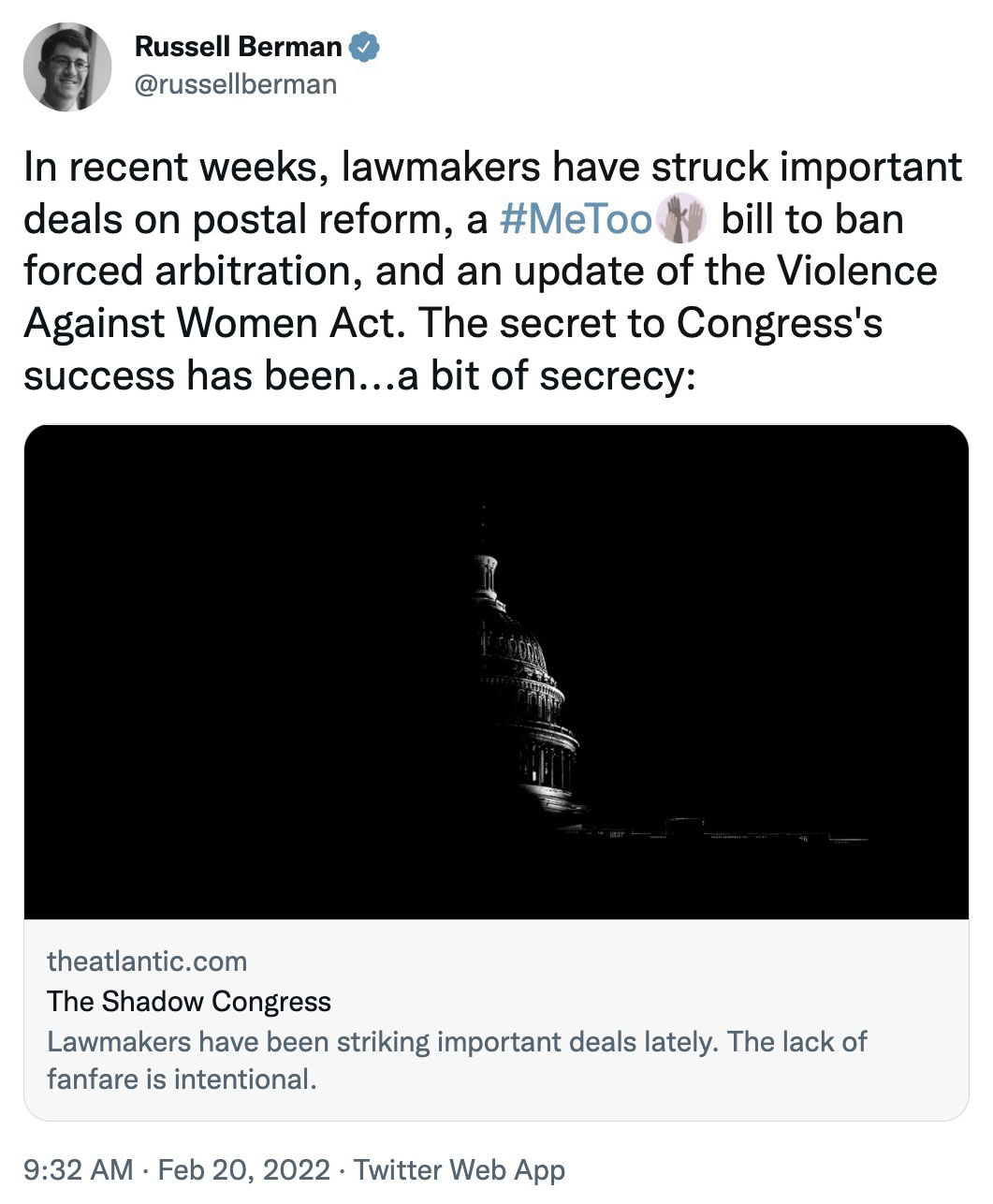
Russell Berman 2022 - Atlantic Magazine

Russell Berman 2022 - Atlantic Magazine
Voters and interest groups can monitor recorded votes much more easily than other types of legislative behavior. Consequently, the extent to which voters and interest groups can hold individual legislators to account depends on the use of roll-call procedures.Clifford Carrubba, Matthew Gabel & Simon Hug 2008
Legislative Voting Behavior, Seen and Unseen: A Theory of Roll-Call Vote Selection
Full transparecny of politicans’ actions does not increase the quality of political representation.David Stadelmann, Marco Portmann and Reiner Eichenberger 2014
Transparency Does Not Increase the Quality of Political Representation
Empirical results indicate that making it easier to identify individual votes and actions of politicians does not necessarily improve the quality of representation in terms of aligning political decisions and voter preferences more closely.David Stadelmann, Marco Portmann and Reiner Eichenberger 2014
Transparency Does Not Increase the Quality of Political Representation
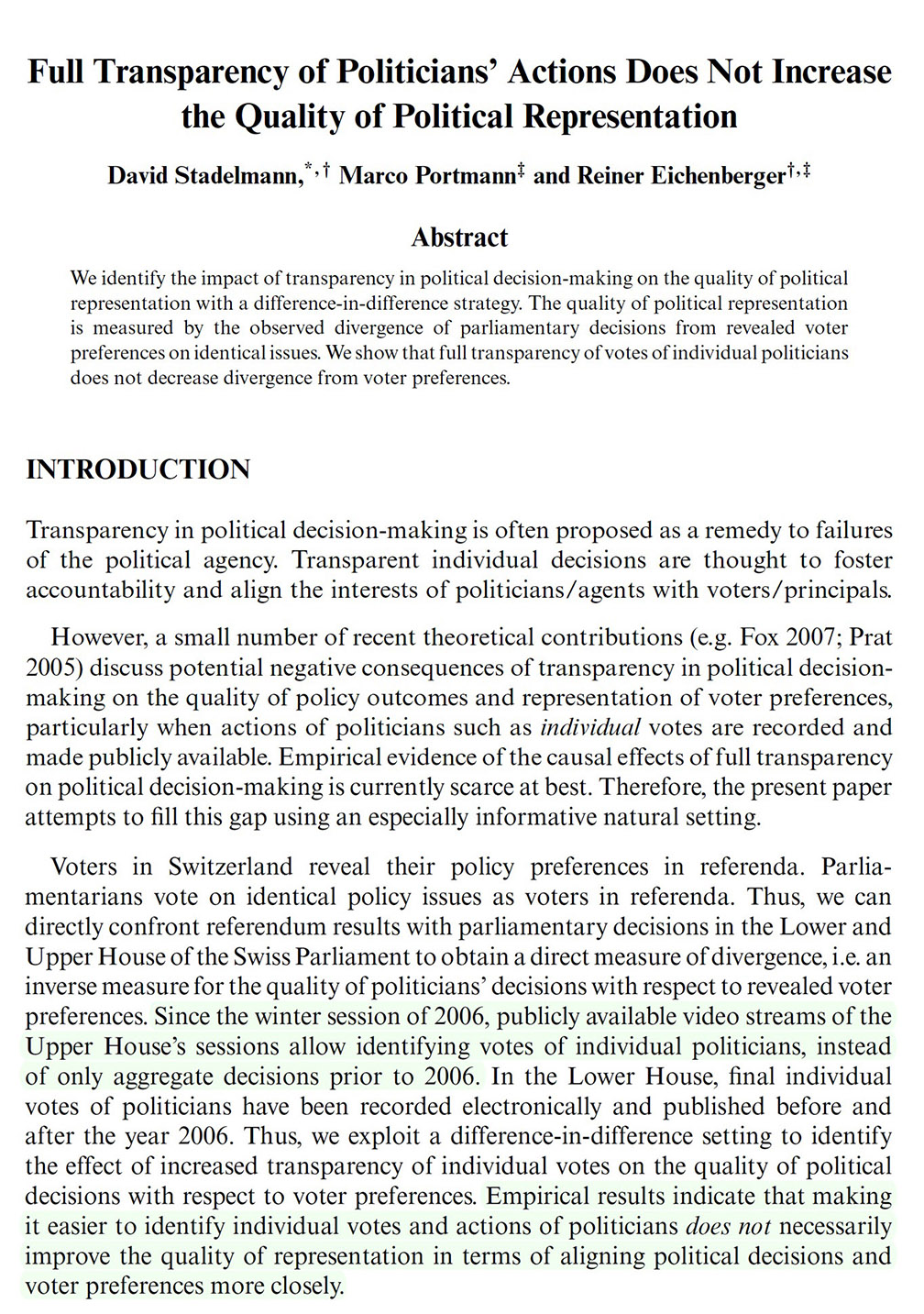
David Stadelmann, Marco Portmann and Reiner Eichenberger 2014 - Transparency Does Not Increase the Quality of Political Representation

David Stadelmann, Marco Portmann and Reiner Eichenberger 2014 - Transparency Does Not Increase the Quality of Political Representation
The leading Republican members should come to an understanding, close the doors, and determine not to separate till the vote is carried and all the secrecy you can enjoin should be aimed at until the measure is executed.Thomas Jefferson 1811
Letter to John Wayles Eppes
A dogmatic approach toward transparency may ultimately prove counterproductive to the reform cause if seemingly public opportunities serve the interests of the few more often than the majority.Bruce Cain 2014
The Transparency Paradox
With the trend toward “government in the sunshine” the number of closed committee hearings has dropped substantially – from 35 percent of all hearings in 1960 to seven percent in 1975. This serves the public’s right to know but also increases the amount of time congressmen spend posturing for public consumption instead of saying what they think, which is practical only in closed hearings.Gregg Easterbrook 1984
What’s Wrong With Congress
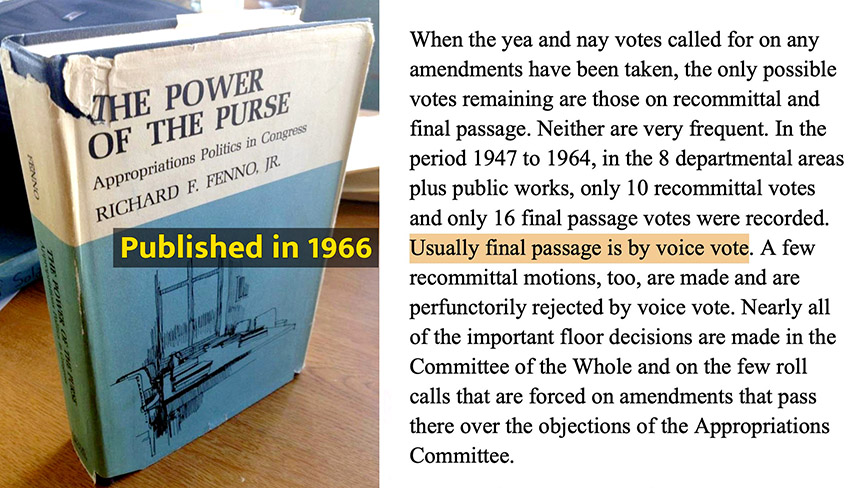
Richard Fenno 1966 - Power of the Purse (Appropriations Politics in Congress)
Text: When the yea and nay votes called for on any amendments have been taken, the only possible votes remaining are those on recommittal and final passage. Neither are very frequent. In the period 1947 to 1964, in the 8 departmental areas plus public works, only 10 recommittal votes and only 16 final passage votes were recorded. Usually final passage is by voice vote. A few recommittal motions, too, are made and are perfunctorily rejected by voice vote. Nearly all of the important floor decisions are made in the Committee of the Whole and on the few roll calls that are forced on amendments that pass there over the objections of the Appropriations Committee. (Published in 1966 before the Legislative Reorganization Act of 1970 took effect - Wilbur Mills Ways and Means)

Richard Fenno 1966 - Power of the Purse (Appropriations Politics in Congress)
“The average American does not come down to these meetings,” Mr. Conable added. “It’s the lobbyist,” he said, who in an open session can pinpoint the committee members whose position they want to change. “During any break, they have to be physically restrained from contacting us,” he said, “and we sit there and watch them wince as we violate our alleged deals with them.”
“So, as with the tax-shelter legislation we passed, good legislation is produced by the closed meeting,” he added. He also said he did not think the move to increase by a third the tax on liquor would have been approved in the open “because the distilled-spirit people would have been out there jumping up and down and sending us messages.”Jonathan Fuerbringer 1984
Privacy Called Spur to Tax Bill (NY Times)
A requirement that public officials deliberate matters among themselves in open meetings makes it difficult and unwieldy for officials to discuss issues among themselves, but easy to discuss them with non-public officials such as lobbyists and other special interests, which in turn can elevate the influence of those who have access to legislators as a result of their wealth, status, or political connections.John F. O’Connor & Michael J. Baratz 2004
Some Assembly Required: The application of state open meeting laws to email correspondence.
Legislative openness may enable special interest groups to orchestrate for themselves narrow legislative deals not in the public interest.Steven F. Huefner 2003
The Neglected Value of the Legislative Privilege in State Legislatures
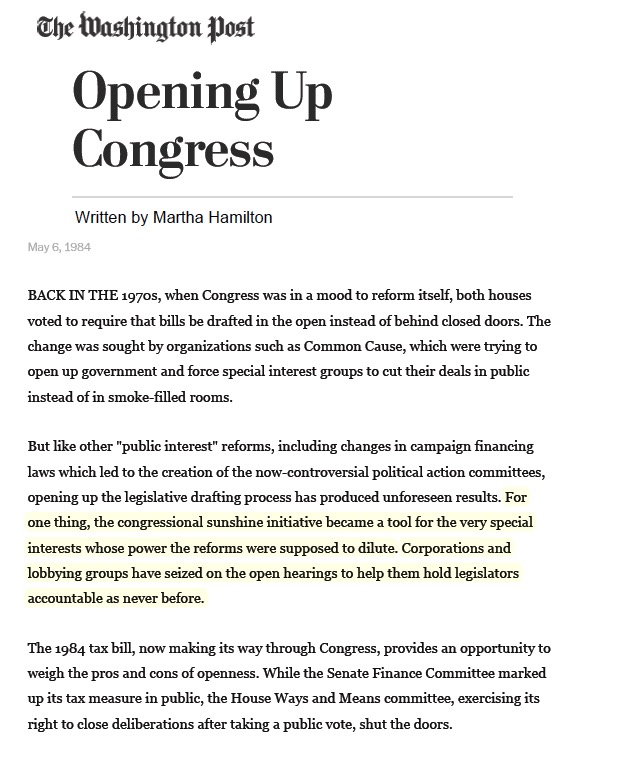
Martha Hamilton 1984 – Washington Post 1984 – Opening Up Congress (pdf)

Martha Hamilton 1984 – Washington Post 1984 – Opening Up Congress (pdf)
And therefore no great Popular Common-wealth was ever kept up; but either by a forraign Enemy that united them; or by the reputation of some one eminent Man amongst them; or by the secret Counsell of a few; or by the mutuall feare of equall factions; and not by the open Consultations of the Assembly.Thomas Hobbes 1641
Leviathan
Said one committee member, on the difficulty of writing tax legislation in public sessions: “You’re not going to solve problems in front of an audience” Randall Strahan 2011
The New Ways and Means
Still, members of the Finance Committee and its staff were worried last week about the problems of open sessions and lobbyists… Even before the committee adjourned Thursday, the lobbyists had been at work. Reports are that votes are already changed and the committee may reverse itself this week. Mr. Dole noted the open-session problem himself… he told an aide: “The lobbyists are like flies here.”Jonathan Fuerbringer 1984
Privacy Called Spur to Tax Bill (NY Times)
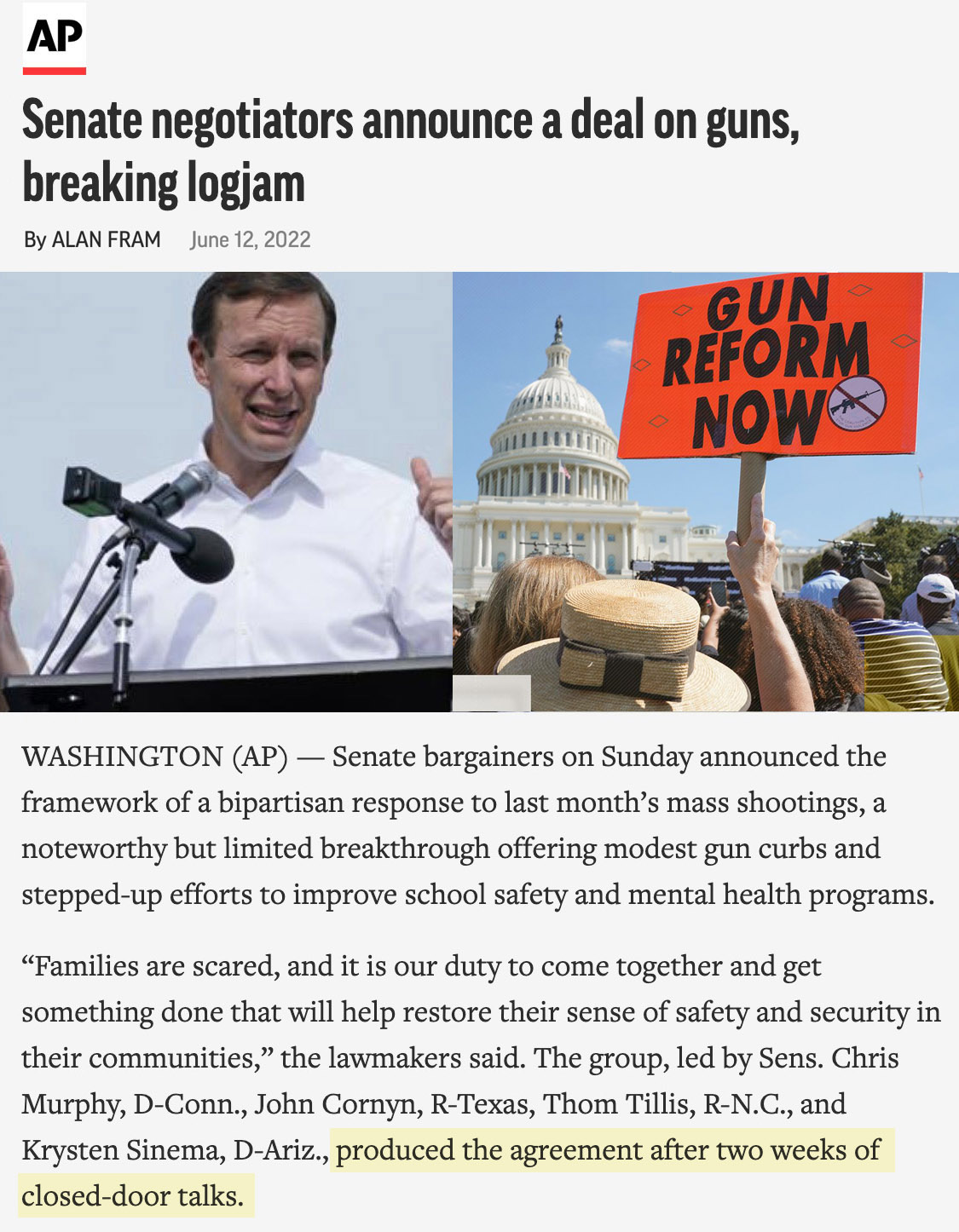
Alan Fram 2022 - Closed-door deal on gun control, breaks Senate logjam

Alan Fram 2022 - Closed-door deal on gun control, breaks Senate logjam
[In closed sessions] members are more candid and deal with the tougher issues without worrying about being sensitive to the various pressures on them. The lobbyists have less influence.John J. Salmon 1984
Privacy Called Spur to Tax Bill (NY Times)
By closing meetings where important decisions are taken by elected leaders (and others), or by making such situations nontransparent in other ways, leaders are freed of base incentives to pander and posture to those outside and are directed to pursue those policies that best effect the public interest.John Ferejohn 2015
Secret Votes and Secret Talks
The result of the closed meetings is that you get better legislation.John J. Salmon 1984
Ways and Means Committee: Behind Closed Doors (Dale Tate)
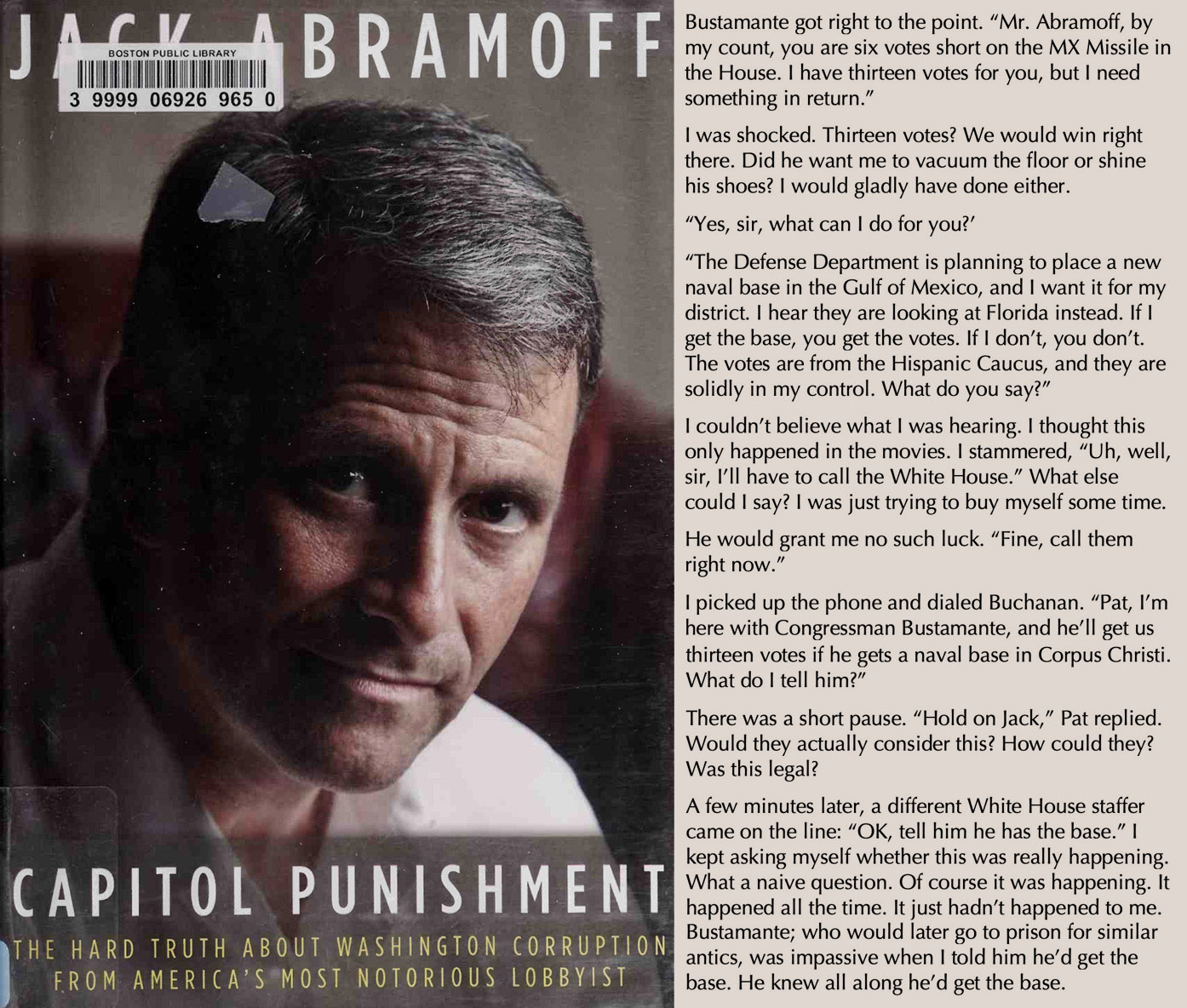
Lobbyist Jack Abramoff - On trading public votes 2011

Lobbyist Jack Abramoff - On trading public votes 2011
Closed door meetings afford more frank and candid discussions. Members are much more willing to feel free to say things they would never say in public - a particular problem they might have because of a constituent, for instance. And members are more likely to say, ‘Let me ask a dumb question.’John J. Salmon 1984 (Chief counsel of Ways and Means)
Ways and Means Committee: Behind Closed Doors (Dale Tate)
Committees should work more often in execu tive committee session; greater secrecy would improve the chances of free flowing debate and genuine consideration of alternatives.Daniel J. Palazzolo 2017
Return to Deliberation
I find that secrecy can 1) result in outcomes that are less likely to be sabotaged, 2) result in less socially inefficient use of resources by interest groups, and 3) shorten the bargaining process.Barbara Koremenos 2010
Open Covenants, Clandestinely Arrived At
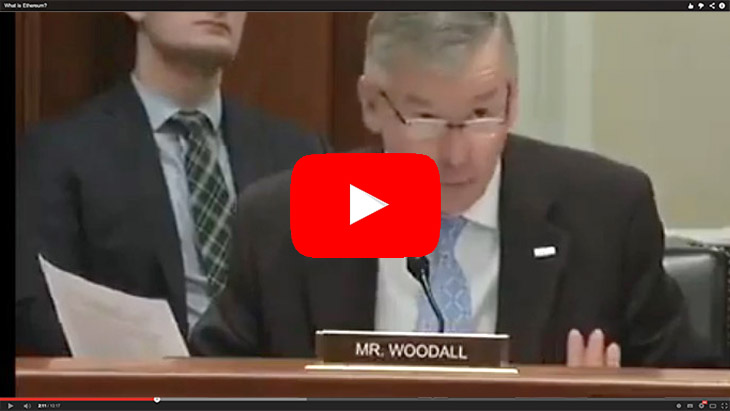
Rep Rob Woodall 2019 - House Modernization
On March 27, 2019, The Select Committee on the Modernization of Congress and the Modernization Committee of the GOP discussed the pitfalls of transparency during a hearing about congressional reforms. And at 1:05:06, Representative Rob Woodall appears to become the first member in the history of the US Congress to openly question the 1970s sunshine laws. He suggests that increased transparency might be at the root of a number of institutional problems with Congress. Here is Woodall’s statement:
“Well I thought that was interesting in Mr. Wolfensberger’s testimony, he said he’s got six things that make these reform efforts successful. By my count four of the six things were things too much transparency might threaten 1. private informal meetings are necessary 2. check your partisan guns at the at the door 3. soliciting views from other members who are not on the on the panel 4. flexibility and the ability to compromise. At some point you know the reason I can’t take pictures on the second floor of the Capitol is you never know who I might be talking to and I want the freedom to be able to talk to who I want to talk to. We don’t have that dynamic. Zoe [Representative Zoe Lofgren] said we’re not gonna roll back cameras on the floor. I’m sure that’s true. It might have been, who mentioned transparency, it was you Mr. strand. Are we at a point where we have so many other ways to communicate to get the word out that it would be okay to dial back on some degrees of transparency because we’re highlighting that transparency elsewhere?”
Unfortunately Woodall directs the question to Mark Strand who evades, immediately turning the conversation elsewhere. But Strand he was followed by Don Wolfensberger who takes up the question saying that transparency is “a double edged sword.”

Rep Rob Woodall 2019 - House Modernization
“Well I thought that was interesting in Mr. Wolfensberger’s testimony, he said he’s got six things that make these reform efforts successful. By my count four of the six things were things too much transparency might threaten 1. private informal meetings are necessary 2. check your partisan guns at the at the door 3. soliciting views from other members who are not on the on the panel 4. flexibility and the ability to compromise. At some point you know the reason I can’t take pictures on the second floor of the Capitol is you never know who I might be talking to and I want the freedom to be able to talk to who I want to talk to. We don’t have that dynamic. Zoe [Representative Zoe Lofgren] said we’re not gonna roll back cameras on the floor. I’m sure that’s true. It might have been, who mentioned transparency, it was you Mr. strand. Are we at a point where we have so many other ways to communicate to get the word out that it would be okay to dial back on some degrees of transparency because we’re highlighting that transparency elsewhere?”
Unfortunately Woodall directs the question to Mark Strand who evades, immediately turning the conversation elsewhere. But Strand he was followed by Don Wolfensberger who takes up the question saying that transparency is “a double edged sword.”
On Oct. 22, 2014 the Earth Institute hosted a panel discussion on the Origins of Environmental Law, featuring Leon Billings and Thomas Jorling, the two senior majority and minority staff members who led the Senate Subcommittee on Environmental Pollution which originated and developed the 1970s Clean Air Act, Clean Water Act, and other major environmental/climate legislation... Jorling discussed the importance of the closed markup session – in the 1970s, laws were written behind closed doors, resulting in a high degree of cooperation. Senators were free to ask questions and discuss issues openly without fear of scrutiny from others. This created a lawmaking process built on “understanding, education and learning that members actively engaged in.” Today, the open session process in lawmaking makes for better theater than an actual practice of understanding.Haley Martinez 2014
Writers of the Clean Air Act: Insight into the ‘Golden Age’ of Environmental Law
Our political institutions ought to largely operate under a veil of secrecy. By secrecy, I mean this: when representatives vote on bills (either on the legislature floor or in committee), they do so by the secret ballot.Brian Kogelmann 2021
Secret Government: The Pathologies of Publicity
It could be argued that transparent negotiations not only beget more social inefficiency, but also produce a collective action problem among the (special interest) groups themselves.Barbara Koremenos 2010
Open Covenants, Clandestinely Arrived At
I think if there were a secret vote in the Congress today, we would win.President Bill Clinton 1993
Teleconference Remarks on NAFTA to the United States Chamber of Commerce
“Sunshine” changes have left members visible and vulnerable to attentive publics, most often organized interests.Larry Rieselbach 1994
Encyclopedia of Policy Studies
Negotiating win-win deals requires secrecy.Sarah Binder 2017
McConnell’s Secretive Lawmaking
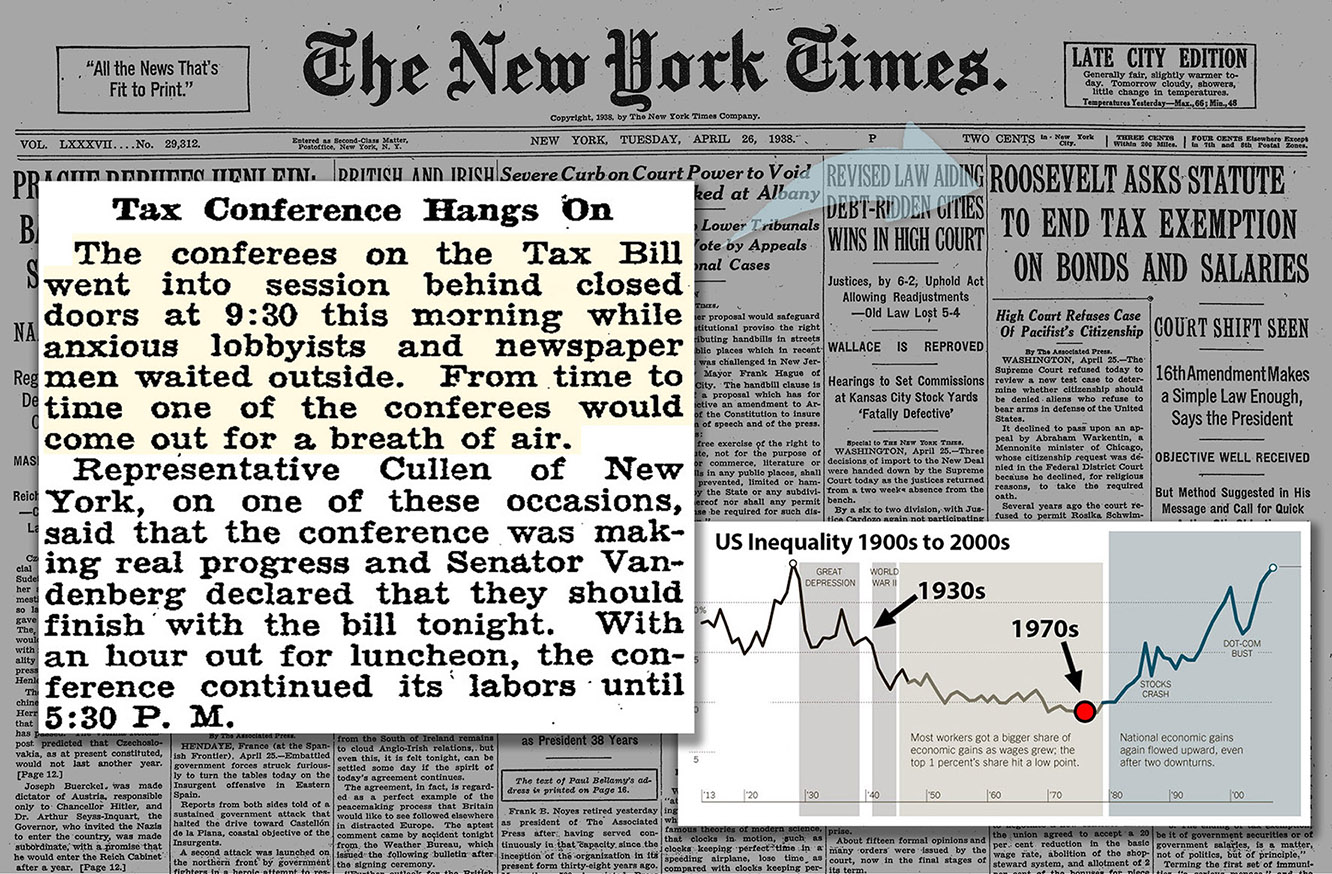
New York Times 1938 – Inequality Drops as Congress Writes Tax Laws in Secret
Text: The conferees on the Tax Bill went into session behind closed-doors at 9:30 this morning while anxious lobbyists and newspaper men waited outside. From time to time one of the conferees would come out for a breath of air. NOTE: Committees were pushed into the sunlight in 1970s with the Legislative Reorganization Act and other laws and inequality soared.

New York Times 1938 – Inequality Drops as Congress Writes Tax Laws in Secret
Transparency is a useful tool for lobbyists – it enables them to keep better track of their competitors, and to demand equal access for themselves.David Frum 2014
The Transparency Trap
The Freedom of Information Act is one of those laws that ties the hands of government officials and makes it impossible to get government work done.Donald Rumsfeld 1966
Is Our Government Too Open (FOIA)
But the secret ballot vote ensured total privacy for a group of senators, many of whom are unthreatened by reelection odds until 2028 or later, to side for or against (in this case against) Trump’s candidate.Ellie Quinlan Houghtaling 2024
Senate Republicans delivered a blow to Donald Trump
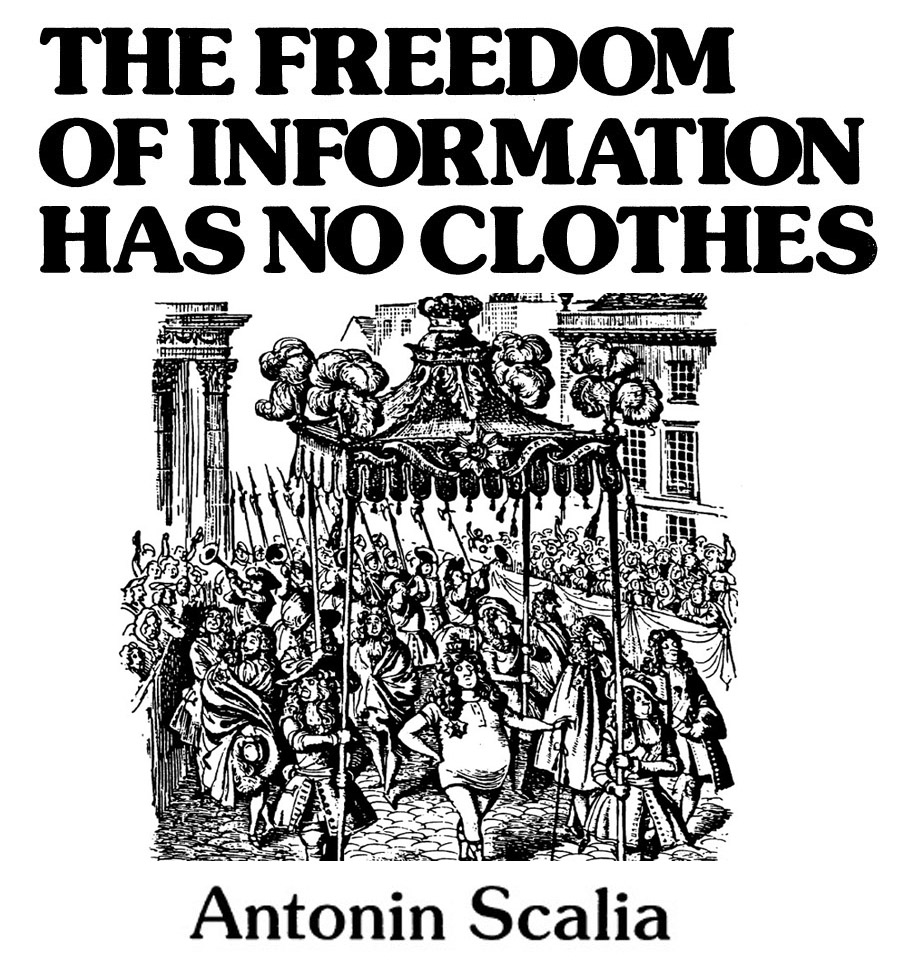
Anton Scalia 1982 – The Freedom Of Information Has No Clothes (FOIA, Executive)

Anton Scalia 1982 – The Freedom Of Information Has No Clothes (FOIA, Executive)
The adoption of open markup sessions, probably accounted most for exposing members to interest group pressures. Conversely, adopting closed sessions in 1983 seems to have reversed that trend.Sheldon D Pollack 1995
A New Dynamics of Tax Policy?
Thus, the downside of transparency is that it leads lawmakers – who always select appropriate policies behind closed doors – to do otherwise when policy is made in the open.Justin Fox 2006
Government Transparency and Policymaking
Senator Sue Crawford said one of the arguments that had been made was that secret ballots (in legislatures) encourage secret deals. “Actually, the opposite is true,” she said. “If you have a secret ballot, no one can enforce any deal, secret or not.”JoAnn Young 2015
Senators Vote to Keep Secret Ballots in Leadership
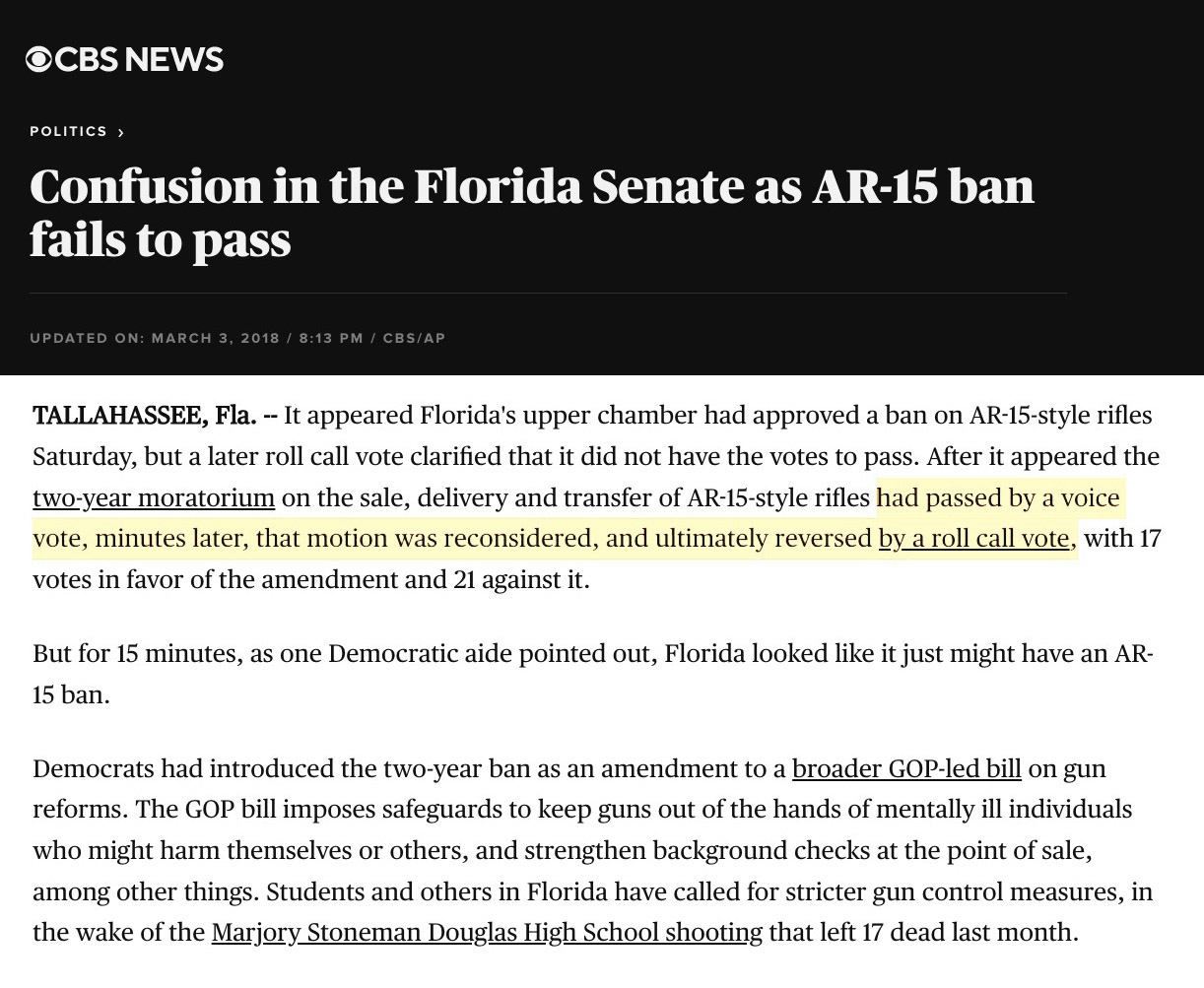
CBS 2018 - Florida Gun Control Passes on Secret Vote, Immediately Rescinded on Transparent Vote (NRA)

CBS 2018 - Florida Gun Control Passes on Secret Vote, Immediately Rescinded on Transparent Vote (NRA)
Everyone knows that laws which provide a secret ballot have deprived the aristocracy of all its influence.Cicero 50 BC
De Legibus
The Illusion of Accountability reveals the dark side of governing in the light: Organizing interests, not American voters, benefit from our commitments to legislative sunshine.Sarah Binder 2022
The Illusion of Accountability: Transparency and Representation in American Legislatures
C-SPAN allows me to more effectively play the inside-the-beltway game.Lobbyist Ford West interviewed by Stephen Frantzich & John Sullivan 1996
The C-SPAN Revolution
Transparency in government causes the very corruption it aims to prevent, and the problem is universal.Michael Gilbert 2018
Transparency and Corruption
Open meetings give too much ammunition to single-issue interest groups.Sen. Judd Gregg (R.NH) 2011
Exposure vs. Efficiency
The sunshine was too intense for even the most responsible members.Paul Light 1985
Artful Work: The Politics of Social Security Reform p.22
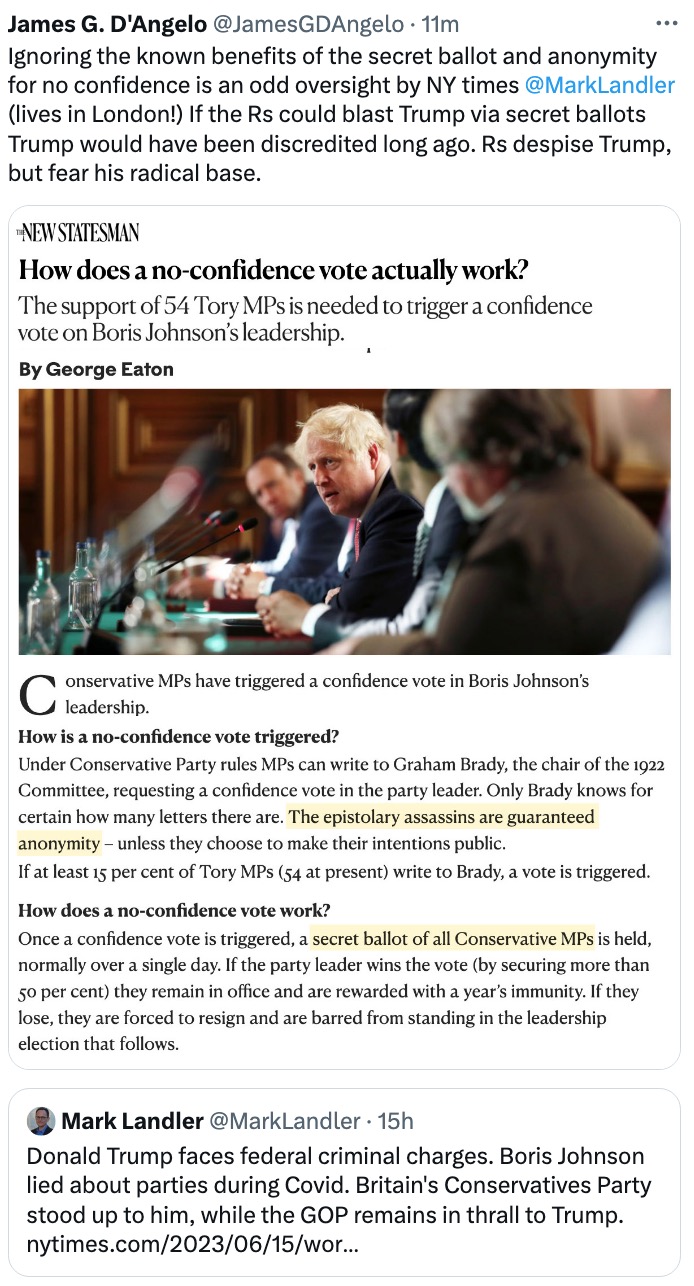
James D'Angelo 2023 - Partisan support of Trump vs Johnson

James D'Angelo 2023 - Partisan support of Trump vs Johnson
Closed-door protection from media glare and lobbyist pressures allows legislators to trade public posturing for private deliberation.Cathie Jo Martin 2013
Conditions for Successful Negotiation
Transparency interferes with the search for solutions. Conducting negotiations of multidimensional, integrative solutions behind closed doors gives lawmakers more freedom to explore policy options.Sara Binder & Frances Lee 2013
Making Deals in Congress
The sunshine laws played into the hands of the lobbyists who were in frequent attendance at committee meetings to keep an eye on the members.Barber B. Conable 2000
Window on Congress
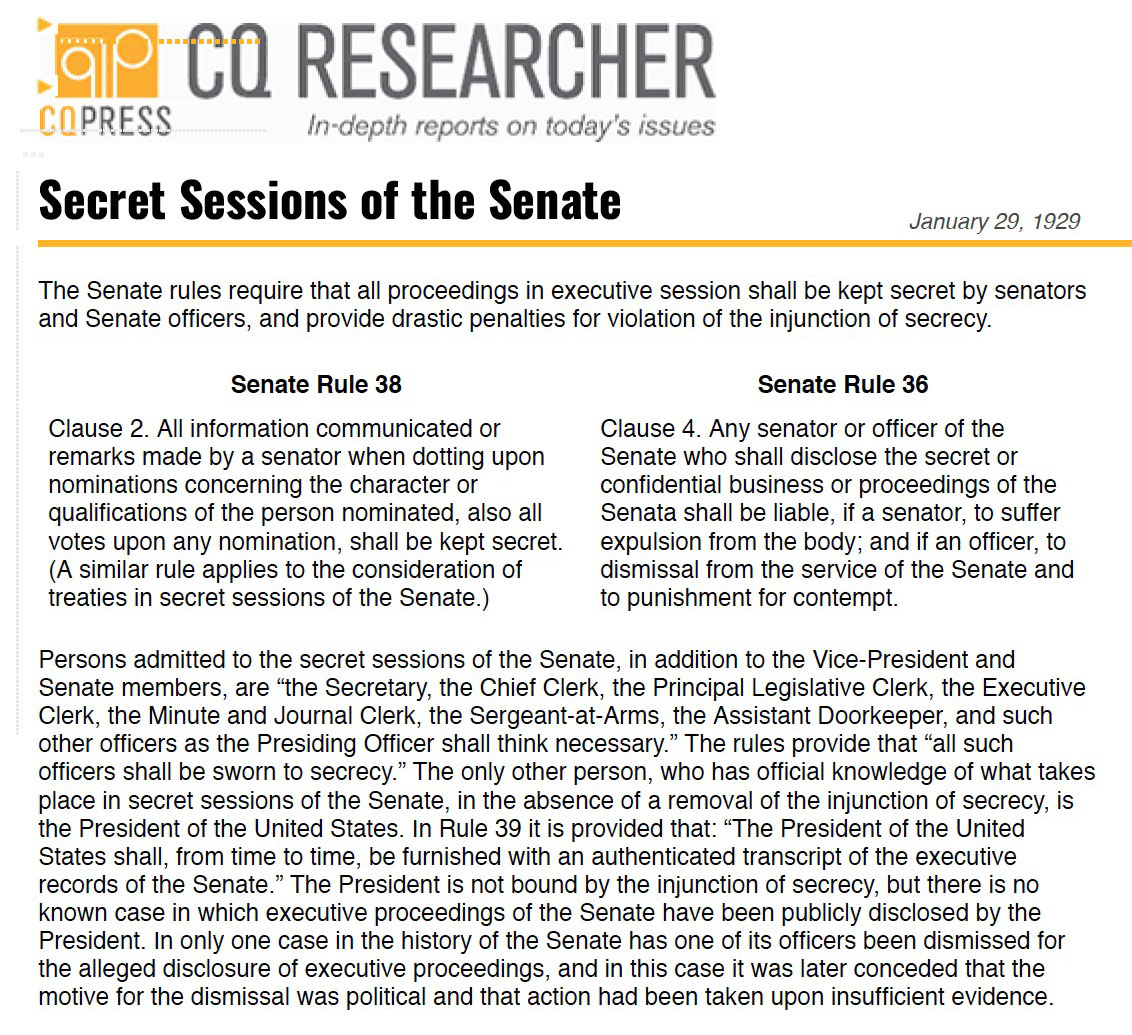
Congressional Quarterly 1929 - Secret Sessions of the Senate & Punishments for Transparency

Congressional Quarterly 1929 - Secret Sessions of the Senate & Punishments for Transparency
The Senate rules require that all proceedings in executive session shall be kept secret by senators and Senate officers, and provide drastic penalties for violation of the injunction of secrecy.Congressional Quarterly 1929
Secret Sessions of the Senate
America is increasingly embracing a simple-minded populism that values popularity and openness as the key measures of legitimacy. This ideology has necessitated the destruction of old institutions, the undermining of traditional authority, and the triumph of organized interest groups, all in the name of “the people.”Fareed Zakaria 2003
Future of Freedom
Citizens seem to prefer a government designed around less visible, less accountable actors.Kathryn VanderMolen 2017
Reconsidering Preferences for Less Visible Government
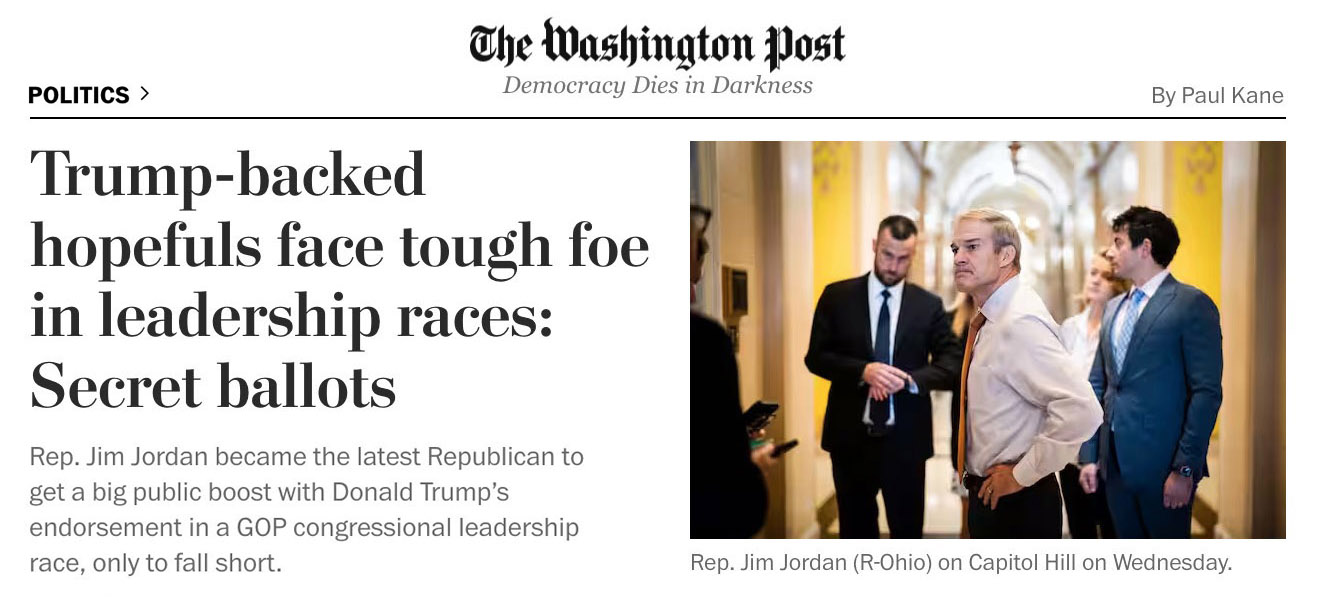
Paul Kane 2023 - Trump-backed hopefuls face tough foe in leadership races: Secret ballots

Paul Kane 2023 - Trump-backed hopefuls face tough foe in leadership races: Secret ballots
Transparency can undermine governance, even when well-intentioned.Richard M. Skinner 2019
Is Congress Broken?
Commitment to transparency allows interest groups capture where the democratic and regulatory process is constrained to prevent it. So, ideologically transparency claims make the negotiation seem more democratic when in fact they enable interest group across the Atlantic to capture the front end of the process.Fernanda Nicola 2015
The Paradox of Transparency
While most members of Congress and the public may be excluded from details of the private negotiations, so are lobbyists. That's a good thing, according to transparency watchdogs who say the involvement of lobbyists working on behalf of their narrow interests could make a deal impossible.Frank James (NPR) 2012
Open-Government Watchdogs OK With Closed-Door Fiscal Cliff Talks
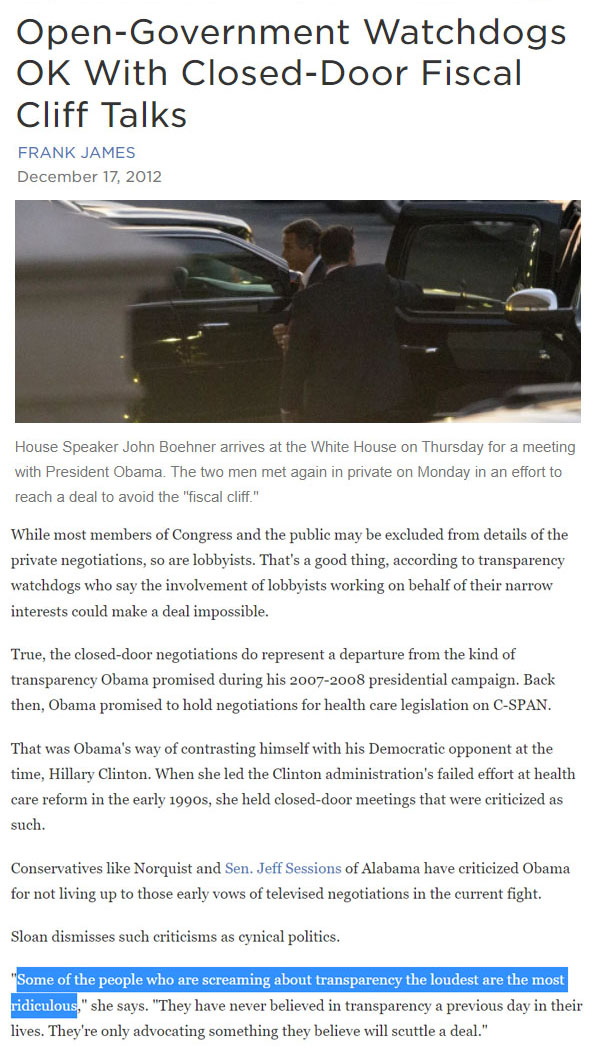
Frank James NPR 2012 - Open Government Advocates OK with Secrecy

Frank James NPR 2012 - Open Government Advocates OK with Secrecy
From the interest group point of view, it is more beneficial to mobilize during open negotiations than to mobilize after secret (or open) negotiations. It follows then that interest groups will mobilize more often when negotiations are open.Barbara Koremenos 2010
Open Covenants, Clandestinely Arrived At
The beneficial effect of excluding the public from deliberation is...deliberation behind closed doors can proceed through a process of trial and error, through proposal and counterproposal, through persuasion and bargaining...This is impossible with pressure from the public, including that exerted by special interest groups.Anne Peters 2013
Towards Transparency as a Global Norm
Logrolling (vote trading in legislatures) leads to almost all projects being voted through, including those that have a net value to society that is negative. There can be so much logrolling (and so many bills passed) that even the “beneficiaries” of passed legislation (say, people in one state) may, on net, be worse off because of how much they have to pay in federal taxes to support the other legislation passed (that benefits other states).Deborah Walker 2020
Public Choice - Logrolling
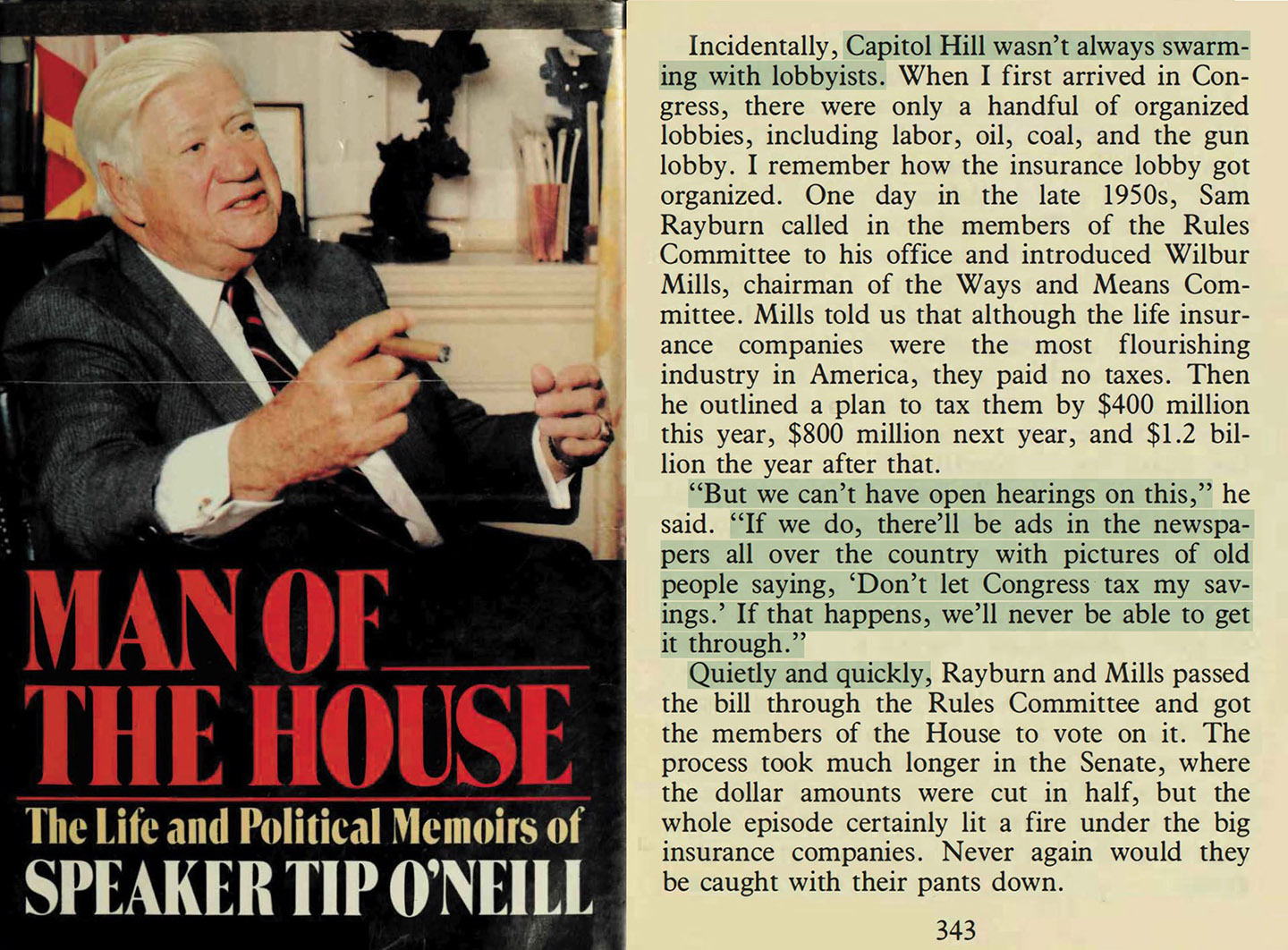
Speaker Tip O’Neill 1988 - Man of the House
Capitol Hill wasn’t always swarming with lobbyists. When I first arrived in Congress, there were only a handful of organized lobbies, including labor, oil, coal, and the gun lobby. I remember how the insurance lobby got organized. One day in the late 1950s, Sam Rayburn called in the members of the Rules Committee to his office and introduced Wilbur Mills, chairman of the Ways and Means Committee. Mills told us that although the life insurance companies were the most flourishing industry in America, they paid no taxes. Then he outlined a plan to tax them by $400 million this year, $800 million next year, and $1.2 billion the year after that. “But we can’t have open hearings on this,” he said. “If we do, there’ll be ads in the newspapers all over the country with pictures of old people saying, ‘Don’t let Congress tax my savings.’ If that happens, we’ll never be able to get it through.” Quietly and quickly, Rayburn and Mills passed the bill through the Rules Committee and got the members of the House to vote on it.

Speaker Tip O’Neill 1988 - Man of the House
Ten years ago [before the majority of the sunshine laws were enacted], I could sit in a closed committee meeting and say that I couldn’t go along with something, but if they’d let me demagogue it for a while, I wouldn’t stand in the way.Joe Biden 1982
New York Times - Lexicon
[Lobbyists] heed the old Washington adage, "if you are not at the table, you are probably on the menu," by showing up at every table.Lee Drutman 2015
The Business of America is LobbyingNote: Drutman works for transparency organizations and yet doesn't see the irony of this statement.
Transparency laws are so widespread and accepted in American governments that we rarely bother to actually assess their consequences. With impressive clarity and decisiveness, Harden and Kirkland find that these laws are actually making things worse, enabling organized interests to exert greater control over legislatures.Seth E. Masket 2022
The Illusion of Accountability: Transparency and Representation in American Legislatures
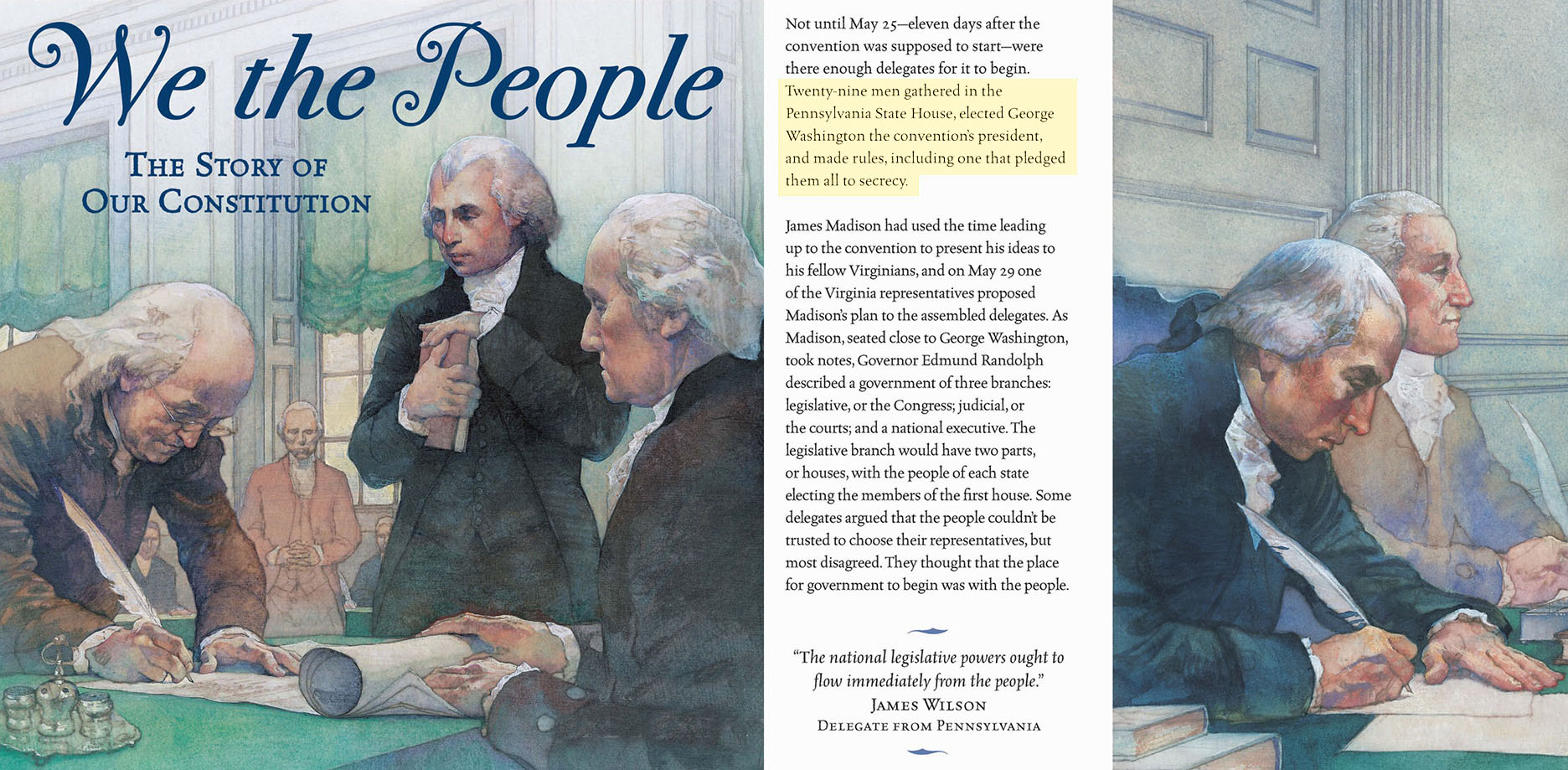
Lynne Cheney 2010 - We The People - The Story of Our Constitution

Lynne Cheney 2010 - We The People - The Story of Our Constitution
The results of this study hint at an insurmountable negative effect of transparency of public decision-making on citizens trust in a government organization. The decrease in perceived competence demonstrates that the dark side of transparency seems to prevail in this case, particularly the demystification of government behaviour. People notice that behind the scenes, public decision-making is not rational as it appears from the outside (Stone, 2000).Stephan Grimmelikhuijsen 2009
Transparency of local public decision-making
Does open governance strengthen democracy? The Illusion of Accountability contends that it does not. Leveraging a wealth of data from decades of legislative politics in the American states, the book assesses the causes and consequences of 'open meetings laws,' which require public access to proceedings in state legislatures. The work traces the roots of these laws back to the founding constitutions of some states and analyzes the waves of adoptions and exemptions to open meetings that occurred in the twentieth century. The book then examines the effects of these transparency laws on a host of politically consequential outcomes both inside and outside the legislature. This analysis consistently finds that open meetings do not influence legislators' behavior or citizens' capacity to alter that behavior. Instead, a link between transparent legislatures and an expanded system of organized interests is established. This illuminating work concludes that transparency reform only creates the illusion of accountability in state government.Justin H. Kirkland, Jeffrey J. Harden 2022
The Illusion of Accountability: Transparency and Representation in American Legislatures
We have seen experimental evidence that survey respondents express a strong preference for transparency – and additional survey evidence that respondents in states with open meetings laws actually seem to know less about legislatures themselves. Finally, we have also presented observational evidence that the political actors who do benefit from open meetings laws appear to be organized interests. These groups have the resources and, critically, the incentive to monitor legislatures carefully. But their preferences and goals do not necessarily align with the public.Justin H. Kirkland, Jeffrey J. Harden 2022
The Illusion of Accountability: Transparency and Representation in American Legislatures
[One of the first results of the open voting in 1971 was a special interest coup. It] was passage of the $250 million guarantee to Lockheed, by a mere three votes a near miracle considering that the administration, the banks, labor and a lot of industry wanted the bill while the Democratic leaders were concerned to protect their party from a charge that they had defeated the bill and thus contributed to unemployment… Moreover, the House has passed 10 out of 14 major appropriations bills which is far in advance of the usual pace. The serious question, accordingly, is not the quantity of legislation. The serious question is how open politics affects the quality of congressional action.Joseph Kraft 1971
Reform Mood In Congress (debt & deficit)
The Freedom of Information Act is the Taj Mahal of the Doctrine of Unanticipated Consequences, the Sistine Chapel of Cost-Benefit Analysis Ignored.Anton Scalia 1982
The Freedom Of Information Has No Clothes (FOIA, Executive)
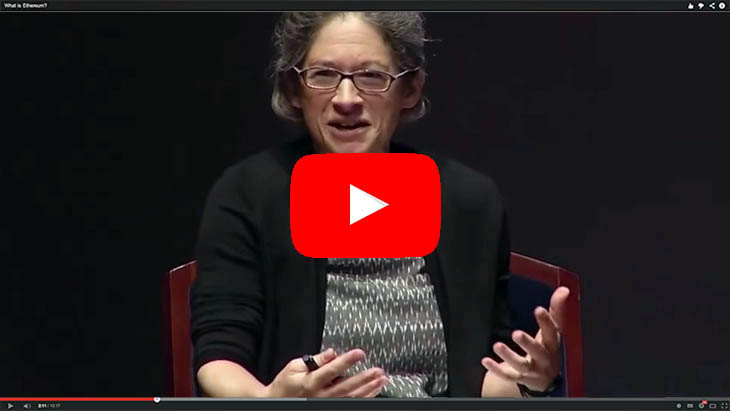
Sarah Binder 2015 - Downsides of Transparency (Order in the House)
“Would we have seen the emergence of these restrictive rules even without the rules changed in the 1970s? Perhaps… But I think much of what we see in the House today, the roots lie in these reforms of the 70s, which obviously were originally in the pursuit of greater transparency and greater accountability.”

Sarah Binder 2015 - Downsides of Transparency (Order in the House)
While political parties can in principle moderate the effects of interest group politics, it is also true that political parties have sometimes supported reforms that make them more vulnerable to interest groups, such as the “sunshine laws” adopted in the reform atmosphere of the 1970s.Kenneth W. Dam 2001
The Rules of the Global Game
Although there may be benefits to “sunshine laws” and other measures to make negotiations open, our results show that they may actually harm efficiency. For this reason, sometimes negotiations should be kept secret.Tim Groseclose & Nolan McCarty 2001
The Politics of Blame - Bargaining Before an Audience
A close look at the Philadelphia Convention thus reveals several desirable features of secret deliberation. First, secret deliberation facilitates compromise by allowing participants to change their views. Second, secret deliberation mollifies partisan fervor. And third, secret deliberation allows for exploratory and thorough debate. Such insights perhaps suggest that more of our democratic deliberation ought to occur behind closed doors. This conclusion is too quick, for it neglects the potential costs of secret deliberation. Brian Kogelmann 2021
Secret Government: The Pathologies of Publicity
Take the banking lobby, for example, one that a lot of lawmakers can depict as a dark influence without fear of retribution by the voters. Wright Patman, the chairman of the House Banking Committee, has a rueful memory of the time two years ago when he tested the theory that open sessions would help defeat the big banks he forever fights.
Rep. Patman was pushing a bill that the big banks opposed, and he figured an audience would demonstrate to other committee members that the people were on his side. Indeed, the committee was influenced by the audience. It voted against Mr. Patman and for the bill the bank lobbyists wanted. “We got some press, but most of the seats in the room were filled by (bank) lobbyists obviously interested in pushing through the softest possible bill,” Mr. Patman recalls. “The members of the committee were looking down the throats of at least $100 billion in bank assets...”Norman C. Miller 1971
Here is a Reform We Do Not NeedNote: Worth noting that lobbyists likely learned from these sunshine experiments as well. And, as Jaqueline Clames wrote in 1987, the lobbyists and banks became some of the strongest proponents for open meetings.
It is considered a breach of good faith for members to disclose what went on in the committee while in executive session, even though they may be sorely tempted to do so; and the votes taken in committee are never made a matter of public record. It is easy to condemn (as some have done) the secrecy surrounding committee deliberations. But there is another side to the matter. In the executive sessions of committees, writes an experienced member already quoted, falls “the most interesting, important, and useful part of the work of a congressman, and the part, of which the public knows nothing. Indeed, the ignorance of the public about it is one of the causes of its usefulness. Behind closed doors nobody can talk to the galleries or the newspaper reporters. Buncombe is not worthwhile. Only sincerity counts.”Robert Luce 1926
Congress: An Explanation
Senators said the closed doors, combined with the inability of senators to posture for the cameras or the news media, led to more free-flowing and elevated discussion as lawmakers expressed their views without fear of retaliation — or today’s equivalent of a social media beatdown. Joseph I. Lieberman, a former Democratic senator from Connecticut, said he remembered such debates in 1999 as some of the most meaningful of his time in the Senate.Carl Hulse 2020
NY Times – Impeachment Out Of Public View
In a world of closed meetings, interest groups must rely on second-hand accounts and often cannot be sure what negotiations had occurred. Furthermore, because most interest group bargains in the budget context are not obviously corrupt, and many are low salience bargains that voters will overlook even if they are made in the open, the threat of disclosure may not appreciably reduce the level of private-regarding behavior. Thus, transparency may empower interest groups and their lobbyists in one realm without substantially harming them in another.Elizabeth Garrett & Adrian Vermeule 2006
Transparency in the Budget Process
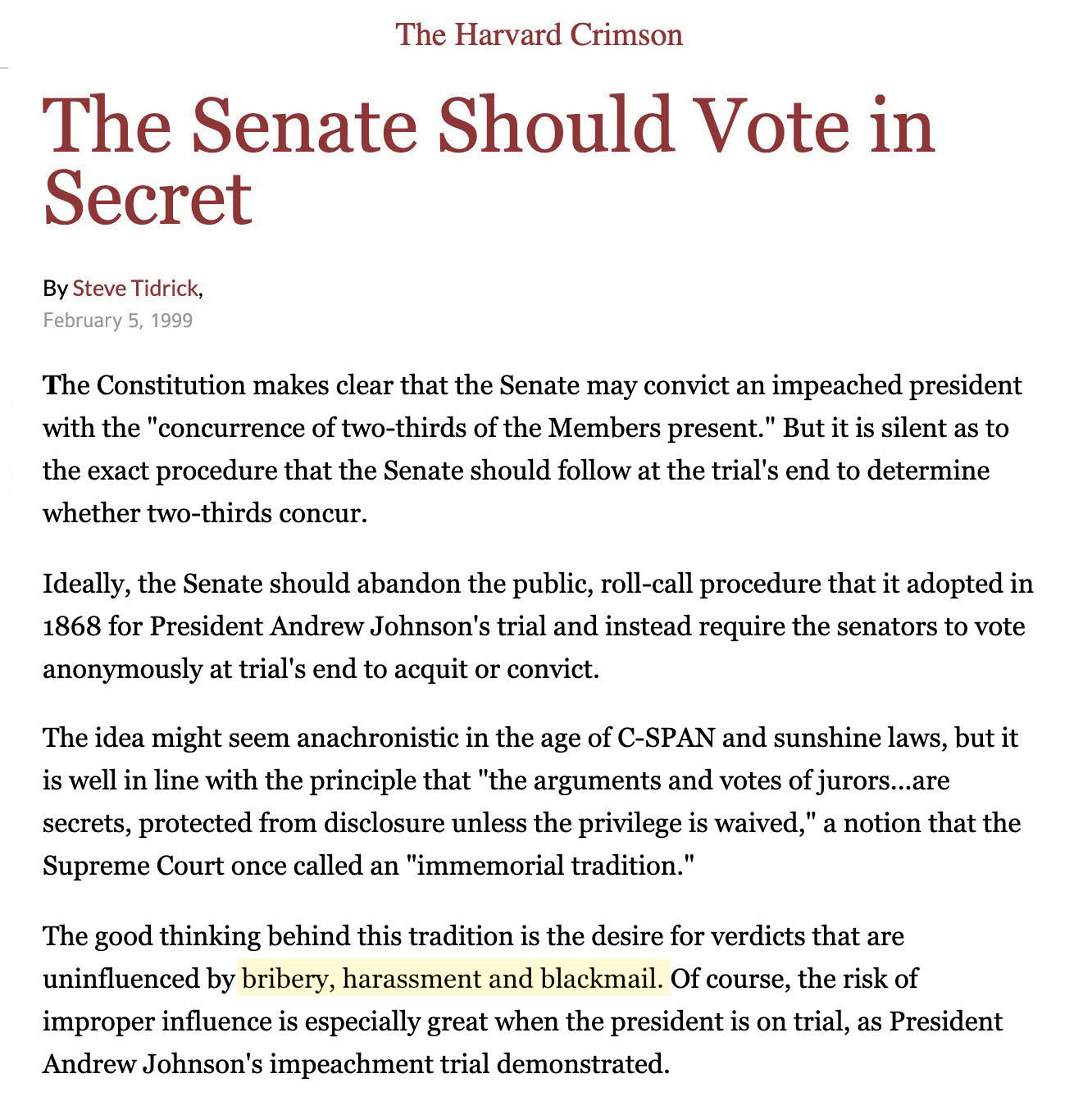
Steve Tidrick 1999 - Senate Should Vote in Secret

Steve Tidrick 1999 - Senate Should Vote in Secret
Transparency helps promote oversight by voters or constituents, and thus promotes the accountability of representatives to voters or constituents. Yet it also promotes oversight or monitoring by third parties – narrow interest groups, self-interested officials elsewhere in government, and others. Adrian Vermeule (Harvard Law) 2007
Mechanisms of Democracy
Some of the people who are screaming about transparency the loudest are the most ridiculous. They have never believed in transparency a previous day in their lives. They’re only advocating something they believe will scuttle a deal.Melanie Sloan 2012 (CREW - Citizens for Responsibility and Ethics in Washington)
Open-Government Watchdogs OK With Closed-Door Fiscal Cliff Talks
All treaties and nominations [in Congress] continued to be debated in secret until the twentieth century... [And] a fickle press showed little interest in the Senate’s open sessions.Donald Ritchie 1991
Press Gallery: Congress and the Washington CorrespondentsNote: According to author Ritchie, the very newspapers that were so furious about secrecy failed to show up to observe Congress when the doors were opened. The galleries remain to this day mostly empty with a scattering of lobbyists.
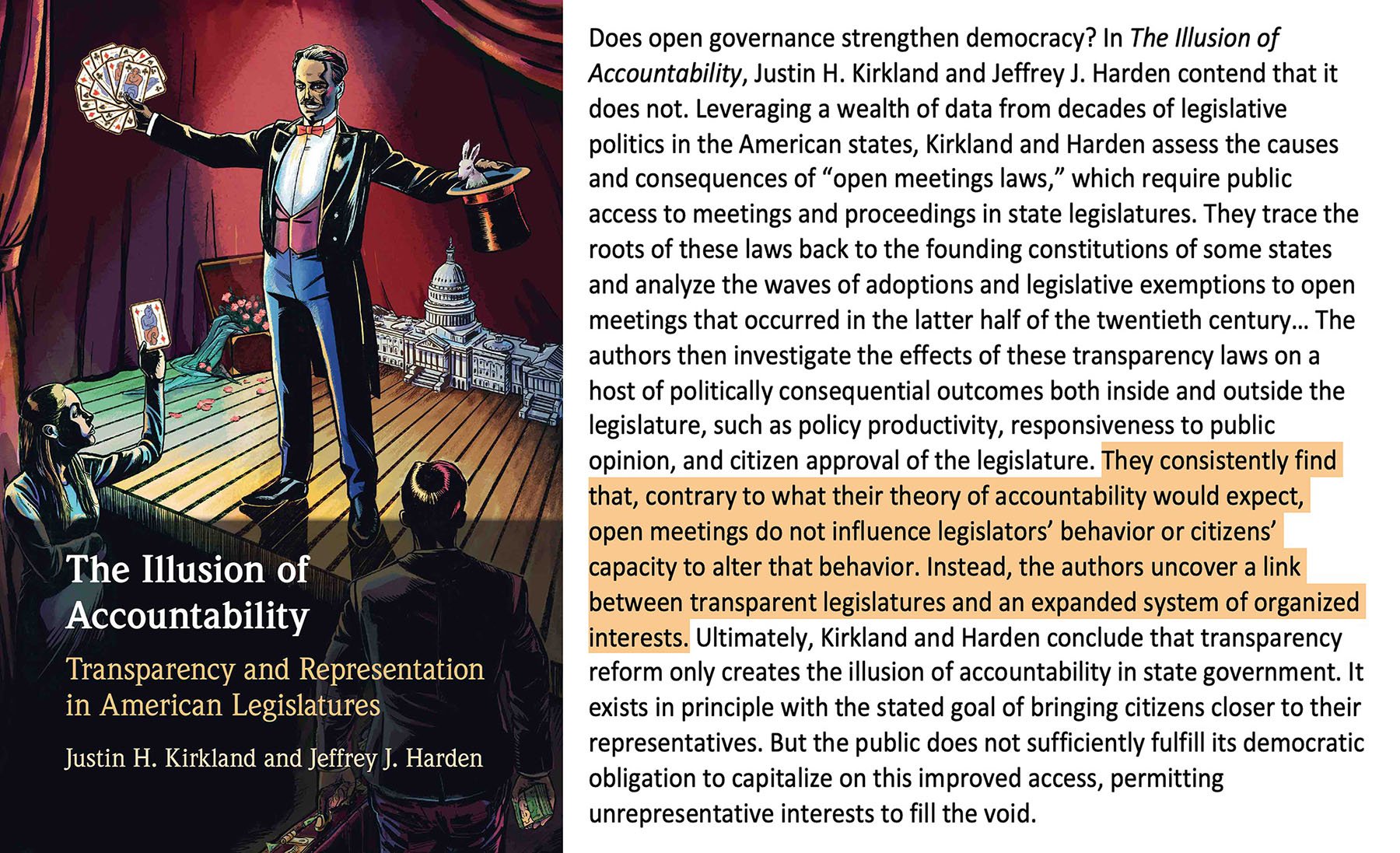
Justin H. Kirkland, Jeffrey J. Harden 2022 - The Illusion of Accountability - Transparency and Representation in American Legislatures

Justin H. Kirkland, Jeffrey J. Harden 2022 - The Illusion of Accountability - Transparency and Representation in American Legislatures
As occurs so often in the course of American reform movements, light is presented as the solution to corruption which occurs in secret and in darkness: light is the great disinfectant. But of course what that reasoning applied to this circumstance meant was that every individual vote would be an even more visible, even more a public declaration for any interested observer to see, just as any observer at a viva voce election could hear every vote. Transparency, not secrecy, was the solution to the ills of American politics. It would take another generation for the opposite view to take hold: that the solution to the ills of American politics was secrecy, not visibility and not transparency, but voting as a private act and a ballot box that shielded every vote from scrutiny.Donald A. Debats 2016
Voting Viva Voce - Unlocking the Social Logic of Past Politics
While Congress is sometimes viewed by the public as an enemy, we wish to call attention to the fact that it is often viewed as an enemy because it is so public. John Hibbing & Elizabeth Thiess-Morse 1995
Congress as Public Enemy (trust)
These bills also show Congress, away from the spotlight, still occasionally working the way it used to: through the committee process, across the aisle, and in pursuit of shared interests. The committee part is especially important here: committee chairs play a key role shepherding these sorts of low-profile bills to passage, which gives them a sense of ownership that could push some to confront the Trump administration when they feel it’s treading into their jurisdiction.Gabe Fleisher 2025
How Congress Breaks with Trump in Quiet Ways
By now [James] Madison also understood that reticence had its political uses. It was wise to avoid strong statements while circumstances were still unfolding. It was often advantageous to put forth proposals anonymously and thus avoid alienating allies who might not agree. If in avoiding center stage Madison missed some of the praise, he also avoided some of the criticism, thus saving his reputation for a future day… It might have been during the extra time he spent at Princeton that Madison took notes in a commonplace book that survives today. It shows him interested in secrets, which would be natural at a period in his life when he probably wanted as few people as possible to know what had happened to him. Reading the Memoirs of Cardinal de Retz, he stopped to copy this passage: “Secrecy is not so rare among persons used to great affairs as is believed.” He added his own thought, “Secrets that are discovered make a noise, but these that are kept are silent.” De Retz’s Machiavellian insights interested him (“To lessen envy is the greatest of all secrets”), as did de Retz’s description of a rising churchman who did not reveal much of himself, Cardinal Fabio Chigi, who, wrote de Retz, “was not very communicative, but in the little conversation he had he showed himself more reserved and wise (savio col silentio) than any man I ever knew.” Reflecting on the sentence, Madison offered his own, more pointed version: “He showed his wisdom by saying nothing.”Lynne Cheney 2014
James Madison - A Life Considered
We must recognize that there are moments in government where the imperative for deliberation trumps the imperative for access.Jason Grumet 2014
When sunshine doesn’t always disinfect the government
Our government is more open, more transparent, and less functional than ever before.Jason Grumet 2014
The Dark Side of Sunlight (City of Rivals)
Contrary to popular belief, lobbyists can actually promote transparency and accountability in the political sphere.Lobbyist Lauren Hooker 2024
The Crucial Role of Lobbyists
Most of the tough issues were solved around small tables, over dinner at night, or in the Cloak Room between votes. Often when there was an important disagreement, I would gather the key senators into my conference room and tell them not to leave until they figured it out. Sometimes it took a few sessions, but an agreement usually emerged.Bob Dole 2014
City of Rivals
There has to be some balance struck between privacy for the sake of bargaining and transparency for the sake of accountability. But we have gone much too far in the direction of transparency, so that our core deliberative institutions have become so transparent as to essentially lack an interior altogether.Yuval Levin 2019
Behind Closed Doors
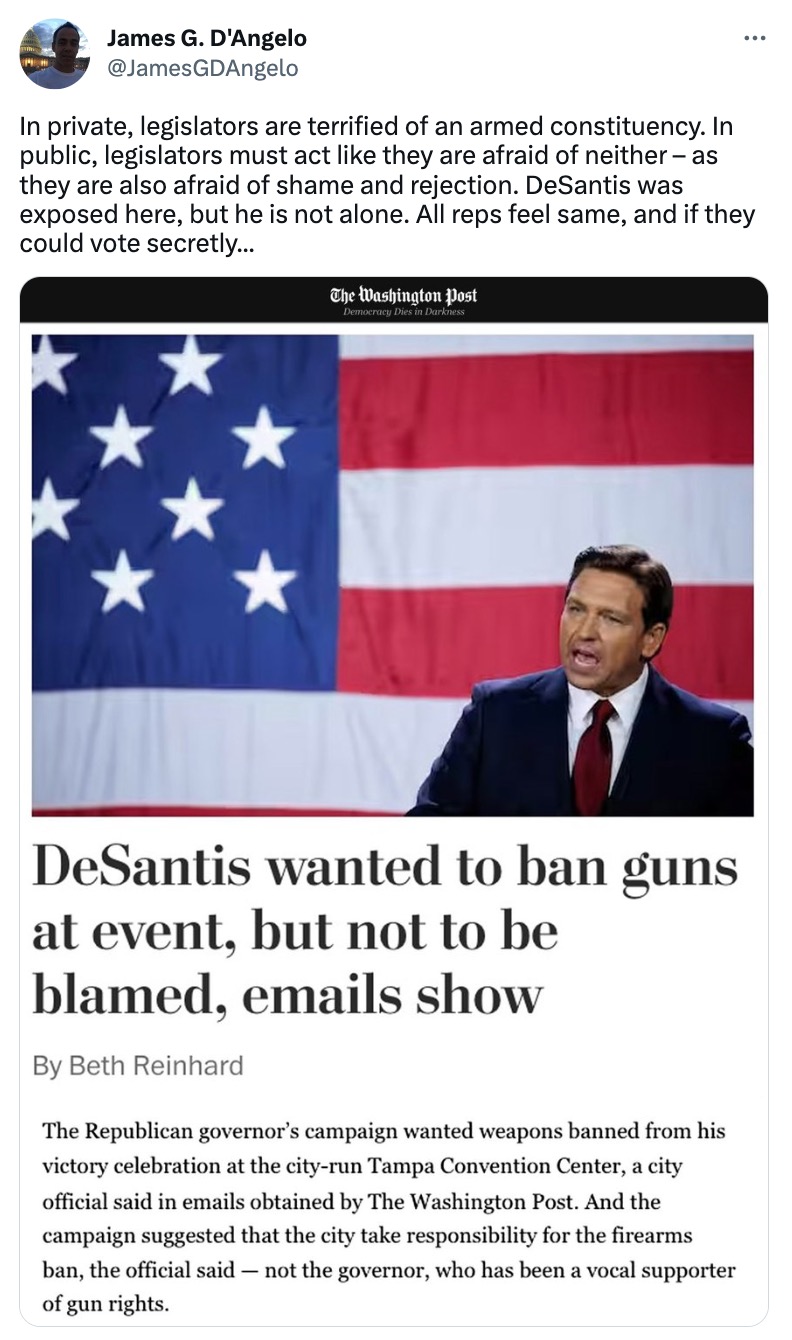
Beth Reinhard 2023 - DeSantis wanted to ban guns but not be blamed

Beth Reinhard 2023 - DeSantis wanted to ban guns but not be blamed
As a final example, I shall cite the argument made by James D’Angelo that the combination of public voting in Congress and huge private contributions to election campaigns has undermined American democracy, by enabling lobbyists to verify that a representative they have funded votes the way they want.Jon Elster 2015
Secrecy and Publicity
The fragmented power game, fostered by the [1970s reforms], played into the hands of lobbies. It not only helped AIPAC block President Reagan on Arab arms deals, but the more open power game enabled the bank lobby to resist a tax law backed by the president and leaders of both houses of Congress, by stimulating such a popular groundswell that congressional members turned against their political leaders. The parties used to provide the most essential organization, money, and endorsement that politicians needed. Parties and their leaders weighed the competing demands of interest groups, sorted out priorities, struck compromises and then provided what politicians call “cover” for the votes of individual Congress members: taking the political heat for unpopular votes and delivering bad news to groups that were not satisfied.Hedrick Smith 1988
The Power Game - How Washington Works
Writing in 1929, in terms foreshadowing today's literature, [Pendleton] Herring pointed to changes in Congress that invigorated group activity and altered the scope and methods of lobbying. In particular, he cited the reform of rules of procedure in the House of Representatives in 1911 that broke up the power center and distributed control more generally in the House; he also pointed to the adoption, at about the same time, of open congressional committee hearings as being a spur to group activity (Herring, 1929, pp. 41-43). Kay Lehman Schlozman & John T. Tierney 1983
More of the Same: Pressure Group Activity
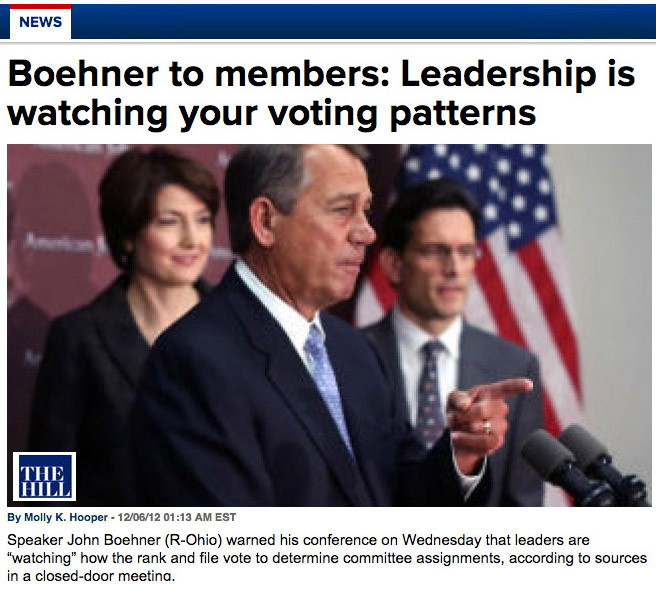
John Boehner 2012 - Leadership Enforces Partisanship by Watching Votes and Punishing Members
Text: Speaker John Boehner (R-Ohio) warned his conference on Wednesday that leaders are “watching” how the rank-and-file vote to determine committee assignments, according to sources in the closed-door meeting. Boehner addressed the firestorm over the removal of four lawmakers from plum committee assignments at the weekly GOP conference meeting. According to Rep. Tim Huelskamp (R-Kan.), one of the lawmakers denied a spot on his current committee in the next Congress, Boehner did note “that we [leadership] have punished four members, he claimed that it had nothing to do with their conservative ideology, but had to do with their voting patterns.” Also removed from committee spots were Reps. Justin Amash (R-Mich.), Walter Jones (R-N.C.) and David Schweikert (Ariz.). Huelskamp added that Boehner warned GOP lawmakers that “there may be more folks that will be targeted … ‘we’re watching all your votes.”

John Boehner 2012 - Leadership Enforces Partisanship by Watching Votes and Punishing Members
Indeed, in the days when Appropriations committees saw their mission as cutting spending rather than maximizing it, appropriators carried out virtually all of their activities, including hearings, behind closed doors… William Natcher, D-Ky., closed his markups after taking over the Labor-HHS Subcommittee in 1979, arguing that it would be too difficult to put together a fiscally responsible bill if special interests could record how every member voted on every amendment. The temptation to vote yes on everything would be too great.George Hager 1991
Behind Closed Doors (CQ Magazine)
There’s a reason Republicans took their vote to approve earmarks on a secret ballot. And it’s still easier to find members of Congress publicly condemning earmarks than supporting them....Now, though, even as another Democratic president is spending trillions to combat another recession, House Republicans voted by secret ballot to allow earmarks.Alex Seitz-Wald 2021
Why Washington decided earmarks aren't so bad afterall
You will not find it in political science textbooks, but it is nonetheless an immutable truth that, before an audience of reporters [when the committees are open to the public], politicians just can’t shut up. Somehow, even a Congressman whose every utterance is religiously ignored feels compelled to talk endlessly as long as a single soul sits suffering at the press table.Norman C. Miller 1971
Here is a Reform We Do Not Need
Yet, transparency has a dark side that, ironically, has everything to do with a lack of mystery, shadow, and nuance. Behind the apparent accessibility of knowledge lies the disappearance of privacy, homogenization, and the collapse of trust. The anxiety to accumulate ever more information does not necessarily produce more knowledge or faith. Technology creates the illusion of total containment and the constant monitoring of information, but what we lack is adequate interpretation of the information. In this manifesto, Byung-Chul Han denounces transparency as a false ideal, the strongest and most pernicious of our contemporary mythologies.Byung-Chul Han 2012
The Transparency Society
Those who pay closest attention to markup sessions are lobbyists who use the occasion to press for changes the serve their interests.Joseph Bessette & John Pitney 2011
American Government and Politics
If you judge the committee’s work by the bottom line, they have a pretty good case for closing. It’s hard to close loopholes when there are lobbyists in the room.Robert S. McIntyre 1983
Citizens for Tax Justice
Congress would likely find it quite difficult to craft and enact priority legislation absent private meetings and discussions.Walter Oleszek 2011
Congressional Lawmaking: A Perspective On Secrecy and Transparency
The Paris outcome was made possible by the heavy use of secrecy. The agreement is a composite mélange of building block pieces, many of which were negotiated in secret over the two weeks and preceding months. Secrecy is common in diplomacy, but the French finessed it to a new level – and with compelling efficacy.Radoslav S. Dimitrov 2016
The Paris Agreement on Climate Change: Behind Closed Doors
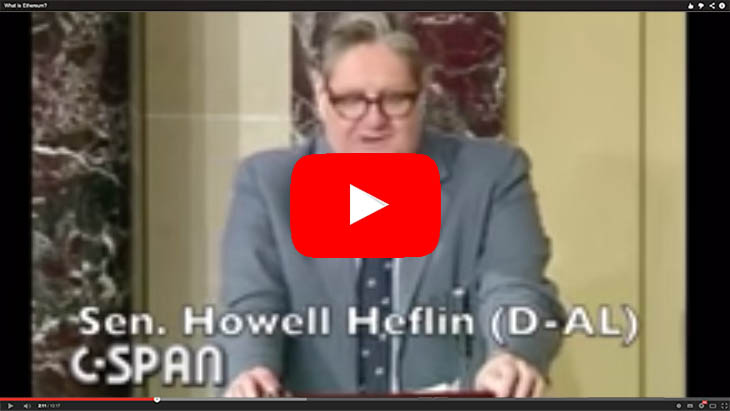
Senator Howell Heflin 1986 - A Sonnet on Transparency
Turn the spotlight over here.
Focus the camera at my place.
Pages, please don’t come near,
Otherwise, you just might block my face.
Some have made the worst claim yet,
That viewers will tire from the dull plot,
But I’ll be willing to make a bet
Lobbyists will watch a whole lot.

Senator Howell Heflin 1986 - A Sonnet on Transparency
Focus the camera at my place.
Pages, please don’t come near,
Otherwise, you just might block my face.
Some have made the worst claim yet,
That viewers will tire from the dull plot,
But I’ll be willing to make a bet
Lobbyists will watch a whole lot.
We argue that making lawmakers more accountable to the public by making it easier to identify their policy choices can have negative consequences… Lawmakers who would do the right thing behind close doors may no longer do so when policy is determined in the open.Justin Fox 2006
Government Transparency and Policymaking
Lawmakers desiring more closed committee work sessions do not lack variety in their criticism of the new openness: more partisan behavior, too much political speechifying, unusually blatant lobbying, temptation to refrain from discussing radical alternatives.CQ Quarterly 1976
Should congressional work sessions be open to public?
Keeping an accurate vote count is one of the hardest but most important aspects of a congressional legislative fight.Jack Abramoff 2011
Capitol PunishmentNote: Abramoff, one of the most infamous lobbyists talks about how knowing the vote totals (because they are public and countable) is essential.
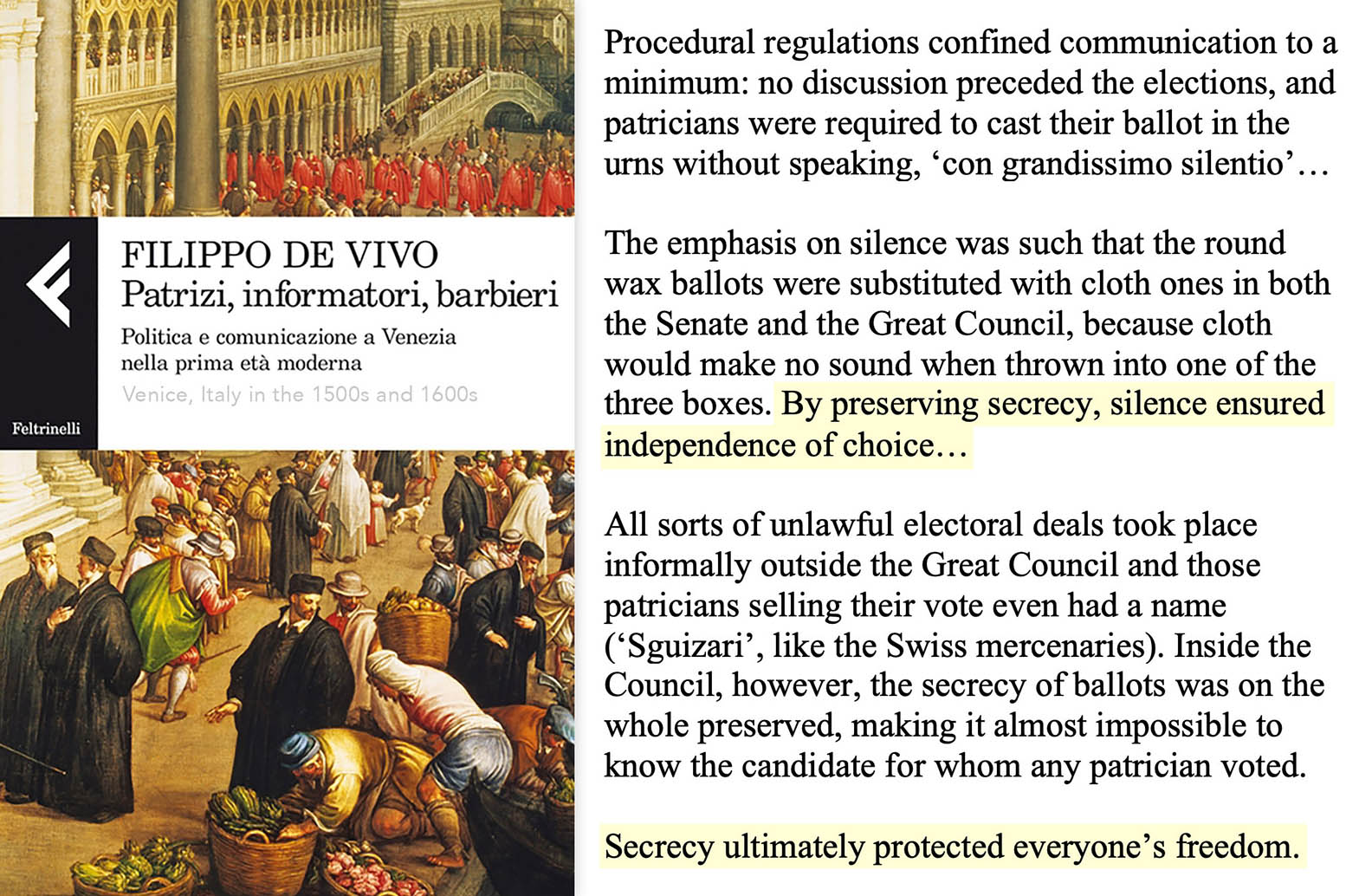
De Vivo 2007 - Information and Communication in Venice
Procedural regulations confined communication to a minimum: no discussion preceded the elections, and patricians were required to cast their ballot in the urns without speaking, ‘con grandissimo silentio’…The emphasis on silence was such that the round wax ballots were substituted with cloth ones in both the Senate and the Great Council, because cloth would make no sound when thrown into one of the three boxes. By preserving secrecy, silence ensured independence of choice…All sorts of unlawful electoral deals took place informally outside the Great Council and those patricians selling their vote even had a name (‘Sguizari’, like the Swiss mercenaries). Inside the Council, however, the secrecy of ballots was on the whole preserved, making it almost impossible to know the candidate for whom any patrician voted. Secrecy ultimately protected everyone’s freedom. (Patrizi, informatori, barbieri)

De Vivo 2007 - Information and Communication in Venice
Even transparency deserves a critical look. Hill rags and Internet gossip sheets now cover incremental legislative updates, with a focus on process, which is ugly and easily distorted for partisan gain. Leaked comments and proposed deals often stymie negotiators.Alex Seitz-Wald 2013
Washington’s Bad Old Days Worked Better Than the Good New Ones
Open negotiations are akin to allowing interest groups to add amendments.Barbara Koremenos 2010
Open Covenants, Clandestinely Arrived At
Voters are the subject of every kind of mass appeal and mass flattery by those who want their votes. In such circumstances, the inflexibility which open negotiation encourages is apt to harden into complete rigidity.Lester B. Pearson 1955
Democracy in World Politics
Some of the sunshine reforms of the 1970s had the unintended consequence of strengthening the role of special interests.Walter Oleszek 2011
Congressional Lawmaking: A Perspective On Secrecy and Transparency
The 1970 Clean Air Act was smooth, easy and important. It was mostly hashed out in secret, too.Michael Wines 1994 (NY Times Climate)
Who can govern while all those phones, faxes and focus groups are yelling?
We wouldn’t have had 150 amendments to the energy bill if the lobbyists hadn’t been in there – we’d only have had 10 or 15.Rep Harley Staggers (D-WV) 1973
Government in the Sunshine
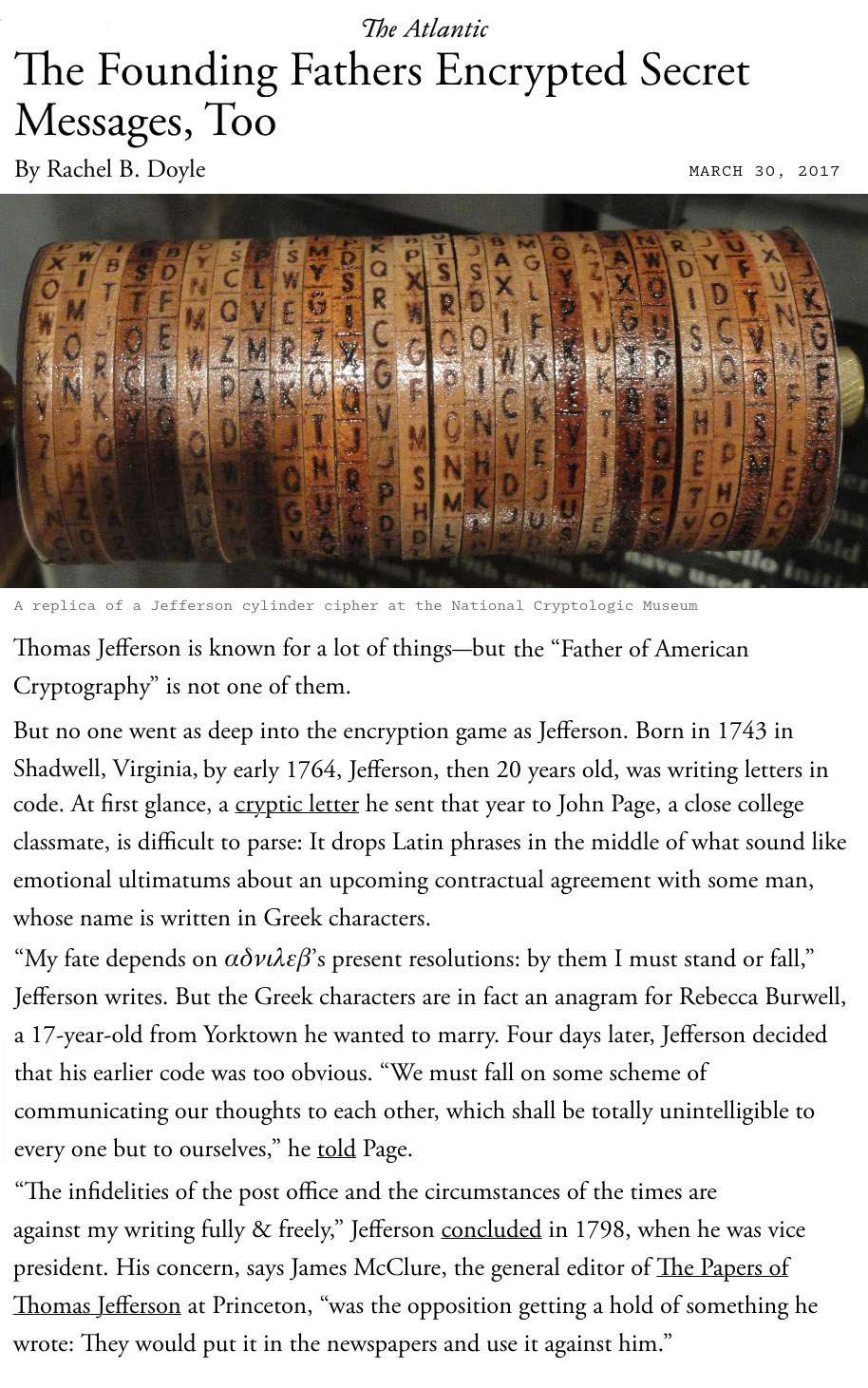
Rachael Doyle 2017 - The Founding Fathers Encrypted Secret Messages, Too
Text: Thomas Jefferson is known for a lot of things — but his place as the “Father of American Cryptography” is not one of them. While serving as the third president of the newly formed United States, he tried to institute an impossibly difficult cipher for communications about the Louisiana Purchase. He even designed an intricate mechanical system for coding text that was more than a century ahead of its time. Cryptography was no parlor game for the idle classes, but a serious business for revolutionary-era statesmen who, like today’s politicians and spies, needed to conduct their business using secure messaging. Going into the Revolution, Americans were at a huge disadvantage to the European powers when it came to cryptography, many of which had been using “black chambers”—secret offices where sensitive letters were opened and deciphered by public officials—for centuries. The Founding Fathers continued to rely on encryption throughout their careers: George Washington, Benjamin Franklin, Alexander Hamilton, John Adams, John Jay, and James Madison all made ample use of codes and ciphers to keep their communiqués from falling into the wrong hands.

Rachael Doyle 2017 - The Founding Fathers Encrypted Secret Messages, Too
In his speech, Baldwin credited most of the error in estimating German productive potentiality to the fact that if a dictatorship wants to increase its defenses, in contrast to a democracy, “it can do it in absolute secrecy.”John F. Kennedy 1940
Why England SleptPrime Minister Stanley Baldwin’s extended 1935 comments titled ‘Defence Policy’: I should like, in a few words, to contrast the position of a democracy such as ours and the authoritarian State in regard to their security. If an authoritarian State—I think there are three of them in Europe—wishes swiftly, and in large measure, to increase its national defences, it can do it in absolute secrecy. It can draw a curtain round all that is happening in the country; nothing appears in the Press, no word is said in public and nothing is said in Parliament, and the world is presented with a fait accompli.
At a public session, NPR found that plenty of lobbyists were lined up for seats. The reason for the great interest is a little surprising. One lobbyist explained “There’s an obsession with intelligence gathering-whether it’s right or wrong-that’s what clients want.” These limitations were made clear when lobbyist Gerald Cassidy told the same publication: “During my 42 years in Washington, this is the most closed-mouth committee that I’ve seen.” If they were hard pressed to find information about the Super Committee’s legislation, it seems unlikely that they would have been able to score any special deals or advance any untoward interests… It seems secrecy could have allowed the panel to produce a good bill.Mark Strand and Timothy Lang 2011
The Super Secret Committee
But people close to the process say the velocity of the soundbite culture on Capitol Hill has forced the real action to go behind the scenes, where controversial ideas can be floated, discussed, and digested without becoming the target practice for pundits on cable news and, in turn, outside groups looking out for their interests.Patricia Murphy 2011
Congressional Secrecy
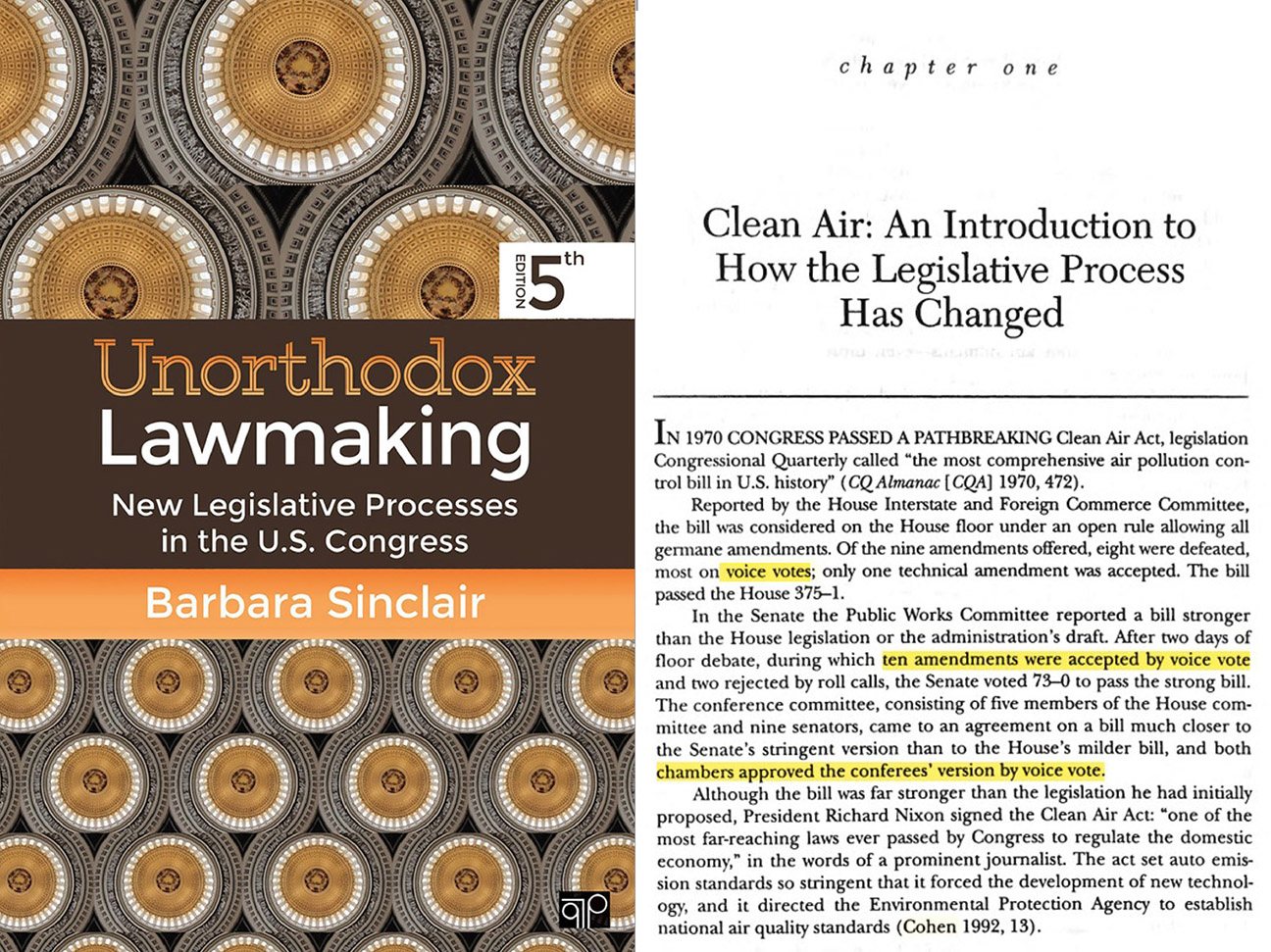
Barbara Sinclair 2017 - Unorthodox Lawmaking - Voice Votes on Clean Air Act 1970
Note: Sinclair looks at how secrecy allowed for the straightforward passage of climate legislation in 1970. In comparison to today, the 1970s worked on legislation in closed committees with secret votes, today they are both open, driving hardlining and partisanship. To date, all effective climate legislation has benefit from important levels of secrecy. In other citiations on this page (and in her seminal book), she remarks how secrecy prevents capture by lobbyists and diminishes partisanship.

Barbara Sinclair 2017 - Unorthodox Lawmaking - Voice Votes on Clean Air Act 1970
“It’s easier to bully politicians than to bully voters” Jim Kessler replies. Recalling that the Manchin-Toomey bill to expand background checks got 55 votes in the senate but fell short of the 60 needed to overcome a filibuster, he says, “If there were a secret ballot in Congress, these gun laws would pass. But there isn’t, and the NRA takes retribution.” Eleanor Clift 2014
NRA Ducks Gun Fight Out West
Probably when you close the doors in the Chamber of the House and the TVs go off, these guys are actually sitting down and being professionals and trying to get things done.Dr. John Cowan 2021
Who elected Marjorie Taylor Greene?

Barry Rubin 200 - A Citizen’s Guide to Politics in America
Text: How the System Works and How to Work the System. Contrary to popular belief, lobbyists do not spend their days prowling the halls of Congress or the state legislature, buttonholing legislators and changing their votes. Most of their best work is “behind the scenes”: it is much less glamorous and much more important. In this section we get a better understanding of what lobbyists do and the skills they need to be successful. In the course of a busy day, lobbyists’ tasks include the following: Monitoring First and foremost, lobbyists monitor government activities and policymakers. Effective lobbyists create formal and informal issue networks to share and analyze two basic kinds of information about government policymaking: (1) publicly available information that everyone knows but few understand, such as what bills are introduced, which administrative rules are proposed, and when hearings are held; and (2) information that few people know, such as the preliminary views of government policymakers or the initial reactions of legislators to informal proposals and contacts. By carefully monitoring government activities, lobbyists can establish an “early warning system” to identify potential policy actions before they are set in stone, and while the lobbyist’s influence can still shape the decision. It is much easier to change an agency’s proposed rule before the agency head “signs off” on it and proposes it for comment in the Federal Register. Similarly, it requires much less effort to insert language in legislation before it is introduced than to make the same change on the floor of the Senate. There is no shortage of people and institutions to monitor.

Barry Rubin 200 - A Citizen’s Guide to Politics in America
The Constitution prohibits even the possibility that Representatives who will, in the course of voting for the President, have to change their minds. should ever come under the control of those who can apply power. The Constitution does not allow, in this all-important personal vote with its many human-nature overtones. that a Representative be compelled to vote openly, and in so doing take the risk of offending on the one hand, or gaining the political debt on the other, of the next President of the United States.Laurence G. Kraus 1964
Illigitimate Power - The History of the Secret Ballot in Congress
The open meetings rules of the last ten years have lowered some barriers separating Members from group pressures. Lobbyists now attend markup sessions and conference committee sessions that used to be held in closed session. In this respect, Members are no longer as insulated from lobbyists as when they were able to conduct official business behind closed doors, and pressure groups are better able to hold Members accountable for their actions.CRS Report 1986
Congress and Pressure Groups
In approaching the typical member, a pressure group has no need to tell him outright that future political support or opposition depends on how the member votes on a particular bill or whether, over a long period, the member acts favorably toward the group. The member understands this without being told. The member knows that when the vital interests of some group are at stake, a vote supporting those interests normally would win the group’s friendship and future support, and a vote against them would mean the group’s enmity and future opposition.Congressional Quarterly 1982
The Washington Lobby
Chuck Schumer 2021 - Secret Ballot Voting in Congress
February 2021, Chuck Schumer became the first Senate Majority leader in the history of the United States to publicly discuss the benefits of a secret ballot vote in the Senate to prevent intimidation. This was during the 2021 Senate trial on the impeachment of President Trump. Yet by claiming that the Senate can't have a secret vote, he makes a fundamental mistake. Article I, Section 5 allows 1/5th of Senators to insure that the vote is put in the ‘Journal,’ but that Journal is then controlled by a simple majority, and they can then decide to keep it secret indefinitely. In some cases, the Journal has been kept secret for decades. See Howard Baker citation below.
Chuck Schumer 2021 - Secret Ballot Voting in Congress
Congressional dysfunction started well before the Trump presidency. It has been growing for decades, despite promise after promise and proposal after proposal to reverse it. Many explanations have been offered, from the rise of partisan media to the growth of gerrymandering to the explosion of corporate money. But one of the most important causes is usually overlooked: transparency. Something usually seen as an antidote to corruption and bad government, it turns out, is leading to both.James D’Angelo & Brent Ranalli 2019
The Dark Side of Sunlight (Foreign Affairs Magazine)
Leaks of negotiating strategies and positions typically result in the public getting a less favorable deal in negotiation — something that public agencies cannot afford.Juli C. Scott 2010
Closed Session Leaks: Discretion Is The Better Part of Valor — and Ethics
Transparency undermines expertise in a significant way, because it confines experts using the kinds of reasons that nonexperts can understand. But if you think about it for a second, you should realize that a lot of expert reasoning is by its nature, incomprehensible to the public.C. Thi Nguyen 2021
Transparency is Surveillance
The [impeachment] trial of the president, including testimony of 25 prosecution and 16 defense witnesses, became a public spectacle as well as a constitutional crisis. It gave the grand orators of the Senate a chance to dazzle the public with their speaking skills, and the trial was conducted mostly in open session before a packed gallery. During final deliberations on the 11 articles of impeachment, however, the Senate cleared the gallery and closed the doors.US Senate Archives 1868
Impeachment Trial of President Andrew Johnson
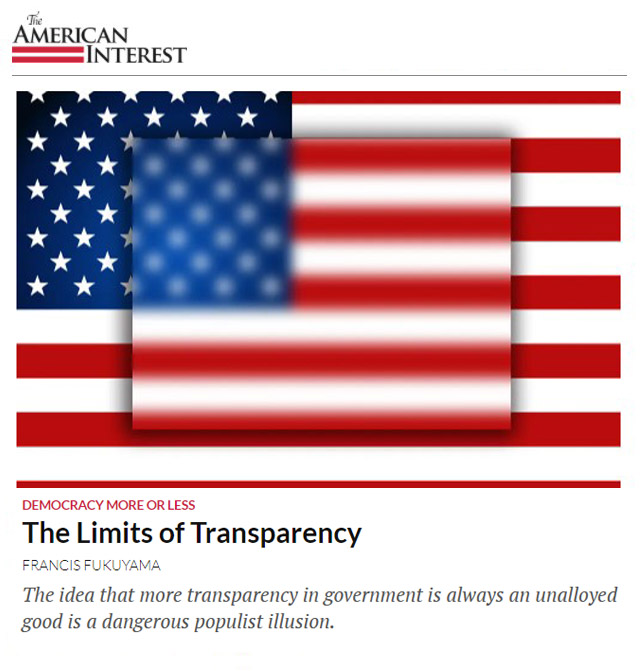
Francis Fukuyama 2014 - The Limits of Transparency

Francis Fukuyama 2014 - The Limits of Transparency
In the mid-1970's, the Ways and Means mark-up proceedings were thrown open to lobbyists and the public, as were bill-drafting sessions in most committees of Congress. But increasingly in recent years the Ways and Means chairman, Dan Rostenkowksi, has been closing the doors, throwing the lobbyists and others into the hall. Free from the eyes of the lobbyists and the press, the tax writers can debate more honestly and succinctly and vote more independently, according to committee members.Gary Klott 1985
Outside Tax Committee, Uneasy Lobbyists Wait
For some of the lobbyists, the committee's closed-door sessions have been a source of resentment. “It is demeaning standing here, holding up the walls for hours at a time, waiting around and having little ability to impact it,” said Stephen D. Driesler, executive vice president of the National Multi-Housing Council, a real estate trade group. Not all lobbyists who make their way into the Longworth corridor have the patience to stick it out. Wayman H. Cox 2d, a life insurance broker from Shreveport, La., came to Washington to testify before the Senate Finance Committee about insurance tax provisions and then joined the waiting scene outside the House Ways and Means Committee. But Mr. Cox, who worries that Congress will take away a key tax advantage of life insurance policies [while behind closed doors], said he did not plan to hang around long. “It's equivalent to watching them build your gallows,” he said.Gary Klott 1985
Outside Tax Committee, Uneasy Lobbyists Wait
When one compares what the Freedom of Information Act was in contemplation with what it has turned out to be in reality, it is apparent that something went wrong. The act and its amendments were promoted as a means of finding out about the operations of government; they have been used largely as a means of obtaining data in the government’s hands concerning private institutions. They were promoted as a boon to the press, the public interest group, the little guy; they have been used most frequently by corporate lawyers.Anton Scalia 1982
The Freedom Of Information Has No Clothes (FOIA, Exectutive)
Thus, immunity for the confidential communications of legislators is even stronger than that of the husband-wife privilege. The latter privilege only prevents a spouse from testifying regarding a confidential communication with another spouse. The legislative privilege defined in Gravel bars any witness from testifying to the communications between legislators and their aides relating to their legislative acts. Moreover, the Court’s language in Gravel broadly grants immunity from questioning as to “communications,” without restricting it to confidential communications, as in the case of spousal immunity. Finally, it should be noted that the immunity provided is against any prosecution, civil or criminal, for “all things generally done in a session of [Congress],” and not merely a testimonial privilege. What public policy underlies such a broad grant of immunity from questioning in any forum for any purpose as to “all things generally done” by legislators in the course of legislative business, including communications with fellow legislators or aides? The policy is designed to foster the Congress’ purposes; it is intended “to prevent intimidation of legislators by the Executive and accountability before a possibly hostile judiciary.” The rule of legislative privilege is designed to ensure “the independence of the legislature;” it protects legislators “from deterrents to the uninhibited discharge of their legislative duty.”Edward J. Bloustein 2004
Individual and Group Privacy
Every week the Legal Times of Washington runs a page or more of notable new FOIA filings – mostly to enable corporate lawyers to find out what it is that other corporate lawyers are trying to find out. The necessary training for any big-time litigating lawyer now includes not only the cross-examination of witnesses, but use of the Freedom of Information Act. In short, it is a far cry from John Q Public finding out how his government works.Anton Scalia 1982
The Freedom Of Information Has No Clothes (Executive)
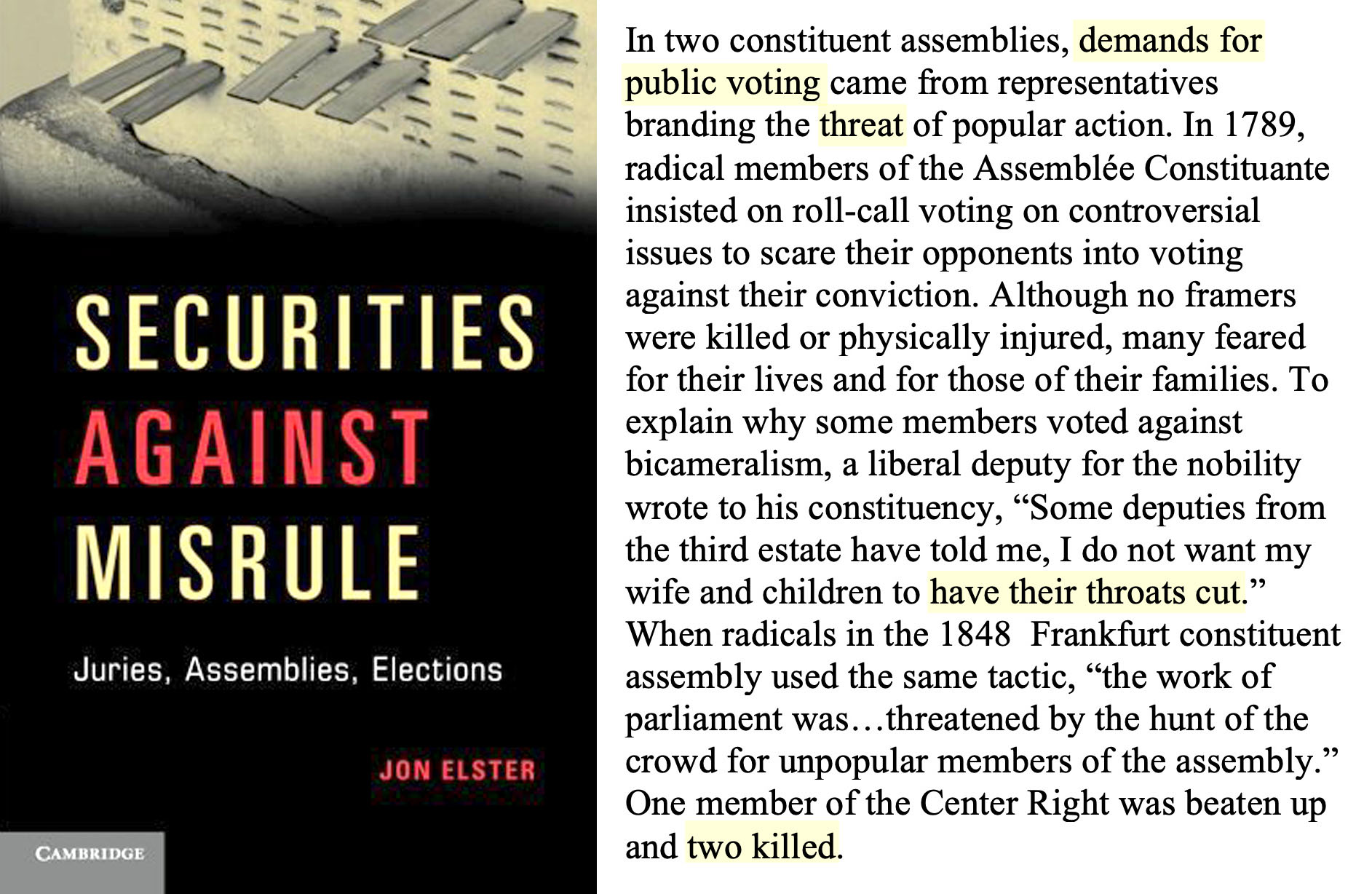
Jon Elster 2013 - Securities Against Misrule
Text: In two constituent assemblies, demands for public voting came from representatives branding the threat of popular action. In 1789, radical members of the Assemblée Constituante insisted on roll-call voting on controversial issues to scare their opponents into voting against their conviction. Although no framers were killed or physically injured, many feared for their lives and for those of their families. To explain why some members voted against bicameralism, a liberal deputy for the nobility wrote to his constituency, “Some deputies from the third estate have told me, I do not want my wife and children to have their throats cut.” When radicals in the 1848 Frankfurt constituent assembly used the same tactic, “the work of parliament was…threatened by the hunt of the crowd for unpopular members of the assembly.” One member of the Center Right was beaten up and two killed.

Jon Elster 2013 - Securities Against Misrule
Yes, it’s obvious that senators behave differently when an election is around the corner... we saw senators voting differently, drafting different types of bills, wondering and worrying more about how actions in DC would go over back home. Senators act as if voters care about the recent past, with the emphasis on recent.Garret Jones 2020
10% Less Democracy
New York Governor Andrew Cuomo’s push for same-sex marriage has been largely behind closed doors, a strategy that cedes to gay rights groups the loss that will result if legislation fails this year.Reuters 2011
Cuomo push for same-sex marriage behind closed doors
It would be hard to bring stability to anything so dynamic and open. It turns out that in any system, of these three characteristics – open, fast, stable – you can have only two. An open and fast system, like the world we live in, will be inherently unstable. A fast and stable one will tend to be closed, like China. If the system is open and stable, it will likely be sluggish rather than dynamic. Think of the nineteenth-century Austro- Hungarian and Ottoman empires: vast, open, diverse—and decaying. This “trilemma” is an adaptation of an idea of Jared Cohen’s, the technologist, who observed that computer networks must choose two of three qualities: openness, speed, and security. Economists have their own version of this idea, the “policy trilemma,” which posits that countries can have two of the following three: free-flowing capital, independent central banks, and a fixed exchange rate. They’re a bit wonkish, but all these trilemmas get at a simple notion—if everything is open and fast-moving, the system can spin dangerously out of control. Fareed Zakaria 2020
Ten Lessons for a Post-Pandemic World
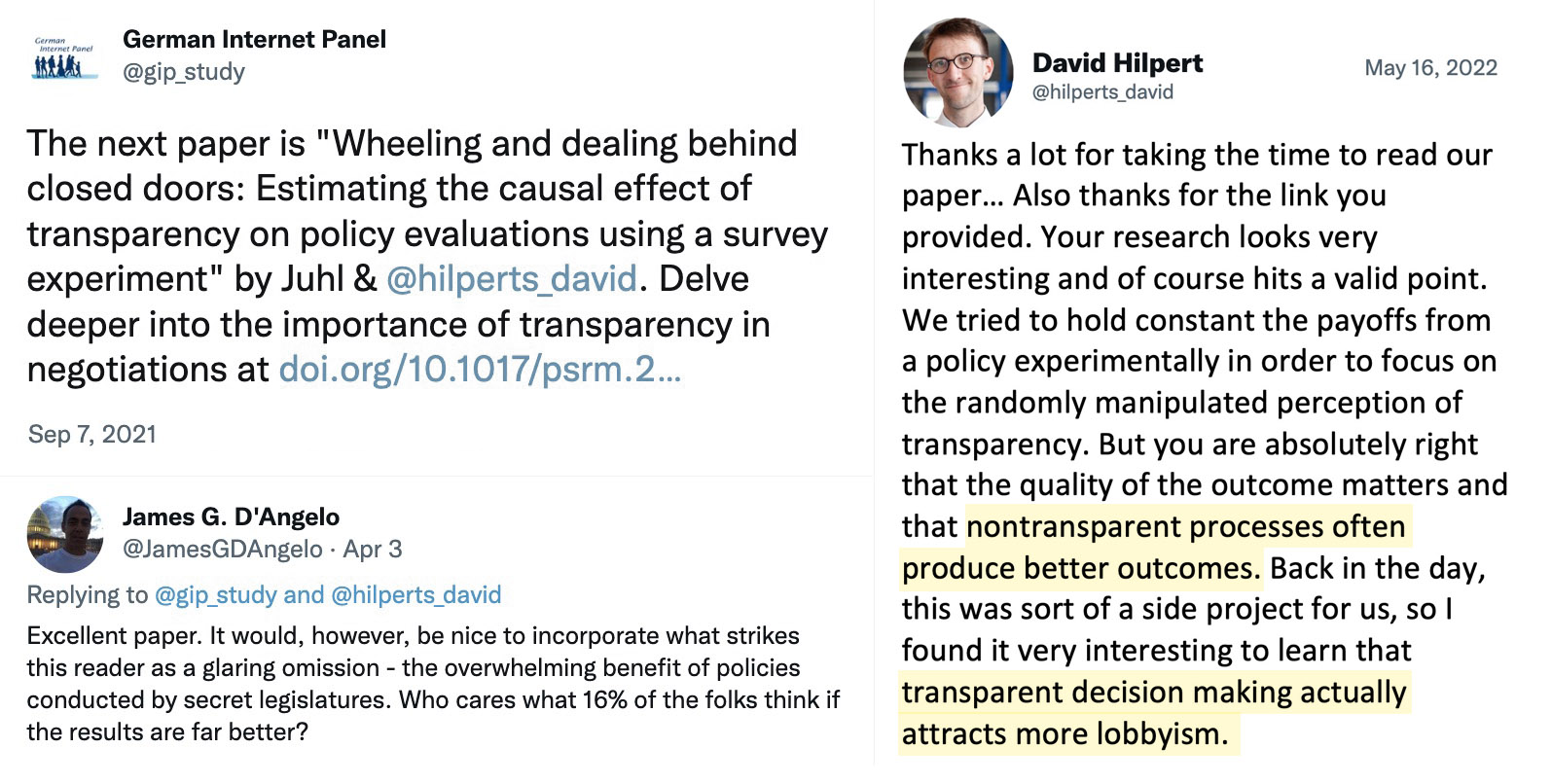
David Hilpert 2022 - The benefits of ‘nontransparency.’
Note: Academics are not accustomed to admitting mistakes or acknowledging oversights, so David Hilpert deserves credit. But when they do acknowledge mistakes it is rarely in a public fashion. I critiqued his public paper with a tweet. He responded only with a DM. And like so many folks who see the problem with sunshine, he’s clearly uncomfortable with using the word ‘secrecy,’ opting instead for the difficult word choice, ‘nontransparent.’ Paper: “Wheeling and dealing behind closed doors: Estimating the causal effect of transparency on policy evaluations using a survey experiment” by Sebastian Juhl and David Hilpert 2019.

David Hilpert 2022 - The benefits of ‘nontransparency.’
Just as no private citizen or business entity can conduct its business under constant public scrutiny, so judges, legislators or executive officials cannot conduct all public business at every step of the way in public. A considerable part of Government business relates to the formulation of policy and to the rendering of advice to the President or to agency heads. Inter-departmental memoranda, advisory opinions, recommendations of subordinates, informal working papers, material in personnel files, and the like, cannot be subject to disclosure if there is to be any orderly system of government. This may be quite frustrating to the outsider at times. No doubt all of us at times have wished that we might have been able to sit in and listen to the deliberation of judges in conference, to an executive session of a congressional committee or to a Cabinet meeting in order to find out the basis for a particular action or decision. However, government could not function if it was permissible to go behind judicial, legislative or executive action and to demand a full accounting from all subordinates who may have been called upon to make a recommendation in the matter. Such a process would be self-defeating. It is the President, not the White House staff, the heads of departments and agencies, not their subordinates, the judges, not their law clerks, and members of Congress, not their executive assistants, who are accountable to the people for official public actions within their jurisdiction. Thus, whether the advice they receive and act on is good or bad there can be no shifting of ultimate responsibility. Here, however, the question is not one of nondisclosure as to what was done, but rather whether the preliminary and developmental processes of arriving at a final judgment need to be subjected to publicity. Obviously, they cannot be if Government is to function.US Attorney General William P. Rogers 1958
The Papers of the Executive Branch
All persons agree that information which would adversely affect our national security should not be disclosed. Then too there are compelling reasons for non-disclosure in the field of foreign affairs, in the area of pending litigation and investigations which may lead to litigation, information made confidential by statute, investigative files and reports, and, finally, information relating to internal government affairs.US Attorney General William P. Rogers 1958
The Papers of the Executive Branch
Many of my colleagues in the newspaper business have leaped to the conclusion that all public affairs, not directly connected with national defense, must be conducted in the open… I disagree. I think that much of the important business in a Republican form of government will be carried on behind closed doors. I see few dangers in that. I see many advantages. For it is only behind closed doors … that most politicians – yea, even statesmen – honestly express their views and try to get at the meat of the question. I don't mean to imply that legislative voting should not be in the open, nor that the public should be denied the right to appear before all committees, nor that any legislator should be excused from explaining why he voted as he did. But I do mean that… in the National Capitol, the White House, and various Washington departments no sound policy is decided upon without frank exchange of views. And a frank exchange of views is rarely reached with the public and the press looking over the shoulders of the policy makers. The Government of Athens was an absolute and complete democracy, with all deliberations carried on in a goldfish howl of open debate. But Athens became smothered with oratory, paralyzed with demagoguery, and finally wound up with such an unstable mobocracy that nearly every able Athenian was banished from the land.Jenkin Lloyd Jones 1957
The Executive’s Right of PrivacyNote: remarks of Jenkin Lloyd Jones, formerly President of the American Society of Newspaper Editors, quoted by Attorney General William P. Rogers in Constitutional Law: The Papers of the Executive Branch, 44 A.B.A.J. 941, 942 (1958)
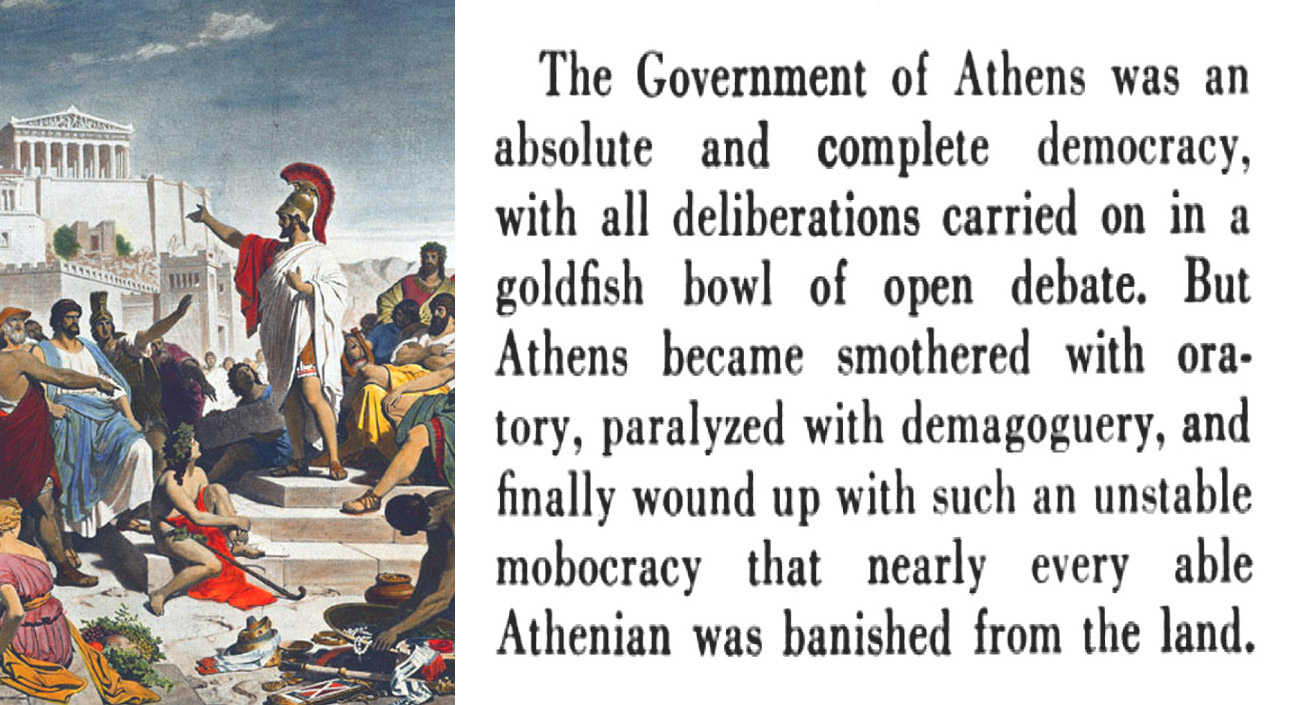
Jenkin Lloyd Jones 1957 on the failure of Greek transparency
Note: remarks of Jenkin LIoyd Jones, formerly President of the American Society of Newspaper Editors, quoted in Rogers, Constitutional Law: The Papers of the Executive Branch, 44 A.B.A.J. 941, 942 (1958)

Jenkin Lloyd Jones 1957 on the failure of Greek transparency
The picture of Athenian democracy seems like a caricature of all democratic government. How could a mob thus collected decide questions of State policy? Home affairs must have been difficult enough to deal with in an Assembly where conflicting interests were personally represented; but what when it came to foreign policy? No room for fine diplomacy here. The Government of Athens bawled its intentions on the hill-top, and then wondered that its schemes were sometimes forestalled by its neighbours.Ellen Sophia Hodgkin Bosanquet 1914
Days in Attica (Greek Democracy)
With the public and interest groups firmly opposed to most of the major options on the ‘dedistributive’ agenda, Congress and the President are well advised to build pre-negotiated packages outside the constitutional system, returning to the normal process only at the last moment… The opportunity for closed-door negotiation needs to be returned to Congress.Paul Light 1985
Artful Work - The Politics of Social Security Reform
[Romney] claimed most [Republican] party leaders share [a negative] view of the former president [Trump], but few will voice it in public. “I don’t see new people standing up and saying, ‘I’m going to do something here which may be politically unpopular’ — in public at least,” Mr. Romney said.Jonathan Martin 2022
Inside McConnell’s Campaign to Take Back the Senate and Thwart Trump
Following a decade of reform, Congress must now work in the sunshine. As Congress opened its working to the public and interest groups, the smoke-filled rooms began to disappear. Unfortunately, so did many of the closed rooms that are so important to legislative action. Under the hot lights of television, with every word in a transcript and every vote on the record, members of Congress became less willing to take a stand on painful issues. And with so many open meetings, leaders had fewer chances to sit down and talk.Paul Light 1985
Artful Work - The Politics of Social Security Reform
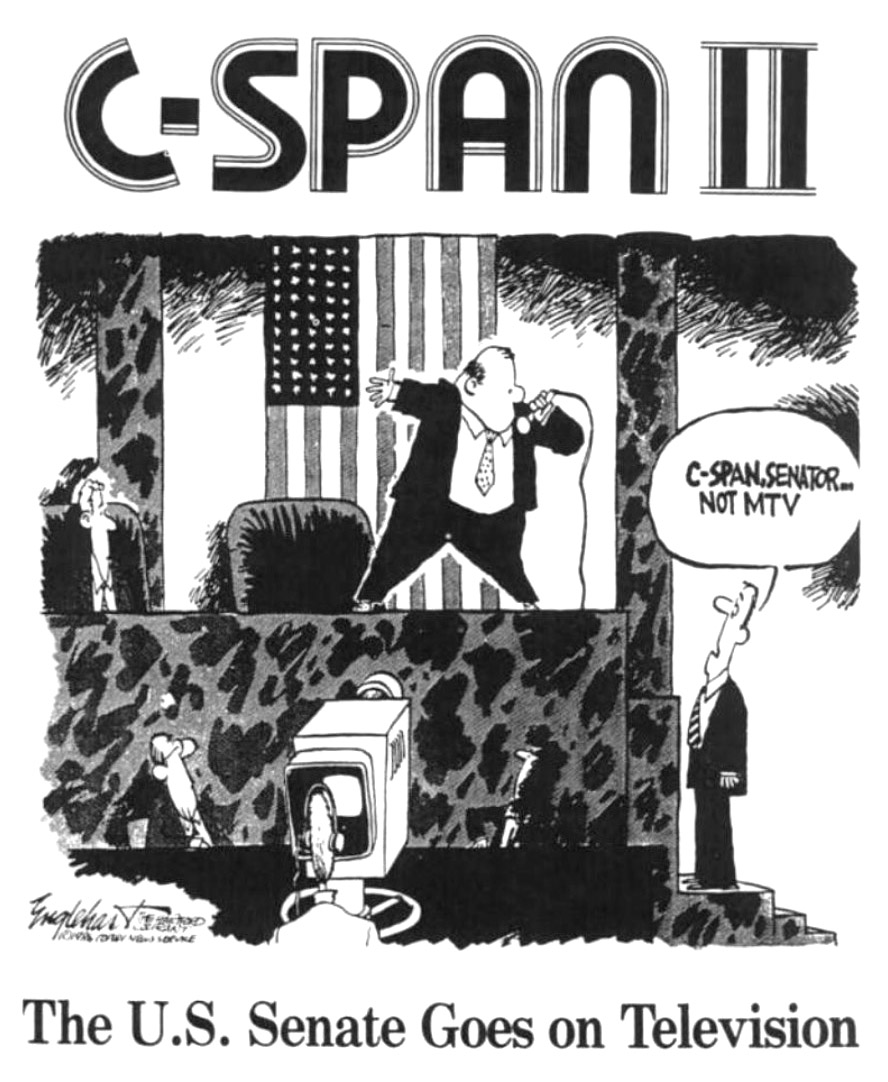
Cartoon by Bob Englehart 1987 - Most observers expected increased grandstanding with the introduction of television.

Cartoon by Bob Englehart 1987 - Most observers expected increased grandstanding with the introduction of television.
A rules change in 1975 opened all Senate committees to the public. This move provided interest groups and the news media more information with which to influence and report on the chamber’s deliberations. This significantly altered the legislative environment by making compromise more difficult. James Wallner 2013
The Death of Deliberation
It was pointed out…that it would be impossible to have any frank discussion of legal or policy matters in writing if all such writings were to be subjected to public scrutiny. It was argued, and with merit, that efficiency of Government would be greatly hampered if, with respect to legal and policy matters, all Government agencies were prematurely forced to “operate in a fishbowl.”Supreme Court 1973
Exceptions to FOIA
The issue is really how much transparency, and what kind, should apply to different aspects of government. Good, open government is not the same as a reality television show, broadcasting every move officials make and every conversation they have. On the contrary, good government actually requires certain limits on transparency.Cary Coglianese 2009
Seeing through the transparency myth
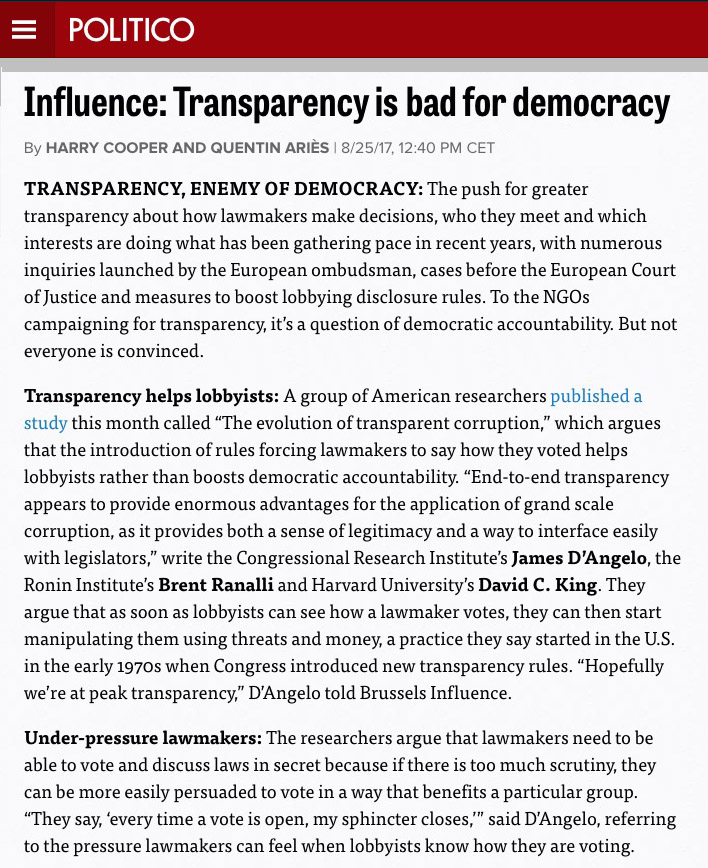
Harry Cooper & Quentin Ariés – 2017 Politico

Harry Cooper & Quentin Ariés – 2017 Politico
The reason we originally did not release this list had nothing to do with some grand Soviet-style conspiracy. Rather, we were trying to be kind and fair to people who gave up three months of their lives to help devise health-care policy. We didn’t want to subject them to the assault of lobbyists, special interests and the enthusiastic Washington press corps.Robert Pear - Quoting Robert O. Boorstin 1993
Ending Its Secrecy, White House Lists Health-Care Panel
Historians note that the expectation that government proceedings must be fully open is relatively new and that the government’s founding document — the Constitution — was drafted in secret behind guarded doors. “There is clearly strong precedent for the use of secrecy in at least some phases of the deliberation,” said David Pozen, a law professor at Columbia Law School who has studied the issue. “That seems eminently defensible as long as it is buffered by transparency at the outset about the charge and transparency at the back end about the ultimate outcome…maximal transparency is not always conducive to honest and healthy deliberations.”Carl Hulse 2020
NY Times – Impeachment Out Of Public View
The low level of transparency allows the representatives that are actually involved in policy development to accept compromises that would be difficult to defend under full disclosure of negotiation details.Cornelia Woll 2012
The brash and the soft-spoken
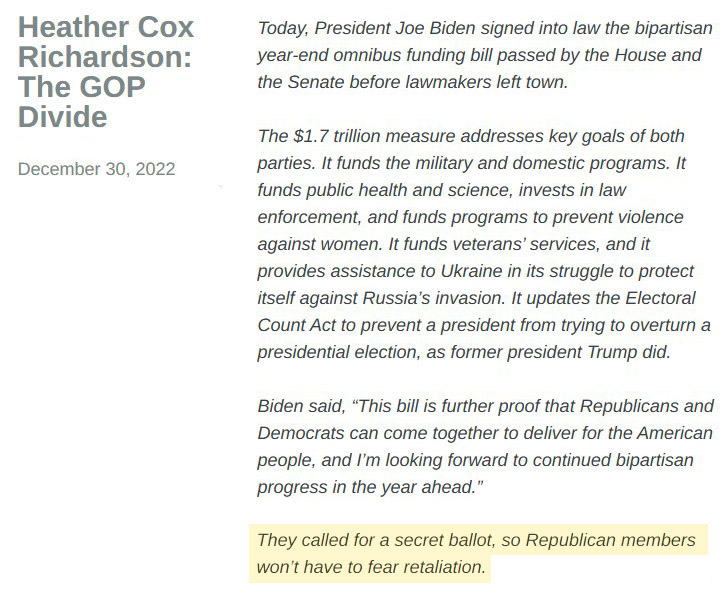
Heather Cox Richardson 2022 – The GOP Divide

Heather Cox Richardson 2022 – The GOP Divide
As Naurin (2004) has demonstrated, differences in transparency greatly affect lobbying behavior in a way that might be counter intuitive. Lobbyists do not necessarily behave ‘better’ when their activities are public, even though transparency may decrease outright corruption. But transparency also influences how much lobbyists feel accountable to the members or the groups they represent. Government representatives of associations or firms have a dual role of trying to influence the policy process and informing the group they work for of their progress.Footnote14 When transparency is low, representatives can be constructive and willing to compromise, because they do not fear to be sanctioned by their members or clients for going beyond their mandate (see also Stasavage, 2004). Such cooperation may allow continued influence, but decreases the likelihood of obtaining what one set out for in the beginning. When transparency is high, by contrast, a representative has little choice but to repeat the very narrow policy stance that was internally negotiated by the collective or firm he or she represents. High transparency thus reduces the room for cooperation among multiple stakeholders.Cornelia Woll 2012
The brash and the soft-spoken
MCEVERS: Could you give us an example of a major piece of legislation that was drafted during this time in secrecy without any public debate?
ZELIZER: Well, the Medicare legislation was passed in 1965. It’s the first major health care program that we have. The heart of legislation was worked out in the House in the ways and means committee where the chairman, Wilbur Mills, a Democrat from Arkansas, basically took an administration proposal that had been the subject of hearings, took it behind closed doors and totally transformed the bill, turning it into what we have today. And even Lyndon Johnson didn’t know exactly what was going on until one of his staffers who was in the room reported to him what the House had actually done to it. And the bill is considered really watershed legislation.Julian Zelizer 2017
Congress Has A Rich History Of Legislating In Secrecy
In the closed room of the committee, shrouded by secrecy, without interest groups or reporters present, a hallmark of this insular era in congressional politics, and with most members deferring to his expertise, Mills systematically knocked out almost every Senate amendment that increased costs, and he shifted specialist services from the mandatory to the voluntary section of the program, thus protecting the Social Security tax and reducing the number of doctors who could complain that they were included in the mandatory program. Larry O’Brien said, “There was nobody in that conference who was going to buck Wilbur Mills on the House side and probably there was little appetite to buck him on the Senate side either.”Julian Zelizer 2015
Fierce Urgency of Now
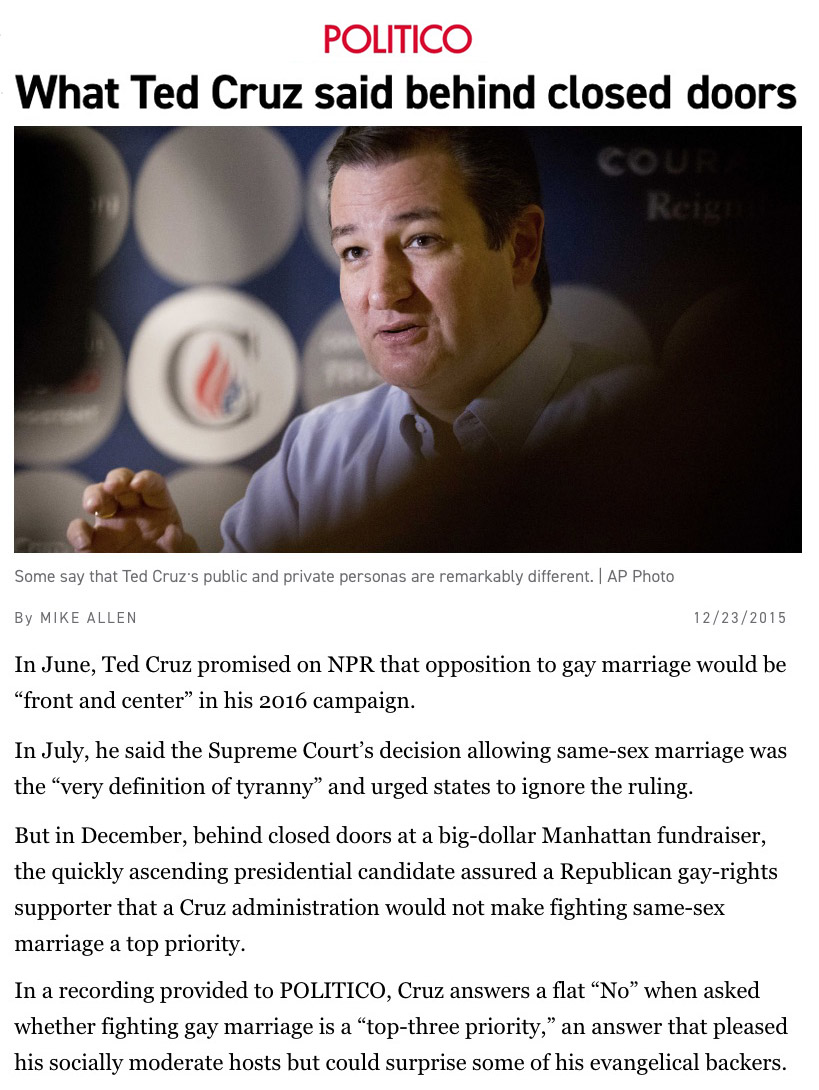
Mike Allen 2015 - What Ted Cruz said behind closed doors
TEXT: In June, Ted Cruz promised on NPR that opposition to gay marriage would be “front and center” in his 2016 campaign. In July, he said the Supreme Court’s decision allowing same-sex marriage was the “very definition of tyranny” and urged states to ignore the ruling. But in December, behind closed doors at a big-dollar Manhattan fundraiser, the quickly ascending presidential candidate assured a Republican gay-rights supporter that a Cruz administration would not make fighting same-sex marriage a top priority. In a recording provided to POLITICO, Cruz answers a flat “No” when asked whether fighting gay marriage is a “top-three priority,” an answer that pleased his socially moderate hosts but could surprise some of his evangelical backers. (Gay Rights)

Mike Allen 2015 - What Ted Cruz said behind closed doors
But now, after what had happened in the closed rooms of Ways and Means, things would be different. The federal government would be the insurer of first resort for the nation’s elderly and indigent citizens. The right to health care for the elderly and the poor had been enshrined through the Great Society.Julian Zelizer 2015
Fierce Urgency of Now
When the Senate first met, there was an assumption that they would be a closed body and that they would meet in secret. And we’ve had a battle really since the founding through today of the tradeoff between that secrecy that some people think is required for good governing and transparency and accountability which many people think is equally important for our democracy to work.Julian Zelizer 2017
Congress Has A Rich History Of Legislating In SecrecyNote: Zelizer seems to present the debate between secrecy and transparency as a popularity contest. But as an academic he should know better. This is very good work, even mathematical, to show that increased legislative transparency leads to a bad form of accountability (as it gives more power to the powerful).
A lobbyist for the U.S. Chamber of Commerce cautioned that open conference sessions could disrupt needed negotiations. “Compromise could be a little more difficult to come by. If you put a flock of Ralph Naders, John Gardners, or Sierra Clubbers in a conference room… it will make some conferees sweat.Lobbyist 1976
Reform Penetrates Conference CommitteesNote: In 1990 Sen George Mitchell pushed through the Clean Air Act Amendments – one of the most powerful pieces of environmental legislation in history – by moving his committees into secret meetings. He did so, apparently, to reduce the pressure of the environmentalists who were unable to compromise.
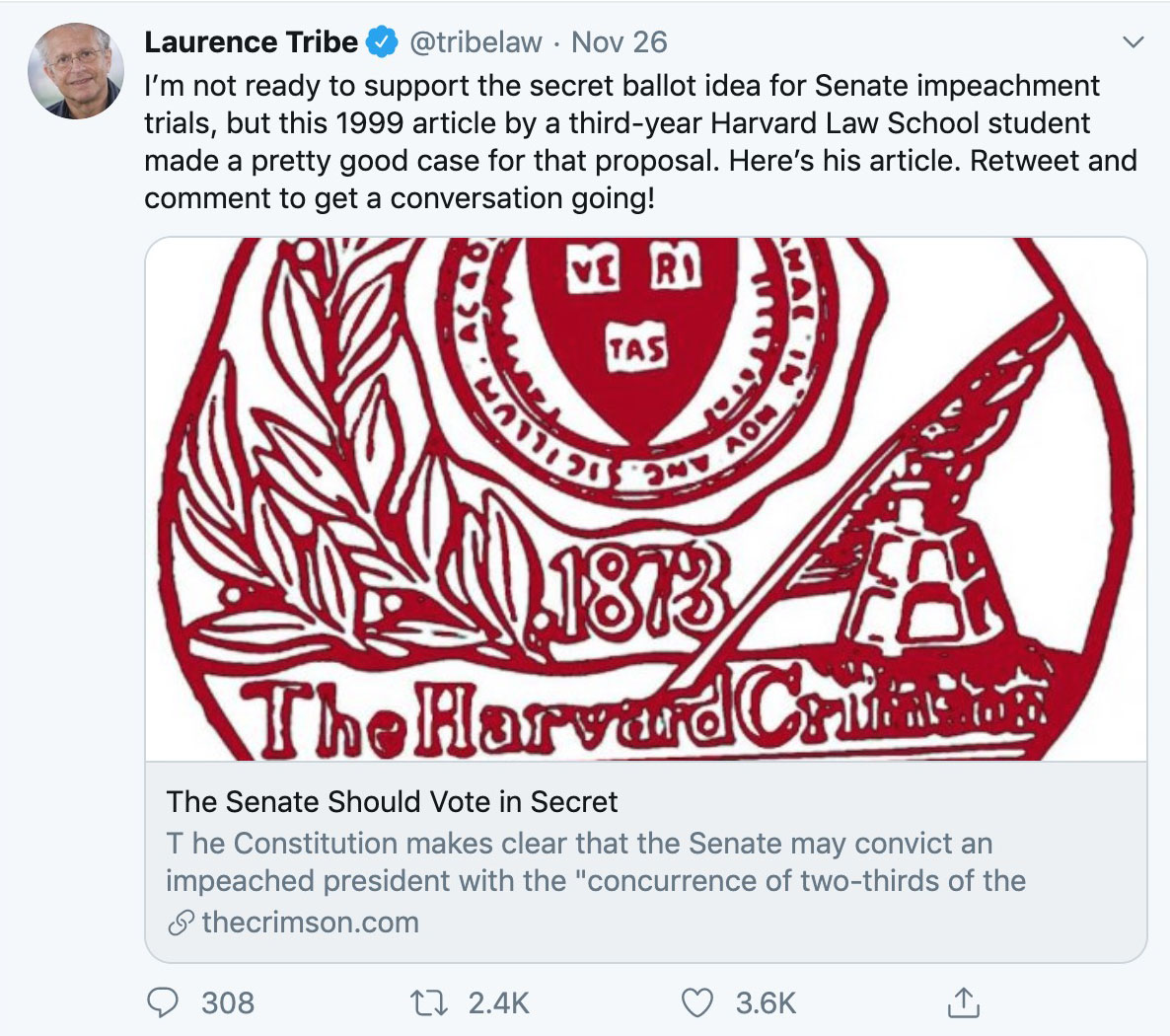
Lawrence Tribe 2019 - Twitter Post on Secret Ballots in Senate

Lawrence Tribe 2019 - Twitter Post on Secret Ballots in Senate
Access is vital in lobbying. If you can’t get in your door, you can’t make your case.Jack Abramoff 2011
The ‘Lobbyist Safecracker Method’Note: This citation pairs well with one by Lee Drutman who, when talking about lobbyists cites an old Washington adage which states “If you are not at the table, you are probably on the menu.”
Is it possible to have too much transparency? The answer is clearly yes: demands for certain kinds of transparency have hurt government effectiveness, particularly with regard to its ability to deliberate.Francis Fukuyama 2015
Why Transparency Can Be a Dirty Word
Markets and states are likely to “capture” transparency arrangements for their own goals more frequently, which will not necessarily be aligned with the original normative ideals of democracy and participation. Transparency is marketized and monopolized to gain power and profits, it is used as a form of public relations in symbolic politics, it functions in disinformation and information overflow campaigns, it is part of state and market surveillance of citizen-consumers, and it can further empower the powerful as much as the powerless.Arthur P.J. Mol 2014
The Lost Innocence of Transparency in Environmental Politics (Climate)
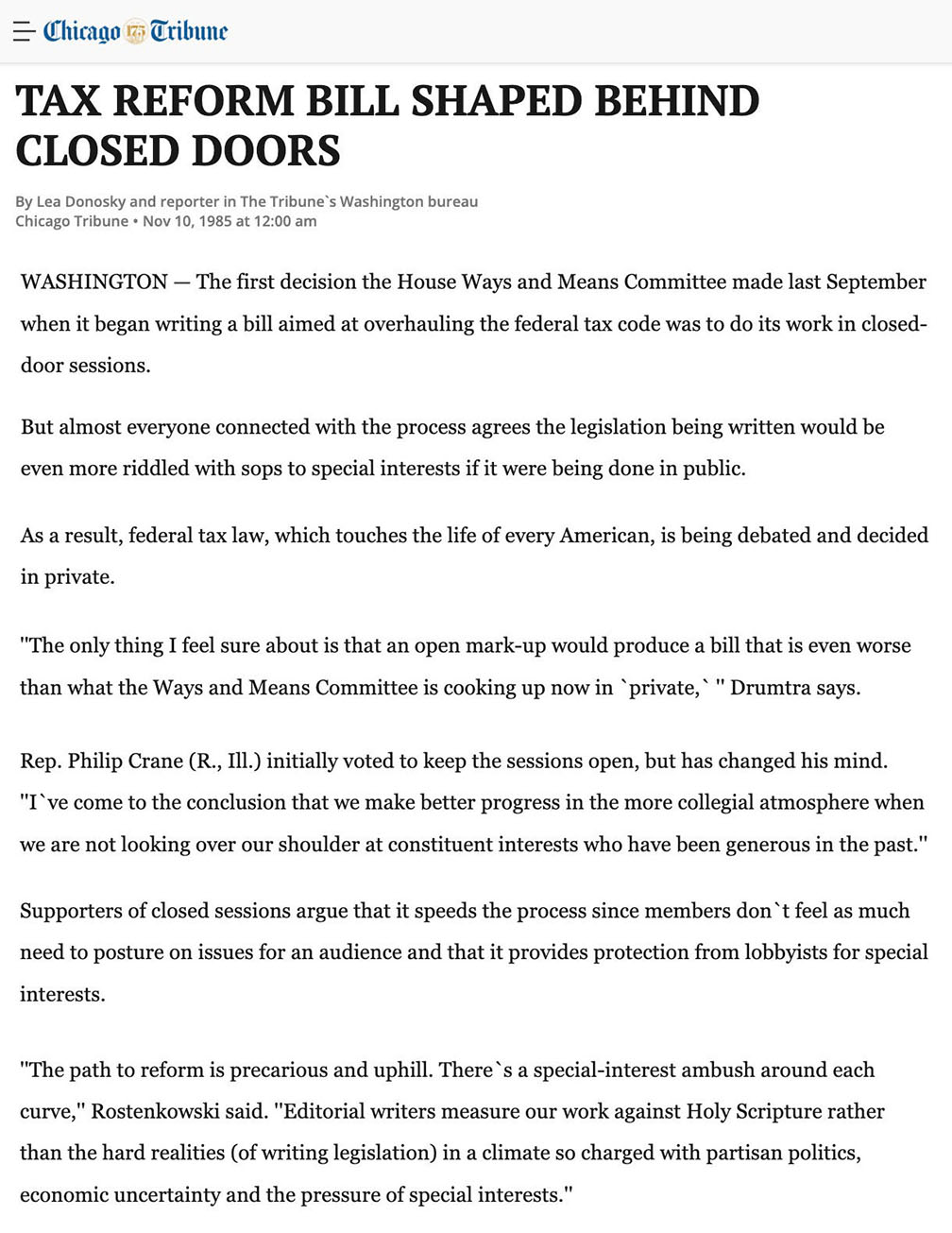
Lea Donosky 1985 - Tax Reform Bill Shaped Behind Closed Doors

Lea Donosky 1985 - Tax Reform Bill Shaped Behind Closed Doors
Lobbyist Gary Hymel stated that C-SPAN cuts his office workload in half. “We don’t have to go to the House and try to keep a mental note of what’s going on… When a bill is being debated on the House floor… we take notes, eat lunch, and drink coffee, and tape it for a permanent record.”Stephen Frantzich & John Sullivan 1996
The C-SPAN Revolution
Open mark-up sessions had limited the scope of discussions. Members, mindful of press coverage, hesitated to discuss the more extreme alternatives on the full gamut of possibilities. In decision making you can never rule out your options before you start. You have to at least consider the ridiculous extremes. Some moderate, workable approach may come out of what seemed an extreme.Sen. John Glenn (D Ohio) 1975
CQ Quarterly - Open Committees
In the “age of impeachment,” there is a tendency for “We, the people” not to reason but to intimidate and threaten with political retribution. Is there a way to mitigate this party-induced bias? Yes, the secret ballot (in Congress).Douglas Kmiec 2020
Impeachment trial could use a secret ballot
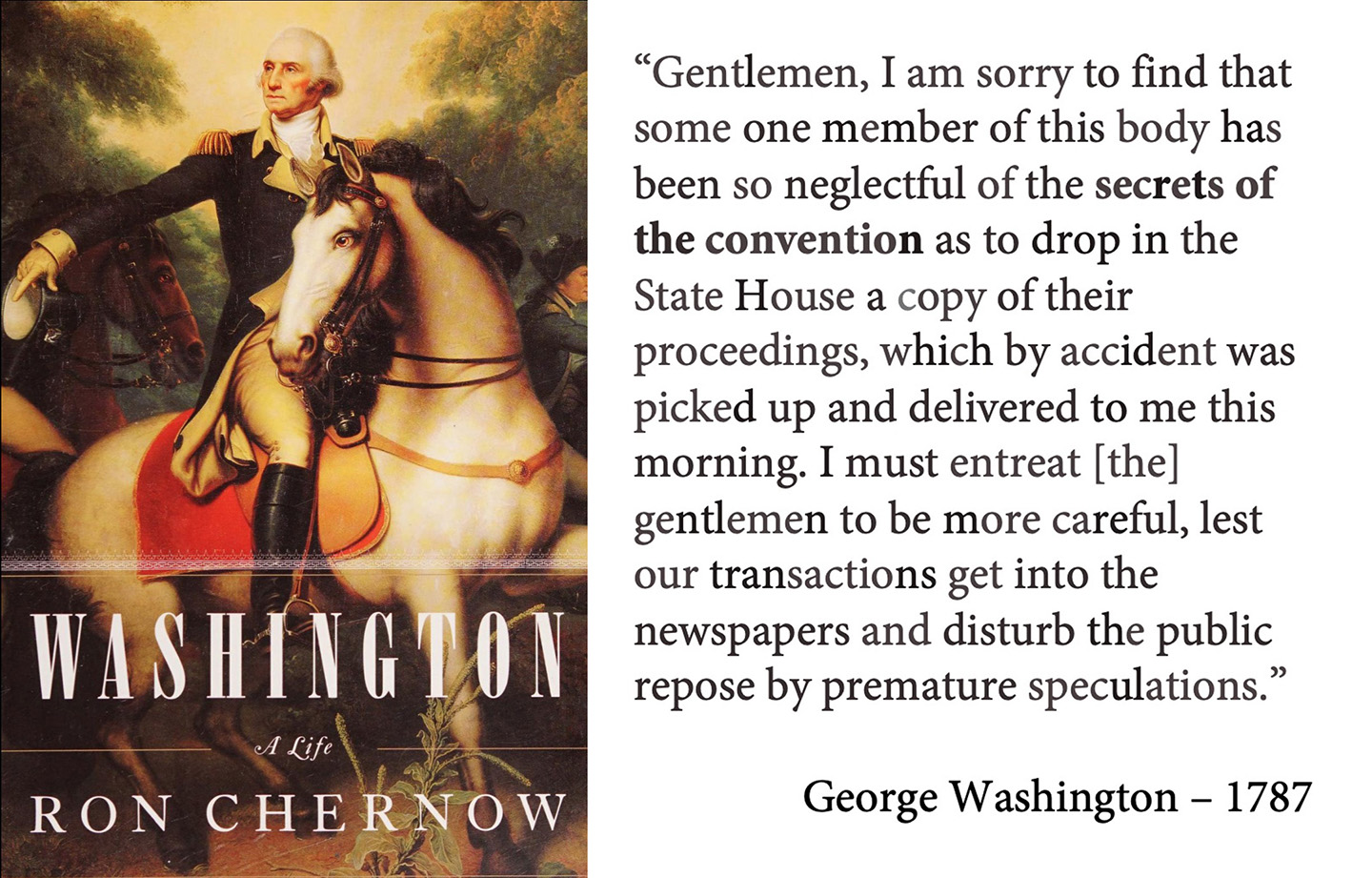
Ron Chernow 2010 - George Washington - A Life
Text: As convention president, Washington assumed a dignified and sometimes severe air. William Pierce of Georgia recounted how one day a delegate dropped a copy of some proposed resolutions. This paper was brought to Washington, who was appalled that someone had so carelessly threatened the secrecy of the deliberations. He promptly rose to chastise the delegates and, as always, had a knack for projecting suppressed wrath: “Gentlemen, I am sorry to find that some one member of this body has been so neglectful of the secrets of the convention as to drop in the State House a copy of their proceedings, which by accident was picked up and delivered to me this morning. I must entreat [the] gentlemen to be more careful, lest our transactions get into the newspapers and disturb the public repose by premature speculations.”

Ron Chernow 2010 - George Washington - A Life
The Senate rules regarding the conduct of an impeachment trial, including ballot secrecy, require a simple majority (though a two-thirds majority is required for conviction). Yes, a provision (Art. I, sec. 5) authorizes either chamber in general lawmaking to make public the “yeas and nays” if one-fifth of those present so desire. This provision, however, is subordinate to the specific constitutional provisions on impeachment, including that the “sole power to try impeachments” belongs to the Senate. The Supreme Court has made plain that it will not second-guess the rules and procedures the Senate adopts, absent an egregious disregard of due process — which a secret ballot aimed at facilitating the ability of the Senate jurors to follow their conscience free of intimidation clearly is not. Douglas Kmiec 2020
Impeachment trial could use a secret ballotNote: A number of people speculate about whether Article I, Section 5 permits a secret ballot vote in Congress, and if so for how long. Well, surprisingly the constitutional text, though dated, is fairly clear and wildly permissive of secrecy. Article I states (in its entirety): Each House shall keep a journal of its proceedings, and from time to time publish the same, excepting such parts as may in their judgment require secrecy; and the yeas and nays of the Members of either House on any question, shall, at the desire of one fifth of those present be entered on the journal. ------ The final phrase is key in that it calls for the printing of the yeas and the nays - which in the Framers’ time was not a printing of the names of the members who voted and their votes, but instead just the final counts – how many people voted for each side. So while this clause requires that the votes shall be printed, it does not require names to be attached to each vote. Further the first phrase allows for Congress to hold the Journal until they decide to publish it, which even the Framers’ day and age could mean up to fifty years of delay (as in the case of Madison publishing the notes of the 1787 convention in 1826.
How then to neutralize the organizational advantages of clientele groups in reform debates?… This often requires skillful manipulation of the procedural setting in which policy decisions are made. If open meetings are filled with lobbyists, then meetings can be closed.Eric Patashnik 2018
Reforms at Risk
Tax reform coalition leaders adopted procedural strategies to mask legislators’ individual responsibility for closing inefficient loopholes favored by powerful clientele groups. Leaders met in secret, avoided recorded votes, and adopted restrictive rules to prevent emasculating amendments, giving lawmakers the opportunity to vote for a major tax bill that offered significant rate reductions to average citizens.Eric Patashnik 2018
Reforms at Risk
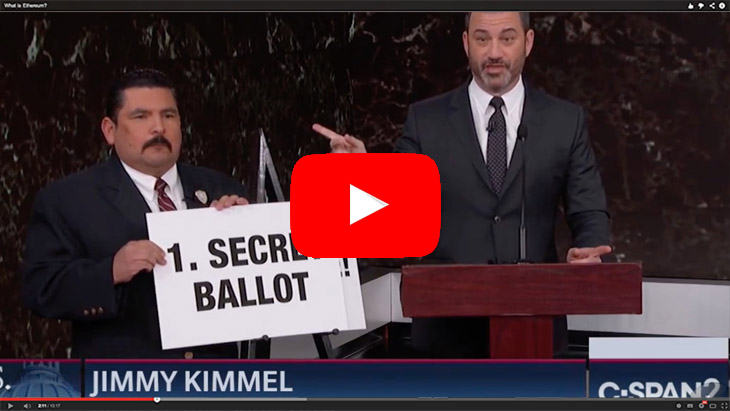
Jimmy Kimmel 2020 - Advocates secret Senate votes

Jimmy Kimmel 2020 - Advocates secret Senate votes
There is a tension between competing values in legislating. And I think one might be transparency and deliberation. A lot of the folks who study deliberation will make the argument that it’s necessary to have some degree of secrecy, it’s necessary to be able to meet behind closed doors and have candid discussions and reach agreements outside of the spotlight. Well that is at odds with our desire for transparency and to know everything that’s going on at all times and for it to be blasted out over social media. So in some ways though those competing values – the demand for increased transparency may very well be one of the reasons why deliberation has become harder, because as soon as a member of strays from an established position, that becomes broadcast everywhere.Peter Hanson 2017
Legislative Branch Capacity Working Group
The story of the passage of the [1970 Clean Air] Act would likely surprise even well-informed students of environmental legal history: many of its most important provisions were the product of tobacco-smoke-filled, closed-door deliberations filled primarily with decided nonenvironmentalists. In fact, some of its most significant innovations, such as national standards, came from the conservative Nixon Administration itself. Furthermore, the dedicated early enforcement of the Act, which made it legitimate and lasting, came by the hands of Nixon-appointees.Brigham Daniels, Andrew P. Follett & Joshua Davis 2020
The Making of the Clean Air Act (Climate)
The different incentives when an audience is watching have counterintuitive implications that extend beyond analyzing a shutdown. Consider government transparency, or so-called “sunshine laws.” These have benefits, but they may also have downsides: By introducing an audience to the dealmaking of government, we also introduce new possibilities for breakdown — by pandering to or performing for that audience, the bargainers may fail to reach a deal. Similar arguments were made for the secrecy of the proceedings of the 1787 Constitutional Convention; the public didn’t see anything of the Constitution until after the convention had concluded. If Trump and the Democratic leadership could be truly alone in a room, or even a car lot, perhaps the outcome would be quite different. But in Washington, D.C., today, chock full of cameras and reporters, bargaining continues to fail, and the federal government remains partially shut down.Oliver Roeder 2019
We’re all to Blame for the Shutdown
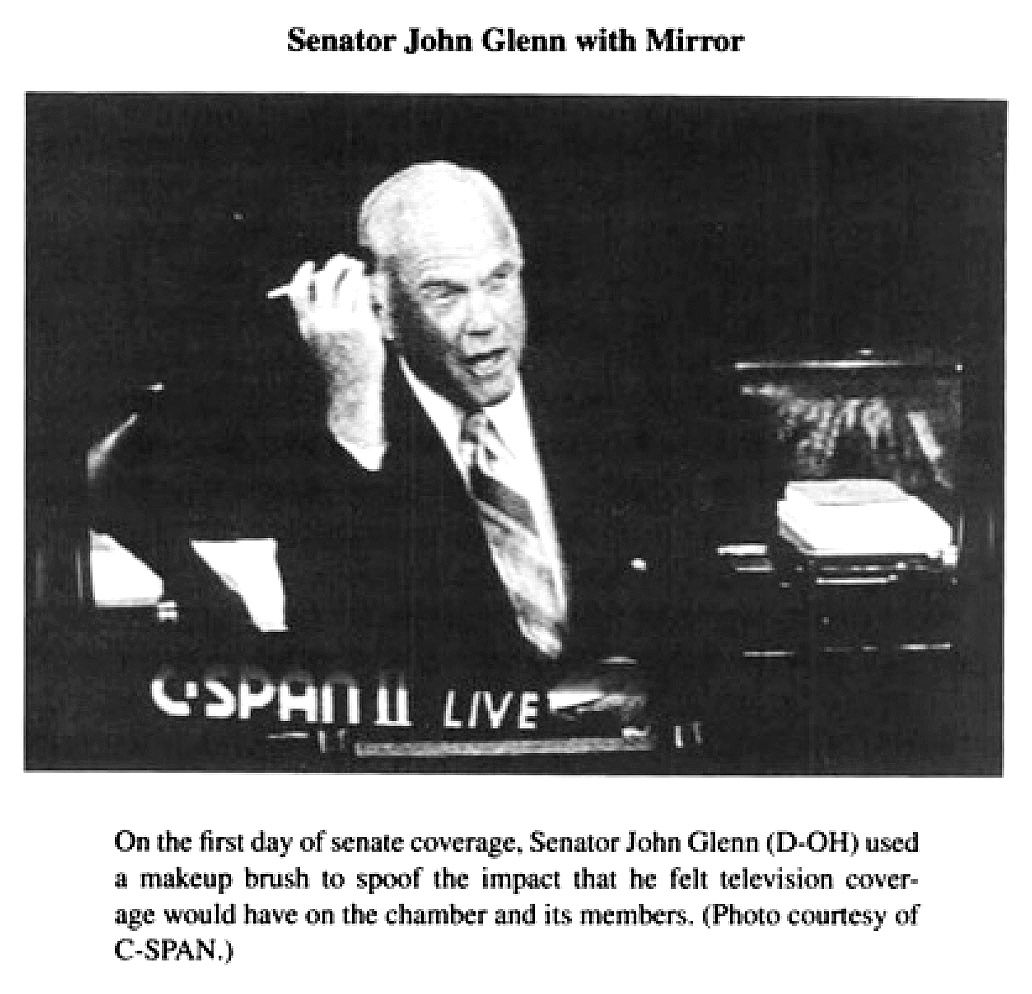
1986 Senator John Glenn suggests that Senators will start preening and performing for the television

1986 Senator John Glenn suggests that Senators will start preening and performing for the television
Our private hearing was much more constructive than the public hearing. Public hearings are a circus. That’s why I don’t like to do them. I mean, it’s a freak show.Rep Trey Gowdy (R-SC) 2018
Face the Nation
Republican Senators Conrad Burns (R-Mont.), Chuck Hagel (R-Neb.) and Frank Murkowski (Alaska) worried that senators would play to the television cameras and that would affect the debate. John McCain (R-Ariz.) called it “partisan posturing.” Republicans such as Mitch McConnell of Kentucky thought senators “are more reasonable” in a private setting. Robert Bennett (R-Utah) felt “a whole lot more comfortable” without the TV coverage.Marjorie Cohn 2000
Open-and-Shut: Senate Impeachment Deliberations Must Be Public
Many senators congratulated themselves for the high level of discourse in the secret deliberations. This sentiment was underscored by Chief Justice Rehnquist at the end of the trial: “I have been impressed by the quality of the debate in closed session on the entire question of impeachment as provided for under the Constitution.” Marjorie Cohn 2000
Open-and-Shut: Senate Impeachment Deliberations Must Be Public
Donald Trump met his match, again, Wednesday on Capitol Hill: secret ballots. “Having outsiders meddle in insider elections never goes well,” said John Feehery, a GOP consultant who served as a leadership aide for 10 years. “And Trump is the ultimate outsider, and, frankly, most members don’t like him very much.” Trump has far and away more endorsements than any other 2024 Republican presidential contender, but by early September that total represented only about a third of the House GOP caucus. Many of the remaining Congress members would prefer a different nominee but are too afraid of the ex-president’s wrath to get behind another political horse. But Massie said the public nature of the slow-rolling, alphabetical roll call on the House floor might give some members pause about voting for Scalise, with outside pressure potentially turning people away. “I went into this thinking that Jordan has more public support,” Massie said. “Scalise has more private support.”Paul Kane 2023
Trump-backed hopefuls face tough foe in leadership races: Secret ballots
One month before the impeachment deliberations began, Senate parliamentarian Robert B. Dove had told an interviewer, “Deliberations in an impeachment trial are never open.” ... One of those 19th century rules that opened each day’s trial session in the Clinton case, was the admonition of the sergeant at arms: “All persons are commanded to keep silence, on pain of imprisonment.”Marjorie Cohn 2000
Open-and-Shut: Senate Impeachment Deliberations Must Be Public
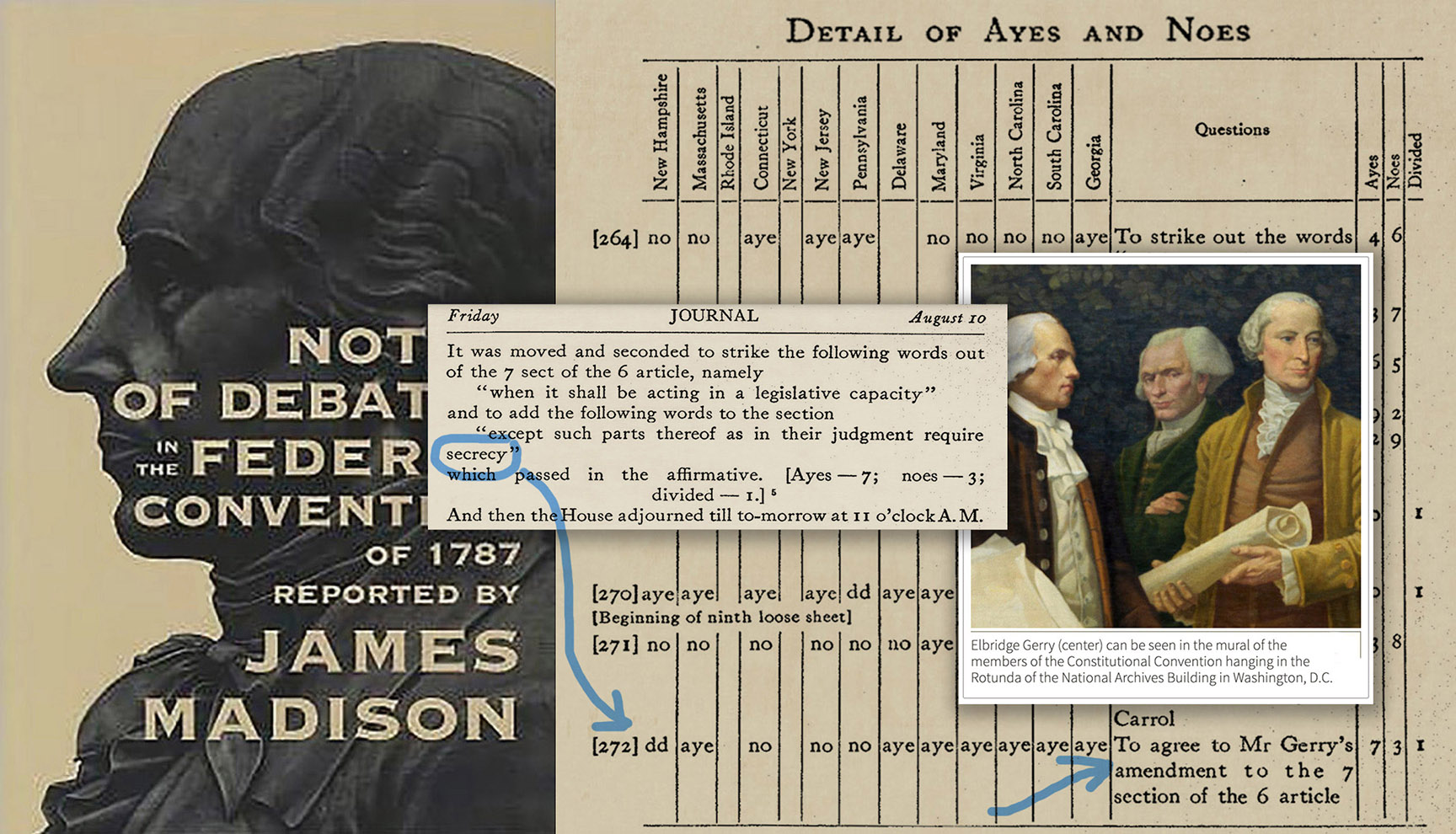
James Madison 1787 - Gerry’s ‘Secrecy’ Amdendment
Text: On August 10th 1787, Eldridge Gerry proposes an amendment to add the word "Secrecy" to Article 1. This clause, which still exists in Article 1, Section 5, Clause 3 of the Constitution and it provides a constitutional right to secrecy – secret ballot, closed doors, voice votes – for Congress. Madison jotted a note about it in his Records of the Constitutional Convention: “It was moved and seconded to strike the following words out of the 7 sect of the 6 article, namely ‘when it shall be acting in a legislative capacity’ and to add the following words to the section ‘except such parts thereof as in their judgment require secrecy’” After they tallied the votes, and the amendment passed 7-3-1, Madison referred to this change as ‘Mr. Gerry’s Amendment.’ So while reformers continually reference a mythical ‘right to know’, few realize that the opposite, a Constitutional Right to Secrecy, is enshrined on the first page of the Constitution. And the use of secrecy was roundly endorsed by Madison, Washington, Hamilton and others.

James Madison 1787 - Gerry’s ‘Secrecy’ Amdendment
In a regime of secrecy, interest groups cannot observe legislators expending effort on their behalf. They can thus never be sure the legislator has carried out her end of the bargain. Knowing this, the interest group is unlikely to enter a bargain in the first place. Opacity thus eliminates one source of political inequality, as it renders a legislator unable to credibly commit to fulfilling her side of an exchange.Brian Kogelmann 2021
Secret Government: The Pathologies of Publicity
The secrecy of modern-day jury deliberations is well-settled in most jurisdictions. In judicial proceedings, the deliberations have been closed to the public, and indeed to television cameras, except in tightly controlled experiments by CBS and PBS. The workings of the early jury were described by William S. Holdsworth as “divine.” He wrote, “when the jury was first introduced the method by which it arrived at its verdict inherited the inscrutability of the judgments of God. Benjamin Cardozo worried in 1933, “Freedom of debate might be stifled and independence of thought checked if jurors were made to feel that their arguments and ballots were to be freely published to the world.”Marjorie Cohn 2000
Open-and-Shut: Senate Impeachment Deliberations Must Be Public
[During the 1986 Tax Reform] Policymakers were able to overcome opposition to compromise and reach a deal. They did this by using private negotiations. The committees resorted to convening in private no less than three times during the 1986 negotiations. In the House, they met in a closed-door weekend session to hammer out the final compromise bill. In the Senate, a few key members met in secret to develop a final proposal for the committee over a weekend after having specifically, and publicly, promised no action on the bill. Sarah E. Anderson, Daniel M. Butler, Laurel Harbridge-Yong 2020
Rejecting Compromise: Legislators’ Fear of Primary Voters
The open hearings and mark-up sessions encouraged by the reform movement were one example of the changed environment. In 1973, some 30 percent of committee meetings were closed to the public, but in 1975 only 2 percent were closed. Lobbyists and special interest representatives took advantage of open meetings to press their cases. As one member of the committee observed, “Open meetings put special interests into the process and gave them an active input.” Another member commented disapprovingly that at one markup session, several members of the committee “went down and sat in the audience and talked with a specific interest and wrote an amendment, came back up and offered it.” Donald R. Kennon & Rebecca M. Rogers 1989
Ways and Means a Bicentennial History 1789-1989
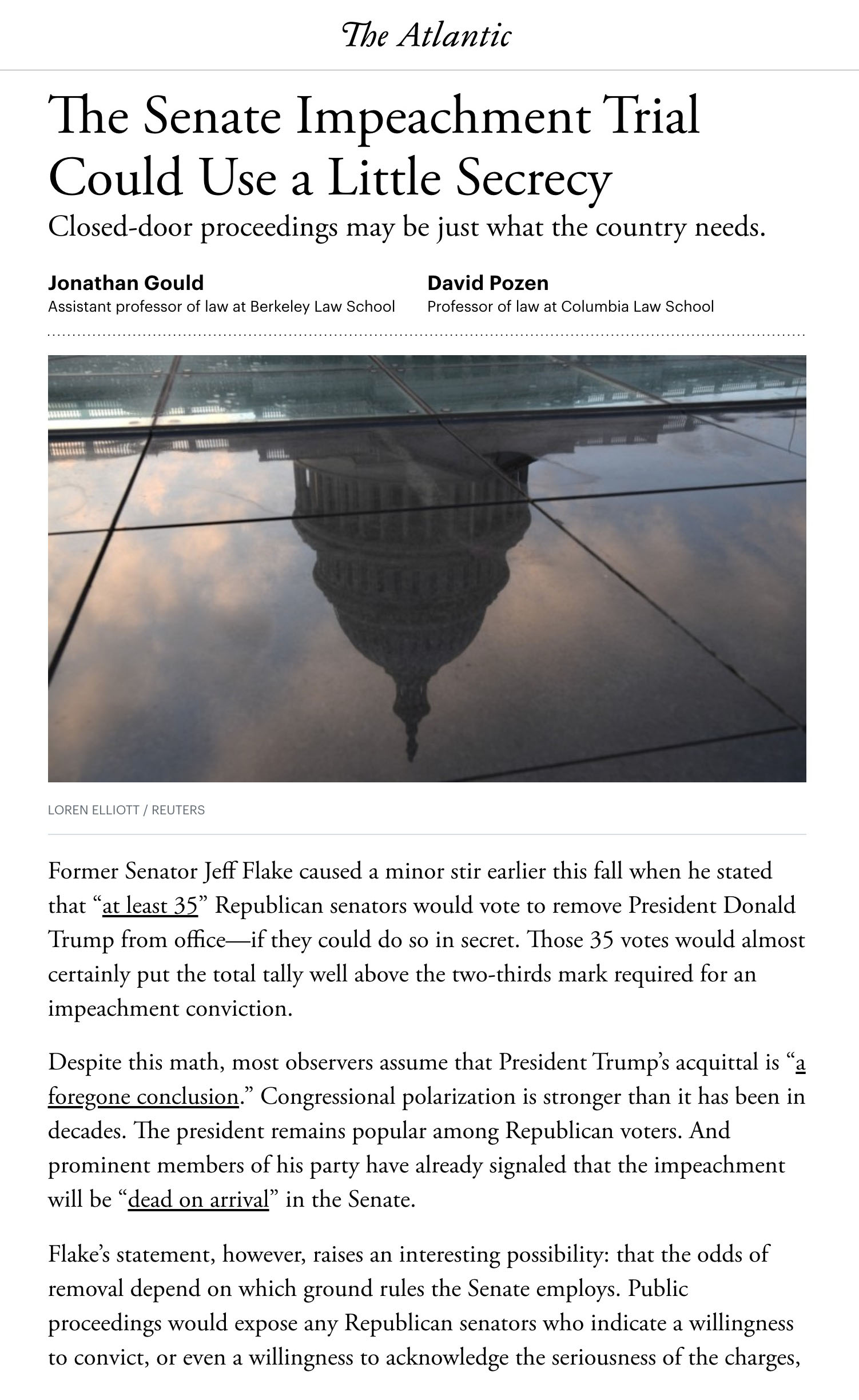
John Gould and David Pozen 2019
Closed-door proceedings may be just what the country needs

John Gould and David Pozen 2019
Closed-door proceedings may be just what the country needs
Closed meetings facilitate getting the House’s work done, and public sessions often turn into wastes of time.Rep. Omar Burleson 1957
Advocates of OpennessNote: This citation, from a member of Congress, takes place a decade before Congress opened all its committees.
If President Obama and House Speaker John Boehner's closed-door meetings aimed at solving the fiscal cliff crisis trouble anyone, you'd expect it to be the open-government watchdogs who routinely bark their outrage at public officials who work overtime to avoid public scrutiny. But Obama and Boehner's secret meetings (they held another at the White House on Monday) and one-on-one phone calls have been the case of the watchdogs that haven't barked. Open-government advocates aren't necessarily troubled by the closed meetings — unlike, say, conservative anti-tax activist Grover Norquist, who has inveighed against Obama holding talks behind closed doors. Let's be realistic, government-transparency advocates say: It stands to reason that sometimes leaders need to meet privately to reach an agreement.Frank James (NPR) 2012
Open-Government Watchdogs OK With Closed-Door Fiscal Cliff Talks
The increase in transparency brought two marked changes: a substantial increase in the number of issues debated, and a seismic increase in what is euphemistically known as "messaging.”
James D’Angelo 2019
Transparency is a Weapon
There are situations – and they are sometimes the most difficult and most important ones where such highly publicized meetings offer the least promising of all methods of negotiating. An atmosphere of drama is inevitably generated when the spotlights of all the world are focused… Such an atmosphere may well be a public relations officer’s dream, but a negotiator’s doom.Lester B. Pearson 1955
Democracy in World Politics
The “Non-Markups.” Prior to the “sunshine” reforms of the early 1970s, Congress typically developed legislation in closed committee sessions with attendance confined to members, their staffs, and invited executive branch officials. The Trade Act procedures made it possible to turn back the clock, to return to this earlier, easier way of doing things. Meetings on trade implementing legislation were, in form, advisory – it was the administration, under the Trade Act of 1974, that controlled the language of the implementing bill on which Congress would act. So they were not directly governed by the procedural reforms which applied to regular legislative business. And both congressional and executive branch participants preferred closed sessions, for they rendered the issues politically more manageable for the committees, and for STR as well.Allen Schick 1981 (edited Norm Ornstein & Thomas Mann)
The New Congress
We have now had a half-century of experimenting with more open processes. How is that working out? When greater transparency in Congress arrived in the 1970s, did that mean special interest had more power or less? There’s a simple (if imperfect) test. If special interests had less power, then it would not have been worthwhile to invest as much in lobbying, so more transparency should have been followed by a reduction in lobbying. Of course, the reverse is what actually happened: Lobbying rose dramatically in the 1970s, and has risen further since then. Apparently, greater political openness makes spending on lobbying more worthwhile, not less.Timothy Taylor 2019
When Special Interests Play in the Sunlight
Well, going back to the seventies and opening up committees, who attends? You try to reach out to a broad public, but the people who show up are the people who have a stake in the outcome. And so as we open up committees what that opens Congress up to, is more pressure from organized interests, because they’re the ones with the strongest incentive to pay attention. And so you want to reach your constituents, you want to reach that broader audience, but most Americans are not that tuned into public affairs. And we don’t want to ask too much of that of that broad public. And as we try to reach out and make the system more representative and more accountable, we wind up making it less representative – and accountable to organized groups as opposed to that broad public.Frances Lee 2019
Select Committee on the Modernization of Congress
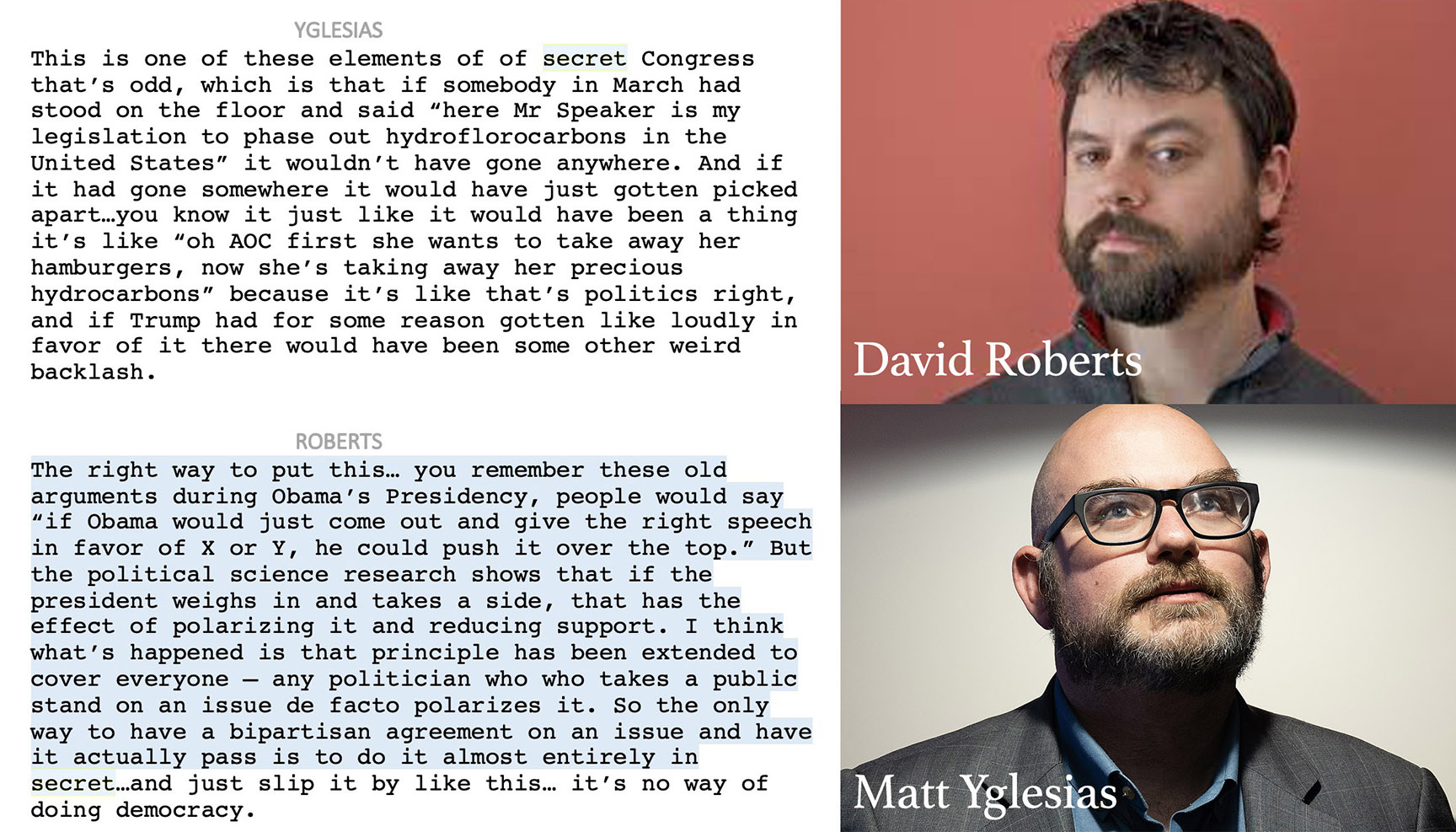
David Roberts & Matthew Yglesias 2020 - The Climate and Secret Congress
Text: YGLESIAS This is one of these elements of of secret Congress that’s odd, which is that if somebody in March had stood on the floor and said “here Mr Speaker is my legislation to phase out hydroflorocarbons in the United States” it wouldn’t have gone anywhere. And if it had gone somewhere it would have just gotten picked apart…you know it just like it would have been a thing it’s like “oh AOC first she wants to take away her hamburgers, now she’s taking away her precious hydrocarbons” because it’s like that’s politics right, and if Trump had for some reason gotten like loudly in favor of it there would have been some other weird backlash. ROBERTS The right way to put this… you remember these old arguments during Obama’s Presidency, people would say “if Obama would just come out and give the right speech in favor of X or Y, he could push it over the top.” But the political science research shows that if the president weighs in and takes a side, that has the effect of polarizing it and reducing support. I think what’s happened is that principle has been extended to cover everyone – any politician who who takes a public stand on an issue de facto polarizes it. So the only way to have a bipartisan agreement on an issue and have it actually pass is to do it almost entirely in secret…and just slip it by like this… it’s no way of doing democracy.

David Roberts & Matthew Yglesias 2020 - The Climate and Secret Congress
Lobbyists and journalists report an increasing use of C-SPAN for monitoring the political process. During the early C-SPAN era, when Washington, D.C . lacked cable service, lobbying organizations dominated the list of subscribers to Capitol Connection. Today C-SPAN plays continuously in the background in most lobbying offices. As one trade association lobbyist pointed out: “I sit in my office every morning, watching C-SPAN.”Stephen Frantzich & John Sullivan 1996
The C-SPAN Revolution
A low level of deliberative quality under conditions of publicity involves what Chambers calls “plebiscitory reasoning” in which “arguments… become shallow, poorly reasoned, pandering, or appeal to the worst we have in common.” By contrast, behind closed doors, where pressures of public opinion are reduced and other governing logics, deriving from the possibility of agreement, set in, we can expect other deliberative virtues – such as some open-mindedness as well as listening and respect – to flourish more fully. André Bächtiger & Simon Beste 2017
Deliberative Citizens, (Non)Deliberative Politicians: A Rejoinder
“We’ve held open markups for the past four or five years,” a subcommittee aide said. “We had every intention of holding an open markup this year, until we were inundated with people [lobbyists]. We closed it because there were so many people in the halls and in our offices that two policemen couldn’t get order... We couldn’t work with all those people breathing down our necks.”Irwin B. Arieff 1979
Sunshine Backers See New Secrecy Trend
As Brent Ranalli, James G. D’Angelo, and David C. King have argued, when Congress made the votes on committees public, they empowered lobbyists to contract more effectively with members of Congress – or at least to monitor and pressure them more effectively. When the votes were secret, it was hard to know whether a deal was respected. With sunlight, everyone knows who upheld the bargain . That effect thus lowers the cost of contracting; lower the cost and you get more contracting aka, corruption.Lawrence Lessig 2018
America Compromised
Through the open committee hearing, an institution of comparatively recent origin, the lobbyist now is able to speak with authority to Congress for the group or organization he represents. The open committee hearing has worked a revolution in lobbying methods. It has permitted the lobbyist to have access to members of Congress through the front instead of the back door, and has given to the title “legislative agent” something of a professional standing. In the proposal for registration of lobbyists, many of them see a welcome recognition by Congress of the new dignity of their calling and of the importance of the part they now play in the making of legislative decisions.CQ Reports 1928
Changing Character of Washington Lobbies
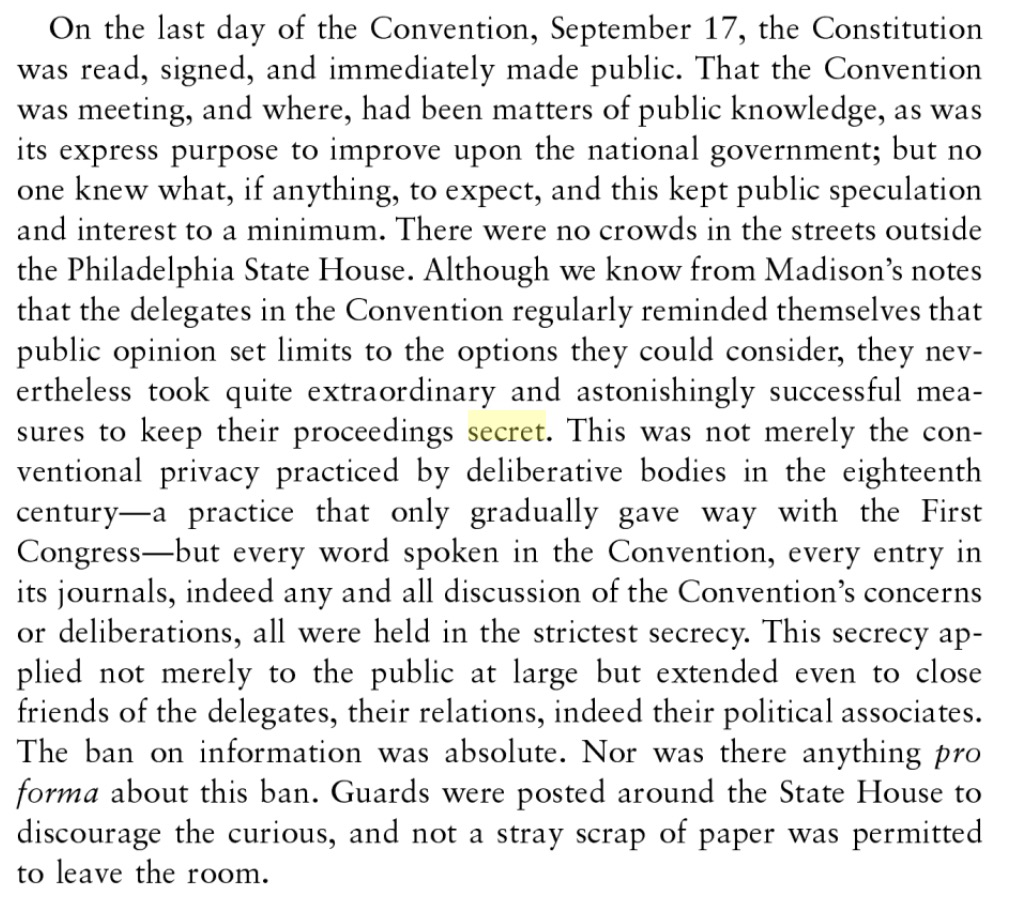
Michael Meltzer 2005 - On secrecy at Constitutional Convention

Michael Meltzer 2005 - On secrecy at Constitutional Convention
The dark side of global transparency, sees forces spreading hatred, conflict, and lies. This darker side of transparency is less noted but, unfortunately, it will be at least as influential in the coming decades. Global transparency will indeed bring many benefits, but predictions that it will lead inevitably to peace, understanding, and democracy, are wrong. Kristin M. Lord 2006
Perils and Promise of Global Transparency
Government secrecy is at times not only legitimate but indispensable.Sissela Bok 1982
Secrets - On the Ethics of Concealment
Transparency changes the power structures in modem society. The information overload calls for organizational actors who have the relevant resources to process, analyze, evaluate, and act upon the huge amount of information created by transparency mechanisms. Those capacities especially lie with large companies, official auditing bodies, or professionalized non-governmental organizations.Vincent August & Fran Osrecki 2019
Der Transparenz Imperativ
Transparency is a highly problematic tool as it often does not live up to its promises, let alone to the hopes many actors associate with it. Transparency is, under specific circumstances, able to enhance accountability and align the behavior of the watched to external standards. However, it often produces a massive amount of bureaucratization, it reduces efficiency, intensifies distrust, privileges resourceful actors, and thus undermine s exactly those goals it promises to achieve.Vincent August & Fran Osrecki 2019
Der Transparenz Imperativ
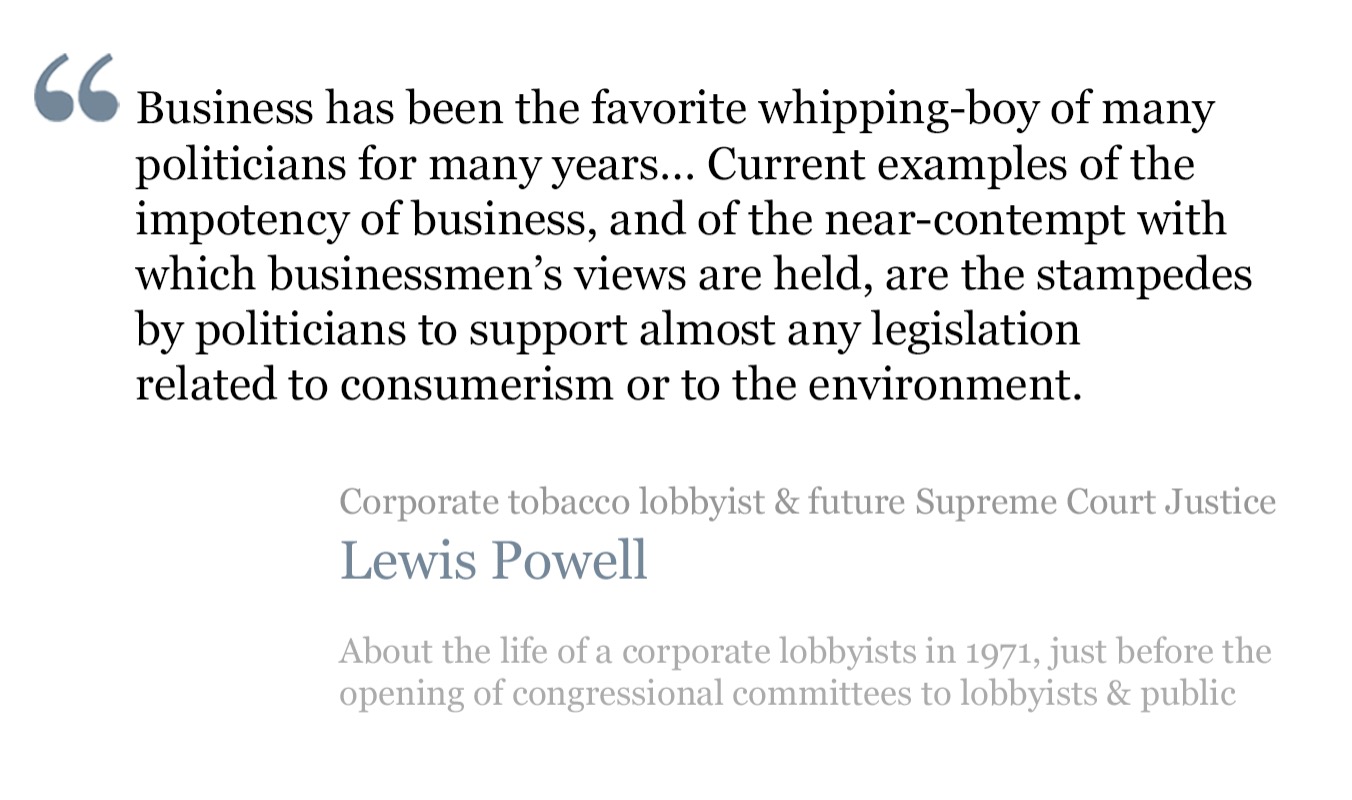
Lewis Powell 1971 - The Powell Memo

Lewis Powell 1971 - The Powell Memo
One of the earliest rules established by the Convention restrained the members from any disclosure whatever of its proceedings, a restraint which will not probably be removed for some time. I think the (secrecy) rule was a prudent one not only as it will effectually secure the requisite freedom of discussion, but as it will save both the Convention and the Community from a thousand erroneous and perhaps mischievous reports.James Madison 1787
Letter to James Monroe
The 1970s reforms that opened up congressional committees and the House floor have yielded disappointment and dysfunction on a larger scale. Initiated in earnest with the enactment of the 1970 LRA, these reforms are now believed by many to have contributed to an increase in special interest influence and a decline in institutional comity and capacity. The glare of publicity made it more difficult for members of Congress to negotiate with each other in candid, creative, and productive ways; rising levels of partisanship since the 1970s aggravated this difficulty. Lobbyists, moreover, no longer had to wait in the lobby during markup sessions and other committee meetings. While these meetings were in theory thrown open to all, only deep-pocketed outfits were able to send representatives—and to punish or reward legislators based on what the legislators said or how they voted—in any systematic fashion. By the 1980s, members and observers of Congress were routinely asserting that laws like the LRA, “which had opened up committee legislative drafting sessions to the public in order to dilute the power of business lobbyists, had precisely the opposite effect. They enabled business lobbyists to monitor the votes of each elected official more closely.”David Pozen 2018
Transparency’s Ideological Drift
Negotiation benefits from privacy. Yet democrats today cannot have too much of transparency.Jane Mansbridge 2015
Solutions to Polarization (Persily)
(If the Senate deliberations were televised) there would be less attention to legislative work and more to publicity seeking, there would be less time spent in committee and more on the floor, and the Senate floor would become an arena in which to register unrestrained advertisements of self instead of being held in reserve for the occasional registration of intensely held minority opinions and interests.Richard Fenno 1989
The Senate through the Looking Glass - The Debate over Television
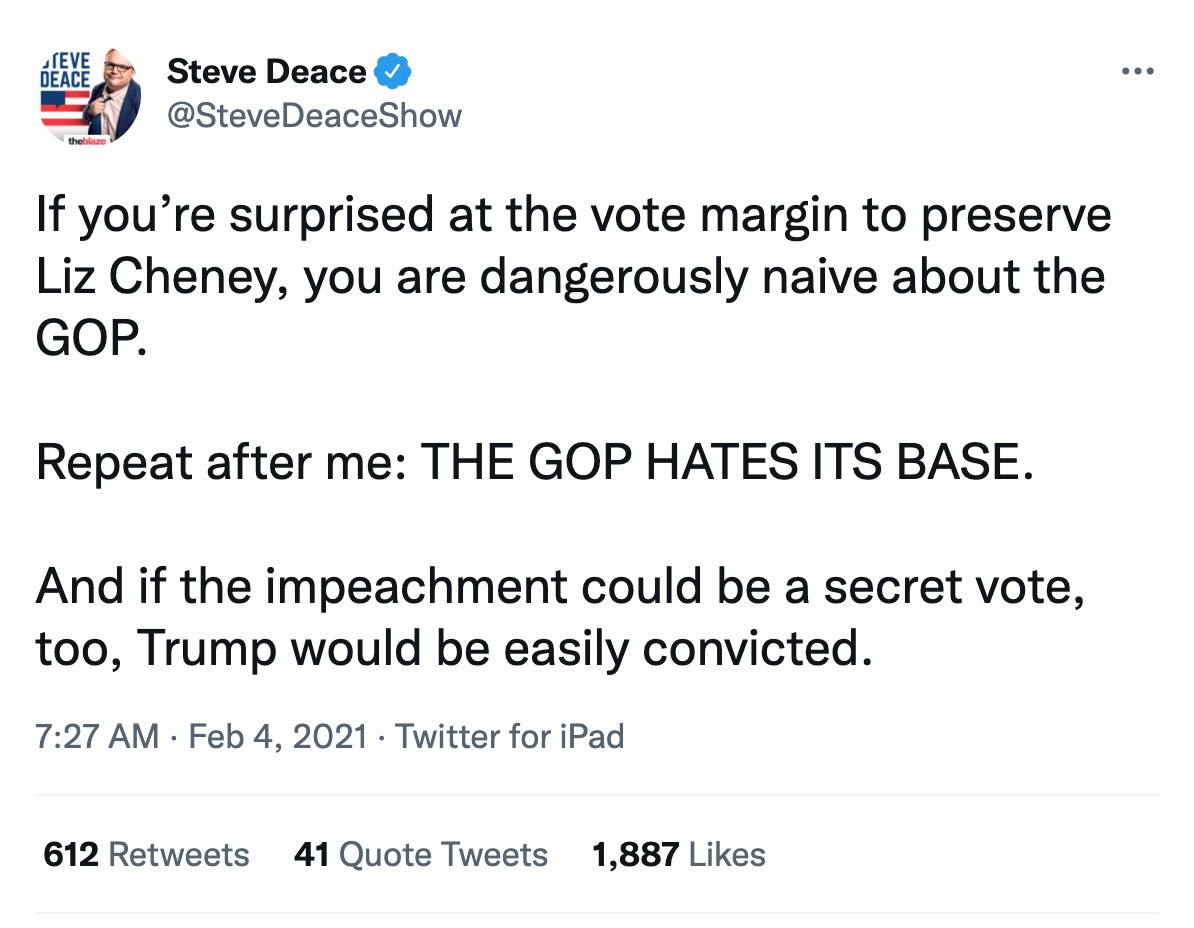
2021 Liz Cheney retains leadership role via secret ballot despite attacks on Trump

2021 Liz Cheney retains leadership role via secret ballot despite attacks on Trump
The theory that ‘diplomacy should proceed always frankly and in the public view’ has led to negotiation being broadcast and televised, and to all rational discussion being abandoned in favour of interminable propaganda speeches addressed, not to those with whom the delegate is supposed to be negotiating, but to his own public at home.Sir Harold Nicolson 1953
The Evolution of Diplomatic Method
The framing of the Constitution was an occasion for debate, for discussion, and even for discord. And yet, when the hall fell silent and the document was presented in its final form, there was near unanimity. All but a handful of the delegates were prepared to endorse and defend the proposed constitution. To facilitate candor, they had conducted their deliberations in secret, behind closed doors, beyond the purview of the general public.Paul A. Rahe 1994
Republics Ancient and Modern, Volume III
The opening up of the legislative process can make lawmakers much more directly accountable to interest groups whose support they may need for reelection. Lobbyists, after all, now actually sit in on committee markup sessions. This may constrain the policymaking efforts of lawmakers to actions that serve the interests of narrow groups at the expense of the broader public good.Joseph Bessette 1994
Mild Voice of Reason
Many Republicans will say privately that they understand the science, but if they talk about climate change publicly they will prompt a primary challenge from the right — so they stay quiet, at best, or join the obstructionists in questioning the science. There has been no major change in climate science since 1979; what has changed is the politics.William K. Reilly 2018
The Term “Republican Environmentalist” Is Not an Oxymoron
In the ‘70s, when we got the voting machines and we got the damn camera (television in the House)… The camera means that the person who’s rewarded in terms of the viewing audience is the person who gives the most strident, vivid speech…. We’ve lost out a lot with the camera, because it emphasizes combat and drama rather than a thoughtful analysis of issues.Rep. David Obey 2010
Obey surveys House then and now
Former Republican US Representative, Trey Gowdy tells Face the Nation that closed door hearings work far better and public hearings are circus – July 24, 2018
Former Republican US Representative, Trey Gowdy tells Face the Nation that closed door hearings work far better and public hearings are circus – July 24, 2018
Secrecy allows better governmental decision-making and more effective national security protections and law enforcement.Mark Fenster 2006
The Opacity of Transparency
The primary users of the Freedom of Information Act are not journalists and crusaders seeking to reveal illicit activities; they are businesses seeking to find out what government regulators are up to and what their competitors have disclosed to government agencies. Similarly, Congressional reforms requiring publicly recorded committee votes are not of most use to the news media or constituents; they help lobbyists verify whether targeted officials have lived up to their promises to vote for or against major amendments.Thomas Edsall 2011
Putting Political Reform Right (NYTimes, FOIA)
The reforms of the 1970s helped to facilitate stronger partisanship in Congress, as members used the more open process to score political points against their opponents. By making it easier to force roll-call votes, the reforms made it possible for members to design amendments to embarrass members of the opposing party. Such votes on hot-button issues could then be shared with the campaign committees, so members could claim that their opponents had voted against a balanced budget, for forced integration, and other matters. Similarly, the televising of the House and other transparency reforms of the 1970s were also very useful to a minority party seeking to force its issues into public view. As Republicans seized these opportunities, Democrats adopted more creative procedures to clamp down and restrict opportunities to participate. The feedback loop worked in favor of increasing centralization of power in the leadership. House leaders now govern the House floor with a much heavier hand than they did in the 1970s. In the words of forty-year Republican Congressional staffer Don Wolfensberger, “Every time you have a change in party control, the party in the minority says, ‘If we get in the majority we’re going to be more fair and open.’ They get into the majority, and it’s even more restrictive than it was.”Casey Burgat 2015
Order in the House?
George Washington University political science professor Sarah Binder suggests that increased political gridlock is a direct, yet unanticipated, result of the [sunshine] reforms passed in the 1970s.Casey Burgat 2015
Order in the House?
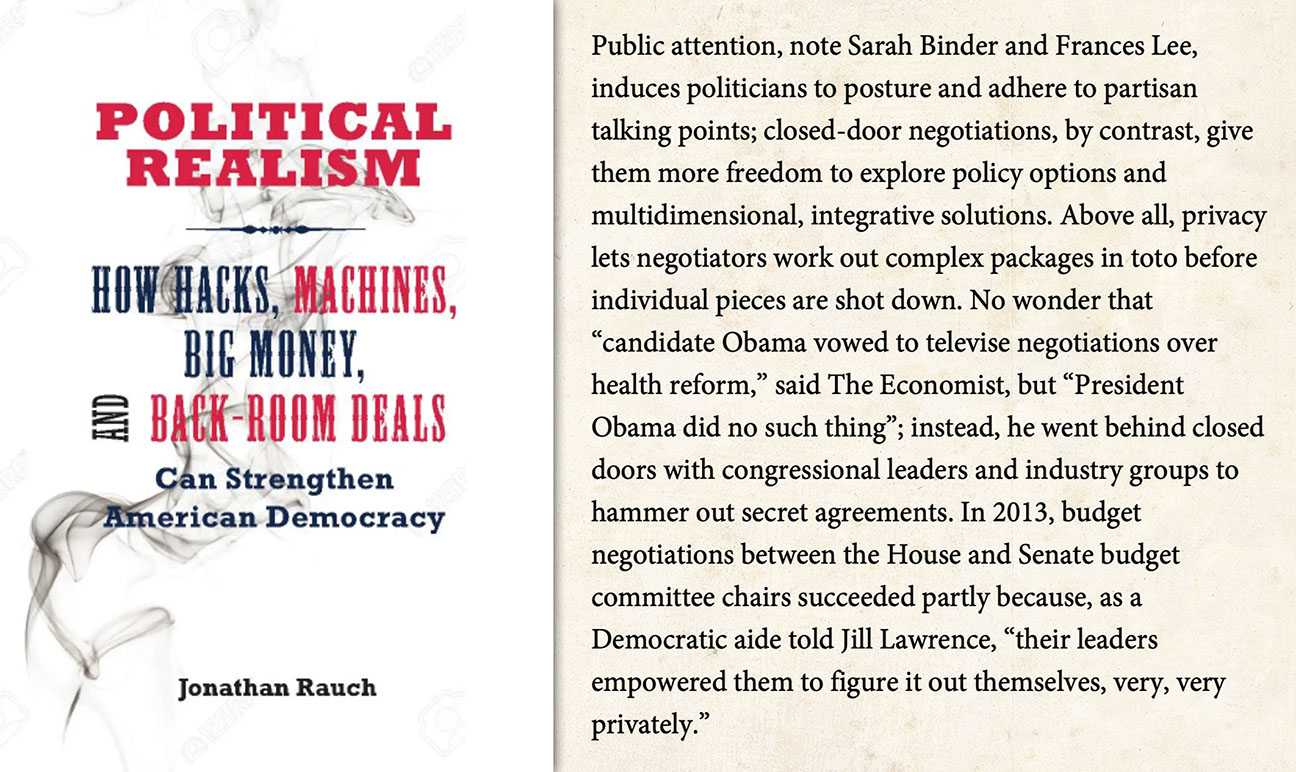
Jonathan Rauch 2017 - Is Congress Broken (Obamacare Secrecy)

Jonathan Rauch 2017 - Is Congress Broken (Obamacare Secrecy)
Most members genuinely want[ed] to do what they thought was in the national interest if they could. That wasn’t always easy to do, however. But it was easier to do before the passage of the Sunshine laws [which required that public business be conducted in the open]. When an interest group came in, you would say, “Gosh darn, I tried to support you. I really did. The chairman bent my arm.” Then, to protect yourself, you would tell the chairman that when those guys came in, to tell them that you really fought hard on their issue.Sen Robert Packwood 2003
Future of Freedom
Do governmental transparency policies generate net positive impacts? What once might have seemed a rhetorical question has now become a point of contention. Scholars and pundits increasingly caution against the unanticipated consequences of transparency and the dangers of too much transparency. Several have even questioned transparency’s positive transformative impact more generally. To a degree, this questioning is as healthy as it is consistent with attitudes and research: from enthusiasm to growing awareness of unanticipated consequences and, now, introspection surrounding transparency’s worth.Gregory Michener 2018
Gauging the Impact of Transparency Policies
“It’s a real dilemma for liberal reformers,” says Jeff Drumtra, director of the Tax Reform Research Group, an arm of Ralph Nader’s Public Citizen organization. “When you look at recent tax bills, the best ones have come out of closed sessions. You take what you can get and hope someday you can get a good bill at an open meeting.”Pamela Fessler 1985
Rewriting Tax Code Behind Closed Doors
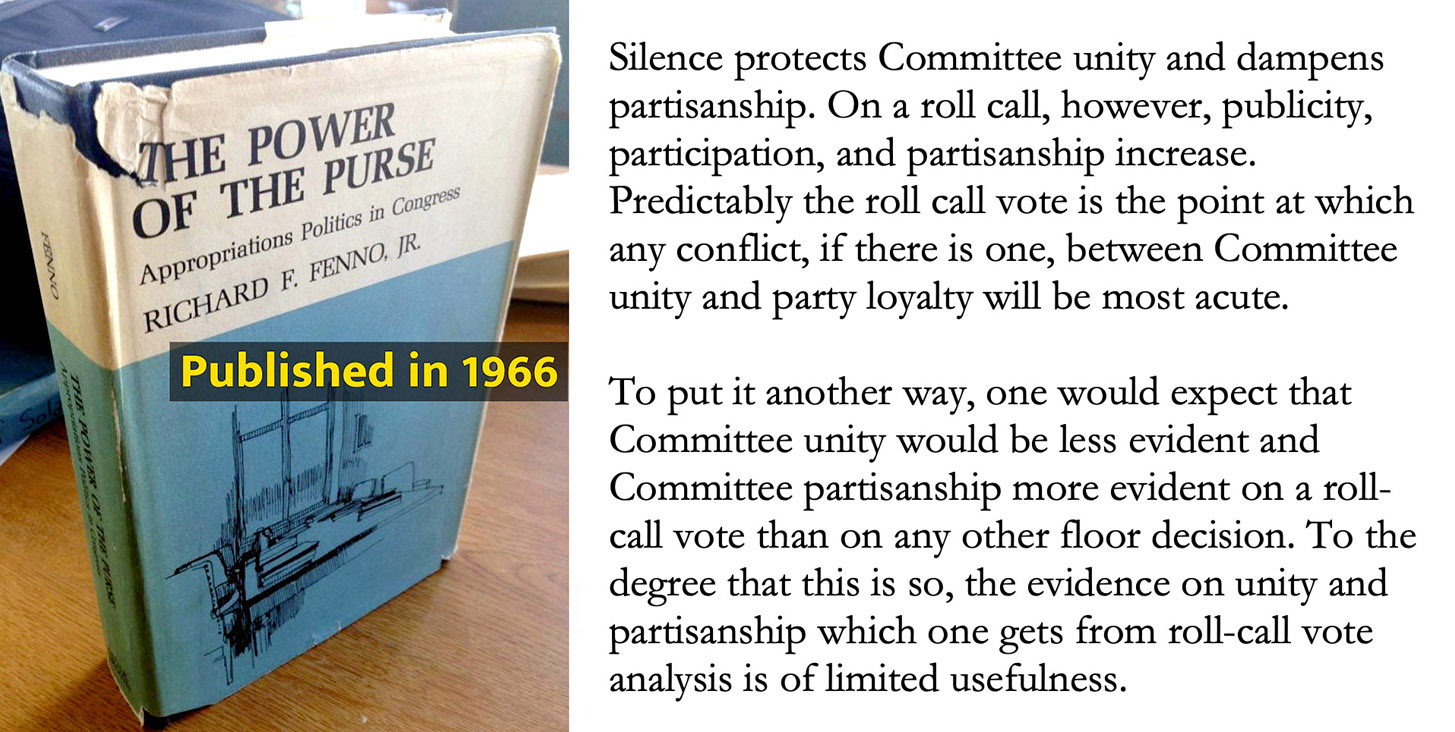
Richard Fenno 1966 - Power of the Purse
Text: Silence protects Committee unity and dampens partisanship. On a roll call, however, publicity, participation, and partisanship increase. Predictably the roll call vote is the point at which any conflict, if there is one, between Committee unity and party loyalty will be most acute. To put it another way, one would expect that Committee unity would be less evident and Committee partisanship more evident on a roll-call vote than on any other floor decision. To the degree that this is so, the evidence on unity and partisanship which one gets from roll-call vote analysis is of limited usefulness.

Richard Fenno 1966 - Power of the Purse
One example of how a closed session provides protection from special interests came when the committee voted to give banks even better tax treatment than they now enjoy… In the initial recorded vote, only one Republican member of the panel voted against the more favorable treatment for banks. But when the committee voted a second time and decided to reverse the decision, it did so on a voice vote (secret vote). Neither the public nor the bank lobbyists waiting in the hallway knew who changed sides.Lea Donosky 1985
Tax Reform Behind Closed Doors
Nobody can say what sort of constitution would have emerged if the convention had been open to the public… [But, had] Madison’s notes been published before the states held their ratifying conventions, the Constitution would never have been adopted. The dialogue contained far too much that would have been seized upon by demagogues.Irving Brant 1990
The Constitution and the Right to Know
There never was any legislative assembly without a discretionary power of concealing important transactions, the publication of which might be detrimental to the community.James Madison 1788
The First Amendment and the Public’s Right to Know
But neither Patrick Henry nor George Mason advocated “divulging indiscriminately all the operations of government.” Patrick Henry, the ardent libertarian, acknowledged that “such transactions as relate to military operations or affairs of great consequence, the immediate promulgation of which might defeat the interests of the community, I would not wish to be published, till the end which required their secrecy should have been effected.” Mason further explained: The reason urged in favor of this ambiguous expression was, that there might be some matters which require secrecy.”… Thus, even the two most vociferous advocates of the public’s “right to know” did not entertain the notion that the public’s interest in access to governmental information was unconditional or unqualified. Daniel M. O’Brien 1980
The First Amendment and the Public’s Right to Know
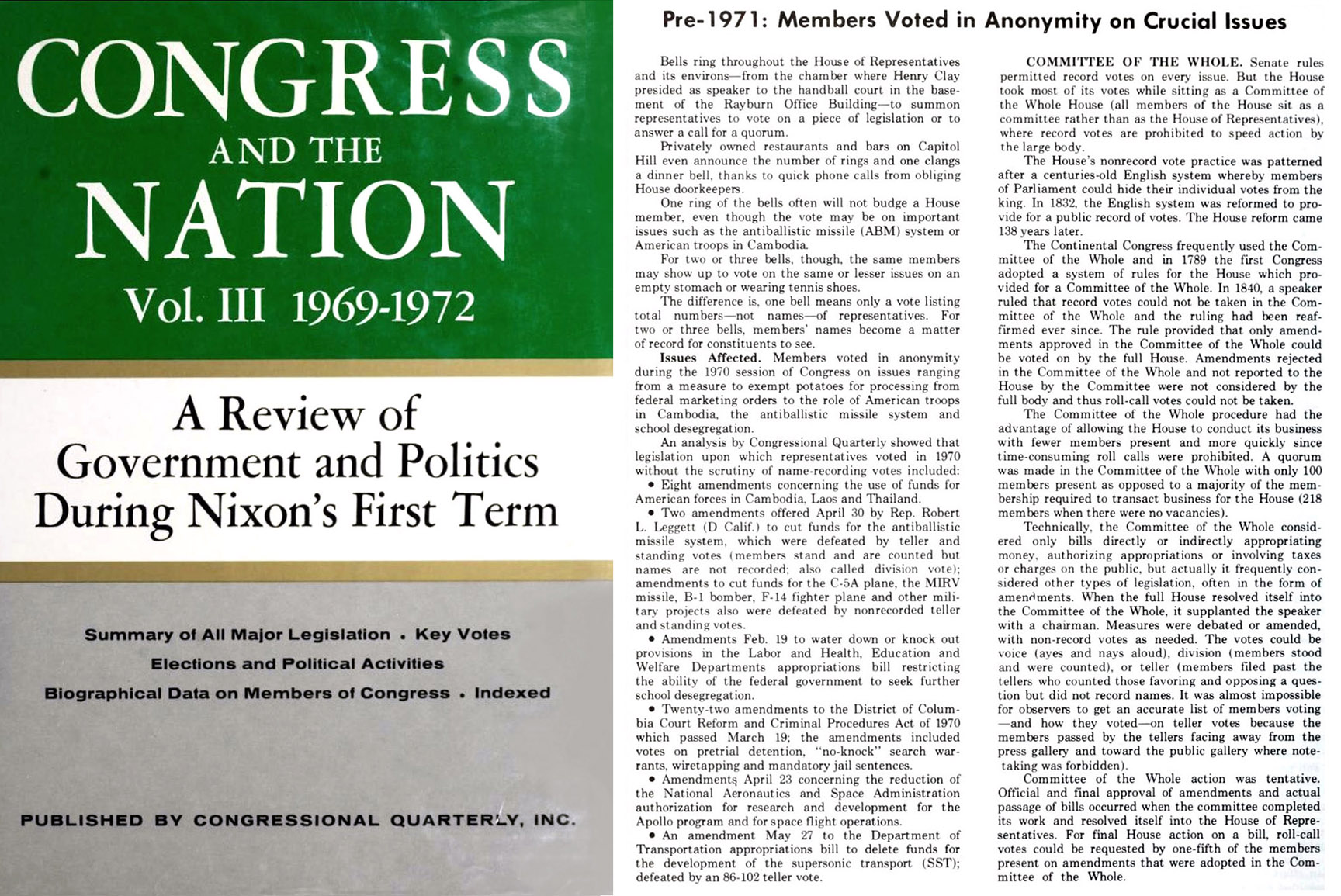
Congressional Quarterly 1973 - Pre-1971 Members Voted in Anonymity
Text: Bells ring throughout the House of Representatives and its environs – from the chamber where Henry Clay presided as speaker to the handball court in the basement of the Rayburn Office Building – to summon representatives to vote on a piece of legislation or to answer a call for a quorum. Privately owned restaurants and bars on Capitol Hill even announce the number of rings and one clangs a dinner bell, thanks to quick phone calls from obliging House doorkeepers. One ring of the bells often will not budge a House member, even though the vote may be on important issues such as the antiballistic missile (ABM) system or American troops in Cambodia. For two or three bells, though, the same members may show up to vote on the same or lesser issues on an empty stomach or wearing tennis shoes. The difference is, one bell means only a vote listing total numbers – not names – of representatives. For two or three bells, members’ names become a matter of record for constituents to see. The House took most of its votes while sitting as a Committee of the Whole House (all members of the House sit as a committee rather than as the House of Representatives), where record votes are prohibited to speed action by the large body. The House’s nonrecord vote practice was patterned after a centuries-old English system whereby members of Parliament could hide their individual votes from the king. In 1832, the English system was reformed to provide for a public record of votes. The Continental Congress frequently used the Committee of the Whole and in 1789 the first Congress adopted a system of rules for the House which provided for a Committee of the Whole. In 1840, a speaker ruled that record votes could not be taken in the Committee of the Whole and the ruling had been reaffirmed ever since.

Congressional Quarterly 1973 - Pre-1971 Members Voted in Anonymity
The delegates to the federal and state constitutional conventions recognized the need to balance the public’s “right to know” against the exigencies of informed, efficient decision-making by their representatives. The delegates unanimously agreed that it was both necessary and legitimate for the government to withhold from the public information concerning the negotiation of foreign affairs, treaties and military operations, as well as, on particular occasions, information relating to domestic governance. Early congressional practice adhered to the principle that representative government requires an informed citizenry but not unlimited disclosure or publication of governmental affairs. While the House of Representatives permitted the public to attend its deliberations on May 4, 1789, the Senate did not do so until 1794 and the right of the press to attend proceedings of both Houses was not secured until 1801.Daniel M. O’Brien 1980
The First Amendment and the Public’s Right to Know
The people’s right to know cannot mean that every individual or interest group may compel disclosure of the papers and effects of government officials whenever they bear on public business. Under our Constitution, the people are the sovereign, but they do not govern by the random and self-selective interposition of private citizens.Edward H. Levi 1975
The First Amendment and the Public’s Right to Know
It’s not that you want to ignore the public. It’s just that the lobbyists, the pressure groups, the trade associations – they all have their pet projects. If you put something together in public, the Members are looking over at the lobbyists and the lobbyists are giving the ‘yes’ and ‘no’ signs.Rep Dan Rostenkowski 2002
Too Much of a Good Thing
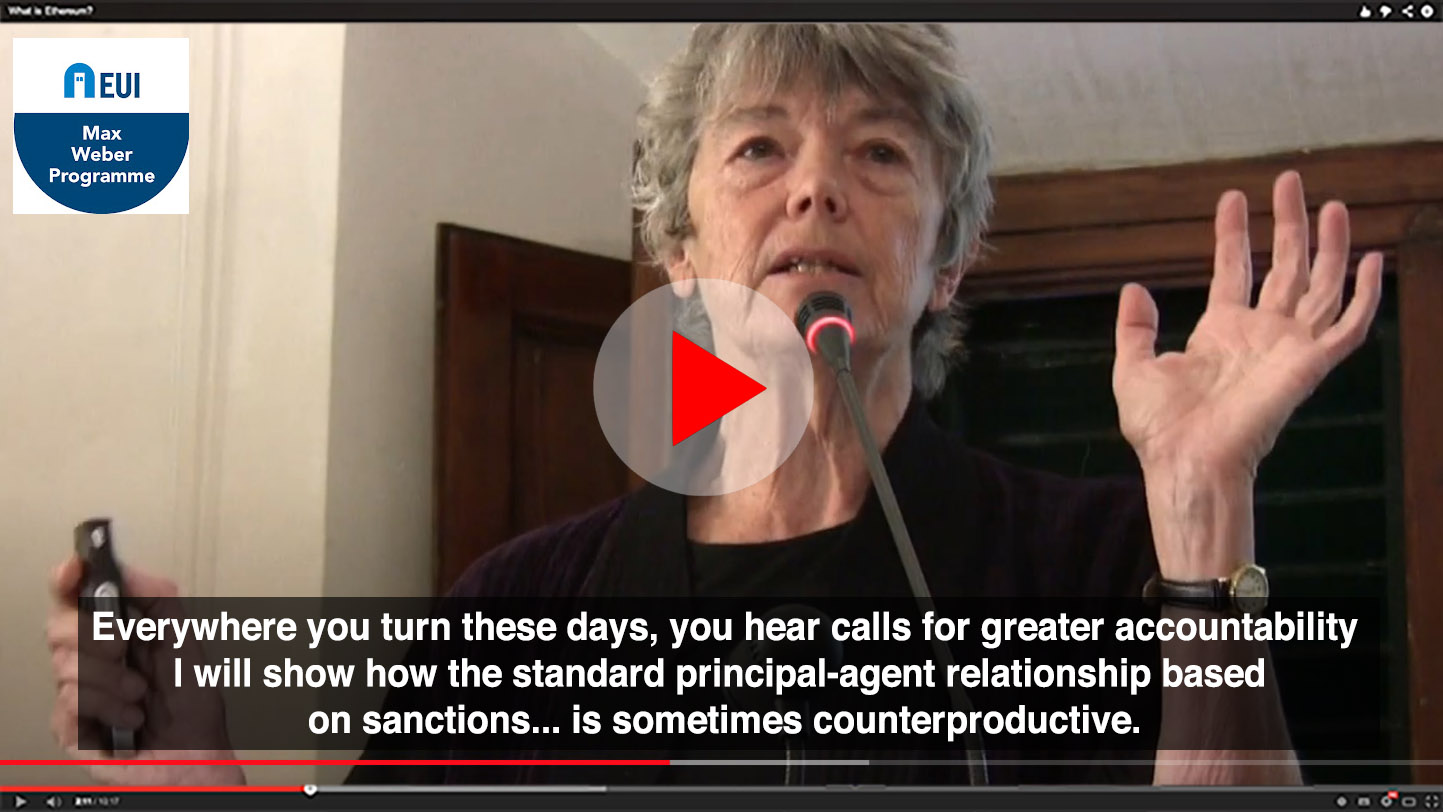
Jane Mansbridge 2010 – Against Accountability

Jane Mansbridge 2010 – Against Accountability
One major role of politicians is to broker those diverse interests and sensibilities and to arrive at arrangements that bridge differences. This strategy entails negotiation, trading off some interests against others in an attempt to attain a compromise that will be tolerable to a number of interests, though rarely entirely satisfactory to any one of them. To put it another way, it involves the bargaining away of many positions, at least as defined by the interested parties. More often than not, that is possible only when the negotiation takes place protected from the view of the various claimants, each of whom might try to veto any compromise that struck at their publicly defined, “transparent” position. What politicians call ‘‘creative give and take” ideologues or representatives of special interests call “betrayal.” That is why on sensitive matters, the negotiating process is most effective when it takes place behind closed doors.Jerry Z. Muller 2018
The Tyranny of Metrics
Suffce to say that efforts at fostering an open and transparent governing process have largely served to give interest groups more opportunities for infuence. The Freedom of Information Act [FOIA} and other “sunshine” requirements on agencies to make public most of the written materials, including emails, involved in rule making make it possible for lobbyists to track agency deliberation at almost every step.This means groups and their members have many opportunities to pressure agency offcials into writing rules for the beneft of the interest group’s members, either by directly pressuring agency offcials or by threatening to get members of Congress involved or by fling lawsuits.Thomas T. Holyoke 2021
Interest Groups and Lobbying - Pursuing Political Interests in America
By now, the empirical evidence on the deliberative benefits of closed-door interactions seems incontrovertible.Mark E. Warren & Jane Mansbridge 2013
Political Negotiation
In studies of negotiations in the [European Union], Ulbert and Risse (2005) identifed many instances in which negotiators had agreed on controversial passages in papers drafed behind closed doors because in that context, they were able to go beyond their instructions to explore possibilities for compromise.Mark E. Warren & Jane Mansbridge 2014
Deliberative Negotiation
While we often assume more transparent voting rules is a benefit, an examination of those rules and their origins suggests this is not always the case. In one of the few detailed discussions of the origins of recorded voting, Luce (1922) stressed that legislators needed to remain aware of both the costs and benefits of transparency. Such awareness is evident when we consider the substantial observed variance amongst recorded voting rules across history and legislative bodies.Lynch, Madonna & Kisaalita 2018
Broken Record - Transparency, Position Taking and Recorded Voting in the US Congress (from upcoming 2019 book)
[From 1971, CQ article discussing the resistance to opening committees] Public markup sessions are rare. Most committees prefer to write legislation in private for a variety of reasons. Some members believe that open meetings tend to encourage greater posturing and longer speeches for public consumption. Others think committee action is hindered by the necessity of observing formal procedures. One committee, which held open markup sessions in the past but not in 1971, found that the open meetings usually attracted more lobbyists than public.CQ Almanac 1971
1970 Legislative Reorganization Act Has Little Impact
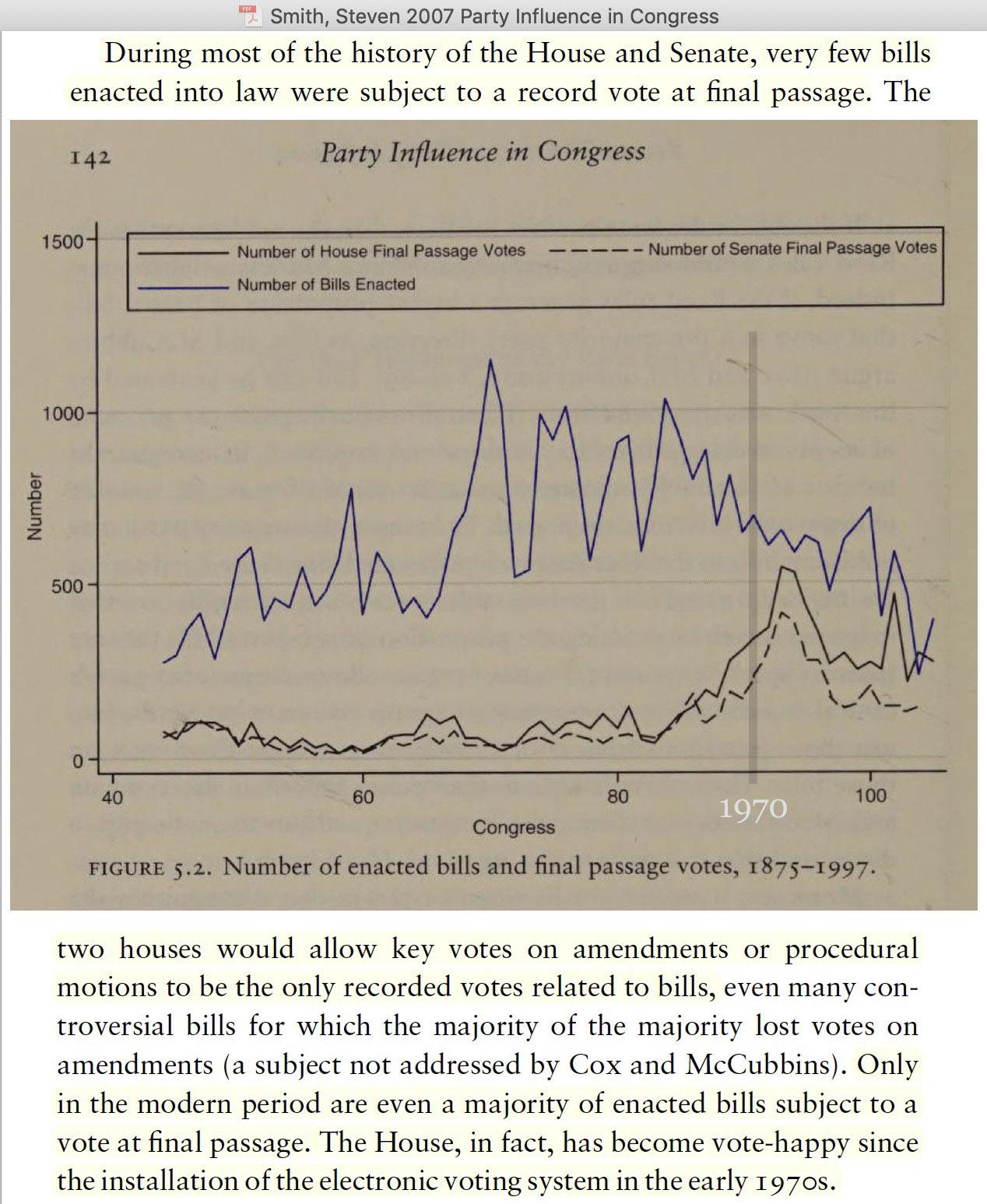
Steven Smith 2007 - Party Influence
TEXT: “During most of the history of the House and Senate, very few bills enacted into law were subject to a record vote at final passage. The two houses would allow key votes on amendments or procedural motions to be the only recorded votes related to bills, even many controversial bills for which the majority of the majority lost votes on amendments. Only in the modern period are even a majority of enacted bills subject to a vote at final passage. The House, in fact, has become vote-happy since the installation of the electronic voting system in the early 1970s. Cartel theory would predict a very low roll rate whatever the number of final passage votes, but we should be aware that the evidence on roll rates is limited to a small fraction of the legislative agenda during most of the post-Reconstruction Congresses. We cannot be certain that the majority of the majority obtained acceptable outcomes for a very large share of the floor agenda, as the low majority party roll rates might be read to imply. Worse yet, the majority party may have deliberately avoided roll-call votes on issues that would have exposed its internal divisions.”

Steven Smith 2007 - Party Influence
It is important to ask, moreover, who benefits from the constraints imposed by openness. Theoretically, “the public” does. In practice, however, openness too often serves the narrow purposes of special interests. Do the news media flock to our meetings? Do the public interest groups vie for seats in packed hearing rooms? Do interested consumers wait in line to hear debates on the hazards they face? Hardly.
But, without fail, you’ll find lawyers and lobbyists galore, all representing special interests. Those attending our meetings and burying us with F.O.I.A. requests are the very ones against whom the commission is considering action. They are paid to do just that.
In enacting the Sunshine and FOIA legislation, Congress wanted to give specific powers and tools to the public to guard against undue influence by special interests. Yet the very interests meant to be watched over have become the watchdogs. They, not the public, most often reap the benefits of openness, and at very high cost to the ability of government agencies to do what is expected of them. Stuart Statler 1981 (Freedom of Information)
Let the Sunshine In?
Very much to the surprise of the reform members, this new, more responsive, less hierarchical Congress got less done than the old oligarchy had. “The day is gone,” said new Ways and Means chairman Al Ullman of Washington State, “when a chairman can wrap a neat little package in his back room. The open hearings and open markups, in which all members, not just a few, have a say, is the way this committee must work.” The old unreformed Congress had enacted the Supplemental Security Income program in 1971. The new reformed Congress could never quite organize itself to enact anything on such a large scale ever again.David Frum 2000
How We Got Here: The 70’s
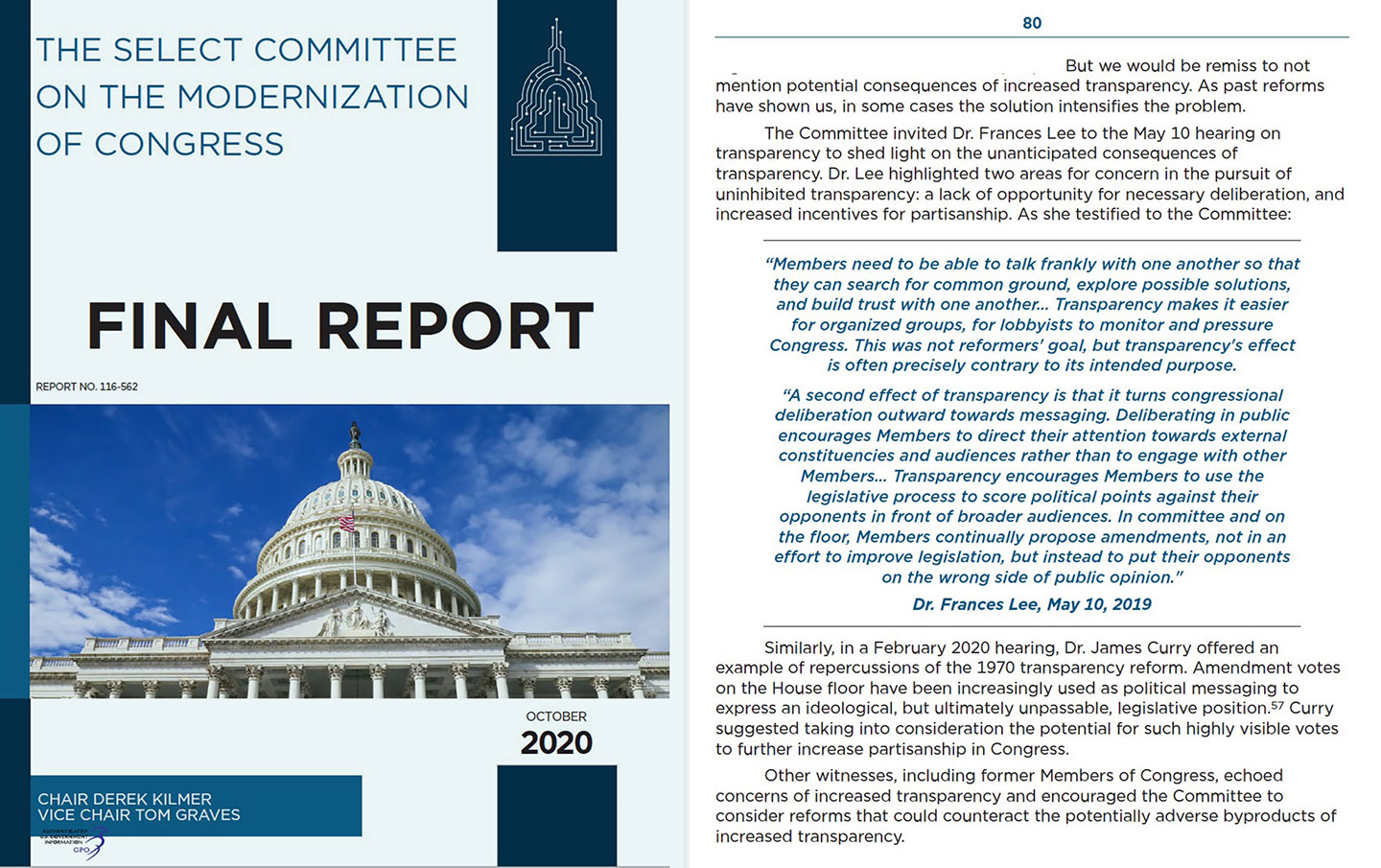
House Modernization Committee 2020
TEXT: In a February 2020 hearing, Dr. James Curry offered an example of repercussions of the 1970 transparency reform. Amendment votes on the House floor have been increasingly used as political messaging to express an ideological, but ultimately unpassable, legislative position.57 Curry suggested taking into consideration the potential for such highly visible votes to further increase partisanship in Congress. Other witnesses, including former Members of Congress, echoed concerns of increased transparency and encouraged the Committee to consider reforms that could counteract the potentially adverse byproducts of increased transparency.

House Modernization Committee 2020
In February 1973, Mills agreed “as an experiment” to let a tax bill go to the floor unprotected by a closed rule - the first time that had occurred since the 1920s. Mills’s “experiment” triggered an explosion in the number of lobbyists employed in Washington.David Frum 2000
How We Got Here: The 70’s
Outside pressures are often intense during markup deliberations. Under House and Senate sunshine rules, markups must be conducted in public, except on national security or related issues. Compromises can be difficult to achieve in markup rooms filled with lobbyists watching how each member will vote. Hence, committees sometimes conduct pre-markups in private to work out their positions on various issues.Roger Davidson, Walter Oleszek 2006
Congress and Its Members (6th Ed)
The freedom of information law’s “deliberative process privilege,” Barret wrote, was meant to protect frank discussions and to allay fears that tentative positions would be unearthed in later litigation or featured in press reports. “To encourage candor, which improves agency decision making, the privilege blunts the chilling effect that accompanies the prospect of disclosure.”Adam Liptak 2021
Justice Amy Coney Barrett Issues Her First Majority Opinion (FOIA)
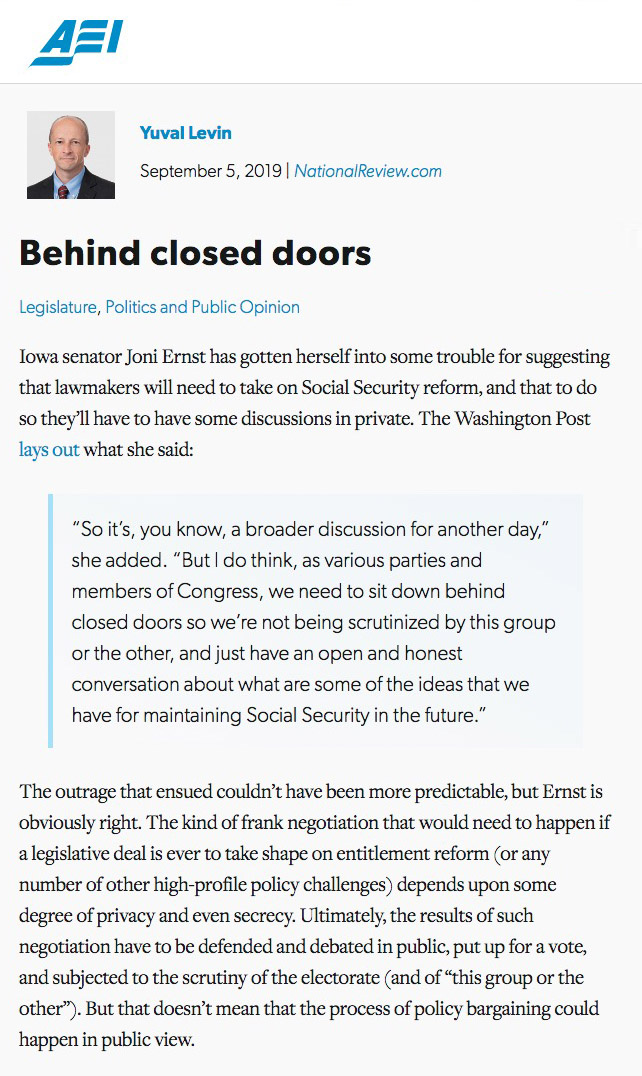
Yuval Levin 2019 - Behind Closed Doors

Yuval Levin 2019 - Behind Closed Doors
With hearings and markups increasingly open to public scrutiny, party leaders and their interest groups were able to keep a closer eye and apply increased pressure on the decisions of committee members.Julian Zelizer 1998
Taxing America
Notably, the House in the 1970s for the first time introduced recorded voting in the Committee of the Whole (Smith 1989). As Roberts and Smith (2003) convincingly demonstrate, votes on amendments in the Committee of the Whole tend to be far more partisan and divisive than other types of House votes. The introduction of recorded voting on COW amendments, along with the ease of electronic voting, quickly led to an explosion of amendment votes, driven largely by minority-party Republicans who sought to force members of the majority party to take difficult or embarrassing votes, which added a whole new and divisive set of votes to the roll-call record. As Smith explains, “[minority Republicans] actively sought ways to challenge committee products, raise ideologically charged issues, and force recorded votes. [Robert] Bauman [R-MD] even entertained requests for recorded-vote amendments from Republican challengers to Democratic incumbents in order to compel Democrats to take politically dangerous positions” (1989, 34).William Egar 2016
Tarnishing Opponents, Polarizing Congress
The switch from the quiet back-room deals of the Ways and Means Committee to the more open procedures of the Finance Committee and the Senate floor shows how tax preferences thrive in the sunshine. It is relatively easy for legislators to turn down proposals for expanding tax preferences, or even to approve contractions, if their actions are hidden from public view. It is considerably more difficult to do so if legislators must vote publicly, either in committee or on the floor, to deny their constituents a share of group benefits. As Congress began in the 1970s to write tax bills more openly, legislators faced an increasing number of roll-call votes on tax preferences. In fact, during this one decade there were more than twice as many roll-call votes in favor of creating or modifying tax preferences as there had been in the six previous decades. As legislators voted publicly on these matters, they quite naturally voted to approve expanded tax preferences.Douglas Arnold 1990 (Princeton)
The Logic of Congressional Action
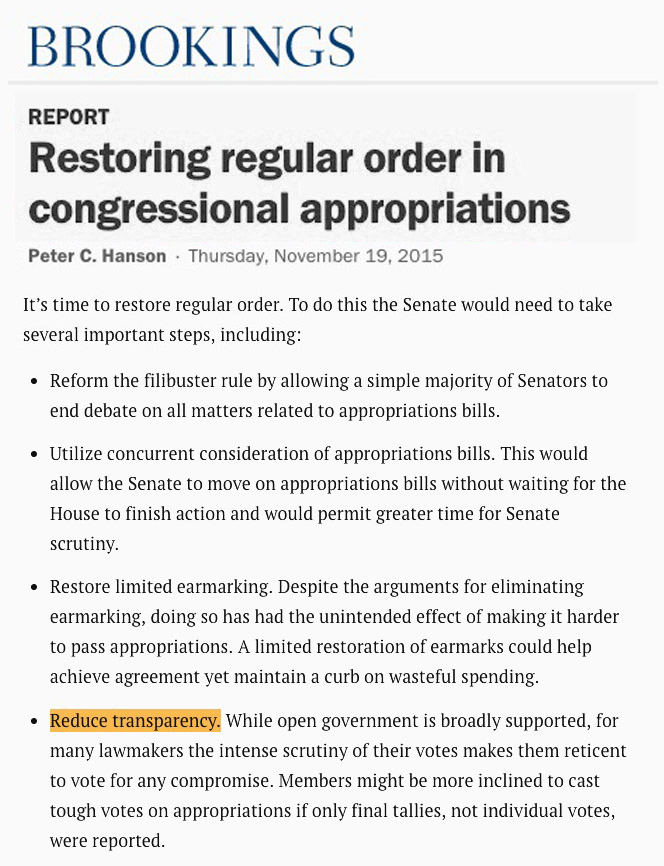
Peter C. Hanson - Restoring Regular Order

Peter C. Hanson - Restoring Regular Order
It seems significant that the committee usually functions purposefully only after deals are made in secret caucuses. Then, with the votes in hand, the majority engages in ritualistic debate in open sessions before pushing through the bill it wrote behind closed doors.Norman C. Miller 1971
Here’s A Reform We Do Not Need
A look at the audiences attending the open bill-drafting sessions also casts doubt on the reform theory that special-interest lobbyists would lose a lot of clout it all committees were forced to draft bills in public. The fact is that all those people dutifully chuckling at the politicians’ endless attempts at humor during open sessions now are none other than the special-interest lobbyists, there to make sure that no member double-crosses them by reneging on a private pledge. It is perhaps because of this audience that the Education and Labor Committee habitually recommends multibillion-dollar authorization bills, even though everyone knows that neither the administration nor the Appropriations Committee will follow up with appropriations anywhere near the recommended levels.Norman C. Miller 1971
Here’s A Reform We Do Not Need
[In 1985, Senate Majority Leader] Baker and [Deputy Treasury Secretary] Darman envisioned a similar course for tax reform. They feared that if dealt with in the normal, wide-open legislative process, the tax bill would be picked apart by legions of lobbyists. Their best chance of success was to negotiate a “precooked” deal in private with a few key members of Congress. Then after the plan became public, it could be rushed through the legislature, just like the Social Security plan, before the lobbyists had an opportunity to pounce.Jeffery Birnbaum & Alan Murray 1988
Showdown at Gucci Gulch (1986 Tax Reforms)
Despite the late hour, the marble-lined committee room is packed to the doors with ‘people,’ and guards are stationed at the entrance to stop more from pushing in. Reporters sit cheek-by-jowl around two tables not far from the door, and the remainder of the room is filled with lobbyists – lots of lobbyists. [No constituents are present]Jeffery Birnbaum & Alan Murray 1988
Showdown at Gucci Gulch (1986 Tax Reforms)
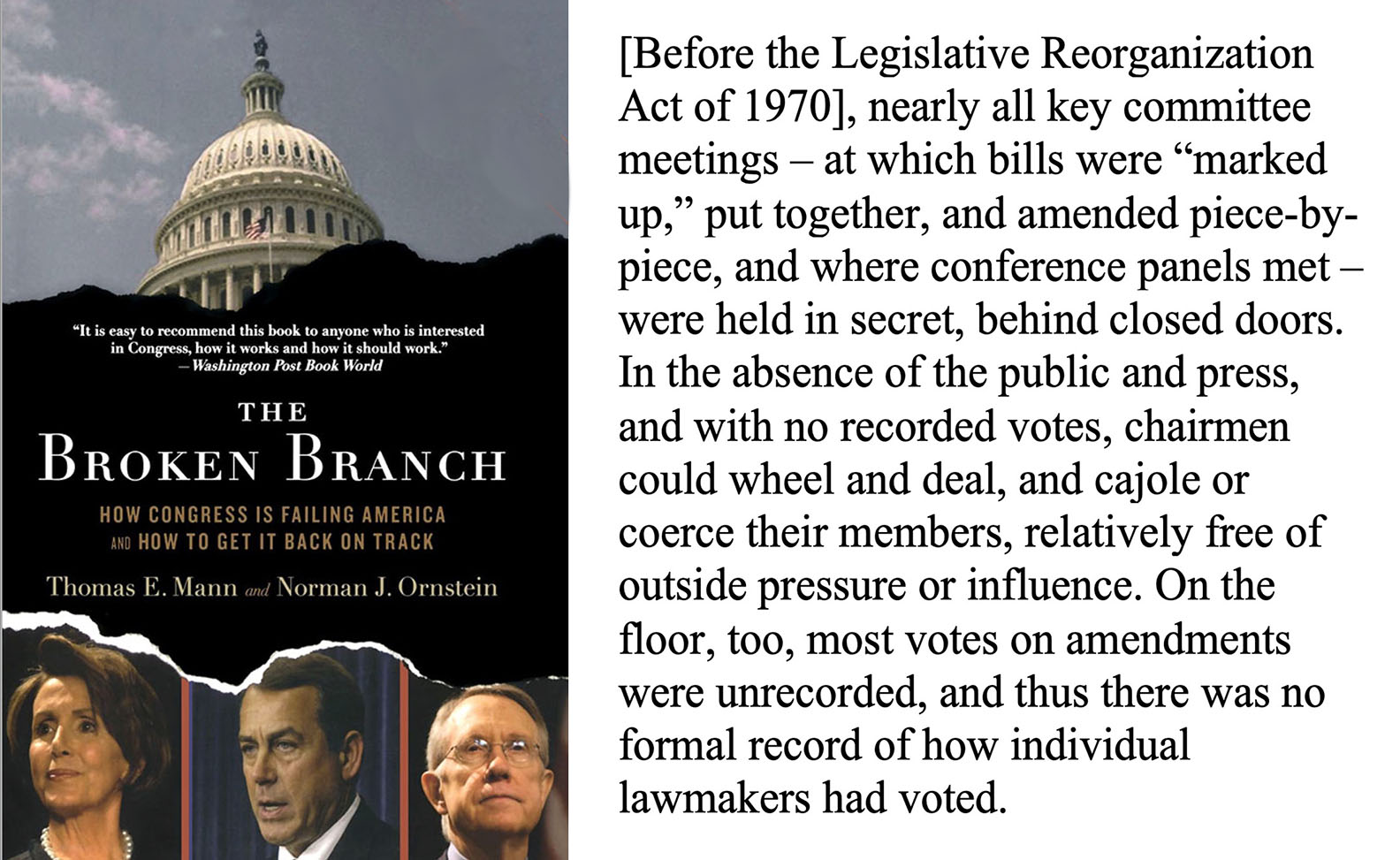
Thomas Mann & Norm Ornstein 2006 - The Broken Branch (all committees were closed)
Text: [Before the Legislative Reorganization Act of 1970], nearly all key committee meetings – at which bills were “marked up,” put together, and amended piece-by-piece, and where conference panels met – were held in secret, behind closed doors. In the absence of the public and press, and with no recorded votes, chairmen could wheel and deal, and cajole or coerce their members, relatively free of outside pressure or influence. On the floor, too, most votes on amendments were unrecorded, and thus there was no formal record of how individual lawmakers had voted.

Thomas Mann & Norm Ornstein 2006 - The Broken Branch (all committees were closed)
By incorporating the role of an audience and of Presidential approval ratings, [Groseclose and McCarty (2001)] showed that it is possible for vetoes to occur even with perfect information exchange between the President and Congress. Effectively, the game adds a new dimension: now, even if Congress would benefit from striking a compromise from a policy standpoint, they benefit even more by causing the President to look extreme or look weak by having to veto a bill.Wesley Sheker 2019
The Observer Effect: the Impact of an Audience on Political Negotiations
In fact, he asserted that open markups can sometimes make members more vulnerable to pressure groups (special interests or lobbyists), and he suggested that, on occasion, better policy emerges from a closed policy process.Pete Davis 2018
Exploring Tax Policy
[In preparing for the successful and popular 1986 tax reforms, Treasury Secretary Regan] kept the group [of legislators] isolated from the political storms of the election campaign; indeed, he kept them isolated from all the pressures that usually play upon people in power. The meetings were supersecret; the secretary ordered members of the group not to talk about their work to anyone outside of the conference room. Papers presented at the gatherings were passed out just two days before each session, in sealed envelopes marked “Eyes Only,” with explicit instructions that the contents were to be viewed only by the ten policymakers, and not by their deputies. After each session ended, the papers were collected again… Week after week, they made multibillion-dollar decisions that struck not only at taxpayers’ pocketbooks, but at the very structure of American society. Their actions would affect the home, the family, the church, everything considered most sacred. Jeffery Birnbaum & Alan Murray 1988
Showdown at Gucci Gulch (1986 Tax Reforms)
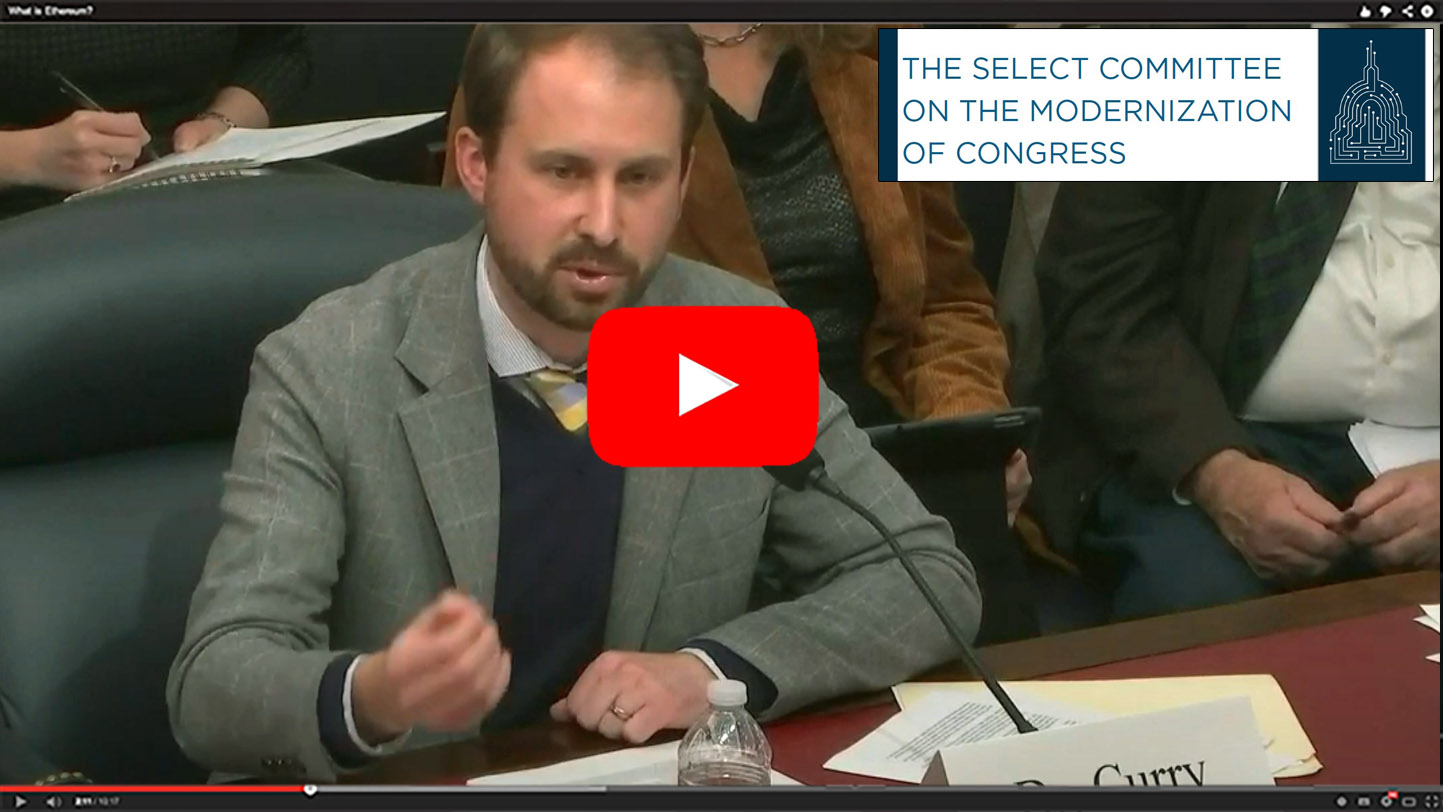
James Curry (University of Utah) 2020 Congressional Hearing: Reform and Article 1

James Curry (University of Utah) 2020 Congressional Hearing: Reform and Article 1
But those opening shots were mostly for public display. After the first two days of meetings, the conferees secluded themselves behind closed doors and did not meet again in public until the final night of the conference, three weeks later. Packwood and Rostenkowski both believed that they had to shield the conference from lobbyists, the press, and the public in order to make progress. Said Packwood, “Common Cause simply has everything upside down when they advocate ‘sunshine’ laws. When we’re in the sunshine, as soon as we vote, every trade association in the country gets out their mailgrams and their phone calls in twelve hours, and complains about the members’ votes. But when we’re in the back room, the senators can vote their conscience. They vote for what they think is good for the country. Then they can go out to the lobbyists and say: “God, I fought for you. I did everything I could. But Packwood just wouldn’t give in, you know. It’s so damn horrible.” Jeffery Birnbaum & Alan Murray 1988
Showdown at Gucci Gulch (1986 Tax Reforms)
Public engagement and transparency may put pressure on regulators to give particular perspectives or sets of facts more prominence than they deserve (Kerwin & Furlong 2011:167- 68; Gormley & Balla 2004). Scholars refer to pathologies of participatory bias as “regulatory capture,” particularly when regulated industry exercises undue influence over regulatory decision-making (Carpenter & Moss 2014). In siting or permitting decisions, public engagement and transparency may increase the opportunities for a vocal minority to demonstrate what some have called “persistent selfishness” (Irvin & Stansbury 2004). Regulators have long lamented the “Not-In-My-Back-Yard” syndrome (Rabe 1994). Regulators may face pressure to cater to those with the strongest voices. Powerful interests may willingly obfuscate issues or overwhelm processes with information in order to maximize personal or group goals (Wagner 2010; Michaels 2008).Jennifer Nash & Daniel Walters 2015
Public Engagement and Transparency in Regulation
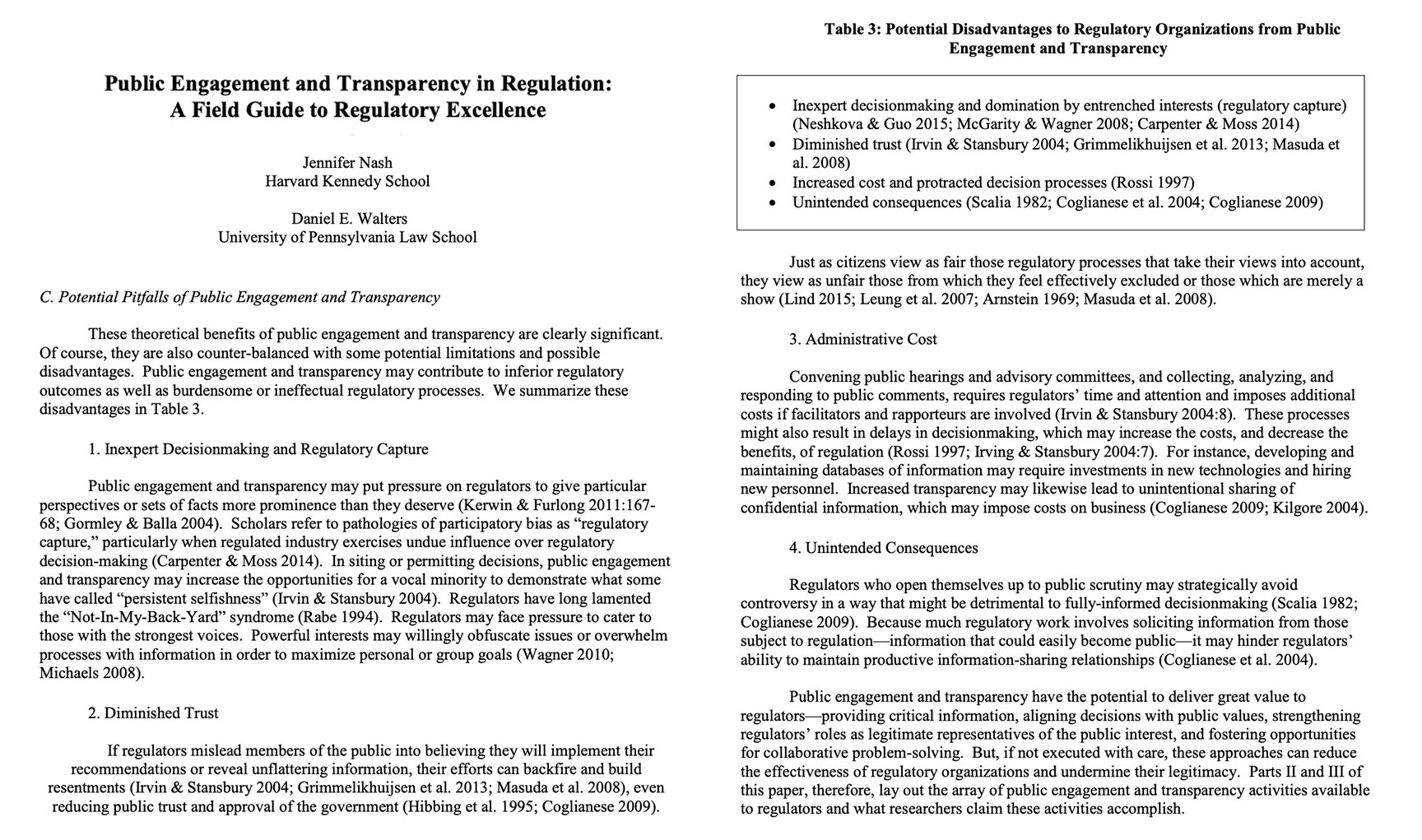
Jennifer Nash & Daniel Walters 2015 - Public Engagement and Transparency in Regulation (Pitfalls of Transparency)

Jennifer Nash & Daniel Walters 2015 - Public Engagement and Transparency in Regulation (Pitfalls of Transparency)
In a ploy to keep the effort from stalling, Packwood announced to the hallway loiterers – reporters as well as lobbyists – that there would be no sessions over the weekend. The hallway erupted with applause and cheers. In fact, first thing Saturday morning, the Finance Committee chairman secretly convened his core group for the most serious bargaining session of the entire process. [And they] began to fill in the details of the most sweeping tax-reform bill in American history.Jeffery Birnbaum & Alan Murray 1988
Showdown at Gucci Gulch (1986 Tax Reforms)
One of the main factors that allowed the committee to socialize its members into committee norms was the ability to iron out differences away from the eyes of the public and the other House members. One element of the Republican revolution was a desire to open the legislative process to the public and the press, and the HAC [House Appropriations Committee] began allowing the press into conference committee meetings and subcommittee markups (except defense and a few other national-security-related segments). This change brought opportunities for additional public grandstanding and reduced cover for compromise.Joshua Gordon 2005
Congress Reconsidered 8th Ed
It got worse. The caucus in 1973 had approved another rules change that required committees to conduct their meetings in open session unless its members voted to close the doors. Although Ways and Means members in the next two years continued to make their key decisions mostly in private, the pressure to work in the sunshine had the unintended consequence of increasing lobbyists’ access to the panel’s deliberations. Open meetings, several members said, altered the atmosphere just enough to create problems.Richard Cohen 1999
Rostenkowski - Pursuit of Power
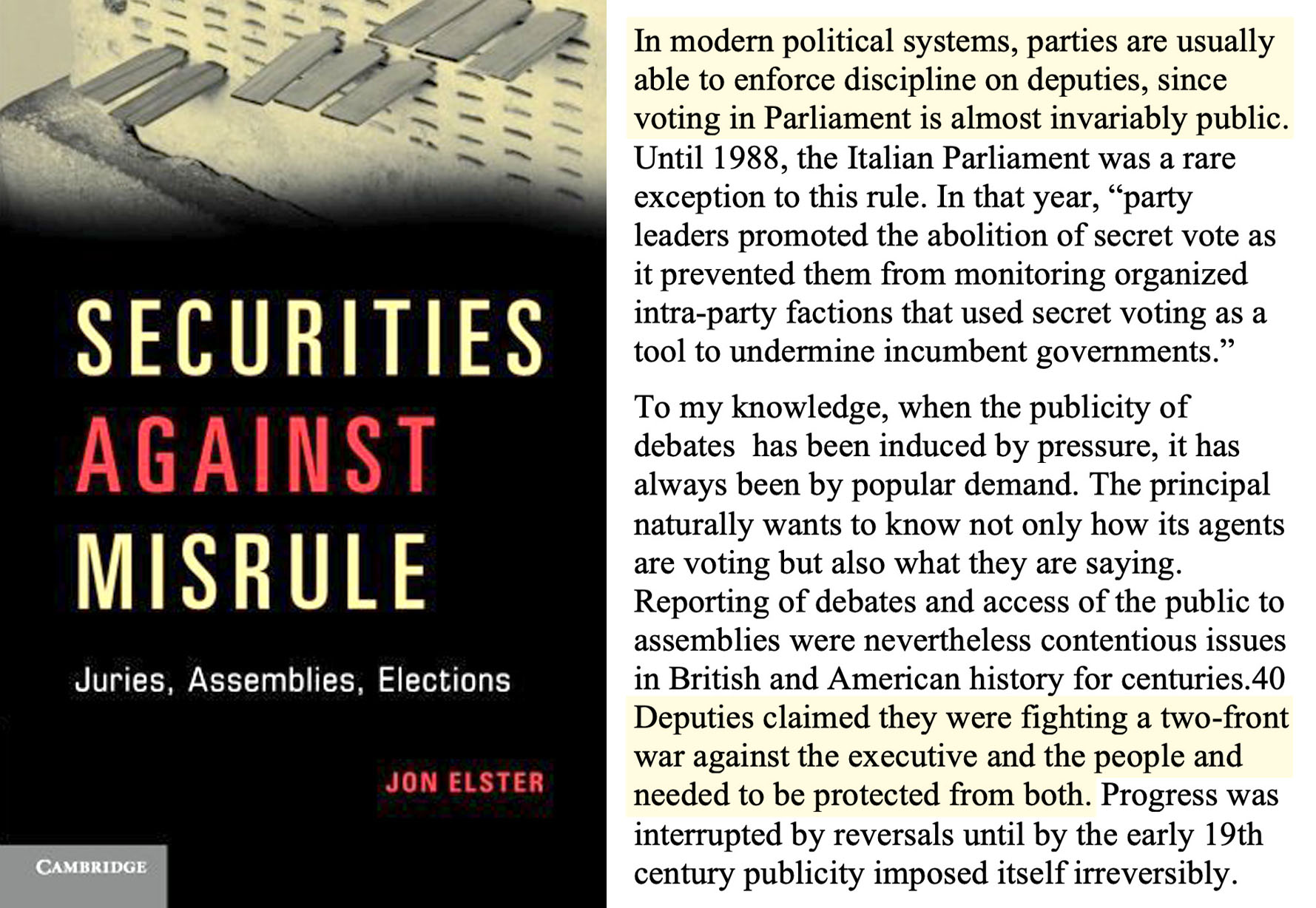
Jon Elster 2013 - Securities Against Misrule
Text: In modern political systems, parties are usually able to enforce discipline on deputies, since voting in Parliament is almost invariably public. Until 1988, the Italian Parliament was a rare exception to this rule. In that year, “party leaders promoted the abolition of secret vote as it prevented them from monitoring organized intra-party factions that used secret voting as a tool to undermine incumbent governments.” To my knowledge, when the publicity of debates has been induced by pressure, it has always been by popular demand. The principal naturally wants to know not only how its agents are voting but also what they are saying. Reporting of debates and access of the public to assemblies were nevertheless contentious issues in British and American history for centuries.40 Deputies claimed they were fighting a two-front war against the executive and the people and needed to be protected from both. Progress was interrupted by reversals until by the early 19th century publicity imposed itself irreversibly.

Jon Elster 2013 - Securities Against Misrule
A common feature of these informal arrangements is that all of them have taken shape behind closed doors, with party leaders controlling the process. In at least one aspect, therefore, Wilson’s portrayal of Congress remains valid. “One very noteworthy result of this system,” he wrote, “is to shift the theater of debate upon legislation from the floor of Congress to the privacy of the committee rooms.”Richard Cohen 1990 (Climate)
Crumbling Committees
Congress has turned to these new arrangements, in part, to ease the lawmakers’ burden. “The erosion of the committee process has made life more difficult in the Senate,” said a former top Senate aide who is now a corporate lobbyist. But the informal, closed-door sessions that have resulted from this erosion “may be an attribute for Senators working in a fishbowl, where every lobbyist knows what is happening before he does.”Richard Cohen 1990
Crumbling Committees
When interest rates rise, when trade deals are concluded, when industries are deregulated, populists protest that it was all done by sinister bodies, operating in the dark. And yet these institutions function well precisely because of their distance from day-to-day politics. They provide enormous benefits for the average citizen, in the form of stronger growth, greater productivity, a stable fiscal environment, and many more economic opportunities. Fareed Zakaria 2003
Future of Freedom
As the great democratic theorist Robert A. Dahl (2015: 96) notes, “Although open voting still has a few defenders, secrecy has become the general standard; a country in which it is widely violated would be judged as lacking free and fair elections.” If we embrace the secret ballot, though, then we admit that not every aspect of our politics should be open to public observation and scrutiny. As another example, central banks often deliberate in secret. This is done to prevent financial markets from overreacting to the slightest slip of the tongue and also because many monetary interventions (such as inflation) work only if they are unanticipated. Opacity here seems to be serving a very important function. As a final example, much diplomacy between nations is conducted in secret. Indeed, some of our greatest triumphs in the international arena - from Nixon’s opening to China to Obama’ s 2015 Iran nuclear deal - originated in covert, backroom meetings (Allison 2018).I Once more, secrecy plays a vital role.Brian Kogelmann 2021
Secret Government: The Pathologies of Publicity
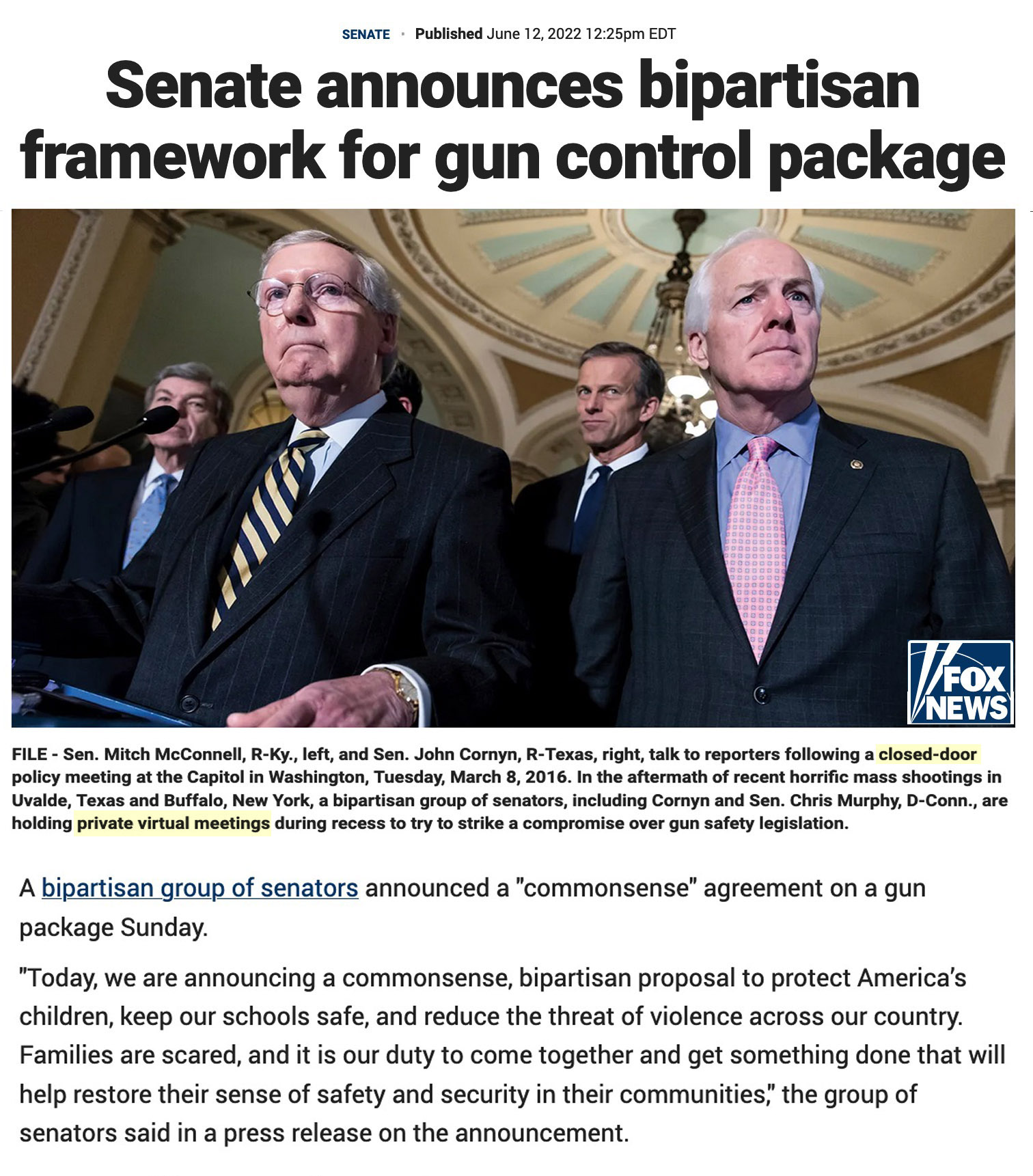
Emma Colton 2022 - Senate announces bipartisan framework for gun control package (closed door meetings)

Emma Colton 2022 - Senate announces bipartisan framework for gun control package (closed door meetings)
Forty years ago the Watergate scandal deeply wounded Americans’ faith in government. Since then, good-government reformers and big government opponents have been on a shared mission to make everything transparent. The problem is that too much light is scaring Congressmen away from making the tough choices necessary to govern in the national interest. It’s no secret that the back rooms are where things get done and where politicians can collaborate without reprisal.Jason Grumet 2014
City of Rivals
As a reporter, my biggest gripe about government transparency is that there isn’t enough of it. Opening up the business of government for public view keeps lawmakers and other officials accountable and puts voters in the loop. That’s why journalists seek out government documents; pore over lobbying, ethics and campaign finance disclosures; and camp out at the press table during Capitol Hill hearings. Recent testimony during one such committee introduced a perplexing, albeit intriguing, concept: Sunshine in government feeds the lobbyists like the actual sun nourishes a milkweed, enables them to thrive — often at the expense of ordinary folks. To make matters worse, this theory goes, transparency may breed stalemate and partisan rancor as lawmakers play to the cameras instead of brokering deals, in private, with their colleagues across the aisle. It wasn’t a bragging K Street fat cat who espoused this idea. No, it hails from academia. “When congressional proceedings are very open, the people who are most attentive are those with an economic stake: the lobbyists,” says Frances Lee, a government professor at the University of Maryland. “If everything has to happen in public, then it’s hard to get people moved off their partisan talking points.” Lee, who chairs a task force on congressional overhaul for the American Political Science Association, offered this perspective during a recent hearing of the Select Committee on the Modernization of Congress… While Lee’s view may be antithetical to some of journalism’s most sacrosanct principles, she says the downside of government sunshine is widely accepted in academia. And it’s a concept worth chewing on. Interest groups routinely rate lawmakers based on how they vote, factoring the scores into decisions on endorsements and campaign donations. Do average voters plot out such stats? “Who has the money to pay people to attend committee meetings?” Lee says. “It’s true that anyone in society in theory can go, but the bulk [of attendees] are the corporate interests.” Kate Ackley 2019
Too Much Sunshine Can Sometimes Burn
Of course, most roll call positions considered in isolation are not likely to cause much of a ripple at home. But broad voting patterns can and do; member “ratings” calculated by the Americans for Democratic Action, Americans for Constitutional Action, and other outfits are used as guidelines in the deploying of electoral resources. And particular issues often have their alert publics. Some national interest groups watch the votes of all congressmen on single issues and ostentatiously try to reward or punish members for their positions. David Mayhew 1974
The Electoral Connection
Former Republican US Representative, Trey Gowdy tells MSNBC that closed door hearings work far better and reduce bickering – Oct 24, 2019
Former Republican US Representative, Trey Gowdy tells MSNBC that closed door hearings work far better and reduce bickering – Oct 24, 2019
As Yglesias and Bazelon note, Congress also passed important legislation in the supposedly gridlocked closing years of the Obama and Trump administrations. The secret of this legislative success? The very fact that the legislation was secret. Well, not literally secret. But definitely not pushed by the White House, and not aligning precisely with the ideological priorities of each party's activist cheerleaders in the media and on the sidelines. The trick, it seems, is for members of Congress to find unpredictable cross-party partners to work with on issues that cut across these divides and then for the president to stay out of it, since his involvement will usually guarantee staunch opposition by members of the other party.Damon Linker 2021
The Secret Congress paradox
Information, data and the unbounded flow of more and more speech can be politicized… when that happens… transparency and the unbounded flow of speech become instruments in the production of the very inequalities (economic, political, educational) that the gospel of openness promises to remove. And the more this gospel is preached and believed, the more that the answer to everything is assumed to be data uncorrupted by interests and motives, the easier it will be for interest and motives to operate under transparency’s cover… Because it is an article of their faith that politics are bad and the unmediated encounter with data is good, internet prophets will fail to see the political implications of what they are trying to do, for in their eyes political implications are what they are doing away with.Stanley Fish 2018
‘Transparency’ is the Mother of Fake News
Among American institutions, Congress is at once the most transparent and the most reviled. Its votes, hearings, and debates are broadcast live for anyone to see; inside the Capitol, reporters can walk up to just about any of its 535 members and ask why they voted a certain way, or whether the latest reported scandal is true. Unfortunately for lawmakers, all of this visibility has helped make Congress only slightly more popular among U.S. citizens than Vladimir Putin.Russell Berman 2022 Atlantic Magazine
Shadow Congress
Disillusioned citizens want to eliminate anything that stands in the way of total transparency. Little by little, a veritable ideology of transparency has emerged as the new democratic ideal, in place of the old, which was to create through politics a society in which people could live together in a shared world. Transparency, rather than truth or the general interest, has become the paramount virtue in an uncertain world. In some metaphorical manner transparency is supposed to eliminate all tension and overcome every difficulty. Not knowing what power is supposed to do, people worry only about what it is supposed to be. It is almost as if they dreamed of dissolving power altogether. Their goal is not to limit power, as in the liberal tradition, but to constrain it and thus, in a manner of speaking, to “transfigure” it. But then it can no longer respond to the demands placed on it. Transparency – the new utopia – thus engenders the very disillusionment it was intended to overcome.Pierre Rosanvallon 2008
Counter-Democracy - Politics in an Age of Distrust
I like to keep as much of the negotiation and the actual compromise private, because otherwise people are forced to the corners by lobbyists and special-interest groups...Informing the public every step of the way may serve some purpose. Certainly in a democracy, transparency is a critical part of it. But human nature suggests that many times the toughest negotiations have to be in private.Senator Dick Durban 2022
Shadow Congress
Congress utterly polarized? Once upon a time, members of Congress did their business mostly in secret. They struck quiet deals with each other. A Republican might support a Democratic labor measure in return for some discreet help with a farm bill. Today, everything happens in the bright glare of sunshine, policed by hundreds of ideological interest groups. Deviate one step from the party line, and you are a traitor, a sell-out, an enemy. Just ask Scott Brown, yesterday's Republican hero, today a villain for voting against the filibuster of a jobs bill. We have an ideology that more publicity, more transparency, more openness must improve Congress. And when each successive wave of openness makes things worse, we tell ourselves that the answer is even more publicity, transparency and openness still. No contrary evidence makes any impression. Seems like everything’s open – except our minds.David Frum 2010
Blame yesterday's reforms for today's gridlocked Congress
The recorded teller vote, he recognized, is in principle good for democracy, but even this has another side. ‘The amending process became a ‘gotcha’ process rather than a legislative process. It enabled all of these single-issue groups to get a roll call on everything and run a TV ad against you financed by special interests’Rep. David Obey 2014
Michael Schudson (Rise of Right to Know)
Full transparency in government, in professional-client relations, and in personal life can do great harm. It threatens privacy. It threatens relations of intimacy that invariably are built on closely held confidences. In government or other decision-making groups it inhibits honest conversation. It may expose vulnerable individuals or groups to intimidation by powerful and potentially malevolent authorities.Michael Schudson 2014
The Rise of Right to Know
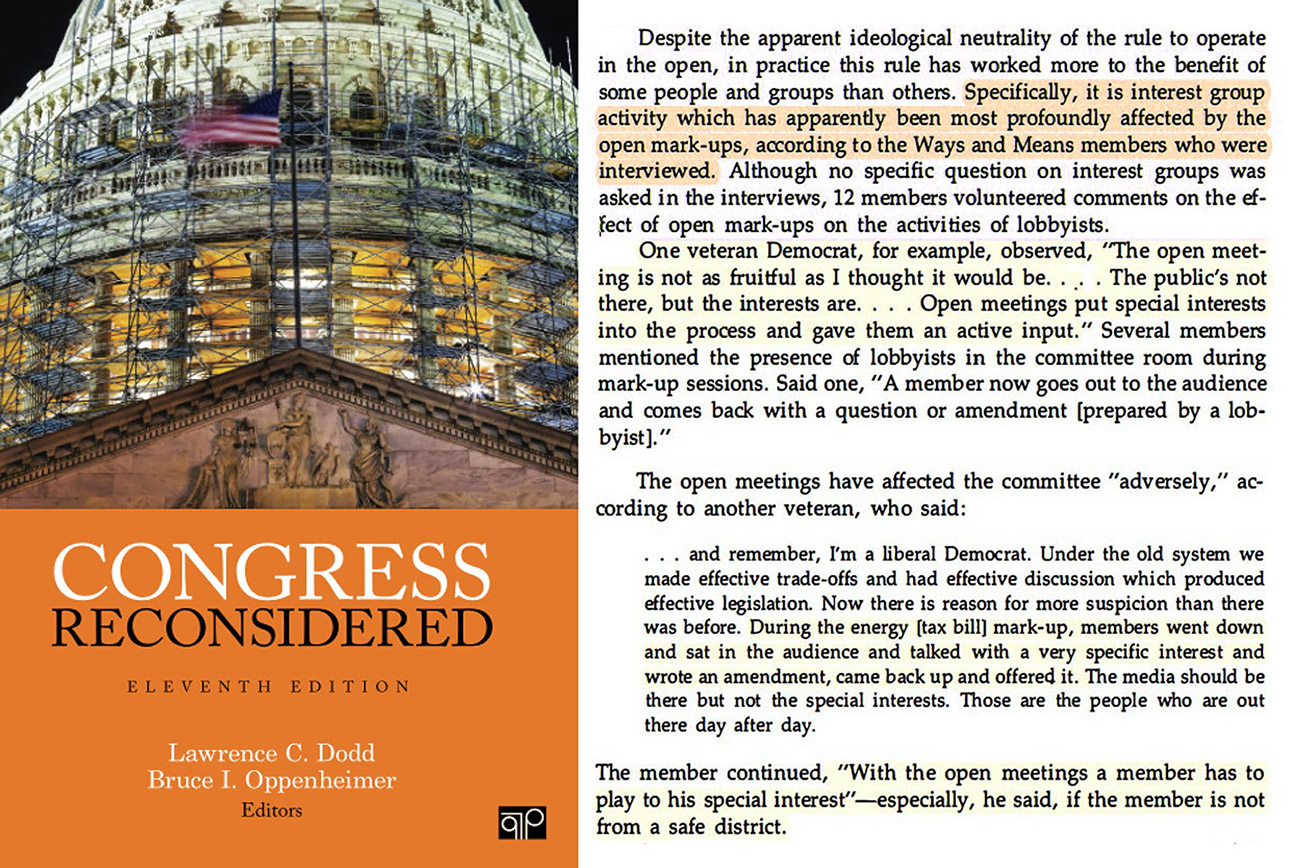
Catherine Rudder 1977 – Committee Reform

Catherine Rudder 1977 – Committee Reform
A broad movement toward “government in the sunshine” resulted in widespread changes in the internal processes of governing institutions. In Congress, for example, the early 1970s saw the opening of many committee meetings to the public and a movement away from anonymous voting procedures (voice, standing, and teller voting) in favor of putting everything on the record, a development that accelerated after electronic voting was instituted. Although government reformers believed that greater transparency would make it more difficult for members of Congress to conceal votes cast on behalf of special interests, they seem to have ignored the symmetric possibility that more openness made it much easier for special interests to determine whether members were actually delivering on their end of the deal. Many scholars pondered the consequences of congressional decentralization in the 1970s, but fewer reflected on the consequences of making the activities of its members so much more visible to interest groups.Mo Fiorina 2012
Disconnect: The Breakdown of Representation
Among the biggest skeptics of broadcasting Senate proceedings was a freshman senator who had won his 1984 election in part by mocking a Democratic incumbent for his low Senate visibility. “I remember thinking it would be a big mistake, and voting against it,” Senate Majority Leader Mitch McConnell (R-Ky.) told C-SPAN in a special interview celebrating the anniversary… There has been grandstanding for the cameras, for certain. Last year, three Senate freshmen running for president — Ted Cruz (R-Tex.), Rand Paul (R-Ky.) and Marco Rubio (R-Fla.) — drew the ire of Senate elders who accused them of using the floor for political benefit, including Cruz’s labeling of McConnell as a liar based on a trade deal… “This is a high and holy calling, it is not something to take for granted,” Sen. Orrin G. Hatch (Utah), the longest-serving Republican, said in a speech rebuffing the trio. Hatch pleaded for restraint from turning the floor into “a forum for advancing personal ambition.”Paul Kane 2016
30 Years of C-SPAN’s Senate Broadcasts
Healthy bipartisan compromise seems completely hopeless with this crew. But underneath that circus that circus, there has always been another layer of politics — led by people who are not as ratings-driven, but are more governance-driven. So over the past 20 years or so, while the circus has been at full roar, Congress has continued to pass bipartisan legislation: the Every Student Succeeds rewrite of federal K-12 education policy, the Obama budget compromise of 2013, the Trump criminal justice reform law of 2018, the FAST infrastructure act, the Anti-Money Laundering Act of 2020, the Trump-era ban on surprise billing in health care. In June the Senate passed, 68 to 32, the United States Innovation and Competition Act of 2021, which would devote roughly $250 billion to scientific projects. Matthew Yglesias and Simon Bazelon call this the “Secret Congress” — the everyday business of governing that works precisely because it isn’t on cable TV.David Brooks 2021
The Biden Approach Is Working
Then, too, Senator Muskie had to be concerned with attracting Republican support. He faced a dilemma. On the one hand, he had to outdo President Nixon in order to preserve his environmentalist credentials — Ralph Nader, then at the height of his influence, had blasted Senator Muskie for not being aggressive enough — and thus help him remain the leading candidate for the Democratic presidential nomination in 1972. On the other hand, Senator Muskie needed to develop a bill with enough bipartisan support that it could make its way through the Senate and House. So, he worked with Republican and Democratic members of his subcommittee behind closed doors — this was before the congressional reforms adopted after Watergate — to satisfy them.Craig N. Oren 2016
Struggling for Context: An Appraisal of “Struggling for Air” (Climate)
The 1975 rules change that opened to the public all Senate committee meetings, including mark-up sessions, has had a major impact upon committee functioning… Almost all committee decision-making sessions are now open to the public and the press. Senators’ actions are subject to direct scrutiny by lobbyists who compose much of the often large audience for mark-up sessions… Open mark-ups and conference committee meetings give interest groups without strong ties to influential committee members a better chance to have an impact on committee decisions. Such groups now have much more access to timely information. The opening of mark-ups changes the dynamics of decision making. With press and lobbyists watching, compromise may be more difficult, and grandstanding may be encouraged.Barbara Sinclair 1989
Transformation of the US Senate
In 1986… The open mark-up session had gotten completely out of hand; majorities had approved tax breaks for special interests that cost billions and made a mockery of the reform label.Barbara Sinclair 1989
Transformation of the US Senate
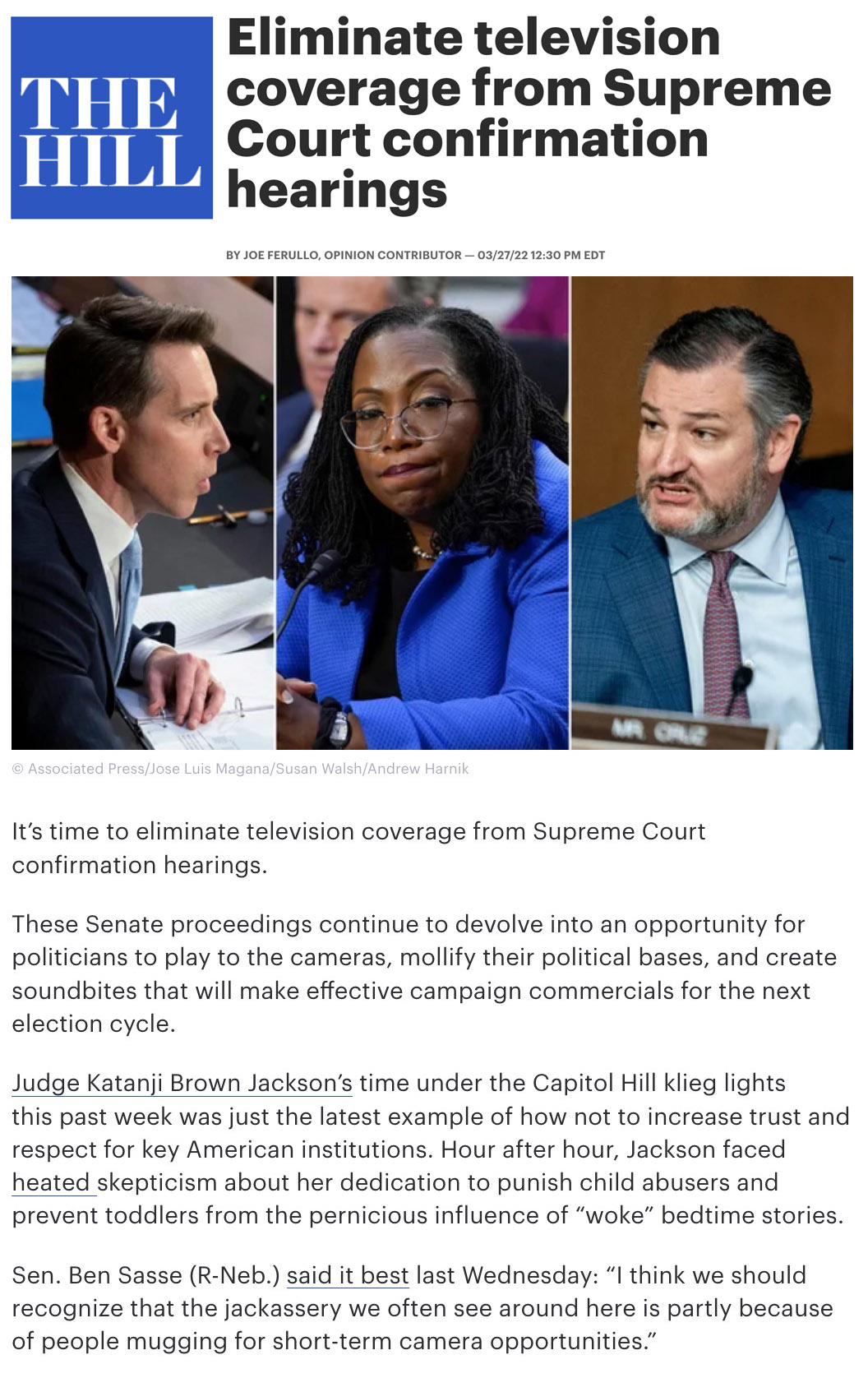
Joseph Ferullo 2022 - Eliminate Television Coverage from Supreme Court

Joseph Ferullo 2022 - Eliminate Television Coverage from Supreme Court
The [1911] rules served to break up the small clique in power and gave the representatives generally more control of procedure. This was a blow to the old lobby. It was patently impossible to attempt to cajole or bribe an entire Congress. Another reform in the legislative procedure that tended to improve the methods of the lobbyists was the adoption on the part of Congress in the early years of this century of the policy of holding on all important bills, open committee hearings which the proponents and the opponents of a measure might attend and there state, frankly and publicly, their attitude toward the legislation under consideration. Only the hearings of the Appropriations Committee are now held in executive session as a general rule. By thus openly testifying before committees the lobbyists of legitimate interests can make their appeal to a much wider audience. Not only Congress but the whole country as well may know their arguments for a bill. The frankness of the legitimate interests makes it necessary for the questionable lobbyist to assume a like guise. It is not possible to work behind “closed doors” to the same extent. The general public is thus enabled to understand more clearly the forces that are interested in certain legislation.”Pendelton Herring 1929
Group Representation Before Congress
In order to encourage consensus, since 1983, the chairman [Rostenkowski] has held more closed committee meetings than his predecessor. Although open meetings during the “sunshine” era of the 1970s were meant to improve the committee’s proceedings by exposing them to public scrutiny, the public that attended committee meetings was composed mainly of lobbyists. Committee members appreciate the opportunity closed meetings provide for candid discussion, and they believe that their legislative product is improved because of closed sessions. Bill Frenzel (R-MN), for instance, has reversed his opposition to closed meetings: “Since our meetings have been closed, our work has been less flawed… and our consensuses much stronger. I think it’s the only way to fly.” Donald R. Kennon & Rebecca M. Rogers 1989
Ways and Means a Bicentennial History 1789-1989
Down to the middle of the eighteenth century the meetings of the British Parliament for the transaction of all types of business and of the legislative bodies of the British colonies in America all were held behind closed doors. The votes and speeches in these sessions all were secret and anyone publishing any of this secret information was liable to citation for contempt. The House of Commons in 1641 expelled one of its own members, Sir Edward Dearing, and sent him to prison for reporting one of his own speeches. As late as 1746, the editor of the Gentleman’s Magazine was arrested and brought to the bar of the House of Commons for having reported parliamentary proceedings.Congressional Quarterly 1929
Secret Sessions of the Senate (England)
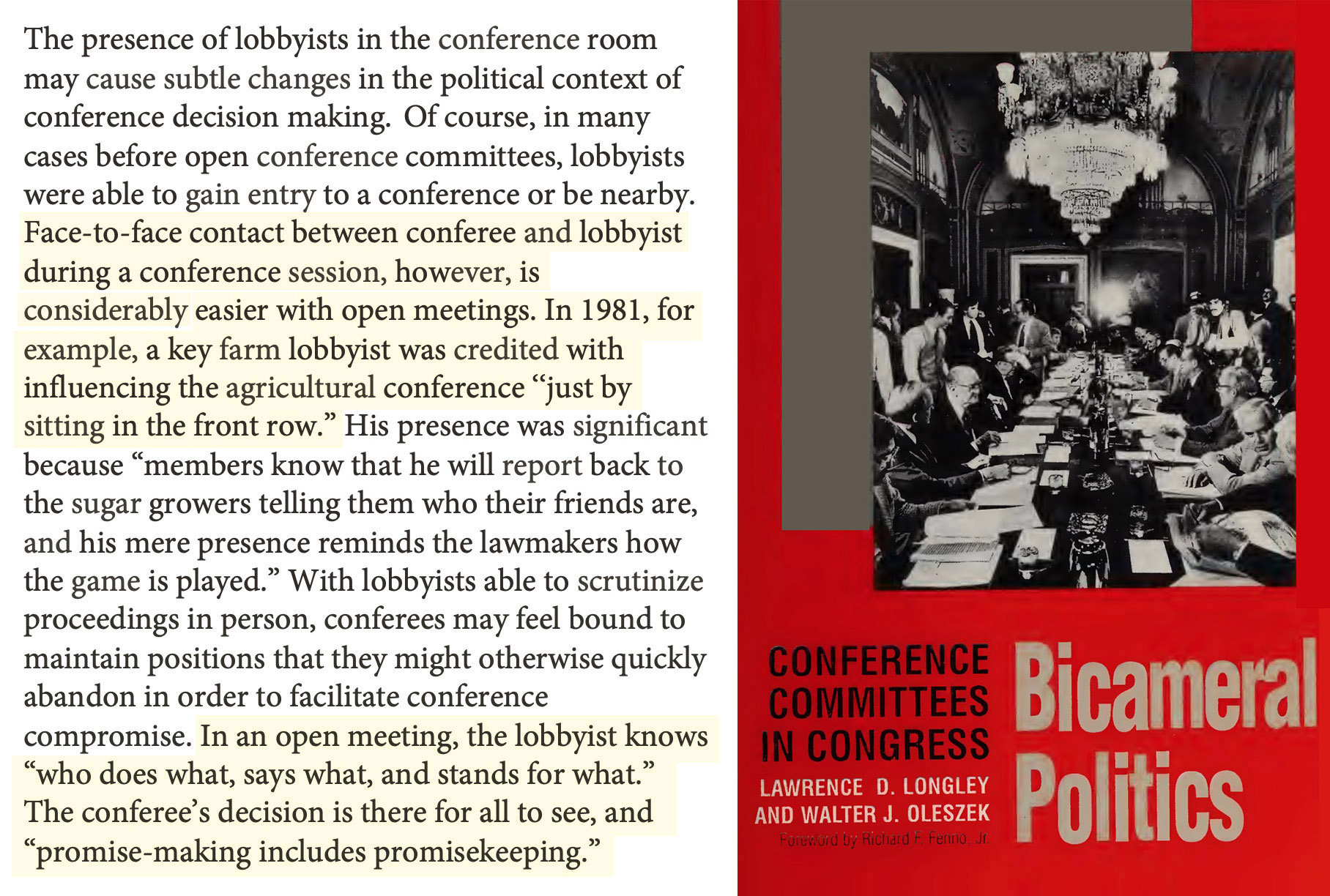
Longley & Oleszek 1989 - Bicameral Politics - Lobbyists Pressure Congress in Open Sessions
Text: The presence of lobbyists in the conference room may cause subtle changes in the political context of conference decision making. Of course, in many cases before open conference committees, lobbyists were able to gain entry to a conference or be nearby. Face-to-face contact between [lawmaker] and lobbyist during a conference session, however, is considerably easier with open meetings. In 1981, for example, a key farm lobbyist was credited with influencing the agricultural conference “just by sitting in the front row.” His presence was significant because “members know that he will report back to the sugar growers telling them who their friends are, and his mere presence reminds the lawmakers how the game is played.” With lobbyists able to scrutinize proceedings in person, [lawmakers] may feel bound to maintain positions that they might otherwise quickly abandon in order to facilitate conference compromise. In an open meeting, the lobbyist knows “who does what, says what, and stands for what.” The [lawmakers’] decision is there for all to see, and “promise-making includes promisekeeping.”

Longley & Oleszek 1989 - Bicameral Politics - Lobbyists Pressure Congress in Open Sessions
The first legislative body in America to open its doors to the public was the General Court of Massachusetts, which yielded in 1766 on the motion of James Otis to the public demand for publicity of debates. The Continental Congress met in secret, but was required by the Articles of Confederation to publish “for the information of the people” a complete journal of its proceedings, save only such parts as related to “treaties, alliances and military operations, which require secrecy” – it being then a time of war.Congressional Quarterly 1929
Secret Sessions of the Senate
Before this I presume, the Printers in Boston, have inserted in their Gazettes, the Debates of the House or Representatives, which are conducted with open Galleries. This Measure, by making the Debates public will establish the national Government, or break the Confederation.Vice-President John Adams 1789
Letter to Abigail Adams
Sometimes we don’t want to take a recorded vote when there are a lot of lobbyists out there… [In a closed session] a member can enter a mild protest about the defeat of an amendment he might otherwise feel compelled to support… Then, when the markup is over, the member can go out into the hall and say to the lobbyist, “I worked to get your amendment adopted but I just got outvoted.”Randall Strahan 1989
The New Ways and Means
Ways and Means members stated in interviews that they felt greater freedom to attend to concerns other than immediate demands of constituency and clientele groups when deliberations were closed to the public and press. Procedures that allow some insulation of committee deliberations from direct constituency and group pressures thus appear to allow greater freedom for members to act to advance policy or prestige goals in cases where these may be in tension with electoral incentives. Randall Strahan 1989
The New Ways and Means
The impact of congressional reform upon the substance of Ways and Means legislation was not precisely what reformers had hoped for. Committee member William J. Green (D-PA) observed after the first year of the Ullman committee that liberal expectations had proven to be “a lot of journalistic excess,” even though the composition of the committee had been altered in a liberal direction… Opening up the committee procedure, paradoxically perhaps, opened tax legislation to demands for even greater tax reductions and benefits that were not always in the public interest. Donald R. Kennon & Rebecca M. Rogers 1989
Ways and Means a Bicentennial History 1789-1989
This Article, written for a forum on comparative administrative law, reviews the development of public participation and transparency in American administrative law in general and then examines three specific laws that attempted to increase transparency and public participation - the Federal Advisory Committee Act (FACA), the Government in the Sunshine Act (Sunshine Act), and the Negotiated Rulemaking Act (NRA). These laws, however, are largely viewed as failures, or at least deeply ineffective, in achieving their goals. In examining these laws, this Article attempts to discern why they failed and suggests that the reasons for their failure are not of a nature that can be easily cured by amendment, but rather reflect significant structural impediments to increasing transparency and public participation through such mechanisms. In this way, this Article may provide guidance to EU lawmakers in attempting to craft mechanisms that can effectively facilitate public participation and transparency in EU agency decisionmaking.William Funk 2009
Public Participation and Transparency in Administrative Law (Executive)
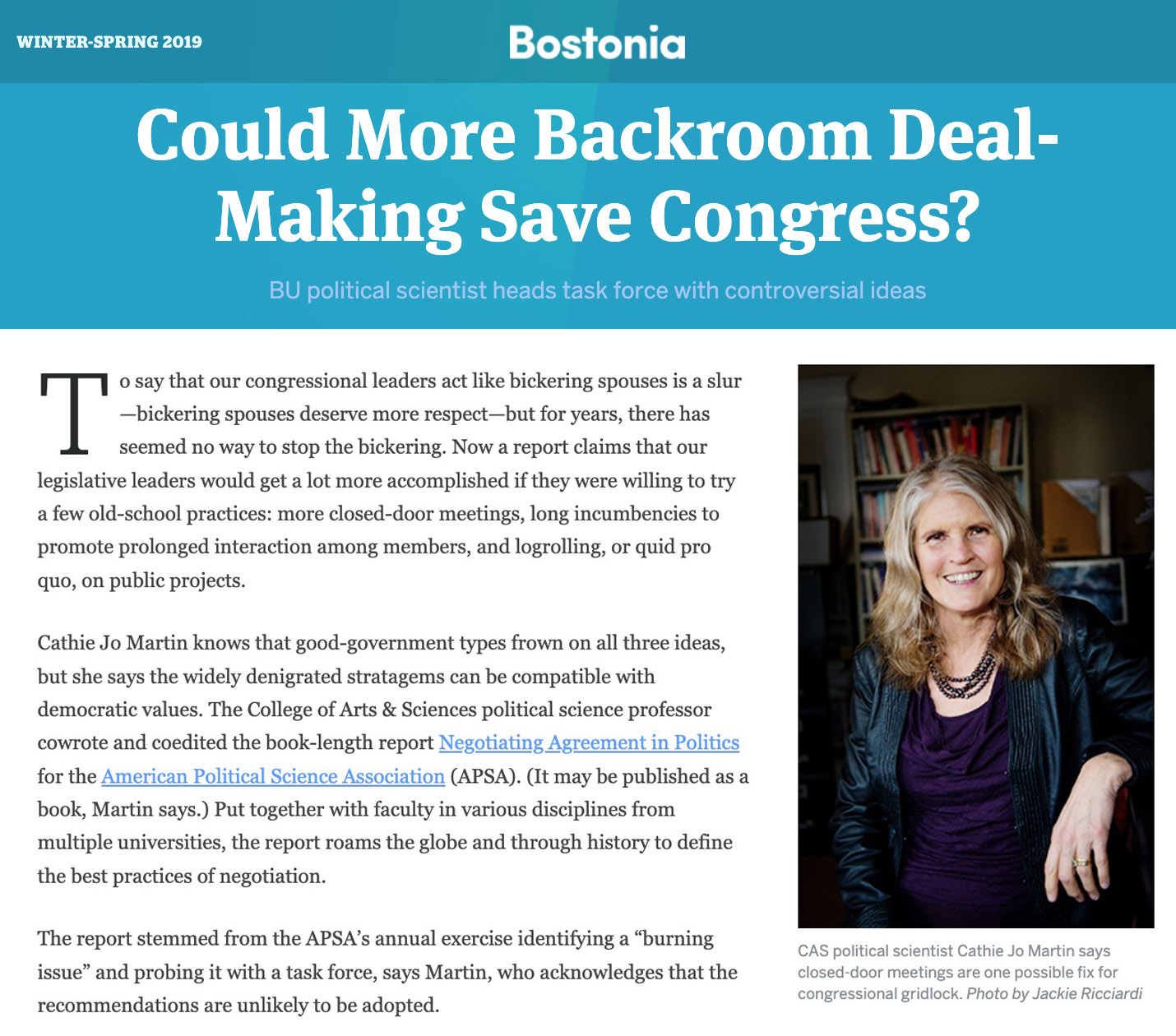
Cathie Jo Martin 2019 - Could More Backroom Deal-Making Save Congress?

Cathie Jo Martin 2019 - Could More Backroom Deal-Making Save Congress?
Secret congressional committee meetings, for example, were opened to the public by the 1976 Government in the Sunshine Act during the post-Watergate spasm of clean-government activism. But the report notes that research later found most senators fingering open meetings as the biggest impediment to negotiation—and that was back in 1982. More recent studies found, for example, that European Union negotiators compromise on controversial position papers more readily in private negotiations.Cathie Jo Martin & Rich Barlow 2019
Could More Backroom Deal-Making Save Congress?
The ability to resolve issues in closed sessions allows members to avoid some of the direct responsibility for imposing costs on constituency interests or group allies, as was almost inevitable with tax reform. To use the formulation developed by R. Kent Weaver, closed meetings are in part a mechanism for blame avoidance on issues that may have negative consequences for committee members’ constituencies.
According to some members, a closed deliberative process, by weakening the pull of particularistic interests, encourages members to consider broader issues that may be at stake in committee bills. One member observed that he and his colleagues tend to be much more “outspoken” about “what is right for the country” in closed sessions. Said another on the effects of closing markups: “We don’t think so much about the posturing, about satisfying someone sitting there watching you, as the needs of other members and what we perceive to be important.” Finally, one senior Republican stated directly: “I think without the dosed markups [Rostenkowski]… couldn’t have passed the tax reform act.”Randall Strahan 1989
The New Ways and Means
Increased openness in committee deliberations also suggests the possibility of greater influence for clientele groups in the committee’s environment than before the reforms.Randall Strahan 1989
The New Ways and Means
The return to closed committee deliberations is one factor that helps explain the outcome on tax reform. Closed markups allowed members to avoid individual responsibility (and thus individual blame) for eliminating some of the Tax preferences important to clientele groups, and thus helped shift the focus of the committee’s deliberations from protecting parochial interests to achieving broader objectives through tax reform.Randall Strahan 1989
The New Ways and Means
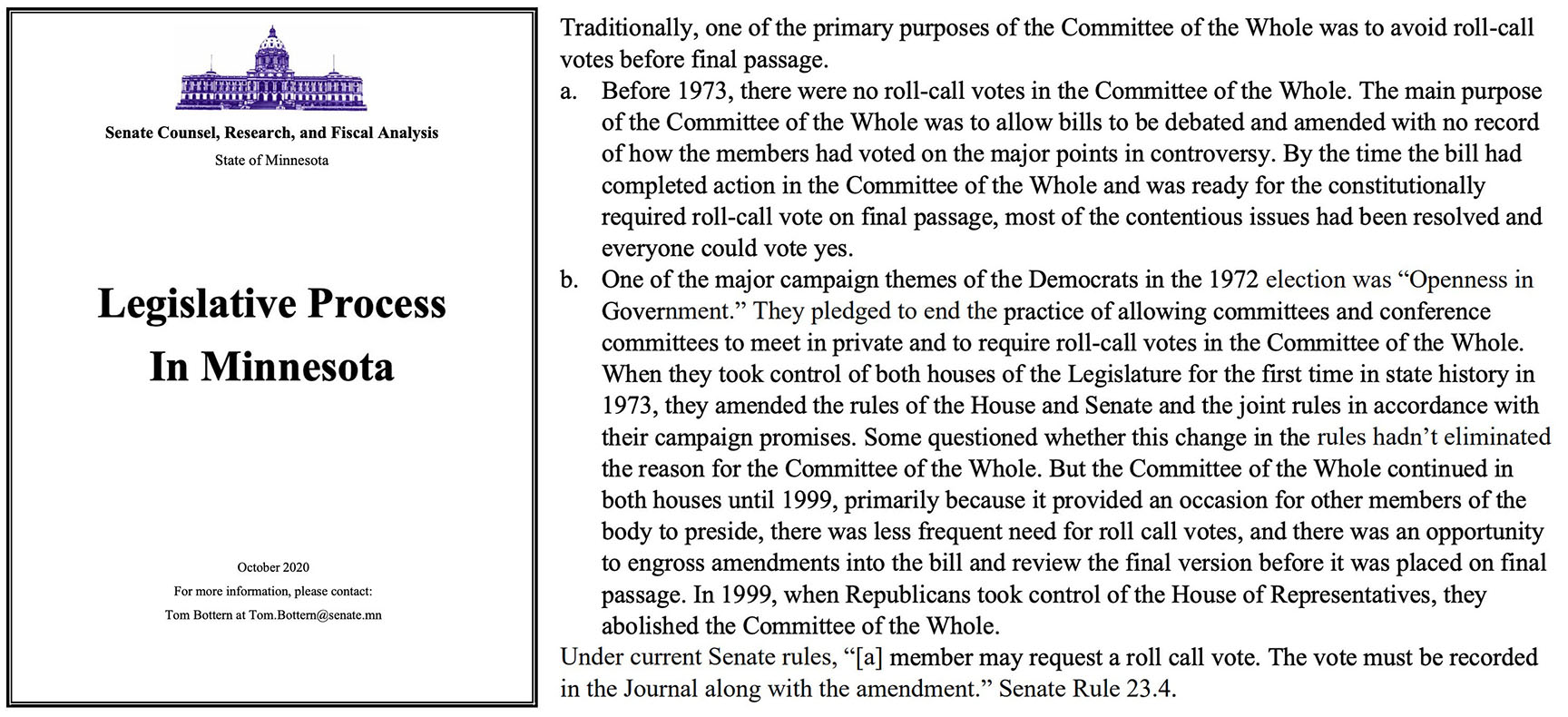
Tom Bottern 1973 - Minnesota state opens its doors and begins recorded votes (States adopt sunshine)

Tom Bottern 1973 - Minnesota state opens its doors and begins recorded votes (States adopt sunshine)
“Concerning the consequences of closed sessions for tax bills prior to 1985, one Ways and Means member noted: “I think closed meetings were especially effective in developing the ‘83 and ‘84 tax bills, in removing exemptions, and [in] refusing to accept amendments that would have lost money for the Treasury.”Anonymous Member of Ways and Means 1989
The New Ways and Means
The day secrecy is abolished, negotiation of any kind will become impossible.Jules Cambon 1935
Secret Diplomacy
It is a truism of government that compromise cannot be pressed in public; the open forum of the parliamentary floor is well designed for ideology and rhetoric, but the real areas of agreement are more often to be found in committees, corridors, and cloakrooms.Floyd Matson 1955
In Defense of Compromise
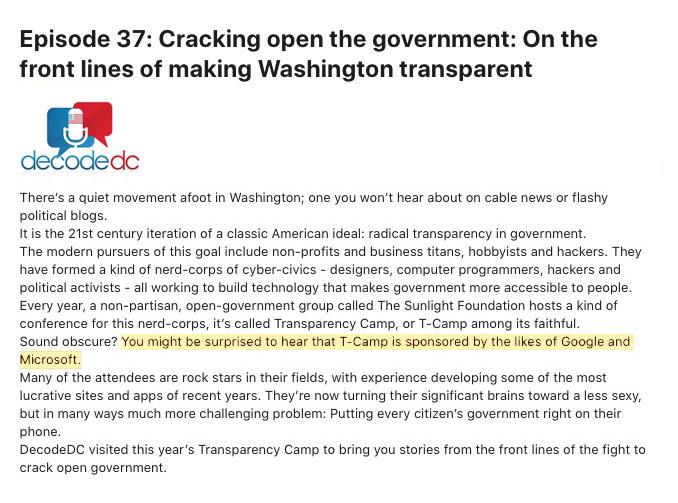
Microsoft and Google funding increased transparency via the Sunlight Foundation - DecodeDC

Microsoft and Google funding increased transparency via the Sunlight Foundation - DecodeDC
The most sophisticated criticism of open meeting legislation is that necessary negotiation and compromise are prevented by public discussion. Critics note that special-interest lobbyists are now able to attend bill-writing sessions of the Senate Finance and the House Ways and Means committees. Such lobbyists can scrutinized the activities of their tax-writing congressional friends, who with open meetings lose the opportunity of dropping a special-interest tax exemption in a closed meeting and telling a white lie to a lobbyist friend about what happened behind closed doors. One Ways and Means Committee member told me that he sees “lots of lobbyists” at open committee meetings, but he “doesn’t see lots of housewives coming down from the suburbs.”Andrew S. McFarland 1984
Lobbying in the Public Interest (Common Cause)
The results [of opening up the conference committees in 1975] is that under the watchful eye of lobbyists, conferees tend to fight harder for provisions they might have dropped quietly in the interests of bicameral agreement. In 1981, for example, a key farm lobbyist was credited with influencing the agricultural conference “just by sitting in the front row.” His presence was significant because “members know that he will report back to the sugar growers telling them who their friends are, and his mere presence reminds the lawmakers how the game is played.”Lawrence Longley & Walter Oleszek 1989
Bicameral Politics
SASC [Senate Armed Services Committee] markups have always been closed. While the committee must release the results of any roll call votes during markup (in accordance with Senate Rule XXVI 7(3)(b)), the debates, amendments, and non-roll call votes can remain secret. Staff preparations for the markup are also embargoed. While the nominal justification is concerns over national security, Shogan (2012) argues that more practical considerations prevail. Citing interviews with current and former SASC staffers, Shogan argues that the closed markup allows SASC staffers greater scope for candidness in discussion and pragmatism in compromise, freed from the scrutiny of the press, lobbyists and advocacy groups.Katherine Blakeley 2017
Fighting Green: How Congress and the Pentagon Make Defense Policy
During the markup process, lobbyists and reporters are kept at a distance. Usually, the chair and the ranking member stress to staff at the beginning of the full committee markup the importance of confidentiality during the committee’s deliberations. Leaks to the press or interest groups are taboo and considered unprofessional.Colleen Shogan 2011
Defense Authorization: The Senate's Last Best Hope
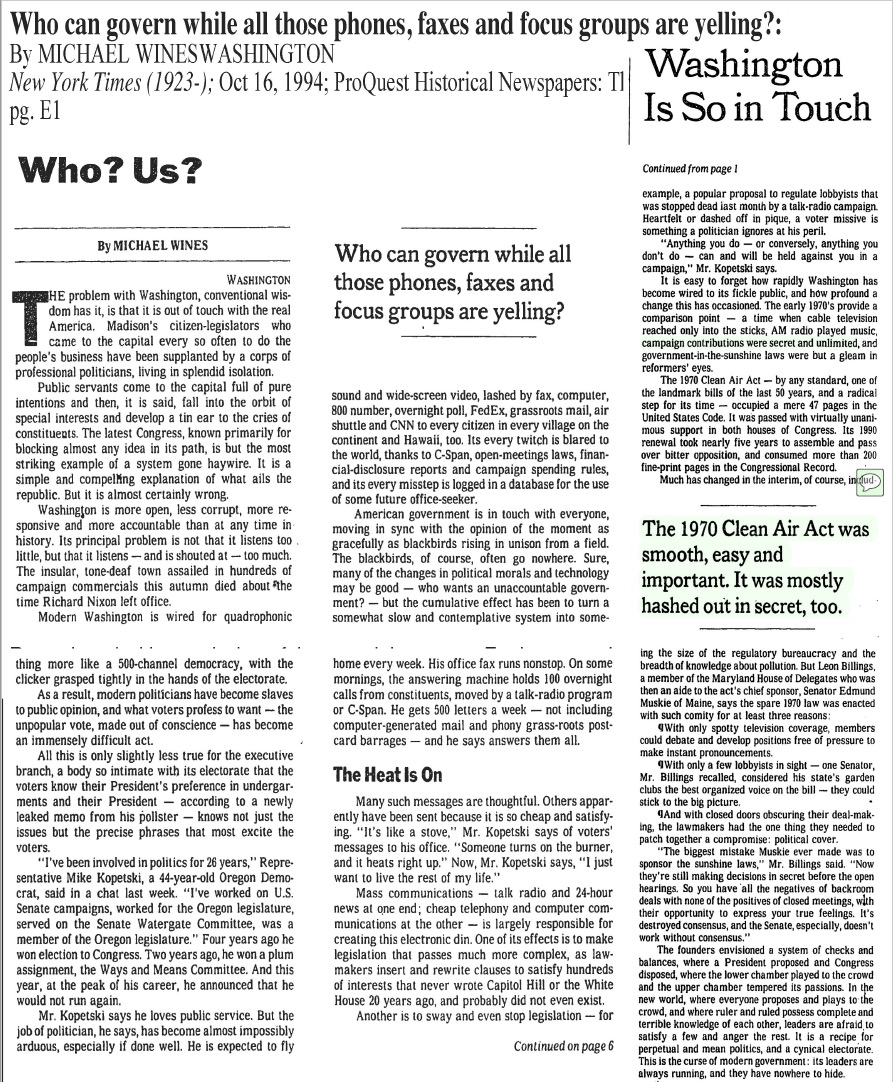
Michael Wines 1994 - Who can govern while all those phones, faxes and focus groups are yelling?
Text: The 1970 Clean Air Act was smooth, easy and important. It was mostly hashed out in secret, too.

Michael Wines 1994 - Who can govern while all those phones, faxes and focus groups are yelling?
Most committee staffers and MLAs agree that the closed markup in SASC results in a more efficient and candid policymaking process. Without reporters or lobbyists in the room, Senators are free to debate difficult decisions and make deals without the pressures to posture or conform to narrow ideological or parochial views.Colleen Shogan 2011
Defense Authorization: The Senate's Last Best Hope
The new sunshine reforms opened the door to the growing influence of think tanks, lobbyists, and other organized interests.Andrea Louise Campbell, Kimberly J. Morgan 2005
Financing the Welfare State: Elite Politics and the Decline of the Social Insurance Model in America
This occurred just as policymaking was opened to the wider Congress, which had increasing incentives to hew to the preferences of affluent voters and narrow interest groups. Ironically, the old closed community produced outcomes closer to the preferences of the median citizen, whereas opening up the process resulted in policy oriented toward wealthier and more organized groups. As a consequence, the American welfare state lost a major source of financing, stymieing redistributive initiatives for decades to come. Andrea Louise Campbell, Kimberly J. Morgan 2005
Financing the Welfare State - Elite Politics and the Decline of the Social Insurance Model in America
In an open meeting, the lobbyist knows “who does what, says what, and stands for what.” The conferee’s decision is there for all to see, and “promise-making includes promise keeping.” Besides pressures on conferees arising from lobbyists’ presence, open conference sessions give lobbyists and other interested parties the ability to know more precisely and accurately what is going on. When conferences were closed, a lobbyist’s knowledge of the proceedings was less certain because he generally could monitor the conferences only through information supplied him by conferees who favored his viewpoint. Allies are not always perfect information sources, especially if they have modified or wavered in their initial views and positions. Now, having more complete and direct information through personal observation of conference negotiations,
lobbyists can better ensure that their influence and persuasive efforts bear fruit .Lawrence Longley & Walter Oleszek 1989
Bicameral Politics
Roll call votes were called for five straight amendments to Senate File 109, a bill that prevents red flag gun seizures in Wyoming. The call for these votes was made prior to debate starting on the amendments, which Zwonitzer said was outrageous. He said it wasn’t coincidence that this happened while a few prominent national gun lobbyists were watching from the gallery, standing and taking photos of the legislators for every vote. “It seems to be weaponizing the process against ourselves, anything that they think is a social, ideological, controversial issue that they can use in the upcoming election,” Zwonitzer said.Leo Wolfson 2024
Legislator Says Wyoming Freedom Caucus Is ‘Weaponizing’ House Roll Call Votes (gun control)
China 2018 - Intimidates and Bribes UN Votes
The public voting board was introduced in the 1970s and is visible in this video at 7:02. Transcript starting at 6:32 Narrator: “It’s been found that if an African country recognizes (votes in the UN in support of) Taiwan as a country they receive, on average, 2.7 fewer Chinese infrastructure projects within their borders each year. Conversely, if an African country votes overwhelmingly along with China in the United Nations General Assembly, they receive 1.8 more infrastructure projects per year. Considering that the General Assembly is an equal representative body where each country gets one vote no matter if they have a million residents or a billion, China’s getting a lot of influence for, in the grand scheme of things, not a lot of money.”
China 2018 - Intimidates and Bribes UN Votes
In many cases, however, there is little political isolation for the conferees. Instead external participants such as the president, representatives of governmental agencies, and interest groups have intense interest and impact on the conference deliberations. “This is not a conference between the two houses,” remarked Senator John Danforth (R. Mo) in 1988 about the omnibus trade conference of the 100th Congress. “It’s a conference between Congress and the administration.” Some conferences, in brief, operate in relative isolation’ others are deeply immersed in politically volatile webs of interests and pressure.Lawrence Longley & Walter Oleszek 1989
Bicameral Politics
In the back room of the Senate Finance Committee earlier today, I took the same position I’m taking now. I said that this should be ventilated, and there is no reason not to put it out before the public and give us and our staffs a chance to look at it before we sign the conference report. The position that was taken by our chairman, by Secretary Baker, and several other senators who were present was: “Well, we can’t do that. We can’t put it public, we’ve got to sign the conference report now.” Why? Well the reason given was that if we don’t do it now, people are going to find out what we’re doing before we do it. And if they find out, they’re going to bring pressure on us during the recess. Lobbyists, interest groups, people who have concerns about the bill are going to bring pressure on the Congress, and we can’t have that. Now, Mr. Chairman, I don’t understand what’s wrong with a little sunshine in government!Representative John Danforth 1986
Showdown at Gucci Gulch (1986 Tax Reforms)
It used to be that secrecy was seen as essential to good government, especially when it came to crafting legislation. Terrified of outside pressures, the framers of the U.S. Constitution worked in strict privacy, boarding up the windows of Independence Hall and stationing armed sentinels at the door. As Alexander Hamilton later explained, “Had the deliberations been open while going on, the clamors of faction would have prevented any satisfactory result.” James Madison concurred, claiming, “No Constitution would ever have been adopted by the convention if the debates had been public.” The Founding Fathers even wrote opacity into the Constitution, permitting legislators to withhold publication of the parts of proceedings that “may in their Judgment require Secrecy.”James D’Angelo & Brent Ranalli 2019
The Dark Side of Sunlight (Foreign Affairs Magazine)
Before the reforms, it was much more difficult to hold individual members accountable for specific provisions of tax legislation. Instead, bills were collective, privately forged committee products that were presented to the House in a take-it-or-leave-it manner… With the congressional reforms the balance of power shifted. To retain their seats and to win House approval of committee bills, Ways and Means members had to be more responsive to requests from constituents, organized interests, and their House colleagues. These new pressures were intensified by the sunlight of open meetings. Ways and Means members could now be held accountable for their positions on every provision that made up a tax package. In short, the Ways and Means Committee was easier to penetrate, particularly by organized interests, and much less autonomous. In turn, the committee could no longer provide cover for House members.Catherine Rudder 1989
Fairness and the Revenue Committees
Reformers ought to steer clear of always trying to ensure more democracy, more openness. I think the constant pressure for “more democracy” has had some negative consequences. The openness in Congress has meant being open to organized interests, not to a broad public. Opening up the the parties has just made them more accountable to activist groups. Openness is not always the solution. It’s the easiest normative rationale one can offer for reform proposals. But in the real world it often has negative consequences.Frances Lee 2018
The Parties Are Dying
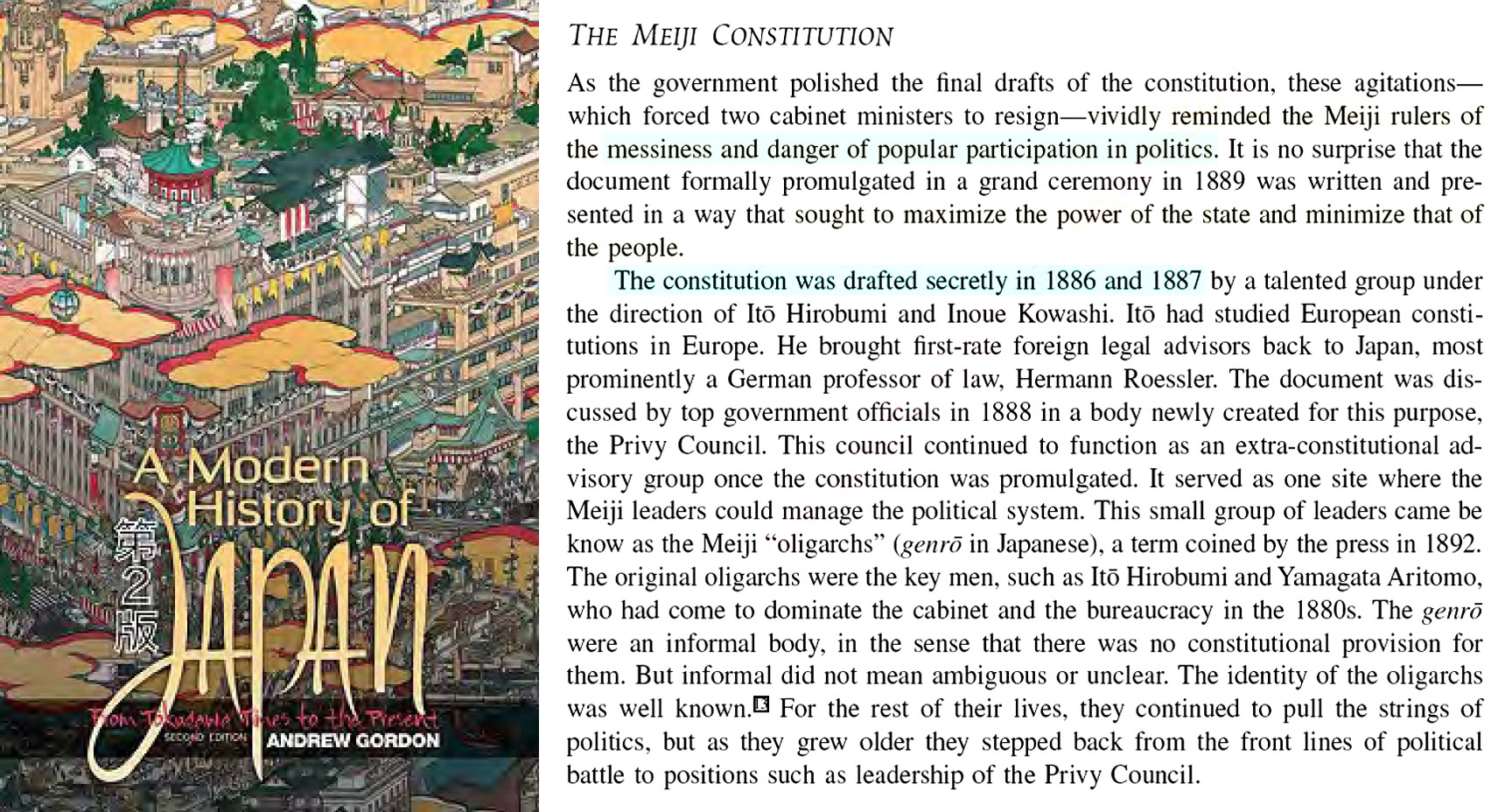
Andrew Gordon 2003 - A Modern History of Japan
Andrew Gordon 2003 - A Modern History of Japan
Throughout American history, whenever we’ve been faced with a deeply entrenched internal divide, the solution has nearly always been forged within a certain zone of confidentiality.Jason Grumet 2014
The Dark Side of Sunlight (City of Rivals)
Japanese constitution-makers paid careful attention to Prussian political theory and turned to Prussian advisers for guidance in drawing up the document which became the Constitution of 1889. Emissaries were even sent to America but they rejected the American model as unworkable. The German Constitution offered a suitable pattern for adaption to Japanese needs. As Sansom points out, the government for their part was interested in examining ‘the practical working of the systems of government in use in the leading countries of the West, in order to ascertain which was most appropriate to the needs of Japan.’ More than twenty German advisers and experts were said to be employed in connection with the drafting of the constitution. The constitution was drafted secretly and was handed down from above (granted by the Emperor as a ‘gift’ to the people) and not arrived at through free discussion in a constituent assembly. This secret procedure was said to have been suggested by Harvard educated Kaneko Kentaro (one of the three men most intimately involved in the drafting work), who had discovered that the deliberations of the American constitutional forms had been in secret.Berm Prasad Barua 1967
Constitutional Evolution of India and Pakistan - The Meiji Constitution
Ray Dennison, an AFL-CIO lobbyist who opposed the trade bill, said he always prefers open markups and found the closed trade bill sessions particularly unfair.CQ Quarterly 1973
Senate and House Open Up their SessionsNote: Dennison is a lobbyist who is explicitly calling for more transparency.
The best example of privacy’s crucial role in American democracy can be found at the beginning, in the years that followed our founding. The Constitutional Convention, in fact, was closed to the public-at-large. In determining the rules for the Constitutional Convention, the founders decided “to forbid ‘licentious publications of their proceeding’” – and for good reason. (Essentially, all the sessions were closed to the public, and none of the participants was allowed to discuss the deliberations in the press.) Had the public been privy to the delegates’ negotiations, it is almost impossible to imagine how they might have emerged with the thoughtful, balanced, and dfective document we now hold up as the cornerstone of American government. Jason Grumet 2014
The Dark Side of Sunlight (City of Rivals)
The Mitchell-sponsored talks were conducted behind closed doors and they spurned roll-call votes that would have revealed the legislative divisions. Mitchell believed, probably correctly, that senators would not get down to hard negotiating on environmental issues so long as they were in the public spotlight, where they might make statements that a political opponent could use against them. The closed-door meetings also allowed senators to ask questions and to educate themselves about often complex issues in a way that might have proved embarrassing in front of a television camera.Richard Cohen 1994
Washington at Work: Back Rooms and Clean Air (Climate)Note: This citation refers to the passage of the 1990 Clean Air Amendments (the most powerful environmental/climate legislation in the past 40 years), which were brokered almost exclusively behind closed doors by Mitchell and others expressly to avoid the pressure of lobbyists. Full citation can be found here.
The 10 weeks needed to pass the clean-air legislation were unusual in several respects. There was no extended talk and procedural delay on the Senate floor, as is traditional in a filibuster. Instead, most of the debate was conducted behind closed doors a few feet away from the Senate chamber in the back room of Mitchell’s spacious leadership suite. From all reports, that discussion among senators was exceptionally spirited as lawmakers abandoned their aides and speeches to engage in real exchanges of views.Richard Cohen 1992 p88
Washington at Work: Back Rooms and Clean AirNote: Cohen remarks how the Civil Rights legislation was burdened by endless filibuster whenever the talks were brought into the public sphere. Indeed, in other graphs on this page, once can see the massive rise in filibusters when Congress acts in the sunshine of open doors.
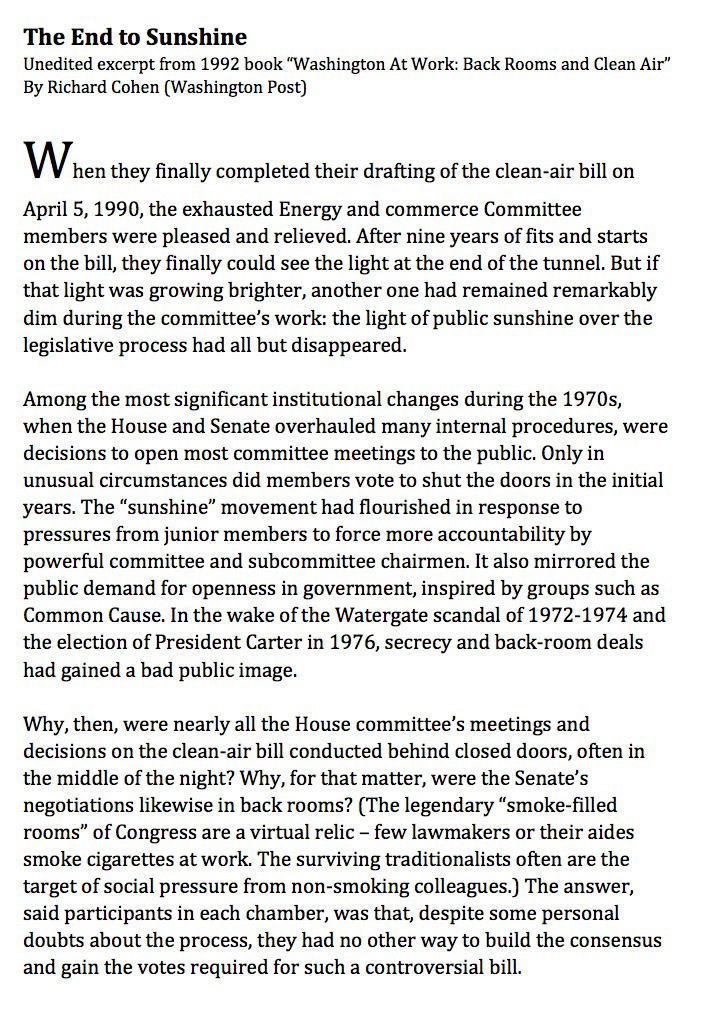
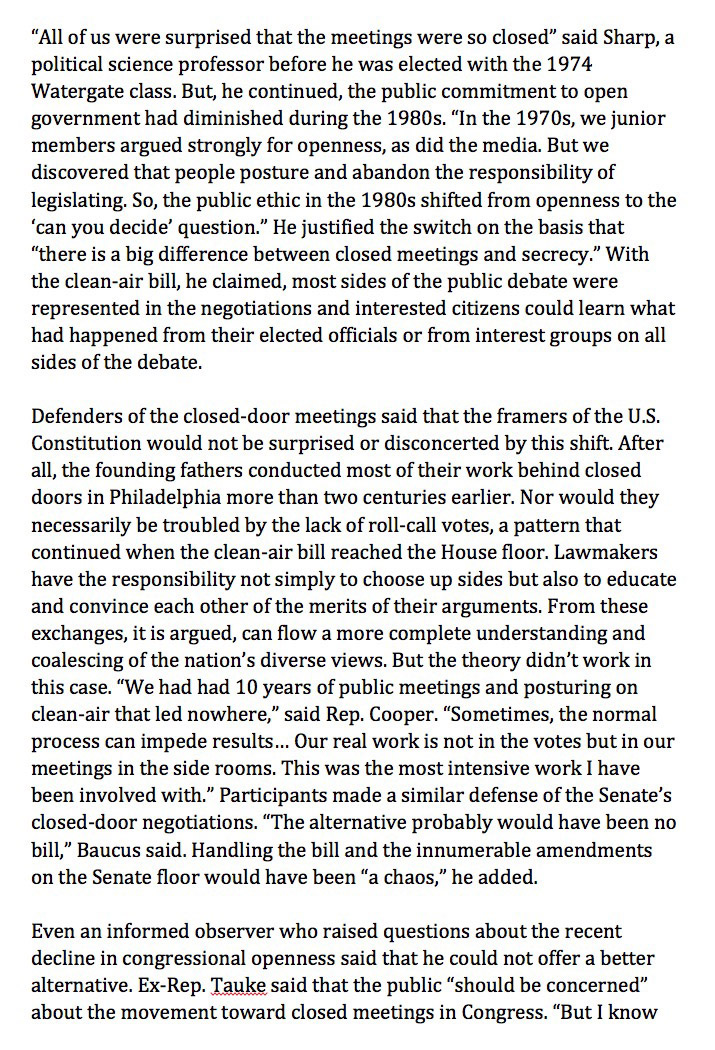
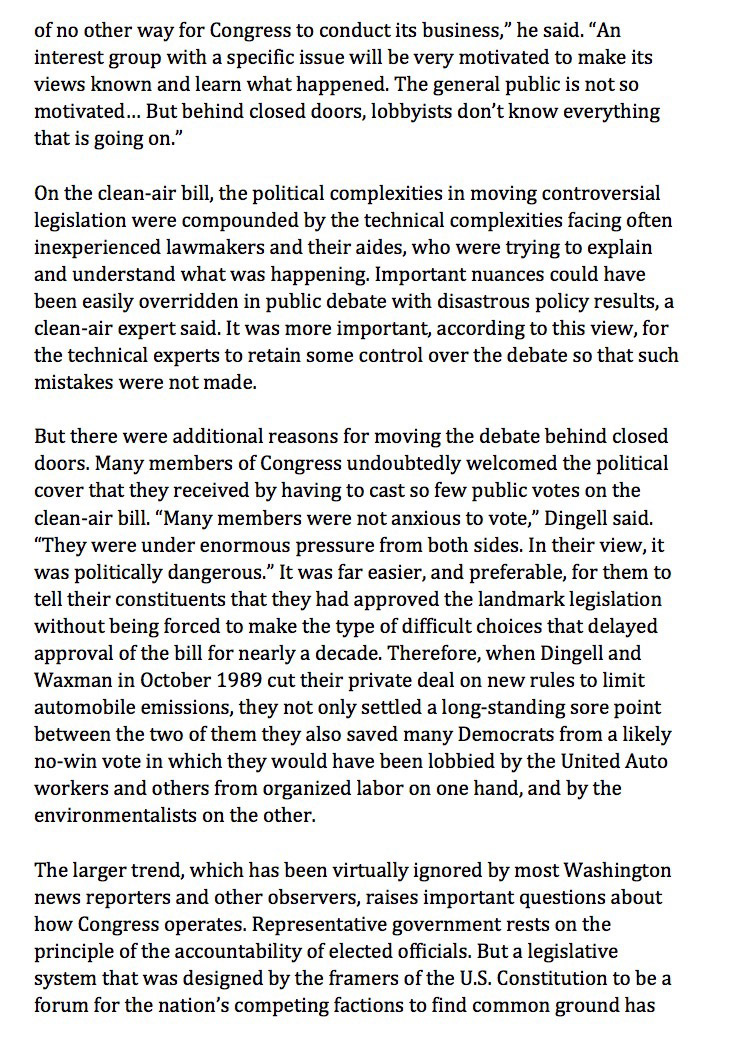
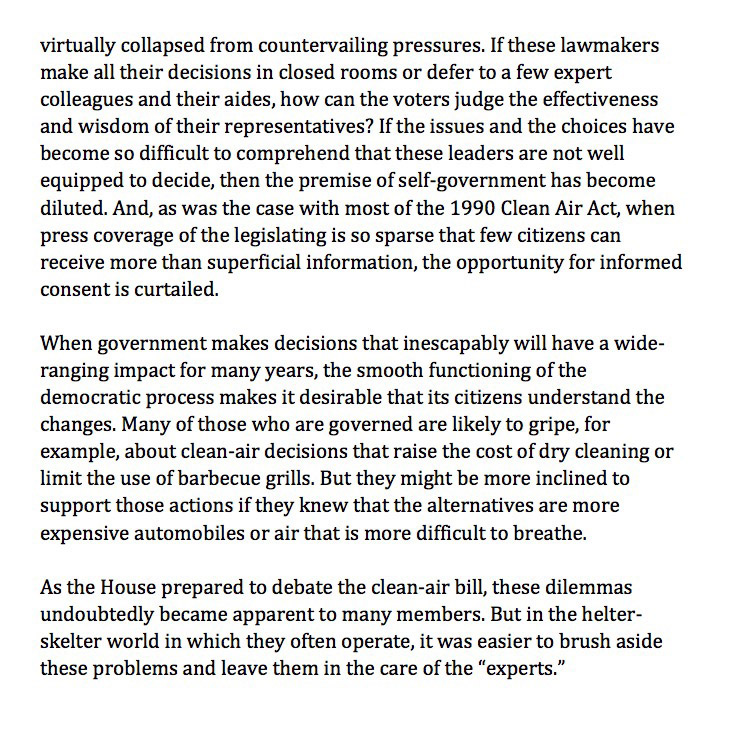
Richard Cohen 1993 - Washington at Work: Back Rooms and Clean Air (Climate)

Richard Cohen 1993 - Washington at Work: Back Rooms and Clean Air (Climate)
Opening meetings to the public has meant opening meetings to everyone, including lobbyists, who, it has been claimed, take an even greater part in writing Ways and Means legislation than they did in the past… Thus, the open meetings have made members more accountable to whoever cares to pay attention.Catherine Rudder 1977
Committee Reform
After the 1976 Government in the Sunshine Act required that congressional committee meetings be public, surveys of senators soon concluded that these open meeting requirements were the largest single cause of a decline in the ability to negotiate and to make politically difficult trade-offs.Richard Pildes 2014
Romanticizing Democracy
The silent majority is not going to be present at the open markups of the bills; they are going to be too busy and too occupied otherwise. But if you have open markup on bills… do you not think that the special interests will be there? The silent majority will not be there, but the special interests will be well represented.Rep George Mahon 1970
Donald Wolfensberger (Congress & the People)
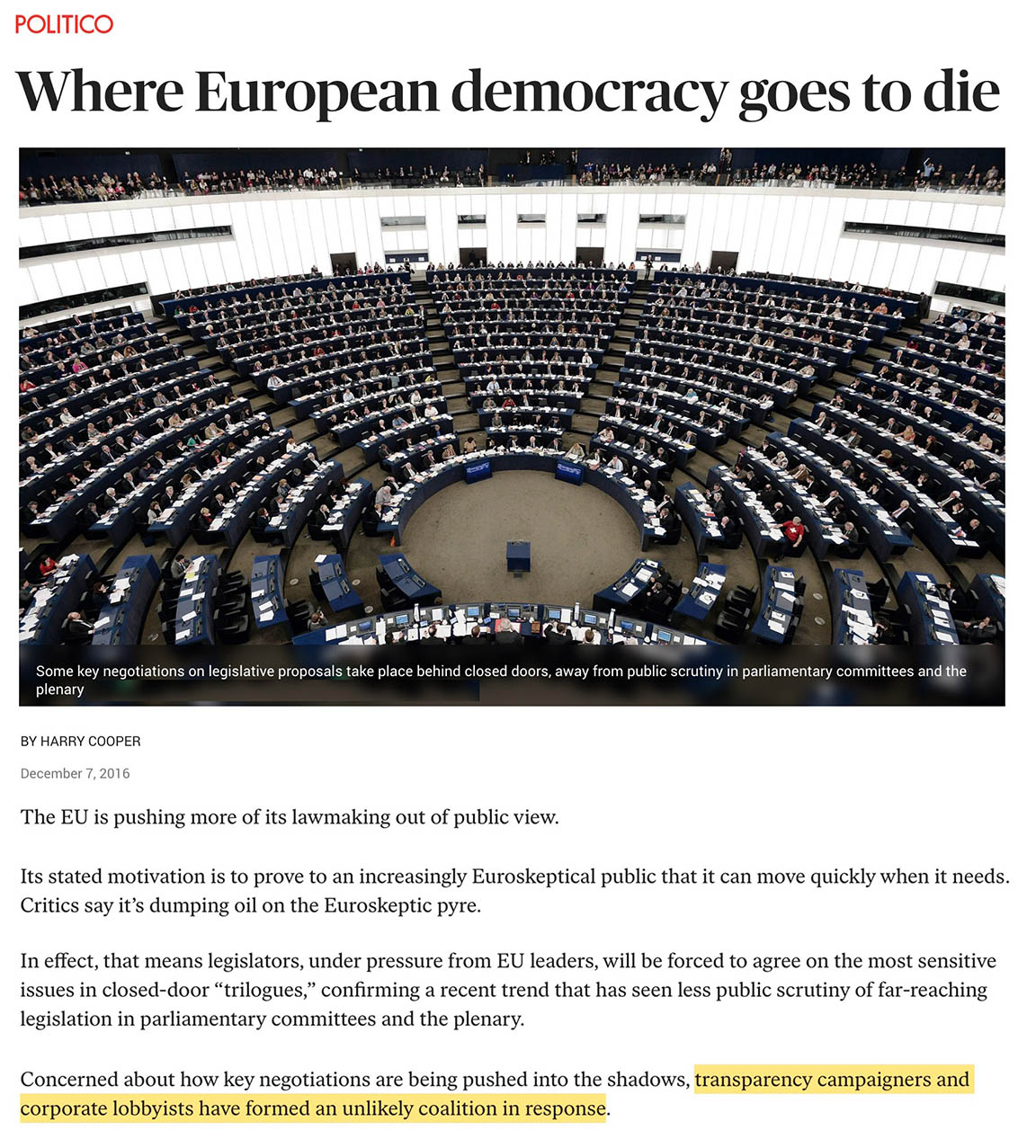
Harry Cooper – 2017 Politico
Throughout the world, the biggest push for transparency comes from billionaires, lobbyists and billionaire-funded transparency organizations. More from the article: “By the end of this month, the European Parliament will have to respond to demands made by the European ombudsman, Emily O’Reilly, earlier this year to “de-mystify” the negotiation process. She wants sensitive documents published and agendas made available online, among other things. Her move has been welcomed by an unlikely alliance of corporate lobbyists and transparency campaigners, who are also demanding that meetings are made more open.”

Harry Cooper – 2017 Politico
The House Committee on Public Works, for example, had about six staffers assigned to the 1972 Clean Water Act. One of them, Gordon Wood, remembers an intimate process that enabled compromise... He said closed-door meetings enabled lawmakers to take off “their blue shirts and red neckties.”Emily Yehle 2014
Recalling the long, hard slog to a ‘Historic piece of legislation’ (Climate)
Transparency Could Stymie the Deal: The congressional supercommittee charged with tackling the federal debt crisis is facing overwhelming calls to conduct all its deliberations in the open, but some voices are warning that too much transparency could end up dooming the whole thing. “Do you want to get anything done?” said former Rep. Thomas M. Davis III, Virginia Republican. “I think you lock them in a closed room and let them hammer it out, where they can say what they want to say, where they can bring up what they want to bring up and not have it held against them on the Sunday talk shows.”Stephen Dinan 2011
Exposure vs. Efficiency
[Samuel] Adams was rare for his ability to keep a secret, any number of which he took to the grave, including the backstory of the Boston Tea Party, which he knew as well as anyone. (Dryly he noted that some individuals enjoyed every political gift except that of discretion.)…Much of his work depended on plausible deniability. He covered tracks and erased fingerprints. He made no copies of his letters. John Adams watched helplessly in 1770s Philadelphia as his cousin fed whole handfuls of papers to the fire in his room. Was he perhaps overreacting? asked John. “Whatever becomes of me,” Samuel explained, “my friends shall never suffer by my negligence.” In the summer, he used scissors to cut bundles of letters to shreds and scattered the confetti from the window, sparing his associates if stopping the biographer’s heart. A portion of what he did not manage to destroy met with some mistreatment, of which we have only hints. He operated by stealth, melting into committees and crowd actions, pseudonyms and smoky back rooms. “There ought to be a memorial to Samuel Adams in the CIA,” quips a modern historian, dubbing him America’s first covert agent. We are left to read him in the twisted arm, the borrowed set of talking points, the indignation of America’s enemies. We know more about him from his apoplectic adversaries than from his friends, sworn to secrecy.Stacy Schiff 2022
The Revolutionary: Samuel Adams (Sam Adams)
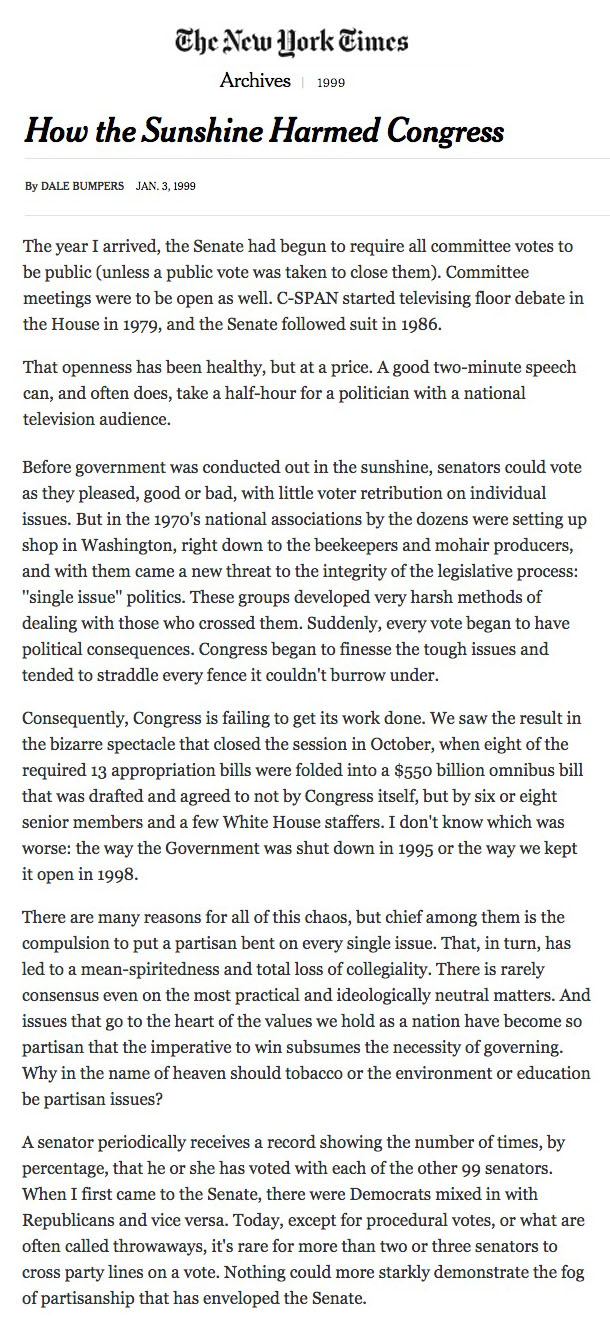
Senator Dale Bumpers 1999 NY Times

Senator Dale Bumpers 1999 NY Times
Elizabeth Theiss-Morse, of the University of Nebraska says most voters don’t want to see Congress in action. “These Americans would much rather have Congress do its work behind closed doors so long as their representatives are not being bought by special interests and so long as the public has the opportunity to learn about decisions, the reasons for and against them, and why their representatives decided what they did,” she said. She said transparency is “often good, but not in this case,” because lawmakers would have to spend so much time defending their ideas against attacks from interest groups. “If the supercommittee had to air every idea in public, it would be a disaster.”Stephen Dinan 2011
Exposure vs. Efficiency
Sen. Edmund S. Muskie of Maine, while supporting some means of unfiltered public exposure of Congress to the public through television, called attention to shortcomings in network coverage of committee hearings. “We all know that conflict makes news,” he said. “We also know that a televised shouting match usually concentrates more on the exchange of insults than the exchange of ideas.” In fact, “a congressional investigation receives more attention when important voices--but not necessarily significant questions--are raised.” Moreover, “the bulk of our productive work in the Senate,” what Muskie called “the actual exercise of legislating,” receives little attention from the media. In committees with open markup sessions, “private interests have been well represented in the audience – as lobbyists – while the public interest – in the form of journalists – has been noticeably absent.” He concluded on this point that “a clash of opinion is innately more newsworthy than the resolution of those differences.” Donald Wolfensberger 2000
Congress & the People
Because this Government is Republican, it will not be pretended that it can have no secrets…To discuss the secret transactions of the Government publicly, was the ready way to sacrifice the public interest. Debates and Proceedings of US Congress 1798
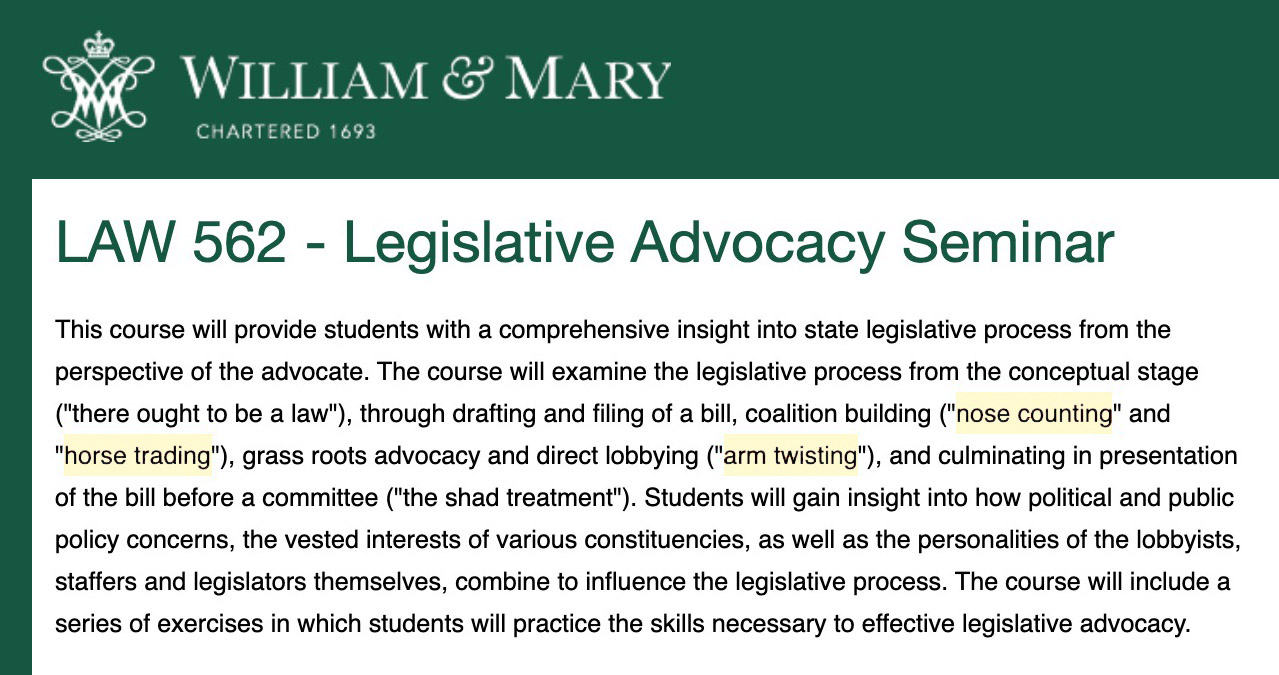
This 2020 seminar on advocacy (aka lobbying) at William and Mary highlights the importance of nose-counting (counting votes), arm-twisting (intimidation) and horse-trading (logrolling). In short, it is really a seminar in euphemisms where lobbying is rebranded as ‘advocacy’ and voter-intimidation is rebranded as ‘arm-twisting’ and logrolling (illegal in most state constitutions) is rebranded as ‘horse-trading.’ But one thing is clear, this objectively shady process relies on legislative transparency. And the selling of these tactics is certainly one of the the reasons why numerous important scholars and universities do not discuss the problem of transparency. For example George Washington University has a Government Affairs Institute, which if it were properly named would be called the Lobbying Institute. And their main scholars are vocal about how to fix Congress, but never once do they issue calls for less transparency. Closed sessions in Congress would all but eliminate the product they are selling.

This 2020 seminar on advocacy (aka lobbying) at William and Mary highlights the importance of nose-counting (counting votes), arm-twisting (intimidation) and horse-trading (logrolling). In short, it is really a seminar in euphemisms where lobbying is rebranded as ‘advocacy’ and voter-intimidation is rebranded as ‘arm-twisting’ and logrolling (illegal in most state constitutions) is rebranded as ‘horse-trading.’ But one thing is clear, this objectively shady process relies on legislative transparency. And the selling of these tactics is certainly one of the the reasons why numerous important scholars and universities do not discuss the problem of transparency. For example George Washington University has a Government Affairs Institute, which if it were properly named would be called the Lobbying Institute. And their main scholars are vocal about how to fix Congress, but never once do they issue calls for less transparency. Closed sessions in Congress would all but eliminate the product they are selling.
There are, in short, more people than ever before watching Congress, and fewer secrets that can be kept hidden. The work of Congress is more than ever before a public enterprise, and information about what is happening, and why, is readily available to those who know how to obtain it. It is precisely the very openness of the process that makes Congress so susceptible to influence by lobbyists.Bruce Wolpe 1990
Lobbying Congress
Efforts to dampen corruption with transparency usually threaten to promote it. The source of the problem is easy to explain. Corruption requires bargaining. By sharing information, transparency lowers the transaction costs of corrupt bargaining.Michael Gilbert 2018
Transparency and Corruption
This openness presumably made Congress more accountable to the general public. In some cases, however, the main beneficiaries have been organized interest groups – which, unlike the general public, closely monitor legislative activity and keep track of friends and enemies.Paul Quirk 1991
Evaluating Congressional Reform
The effect of open committee meetings, although intended to bring committee ties to organized groups into the “sunshine,” is more debatable. The attentive audience for committee meetings is often precisely those groups; and indeed committees have defended private negotiations and closed sessions as ways to reduce group pressure.Paul Quirk 1991
Evaluating Congressional Reform
Prior to 1970, much congressional activity was not readily observed by ordinary citizens. Many committee meetings, including most bill-drafting or "markup" sessions, were closed to the public. Floor debate was not televised. Many important floor votes were conducted as unrecorded voice votes, with the presiding officer simply calling for the yeas and nays and judging which were louder. The public learned only which side had won, not how their representatives had voted. As Bessette points out, the closed arrangements had the advantage of permitting members to deliberate with some autonomy. Paul Quirk & Sarah Binder 2005
Institutions of American Democracy
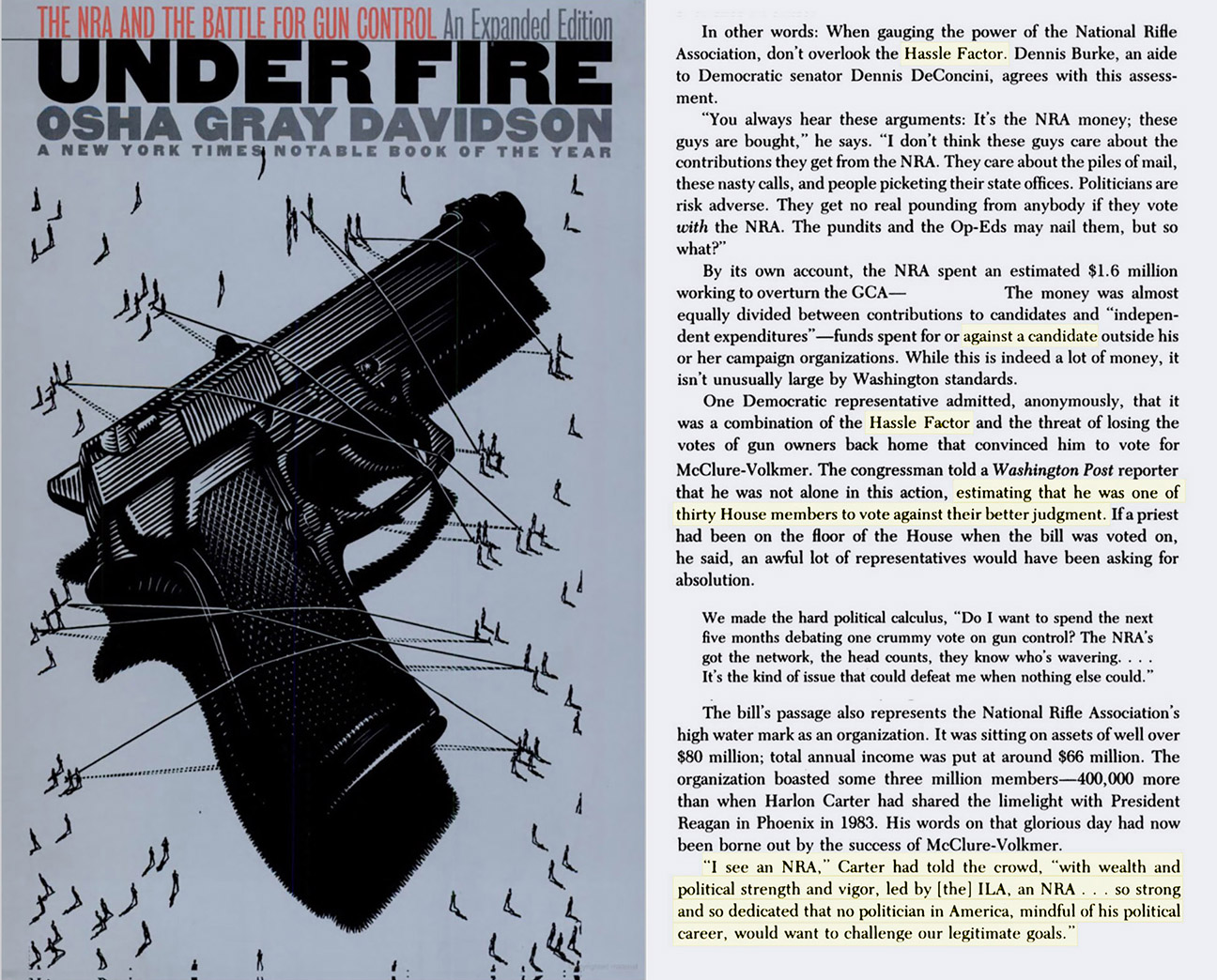
Osha Gray Davidson 1998 Under Fire
Gray discusses the intimidation of legislators and how they are forced to vote against their conscience (likely due to transparency) (NRA gun control).

Osha Gray Davidson 1998 Under Fire
Meetings occur behind closed doors so lawmakers can escape pressures from lobbyists and reporters, who have made it more difficult for them to handle business “in the sunshine.”Richard Cohen 1994
Washington at Work: Back Rooms and Clean AirNote: This citation refers to the passage of the 1990 Clean Air Amendments (the most powerful environmental/climate legislation in the past 40 years), which were brokered almost exclusively behind closed doors by Mitchell and others expressly to avoid the pressure of lobbyists. Full citation can be found here.
As the budget debate moved at half its expected pace in May 1979, Speaker “Tip” O’Neill claimed that more than the usual number of amendments to the budget resolution were being offered by House members eager to get themselves on television. O’Neill was quoted at one point as telling his colleagues that he had “made a terrible mistake” in allowing House telecasts.Ronald Garay 1984
Congressional TelevisionNote: Tip O’Neill was the main proponent of the 1970 Legislative Reorganization Act and televising House proceedings. Here he admits it was a terrible mistake.
Speaker, Tip O’Neill, continued his criticism [of televising House proceedings] a few weeks later. This time, prompted by the number of House members who were “taking to the floor to praise people in their districts by name, compliment trusted staff members and give speeches on purely local issues,” O’Neill called the effects television had had on the House a “disaster.” He noted that by the first week of August 1979 the Congressional Record contained 7,000 pages in transcripts of House floor proceedings – a 25 percent increase in pages over the same period during the previous year.Ronald Garay 1984
Congressional TelevisionNote: This comment about it being disaster comes with some painful irony as Tip O’Neill was the main proponent of the 1970 Legislative Reorganization Act and televising House proceedings.
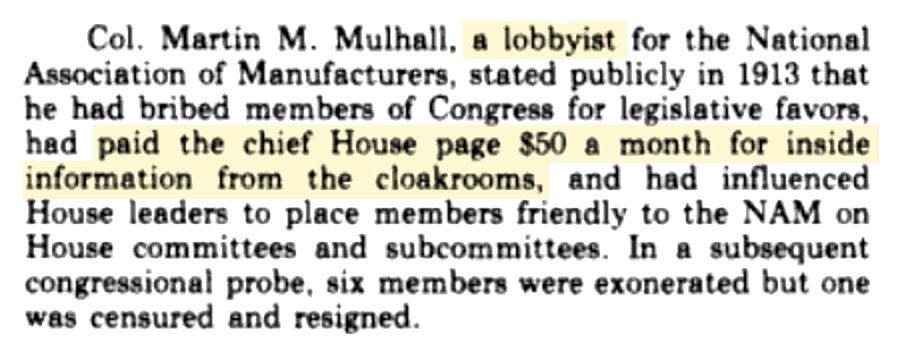
The Washington Lobby - CQ Press 1979
It was determined that Mulhall had his own private office in the Capitol building; had paid the chief House page $50 a month for information on private conversations in the Democratic and Republican cloakrooms; had regularly obtained inside information from Representative James T. McDermott, a Chicago Democrat, and Representative John Dwight, the Republican House leader.

The Washington Lobby - CQ Press 1979
Facing unprecedented exposure to public observation, members of Congress are now more prone to take unyielding stands on behalf of attentive constituencies (special interests) and to defer to uninformed prejudices of the general public.Paul Quirk 1991
Evaluating Congressional Reform
According to a 1981 estimate, about 85 percent of the FOIA requests filed with the Food and Drug administration came from companies it regulated. These companies sought information for court cases against government, or information about competitors’ activities. (The Rising Hegemony of Mass Opinion)Paul Quirk & Joseph Hinchliffe 1996
Loss of Confidence: Politics and Policy in the 1970s
The House Leadership resisted televising floor debate on the grounds that it would interfere with the orderly conduct of business and reduce the quality of deliberation. A few members voiced concern that broadcasting floor proceedings would change the House “from a forum to a theater.” But the popular appeal of a measure to increase openness gave the advocates of television coverage a decisive advantage. Reportedly, many members who feared harm to the deliberative process felt uncomfortable expressing that fear. Understandably so: To say that allowing the public to observe floor debate reduces the quality of deliberation does not pay the public a compliment. Broadcasting congressional proceedings was “one of those motherhood issues,” a congressional aide observed: “No one wants to come out against it.Paul Quirk & Joseph Hinchliffe 1996
Loss of Confidence: Politics and Policy in the 1970s
Even on bipartisan measures, House and Senate leaders prefer to manage all the bargaining behind closed doors. With no ideological sweet spot linking the parties, successful deals require “win-win” bargains: Each party gets its top priority and, in exchange, allows the other party to get its top priority. But negotiating win-win deals requires secrecy. If information leaks out about the less popular parts of a deal before the various constituencies hear about the parts they want, the entire negotiation can blow up. Closing the doors lets negotiators knit together an entire agreement before shaking hands.Sarah Binder 2017
McConnell’s Secretive Lawmaking
Putting things behind closed doors facilitates compromise that might not be possible out in the public’s eye… If our ultimate goal is to actually solve public problems, my approach is to give legislators the space they need in order to craft those deals.Sarah Binder 2017
Watchdogs Say Transparency Efforts Fall Short
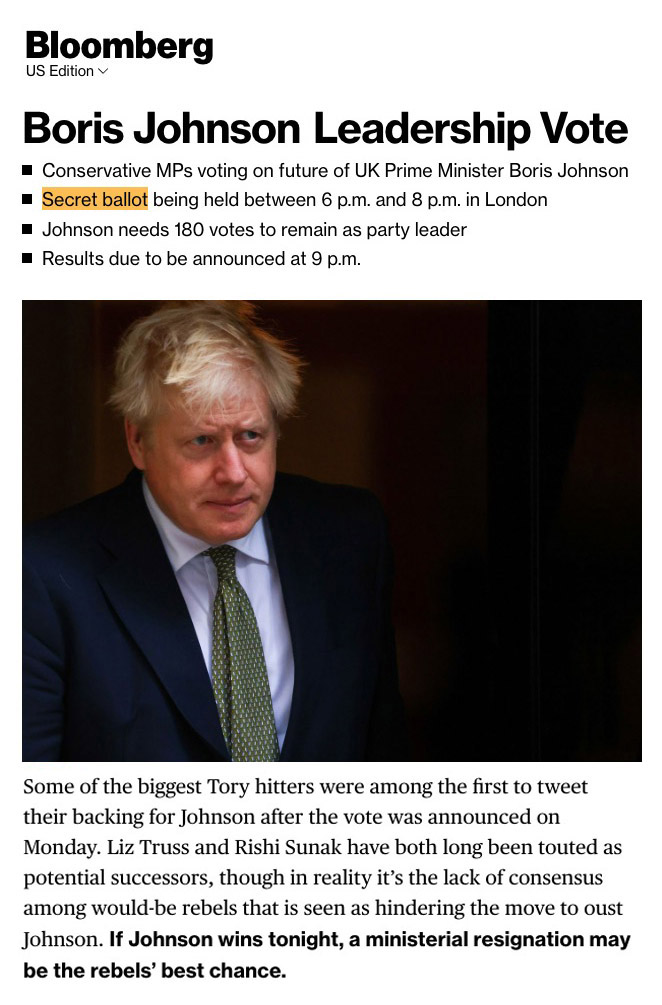
Boris Johnson 2022 - Secret Ballot Confidence Vote in England UK

Boris Johnson 2022 - Secret Ballot Confidence Vote in England UK
If the (appropriations) committee did not close its sessions out of self protection, the agency lobbying would be horrific.Steny Hoyer 1993
Public Business without Public Access
Too ‘open’ a presidency can build impossible expectations, induce claimants to bypass channels of access to departments and to Congress, clog the President’s information system, and preclude that measure of confidentiality necessary for face-saving negotiations.Stephen K. Bailey 1968
Agenda for the Nation (Brookings)
‘Sunshine’ laws have opened committee hearings to the gaze of the public, or more frequently in practice to lobbyists.Graham Wilson 1981
Interest Groups in the United States
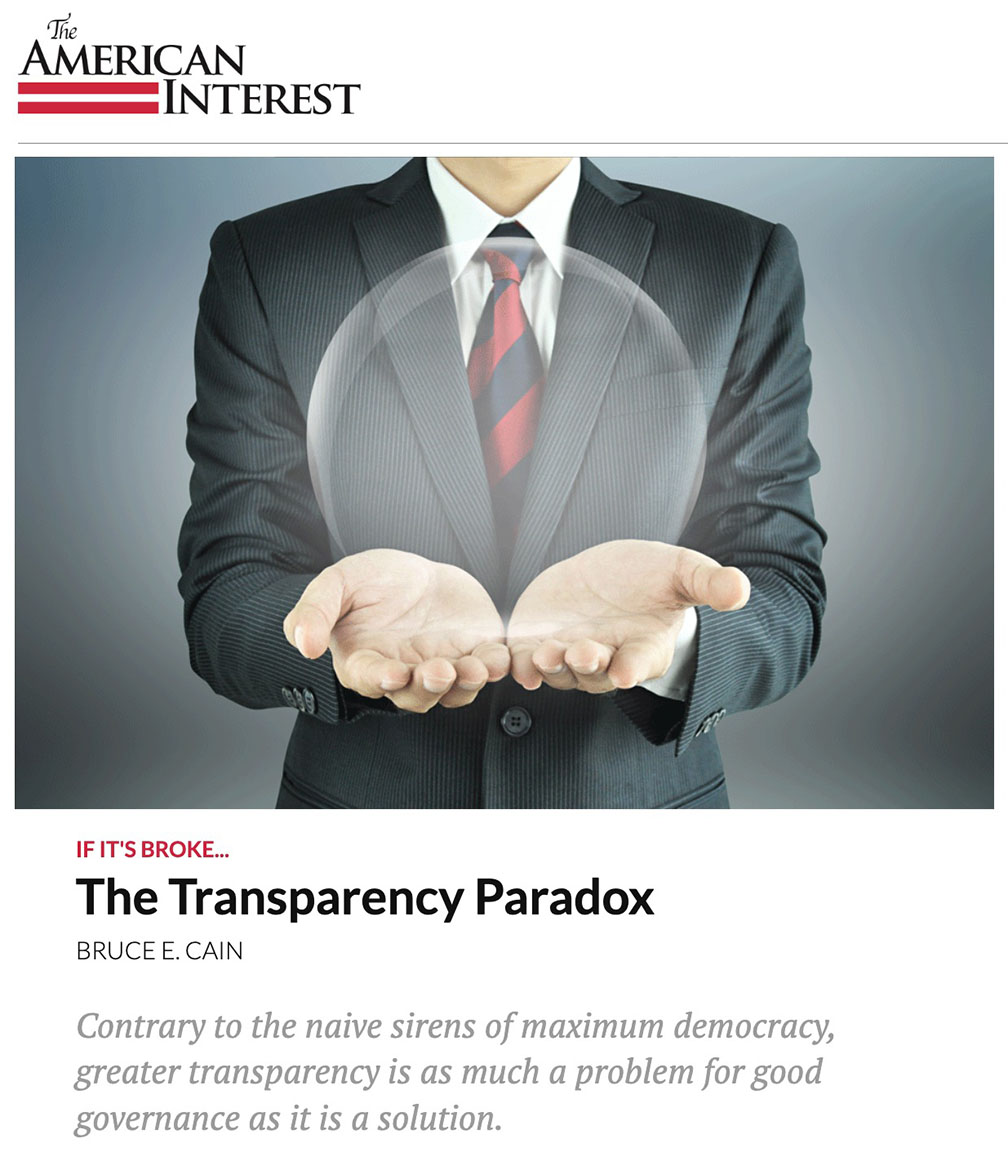
Bruce Cain 2014 - The Transparency Paradox

Bruce Cain 2014 - The Transparency Paradox
FOIA laws were sold as mechanisms of democratic accountability, but in reality most FOIA requests are made either by citizens looking for specific information about themselves or by businesses and other organizations looking for information about their competitors...Contrary to the naive sirens of maximum democracy, greater transparency is as much a problem for good governance as it is a solution.Bruce Cain 2014
The Transparency Paradox
There is nothing fundamentally wrong with the desire for private conversation – even among public officials… It’s time to let common sense reign and let government personnel communicate with each other through the medium of their choosing with a presumption of privacy.Matt Yglesias 2016
Against Transparency
Secrecy is an important shield for conferees [members of congressional conference committees] against pressures from outside.Jeffrey L. Pressman 1966
Bicameral Politics (Longley & Oleszek)
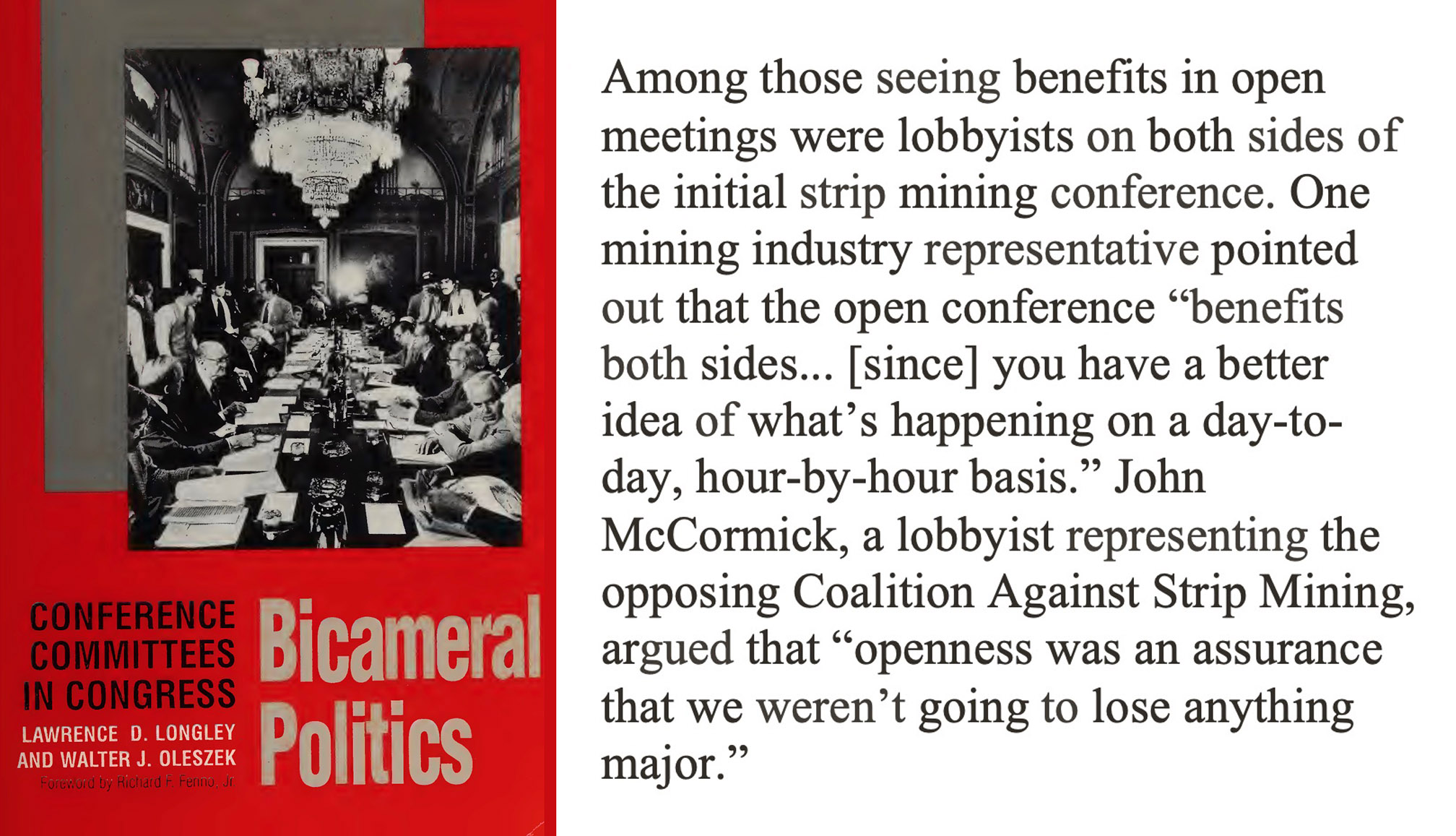
Longley & Oleszek 1989 - Bicameral Politics - Lobbyists Love the Sunshine
Text: Among those seeing benefits in open meetings were lobbyists on both sides of the initial strip mining conference. One mining industry representative pointed out that the open conference “benefits both sides... [since] you have a better idea of what’s happening on a day-to-day, hour-by-hour basis.” John McCormick, a lobbyist representing the opposing Coalition Against Strip Mining, argued that “openness was an assurance that we weren’t going to lose anything major.”

Longley & Oleszek 1989 - Bicameral Politics - Lobbyists Love the Sunshine
Daniel Dreyfus, staff director of the Senate Energy Committee, echoed Senator Hatfield’s remarks in commenting, “Since we opened up the doors, there has been a lot of time wasted in [committees]. In the old days, someone would say, ‘I know I’m going to lose on this item, so let’s just go ahead.’ Now, with a gallery there, they hold on for weeks trying to show they’re hanging tough.” The result is that under the watchful eye of lobbyists, [lawmakers] tend to fight harder for provisions they might have dropped quietly in the interests of bicameral agreement.Lawrence Longley & Walter Oleszek 1989
Bicameral Politics (how sunshine creates gridlock)
Many changes in conference committee proceedings were predicted to result from their opening. Among these were decreased efficiency in reaching agreements, an increased tendency for conference members to grandstand and play to the press, a wider use of secret meetings and caucuses to work out compromises awkward to negotiate in public view, and a greater tendency for conferees to argue for external interests and constituency concerns.Lawrence Longley & Walter Oleszek 1989
Bicameral Politics - Conference Committees in Congress
The lack of transparency in the convention’s agenda probably influenced the cast of characters who came to Philadelphia. The lack of transparency within the convention itself probably influenced its handiwork. Because they met behind closed doors and had bound themselves to an oath of secrecy, the delegates were able to candidly express opinions that, had they been declared publicly, would have immediately mobilized resistance and probably would have had deleterious consequences for their public careers.
Critics of the Constitution later complained of the convention’s having met in “secret conclave,” claiming that resistance might have developed sooner had the deliberations been public. The “genius of aristocracy,” they charged, had “prompted the convention [delegates] to enjoin secrecy on their members, to keep their doors shut, their journals locked up, and none of the members to take any extracts.” Jefferson criticized the convention’s secrecy as manifesting “ignorance of the value of public discussions,” but the delegates knew full well what they were doing: To open their proceedings to the public could kill their nationalist and antipopulist project before it had legs. Madison almost certainly was correct when he later observed that “no constitution would ever have been adopted by the convention if the debates had been public.” The secrecy of the convention’s proceedings was in stark contrast to the constitutional requirements of the very state in which the delegates assembled— namely, that legislative deliberations be conducted in public and that the Pennsylvania Assembly’s votes and proceedings be published on a weekly basis. Michael J. Klarman 2016
The Framers’ Coup
Madison defended the open-ended secrecy provision in the clause [of Article I, Section 5] requiring the publication of congressional journals on the grounds that it was impossible to enumerate everything that ought to be kept secret.Michael J. Klarman 2016
The Framers’ Coup
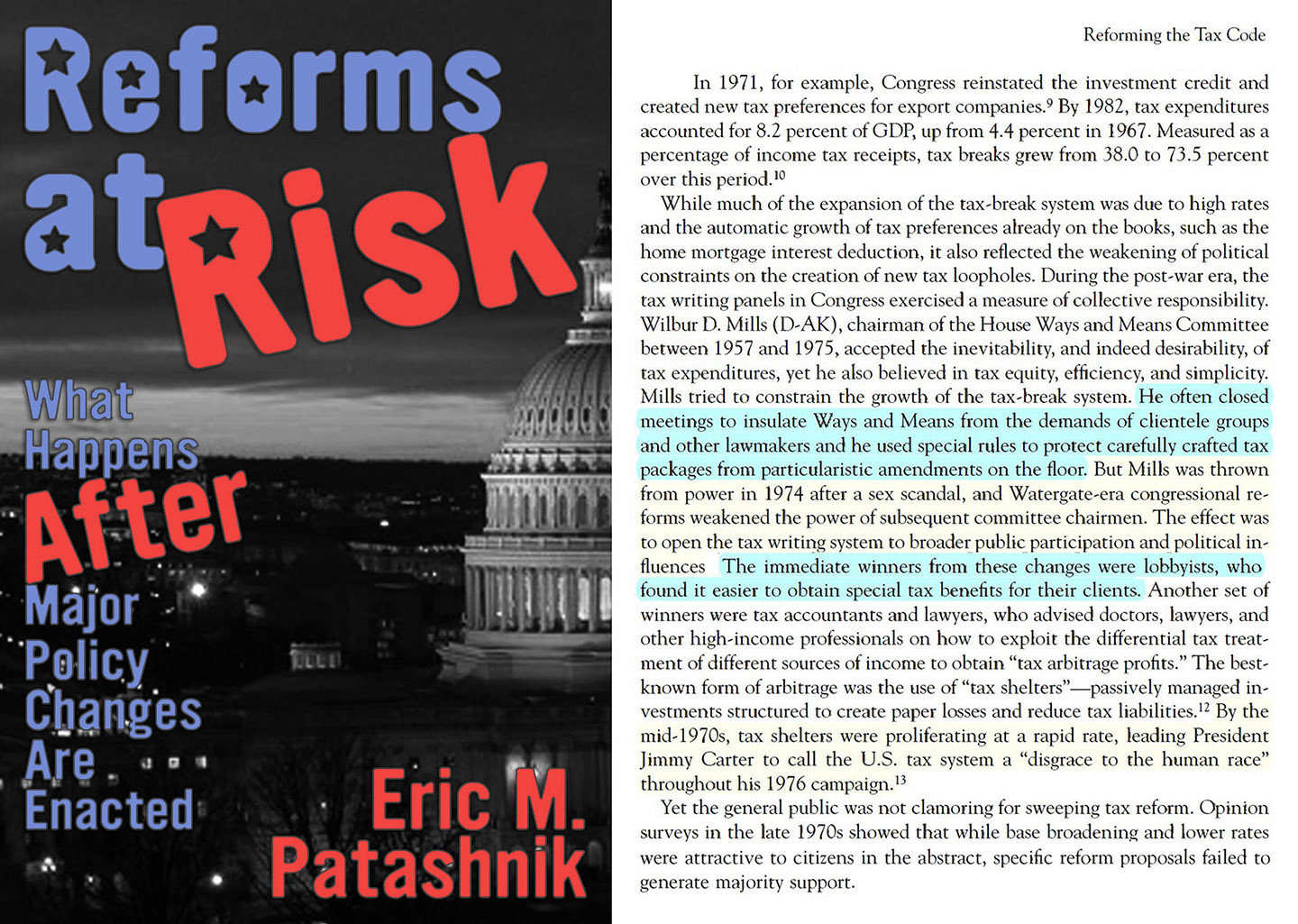
Eric Patashnik 2008 – Reforms at Risk - What happens after major policy changes are enacted

Eric Patashnik 2008 – Reforms at Risk - What happens after major policy changes are enacted
To speed progress [of the 1990 Clean Air Act] much of the negotiations during mark-up proceeded behind closed doors. On 22 March 1990 members emerged to report that a compromise had been agreed on urban smog which divided the worst polluted area of the country into categories based on the severity of their pollution and established methods to bring them into compliance with health standards.Christopher J. Bailey 1998
Congress and Air Pollution (Climate)
Although [George] Mitchell and Baucus believed that a majority of senators would vote for the Committee bill [on the 1990 Clean Air Act], they did not believe that they had sufficient votes either to invoke cloture if someone like Senator Byrd decided to filibuster the measure or to override a potential presidential veto. They decided as a result to work with the Administration to produce a compromise. A month of negotiations followed in which Mitchell and Minority Leader Dole, a few members of the Environment and Public Works Committee, EPA officials and White House officials led by Roger B. Porter met behind closed doors to fashion legislation acceptable to both sides. The result was a substitute bill that steered a middle line between the original Committee and Administration bills. It phased in automobile exhaust emission reductions, mandated a study of the best way to assess the health risk of air toxics after MACT had been installed, and provided midwestern utilities with extra sulphur dioxide ‘allowances’ which could be sold to defray the costs.Christopher J. Bailey 1998
Congress and Air Pollution (Climate)
When conferences were in executive [closed] session, members didn’t have to pound the table and make speeches they hope will be reported back hom. They could sit there and say, “You know where I sit and I know where you sit so we’ve got to compromise.”Senator Mark Hatfield (R.Or) 1979
Bicameral Politics (Longley & Oleszek)
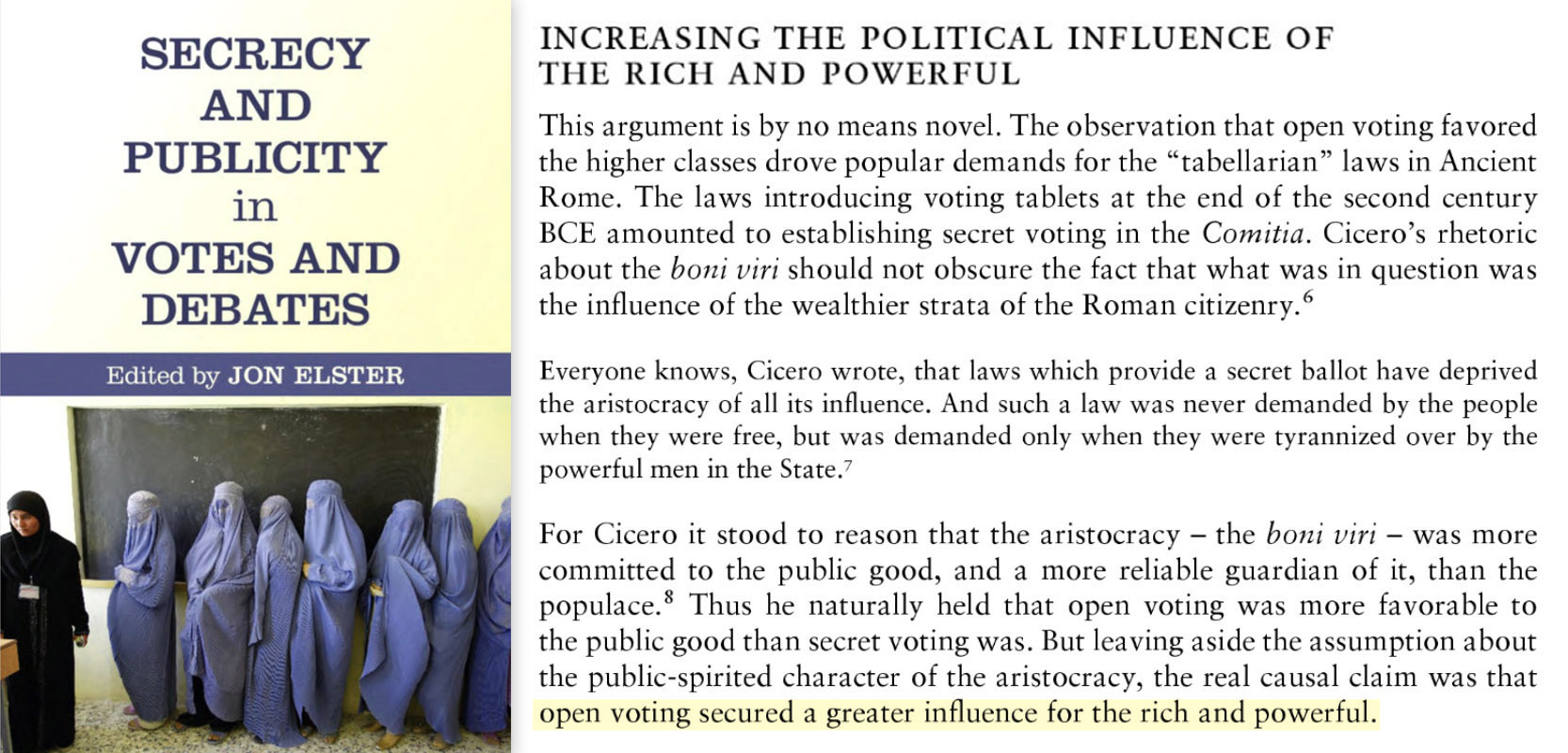
Bernard Manin 2015 - Open Voting Benefits Rich and Powerful

Bernard Manin 2015 - Open Voting Benefits Rich and Powerful
Instead of waiting in uncomfortable corridors, lobbyists and reporters… now wait in uncomfortable committee rooms, mostly small old ones in the Capitol designed for private meetings.Adam Clymer 1977
Bicameral Politics (Longley & Oleszek)
In the real world of American politics, interested individuals and organizations, not average citizens, have the greater incentive and means to monitor the government closely. This can open the door to obstruction and policy distortion as it enables regulatory capture by interested parties who advocate freely for their views without any countervailing public voice.Bruce Cain 2014
The Transparency Paradox
There continues to be a dearth of studies empirically testing the theoretical claims of transparency advocates, even as legislation and institutional support for their case accumulates exponentially.Amitai Etzioni 2010
Is Transparency the Best Disinfectant?
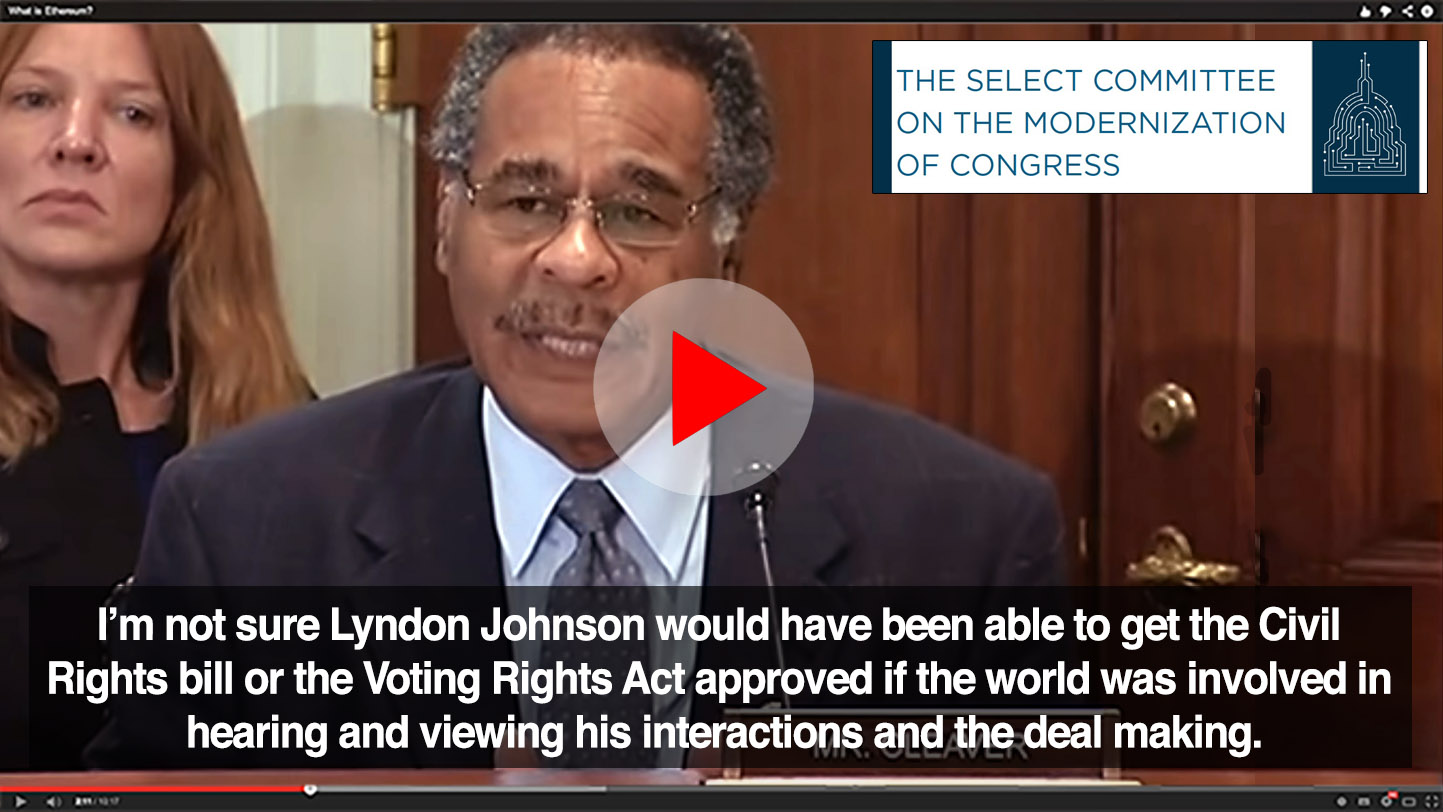
Representative Emmanuel Cleaver 2019 Congress: Problem with Sunshine & Civil Rights

Representative Emmanuel Cleaver 2019 Congress: Problem with Sunshine & Civil Rights
Professor Frances Lee of the University of Maryland political science department said that certain practices that have been undertaken in pursuit of transparency can impair legislative deliberation since they disproportionately allow outside interest groups to influence decision makers and they incentivize Members to focus on public-facing messaging rather than negotiating with colleagues… Lee was not the only person to highlight the unintended consequences that greater openness brings. Representative Emanuel Cleaver (D-MO) noted how important civil rights legislation passed Congress due to closed-door negotiations. “I’m not sure that Lyndon Johnson would have been able to get the civil rights bill or the Voting Rights Act approved if the world was involved in hearing and viewing his interactions, and the deal making…that took place to get that done,” he said.Mark Strand 2019
Hearing on Legislative Transparency
The reasons for these closed-door negotiations are many. Politicians’ egos make it difficult for them to compromise in public or, in some cases, reveal how much they rely on staff. Their task is made more difficult by the legions of lobbyists looking over their shoulder and trying to influence decision-making. And conferees frequently are required to check back with caucus leaders before striking any compromises, particularly on major bills.Steven Dornfeld 2014
Minnesota’s legislative process: An open-but-shut case
Rolling television coverage of Congress has been linked by many to the decline of deliberation in that body. Rather than debating with colleagues, members of Congress are in fact addressing activist audiences but in the media ether.Francis Fukuyama 2015
Why Transparency Can Be a Dirty Word
[On February 21, 1973] the caucus voted to open committee sessions to the public unless a majority voted to close a particular session. This allowed the public, primarily lobbyists and journalists, into “markup” sessions for the first time, where the essence of the legislative process took place, where bills were drafted line by line, clause by clause.John Jacobs 1997
Rage for Justice - Phillip Burton
A motion was made by Mr. Butler, one of the deputies of South Carolina, that the house provide against interruption of business by absence of members, and against licentious publication of their proceedings.James Madison 1787
Max Farrand - Records of the Federal Convention
Mr. KING objected to one of the rules in the report authorizing any member to call for the Yeas and Nays and have them entered on the minutes. He urged that, as the acts of the Convention were not to bind the constituents, it was unnecessary to exhibit this evidence of the votes; and improper, as changes of opinion would be frequent in the course of the business, and would fill the minutes with contradictions. Colonel MASON seconded the objection, adding, that such a record of the opinions of members would be an obstacle to a change of them on conviction; and in case of its being hereafter promulged, must furnish handles to the adversaries of the result of the meeting. The proposed rule was rejected, nem. contradicente (note: this 'nemine contradicente' is Latin for unanimously.)James Madison 1787
Max Farrand - Records of the Federal Convention
Because I can see exactly how you vote, you can easily sell your vote to me. Enter anonymous voting, which made it impossible legally for me to be confident about how you, the voter, votes. No doubt, you could promise me that you’ll vote as I wish, but you could just as well promise the same thing to the other side. The price I’d be willing to pay, then, for your vote is much, much less (discounted for the possibility that you’ve also sold your vote to the other side). And by lowering the price, this ingenious reform lowered the significance of vote buying [campaign finance?] substantially.Lawrence Lessig 2011
Republic Lost
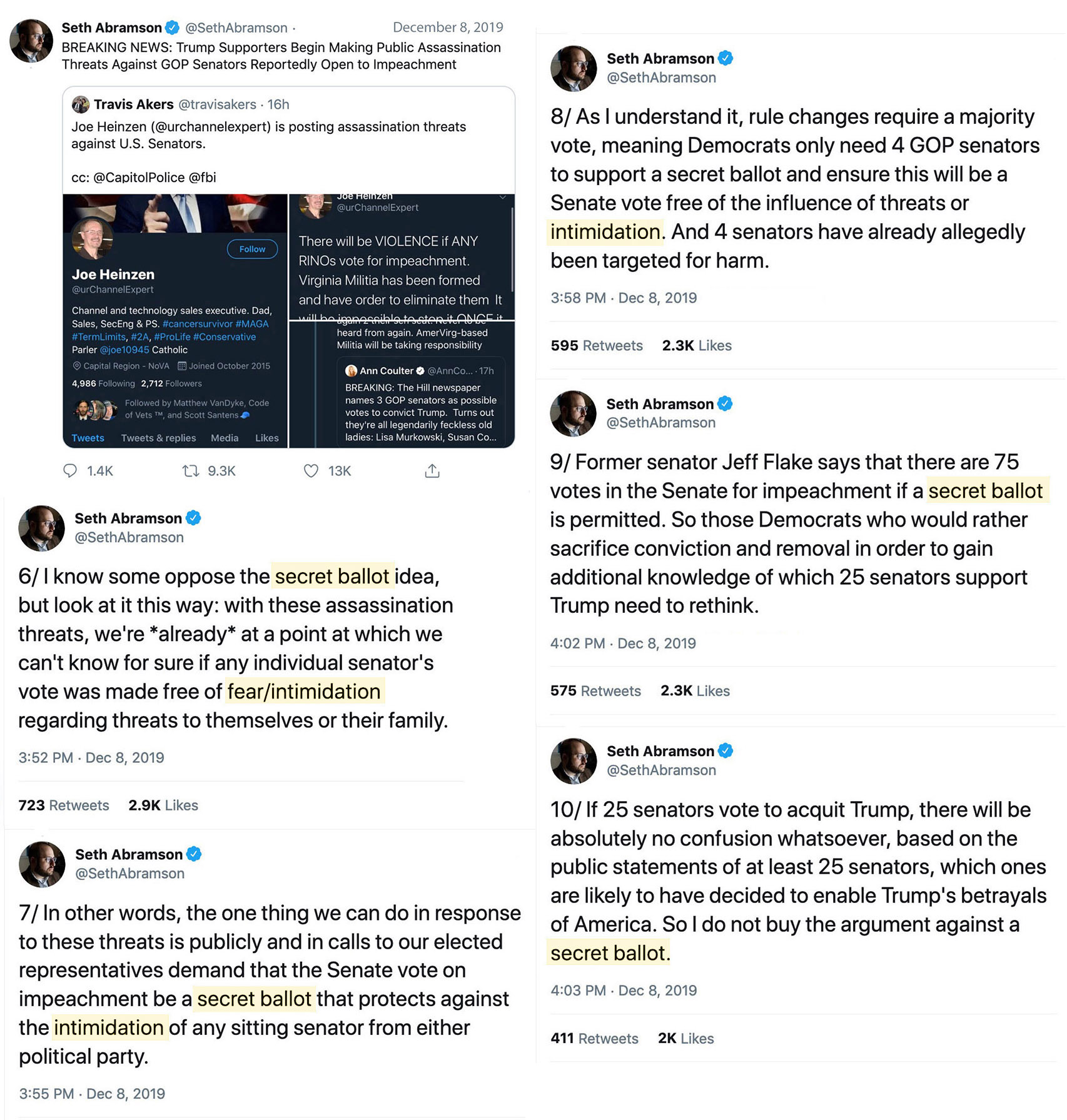
Seth Abramson 2019 – Secret Ballots, Impeachment & Intimidation

Seth Abramson 2019 – Secret Ballots, Impeachment & Intimidation
American politics is vastly more transparent than it was a few decades ago. That sounds great, right? In many cases, it is. But there’s a reason corporations don’t webcast their negotiations when they’re considering a merger and families don’t hit “record” when they’re having a fight. Sometimes, it’s easier to resolve disputes in private… It used to be that politicians could try and work out deals in private and then sell them in public. Now the deals essentially get worked out in public — which means it’s far easier for a delicate discussion to be crushed as fuzzy reports leak and enraged interest groups blitz the proceedings.Ezra Klein 2013
Too much Sunshine can Burn
Both Madison and Hamilton, then, did not think secret sessions of the national legislature antithetical to the spirit of republican government. Although the government, they might have said with Lincoln, is of the people, by the people, and for the people, it is a government in which the people do not directly participate. The people, according to the First Amendment, have the right “to petition the government for a redress of grievances,” but they do not have the right to know about all the deliberations that take place in Congress. Although Article 1, Section 3, of the Constitution requires each House to keep a journal of its proceedings, it also allows that each House may leave out “such parts as may in their judgment require secrecy…” The Founding Fathers did not extol secrecy, but neither did they rule it out. And they probably would have had grave reservations about the spate of laws enacted in the mid-1970s that make the American government the most open government in history. Stephen Miller 1983
Special Interest Groups in American Politics
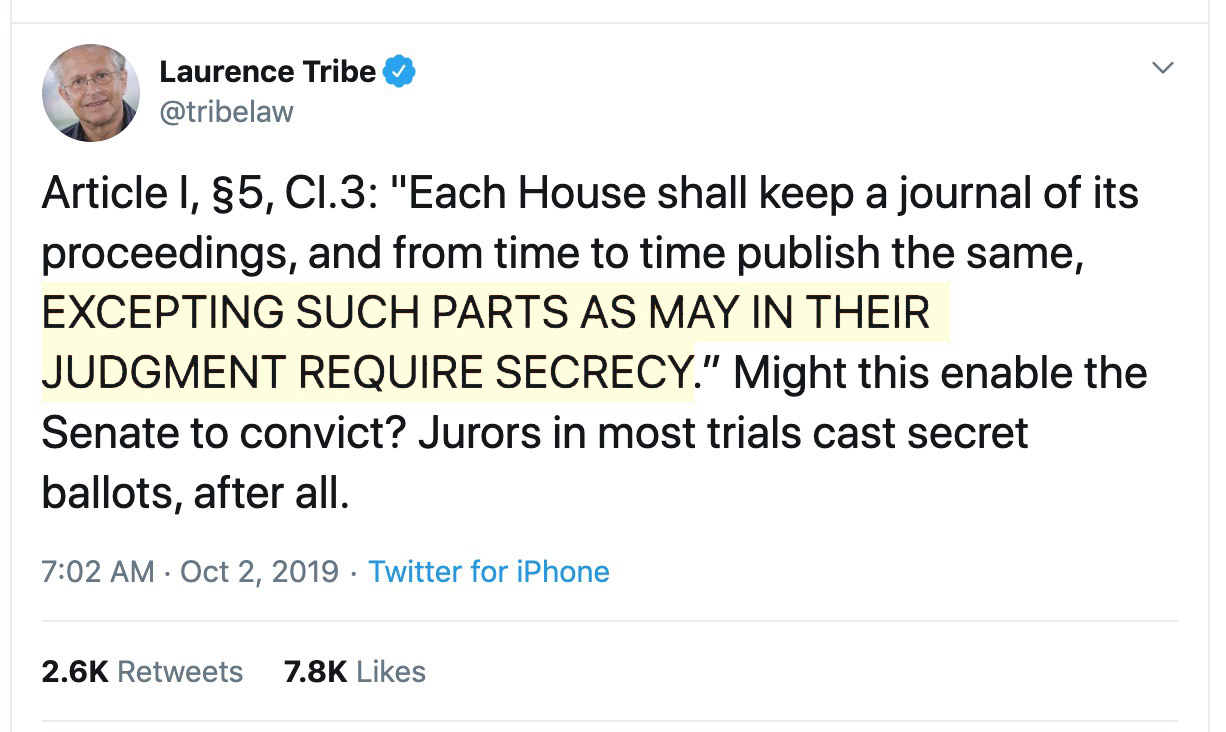
Lawrence Tribe 2019 - Twitter Post on Secrecy for Legislatures in Constitution

Lawrence Tribe 2019 - Twitter Post on Secrecy for Legislatures in Constitution
The supposition that transparency uniquely empowers regular folks is quaint fantasy. By and large, those combing the public records and filing information requests are not your neighbors. Generally, they are junior associates at big law firms searching for some detail that can be used to challenge a federal decision that is at odds with their client’s interests… The popular distrust of government officials has taken a toll on a political system that requires the collaboration of divergent interests. It is time to dispel the simplistic notion that transparency in government is an unmitigated good and recognize the role of privacy in nurturing honesty, creativity, and collaboration.Jason Grumet 2014
The Dark Side of Sunlight (City of Rivals)
While members of Congress are indignant whenever an administration from the other party takes steps to protect the privacy of its decisionmaking, Congress doesn’t embrace the unadulterated value of transparency when considering its own deliberative needs. A recent example of that hypocrisy was revealed when certain members of the legislative branch began to explore changes to the nation’s tax code – a body of legislation that has not been seriously amended since 1986. In the spring of 2013, senators Max Baucus (D-MT) and Orrin Hatch (R-UT), who led the Senate Finance Committee, sought to conduct a wide-ranging review of ideas to improve the complex US tax system. They proposed starting from a “blank slate” and asked their colleagues for suggestions. They were not seeking detailed proposals or any commitments of support – just ideas to begin a deliberative process. They received no responses. Not a one. No member of Congress wanted to be on record calling for either the elimination or continuation of a tax provision favored or reviled by anyone. So to prompt more meaningful input, the senators wrote a memo to their colleagues on July 19, promising that any records of lawmaker suggestions would be locked in a safe near Capitol Hill. Baucus and Hatch promised that any ideas written and transmitted to them would be transferred to the National Archives and stored in a special vault, separate from the committee’s other records, and sealed until December 31, 2064. Though widely ridiculed for its absurdity, the plan worked and the committee received over one thousand pages of proposals.Jason Grumet 2014
The Dark Side of Sunlight (City of Rivals)
Institutional systems characterized as open and accountable should exhibit higher levels of direct lobbying and a broader range of inside lobbying tactics, as policymakers in those systems are driven by the reelection motive to be receptive to communications from advocates about the views of their constituents. Thus, advocates in the United States are expected to display higher levels and a broader range of inside lobbying tactics.
In addition, the role of democratic institutional design should also be perceived within a polity by investigating inside lobbying across the primary political institutions of the political system. Thus in the United States, the U.S. Congress, the most open and accountable of U.S. institutions, should be the object of more inside lobbying than executive agencies or the White House. In the European Union, the Council, the most nontransparent and unaccountable of EU institutions, should be the object of the least amount of inside lobbying.Christine Mahoney 2008
Brussels vs. the Beltway
Legislators may also wish to signal their loyalty (or the disloyalty of political opponents) to other actors outside the legislature that control valuable resources. Important examples of such actors are lobbying groups with policy expertise, selectorates that nominate candidates, and potential campaign donors and other activists for the next election campaign (with the latter likely coming from what Fenno 1978 calls the “primary constituency”).Reto Wüest 2016
Roll Call Votes in Democratic Legislatures
It is our duty to vote to hold a meeting behind closed doors when that becomes necessary either to protect national secrets or to reduce the power of an organized group to try to stampede the committee.Finance Committee Chair, Russell Long 1973
Advocates of Openness (Kennedy)
If transparency is not reduced to what it is, a means, it is a threat, so that democracy has realized the dream of totalitarianism. The demand for excess transparency is no longer the quintessence of democracy, but rather its direct opposite.G. Carcassone 2001
Le Trouble De La Transparence
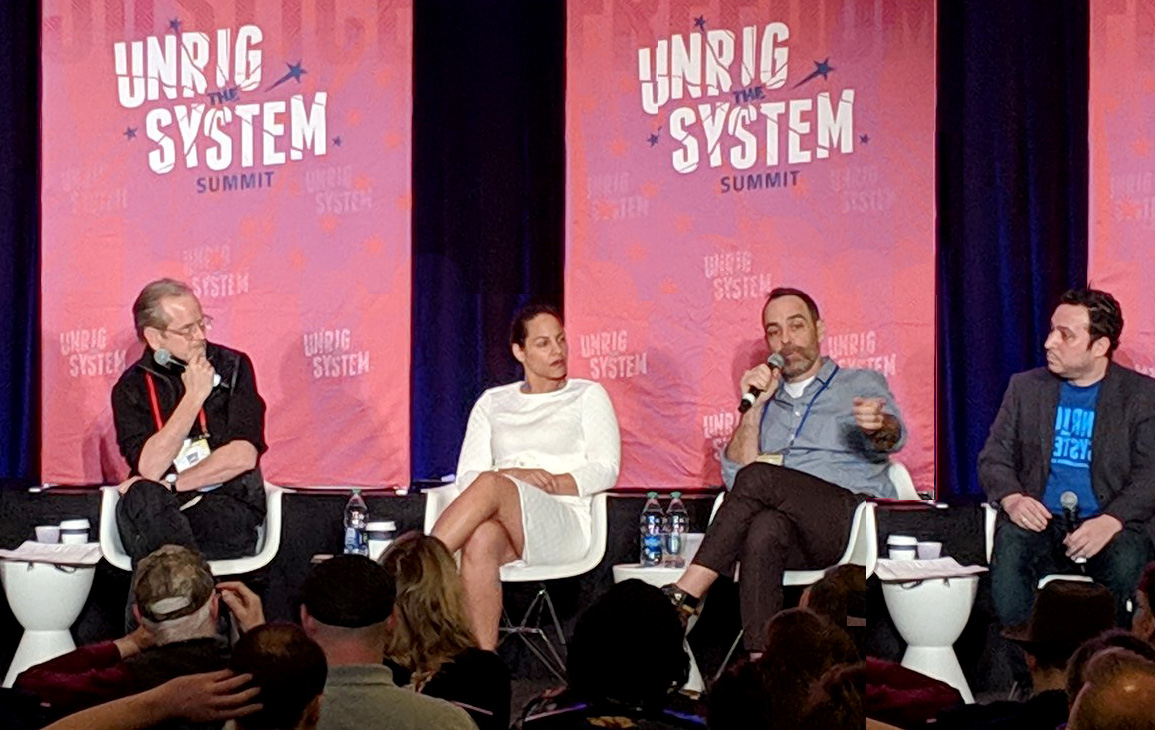
D’Angelo presenting at the 2019 Unrig Transparency Panel (Lessig)

D’Angelo presenting at the 2019 Unrig Transparency Panel (Lessig)
Long said open committee meetings would mean more pressure from organized lobbies trying to force a decision in their direction… “There are times,” he told the Senate, “when the Committee on Finance is going to have to close its doors to protect the interests of the country and discharge its obligations. It is our duty, to vote to hold a meeting behind closed doors when that becomes necessary either to protect national secrets or to reduce the power of an organized group to try to stampede the committee. The Senate should not make it any more embarrassing and difficult than it needs to be to arrive at this result.”Finance Committee Chair, Russell Long 1973
Senate, House Modify Secrecy Rules
“Every time action is taken to close the session,” said John O. Pastore (D R.I.), ranking Democrat on the Commerce Committee, “it raises an atmosphere of suspicion that the committee has something to hide. That is the thing that disturbs me.” He said senators would be reluctant to close even those hearings which should be closed and that classified information might be revealed. “When you tell me you are mandating to open up these hearings to the public,” Pastore declared, “I am afraid we are playing footsies with the security of this country.” Ranking Member on Commerce – John Pastore (D R.I.) 1973
Senate, House Modify Secrecy Rules
The temptations of television are seductive, but they may also be destructive. The risks are many and serious. Instead of informing our people, televised House proceedings may confuse them. Instead of educating it may bore them and make them impatient. Instead of polishing the image of the House, the consequences of broadcasting may further tarnish it. Instead of maintaining the dignity of the House, television may encourage circus antics. Instead of improving the legislative process, television may degrade it. And instead of enhancing the democratic process, television may corrode and cheapen it.Rep. Del Clawson 1976
Congress and the People
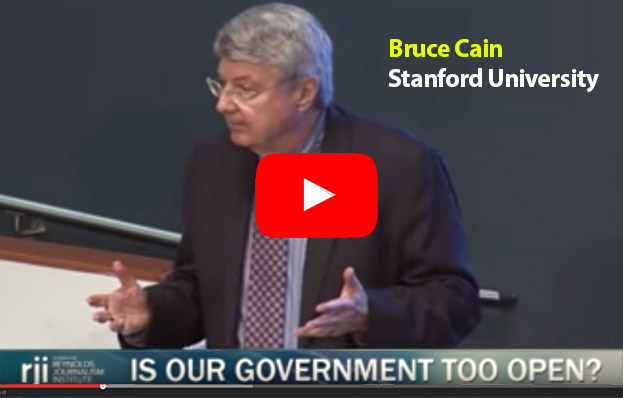
Bruce Cain 2016 – Debate “Is Government Too Open”

Bruce Cain 2016 – Debate “Is Government Too Open”
As for special interest representation, the nation’s capital is filled with lobbying groups and associations. There are scores of industry associations, public affairs lobbies, single-interest groups, and many other advocacy organizations. Special interest groups are major policymaking players… Many interest groups also are informally affiliated with one party or the other, and their demands for loyalty make it difficult for lawmakers to compromise. Ironically, some of the sunshine reforms of the 1970s had the unintended consequence of strengthening the role of special interests.Walter Oleszek 2011
Secrecy and Transparency
Members of committees naturally try to close committee sessions from public purview, limiting thereby the intrusion of external actors such as interest groups or executive agencies and thus protecting committee members’ independent exercise of power within committees. Lawrence Dodd 1977
Congress Reconsidered – 1st Ed
If the carbon tax had a secret vote, it might pass. There’s support for the carbon tax. You’ve got two problems: One, you have Republicans who aren’t going to support any tax.Sen. Ben Cardin 2017
Carbon tax might pass in secret vote
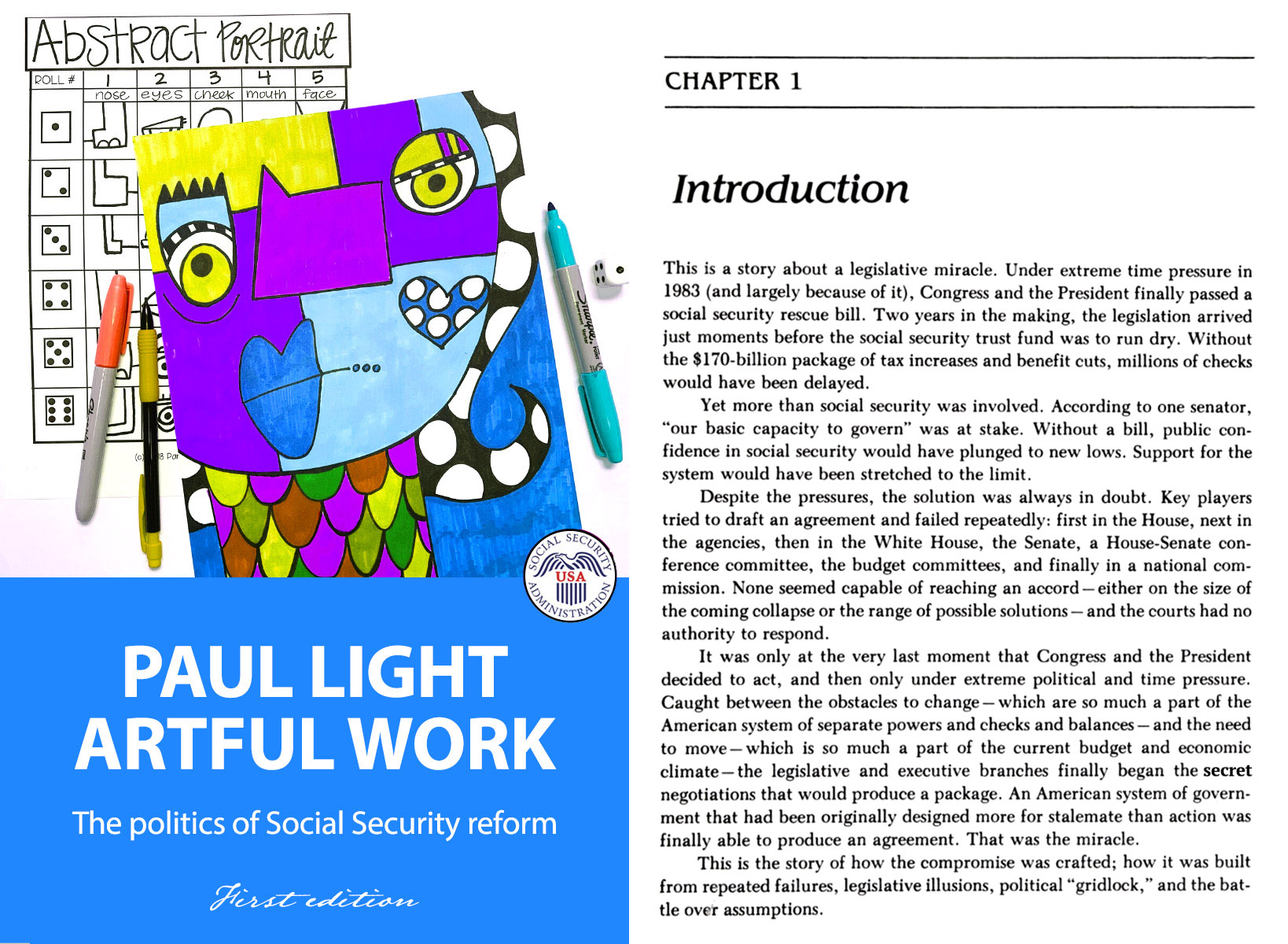
Paul Light 1985 - Artful Work
Text: This is a story about a legislative miracle. Under extreme time pressure in 1983 (and largely because of it), Congress and the President finally passed a social security rescue bill. Two years in the making, the legislation arrived just moments before the social security trust fund was to run dry. According to one senator, “our basic capacity to govern” was at stake. Without a bill, public confidence in social security would have plunged to new lows. It was only at the very last moment that Congress and the President decided to act, [when] the legislative and executive branches finally began the secret negotiations that would produce a package. An American system of government that had been originally designed more for stalemate than action was finally able to produce an agreement. That was the miracle. agreement more out of mutual fear than the public interest , and how a small band

Paul Light 1985 - Artful Work
The effort to reduce congressional insulation has hardly fared any better. It has produced one victory of sorts—the sunshine rules that have opened virtually all committee meetings. The open hearings, and the widespread publicity of some meetings, may well have increased somewhat the public’s respect for Congress. [But] even this victory has had its price, in making committees more susceptible to intrusion by powerful external groups, particularly executive agencies, intrusion that may undermine congressional autonomy.Lawrence Dodd 1977
Congress Reconsidered – 1st Ed
The attempt to try and bring everything into the light to inspect it and make it accountable can actually have perverse effects.Dmitrijs Kravčenko, Tom Galvin, Ella Hafermalz 2017
The Tyranny of Light by Hari Tsoukas
More information may lead to less understanding; more information may undermine trust; and more information may make society less rationally governable.Haridimos Tsoukas 1997
The Tyranny of Light
The paradox is that information, rationally processed, leads to the hijacking of public interest by special interests. Notice that this is a perfectly rational way of thinking: a particular group tries to spread the cost of its demands across all the taxpayers, while capturing all the benefits. This is a classic case of the Prisoner’s Dilemma: ‘though every group might prosper in the long run if all groups surrendered just enough to balance the budget, it makes no sense for any of them to surrender unilaterally’.63 Instantly available information facilitates factional political mobilization and obscures the public good which, as a regulative principle, underlies the governance of a modern democratic society. Moreover, another side effect of hyperdemocracy is that it turns leaders into followers: find out what the population thinks and play to that tune. As Wright64 pithily notes, ‘politics is pandering in a hyperdemocracy; to lead is to follow’. Of course, the electorate knows this, and that is one reason it thinks politicians are spineless and have no convictions. Hence another paradox: ‘the voters demand slavish obedience, but the more they receive it, the less they respect it.’Haridimos Tsoukas 1997
The Tyranny of Light
In 1970, the US Congress radically changed its approach to governance, by opening virtually all congressional hearings to the “public” under a movement generally known as “Sunshine Laws.” This change was a radical departure from precedents set by the founding father who jealously guarded legislative privacy, understanding that “factions” (18th-century terminology for special interests) would form and work against sound public policy to their own benefit.
Corporate and other special interests, including foreign dictators, have a decided advantage over public interest under this system of lobbyist access to the legislative process, subjecting people’s representatives to whims of deep-pocketed special interests, and creating a strategic weakness for America. On everything from healthcare, military spending, education, pharmaceuticals, and foreign policymaking, legislative scorecards, and the financial incentives associated with campaign donations and future jobs have turned our members of Congress into short-term thinkers, effectively forced to accept “Judas Money,” while giving our global opponents and adversaries, as well as domestic special interest a decided strategic advantage over us.Joshua Burgin 2020
Why the US must put lobbyists back in the lobby!
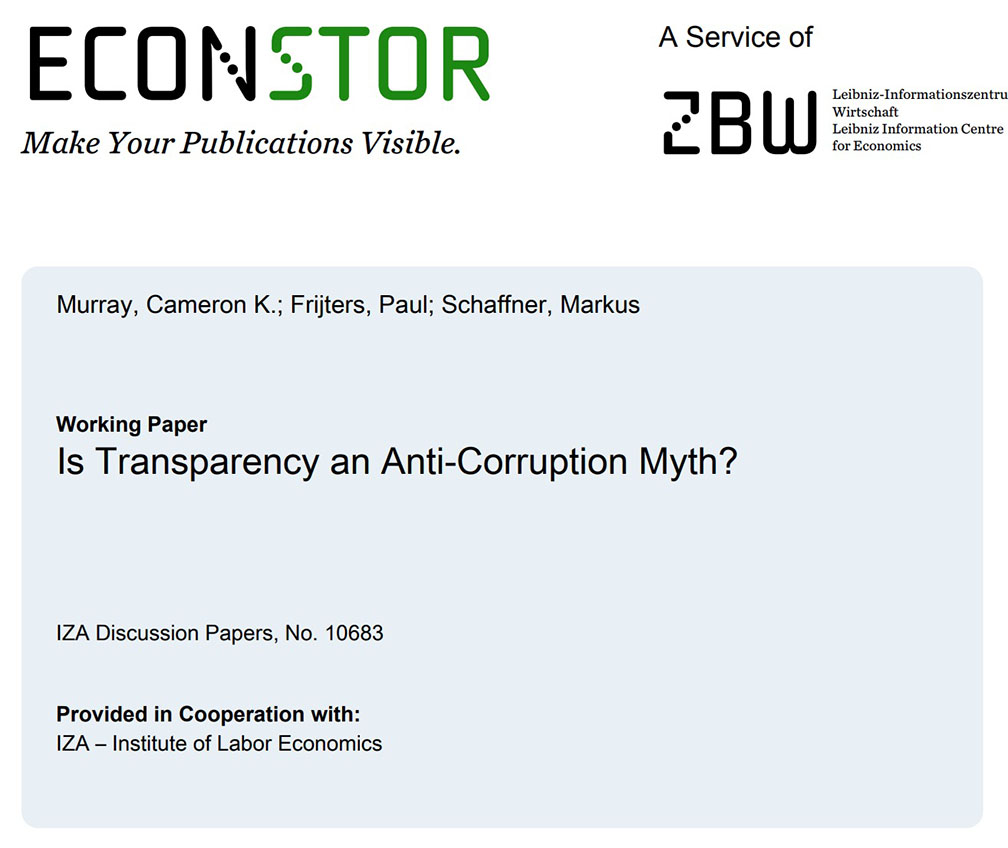
Murray, Cameron; Frijters, Paul; Schaffner, Markus 2017 - Is Transparency an Anti-Corruption Myth?

Murray, Cameron; Frijters, Paul; Schaffner, Markus 2017 - Is Transparency an Anti-Corruption Myth?
Most committee staffers and MLAs agree that the closed markup in SASC results in a more efficient and candid policymaking process. Without reporters or lobbyists in the room, Senators are free to debate difficult decisions and make deals without the pressures to posture or conform to narrow ideological or parochial views. …The closed markup allows Senators with those concerns to sometimes craft a deal with others on the committee that would have been politically impossible if lobbyists or reporters were present. Compromise often requires some degree of anonymity, and certainly the closed markup in SASC is testimony to that reality. [Many staffers] are highly skeptical about the benefits of an open process. While increased transparency is certainly valued, many believe an open process would undermine vigorous and frank debate, and also frustrate compromise and bipartisanship.Colleen Shogan 2011
The Senate’s Last Best Hope
A former SASC staff director explained, “Senate Armed Services has never had an open markup, and I’m proud of that...Why should we do it in the open? It would wreck the seriousness of the purpose. Staff needs to give candid views to Senators, and you can’t do that in open session. Governing in the sunshine shouldn’t be applied to everything. In the House, open markup forces cutting deals behind closed doors” (Interview with Arnold Punaro, 3/10/2011). Another argument focuses on efficiency. Whereas the entire markup process is usually completed in one week, there is general agreement that an open process would extend markup considerably. One MLA remarked that the two-day full committee markup could last for more than two weeks if it was opened to the public (Interview with Senate staffer, 1/20/2011). Another staffer concurred, “The effect of the closed session is that the lobbyists don’t know about the bill until it comes out. Coming up with a deal is a lot harder when an amendment is made public and circulates all over this town” (Interview with Senate staffer, 1/13/2011).Colleen Shogan 2011
The Senate’s Last Best Hope
These results demonstrate that individuals and groups interested in increasing the likelihood that politicians identify and pass compromise deals need to find a way to insulate the elected officials during the negotiation phase. [Our] evidence indicates that politicians can and should be given some privacy during the negotiation process so they can consider effective compromise solutions.Anderson, Butler, Harbridge-Yong 2018
Closed-Door Compromise
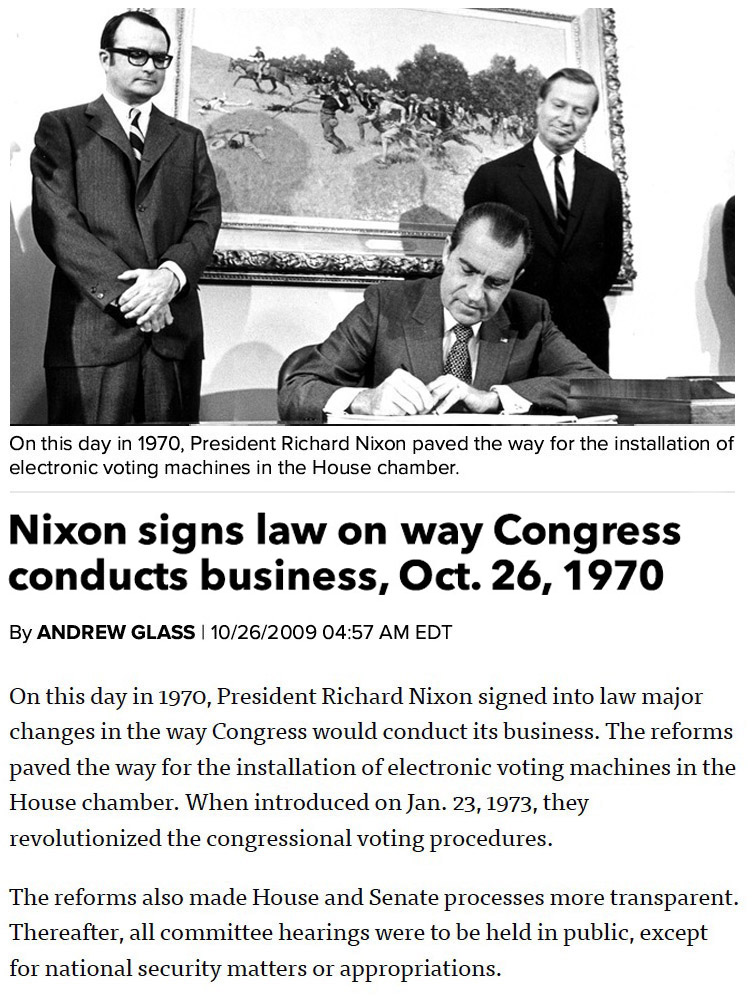
Andrew Glass 2009 - Nixon Signs Legislative Reorganization Act
On this day in 1970, President Richard Nixon signed into law major changes in the was Congress would conduct its business. The reforms paved the was for the installation of electronic voting machines in the House chamber. When introduced on Jan. 23, 1973, these revolutionized the congressional voting procedures. The reforms also made House and Senate procedures more transparent. Thereafter, all committee hearings were to be held in public, except for national Security matters or appropriations.

Andrew Glass 2009 - Nixon Signs Legislative Reorganization Act
The number of important changes affecting Congress over the last three decades is remarkable. They include: the transformation of the U.S. Senate from an encapsulated men’s club, a “citadel” in the description of one of its observers, into a publicity machine operated for the purpose of linking senators with national interest groups and factions.Nelson Polsby 1982
Contemporary Transformations of American Politics
The state of Virginia allows cameras into court to demystify the legal process, so that everyone can see what is happening. Far from putting the public at ease that justice is being done, however, they have turned the court room into a gladiatorial arena. We can watch with morbid fascination as two people rip chunks out of each other, cheering as someone we don’t know and have never met strikes a blow.Elise Johnson 2022
Cameras turn the court room into a gladiatorial arena
Sinclair writes that the Senate has been transformed from a committee-centered, member expertise dependent, inward looking, and relatively closed institution that was characterized by an unequal distribution of influence and constraining norms to an open, staff dependent, outward looking institution in which influence is much more equally distributed and members are accorded very wide latitude. Sinclair argues that as a result of these changes the Senate of today can encounter great difficulty in making decisions. Nelson Polsby has called the Senate a publicity machine operated for the purpose of linking senators with national interest groups and factions. Al Kaltman 2017
Leadership
What is striking about the making of air pollution policy in the European Union, however, is that while it has undoubtedly been a difficult process, the Council of Ministers has been able to arrive at compromises and adopt legislation far more easily than has the U.S. Congress. Legislation addressing the issue of acid rain and vehicle emissions was agreed to far more quickly than was the Clear Air Act of 1990. Those attributes that the U.S. Congress adopted to make the compromises that ultimately led to success – secrecy, bargains, and side payments – have been intrinsic to the way the Council of Ministers works.Alberta Sbragia 2004
The United States and the European Union Compared (Climate)
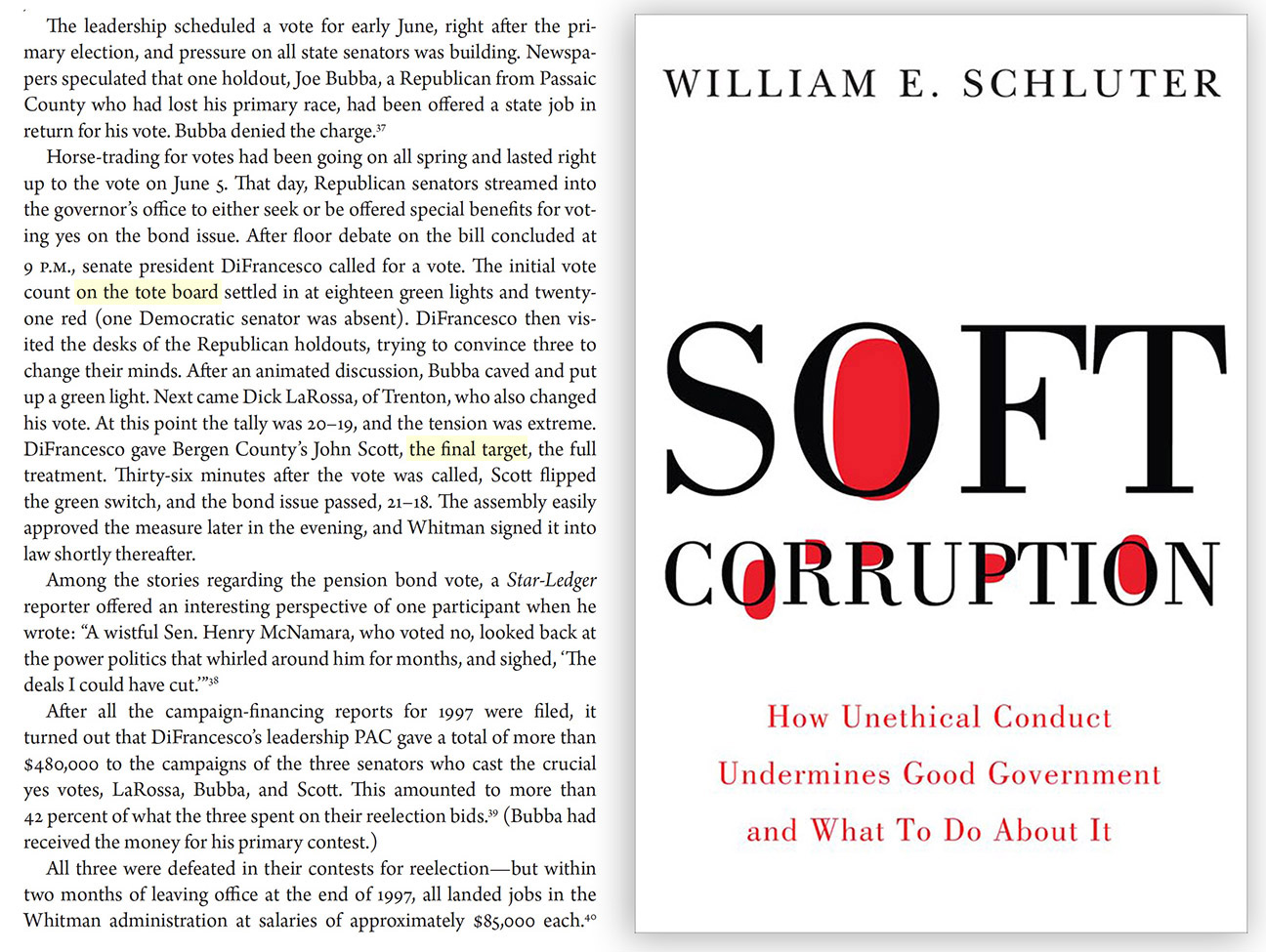
William E. Schluter 2017 - Soft Corruption - New Jersey
Text: The leadership scheduled a vote for early June, right after the primary election, and pressure on all state senators was building. Newspapers speculated that one holdout, Joe Bubba, a Republican from Passaic County who had lost his primary race, had been offered a state job in return for his vote. Bubba denied the charge. Horse-trading for votes had been going on all spring and lasted right up to the vote on June 5. That day, Republican senators streamed into the governor’s office to either seek or be offered special benefits for voting yes on the bond issue. After floor debate on the bill concluded at 9 p.m., senate president DiFrancesco called for a vote. The initial vote count on the tote board settled in at eighteen green lights and twenty-one red (one Democratic senator was absent). DiFrancesco then visited the desks of the Republican holdouts, trying to convince three to change their minds. After an animated discussion, Bubba caved and put up a green light. Next came Dick LaRossa, of Trenton, who also changed his vote. At this point the tally was 20–19, and the tension was extreme. DiFrancesco gave Bergen County’s John Scott, the final target, the full treatment. Thirty-six minutes after the vote was called, Scott flipped the green switch, and the bond issue passed, 21–18. The assembly easily approved the measure later in the evening, and Whitman signed it into law shortly thereafter. Among the stories regarding the pension bond vote, a Star-Ledger reporter offered an interesting perspective of one participant when he wrote: “A wistful Sen. Henry McNamara, who voted no, looked back at the power politics that whirled around him for months, and sighed, ‘The deals I could have cut.’” After all the campaign-financing reports for 1997 were filed, it turned out that DiFrancesco’s leadership PAC gave a total of more than $480,000 to the campaigns of the three senators who cast the crucial yes votes, LaRossa, Bubba, and Scott. This amounted to more than 42 percent of what the three spent on their reelection bids. (Bubba had received the money for his primary contest.) All three were defeated in their contests for reelection—but within two months of leaving office at the end of 1997, all landed jobs in the Whitman administration at salaries of approximately $85,000 each.

William E. Schluter 2017 - Soft Corruption - New Jersey
The secret-ballot vote in a closed-door session of the House Republican Conference was contentious and fairly close—several Capitol Hill reporters said that the margin in favor of the pro-earmark resolution offered by Rep. Mike Rogers (R-AL) was 120 yeas, 84 nays. Had just 18 members switched sides, the Rogers resolution would have failed on a tie vote. This is where the “secret ballot” rule of Congressional caucus voting comes into play—had this vote been recorded, instead of a secret ballot, it is entirely possible that Rogers’ resolution would not have passed.Jeff Davis 2021
House Republicans Vote to Accept Earmarks
The high court caught her spirit, finding her anonymity “a shield from the tyranny of the majority,” honored by the Founding Fathers themselves when they didn't sign their right names to the Federalist Papers.New York Times 1995
Protecting Anonymous Speech
There are numerous ways besides casting a vote on the House or Senate floor for a member of Congress to show gratitude for a contribution. One, of course, is to cast a vote a certain way in committee or a subcommittee. Another is to try to block action in a committee or a subcommittee. Another is to cast a vote a certain way on a certain amendment in a subcommittee – or even to refrain from casting a vote – so as to shape a piece of legislation in a certain direction, and then cover one’s tracks by voting for approval of the legislation. Still others are to delay a bill until time runs out or to load it up with amendments until it collapses of its own weight. It is not uncommon for a member to say to a colleague, or for a lobbyist to say to a member, “Look, I know you can’t be with me on the final bill, but would you do me a favor on this one amendment?” A member may go along out of sheer comradeship, but if he feels an obligation he will try to oblige. The fact that committee meetings (with the exception of those involving national security) are now held in the open – a reform that was adopted in the mid-seventies – has strengthened the lobbyists’ hand and reduced the legislators’ ability to legislate. The idea was to make the members more accountable for the actions they took in committee, and it was a good one, but it carried a price. The lobbyists used to have to stand around in the corridors and wait to hear about what had happened inside. A member could come out and tell the lobbyist he had done as well as he could for him but couldn’t get everything the lobbyist wanted. Members could quietly make trade-offs with each other inside the committee room, where there was at least more of a chance that a member would exercise independent judgment. Now the lobbyists sit right in the committee room, keeping score. Sometimes they even signal to a member how to vote on a certain amendment. During the House-Senate conference between members of the Ways and Means and Finance Committees on the 1982 tax-increase bill, the large Ways and Means Committee room had an overflow crowd.Elizabeth Drew 1983
Politics and money: the new road to corruption
Through skillful use of public arenas (transparency), a nonmember (lobbyist, special interest) may be able to pressure committee members to take up an issue they would rather ignore… Not only can nonmembers often influence the shape of legislation, they can often influence committee agendas.Barbara Sinclair 1989
Transformation of the US Senate
The authors discuss the importance of closed-door negotiations for successful legislative compromise. Using experimental data collected from state legislators, the authors demonstrate that lawmakers expect private negotiations to result in successful compromises more often than public negotiations.Anderson, Butler, Harbridge-Yong 2018
Closed-Door Compromise
In both studies, subjects compromised less when "performing" before an audience of constituents than when no audience was present during negotiations.Daniel Druckman 1994
Determinants of Compromising Behavior in Negotiation
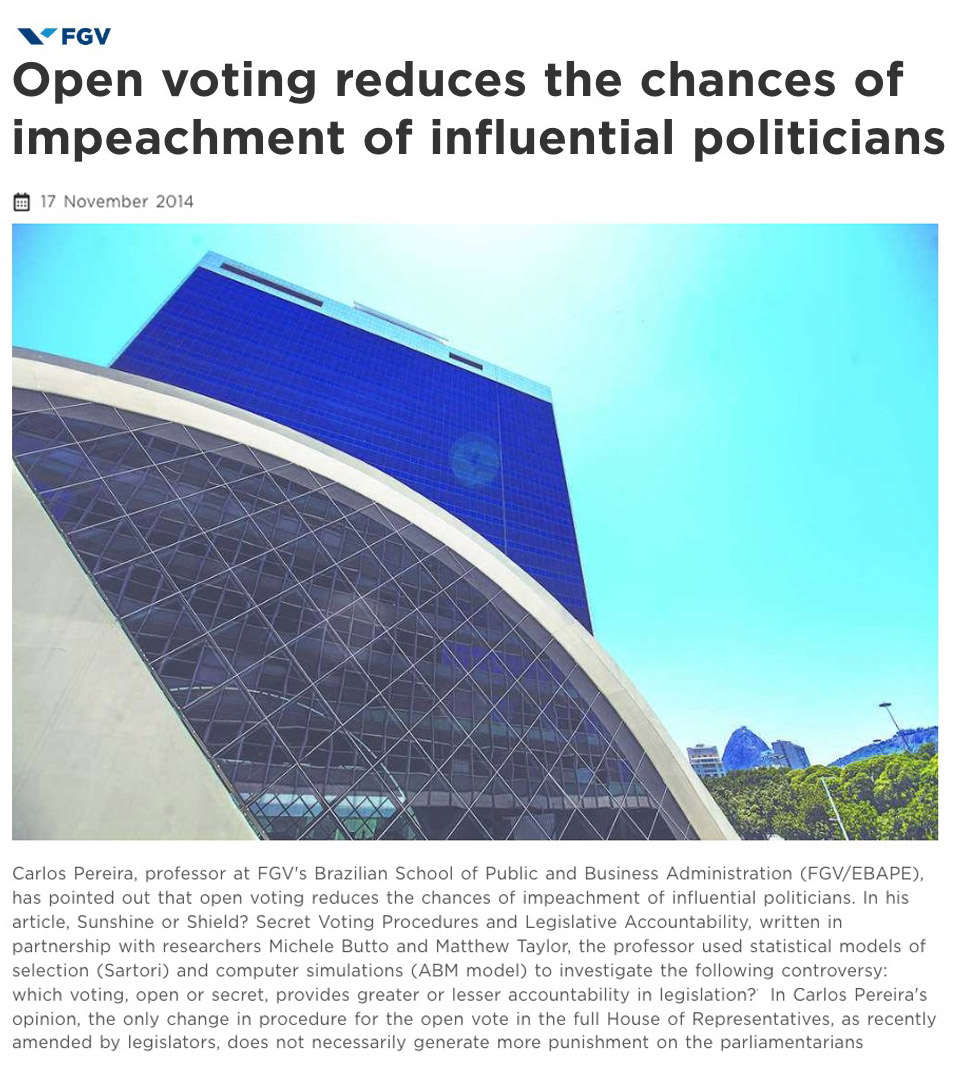
Carlos Pereira 2014 - Open voting reduces the chances of impeachment

Carlos Pereira 2014 - Open voting reduces the chances of impeachment
Transparency often imposes direct costs on successful deal making, public attention increases the incentive of lawmakers to adhere to party messages, a step rarely conducive to setting aside differences and negotiating a deal.Sarah Binder & Frances Lee 2013
Political Negotiation
The rarity with which House and Senate leaders can secure privacy complicates negotiations in Congress.Sarah Binder & Frances Lee 2013
Political Negotiation
Secrecy serves as an antidote to intimidation, permitting legislators to vote sincerely without fear of reprisals from their peers. Even if a legislator is not personally corrupt and is convinced his accused peer is corrupt, he might nonetheless avoid voting to expel his peer, fearing retribution of some sort. So it may be that secrecy serves as a “shield,” enabling politicians to challenge powerful legislative leaders or party bosses in ways that would be unthinkable in an open vote. Indeed, a variety of procedures – e.g., juries, trade agreements, constitution writing, admissions committees (Chambers 2004; Elster 2010) – may benefit from “shielding” participants from the public or from particular audiences, such as the injured or losing parties.Michele Buttò, Carlos Pereira & Matthew Taylor 2014
Sunshine or Shield? Secret Voting Procedures and Legislative Accountability
The simulation also casts doubt on sunshine approaches to accountability that assume transparency is always the best remedy. While we are cautious in drawing conclusions from the simulation, it does show that under certain simulated conditions, open voting may be less effective than secret voting in driving accountability. If nothing else, this suggests that further research about the effects of open voting is warranted, and that it might be worth contemplating different rules depending on who is being tried, such as secret voting during the legislative trials of congressional leaders, and open voting for backbenchers.Michele Buttò, Carlos Pereira & Matthew Taylor 2014
Sunshine or Shield? Secret Voting Procedures and Legislative Accountability
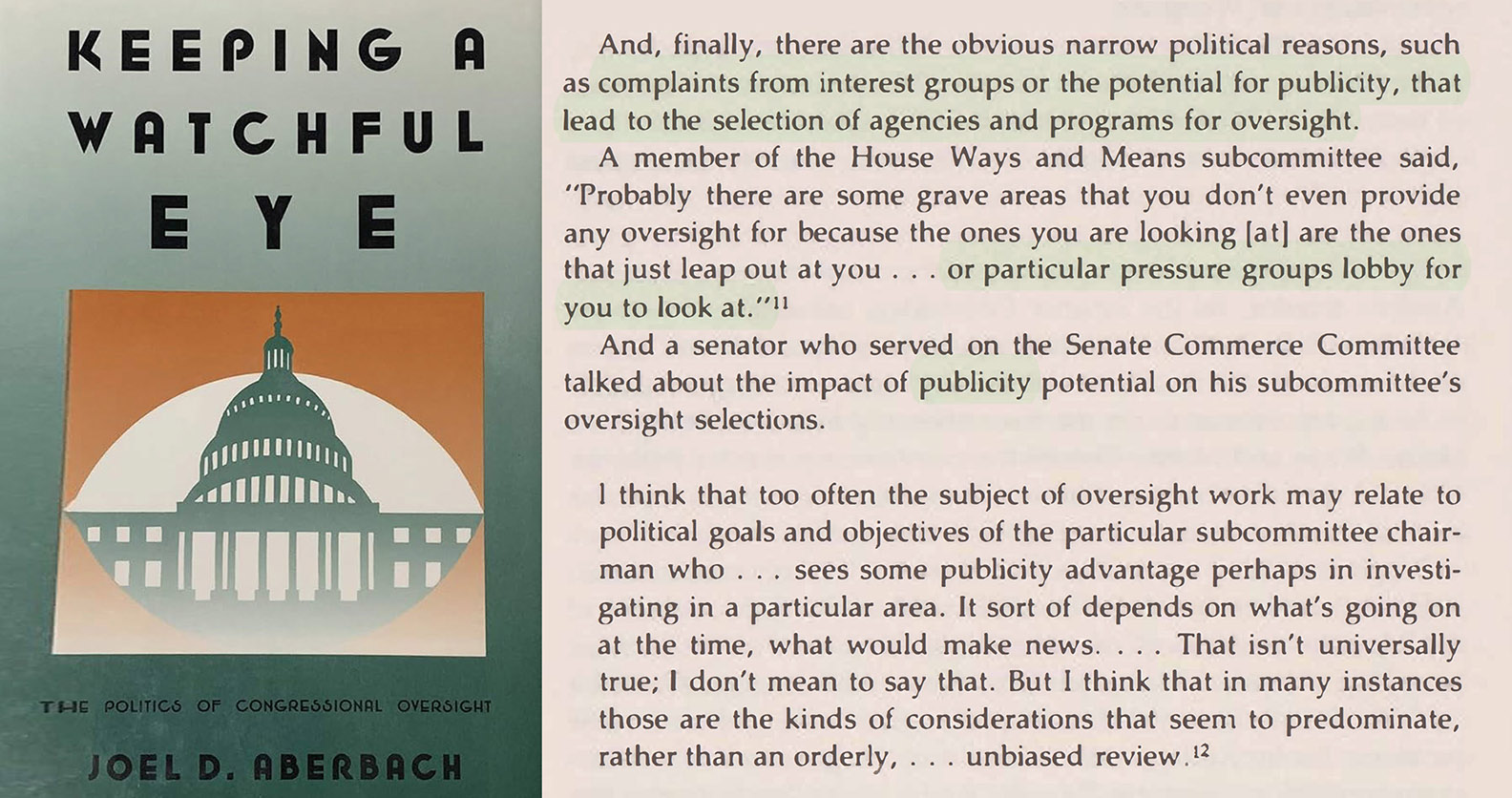
Joel Aderbach 1990 - Keeping a Watchful Eye - Politics of Congressional Oversight
Text: And, finally, there are the obvious narrow political reasons, such as complaints from interest groups or the potential for publicity, that lead to the selection of agencies and programs for oversight. A member of the House Ways and Means subcommittee said, "Probably there are some grave areas that you don’t even provide any oversight for because the ones you are looking [at] are the ones that just leap out at you... or particular pressure groups lobby for you to look at." And a senator who served on the Senate Commerce Committee talked about the impact of publicity potential on his subcommittee’s oversight selections. “I think that too often the subject of oversight work may relate to political goals and objectives of the particular subcommittee chairman who... sees some publicity advantage perhaps in investigating in a particular area. It sort of depends on what’s going on at the time, what would make news... That isn’t universally true; I don’t mean to say that. But I think that in many instances those are the kinds of considerations that seem to predominate, rather than an orderly, ... unbiased review.”

Joel Aderbach 1990 - Keeping a Watchful Eye - Politics of Congressional Oversight
I show that the language of transparency gained currency only in the last quarter century, and explain how its proximate sources promote three dubious assumptions — that disclosure should in principle be maximized, that it prevents misrule more or less automatically, and that its value is either instrumental, or rooted in a reductive notion of democracy as the rule of popular opinion.Jonathan R. Bruno 2017
Sunshine or Shield? Secret Democracy Beyond Disclosure: Secrecy, Transparency, and the Logic of Self-Government
In policymaking contexts we catch sight of a second possible pitfall of disclosure. Although transparency is ordinarily supposed to promote accountability, and in that sense to deepen the relationship between representatives and the people, it can sometimes end by further advantaging the advantaged few. Adrian Vermeule describes an instance of this phenomenon in his account of the federal government’s budget process. In the earliest stages, congressional leaders and the president each develop detailed proposals, which form the basis for subsequent negotiations. Vermeule argues that disclosure of these opening offers should be delayed, in part to allow the initial proposals to take shape unfettered by the influence of a thousand special interests, whose fate depends on the allocation of government spending. The trouble, Vermeule explains, is that the general public interest has no such intensive advocate to counterbalance the pressures brought to bear by the parade of special requesters. Too much transparency therefore renders policymakers accountable to the wrong parties, to narrow interests instead of the public generally.Jonathan R. Bruno 2017
Sunshine or Shield? Secret Democracy Beyond Disclosure: Secrecy, Transparency, and the Logic of Self-Government
“Transparency” is the constant refrain of democratic politics, a promised aid to accountability and integrity in public life. Secrecy is stigmatized as a work of corruption, tolerable (if at all) by a compromise of democratic principles. My dissertation challenges both ideas. It argues that secrecy and transparency are best understood as complementary, not contradictory, practices. And it develops a normative account of liberal democratic politics in which (qualified) duties of transparency coexist with (qualified) permissions to act behind closed doors.Jonathan R. Bruno 2017
Sunshine or Shield? Secret Democracy Beyond Disclosure: Secrecy, Transparency, and the Logic of Self-Government
Suppose the Environmental Protection Agency is in the midst of internal deliberations to impose tough new emissions standards on automobiles. Immediately publishing such talks— complete with the changes of course and admissions of uncertainty they are bound to include— would likely aid regulated industries, both in their initial obstructions, and in subsequent (postadoption) efforts to undermine unwanted rules. The transcripts of agency deliberation would provide useful fodder for these efforts. Whether by delegitimizing the proposed rules in the public sphere, by lobbying legislators to overrule them, or by challenging agency procedures in court, such industries would surely make hay of deliberative records—and especially of any hesitation or vacillation they might memorialize. Jonathan R. Bruno 2017
Sunshine or Shield? Secret Democracy Beyond Disclosure: Secrecy, Transparency, and the Logic of Self-Government
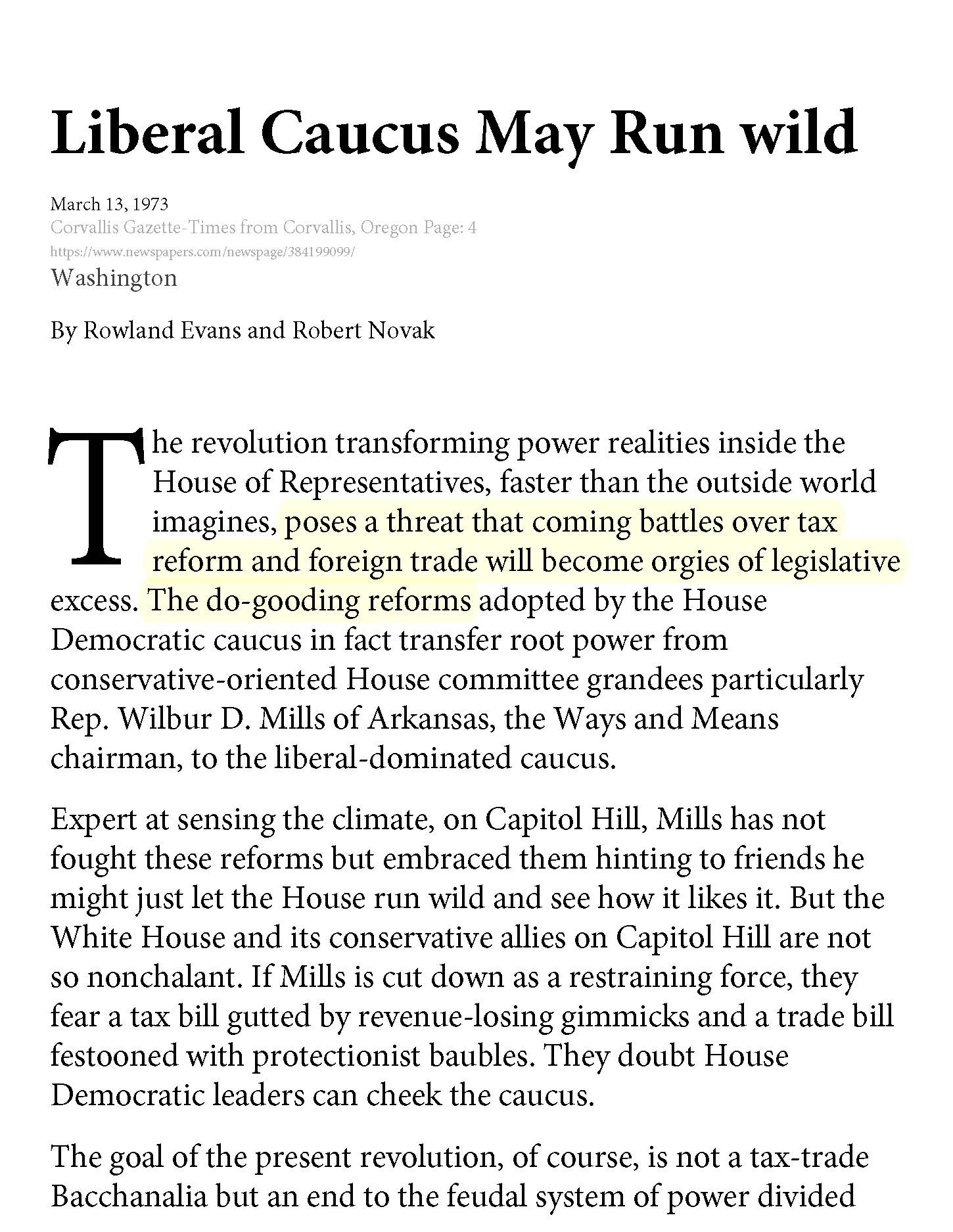
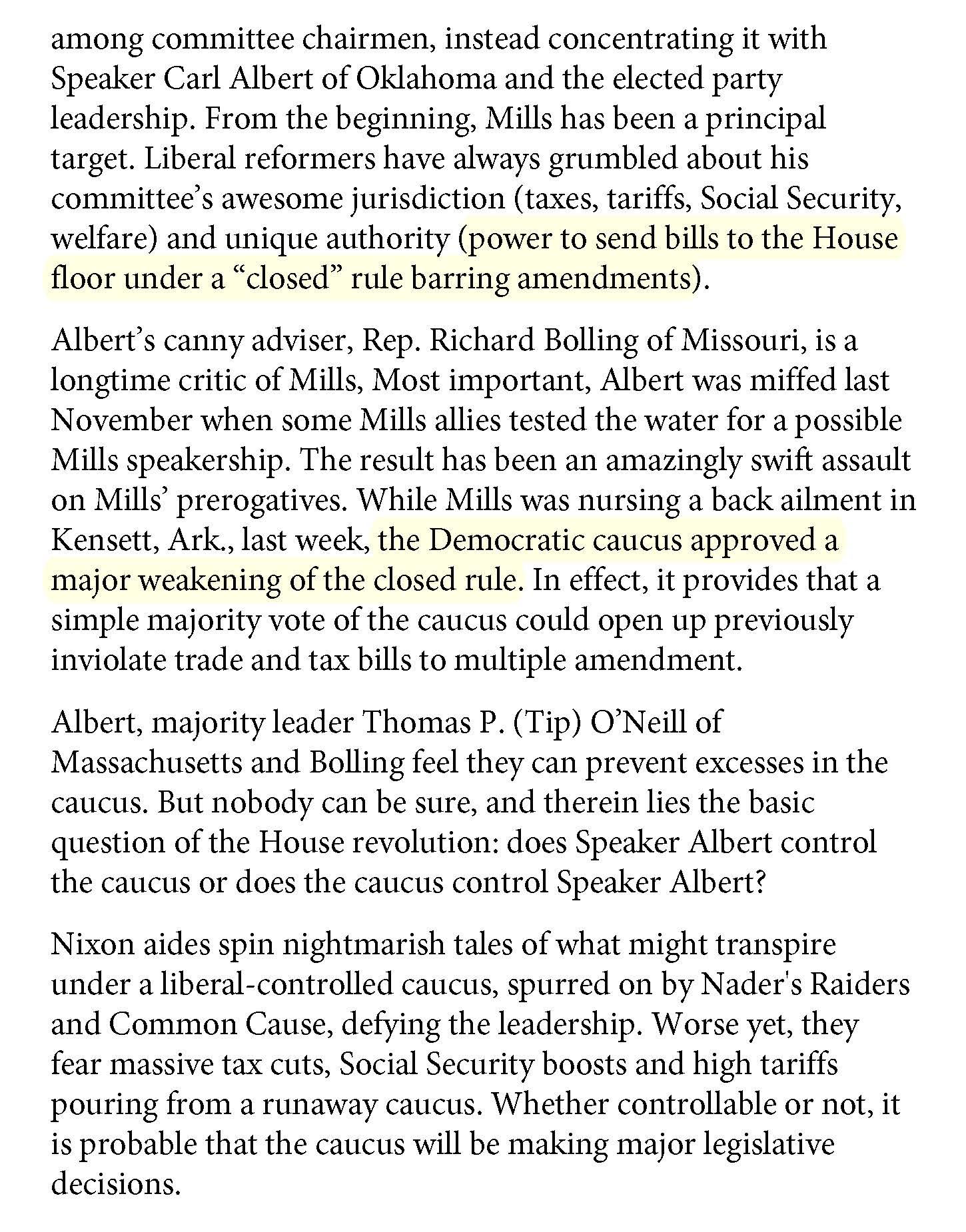
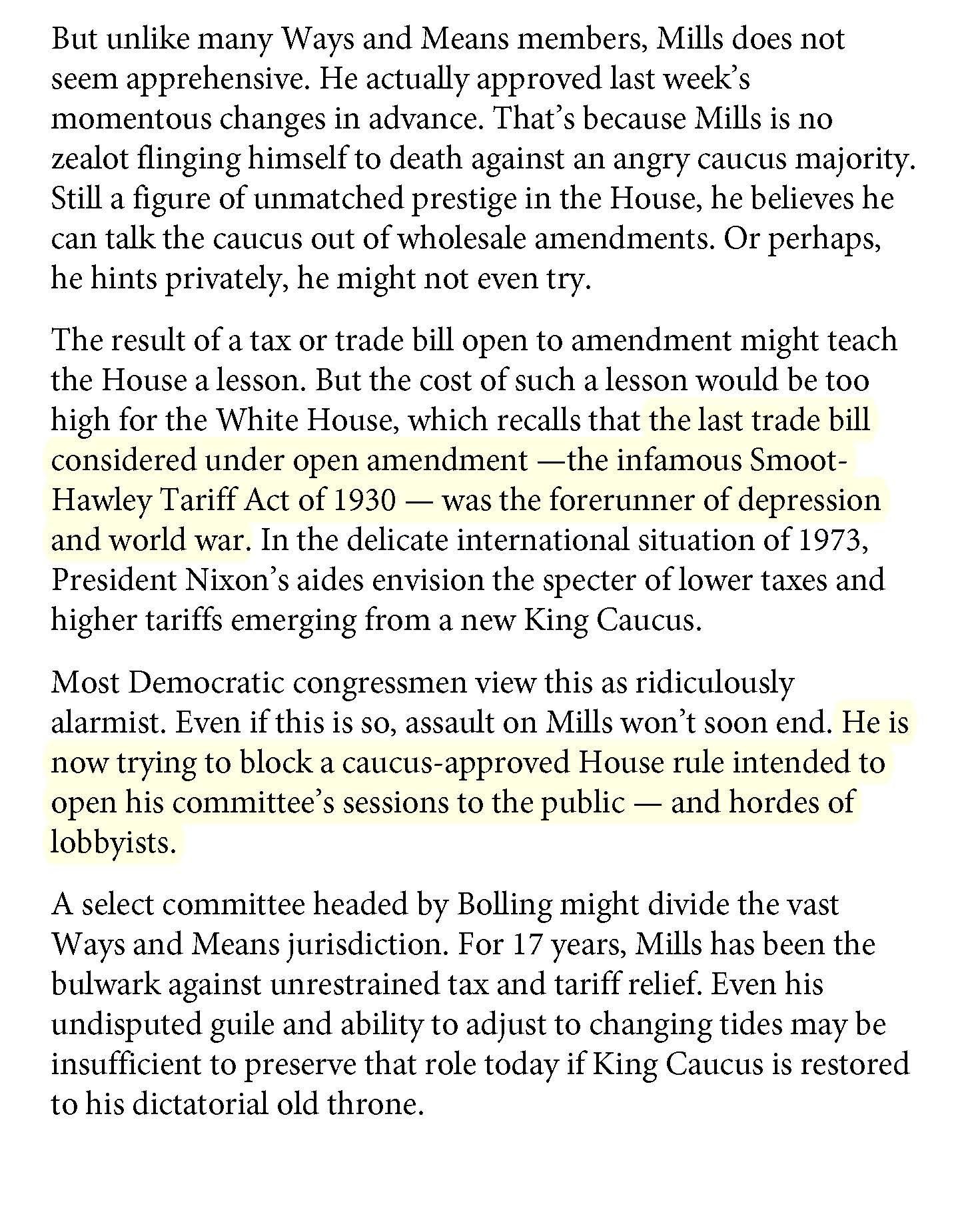
Rowland Evans & Robert Novak 1973 - Liberal Caucus May Run Wild (opinion piece in response to the 1973 moves by the House to further open all committees and further limit the closed rule)

Rowland Evans & Robert Novak 1973 - Liberal Caucus May Run Wild (opinion piece in response to the 1973 moves by the House to further open all committees and further limit the closed rule)
A senator periodically receives a record showing the number of times, by percentage, that he or she has voted with each of the other 99 senators. When I first came to the Senate, there were Democrats mixed in with Republicans and vice versa. Today, except for procedural votes, or what are often called throwaways, it’s rare for more than two or three senators to cross party lines on a vote. Nothing could more starkly demonstrate the fog of partisanship that has enveloped the Senate.Senator Dale Bumpers 1999
How Sunshine Harmed Congress
The propaganda against all coal legislation, inaugurated and conducted by a remarkably well-organized lobby of coal operators, some of whose representatives now sit in the gallery of the Senate, is so powerful that I feel that the bill will be defeated.Rep Joseph Sherman Frelinghuysen 1921
Congressional Record
Although it is de rigueur these days to equate lobbyists with smoke-filled back rooms, lawmakers and state officials said the give-and-take was conducted in the open, and Mr. Plofsky, the Ethics Commission head, remarked that the state's strict requirements that all lobbyists register and disclose the amount they are paid make all the players aware that they face public scrutiny. Still, whether this leads to better legislation remains to be seen. When the Senate finally voted on the bill shortly before midnight Wednesday, lobbyists in the gallery shook hands, hugged and clapped each other on the back.Jonathan Rabinovitz 1998
Hartford Lobbyists Getting Rich on Electricity Deregulation
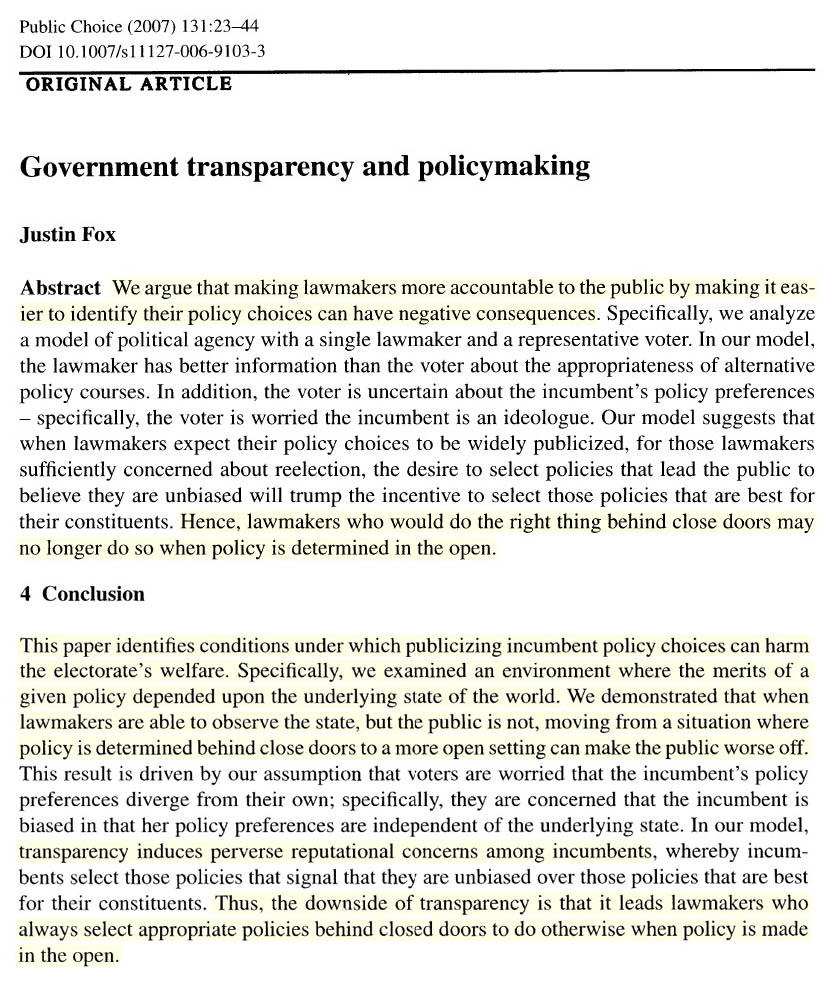
Justin Fox 2006 – Government Transparency and Policymaking

Justin Fox 2006 – Government Transparency and Policymaking
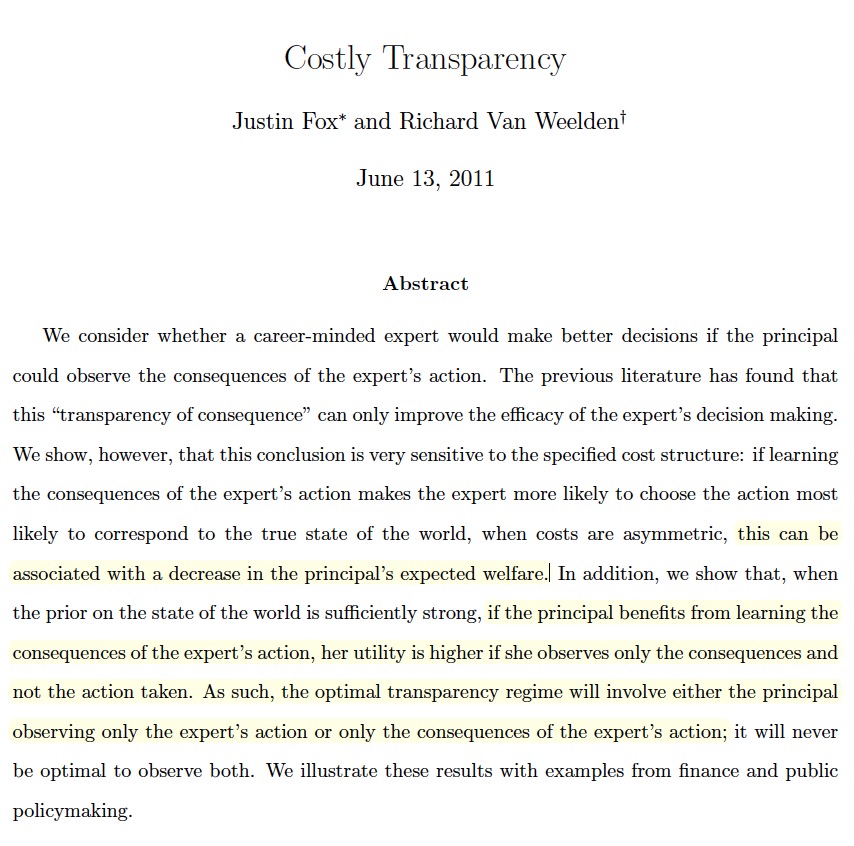
Justin Fox 2011 – Costly Transparency

Justin Fox 2011 – Costly Transparency
While most of the [increases in transparency] Congress made during this period were not in response to any great outpouring of public sentiment – more than one observer has noted that “congressional reform has no constituency” - they did have the support of various interest groups as well as of editorial writers and columnists.Donald Wolfensberger 2000
Dawning of the Sunshine Seventies
Bentham’s idea is that secret voting should be used in assemblies when, but only when, “circumstances render a hidden influence suspected.” In such circumstances, open voting allows credible commitments by voters to third parties who can corrupt the voters with threats or bribes, and open voting will produce falsification of preferences or judgments. Hence “to demand a ballot, is to appeal from the apparent to the real wish of the assembly.”Adrian Vermeule 2010 (Harvard Law)
Open-Secret Voting
Closed sessions are held because members have expressed the feeling that they can arrange compromises more easily when lobbyists cannot watch their every move and every decision does not have to recorded formally.Spencer Rich 1985 (WaPo)
Hill Panels’ ‘Sunshine’ Starts Clouding Over
There is not a political price to pay for civility. There is not a political price to pay for compromise... The process was actually pretty good, but there were too many people afraid to do it in public.Governor Tim Walz 2019
Reporter Frederick Melo tweeting about the spending bill from St. Paul Pioneer Press
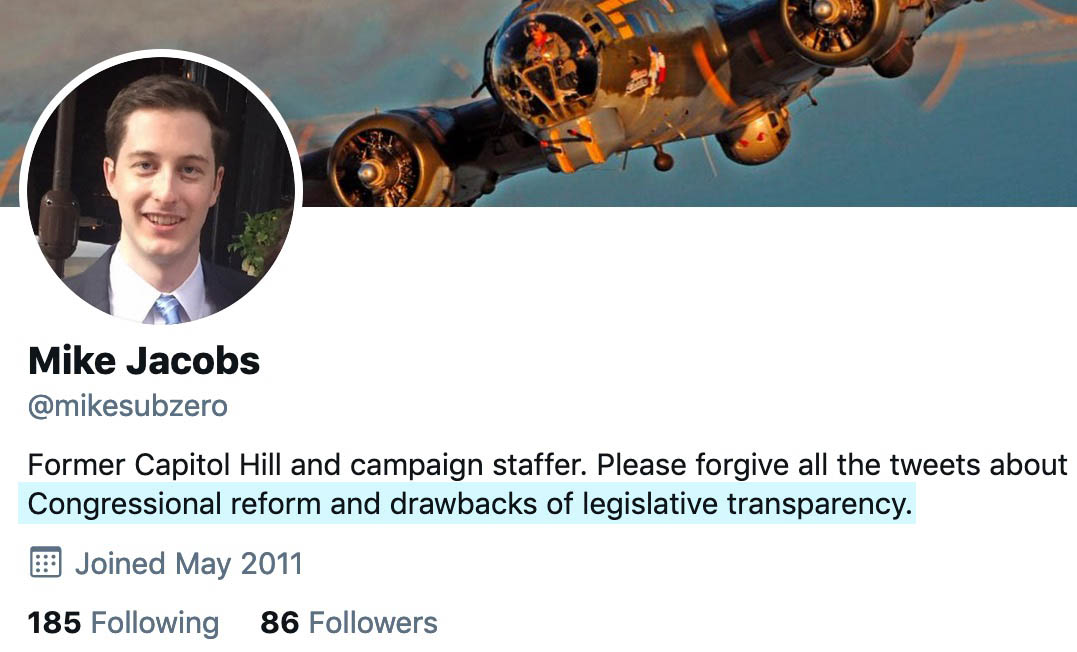
Mike Jacobs 2021 - Twitter Profile

Mike Jacobs 2021 - Twitter Profile
The idea that Washington would work better if there were TV cameras monitoring every conversation gets it exactly wrong. We don’t need smoke-filled back rooms, but we must protect the private spaces where people with different points of view are able to work through their disagreements. The lack of opportunities for honest dialogue and creative give-and-take lies at the root of today’s dysfunction.Senator Tom Daschle 2014
City of Rivals
We’ve probably gone too far in the direction of transparency in a number of government deliberative processes.Lee Drutman 2016
Chaos of American Politics
Behind closed doors, lobbyists don’t know everything that is going on.Richard Cohen 1994
Washington At Work
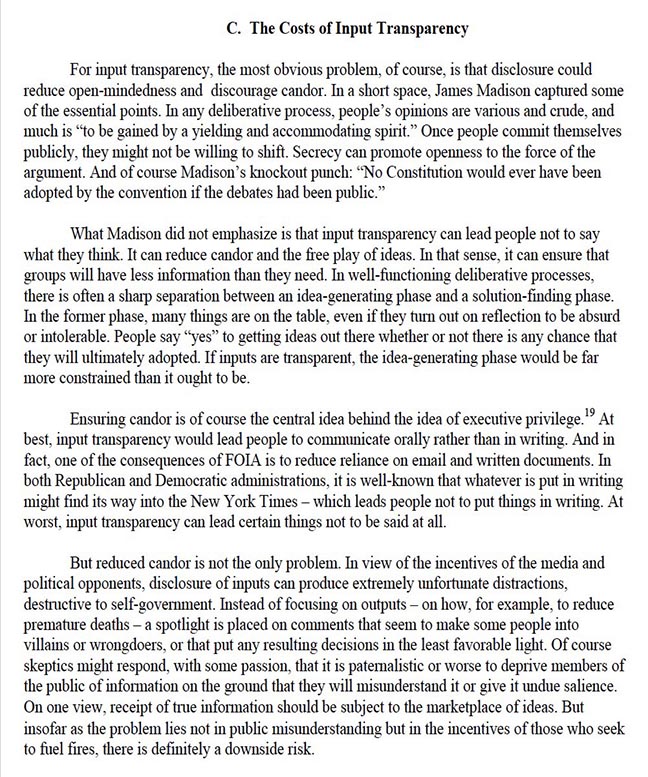
Cass R. Sunstein 2016 – Output Transparency vs. Input Transparency

Cass R. Sunstein 2016 – Output Transparency vs. Input Transparency
The primary effect of opening committee meetings is that it gives lobbyists more information, and thus more power. It makes lobbying—the art of influencing government officials—a more effective, scientific discipline. It makes it harder for representatives to shake off the cajoling of lobbyists with a friendly white lie. It allows lobbyists to prove to their principals at the home office, with hard data, that their efforts pay off, that investment in legislative influence can be profitable.Brent Ranalli 2017
Sunshine Reforms and Transformation of Congressional Lobbying
My colleagues think AIPAC is a very, very powerful organization that is ruthless, and very, very alert. Eighty percent of the senators here roll their eyes on some of the votes. They know that what they’re doing isn’t what they really believe is right, but why fight on a situation where they’re liable to get beat up on?Anonymous US Senator 1991
Washington Post Interview by Lloyd Grove
The basic message is clear: any senator or representative who crosses AIPAC [the Israel lobby] is playing with fire… As one congressional source put it in 1991, “Voting against Israel has become like voting against lumber in Washington state, except AIPAC does it all over the country.”… and why Jimmy Carter said in February 2007 that “I don’t see any present prospect that any member of the US Congress, the House or Senate, would say, ‘Let’s take a balanced position between Israel and the Palestinians and negotiate a peace agreement.’” He added, “It’s almost politically suicidal… for a member of the Congress who wants to seek reelection to take any stand that might be interpreted as anti-policy of the conservative Israeli government.”John J. Mearsheimer & Stephen M. Walt 2007
The Israel Lobby and US Foreign Policy
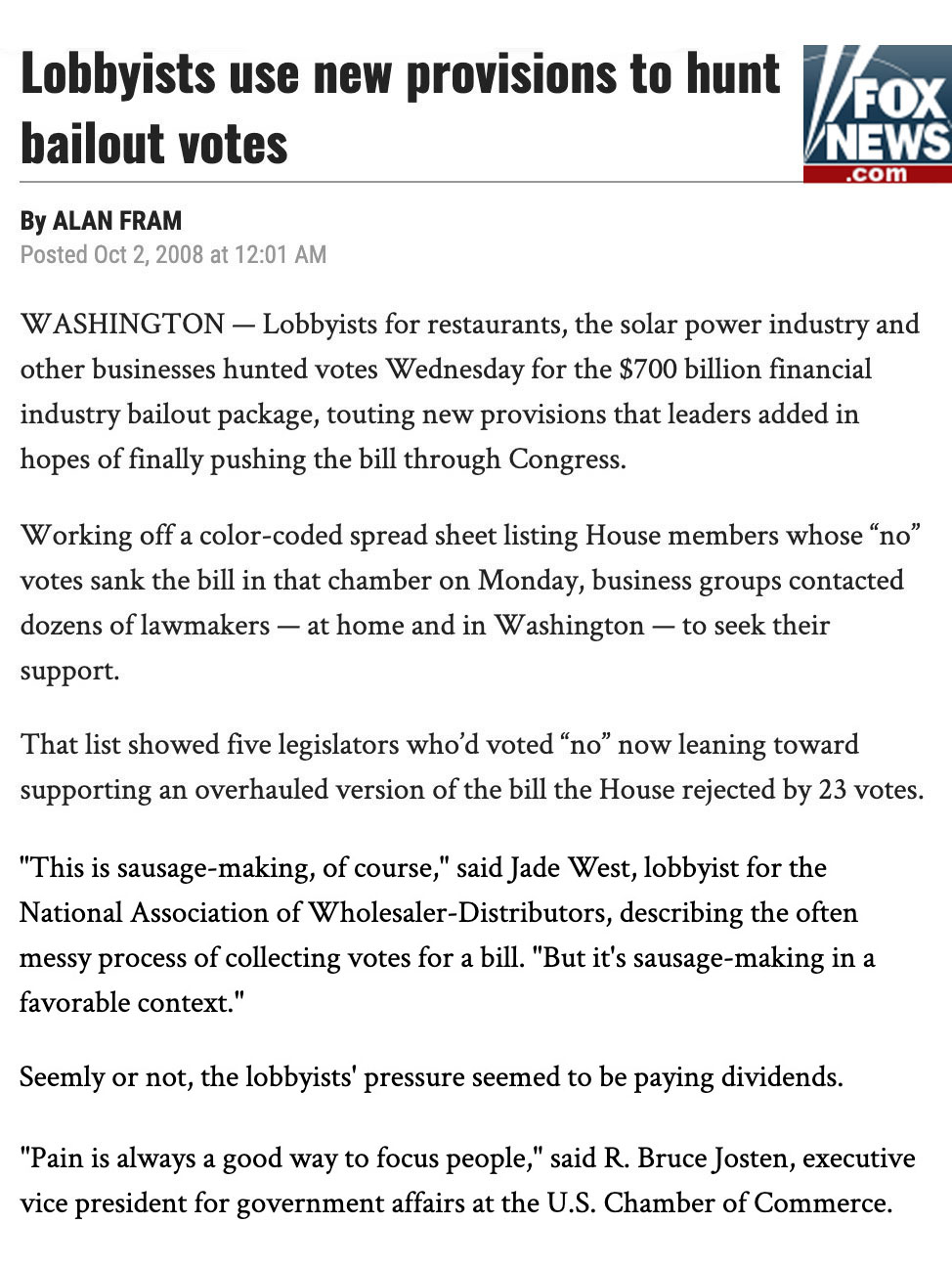
Lobbyists Hunting Votes

Lobbyists Hunting Votes
The intimidation factor is alive and well on Capitol Hill, where most members, while privately resenting the pressure, dutifully toe the Israeli line. If voting were kept secret, I am confident that aid to Israel would have long ago been heavily conditioned – if not terminated – in both chambers.Rep. Paul Findley 2003
They Dare To Speak Out
The results demonstrate that the failure of previous research to analyze interaction effects have led scholars to draw inadequate and misleading conclusions about the link between transparency, democracy and corruption… Fisher, Ury and Patton even claim that “a good case can be made for changing Woodrow Wilson’s slogan ‘open covenants openly arrived at’ to ‘open covenants privately arrived at’”, arguing that negotiators will produce wise agreements more easily in private than in public.Catharina Lindstedt & Daniel Naurin 2005
Transparency and CorruptionNote: Despite his comments, Wilson was hardly a fan of transparency. As President he conducted many of his most celebrated actions in secret, using guards at the doors of meetings to insure executive deliberations. Wilson also authored these words which embrace secret deliberations in Congress: “Rather than imprudently expose to the world the differences of opinion threatened or developed among its members, each party hastens to remove disrupting debate from the floor of Congress, where the speakers might too hastily commit themselves to insubordination, to quiet conferences behind closed doors, where frightened scruples may be reassured and every disagreement healed with a salve of compromise or subdued with the whip of political expediency.”
For a striking example of how the public and Congress as a whole can be kept in the dark about significant policy conflicts, one need look no further than to the long-drawn-out mark up and conference sessions on the 1972 water pollution act. Important policy questions were being debated: the amount of money needed for pollution abatement; the right of citizens to bring mandamus actions against complacent pollution control agencies; and the question of zero discharges of pollutants as a policy goal. Yet the House Committee on Public Works held mark-up sessions over a period of 3 months, all in closed session, with no official information given out until the pollution control bill was finally reported-2 weeks before the House acted on it.Luther J. Carter 1973
Secrecy in Congress: Tiptoeing toward Reform (Climate)
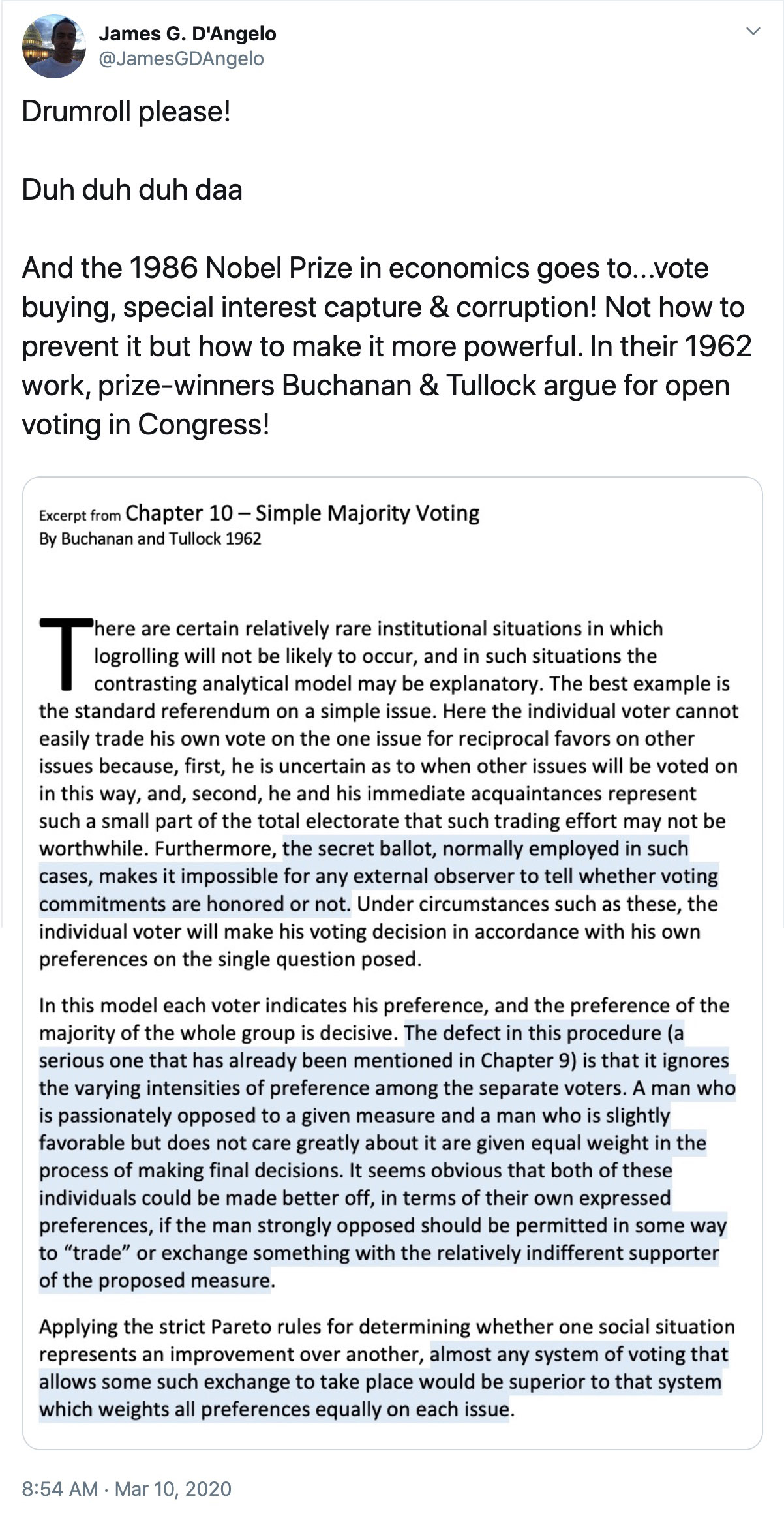
James M. Buchanan & Gordon Tullock 1962 argue for open voting, precisely to improve special interest capture.

James M. Buchanan & Gordon Tullock 1962 argue for open voting, precisely to improve special interest capture.
Is it possible that opaque ‘backstage’ areas of politics may in fact, under some circumstances, be more civil in the deliberative sense—more characterised by arguing with reference to public interests and ideals and less affected by self-interested bargaining and pressure politics—than the public ‘frontstage’? At the least, Joerges and Neyer’s and Eliasoph’s findings demonstrate the prevailing ambiguity about the effects of transparency and publicity on political behaviour. Daniel Naurin 2007
Deliberation Behind Closed Doors
“Scholars must recognize that election fraud, whatever its precise level or influence, was a common characteristic of Gilded Age elections.” According to Argersinger, the existence of three factors created an environment ripe for electoral fraud during this period: “electoral competitiveness, partisan or weak institutional arrangements [e.g. no secret ballot], and an ‘indulgent’ political culture.”Gail Buttorff 2008
Detecting Fraud in America’s Gilded Age
Finally, Members of Congress have been threatened, with varying degrees of subtlety, by lobbyists backed by big-dollar PAC’s. For example, a maritime union lobbyist sought Representative Leon Panetta’s support for a bill by saying, “I don’t have to tell you anything substantive – we gave you money. We support the bill, and we expect you to.”Joan Claybrook 1983
Hearings on Campaign Fiance Reform
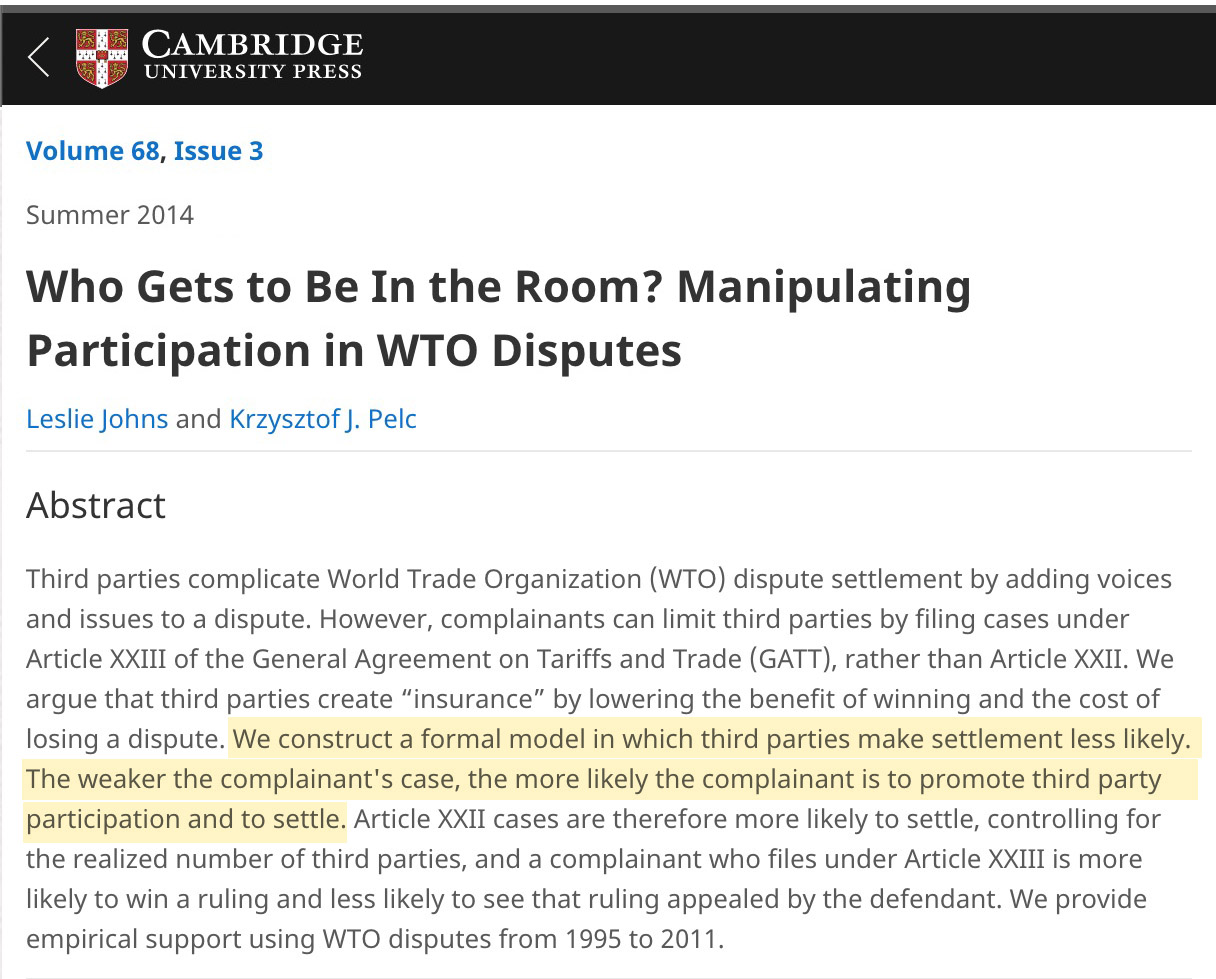
Leslie Johns & Krzysztof J. Pelc 2014 - Who Gets to Be In the Room? Manipulating Participation in WTO Disputes

Leslie Johns & Krzysztof J. Pelc 2014 - Who Gets to Be In the Room? Manipulating Participation in WTO Disputes
Arguments against more transparency while merited in a few instances are often not only limited in application, but fundamentally flawed.Vishwanath & Kaufmann 1999
Toward Transparency
Because the law [FOIA] has been a bigger boon to business than to the media and public interest groups, skepticism about its value developed almost from the day the law was signed. Skeptics have turned the Madison quote against FOIA. In 1995, a Duke Law Journal article by Amy Rees examined what she viewed as the act’s unmet aims. For her, the commercial use and public-interest disuse of FOIA has become the “Farce or a Tragedy; or, perhaps both.” Michael Doyle 2002
Misquoting Madison
FOIA is celebrated as the source of groundbreaking investigative journalism, but it was businesses that seized on the act, as the Congressional Research Service discovered in a 1972 survey. Of 1,503 requests identified by the service, 43 percent came from corporations or law firms. Only 6 percent came from the media. A generation later, the statistics are similar. In fiscal 1998, the Environmental Protection Agency received 21,220 FOIA requests. Only 1 percent came from the media and 2.4 percent came from public-interest groups, while 88.6 percent of the requests were classified as “commercial.” Michael Doyle 2002
Misquoting Madison
Some members thought the openness concept could be carried too far. Staggers said members were sometimes pressured into voting for open sessions against their consciences for fear of being accused of underhandedness. “What I resent more than anything else,” said Al Ullman (D Ore.), “is people wrongly accusing members of bad motives when they vote to close one or two sessions for legitimate reasons… They should get more sophisticated about that.”Prudence Crewdson 1973 CQ Quarterly
Senate and House Open Up their Sessions in 1973Note: Ullman replaced Wilbur Mills on Ways and Means - and was famous for openning the committees - this is the first time I've seen him argue about his regrets for doing so
[Rep. Harley Staggers noted:] “there are still some cases where closed mark-ups are better. We wouldn't have had 150 amendments to the energy bill if the lobbyists hadn't been there – we'd only have had 10 or 15.” One [congressional staffer] said the open mark-up sessions slowed the committee's work when it was dealing with controversial legislation, because members became “more vocal” for the benefit of lobbyists – and for reporters who might quote them in the next day's papers. Lobbyists had been known to hand members notes with suggested amendments, he said, and “sometimes you even had applause and the chair had to bang for order.”Prudence Crewdson 1973 CQ Quarterly
Senate and House Open Up their Sessions in 1973
Ray Dennison, an AFL-CIO lobbyist who opposed the trade bill, said he always prefers open markups and found the closed trade bill sessions particularly unfair.Prudence Crewdson 1973 CQ Quarterly
Senate and House Open Up their Sessions in 1973
One example of the constituent pressure ...was reflected in a remark made by James A. Burke (D Mass.) on June 18, 1973, as he voted to keep the trade mark-ups open. Burke said he was voting to keep the sessions open “not because its the right thing to do but because I'll be damned if I'm going to spend the next year and a half explaining to my people why I voted against open meetings. Thank God there are enough votes here to close them.” (The vote to close the meeting was 15-9. with all senior members except Burke for closing.) Prudence Crewdson 1973 CQ Quarterly
Senate and House Open Up their Sessions in 1973
FOIA imposes additional political and agenda-setting costs on agencies by giving those who oppose their work a low-cost tool with which to harass and embarrass them. Businesses and trade groups threatened by a new regulatory or enforcement policy use FOIA to “dig up dirt” on the policy and the people behind it. They also use FOIA to extract large volumes of background documentation, which they then communicate back to the agency in an effort to “overload” its staff and shape the administrative record. Nonprofit organizations that object on ideological grounds to an agency’s mission or its leadership employ similar tactics, backed up by a continuous succession of FOIA lawsuits. These tactics often have a partisan valence.David Pozen 2017
Freedom of Information Beyond the Freedom of Information Act
On the libertarian right, FOIA is celebrated as a means to impede “the Statists” at disfavored agencies through “witch hunts” and “fishing expeditions.” The conservative Judicial Watch foundation came to prominence over the past two decades largely by using FOIA to “trip up” Democratic officials. Freedom Watch now plows the same ground. There is no comparable outfit (Civic Solidarity Watch?) on the progressive left. In the environmental area, FOIA-fueled witch hunts and fishing expeditions have become so serious that a legal defense fund was established in 2011 to help climate scientists fend off “malicious freedom of information act requests.” These oppositional uses of FOIA not only exacerbate diversion and deliberation costs but also alter the political sociology of agency action, making it harder for administrators to formulate and carry out affirmative agendas of all kinds.David Pozen 2017
Freedom of Information Beyond the Freedom of Information Act
Just making important data available won’t cause political change. Justice Brandeis’s clever aphorism to the contrary, sunlight is not in fact the best disinfectant; actual disinfectant is. Sunlight just makes it easier for people to look at the pus.Aaron Schwartz 2006
Disinfecting the Sunlight Foundation
Even well designed disclosure systems either can exclude significant information from scrutiny and public access or may release large amounts of material relying on the public to detect problems. Collecting hundreds of thousands of disclosures was the first approach by both Argentina and the Ukraine. Both countries made the documents available to the public. Citizens and the media were so overwhelmed by the amount data that the documents were useless.Stuart C. Gilman & Howard Whitton 2013
When Transparency Becomes the Enemy of Accountability
The problem with transparency as a management fad is that it can lead to distraction, complacency, perverse incentives, greater costs and loss of public confidence in the integrity of government and administration. This is true in the developed world and a nightmare in the developing world. Transparency for transparency’s sake is of no practical value.Stuart C. Gilman & Howard Whitton 2013
When Transparency Becomes the Enemy of Accountability
A good historical reminder is that Enron Corporation’s accounts were entirely transparent. The problem was that the information provided was impossible to understand unless you were a well-qualified forensic accountant with a large research team at your disposal. Not everything significant was connected to everything else and the message was missed. After the fact, even their board of directors admitted that they could not understand the reports they were given.Stuart C. Gilman & Howard Whitton 2013
When Transparency Becomes the Enemy of Accountability (Information Overload)
The government-in-the-sunshine movement may have had its greatest effect on deliberation in the committee markup stage. When these sessions were secret, congressmen were not strictly accountable for their opinions and actions on the details of a legislative proposal. They had little reason to fear offending a powerful constituency or interest group if they failed to back their requests in every respect. Now these same groups are actually present during the line-by-line reworking of the bill. They can monitor the congressman’s actions on every vital point. It is hard to imagine how any truly deliberative process – of openness to information and argument, of reasoned give and take, and of education on the substance of policy – can occur in such an environment.Joseph Bessette 1982
Is Congress A Deliberative Body?
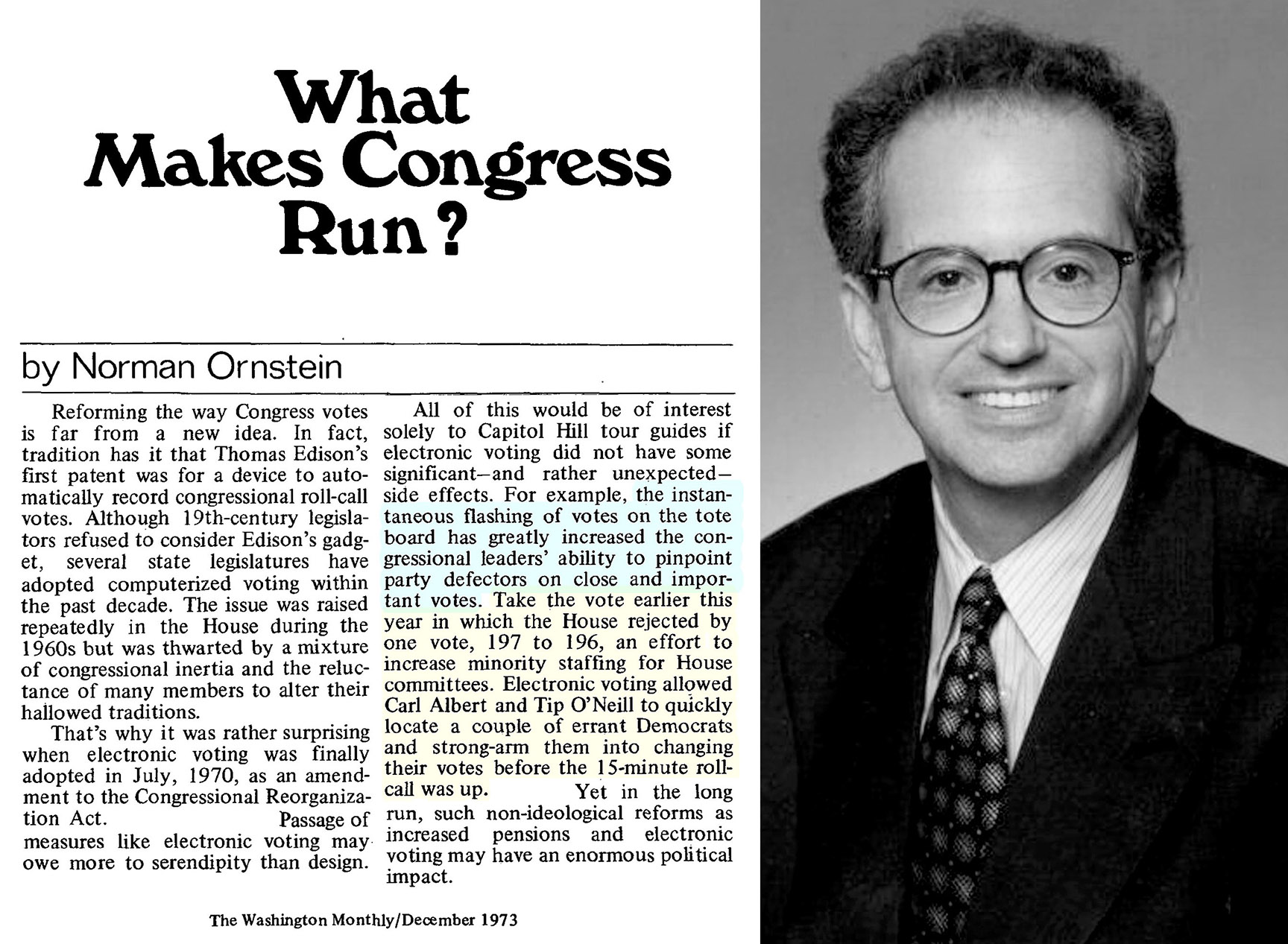
Norman Ornstein 1973 – What Makes Congress Run?
TEXT: Reforming the way Congress votes is far from a new idea. In fact, tradition has it that Thomas Edison’s first patent was for a device to automatically record congressional roll-call votes. Although 19th-century legislators refused to consider Edison’s gadget, several state legislatures have adopted computerized voting within the past decade. The issue was raised repeatedly in the House during the 1960s but was thwarted by a mixture of congressional inertia and the reluctance of many members to alter their hallowed traditions. That’s why it was rather surprising when electronic voting was finally adopted in July, 1970, as an amendment to the Congressional Reorganization Act. Passage of measures like electronic voting may· owe more to serendipity than design. All of this would be of interest solely to Capitol Hill tour guides if electronic voting did not have some significant – and rather unexpected side effects. For example, the instantaneous flashing of votes on the tote board has greatly increased the congressional leaders’ ability to pinpoint party defectors on close and important votes. Take the vote earlier this year in which the House rejected by one vote, 197 to 196, an effort to increase minority staffing for House committees. Electronic voting allowed Carl Albert and Tip O’Neill to quickly locate a couple of errant Democrats and strong-arm them into changing their votes before the 15-minute rollcall was up. Yet in the long run, such non-ideological reforms as … electronic voting may have an enormous political impact.

Norman Ornstein 1973 – What Makes Congress Run?
Despite the general perception that lobbyists prefer opacity with regards to the disclosure of their activities, the OECD’s surveys show that the majority of surveyed lobbyists support mandatory disclosure of information.OECD 2013
Transparency and Integrity
In the back-room deals of the commission on Social Security, [author Paul Light] sees a model for Congress as it makes “painful choices” on other issues, such as budget deficits and Medicare, the health insurance program for 30 million elderly and disabled people… Social Security, he says, typifies a group of issues best dealt with away from the public spotlight. The commission was portrayed by members of Congress and journalists as a great bipartisan success, but in reality, the author contends, it “succeeded mainly as a front for secret bargains.” Members of the commission said in interviews that Mr. Light got the basic story right. The secret bargaining sessions were a way for the President and the Speaker of the House, Representative Thomas P. O'Neill Jr., to negotiate through proxies… Mr. Light’s thesis is that “a secret gang built a compromise, wrapped it in a bipartisan flag, and rammed it through Congress.”Robert Pear 1985
Concealing Dealing
The problem of what to do about pesticides had frustrated Congress for almost two decades, until members of my staff and the staff of Tom Bliley, a Virginia Republican, met secretly… One group absent from the proceedings was lobbyists.Rep. Henry Waxman 2009
How Congress Really Works
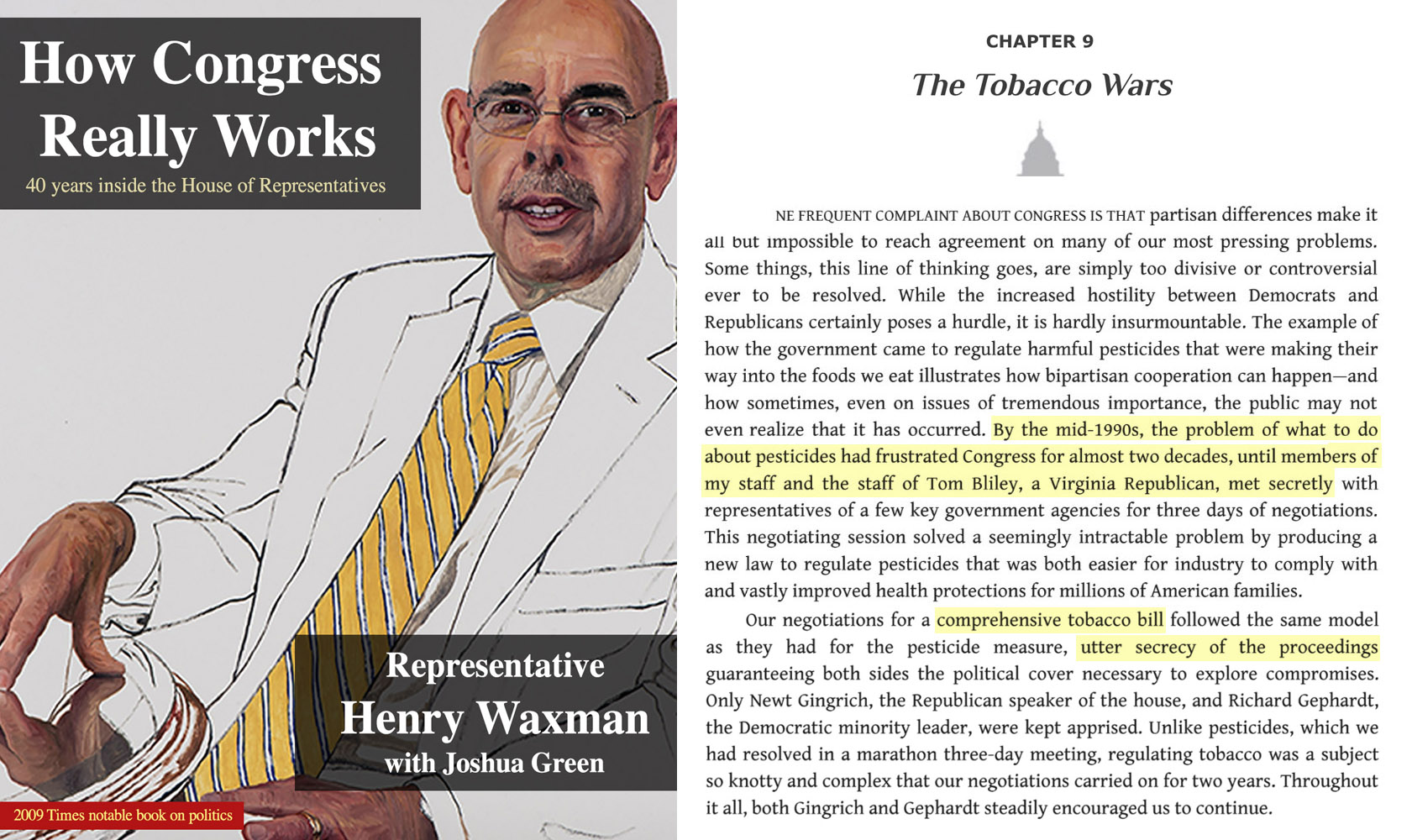
Rep. Henry Waxman 2009 – How Congress Really Works (Tobacco and Pesticides)
TEXT: The problem of what to do about pesticides had frustrated Congress for almost two decades, until members of my staff and the staff of Tom Bliley, a Virginia Republican, met secretly… One group absent from the proceedings was lobbyists. But having found common purpose on other seemingly intractable problems, we decided to give tobacco a try, too. Our negotiations for a comprehensive tobacco bill followed the same model as they had for the pesticide measure, utter secrecy of the proceedings guaranteeing both sides the political cover necessary to explore compromises. Only Newt Gingrich, the Republican speaker of the house, and Richard Gephardt, the Democratic minority leader, were kept apprised. (Environment / Climate analagous)

Rep. Henry Waxman 2009 – How Congress Really Works (Tobacco and Pesticides)
Robert Dove, the Senate parliamentarian, advised Chief Justice Rehnquist to close the deliberations in the Clinton [1999 impeachment] case because the Senate had always done it that way. Rehnquist relied on this tradition when he ruled against opening the deliberations. The Chief Justice also leaned heavily on rules enacted for the [1868 Andrew] Johnson impeachment.Marjorie Cohn 2000
Open-and-Shut: Senate Impeachment Deliberations Must Be Public
George Washington, president of the Constitutional Convention, stressed the importance of secrecy... In presiding over the Constitutional Convention, he worked to forge consensus, demanding complete secrecy as the delegates set about the controversial task of not just revising the Articles of Confederation, but scrapping them all together. One morning in June Pennsylvania delegate Thomas Mifflin spotted a copy of the Virginia plan, which the Convention had allowed delegates to copy, on the floor outside of the meeting room. He turned the errant document over to Washington, who placed it in his pocket and said nothing until the delegates were ready to adjourn for the day. Before putting the question on adjournment, Washington stood and sternly addressed the delegates.
“Gentlemen, I am sorry to find that some one Member of this Body, has been so neglectful of the secrets of the Convention as to drop in the State House a copy of their proceedings, which by accident was picked up and delivered to me this Morning. I must entreat Gentlemen to be more careful, least our transactions get into the News Papers, and disturb the public repose by premature speculations. I know not whose Paper it is, but there it is (throwing it down on the table), let him who owns it take it.”
George Washington 1787
Secrecy and the Constitutional Convention (John P. Kaminsky 2005)
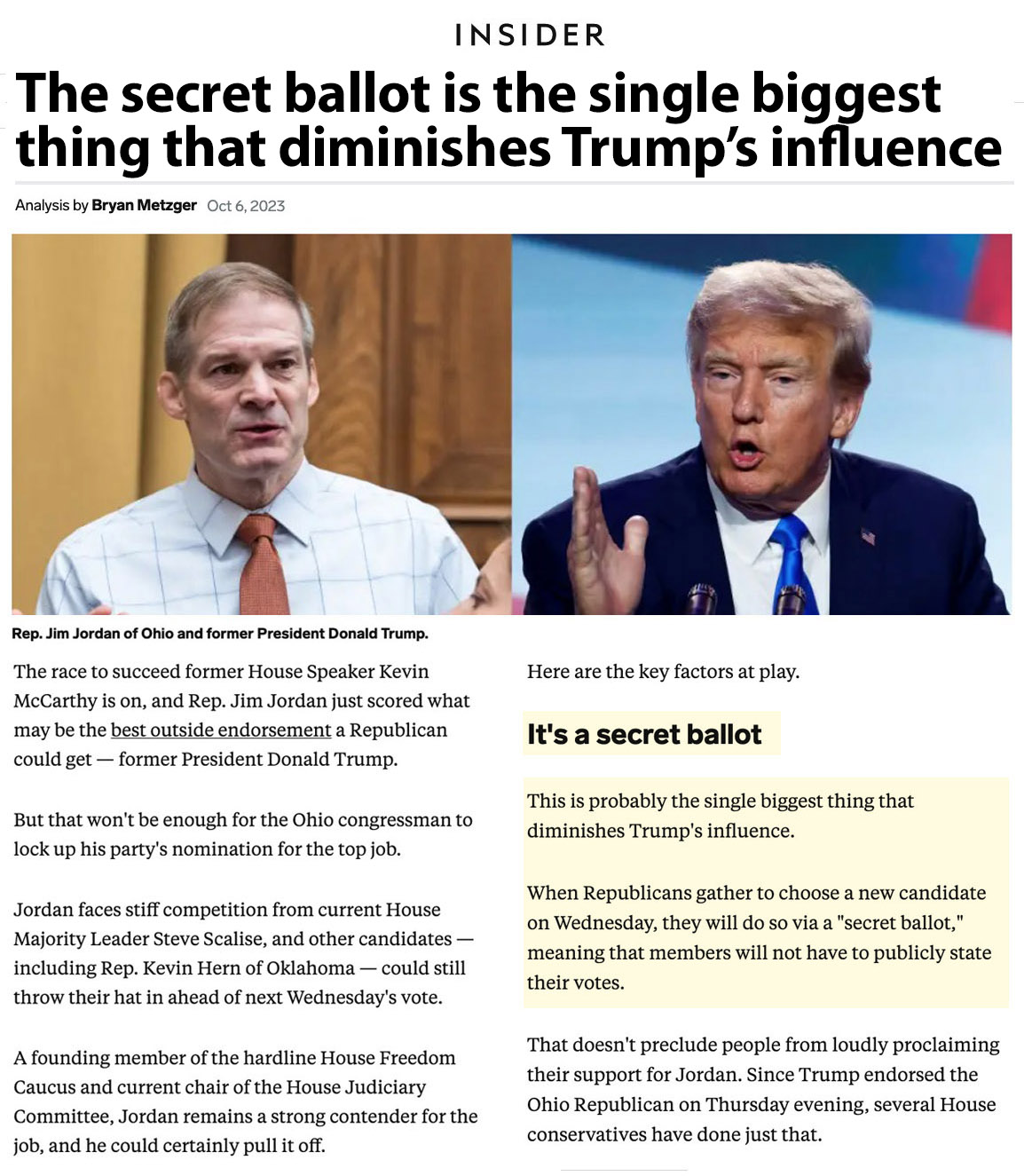
Bryan Metzger 2023 - The secret ballot is the thing that diminishes Trump’s influence

Bryan Metzger 2023 - The secret ballot is the thing that diminishes Trump’s influence
Sen. Ben Sasse (R-NE) blasted senators on the Judiciary Committee on Thursday for what he said was “grandstanding for the cameras” at a hearing to review former special counsel Robert Mueller’s Russia investigation.
“It’s bullshit the way people grandstand for cameras in here,” Sasse told the committee. “The reality is if we didn’t have cameras in this room, the discussion would be different. The Senate doesn’t work. It doesn’t diffuse the partisan tensions that are leading the country toward dissolution.”
“Ninety percent of our committees are about people trolling for soundbites,” the senator added. “That’s what actually happens. Some of us have other work to do. People can troll for soundbites whenever they want.”David Edwards 2020
Profanity-laced rant on ‘grandstanding’
HOST MICHAEL GERRARD: I was struck by your description of the legislative process being largely behind closed doors and that there is a tension there, between that and the usefulness of that, and transparency. as you were just speaking about Mr. Jorling. So how does that function? Is there a sweet spot at which members need privacy to have these questions? Have we become too transparent?
TOM JORLING: Well, when we do talk about the differences between then and now one of, to me, is the most significant is the closed markup. The transparency comes because it’s going to be on the floor, [the bill] it’s going to be debated and it’s going to be voted upon. But the opportunity to learn and to dig deeply into a subject can’t be done in open forum. It’s as if you would put cameras in there which would automatically lead to people starting to play to their base and no longer be interested in trying to come up with a meaningful set of answers to difficult questions. It’s absolutely essential that they [legislators] have that that space to do that [debate and consider]. And I’ll mention one more thing and then Leon [Billings] can join. Senator Muskie had a very important method to developing legislation. If we would present what we thought were answers to some of the difficult questions, he would undertake to question us in the most aggressive and hostile ways, because his theory was if I can’t, if you can’t answer these questions, I can’t answer them on the floor when this matter gets into that part of the process. No one could do that if it was in open session and the cameras were there and the base was out there responding. He sort of taught that method to all of them because they all became adept at pressing us on whether or not what they were being asked to review or consider was meritorious. They would ask the most difficult questions that they could and if they didn’t get satisfactory answers they would send us back to the drawing board. So it [secrecy] was a very essential part. It also was an important part of the respect, if you would portray this fast forward [Senator] Eagleton and [Senator] Baker probably would have been aggressive contestants with each other if they were doing everything in public, but because they were in this space. They could challenge each other they could learn what was motivating each other it led to a kind of understanding that they weren’t out to try and game one another but rather to solve a public policy question. So I think it’s immensely important. I think the greatest result or the greatest poor result of Watergate was to quote reform the processes and they reformed them in a number of ways including to open up markups, but those reforms I think have been very damaging to the legislative process.
LEON BILLINGS: Senator Muskie was one of the leading advocates of sunshine laws. He opened one of his other subcommittees, where he had the authority to do that, early on in the process - and he was very strongly for that. And he found out, almost immediately, that some of the members couldn’t work well in that fully open environment. You see it now [2014] with this budget agreement that was just reached two-year budget agreement crafted in private, no public participation, no public gazing on the process came out and revealed it. Same thing happened three years ago four years ago in the 2011 debt extension legislation. So the congress is drifting back to that there it’s not the same committee structure that they had but clearly where comity is being achieved in the current political environment it’s being achieved behind closed doors not in open session.Leon Billings & Tom Jorling 2014
Interview on 1970 Clean Air Act - Benefits of Closed Door Sessions (Climate)
The bias of the author [Daniel N. Hoffman] is clearly and consistently opposed to government secrecy. In his final paragraph he writes, “The laws and judicial doctrines abridging political speech and publication should not be toughened, but repealed or overruled… their impact is not to protect the national interest but to maintain a rigid barrier between the rules and the ruled, those with and those without a ‘need to know,’ those with and those without access to the private, elite channels of influence and information.” Yet the historical record is not so clear on this point. Secrecy is at times very necessary for the national interest. As Madison wrote sometime after the Constitution had been adopted, “No Constitution would ever have been adopted by the Convention if the debates had been public.” Secrecy was also crucial in the ratification debate when the document was presented “as a grand design rather than a patchwork of compromises. This could hardly have been done if each provision were identified with the demands of a particular faction; the debate would then have tended to focus on the concessions made by each side rather than on the merits of the plan as a whole.” Hoffman argues that the convention was a unique case with little value as a precedent. I am not persuaded, particularly in foreign affairs and in volatile issues when bipartisan support is critical and special interests could wreck the process of compromise. The Supreme Court’s position that there is room for executive privilege in the constitutional system, with lines drawn on a case-by-case basis, still seems the best policy.Paul J. Webber 1982
Book Review - Governmental Secrecy and the Founding Fathers
At Ways and Means, however, Mills taunted the reformers by refusing to create subcommittees or to respond to liberal views. The Democratic Caucus responded with a new rule, directed at his committee, to encourage additional House debate: if fifty Democrats wished to offer an amendment on the House floor, the caucus could decide whether to instruct the Rules Committee to permit debate and a vote on such an amendment. In May 1974 Mills objected in vain when the caucus voted to permit House votes on two amendments directed at the oil industry; each was sponsored by a liberal Democrat on Ways and Means. Mills was suddenly in the unaccustomed position of coping with challenges from junior members of his committee and from House leaders. It got worse. The caucus in 1973 had approved another rules change that required committees to conduct their meetings in open session unless its members voted to close the doors. Although Ways and Means members in the next two years continued to make their key decisions mostly in private, the pressure to work in the sunshine had the unintended consequence of increasing lobbyists' access to the panel's deliberations. Open meetings, several members said, altered the atmosphere just enough to create problems.Richard Cohen 2000
Rostenkowski: The Pursuit of Power and the End of Old Politics Cohen
Rostenkowski closed the [Ways and Means] committee sessions, having done away in 1983 with the nonsense imposed by goo goos during the 1970s reforms that opened such sessions to the press and public. He was right. When sessions were open, members merely played to the media or the Gucci Gulchers [high-dollar lobbyists].James L. Merriner 1999
Mr. Chairman : Power in Dan Rostenkowski's America
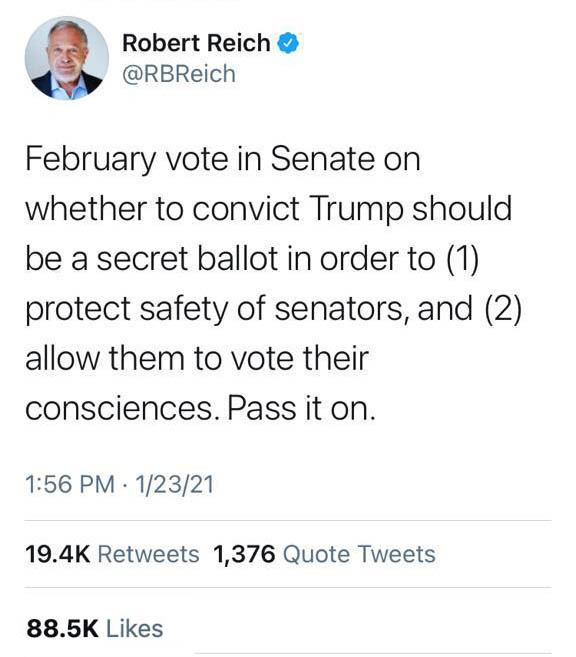
Robert Reich 2021 - Secret Senate Voting

Robert Reich 2021 - Secret Senate Voting
Our negotiations for a comprehensive tobacco bill followed the same model as they had for the pesticide measure, utter secrecy of the proceedings guaranteeing both sides the political cover necessary to explore compromises. Only Newt Gingrich, the Republican speaker of the house, and Richard Gephardt, the Democratic minority leader, were kept apprised.Rep. Henry Waxman 2009
How Congress Really Works
The use of electronic voting in the House has also made it easier for interest groups to follow and grade members. The most famous of these scores are produced by the Americans for Democratic Action (ADA) and the American Conservative Union (ACU), but almost all interest groups create some kind of ‘score’ that shows how closely member votes align with the group’s position. These scores are invaluable for group members, who can use them when contacting their representatives or when deciding whether to support (finance) the incumbent in future elections (or funding the campaign of their competitor)… The adoption of electronic voting provided the majority leadership with powerful tools with which to influence legislative outcomes.Jacob Straus 2012
The Rise of Roll Call Votes
You just have to sort of figure out how to – getting back to that word, “balance” – how to balance the public and the private efforts that are necessary to be successful, politically, and that’s not just a comment about today. That , I think, has probably been true for all of our history, and if you saw the Spielberg movie, Lincoln, and how he was maneuvering and working to get the 13th Amendment passed, and he called one of my favorite predecessors, Secretary Seward, who had been the governor and senator from New York, ran against Lincoln for president, and he told Seward, I need your help to get this done. And Seward called some of his lobbyist friends who knew how to make a deal, and they just kept going at it. I mean, politics is like sausage being made. It is unsavory, and it always has been that way, but we usually end up where we need to be. But if everybody’s watching, you know, all of the back room discussions and the deals, you know, then people get a little nervous, to say the least. So, you need both a public and a private position.Hillary Clinton
Wikileaks - HRC Paid Speeches
Mike Murphy, Fmr. Senior adviser to Mitt Romney and John McCain, tells MSNBC’s Andrea Mitchell that “One Republican senator told me if it was a secret vote, 30 Republican senators would vote to impeach Trump.” – September 25th, 2019
Mike Murphy, Fmr. Senior adviser to Mitt Romney and John McCain, tells MSNBC’s Andrea Mitchell that “One Republican senator told me if it was a secret vote, 30 Republican senators would vote to impeach Trump.” – September 25th, 2019
The U.S. Congress, although by definition democratic, used to function in a hierarchical and closed manner, at some distance from public pressures. Now it is a transparent body, utterly open to its constituents’ views and pressures. Congress has become a more responsive, more democratic, and more dysfunctional body.Fareed Zakaria 2003
Future of Freedom
The ballot laws of the Roman Republic (Latin: leges tabellariae) were four laws which introduced the secret ballot to all popular assemblies in the republic. They were all introduced by tribunes, and consisted of the lex Gabinia tabellaria (or lex Gabinia) of 139 BC, applying to the election of magistrates; the lex Cassia tabellaria of 137 BC, applying to juries except in cases of treason; the lex Papiria of 131 BC, applying to the passing of laws; and the lex Caelia of 107 BC, which expanded the lex Cassia to include matters of treason. Prior to the ballot laws, voters announced their votes orally to a teller, essentially making every vote public. The ballot laws curtailed the influence of the aristocratic class and expanded the freedom of choice for voters.Anonymous 2021
Ballot Laws of the Roman Republic
Lawyers, businessmen, teachers, doctors, all face difficult personal decisions involving their integrity – but few, if any, face them in the glare of the spotlight as do those in public office. Few, if any, face the same dread finality of decision that confronts a Senator facing an important call of the roll. He [Senator] may want more time for his decision – he may believe there is something to be said for both sides – he may feel that a slight amendment could remove all difficulties – but when that roll is called he cannot hide, he cannot equivocate, he cannot delay, like the Raven in Poe’s poem, is perched there on his Senate desk, croaking “Nevermore” as he casts the vote that stakes his political future. John F. Kennedy 1955
Profiles in Courage
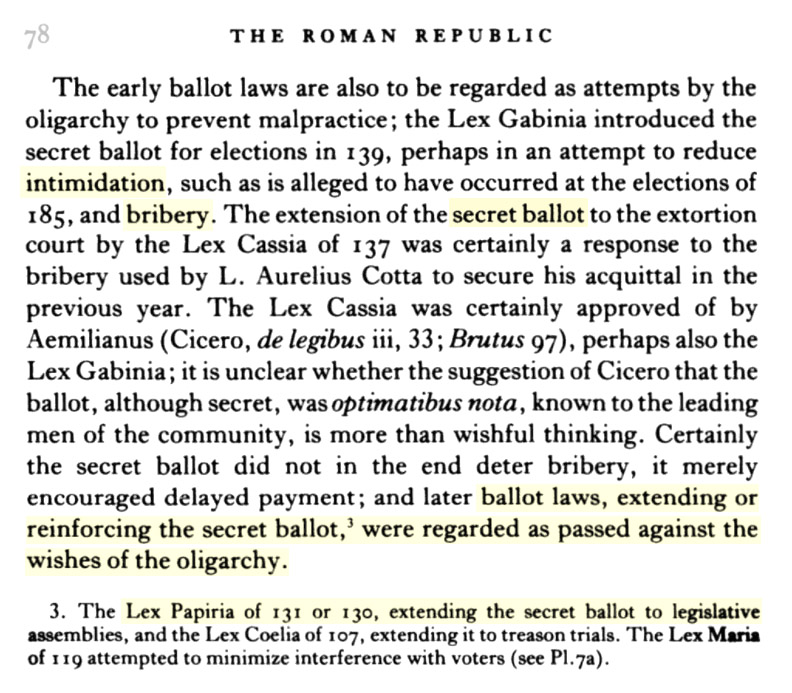
Michael Hewson Crawford 1993 - The Roman Republic
Text: The early ballot laws are also to be regarded as attempts by the oligarchy to prevent malpractice; the Lex Gabinia introduced the secret ballot for elections in 139, perhaps in an attempt to reduce intimidation, such as is alleged to have occurred at the elections of 185, and bribery . The extension of the secret ballot to the extortion court by the Lex Cassia of 137 was certainly a response to the bribery used by L. Aurelius Cotta to secure his acquittal in the previous year. The Lex Cassia was certainly approved of by Aemilianus (Cicero, de legibus iii, 33; Brutus 97), perhaps also the Lex Gabinia; it is unclear whether the suggestion of Cicero that the ballot, although secret, was optimatibus nota, known to the leading men of the community, is more than wishful thinking. Certainly the secret ballot did not in the end deter bribery, it merely encouraged delayed payment; and later ballot laws, extending or reinforcing the secret ballot, were regarded as passed against the wishes of the oligarchy. The Lex Papiria of 131 or 130, extending the secret ballot to legislative usemblics , and the Lex Coelia of 107, extending it to treason trials. The Lex Maria of 119 attempted to minimize interference with voters.

Michael Hewson Crawford 1993 - The Roman Republic
To reduce the dominating and distracting effect that the press, home audiences, and third parties (lobbyists) may have, it is useful to establish private and confidential means of communicating with the other side. You can also improve communication by limiting the size of the group meeting. In the negotiations over the city of Trieste in 1954, for example, little progress was made in the talks among Yugoslavia, Britain, and the United States until the three principal negotiators abandoned their large delegations and started meeting alone and informally in a private house. A good case can be made for changing Woodrow Wilson’s appealing slogan “Open covenants openly arrived at” to “Open covenants privately arrived at.” No matter how many people are involved in a negotiation, important decisions are typically made when no more than two people are in the room. Roger Fisher & William Ury 1987
Getting to YesNote: Harvard negotiation experts Fisher and Ury mention Trieste, but other salient and important examples abound such as Kennedy’s private communications with Khrushchev which averted nuclear war and Mitchell’s closed door sessions which helped resolve the situation in Northern Ireland. In both cases it appears that secrecy was essential to the peaceful negotiation. These ideas are covered in an important paper by Finel titled ‘The Surprising Logic of Transparency.’
Open meeting laws for this reason are more problematic. In theory, the general public should gain by open government deliberations. In practice, observing can affect the behavior of the watched in undesirable ways. Moreover, it is not the general public but those with ample resources and concentrated interests who do most of the watching. Bruce Cain 2014 (Stanford)
Democracy More or Less
ONegociations of this nature require a management and secrecy ill suited to the turbulence and party violence of a numerous House of Representatives.John Stevens Jr. 1788
Americanus
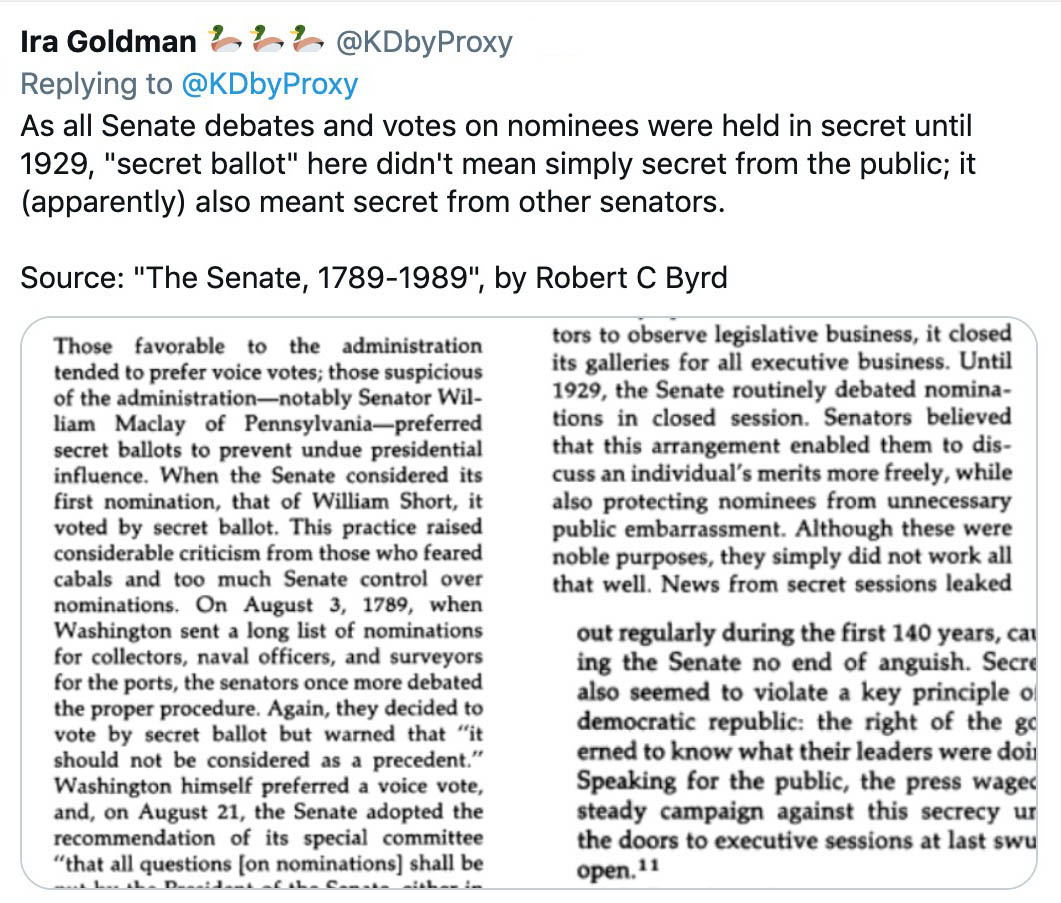
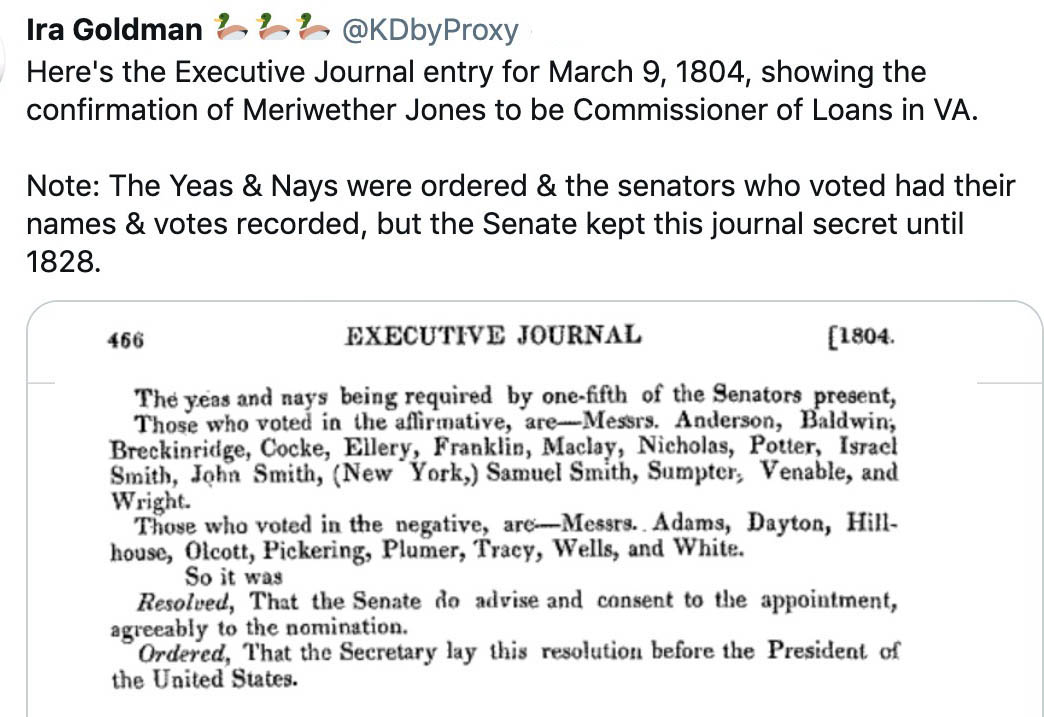
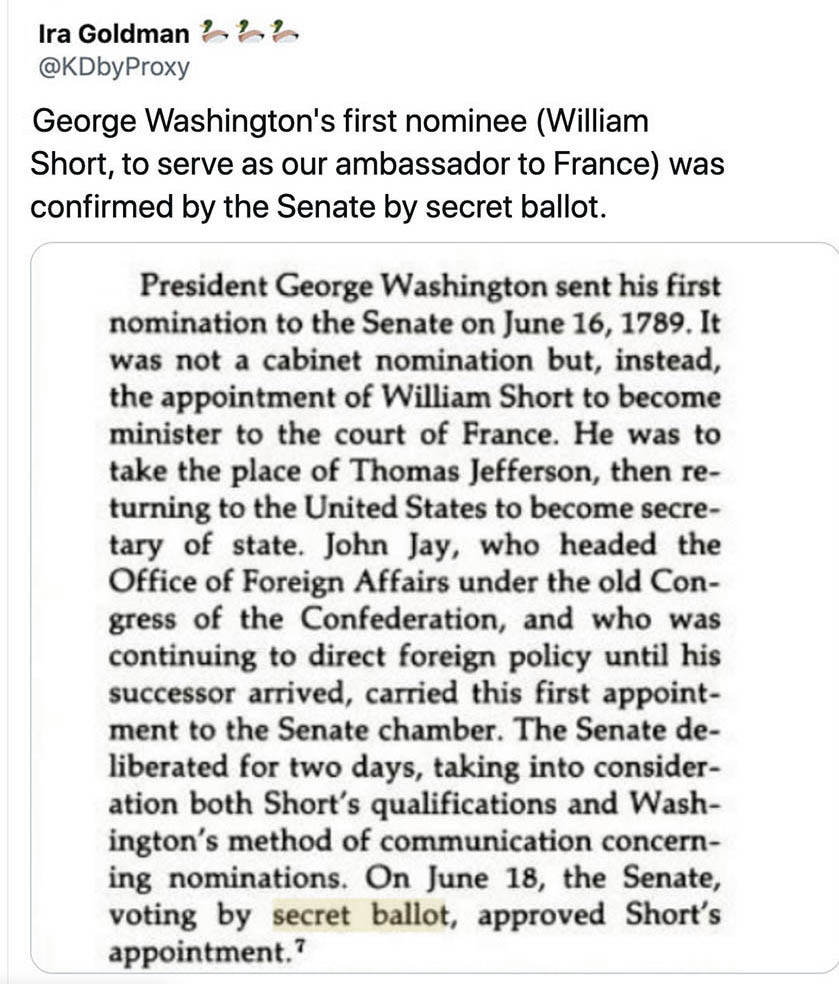
Ira Goldman 2021 - Secret Senate Votes

Ira Goldman 2021 - Secret Senate Votes
Negotiations are usually private affairs, held behind closed doors while the news media and interested observers wait outside for shards of information about prospects for a settlement. Consider how the news media cover labor talks during a strike, with cameras poised for sweaty negotiators to emerge from a hotel room after hours of give-and-take to issue some code words, which are then read like tea leaves. In contrast, much legislative negotiating is done in a bubble, with all the world able to watch. (Because few people do watch, the media stand guard and tell the public when something important happens.)
Beginning in the late 1960s, sunshine laws opened political deliberations to public view. Before 1970, most votes in Congress were not recorded, television and radio coverage of committee hearings was prohibited, and citizens were barred from learning how their representatives voted in committees. By the end of that decade, all committee hearings and votes – including conference committees between the House and Senate-were opened to the public (Rieselbach 1994).
Two arguments were used in support of opening political negotiations to public scrutiny. First, open negotiating was intended to educate citizens about the merits and demerits of public policies. Second, public negotiating was intended to ease the monitoring of legislators so that constituents would have a better sense of whether their representatives should be rewarded or punished at the next election (Bianco 1994).
Openness comes with costs, some trivial and others severe. For legislators, the trivial cost is having to endure the public grandstanding of one’s colleagues. The presence of C-SPAN cameras in a hearing or conference committee promotes puffery and posturing. This stretches out the proceedings and makes them somewhat more difficult to interpret. The more serious cost, however, may be in limiting the kinds of solutions that are possible. If politics is the art of crafting temporary coalitions of strange bedfellows, those awkward embraces may be more difficult when the public is watching. It is important to compromise, but it is also politically risky to be seen compromising.David King and Richard Zeckhauser 1998
Legislators as Negotiators
A growing number of theoretical studies suggest that secrecy in world politics provides more efficient mechanisms of political bargaining. An implication from these theoretical studies suggest that we should be observe many cases of secret diplomacy. Anecdotal evidence, highly suggestive of the utility of secrecy, is abundant and this seems to corroborate the existing theoretical propositions about secrecy. Yet, many scholars take it for granted that world politics consists of public events and that secrecy is of no important consequence or an anomaly. This is partly because none has yet successfully established systematic evidence that secrecy matters and that there exists a hidden class of phenomena in world politics. Testing a theory on secrecy diplomacy is challenging because, by definition, it is not systematically observable. The principal burden of proof for scholars of secrecy in world politics is to provide more systematic evidence—both quantitative and qualitative—that secrecy matters. Shuhei Kurizaki and Taehee Whang 2016
Inferring Secret Diplomacy
Contributions are offered and accepted, solicited and anted up, when legislation is being drafted, considered in committee, voted on on the floor, or considered for repeal.Amitai Etzioni 1998
Capital Corruption
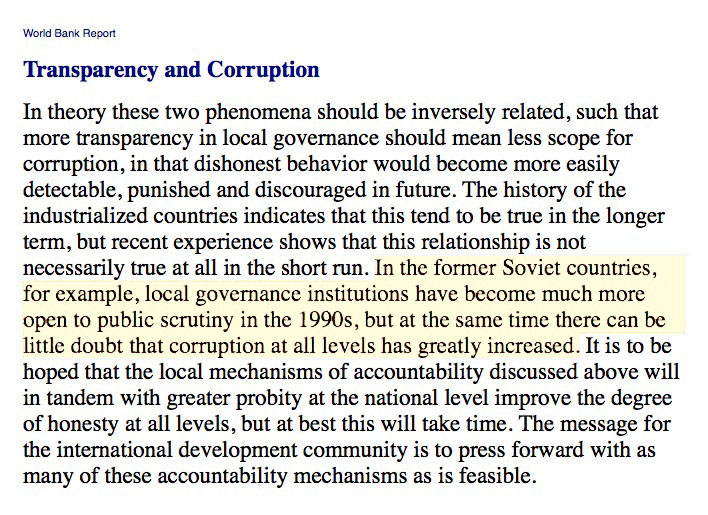
World Bank Report – Litvack 2011 / Blair 2000
Note: The last line is chilling and appears much like most of political science today. Despite clear evidence that transparency leads to greater corruption, their policy advice was to continue moving forward with greater transparency. We see this time and again. Transparency advocates stare at the horrendous data and decide either that their corruption metrics are wrong or that they somehow ran into unusual external factors.

World Bank Report – Litvack 2011 / Blair 2000
Open voting allows legislators to give third parties credible commitments to vote in particular ways in return for bribes or in response to threats.Adrian Vermeule 2004
The Constitutional Law of Congressional Procedure
We may examine reasons that might give legislators good reason to fear the consequences of the transparency of legislative voting, and that might even cause their voter-principals to agree that public voting has important costs as well as benefits. From the legislators’ point of view, a major historical concern is that the executive branch will punish them for voting contrary to executive interests; the fear of monarchical influence animated Parliament’s elaborate attempts to maintain the secrecy of its proceedings during the seventeenth and eighteenth centuries. From the social standpoint, voter-principals might well approve of the legislature’s attempts to shield itself from executive-branch coercion. If the constitutional design seeks to minimize agency costs in part by creating institutional competition between branches, then executive aggrandizement and consequent domination of the legislature enabled by legislative transparency increases those costs.Adrian Vermeule 2004
The Constitutional Law of Congressional Procedure
With secret voting, legislators cannot strike credible vote-selling bargains with the executive or interest groups, so the value of legislators’ promised votes to those groups declines.Adrian Vermeule 2004
The Constitutional Law of Congressional Procedure
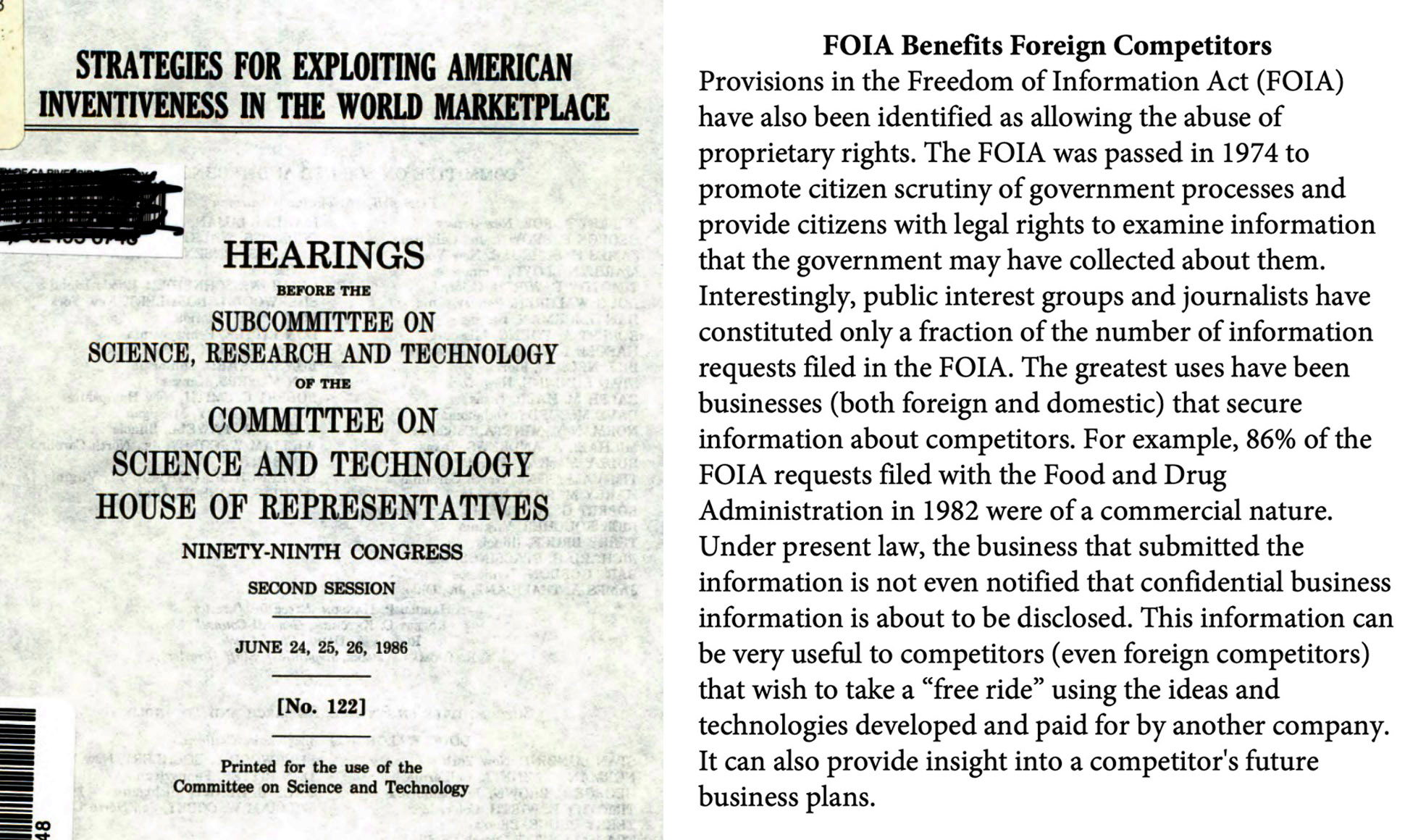
Strategies for Exploiting American Inventiveness 1986 Congressional Hearing
Provisions in the Freedom of Information Act (FOIA) have also been identified as allowing the abuse of proprietary rights. The FOIA was passed in 1974 to promote citizen scrutiny of government processes and provide citizens with legal rights to examine information that the government may have collected about them. Interestingly, public interest groups and journalists have constituted only a fraction of the number of information requests filed in the FOIA. The greatest uses have been businesses (both foreign and domestic) that secure information about competitors. For example, 86% of the FOIA requests filed with the Food and Drug Administration in 1982 were of a commercial nature. Under present law, the business that submitted the information is not even notified that confidential business information is about to be disclosed. This information can be very useful to competitors (even foreign competitors) that wish to take a “free ride” using the ideas and technologies developed and paid for by another company. It can also provide insight into a competitor's future business plans.

Strategies for Exploiting American Inventiveness 1986 Congressional Hearing
Polarization is a cost of many of these good government reforms. It is almost an intended cost if you think about it… Transparency, open meetings, bans on earmarks, and weaker party machines make compromise more difficult.Nathaniel Persily 2014
Would Stronger Parties Mean Less Polarization?
During the early years of the Republic, despite an implicit commitment to open congressional debate, the Senate remained entirely closed to all but members and clerks until December 12, 1795. Even after that, as is well known, Senators sat in closed executive meetings during large portions of every session. From the beginning, the Founders intended this small body to be the nation’s legislative conclave. Nelson Dearmont 1975
Federalist Attitudes Toward Governmental Secrecy in the Age of Jefferson
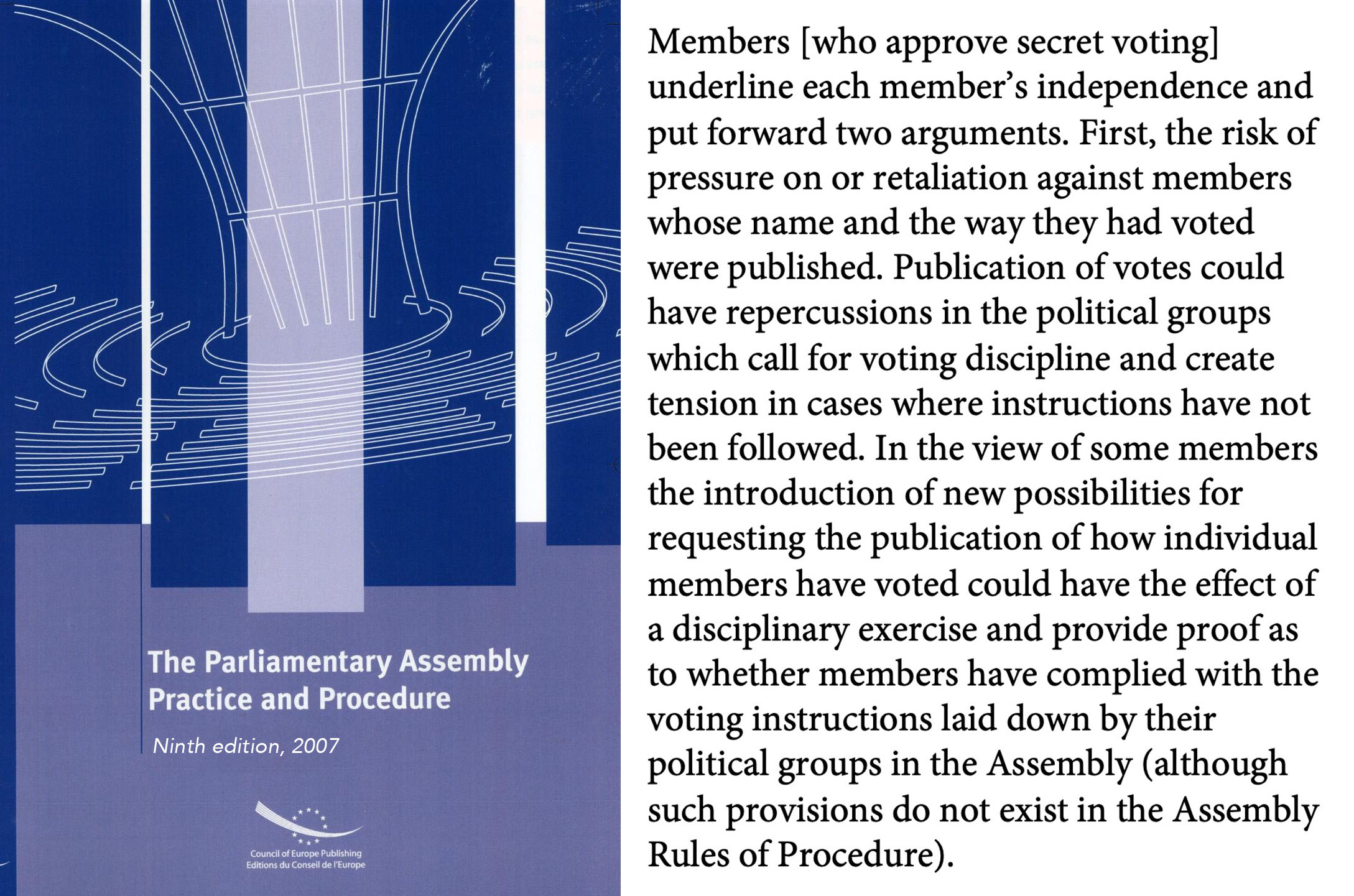
Parliamentary Assembly 2007 - European Union
Text: Members [who approve secret voting] underline each member’s independence and put forward two arguments. First, the risk of pressure on or retaliation against members whose name and the way they had voted were published. Publication of votes could have repercussions in the political groups which call for voting discipline and create tension in cases where instructions have not been followed. In the view of some members the introduction of new possibilities for requesting the publication of how individual members have voted could have the effect of a disciplinary exercise and provide proof as to whether members have complied with the voting instructions laid down by their political groups in the Assembly (although such provisions do not exist in the Assembly Rules of Procedure).

Parliamentary Assembly 2007 - European Union
Given the prevailing belief that effective foreign relations required secrecy, without recourse to secret sessions the members of the lower house would have received less information from the executive branch than they did…Their new conception tipped the balance of governmental privacy and publicity towards concealment and away from the position of candor marked off by their original principles. Nelson Dearmont 1975
Federalist Attitudes Toward Governmental Secrecy in the Age of Jefferson
[Before the passage of the 1970 Legislative Reorganization Act] If an amendment is defeated in the Committee of the Whole, it is virtually impossible to get a roll call vote on it later when the Committee rises and the House goes back into regular session, preparatory to taking final action on a bill. As a result, Representatives can vote for crippling amendments to bills which they then vote for on final passage – and their constituents are none the wiser. This secret voting has an ancient history. In Britain in the 17th century, the House of Commons evolved it as a device to shield individual members from intimidation by King James I and King Charles I. When a difficult decision had to be taken, the House simply became a committee, the Speaker was excluded as a probable royal spy, and a vote was taken with no record kept. When the House of Representatives was organized in 1789, it took over this practice.William Shannon 1970
The House Decides to Stop Being So Secretive (New York Times)
[Before the passage of the 1970 Legislative Reorganization Act] Only the House Education and Labor Committee does all its business in open session. By contrast, the Appropriations Committee, the most powerful committee, never meets except in secret. Ordinary members are in the dark as to what has been decided by one or another of the powerful Appropriations subcommittees until a money bill reaches the floor.William Shannon 1970
The House Decides to Stop Being So Secretive
Information is the currency of Capital Hill, not dollars and not friends.Schoonmaker (Lobbyist) 1993
It’s What Lobbyists Know
Government transparency is no cure-all and does not always have positive outcomes.Cucciniello, Grimmelikhuijsen, Porumbescu 2017
25 Years of Transparency Research
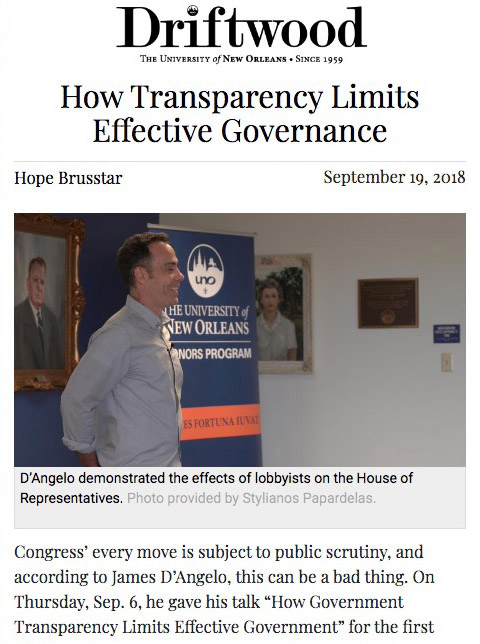
Hope Brusstar 2018 – How Transparency Limits Effective Governance

Hope Brusstar 2018 – How Transparency Limits Effective Governance
The historic debate on the advantages and disadvantages of electronic voting in many ways hinged on transparency. Throughout the early debate in the 1914 and 1916 Congresses, members were concerned about the transparency of their votes and the consequences of public and lobbyist access to voting information prior to publication in the Congressional Record. Members were also concerned about lobbying by other members during votes, whether votes could be changed once they were cast but before voting time expired, and if changes would be published in the record… (Now) party leadership (uses) voting as a tactic to require other members to state a position on the record.Jacob Straus 2012
The Rise of Roll Call Votes
Secrecy can also be useful to the proper working of checks and balances. Because of fear of reprisal, legislators might be willing to rein in the executive only in ac system in which voting was secret.Daniel Epps 2008
Mechanisms of Secrecy (Harvard Law Review)
Le secret est l’arme de la négociation.François de Callières 1716
Fin du secret diplomatique?Note: We found this quote in an excellent article by P. Sharp "Secret Diplomacy of Late Moderns" the following is from his piece "The classic texts are liberally sprinkled with expressions to the effect that secrecy is indispensable to the conduct of diplomatic relations. Callieres begins his discussion of communications between the ambassador and his sovereign with the following, ‘Secrecy, being the very life of negotiations’, or in some translations, ‘Secrecy is the very soul of diplomacy’ (Callieres 1983 [1715): 164; Freeman 1997: 264)."
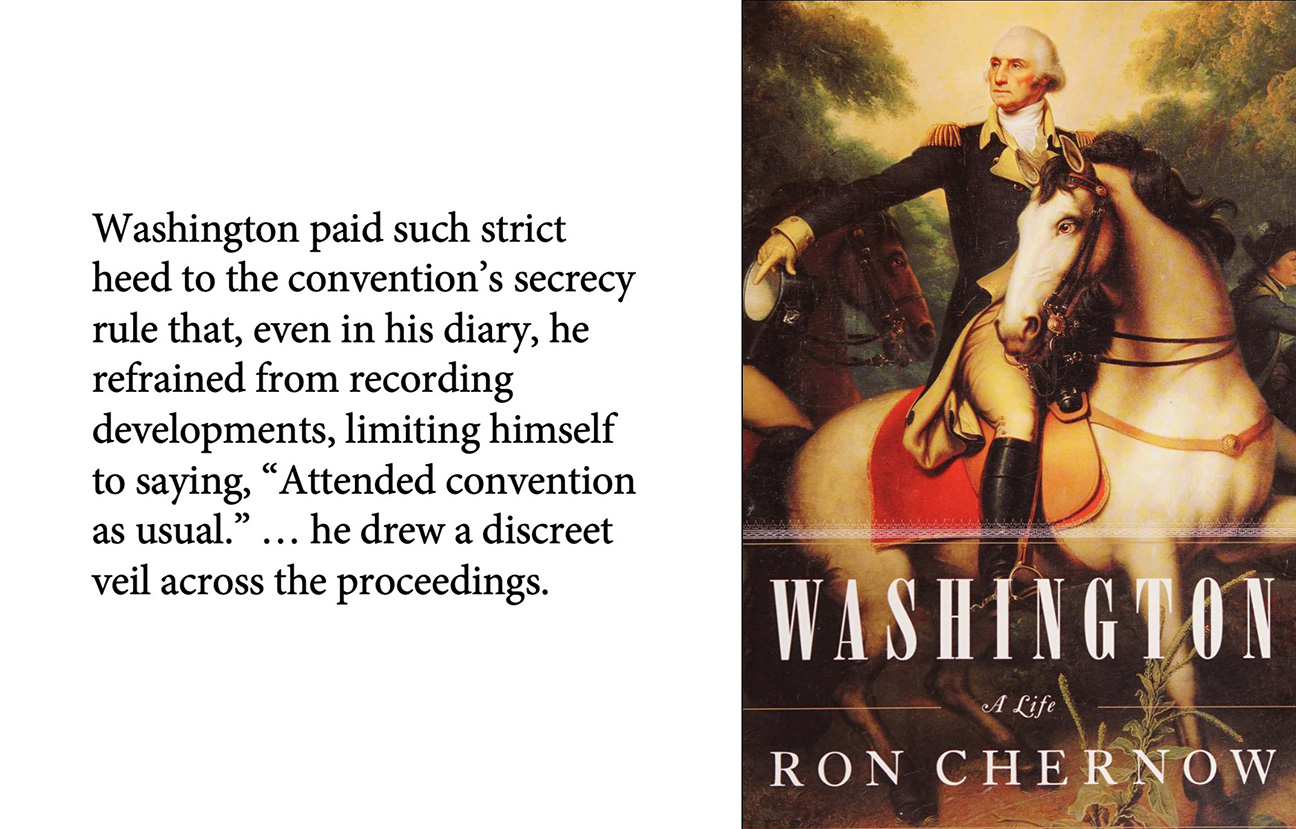
Ron Chernow 2010 - George Washington - A Life
Text: Washington paid such strict heed to the convention’s secrecy rule that, even in his diary, he refrained from recording developments, limiting himself to saying, “Attended convention as usual.” … he drew a discreet veil across the proceedings.

Ron Chernow 2010 - George Washington - A Life
Secrecy tends to induce bargaining and publicity to induce arguing, secrecy also improves the quality of whatever arguing that does take place behind closed doors.Jon Elster 2008
Optimal Design of Constituent Assemblies
If the debates are public, perhaps because the need for diversity requires a large assembly that will not be able to maintain secrecy, one might in fact impose secret voting both to eliminate interest-based logrolling and to make the delegates unafraid of voting the wrong way on popular proposals. -- To exclude audience pressure that might bring delegates under the sway of emotion (vanity or fear), the assembly should debate in secret or, alternatively, vote in secret.Jon Elster 2008
Optimal Design of Constituent Assemblies
Roll-call votes provide an obvious means by which party leaders can monitor compliance with their voting instructions… Legislative parties may use roll-call votes specifically to discipline their members. Roll-call votes allow legislative party leaders to monitor their members’ behavior, which is essential for accurately doling out reward or punishment.Carrubba, Gabel & Hug 2008
Legislative Voting Behavior
The public has no common law right to attend meetings of governmental bodies. For most of its long and rich history, England's Houses of Parliament conducted debate in secret. Similarly, much of the early colonial discourse in America took place behind closed doors, including the Continental Congress and the Constitutional Convention. In this vein, the Supreme Court of the United States has never held that the Constitution guarantees the public's right to attend meetings of governmental bodies.Brian J. Caveney 1999
More Sunshine in the Mountain State
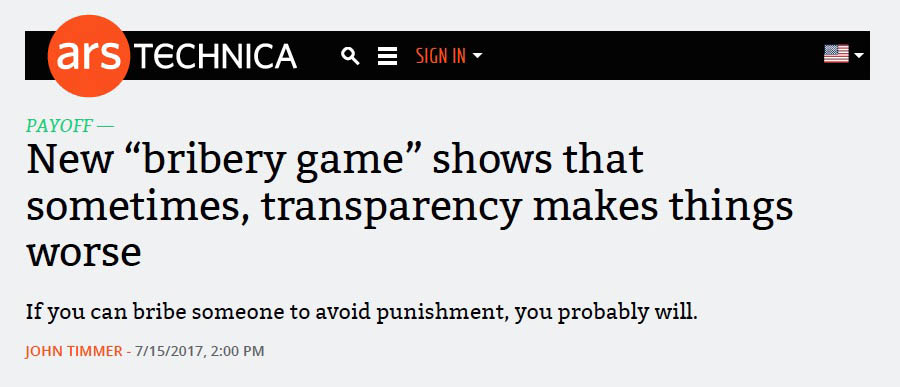
John Timmer 2017 – Ars Technica (New Bribery Game)

John Timmer 2017 – Ars Technica (New Bribery Game)
We investigate…anti-corruption strategies (transparency and leader investment in the public good) and cultural background…These results suggest that a more nuanced approach to corruption is needed and that proposed panaceas, such as transparency, may actually be harmful in some contexts. Muthukrishna & Francois 2017 – Nature Magazine
How Anti-Corruption Strategies May Backfire
Some reforms of the post-Watergate age that were designed not to redistribute power but simply to bring into the open the processes of government have had unintended and unexpected effects in making it harder for followers to follow and leaders to lead. Recording of previously unrecorded teller voters in the House now makes it possible for everyone back home to find out how a member voted; to the new ideal of openness is sacrificed the honored tradition of logrolling, the secret pledging and delivery of votes that may not be in the interest of one’s constituency to serve the cause of party solidarity. Opening of committee meetings, including House-Senate conferences, to public view has had the same effect James Sundquist 1981
The Decline and Resurgence of CongressNote: Earlier in the book Sundquist covers these reforms but then in a footnote makes the surprising claim that he doesn’t focus on these reforms because he doesn’t feel like they are important enough. His writing on this follows: "Still other reforms were aimed primarily at improving the reputation of the Congress, by opening up hitherto hidden processes to public scrutiny. Subcommittee and committee “mark-up” sessions—where compromises are struck and bills rewritten—were brought into the full view of lobbyists and journalists. So, even, were conference committee meetings. Previously un-recorded teller votes in the Houses were placed on record, as that body introduced electronic voting. The House even introduced televised recording of its proceedings. Both House and Senate introduced new, tight rules limiting what members could earn outside the Congress and requiring disclosure of income and investments... Reforms relating to openness of processes, ethical conduct, and introduction of technology are not discussed further, because while they affect the moral tone and public reputation of the Congress, they do not bear significantly on its capacity to do its work or on the balance of power between the branches."
No Constitution would ever have been adopted by the convention if the debates had been public.James Madison 1830
The Public Intellectual (full quote below)
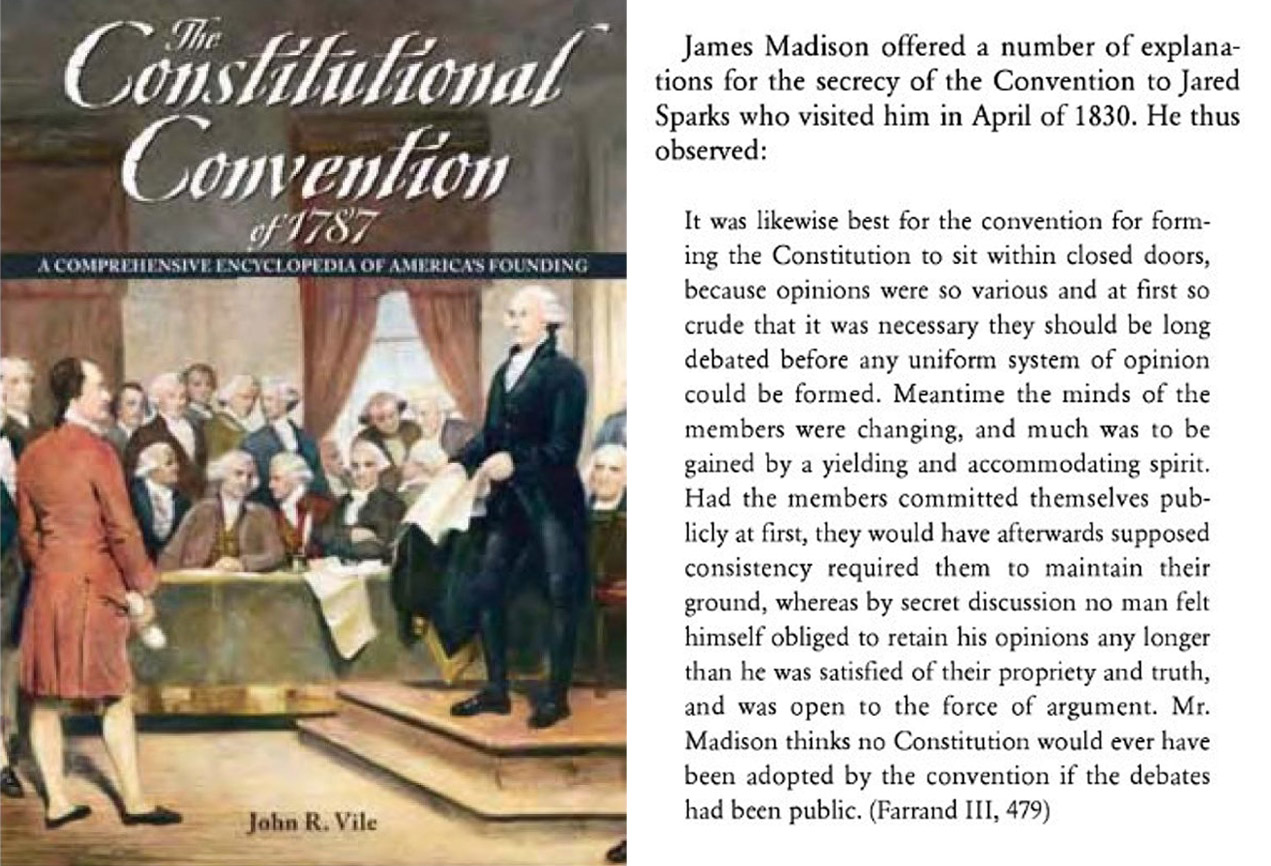
James Madison 1830

James Madison 1830
It was… best for the convention for forming the Constitution to sit with closed doors, because opinions were so various and at first so crude that it was necessary they should be long debated before any uniform system of opinion could be formed. Meantime the minds of the members were changing, and much was to be gained by a yielding and accommodating spirit. Had the members committed themselves publicly at first, they would have afterwards supposed consistency required them to maintain their ground, whereas by secret discussion no man felt himself obliged to retain his opinions any longer than he was satisfied of their propriety and truth, and was open to the force of argument.James Madison 1830
Forcing the publication of votes in an institutional setting that relies on diplomatic practices can have deleterious effects on accountability: In some cases, the publication of votes might operate as a window-dressing device, prompting the public belief that ministers are accountable since they publish their votes, while real monitoring of the decision makers’ stances is not possible.Stephanie Novak 2015
Secrecy and Publicity
On any morning of any legislative day in the 1960's, as many as twenty House committees and subcommittees could be found hard at work conducting public hearings or secret sessions on as many varied subjects of contemporary life, from farm fertilizers and public housing to Army modernization and Latin American policy.Neil MacNeil 1963
Forge of Democracy
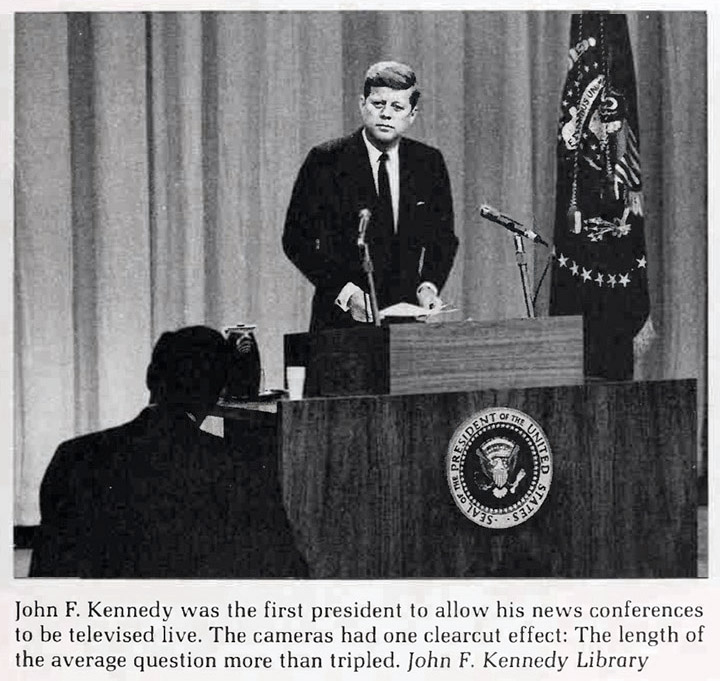
Stephen Bates 1991 - John F Kennedy Televises News Conferences

Stephen Bates 1991 - John F Kennedy Televises News Conferences
[With respect to the Senate and confirmation of judicial nominees Majority Leader remarked] We have a lot of votes to get through today. Most of these votes in old days would have just occurred by voice. But our colleagues on the other side of the aisle, just a handful [of the minority], are making us vote, even for D.C. judges, circuit judges. But we have to get through them. The D.C. Courts have come to a standstill. And many other votes. So we'll have a lot of votes to get through today.Chuck Schumer 2022
The length of votes in the Senate has gotten unwieldy by all accounts
How does a no-confidence vote work? Under Conservative Party rules MPs can write to Graham Brady, the chair of the 1922 Committee, requesting a confidence vote in the party leader. Only Brady knows for certain how many letters there are. The epistolary assassins are guaranteed anonymity – unless they choose to make their intentions public. Once a confidence vote is triggered, a secret ballot of all Conservative MPs is held, normally over a single day. If the party leader wins the vote (by securing more than 50 per cent) they remain in office and are rewarded with a year’s immunity. If they lose, they are forced to resign and are barred from standing in the leadership election that follows.George Eaton 2019
How Does a No-Confidence Vote Actually Work
The so-called “sunshine laws” passed during the 1970s and other efforts to “open up the process” also had the unintended effect of spurring growth in the lobbying world.Gary Andres & Paul Hernnson 2009
Lobbying Reconsidered
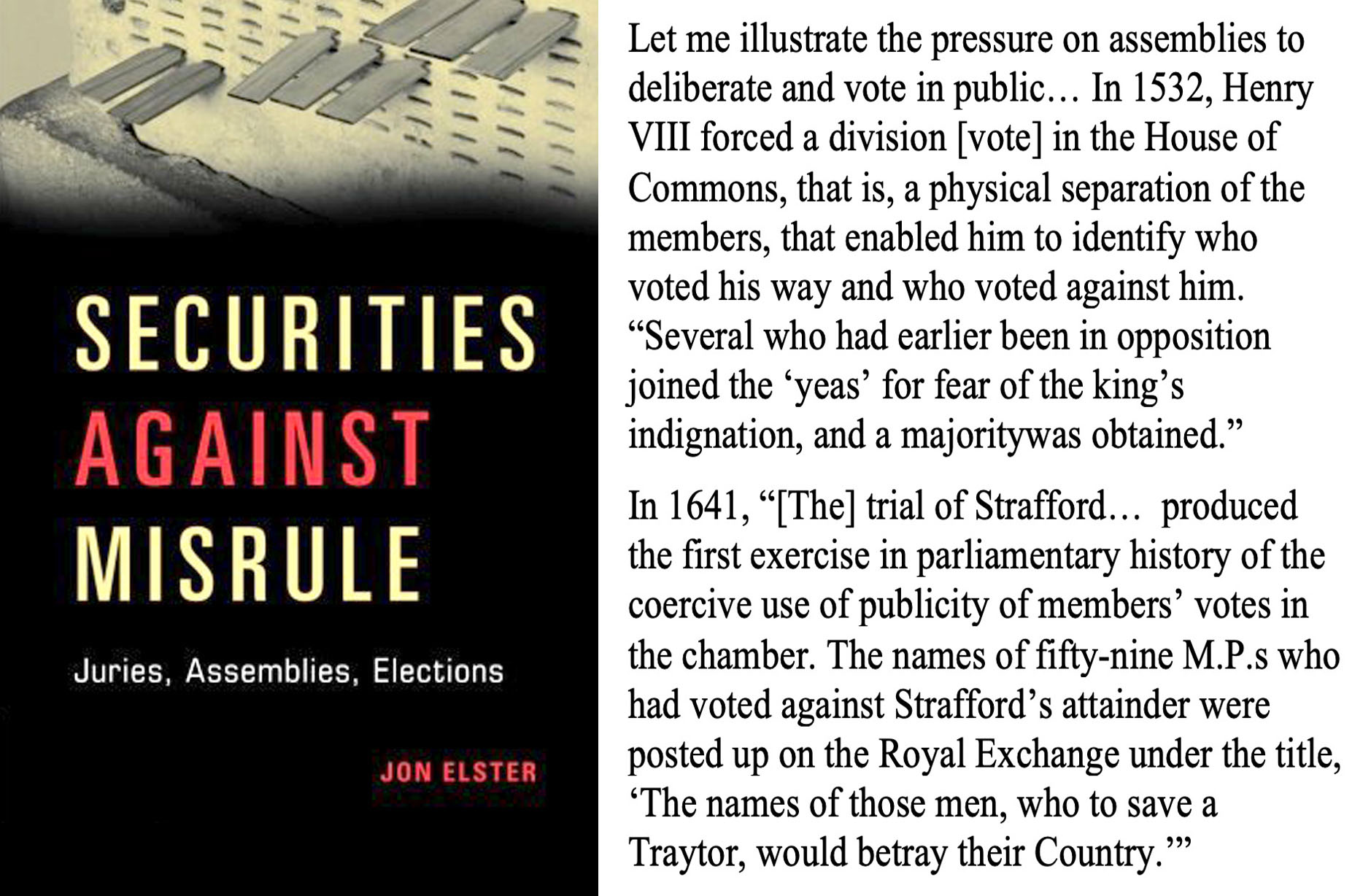
Jon Elster 2013 - Securities Against Misrule
Text: Let me illustrate the pressure on assemblies to deliberate and vote in public… In 1532, Henry VIII forced a division [vote] in the House of Commons, that is, a physical separation of the members, that enabled him to identify who voted his way and who voted against him. “Several who had earlier been in opposition joined the ‘yeas’ for fear of the king’s indignation, and a majority was obtained.” In 1641, “[The] trial of Strafford… produced the first exercise in parliamentary history of the coercive use of publicity of members’ votes in the chamber. The names of fifty-nine M.P.s who had voted against Strafford’s attainder were posted up on the Royal Exchange under the title, ‘The names of those men, who to save a Traytor, would betray their Country.’”

Jon Elster 2013 - Securities Against Misrule
The most insidious part of open meetings is the behavior of lobbyists, and seeing them passing notes to members in conferences.Rep. Wayne Hays 1975
CQ Quarterly - Open Committees
In addition to the democratic goods of the right to know and accountability, transparency in process has recently been advanced as a means to shore up citizen trust in government. Yet transparency may not have this effect. Several studies find no effects of transparency on trust and procedure acceptance. In one recent study, transparency in process did not produce increments of legitimacy significantly greater than transparency in rationale. The authors conclude that “a relatively modest reform focusing on transparency in rationale – such as a reason-giving requirement – may contribute to similar degrees of added legitimacy as more far-reaching transparency in process measures. Decision makers may improve the legitimacy of the procedure by simply outlining carefully afterward the reasons for the decisions taken behind closed doors.”Mark Warren & Jane Mansbridge 2013 (citing De Fine Licht)
Political Negotiation
Not all observers of legislative representation are sanguine about full transparency. Edmund Burke (1774) famously reproached the idea that his constituents’ interests, properly conceived, were best served by closely monitoring his behavior in parliament and demanding responsiveness. Schumpeter (1942) advanced a similar point of view nearly two centuries later. Some contemporary empirical accounts make the case that closed-door decision-making produces better policy by freeing legislators from pressures to pursue parochial interests (Birnbaum and Murray 1988). John M. Carey 2013
Transparency and Legislative Behavior
On those issues where the public’s beliefs are systematically biased, making the policy process more transparent has drawbacks, as those politicians who would chose the policy that maximizes the public’s welfare behind closed doors have electoral incentives to cater to the public’s mis-perceptions when policy is made in the open. Justin Fox 2006
Government Transparency and PolicymakingNote: This citation sums up the issues we have with criminal reform and the massive rise in incarceration since the sunshine reforms.
When Congress attempted to create a more open, decentralized, transparent, and accountable process, it had the unintended effect of stimulating the growth of lobbying.Gary Andres & Paul Hernnson 2009
Lobbying Reconsidered
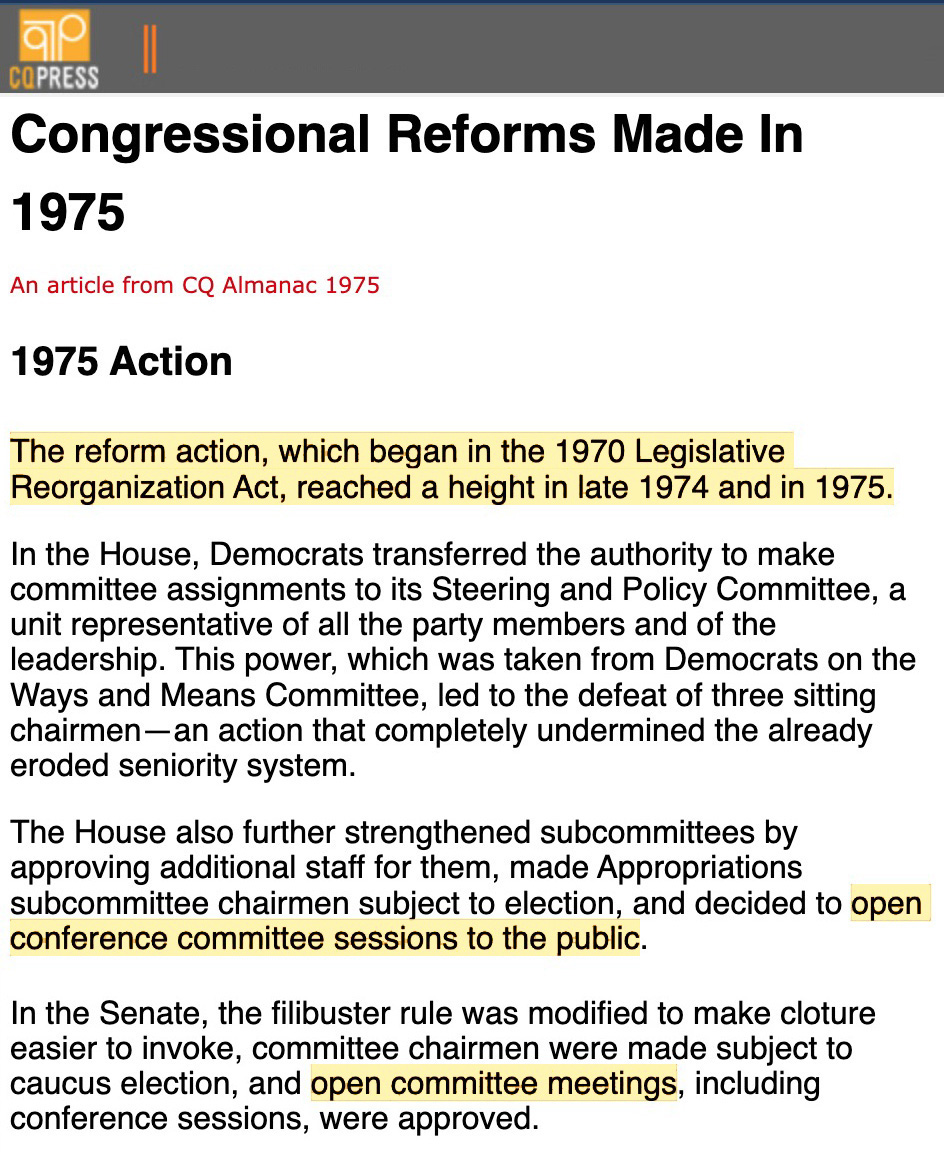
CQ Press 1975 - Congressional Reforms Made In 1975

CQ Press 1975 - Congressional Reforms Made In 1975
Good government reformers have made a decades-long push to make the activities of members more transparent to the public so that members can be held accountable for their decisions. Some political scientists say these efforts have been too successful, and that the deal-making needed for orderly government is now too difficult because members are criticized the moment they stray from an established public position (Binder and Lee 2013). One option would be to return to an earlier system in which total vote tallies – rather than the votes of individual members – are reported for appropriations bills. Members might be more willing to cast tough votes, and there would be a reduced incentive for “gotcha” amendments aimed only at causing members political harm. The path of appropriations bills through the floor would likely be smoother.Peter C. Hanson 2015
Restoring regular order in congressional appropriations
Increased transparency may actually make people less trusting than under conditions of less or no transparency. Full public insight into the decision-making process involves potential efficiency costs such as decision makers becoming less willing to agree on compromises, and it increases the risk that people become disappointed regarding the conditions under which decision making takes place.Jenny de Fine Licht 2014
Magic Wand or Pandora’s Box? Transparency affects public perception
Congress should change its internal rules so that all votes on amendments and procedure are done by secret ballot, and all votes on passing laws are public and recorded. This would make our lawmakers less accountable to special interests, who would be unable to verify the effectiveness of their large campaign contributions. It would also make our lawmakers more accountable to us. Because anonymous voting on amendments would make political deal making more difficult, bills would have fewer unrelated amendments. This would allow us to see more clearly what our representatives actually support. It may seem counterintuitive that we can increase accountability by instituting a secret ballot, but it would be difficult to argue that the current system is giving us effective accountability. Only the special interests have the resources and focus to track the process of legislative drafting. What we, the citizens, really need to track are the results. We need to hold our politicians accountable for the laws that get enacted, not for the drafting process. Our democracy already gives individual voters the right to a secret ballot. We do this so that we are free to vote our convictions, protected from the fear of retribution and from the possibility of our votes being bought.Danny Hillis 2011
A Proposal for Meaningful Change in Washington
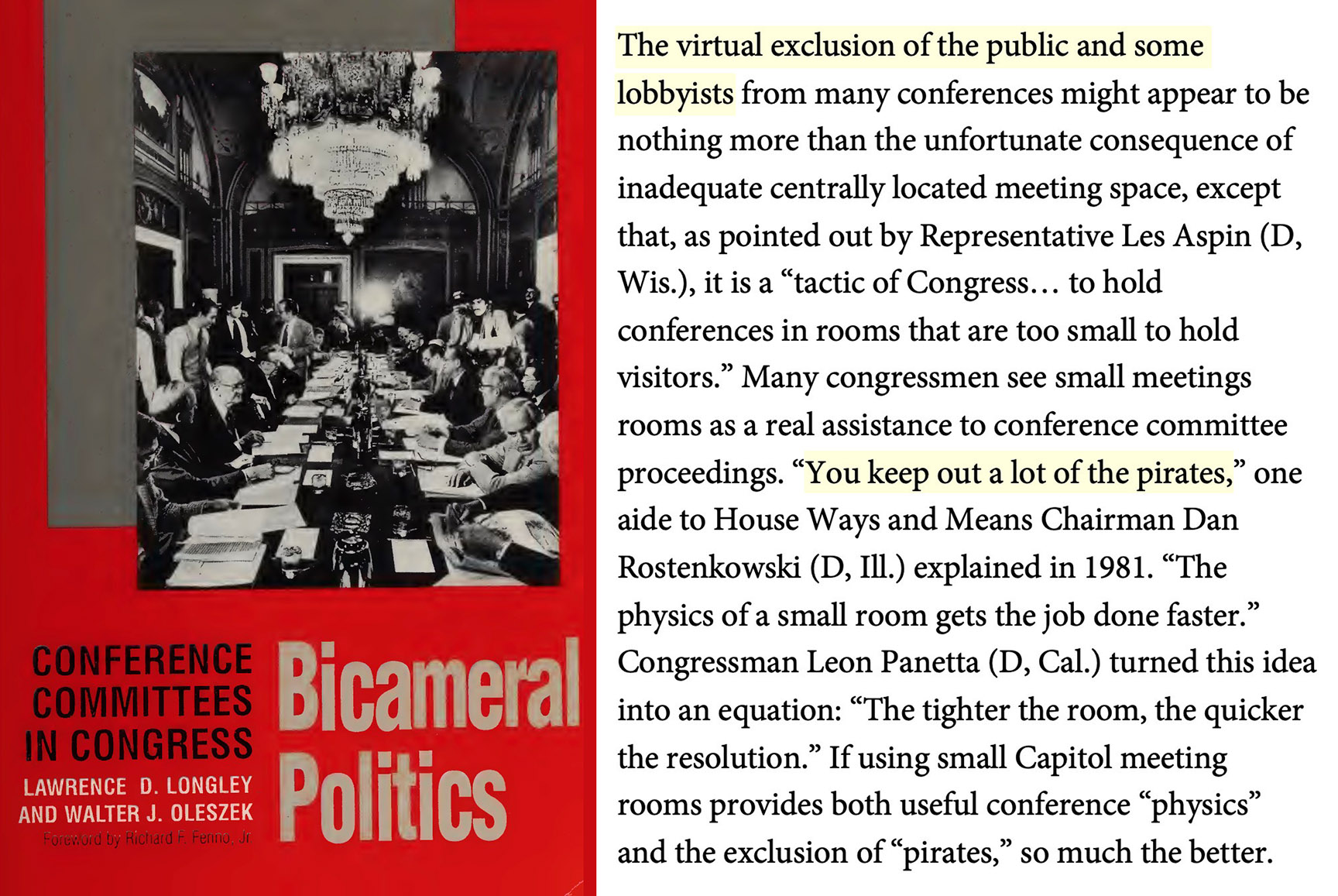
Longley & Oleszek 1989 - Bicameral Politics - Conference Committee Pirates
Text: The virtual exclusion of the public and some lobbyists from many conferences might appear to be nothing more than the unfortunate consequence of inadequate centrally located meeting space, except that, as pointed out by Representative Les Aspin (D, Wis.), it is a “tactic of Congress… to hold conferences in rooms that are too small to hold visitors.” Many congressmen see small meetings rooms as a real assistance to conference committee proceedings. “You keep out a lot of the pirates,” one aide to House Ways and Means Chairman Dan Rostenkowski (D, Ill.) explained in 1981. “The physics of a small room gets the job done faster.” Congressman Leon Panetta (D, Cal.) turned this idea into an equation: “The tighter the room, the quicker the resolution.” If using small Capitol meeting rooms provides both useful conference “physics” and the exclusion of “pirates,” so much the better.

Longley & Oleszek 1989 - Bicameral Politics - Conference Committee Pirates
Third [organized interests, special interests and lobbyists] are better able to engage in surveillance of officeholders in order to encourage them to act in their favor. One of the most important things in democracy is information right. And one of the things you do when you organize is you can have people watching what officeholders are doing. Most people don’t have the time, they don’t have the resources to engage in surveillance so officeholders have a relatively free hand. But those who are organized are able to make sure that office holders know they’re watching, and therefore they’re much more likely to get their way.Steven Teles 2018
The Captured Economy
There’s a reason that judges deliberate privately; there's a reason that some meetings are in camera… It is an unusual methodology, but I don't feel like there's this cloak of mystery. By operating in secret, the supercommittee members don't have to constantly justify their positions to outside interests.Rep Trey Gowdy (R-SC) 2011
Silence Of Super(secret)committee May Be Progress
Too much transparency might produce gridlock instead of policy success.Walter Oleszek 2011
Lawmaking
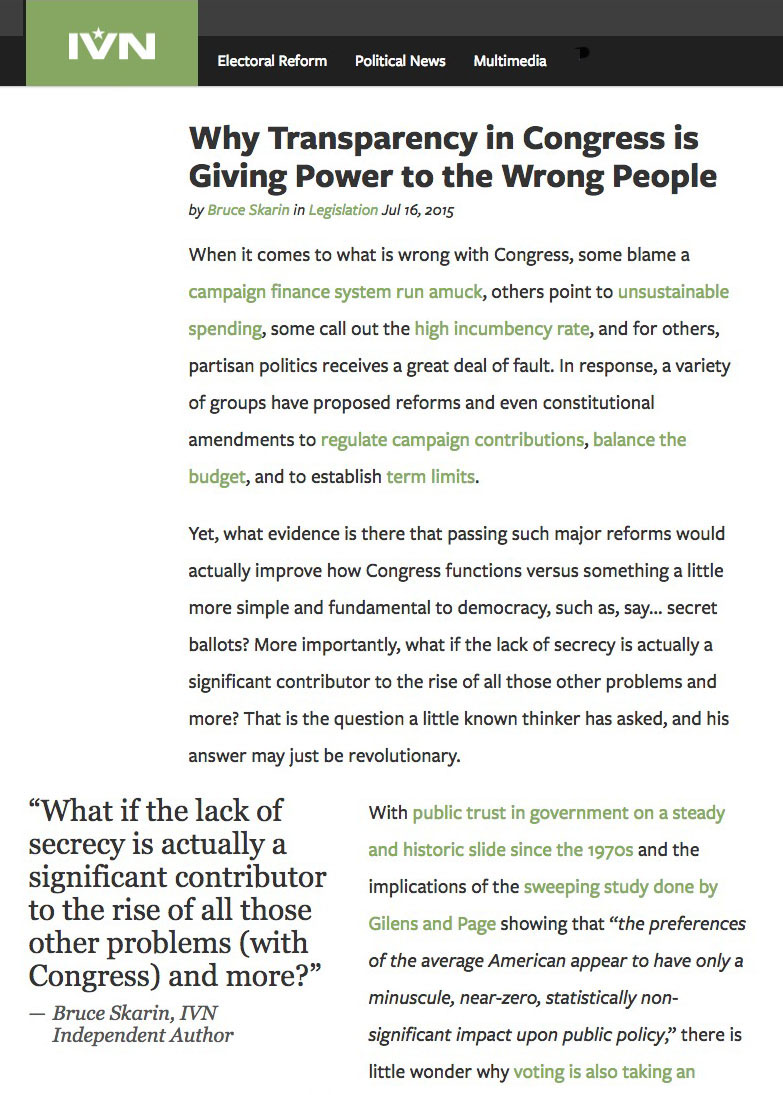
Bruce Skarin 2014 – Why Transparency Gives Power To Wrong People

Bruce Skarin 2014 – Why Transparency Gives Power To Wrong People
The duty to deliberate well may often be inconsistent with attempts to conduct policy deliberations on the plane of public opinion.Joseph Bessette 1994
Mild Voice of Reason
The question arises (whether)… transparency is either conducive to more corruption or, at least, to corruption taking forms that are more detrimental to efficiency or equity.Albert Breton 2007
The Economics of Transparency in Politics
Could one argue in some settings, the requirement of more transparency would lead to greater efforts devoted to obfuscation, and eventually to the generation of more waste?Albert Breton 2007
The Economics of Transparency in Politics
The other assumption (that additional transparency, providing additional information, is always a good) is also far from being always true. Let us use the distinction just made. When people disregard the collective dimension of transparency, the information they get from increased transparency is similar to information they would receive privately. One is inclined to think that this type of information always yields positive utility. But this may not be so. Even in that case as we will see, there are situations in which individuals derive zero or even negative utility from more information.Pierre Salmon and Alain Wolfelsperger 2007
The Economics of Transparency in Politics
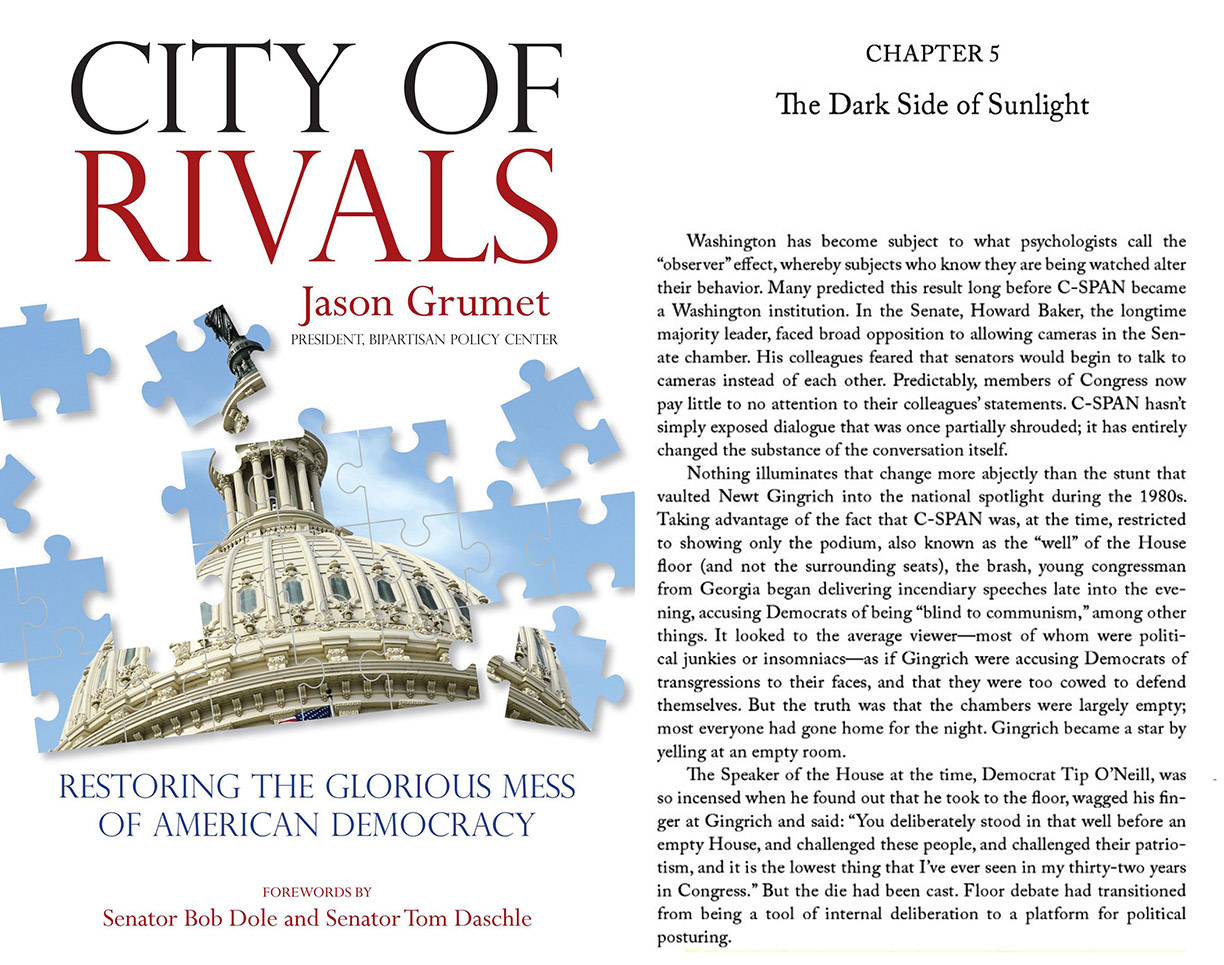
Jason Grumet 2014 – The Dark Side of Sunlight (pdf)

Jason Grumet 2014 – The Dark Side of Sunlight (pdf)
Take for instance, the so-called “sunshine” laws which are being passed at every level of government, and against which no public figure seems bold enough to protest. They require that practically all meetings of all official bodies be open to public view. This sounds good, but in actuality it is utterly absurd. It’s no way to run anything, whether it be a school board, a university department, a trade union or a government agency. It penalizes candor and compromise and rewards aggressive “grandstanding.” Does anyone really believe that the Ford Motor Company and the United Automobile Worker could have reached an agreement if their negotiations were transmitted live on television? Or even if minutes of the meetings were kept? Similarly, the only reason Congress can function is because the committee system provides private (i.e., “secret”) occasions for negotiation that are distinct from the public forum where opinions are sharply expressed and debated.
It is easy to predict that these “sunshine” laws will be regularly evaded, even by the legislative bodies that enacted them. But they will be a perpetual nuisance, will provide opportunities for mischievous intervention by various publicity-hunting busybodies and, above all, will have exactly the opposite effect from that intended; instead of increasing public respect for the laws or the land, they will simply provide another instance of frequent nonobservance of these laws by public officials at all levels.Irving Kristol 1976
Post-Watergate Morality
After 1971 it became relatively easy to demand a recorded vote on amendments… Such rules changes have complicated the lives of members and reinforced some of the more troubling aspects of the permanent campaign… Opposition researchers pore over members’ voting records in an attempt to find a vote contrary to – or a vote that can be (mis)construed as contrary to – the preferences of their constituents. Every vote a member casts must be considered a potential campaign issue. Indeed, some bills and amendments are offered only as a vehicle for forcing a vote that will provide a campaign issue.Norman Ornstein & Thomas Mann 2000
Permanent Campaign
If tax information was controlled within Congress, it was substantially lacking outside. Because Ways and Means and Finance marked up tax legislation in executive session (secret sessions), only interests with access to the right congressmen were in a position to influence the process. Often, the legislative aides of committee members were not permitted in the meeting room, though Treasury officials sat at the staff table alongside the specialists from the joint committee and participated in the markup. Outsiders did not have timely reports of committee deliberations, nor could they rely on tax groups (comparable to the numerous associations active on the state and local levels) to represent their interests. Of course, many interest groups monitored congressional tax activity and lobbied in behalf of legislation favorable to their constituents, but virtually all confined their interests to the particular matters in which they specialized – agriculture, business, labor, and so on, across the whole spectrum of American politics. By selectively responding to these special interests, Congress could deflate pressure for a comprehensive review of the tax laws. Allen Schick 1981 (edited Norm Ornstein & Thomas Mann)
The New Congress
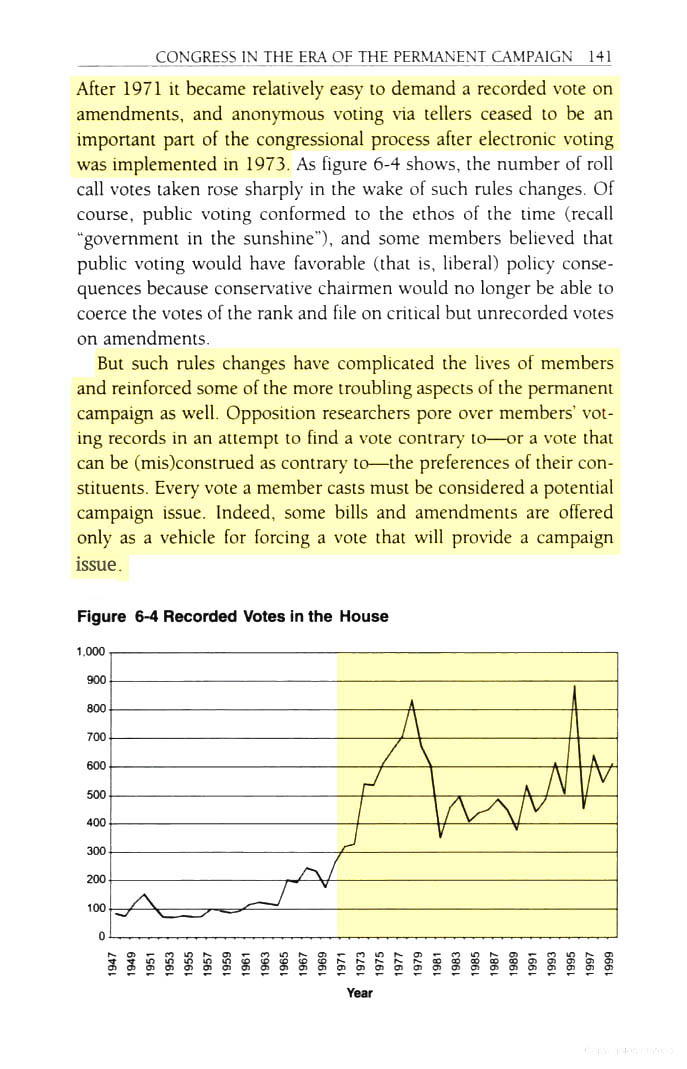
Norman Ornstein & Thomas Mann 2000 - The Permanent Campaign

Norman Ornstein & Thomas Mann 2000 - The Permanent Campaign
It would be too difficult to put together a fiscally responsible bill if special interests could record how every member voted on every amendment. The temptation to vote yes on everything would be too great.Rep. Hatcher 1991
CQ Quarterly - Behind Closed Doors
You said that what people want is to be included… And I’m fascinated by the drop in confidence across institutions. And one thing I see when I look at that polling is that the more open the institution has become, the more people actually are included in the institutions workings – things like Congress, the Presidency, increasingly all facets of American life have become more transparent – the more [the public’s confidence has] dropped. And then the more cloistered [the institution] is – the Supreme Court, the Army – the more it sort of works on the side, on its own, the more it has sustained trust. There seems to me to be a tension in American life right now, where we often want the institutions that govern us, that help shape the world we’re a part of, to be more open to us. But when we get more into them, we don’t like it as much.Ezra Klein 1997
Is Mitch Landrieu the “White, Southern Anti-Trump”?
Suffice it to say that there appears to be a fairly widespread consensus that the Sunshine Act is not achieving its principal – and obviously salutary – goal of enhancing public knowledge and understanding of agency decision-making. Instead, there is a considerable body of evidence in the academic literature, confirmed by the testimony of several agency officials, that the Act’s “open meeting” requirement curtails meaningful collective deliberation and substantive exchange of ideas among agency members. Rather than actual collective deliberation in public, agency members often use the open meeting merely to announce and explain their positions.Randolph May 1997
Reforming the Sunshine Act
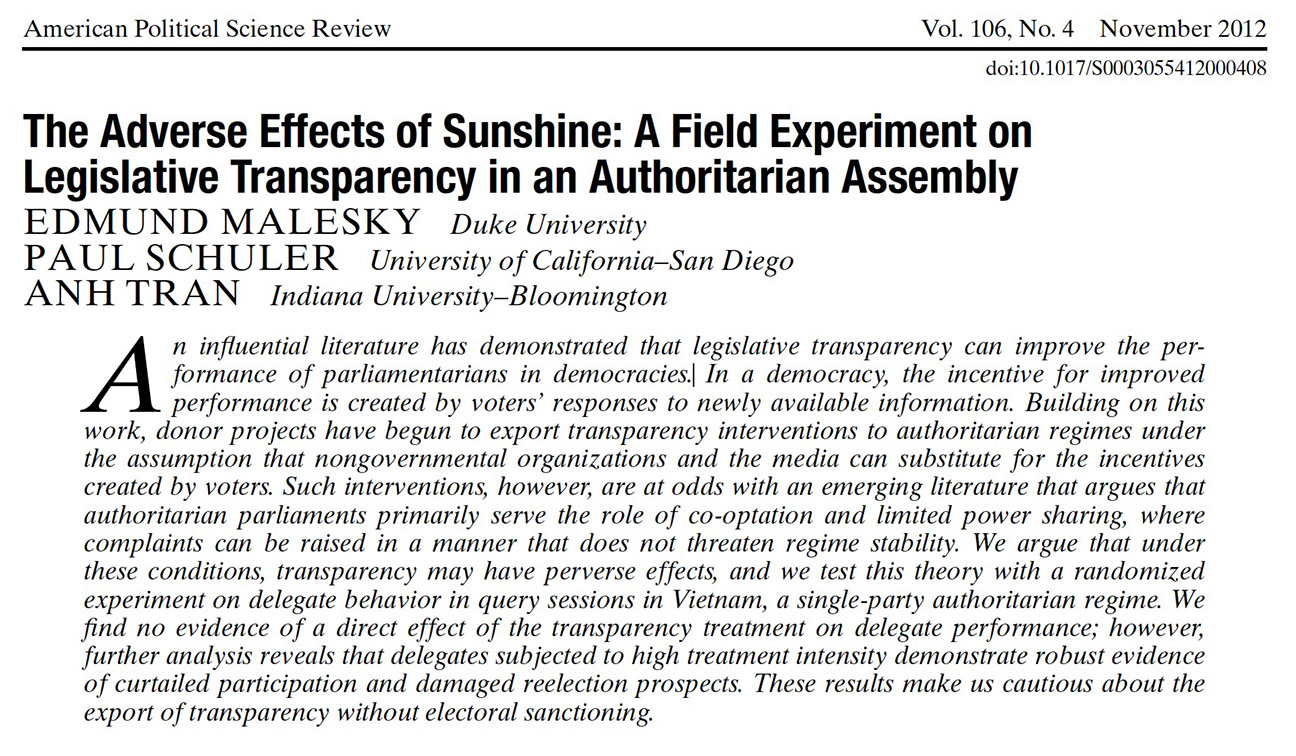
Malesky, Schuler, Tran - Adverse Effects of Sunshine

Malesky, Schuler, Tran - Adverse Effects of Sunshine
Our results demonstrate that transparency interventions in nondemocratic systems can have adverse consequences for how delegates represent their constituencies.Edmund Malesky, Paul Schuler and Anh Tran 2012
The Adverse Effects of Sunshine: A Field Experiment
This adverse consequences hypothesis, developed by Prat (2005), delineates the conditions under which transparency may lead less legislative responsiveness and worse policy outcomes for voters. Edmund Malesky, Paul Schuler and Anh Tran 2012
The Adverse Effects of Sunshine: A Field Experiment
Americans can make little progress in resolving such debates until they can get beyond the cynical, partisan use of slogans like “the public’s right to know” and “full transparency” by President Trump’s loyalists. Now more than ever, Americans must understand how and when transparency contributes to the strength and vitality of our democratic institutions and how and when the invocation of the public’s right to know is being used to erode them.Austin Sarat 2018
Is full transparency good for democracy?
In response to challenges to FOIA’s exceptions, courts have found that there is no constitutional or common law basis for a general public right to know.Austin Sarat 2018
Is full transparency good for democracy?
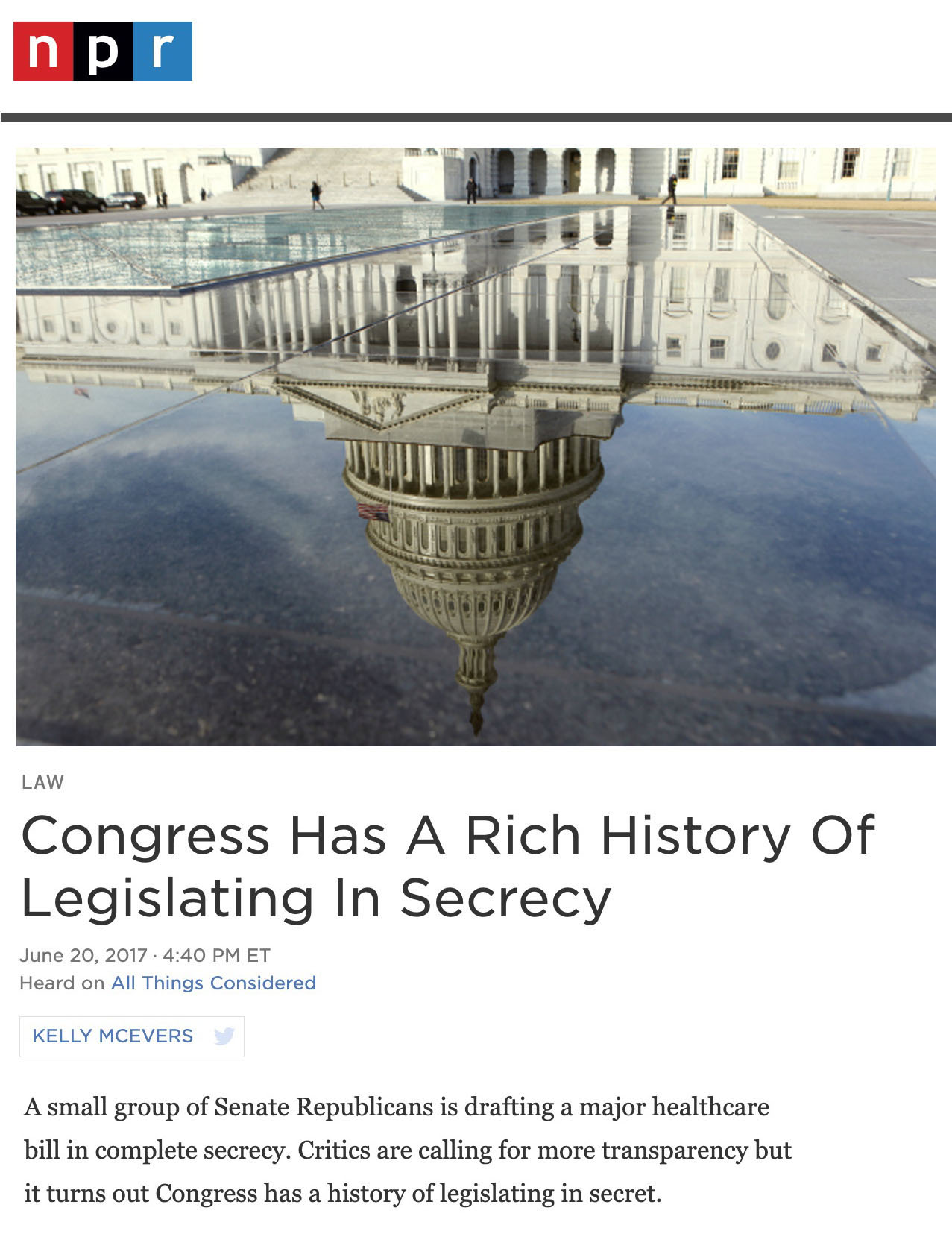
Kelly Mcevers 2017 - Congress Has A Rich History Of Legislating In Secrecy

Kelly Mcevers 2017 - Congress Has A Rich History Of Legislating In Secrecy
Bentham did not think the public had an unqualified “right to know.” As he put it, “It is not proper to make the law of publicity absolute.” Bentham acknowledged that publicity “ought to be suspended” when informing the public would “favor the projects of an enemy.”Austin Sarat 2018
Is full transparency good for democracy?
Nelson and Silberberg find a deference to special interests in open voting on defense bills, in which congressional voting patterns vary with the degree of anticipated scrutiny. They find evidence consistent with legislators being more likely to vote their personal ideologies on general defense bills than on narrowly focused bills dealing with particular weapons because in the latter case, there are identifiable beneficiaries who will monitor a Senator’s votes.Douglas Nelson & Eugene Silberberg 1987
Ideology and Legislator Shirking
New empirical political science research on deliberation suggests that, under certain circumstances, “it is better for public deliberation to go behind closed doors and so insulate deliberators from the harmful effects of the glare of publicity” (Simone Chambers, 2005: 255)Ethan S. Bernstein 2017
Making Transparency Transparent
A secret, nonbinding, straw poll can rescue our hyperpolarized politics.Sanho Tree 2015
Institute for Policy Studies
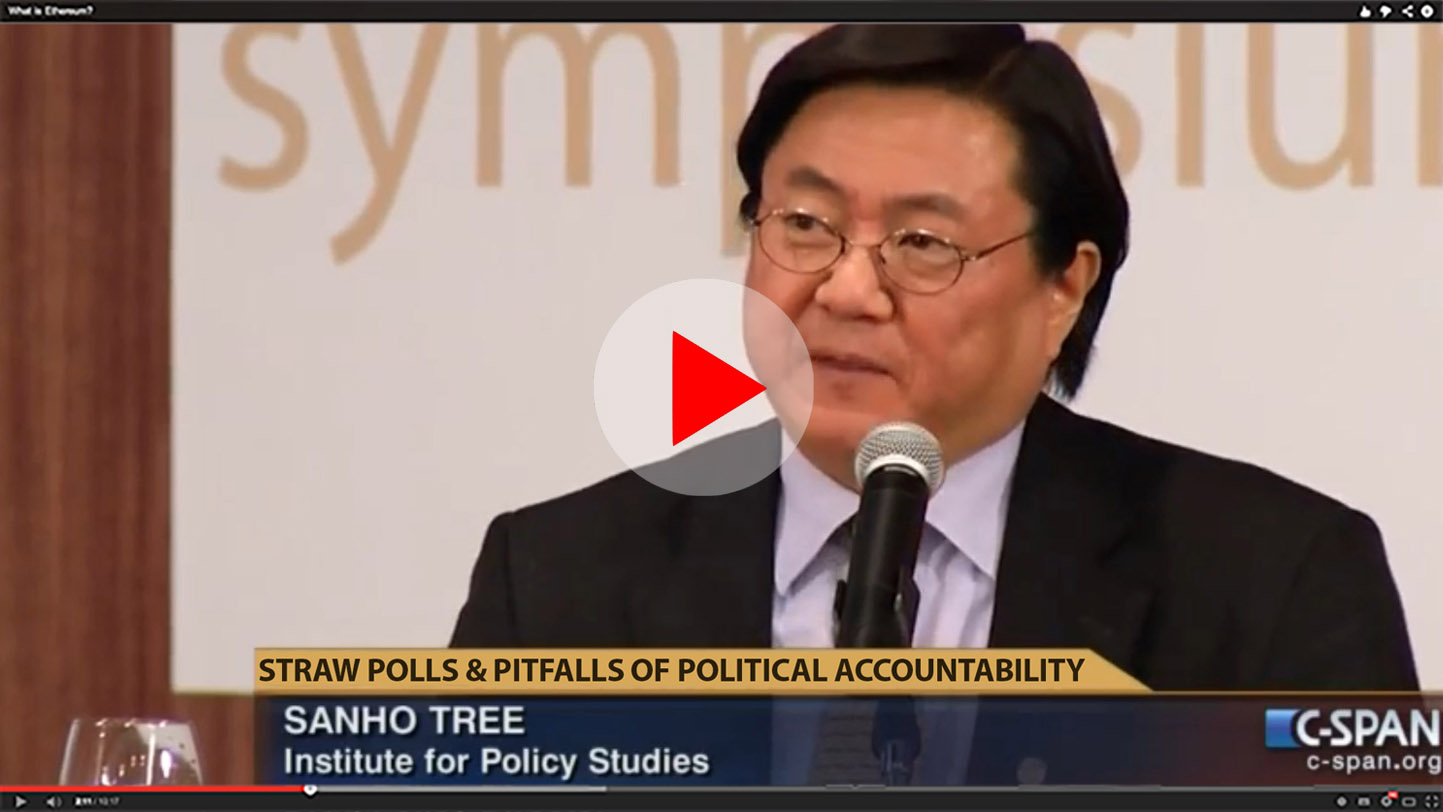
Sanho Tree 2015 - Straw Polls, Secret Voting, and the Pitfalls of Accountability
EXCERPT: I think one of the ways to do that, again, it’s very counterintuitive, is that there’s too much accountability for politicians. Before you freak out and think I’m crazy, let me give you an example of what I mean by that. Oscar Wilde once said, “If you want someone to tell you the truth, give them a mask.”... So if you were able to do a (secret straw poll) survey in Congress today and it turned out that, say, two-thirds wanted to tax and regulate cannabis, if you release the aggregate number, the result of that, no names attached, just that in aggregate two-thirds of Congress actually believes this, then that gives some political cover for politicians to stand up and do the right thing, the courageous thing. They can say, “Look, I’m actually being courageous by saying publicly what my colleagues all believe privately – that it’s time we change our policies on this issue.” And I think that’s a way to solve a lot of third rail issues in Washington. We’re running out of time, both me and Congress, to deal with very serious issues, things like climate change, sensible gun control, or other issues that are controversial politicians cannot deal with. They’re paralyzed because they’re pinned down by these gotcha votes.

Sanho Tree 2015 - Straw Polls, Secret Voting, and the Pitfalls of Accountability
Although practical, the problem with measuring organizational transparency by practices is that those practices are not always correlated with actual transparency. Why aren’t they working? Rousseau ([1762] 1993: 154) knew the answer 250 years ago: transparency practices may, “instead of exposing frauds, only conceal them; for prudence is never so ready to conceive new precautions as knavery is to elude them.” To this day, the ingenuity of observers in designing new systems for transparency is still no match for the ingenuity of the observed to hide (Levy, 2016). With increases in measured transparency, scholars have found increases in impression management (Giacalone & Rosenfeld, 2013; Rosenfeld, Giacalone, & Riordan, 1995), window-dressing (Prat, 2006: 93), posturing (Walton & McKersie, 1965), pandering (Stasavage, 2006: 169), political correctness (Morris, 2001), and a “chilling effect” on open dialogue (Solove, 2006: 488, quoting Laird v. Tatum, 408 U.S. 1,1,13 (1972)). Indeed, one study found a “reverse Hawthorne effect” from transparency: because transparency enables those who are being observed to better see their observers, it makes it easier for them to hide anything they want to hide (Bernstein, 2012).Ethan S. Bernstein 2017
Making Transparency Transparent
The more Congress conducts business in public, the more members hog the spotlight for their own grandstanding and obstructionism to get on TV.Damon Linkler (U. Penn) 2024
Secret Congress
While legislators, courts, and commentators unqualifiedly laud “government in the sunshine,” too much of anything, even sunshine, is not necessarily a good thing. The broadest of open meetings laws chill needed deliberation and collegiality, prevent compromise, and make unrealistic demands on busy part-time local legislators. They transfer power to unelected staff and lobbyists, encourage the violation of individual privacy, and force conscientious local legislators to become casual lawbreakers. While we have enjoyed five decades of increasing sunshine, it might be time for some shade.Steven J. Mulroy 2010
Sunlight's Glare: How overbroad open government laws chill free speech and hamper effective democracy
In Goffmanesque vocabulary, these deliberative democracy scholars find that “when playing for an audience of citizens, legislators in a competitive system know that there is much to gain by discrediting one’s opponents and little to gain from praising them” (Steiner, Bächtiger, Spӧrndli, & Steenbergen, 2005: 130). In the glare of transparency, arguments may “become shallow, poorly reasoned, pandering, or appeal to the worst that we have in common. Indeed, some have traced the deterioration in the quality of dialogue, and increase in gridlock, in the United States Congress to the introduction of always-on C-SPAN2 cameras” (Weisman, 2012). The question now is: “when does the desire to please an audience lead to ‘well-crafted’ arguments and when does it lead to ‘rhetoric, demagoguery, and overbidding’” (Chambers, 2005: 260)?Ethan S. Bernstein 2017
Making Transparency Transparent
In environmental legislation, the final impact of a bill often depends on issues resolved through technical amendments. Downs’s theory (1957) of rational ignorance holds that citizens do not seek out detailed information on public policy because their votes individually have such a small probability of affecting political outcomes. Arnold (1990) notes the additional complication that constituents often face difficulties in linking up congressional actions with real-world outcomes. Both theories predict that Congress members may be less constrained by general constituent interests on amendment votes because these votes are less likely than final legislative votes to be covered in the media. … In the case of technical amendments, affected parties may be more influential than on highly visible votes because the lack of media coverage translates into a lower probability that the vote will become a major campaign issue in future elections. This implies that voting to control pollution will be driven in part by the specific district-level costs and benefits of these measures, whereas voting on the final passage of a bill will be more driven by general constituent interests.James T. Hamilton 2005
Regulation Through Revelation
Analysis of the votes on these amendments and final authorization also reveals a set of legislators who voted against the environmental position on all amendments and yet voted for the final bill. Because the amendment to provide toxic release information was voted on twice, the data also provide information on legislators who change positions after more attention is focused on a particular issue. These votes thus allow one to explore how legislator positions vary with the degree of scrutiny anticipated for a vote. The results indicate that legislator votes on policy instruments to control pollution are affected by the district-level incidence of the costs and benefits of these particular measures. These factors are less important in passage of the final bill, a symbolic vote influenced more strongly by the broader electoral constituency of a representative. In making contributions to Congress members, the PACs representing the affected chemical and petroleum industries appear to contribute more on the basis of a legislator’s stand on contested technical amendments than on a representative’s general environmental position or vote on the final passage of the bill. This provides further evidence of the role that business interests may play in the selection of instruments to control pollution.James T. Hamilton 2005
Regulation Through Revelation
Openness is now regarded as one of the factors that has contributed to the seizing-up of democratic systems.Alisdair Roberts 2014
Making Transparency Policies Work: The Critical Role of Trusted Intermediaries
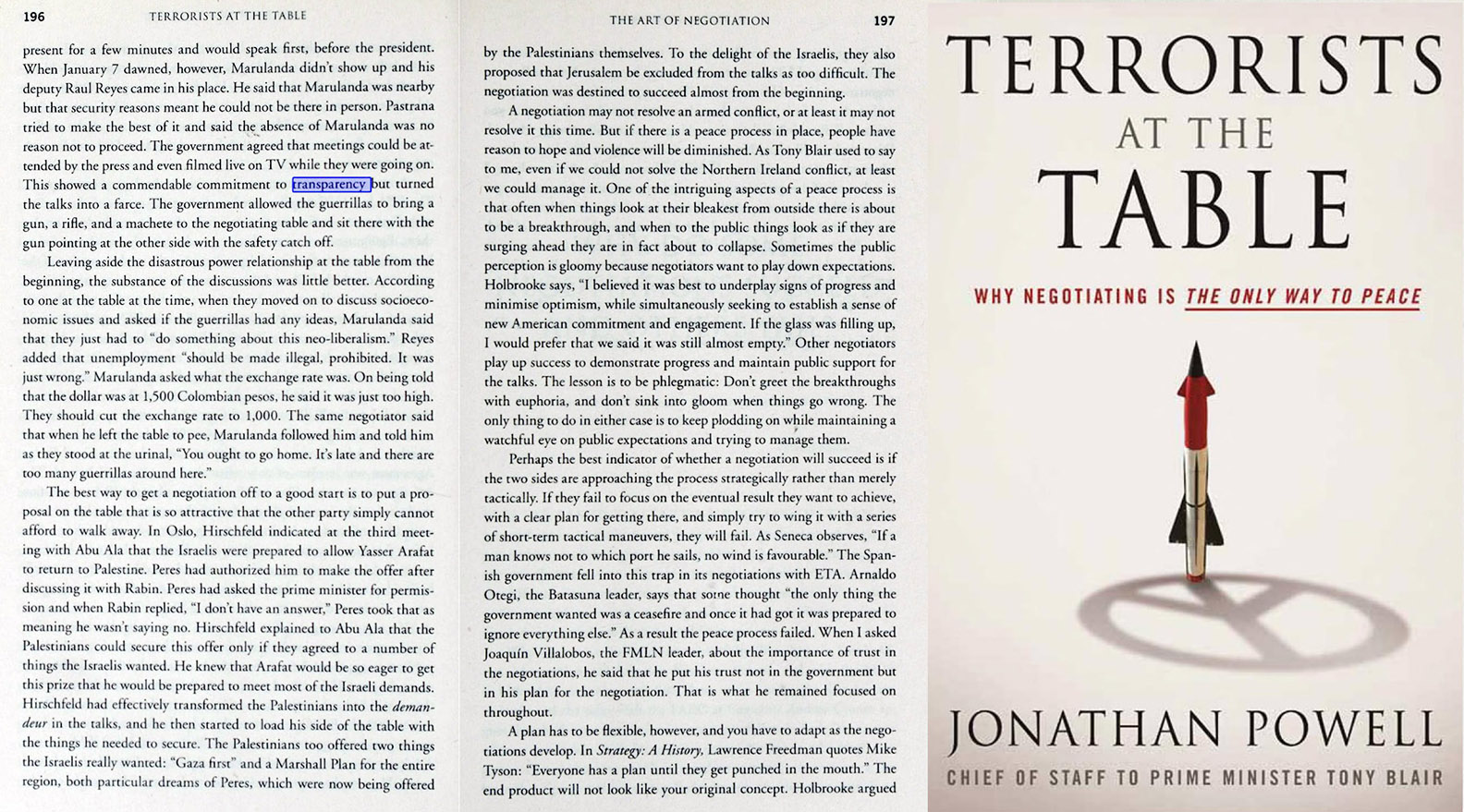
Jonathan Powell 2015 - Terrorists at the Table
Text: The government agreed that meetings could be attended by the press and even filmed live on TV while they were going on. This showed a commendable commitment to transparency, but turned the talks into a farce. The government allowed the guerillas to bring a gun, a rifle, and a machete to the negotiating table and sit there with the gun pointing at the other side with the safety catch off. (Refers to peace negotiations in Columbia)

Jonathan Powell 2015 - Terrorists at the Table
Our culture seems to reel from one democratic dysfunction, to which the solution is more citizen empowerment, to another, in which we must face up to the perverse consequences of this prior solution, only to try yet another way to ensure more transparency and citizen control.Richard H. Pildes 2013
Romantacizing Democracy
The last three presidents of the United States all served in this body - Mr. Nixon, Mr. Johnson and Mr. Kennedy. And if someone were writing the memoirs of any one of them on the important issues of the time in which they served… one would have to surmise or guess how they stood on the vital questions of the day, because there would be no record.Tip O’Neill 1970
Tip O’Neill and the Democratic Century: A Biography by John Farrell
Concern that providing initial deliberative views publicly, without sufficient thought and information, may harm the public interest by irresponsibly introducing uncertainty or confusion to industry or the general public; a desire on the part of members to speak with a uniform voice on matters of particular importance or to develop negotiating strategies which might be thwarted if debated publicly; reluctance of an agency member to embarrass another agency member, or to embarrass himself, through inadvertent, argumentative, or exaggerated statements; concern that an agency member’s statements may be used against the agency in subsequent litigation, or misinterpreted or misunderstood by the public or the press, as for example, when the agency member is testing a position by "playing devil’s advocate" or merely "thinking out loud"; and concerns that a member’s statements may affect financial markets.Special Committee Report 1997
Reforming the Sunshine Act
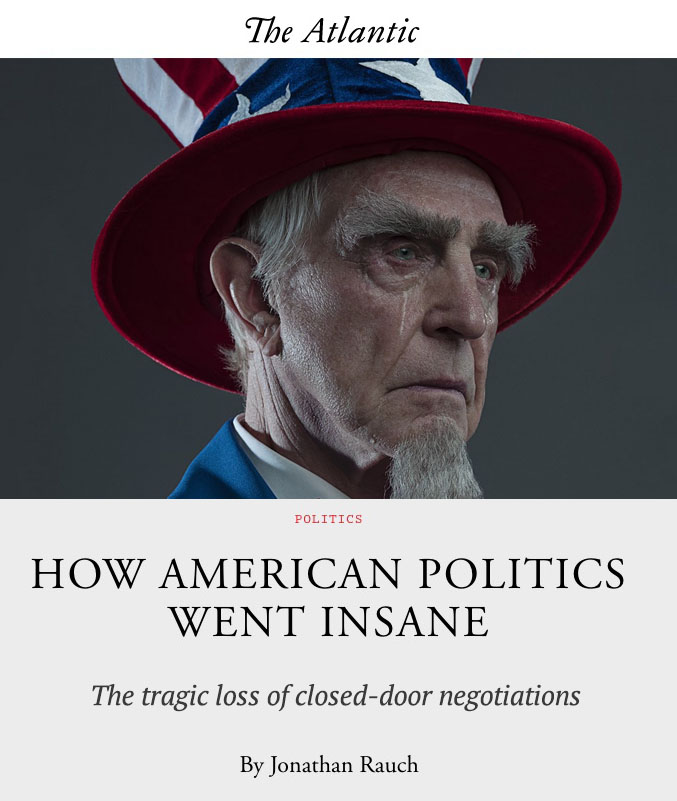
Jonathan Rauch 2017 - How American Politics Went Insane

Jonathan Rauch 2017 - How American Politics Went Insane
As recently as the early 1970s, congressional committees could easily retreat behind closed doors and members could vote on many bills anonymously, with only the final tallies reported. Federal advisory committees, too, could meet off the record. But… smoke-filled rooms, whatever their disadvantages, were good for brokering complex compromises in which nothing was settled until everything was settled; once gone, they turned out to be difficult to replace. In public, interest groups and grandstanding politicians can tear apart a compromise before it is halfway settled.Jonathan Rauch 2016
How Politics Went Insane
Despite promising to televise negotiations over health-care reform, President Obama went behind closed doors with interest groups to put the package together; no sane person would have negotiated in full public view.Jonathan Rauch 2016
How Politics Went Insane [Executive Branch]
Sam Gibbons laughs when people ask him if it is true he once picked up a heavy water pitcher and had to be restrained from heaving it at a colleague during a heated, closed-door session to draft a poverty bill. The congressman from Florida says the story has gained something in the re-telling. He says if reporters had been present at that closed meeting in the late 1960s, they would have seen it was all in fun and not nearly as ominous as legend would have it. A decade later reporters are present at such congressional committee bill-drafting sessions, and very few water pitchers are hurled. The audience also might include lobbyists and tourists who just happen by, all of them the beneficiaries of “sunshine” rules adopted by the House in 1973 and the Senate in 1975.Gene Berhardt 1977
Open Doors in Congress Work Well
Public sessions keep a man from thinking out loud. It also inhibits the use of four-letter words. Some members need to use that language to adequately express themselves. The result is they just don’t say anything in open session. Then, too, some members are concerned their questions might sound ignorant, something they wouldn’t be afraid of in a closed session.Rep. Richard Ichord 1977
Tampa Bay Times
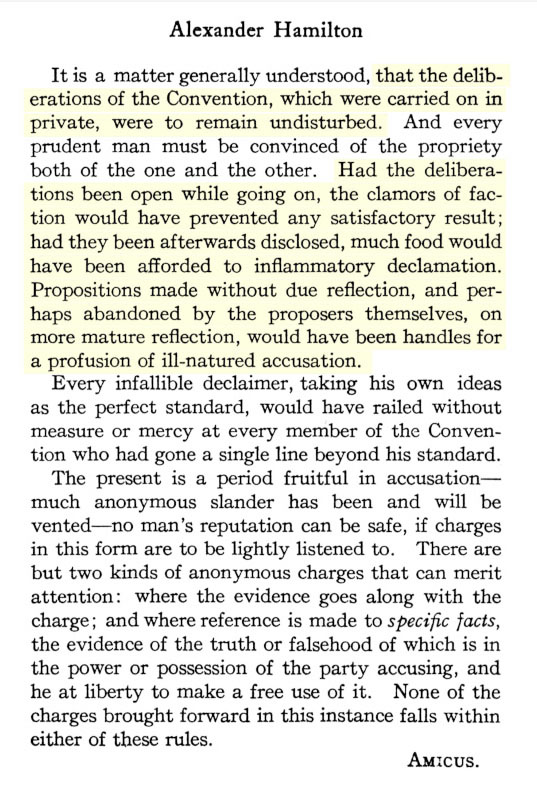
Alexander Hamilton 1792

Alexander Hamilton 1792
There isn’t much hard evidence that transparency reliably improves real-world decision-making or makes the public happier, and some evidence points to ill effects. One recent study finds that, in developing countries, transparency makes the public more fatalistic about corruption rather than stimulating outrage and action; the same dynamic of cynicism and numbness may apply in the United States, especially when transparency is coupled with paralysis. The public sees more of the sausage-making while getting less sausage. Ray La Raja finds that disclosure rules seem to induce small political donors to halve their giving. The point is not that sunshine rules and disclosure laws are always bad or even to deny that up to a point they are a public good in and of themselves; it is only that they can be counterproductive and that reformers’ dogmatic and often moralistic commitment to them needs a reality check.Jonathan Rauch 2016
How Back Room Deals Can Strengthen Democracy
Like the Social Security rescue of 1983 and the Tax Reform Act of 1986, closed-door negotiations among major legislative players were crucial to hammering out a House reform package opposed by organized interests (a process R. Douglas Arnold calls “breaking the chain of traceability,” and Anthony King, “collusion of elites”). Daniel J. Tichenor 2002
Dividing Lines: The Politics of Immigration Control in America
Many new members of Congress, as well as more experienced members, expressed reservations about the proposed rule change. Alan Cranston, new Democratic Senator from California, supported the rule change, but noted: “Conceivably, some reason other than ‘national security’ might justify an executive (secret) session…’ Henry Bellmon, new Republican Senator from Oklahoma, stated: ‘I strongly favor freedom of information, but I also favor free discussion and exchange of ideas...” Many respondents indicated areas other than national security where executive sessions might be needed. Senator Carl Curtis (R-Nebr.) indicated that hearings should be open and that votes made in executive session should be publicized, but said, “Committee members should be permitted to meet in executive session for discussion free from the pressure of the executive lobby or active proponents or opponents of legislation.” Representative William Natcher (D-Ky.) was reported in the Louisville Courier-journal (5-15-66) as believing that the practice of holding secret hearings is sound public policy in its own right, especially in reference to the House Appropriations Committee. If hearings were open, committee members would be under pressure “of kinds not in the best interests of the country.” “Facilitating the work of Congress” was frequently cited as a valid reason for executive sessions. Mark-up sessions, were committee and subcommittee members edit a bill for final submission to Congress as a whole, are the predominant area under this category. Although Representative Ed Edmondson (D-Okla.) favors public disclosure of all roll calls, he comments: ‘Mark-up of many bills, once hearings have been concluded, is made possible by executive sessions in which members can frankly discuss pros and cons of amendments without publicity.” Representative William Ford (D-Mich.) said: “Our experience in using this procedure (open meetings) to force Republican members to attend committee meetings on poverty, etc. produced more political speeches than solid results.” Representative Patsy Mink (D-Hawaii) commented on the time necessary for open mark-up sessions “…it would prolong the deliberations; with several hundred amendments being discussed, press coverage would require each member to seek for five minutes on each!”Freedom of Information Center 1969
FOI Attitudes of the 91st Congress (Gridlock, FOIA)
The sixth question: “Do you favor a requirement that members accredited to the Press Photographers’ Gallery and the Radio and Television Correspondents’ Galleries be permitted to take photographs during Senate and House committee and subcommittee meetings unless the committee or subcommittee determines, by majority vote at each meeting, that photography will not be permitted?” This question received the greatest number of negative responses, many of which were not qualified or explained in any manner. Of those explanations given for negative responses, fear of disrupting and impeding legislative work was most common. According to Representative William Mailliard (R. Calif.), extensive photographic coverage would be too distracting and should delay the proceedings. Representative John Sloss (D-Calif.), a leading advocate of freedom of information legislation, agrees to the requirement, “only if it does not disturb or intrude on the orderly progress of work.” Many candidates expressed fear that there would be excessive theatrics in Congress if photographers covered all meetings. Representative Mark Andrews (R-N.D.) supported the requirement, but foresaw a problem, “one of turning a hearing into a three-ring circus.. and the members spending more of their time and efforts posing for the press than conducting the hearings,” Representative Richard Hanna (D-Calif.) put it very simply: “too many hams.” Representative Louis Wyman (R-N !i.) commented: “It would emphasize form at the expense of substance in the legislative process” Freedom of Information Center 1969
FOI Attitudes of the 91st Congress (FOIA)
If deliberations are disclosed while they are in progress, organized groups with intense preferences may attempt to influence the outcome. Interest-group pressures could transform a deliberative process into an effort to trade off the interests of powerful, well-organized groups.Cass Sunstein 1986
Government Control of Information
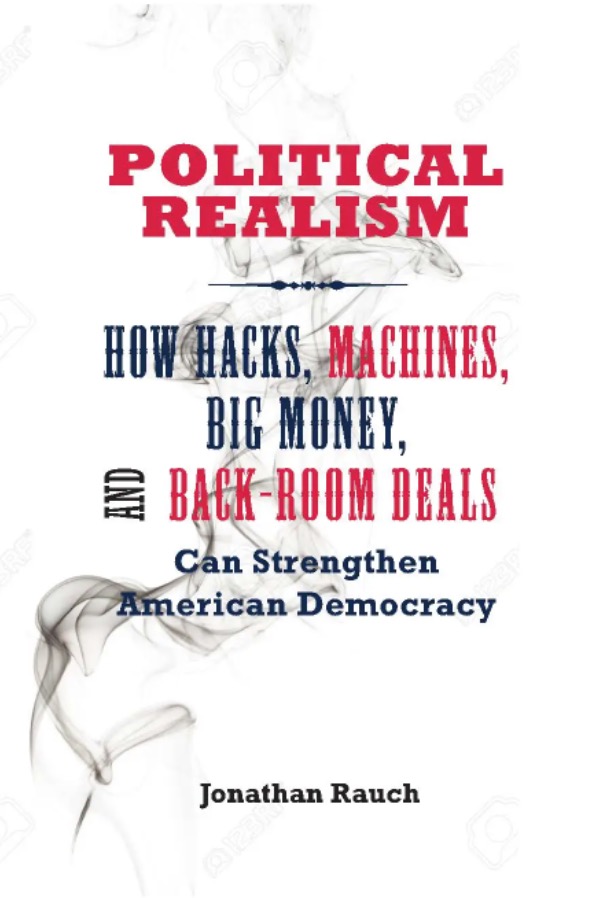
Jonathan Rauch 2016 - Political Realism: How Hacks, Machines, Big Money, and Back-Room Deals Can Strengthen American Democracy

Jonathan Rauch 2016 - Political Realism: How Hacks, Machines, Big Money, and Back-Room Deals Can Strengthen American Democracy
If anti-coordination rules are an example of a bad idea which can’t work, transparency requirements are an example of a good idea which can work but which entails trade-offs whose existence advocates are reluctant to acknowledge. If there is one thing that progressives, populists, and libertarians all agree on, it is that sunlight is the best disinfectant. Lying, cheating, and stealing are certainly more difficult when the world is watching. But so are dickering, floating trial balloons, being candid, and working out complex deals. Public attention, note Sarah Binder and Frances Lee, induces politicians to posture and adhere to partisan talking points; closed-door negotiations, by contrast, give them more freedom to explore policy options and multidimensional, integrative solutions. Above all, privacy lets negotiators work out complex packages in toto before individual pieces are shot down. No wonder that “candidate Obama vowed to televise negotiations over health reform,” said The Economist, but “President Obama did no such thing”; instead, he went behind closed doors with congressional leaders and industry groups to hammer out secret agreements. In 2013, budget negotiations between the House and Senate budget committee chairs succeeded partly because, as a Democratic aide told Jill Lawrence, “their leaders empowered them to figure it out themselves, very, very privately.”Jonathan Rauch 2016
Political Realism: How Hacks, Machines, Big Money, and Back-Room Deals Can Strengthen American Democracy
Transparency often exacerbates crises. Specifically, it seems to have the following effects: First, the media – a major factor in transmitting information made available by transparency – may have an incentive to pay more attention to belligerent statements than more subtle, conciliatory signals [and]… transparency may actually undermine behind-the-scenes efforts at negotiated settlements. [And]… a lack of transparency may actually help states avoid conflict.Bernard Finel & Kristin Lord 1999
The Surprising Logic of Transparency
Consider the record of open diplomacy. It presents one salient lesson – especially since the close of World War II: it doesn’t work. Under the conditions of open diplomacy in the various conferences that have been held between the representatives of East and West, the Russians could not be anything but intransigent.Drew Middleton 1955
Open Covenants Unopenly Arrived At
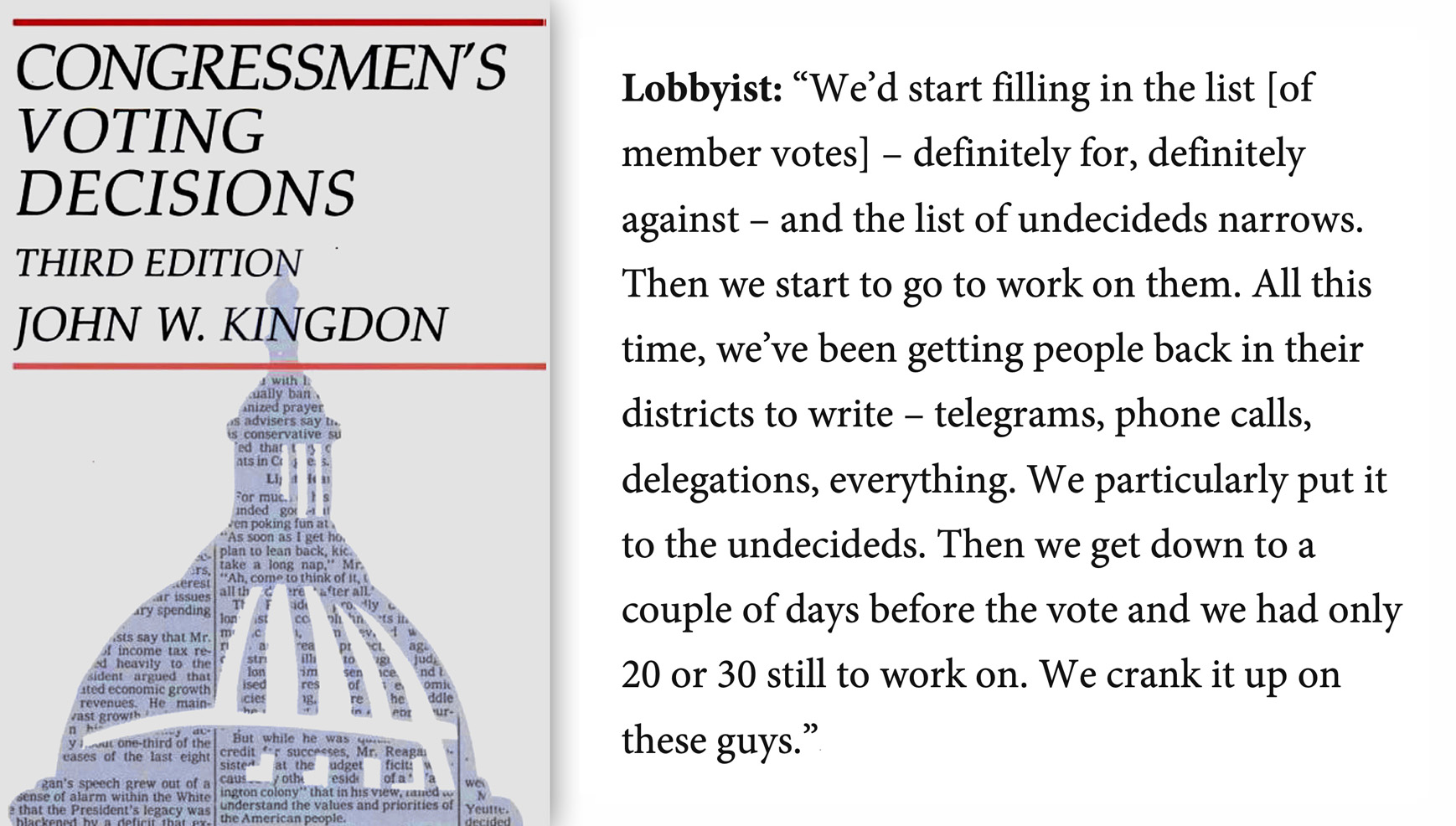
John Kingdon 1989 - Congressman’s Voting Decisions
Text: We’d start filling in the list [of member votes] – definitely for, definitely against – and the list of undecideds narrows. Then we start to go to work on them. All this time, we’ve been getting people back in their districts to write – telegrams, phone calls, delegations, everything. We particularly put it to the undecideds. Then we get down to a couple of days before the vote and we had only 20 or 30 still to work on. We crank it up on these guys.

John Kingdon 1989 - Congressman’s Voting Decisions
Behind closed doors nobody can talk to the galleries or the newspaper reporters. Buncombe is not worthwhile. Only sincerity counts. Men drop their masks. They argue to, not through, each other. That is one reason why it would be a calamity if the demand for pitiless publicity of committee deliberations should ever prevail… Publicity would lessen the chance for concessions, the compromises, without which wise legislation cannot in practice be secured. Men are averse to changing their positions or yielding anything when many eyes are watching. It is in the conference room that agreements are reached, results accomplished.Robert Luce 1926
Congress: An Explanation
It is essential to efficient and effective administration that employees of the executive branch be in a position to be completely candid in advising with each other on official matters… It is not in the public interest that any of their conversations or communications, or any documents or reproductions, concerning such advice be disclosed.President Dwight Eisenhower 1954
Executive Privilege, Secrecy in Government
The “C-SPAN Effect” can encourage political posturing over genuine debate and a search for solutions. Using the C-SPAN model, more and more state and local governments are making more and more public hearings and meetings available over the public airwaves or over the Internet. Inviting this kind of public scrutiny would certainly seem to promote accountability. But it also can promote demagoguery over problem-solving, and it increases the chance that hearings or legislative sessions will devolve into partisan speechmaking. I can testify (anecdotally, to be sure) from my five years as a congressional staffer that there is a marked difference between the behavior of members of Congress in hearings depending on whether the cameras are on or not.Philip Joyce 2015
The Dark Side of Government in the Sunshine
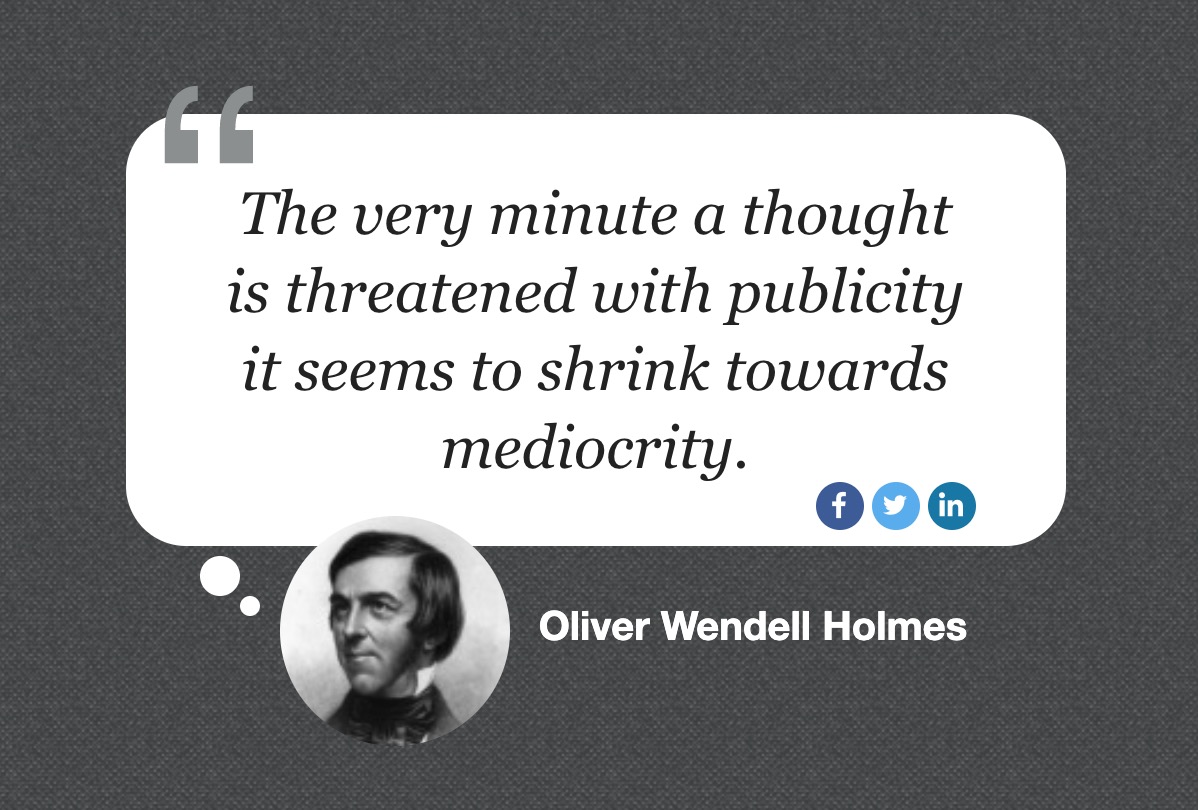
Oliver Wendell Holmes Sr. 1872
The very minute a thought is threatened with publicity it seems to shrink towards mediocrity.

Oliver Wendell Holmes Sr. 1872
Transparency is seen as exacerbating crises by overwhelming diplomatic signals with the “noise” of domestic politics and confusing opponents about which domestic voices are authoritative expressions of state policy. The authors conclude that, surprisingly, transparency makes conflicts worse more often than not – a conclusion that casts doubt on one possible explanation of the democratic peace.ernard Finel & Kristin Lord 1999
The Surprising Logic of Transparency
Subcommittee deliberations [on the 1970 Clean Air Act] took place in the ironically smoke-saturated, mid-sized Public Works Committee conference room, number 4200, in the New Senate Office building, also known as the Dirksen. These meetings were out of the public eye and off record, though stenographic notes were taken—a number of which, but not all, still survive... It was an era in which ten or eleven men... sat around in a closed room and talk about what public policy ought to be, without the influence of lobbyists and damn little influence of staff... Somehow, surrounded by the haze of their own smoke and tucked away from a progressive youth movement, this demonstrably homogenous and institutionalist collection of legislators, embodying uncontested privilege in America, worked out the fundamental piece of U.S. Code which would make significant progress in cleaning the air and protecting millions of Americans’ health and well-being.Brigham Daniels, Andrew P. Follett & Joshua Davis 2020
The Making of the Clean Air Act (Climate)
Is American government too open? The short answer is yes in many instances. Determining the right amount of democratic transparency is surprisingly complicated, because public officials must govern effectively, not simply in the most democratically pure way. When we make naïve assumptions about citizen capacity, democratic opportunities to observe and participate can be captured by highly motivated and well-resourced interest groups and individuals.Bruce Cain (Stanford) 2016
Is our Government too Open?
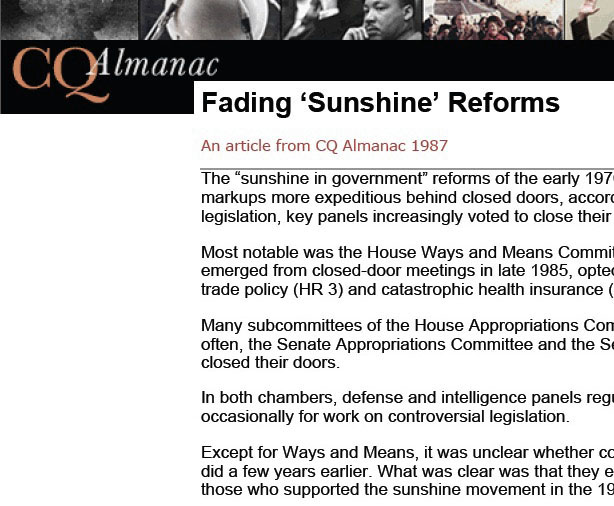
CQ Quarterly – Calmes 1987 – Few Complaints as Doors are Closed

CQ Quarterly – Calmes 1987 – Few Complaints as Doors are Closed
Because of the adoption of rules changes governing voting on the floor, the number of recorded roll call votes each year roughly quadrupled. Members felt more and more harassed by various pressures of office, including less discretionary time, more pressure from single issue interest groups, more clamor for constituency service, more need to raise campaign money, and more subcommittee assignments that demanded their attention.John W. Kingdon 1989
Congressmen’s Voting Decisions
The impetus toward opening up the legislative process by such measures as recorded teller voting, open committee markup sessions, and less frequent closed rules may have increased the degree to which congressmen take constituents into account. But following from our earlier discussion of constituency elites, because the constituents who are paying attention are often the organized interests, these procedural changes may also have resulted in more attention to narrow interests, more parochial voting, and less ability or willingness to structure the legislative situation to look after collective interests. Stripping legislators of the ability to conceal votes may have increased their responsiveness to constituents at the same time that it has decreased their ability to rise above narrow or parochial constituency interests.John W. Kingdon 1989
Congressmen’s Voting Decisions
The infrequency of votes on which congressmen are recorded aye or nay was another feature of the parliamentary situation used to get off the hook, at least in the late 1960s. If the vote is not recorded, then the congressman is able to miss the vote or even to vote contrary to the way he votes on the record. One metropolitan congressman told me of his actions on the Whitten amendment to restrict HEW desegregation guidelines:
“The bussing thing was hard. Bussing has created a lot of trouble in my city. People are mad about It. Damn good thing it wasn’t a roll call vote. I just didn’t vote on the Whitten amendment, I sat it out. (Question: What if it had been on the record?) That would have been a very tough decision. I don’t know what I would have done. But a nonrecord vote made it easy for me.”John Kingdon 1989
Congressmen’s Voting Decisions
On the subject of the history of the American Revolution, you ask who shall write it? Who can write it? And who will ever be able to write it? Nobody; except merely its external facts; all its councils, designs and discussions having been conducted by Congress with closed doors, and no members, as far as I know, having even made notes of them. These, which are the life and soul of history, must forever be unknown.Thomas Jefferson 1815
Letter to John Adams
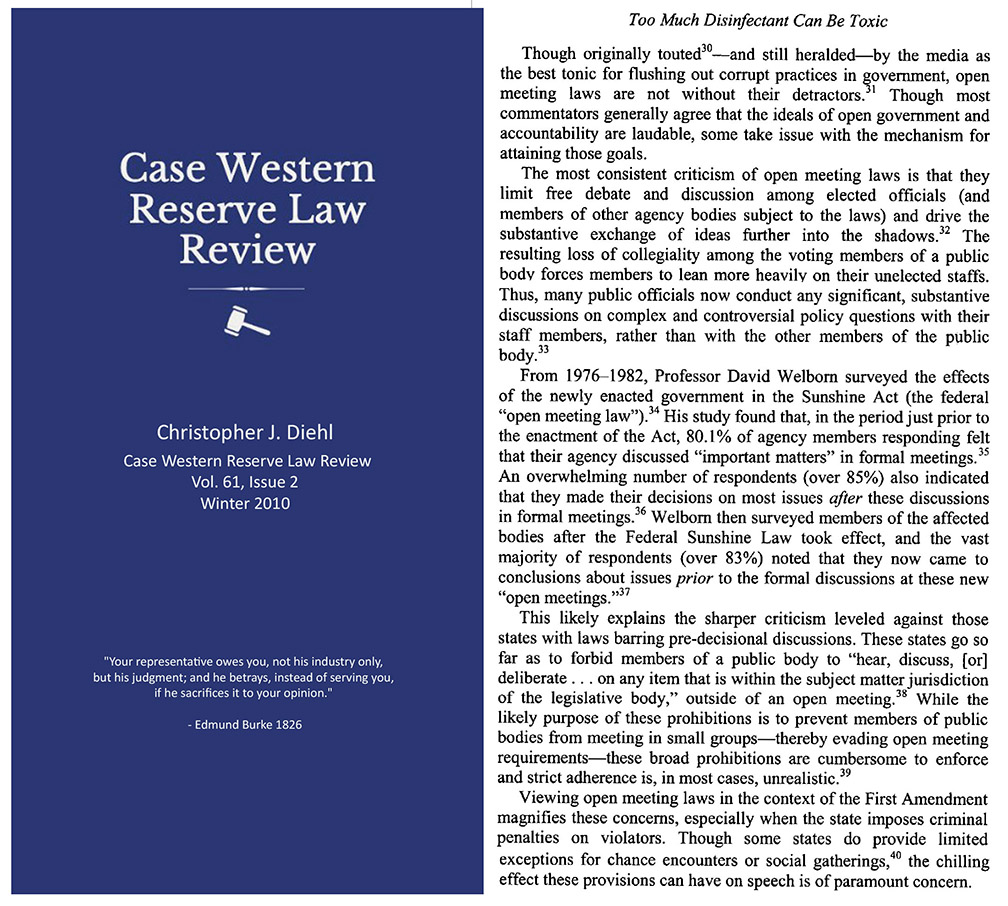
Christopher J. Diehl 2010 - Open Meetings and Closed Mouths

Christopher J. Diehl 2010 - Open Meetings and Closed Mouths
Though many assume there is a constitutional “right” to attend meetings of the govemment, this assumption is incorrect; there is, in fact, no generally recognized common law or constitutional right for the public to attend govemmental meetings. Open meeting laws did not begin to crop up in a significant fashion until the middle of the Twentieth Century. Alabama is thought to have enacted the first “open meeting” law in 1915. And, as late as 1950, it remained the lone state with a “comprehensive” open meetings statute. In the years immediately following Watergate, however, the states with open meeting laws rushed to expand them and those without hastily enacted their own.Christopher J. Diehl 2010
Open meetings and closed mouths: elected officials’ free speech rights after Garcetti v. Ceballos
Moynihan seems unaware that the Founders bequeathed a legacy of secrecy that was routinely practiced in the nineteenth century. Clandestine operations were funded through the President’s Contingency Fund, first established at Washington’s request in 1790, which allowed him to spend money for “secret services” without reporting for what purpose or to whom the money was sent. Jefferson believed that “all nations have found it necessary, that for the advantageous conduct of their affairs, some of these [executive] proceedings... should remain known to their executive functionary only.” Throughout his career, Jefferson held the line against Senate participation in foreign policy initiatives or access to executive secrets. James Madison also believed that secrecy was an essential tool of statecraft. In addition to helping draft the Constitution in secret, Madison concealed his diary account of the convention’s proceedings for fifty years. During his administration a formal system of classification of government documents and intelligence reports was created consisting of “secret,” “confidential,” and “private.” His administration’s covert operations to acquire Florida involved a level of deceit and manipulation guaranteed to offend the sensibilities of modern-day advocates of executive openness. Though Madison and Jefferson differed with the Federalists over many of the issues of their day, they shared the belief expressed by Alexander Hamilton and John Jay in The Federalist,N os. 64, 70, and 75 that “secrecy and dispatch” were essential elements of an “energetic executive.”Stephen F. Knott 1999
[Secrecy] An American Tradition: Book Review of ‘Secrecy: The American Experience by Daniel Patrick Moynihan’
More openness, more democratic accountability, will not dissuade those who tum to Oliver Stone or the X-Files to fathom the workings of their government. Those Americans who believe the FBI and CIA assassinated John F. Kennedy will never be weaned away from the simple answers afforded by conspiracy theories. Pandering to ignorance is not a dignified response for the government of a great nation. Secrecy has its place in protecting sources and methods used by intelligence agencies, in encouraging candid advice to policymakers, and in a larger sense, assisting in the implementation of shrewd and coherent American foreign policy. These are deeply rooted American perspectives worth defending, not some twentieth-century bureaucratic aberration requiring an apology.Stephen F. Knott 1999
[Secrecy] An American Tradition: Book Review of ‘Secrecy: The American Experience by Daniel Patrick Moynihan’
The inhibitions commonly associated with open meetings appear to have several effects. Among the more important of them reported by participants are to “take the sting out of debate,” as one member put it; to contribute to divisiveness among the membership by making the attainment of a consensus more difficult; and to limit the exchange of views, the flow of relevant information, the depth of critical collective scrutiny given to matters before the agency, and strategic speculation and planning.David M. Welborn, William Lyons & Larry Thomas 1984
Effects of the Federal Government in the Sunshine Act
Discussion or debate of the issues is likely to be more thorough and substantive when the public is not present.David M. Welborn, William Lyons & Larry Thomas 1984
Effects of the Federal Government in the Sunshine Act
Inhibited behavior is probably a more significant substantive consequence [of open meetings] than posturing and the influence of an audience on views. One form of inhibition is stylistic in nature. Open meetings were often described by respondents in terms suggesting the absence of meaningful exchanges, such as “stiff”, “formal,” “set pieces,” and “staged presentations.” Also dimished is the “kidding around,” one general counsel noted, that can contribute to a productive work climate. There also may be restraint in the content of what members say, according to interviews. Some of the reasons are substantive uncertainty and a desire not to appear uninformed, apprehension or uncertainty about market and political repercussions, a reluctance to embarrass staff, and fear of tipping the agency’s hand or revealing weak points in a proposed action. Staff members, interviews indicated, at times are inhibited in their contributions in much the same way and for the same reasons. Another form of inhibition concerns the adjustment of positions or a change in views in the process of deliberation. In some agencies it is reported that members can and do alter positions in open meetings as a result of what is said there and may adjust stances to facilitate accommodation of contrasting views. But there are counter pressures in support of the maintenance of a position after it is announced, even if there is an inclination to alter it. They include an unwillingness to appear weak, indecisive, or unprincipled.David M. Welborn, William Lyons & Larry Thomas 1984
Implementation and Effects of the Federal Government in the Sunshine Act
Because the members of the United States House of Representatives vote without a secret ballot, it does not come as a surprise that those seeking political support, both from within the House and elsewhere, make direct contact with members of congress, who hold the power to cast votes on pressing political issues… The concept of “buying a vote” is an extremely arbitrary idea, and thus, there is really no way to deter people entirely from becoming involved in these actions, which are often viewed with contempt. “Buying a vote” in congress does not necessarily mean that money is being directly exchanged between the hands of lobbyists and congressmen, but can really take on many different forms. Although members of congress would not voluntarily admit to the fact that their votes may be influenced by factors other than the opinions of their constituents, when provided with opportunities by influential lobbyists, who can ultimately see which congressmen voted “Yea” or “Nay,” they may find themselves struggling to ignore such appealing bribes.Hilary Greenberg 2013
Caught up in Corruption
Perhaps most jarring to modern minds was the rule providing “That no thing spoken in the House be printed, or otherwise published, or communicated without leave.” Like the intent of the resolutions rejecting individual roll call votes and permitting revotes, the secrecy rule was designed both to allow members to speak freely without fear of outside recrimination and to allay fears that might be spread should rumors be circulated on the basis of partial information. John R. Vile 2005
The Constitutional Convention
Concerned about how key negotiations are being pushed into the shadows, transparency campaigners and corporate lobbyists have formed an unlikely coalition in response.Harry Cooper 2016
Politico
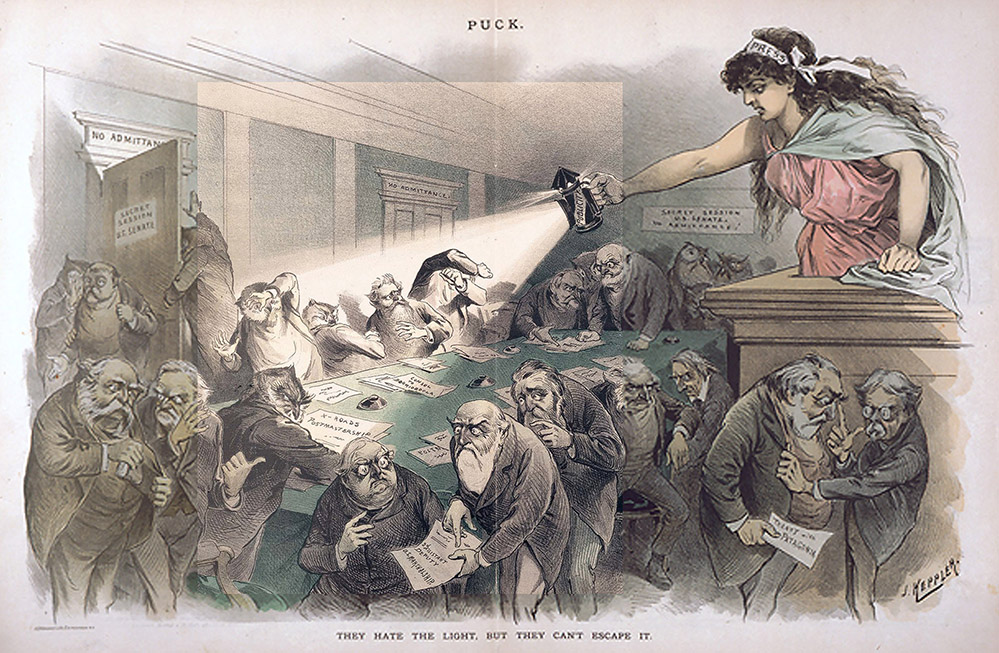
Joseph Keppler 1890 - They Hate the Light, But they Can’t Escape it
Note: According to author Donald Ritchie in the book "Press Gallery" 1991, the newspapers (including Puck via this 1886 cartoon) constantly ridiculed Congress for their open sessions. But, as he notes, the very newspapers that were so excited to remove the secrecy failed to show up to observe Congress when the doors were opened. The galleries remain to this day mostly empty with a scattering of lobbyists.

Joseph Keppler 1890 - They Hate the Light, But they Can’t Escape it
The US has been the dominant country in the international system for some time. It has pursued a strategy of primacy in world politics since the 1940s, and its transparency policy is part of its long-term objective to forge and maintain a favorable international order. In effect, the aspiration behind America’s support for greater transparency abroad is about maintaining an imbalance of power among the countries of the world, with America on top.James Marquardt 2011
Transparency and American Primacy in World Politics
The ‘deal’ on climate policy between the Liberals and Nationals, between Scott Morrison and Barnaby Joyce, will see Australia formally commit to a target of reaching net zero emissions by 2050…Barnaby Joyce and the Nationals did not want to sign onto a net zero deal without significant concessions for the regions…It appears Scott Morrison has given away little to the Nationals to secure their support for the net-zero-emissions-by-2050 target. Of course, it is not entirely clear, given negotiations were conducted behind closed doors.Melissa Clarke 2021
Scott Morrison yields little but wins little in net zero support
Many members of Congress are afraid to vote against any of the crime bills, because “if you vote against any of these measures, you'll be perceived as soft on crime or pro-crime,” said Senator Mitchell. Political groups can spotlight a single vote in a TV advertisement, he said. “There is widespread concern that a vote might be distorted.”Julia Malone 1984
Senate quietly upends US justice system (incarceration)
A study from the University of Chicago in 2011 found that sex offense registries do not increase public safety. But Reynolds said historically legislators were afraid to vote against registries because of possible political opponents attacking them for being soft on crime.Shannon Heffernan 2023
Mayor pledges action following WBEZ investigation into criminal registries in Chicago (incarceration)
Mr. Lamb: You talk about the, you know, being difficult when people are writing books about you and you're only in here 2 years. I brought with me a Time magazine cover story in January. One of your favorite people is on the cover, Rush Limbaugh. But inside there's an article by Bob Wright about hyperdemocracy. And the headline is, "Hyperdemocracy: Washington Isn't Dangerously Disconnected From The People; The Trouble May Be It's Too Plugged In." What about that, just that headline? Is this whole town too plugged into every moment of your life?
The President: Well, there's something to be said for that. I mean, the argument is, of course, that every decision can become the subject of instant analysis and communications and that Congress can be paralyzed by a blizzard of faxes, not F-A-C-T-S, F-A-X-E-S, and that you can just have a stampede based on the emotion of the moment. I think there's something to that.Bill Clinton 1995
Interview: President Bill Clinton by Brian Lamb of C-Span
The other problem with all the plans for a new cyberdemocracy is that judging by the one we already have, it wouldn't be a smashing success. Some of the information technologies that so pervade Washington life have not only failed to cure our ills but actually seem to have made them worse. Intensely felt public opinion leads to the impulsive passage of dubious laws; and meanwhile, the same force fosters the gridlock that keeps the nation from balancing its budget, among other things, as a host of groups clamor to protect their benefits. In both cases, the problem is that the emerging cyberdemocracy amounts to a kind of "hyperdemocracy": a nation that, contrary to all Beltway-related stereotypes, is thoroughly plugged in to Washington -- too plugged in for its own good.Robert Wright 1995
Hyperdemocracy: Washington Isn't Dangerously Disconnected From The People; The Trouble May Be It's Too Plugged In
Stone (2001) argues that ‘facts’ in decision-making are not objective as they are strategic representations of the interests of stakeholders in the public decision-making process. In addition, public decision-making is irrational and incremental, but is presented to the public as if it is rational and the model of rational choice is being obtained. The latter could have profound consequences on how the public perceives local government, if they take a look ‘behind the scenes’. The image of the local council as a rational decision-making organization may be violated and this might negatively influence perceived trustworthiness. Stephan Grimmelikhuijsen 2009
Transparency of local public decision-making
[Patrick Henry] has acrimoniously inveighed against the government, because such transactions as congress think require secrecy, may be concealed—and particularly those which relate to treaties. He admits that when a treaty is forming, secrecy is proper; but urges that when actually made, the public ought to be made acquainted with every circumstance relative to it. The policy of not divulging the most important transactions, and negociations of nations, such as those which relate to warlike arrangements and treaties, is universally admitted. The congressional proceedings are to be occasionally published, including all receipts and expenditures of public money, of which no part can be used, but in consequence of appropriations made by law. This is a security which we do not enjoy under the existing system. That part which authorises the government to withhold from the public knowledge what in their judgment may require secrecy, is imitated from the confederation—that very system which the gentleman advocates.James Madison 1788 - response to Patrick Henry
General Defense of the ConstitutionNOTE: Henry attacked the provisions in Article I allowing for congress’ unconditional secrecy. Henry wrote: The important right of making treaties is upon the most dangerous foundation. The President, and a few senators, possess it in the most unlimited manner, without any real responsibility, if, from sinister views, they should think proper to abuse it; for they may keep all their measures in the most profound secrecy, as long as they please. Were we not told that war was the case wherein secrecy was the most necessary? But, by the paper on your table, their secrecy is not limited to this case only. It is as unlimited and unbounded as their powers. Under the abominable veil of political secrecy and contrivance, your most valuable rights may be sacrificed by a most corrupt faction, without having the satisfaction of knowing who injured you. They are bound by honor and conscience to act with integrity, but they are under no constitutional restraint. The navigation of the Mississippi, which is of so much importance to the happiness of the people of this country, may be lost by the operation of that paper. There are seven states now decidedly opposed to this navigation. If it be of the highest consequence to know who they are who shall have voted its relinquishment, the federal veil of secrecy will prevent that discovery.
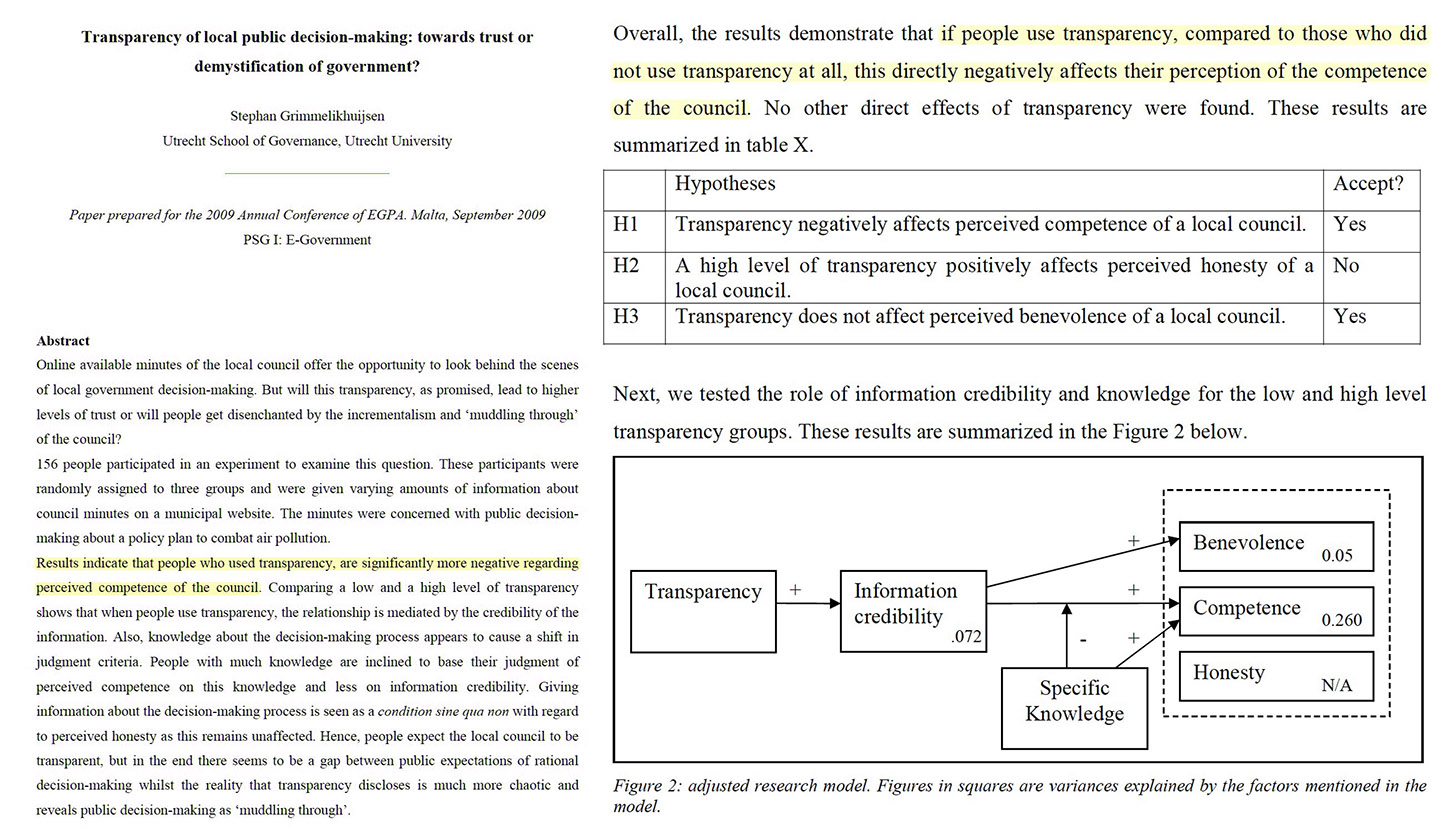
Stephan Grimmelikhuijsen 2009 - Transparency of local public decision-making
Text: the results demonstrate that if people use transparency, compared to those who did not use transparency at all, this directly negatively affects their perception of the competence of the council.

Stephan Grimmelikhuijsen 2009 - Transparency of local public decision-making
The consensus view of transparency is incomplete and, therefore, faulty because it represents transparency as a mechanism to transcend - and perhaps, once and for all, vanquish - power politics. Yet transparency can also be represented as part and parcel of power politics such that what it means, how it works, and the outcomes associated with it, for instance, are very much a function of the power dynamics that characterize world politics. That transparency is very much wrapped up with and therefore inseparable from power politics escapes serious attention.James Marquardt 2011
Transparency and American Primacy in World Politics
America’s transparency initiatives and the resistance of others to them have exacerbated tensions and exaggerated each side’s security dilemma, thereby feeding into a spiral of hostility from which there is no easy exit.James Marquardt 2011
Transparency and American Primacy in World Politics
The purpose of this book is to make the case for the inseparability of transparency and power… Transparency in international politics and American foreign policy is first and foremost a formation of power, which is most acutely evident in transparency’s surveillance function. Although it is represented by American policy elites as a liberal value, America’s efforts to institutionalize transparency function principally as a mechanism to keep a close eye on and discipline rivals.James Marquardt 2011
Transparency and American Primacy in World Politics
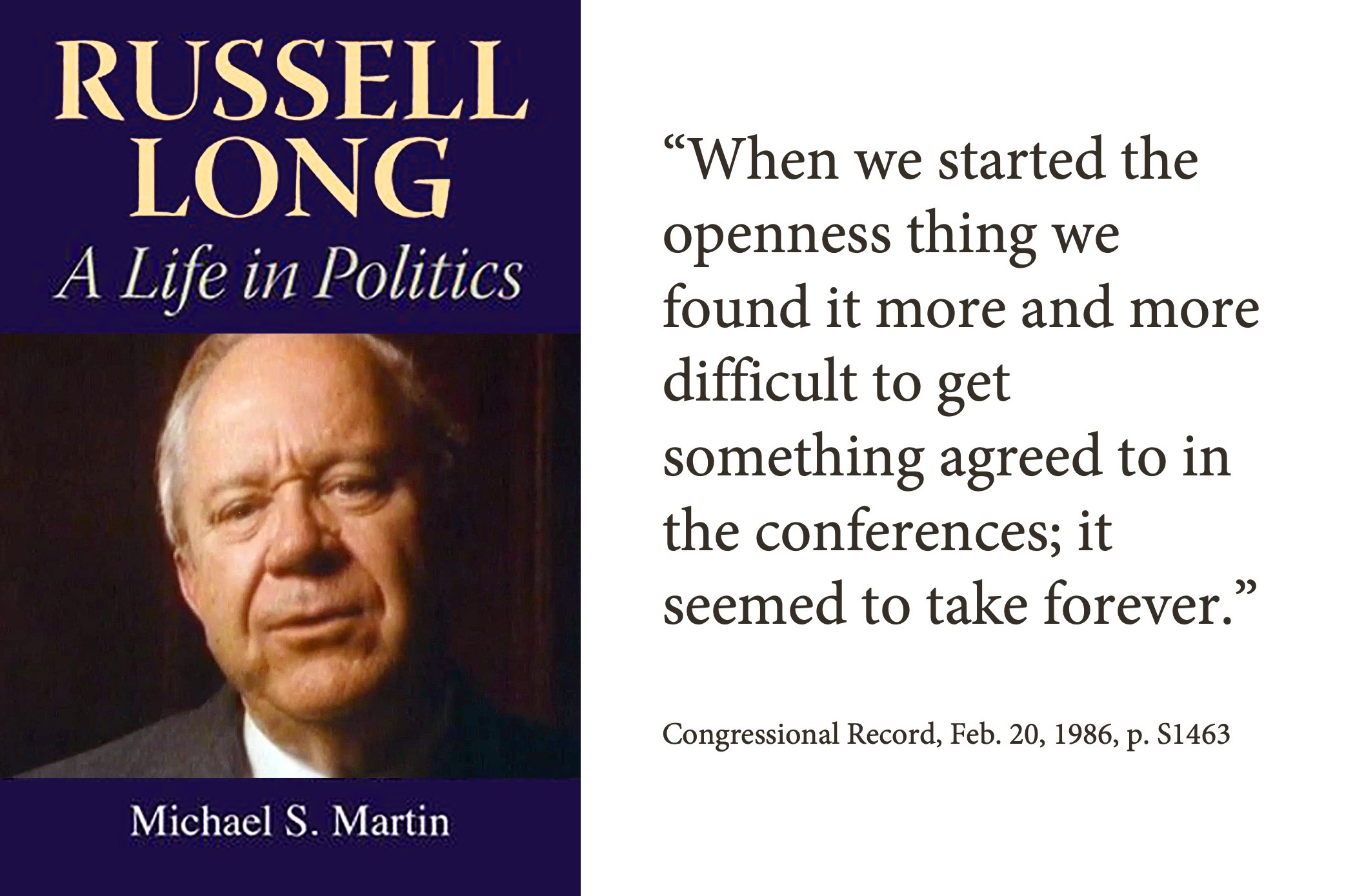
Russell Long 1986 - Life in Politics
Text: When we started the openness thing we found it more and more difficult to get something agreed to in the conferences; it seemed to take forever. So what did we do?... We would break up into smaller groups and then we would ask our chairman… to see if he could find his opposite number on the House side and discuss this matter and come back and tell us what the chances would be of working out various and sundry possibilities.

Russell Long 1986 - Life in Politics
Public officials routinely affirm their commitment to greater transparency in government and lament how the lack of it inhibits cooperation and generates fear and suspicion. Yet the reality is that their calls for greater transparency are politically motivated.James Marquardt 2011
Transparency and American Primacy in World Politics
In this plan of secret voting will, I think, be found the simplest and most effective way of preventing the corrupt use of money in elections.Henry George 1871
Bribery in Elections
In writing a book skeptical of America’s pursuit of increased transparency in world politics, Marquardt injects needed arguments into debates and policies where far too many assume that transparency is an unalloyed good. This book shows how the United States has used transparency for strategic purposes, and not just for mutually beneficial agreements between states. Thus, the United States often encounters resistance to its almost uniformly pro-transparency policies.Dan Lindley (Notre Dame) 2011
University of Notre Dame
In 1783, Alexander Hamilton of New York and James Wilson of Pennsylvania spearheaded an effort to open the doors of Congress to a public audience for a debate on the national debt. The effort, branded by southerners as a move to subject Congress to the local merchants’ influence, was rebuffed.Daniel N. Hoffman 1981
Government Secrecy and the Founding Fathers
Tip O’Neill launched internal live television of the House floor using House camera crews in March, 1977, and two years later gave the public access through C-SPAN. The Senate followed in 1986 using its own camera crews… We staff got used to having the backs of our heads on TV, and we cracked jokes about those staff who seemed to cross behind the chair too many times just to be seen from the front. I also started attending more meetings behind closed doors to reach agreements that would be reenacted before the cameras the next day. It’s a lot more work to do everything twice, and sometimes the reenactment on camera didn’t go according to the script, so the chair would hastily recess to repair the damage… I object to televising every utterance every minute of every closed door meeting because the meeting will be impaired… It may be a futile plea, but… human beings need interaction to try out ideas and to gage support without being crucified for trying something that wasn’t adopted anyway. The more scrutiny beyond a reasonable amount, the less useful business gets done.House Staff Pete Davis 2010
Cameras and Congress (Ezra Klein)
Rep. Suzanne Schmidt, R-Spokane Valley, claimed the privilege is not an exemption from public disclosure laws but instead it is “a tool to ‘provide legislators a fundamental constitutional protection that allows them to work independently and unimpeded by threats of judicial or executive intervention.’”Shauna Sowersby 2024
Only some WA state lawmakers say they will commit to transparency. Is your lawmaker one of them?
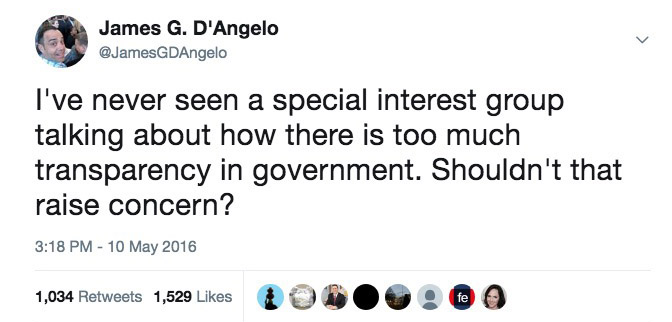
James D’Angelo 2016 – Twitter

James D’Angelo 2016 – Twitter
In reference to lobbyists, D’Angelo explained that they are the only group that needs transparency to survive. “They need transparency like we need oxygen,” he quipped, because without it, they would have no way of guaranteeing whether or not lobbying was a good investment.Bruce Skarin 2015
Why Transparency in Congress is Giving Power to the Wrong People
State open meetings laws are preventing local officials from engaging citizens online for fear of inadvertently having what would be legally considered a meeting that would not meet other requirements such as public notice and public access. At the federal level, the 1972 Federal Advisory Committee Act is preventing the exchange of knowledge between the government and private sector. The purpose of the law was to prevent federal agencies from having back-room consultations with corporate executives and other entrenched sources, but the requirements for obtaining public input have grown so complex under the act that today the law is probably preventing federal agencies from getting the best knowledge.Josh Tauberer 2014
Unintended Consequences of Transparency
Indeed, the Congress today is remarkably open, permeable to outside interests and opinion, and relatively unconstrained by autocratic committee and party leaders. Members if anything are hypersensitive to public opinion and unduly solicitous of intense opinions in the electorate, however ephemeral they may be. And committee and party leaders are responsive to majority sentiment among rank-and-file members. The Congress and its leaders are less equipped institutionally to cool the temporary passions of the public than ever before. The Framers of our system would be appalled to see how campaign finance practices, negative campaigning, orchestrated grass-roots lobbying and television and radio have made it more difficult for members of Congress to do what is politically unpopular in their districts but right for the country.Thomas Mann 1993
Testimony - House Congressional Record
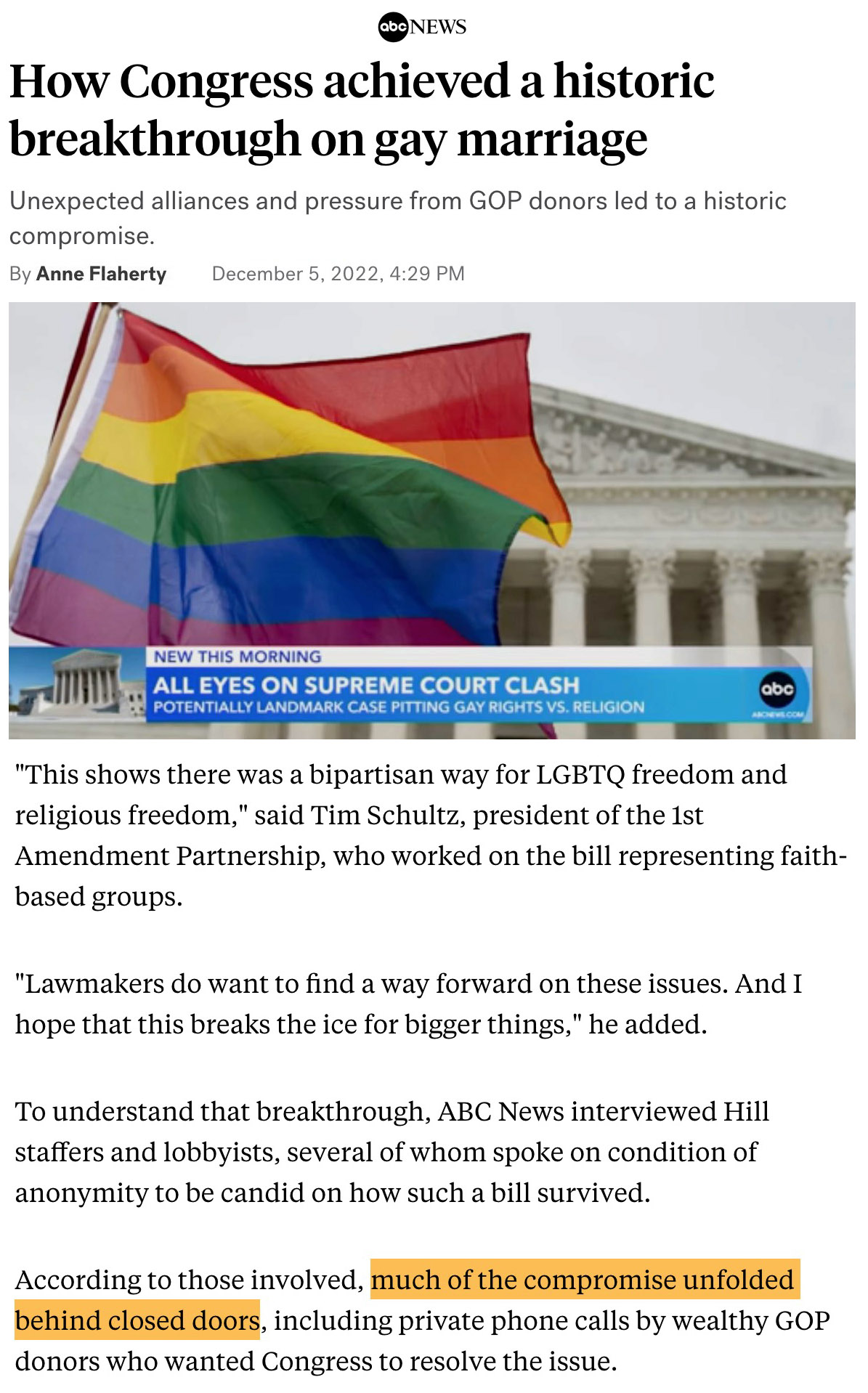
Anne Flaherty 2015 - How Congress achieved a historic breakthrough on gay marriage
TEXT: “This shows there was a bipartisan way for LGBTQ freedom and religious freedom,” said Tim Schultz, president of the 1st Amendment Partnership, who worked on the bill representing faith-based groups. “Lawmakers do want to find a way forward on these issues. And I hope that this breaks the ice for bigger things,” he added. To understand that breakthrough, ABC News interviewed Hill staffers and lobbyists, several of whom spoke on condition of anonymity to be candid on how such a bill survived. According to those involved, much of the compromise unfolded behind closed doors, including private phone calls by wealthy GOP donors who wanted Congress to resolve the issue. (Gay Rights)

Anne Flaherty 2015 - How Congress achieved a historic breakthrough on gay marriage
There are still some cases where closed mark-ups are better. We wouldn’t have had 150 amendments to the energy bill if the lobbyists hadn’t been there – we’d only have had 10 or 15.Rep Harley Staggers (D-WV) 1973
Senate and House Open Up their Sessions
When a man thinks his words are to be repeated, he has an eye to the ultimate consumer. Instead of talking solely to those who are to make the immediate decision, he frequently talks with remote effects in mind. This would turn a public committee conference into a sparring spectacle for personal or party advantage. It is for this reason that parliamentary law frowns on any reference in debate to what has been said in committee conferences.Robert Luce 1922
The Science of Legislation
Opponents of the (transparency) rule warned that it would encourage members to show off for the press and allow lobbyists to intrude on deliberations… One staff member said the open mark-up sessions slowed the committee’s work when it was dealing with controversial legislation, because members became “more vocal” for the benefit of lobbyists – and for reporters who might quote them in the next day’s papers. Lobbyists had been known to hand members notes with suggested amendments, he said, and “sometimes you even had applause and the chair had to bang for order.”CQ Quarterly 1973
Senate and House Open Up their Sessions
Interested parties, not the general public, monitor the public sessions of agencies in order to influence outcomes.Bruce Cain (Stanford) 2016
Is our Government too Open?
The political actors with the greatest monitoring advantages are legislative party leaders – particularly those from majority parties or coalitions that control legislative agendas. Interest groups with substantial resources, including lobbyists or staff poised to oversee legislative activity, may also be able to monitor signal votes on the assembly floor. Actors motivated to monitor, but with disadvantages in doing so, include nongovernmental and watchdog organizations with constrained resources, journalists, and academics. John M. Carey 2009
Legislative Voting and Accountability
Legislators in Bolivia and Colombia – even those who strongly favored recorded voting themselves – described a general lack of public attention to individual legislators’ voting behavior. Nevertheless, there are pockets of interest. Organized interest groups – unions, business organizations, and farmers’ groups – sometimes monitor legislative voting, even in systems where no records are kept, and lobby legislators and party leaders to support their demands. John M. Carey 2009
Legislative Voting and Accountability
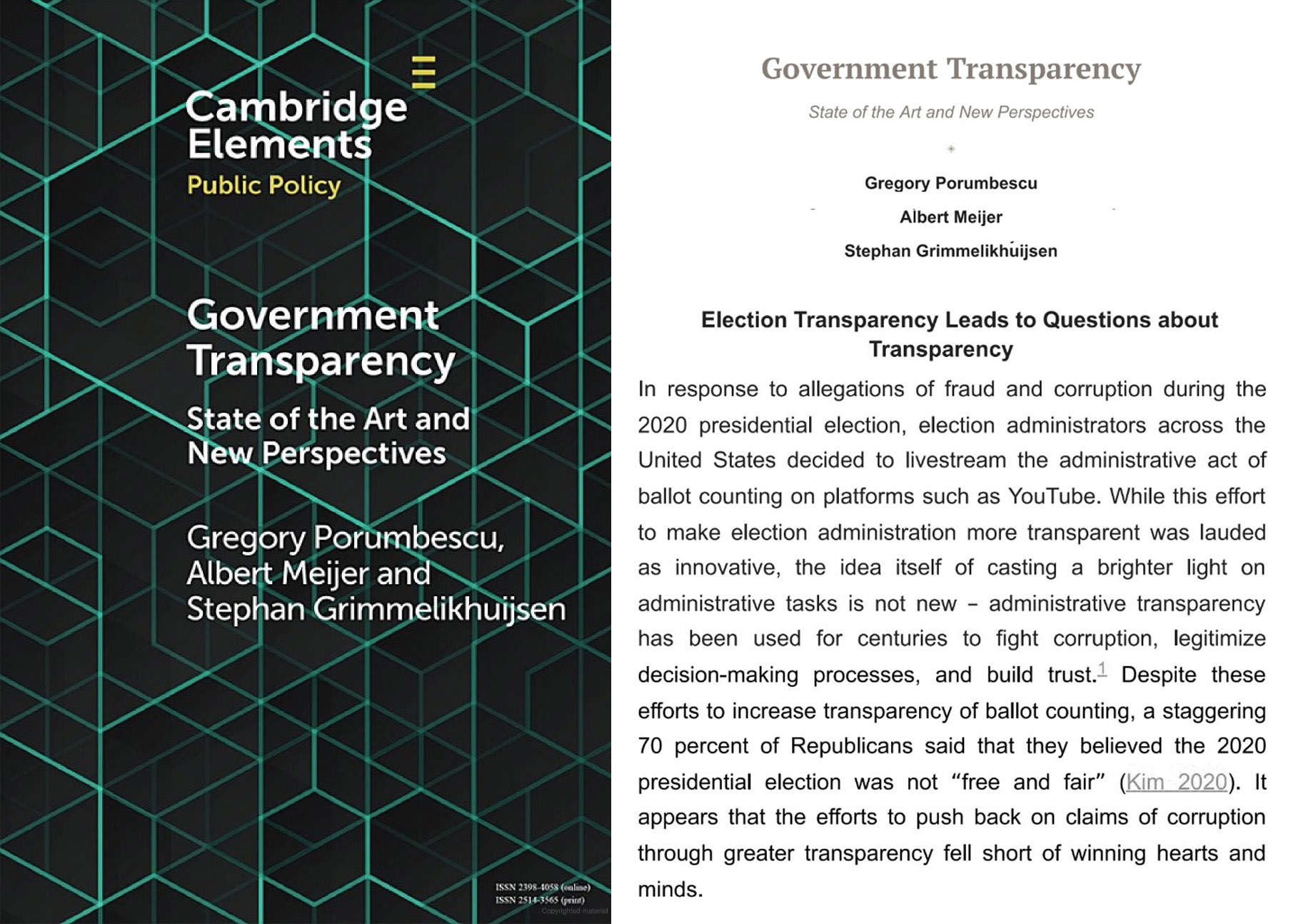
Porumbescu, Meijer, Grimmelikhuijsen 2022 - Government Transparency
Text: In response to allegations of fraud and corruption during the 2020 presidential election, election administrators across the United States decided to livestream the administrative act of ballot counting on platforms such as YouTube. While this effort to make election administration more transparent was lauded as innovative, the idea itself of casting a brighter light on administrative tasks is not new - administrative transparency has been used for centuries to fight corruption, legitimize decision-making processes, and build trust. Despite these efforts to increase transparency of ballot counting, a staggering 70 percent of Republicans said that they believed the 2020 presidential election was not “free and fair” (Kim 2020). It appears that the efforts to push back on claims of corruption through greater transparency fell short of winning hearts and minds.

Porumbescu, Meijer, Grimmelikhuijsen 2022 - Government Transparency
The hubris that as we get more educated and we know more we can handle more government responsibility, and when we fail we make possible the kind of polarization, the kind of capture by special interest, the capture by the most partisan of our society. Bruce Cain (Stanford) 2016
Stanford talk: “Is our Government too Open?”
Contrary to the naive sirens of maximum democracy, greater transparency is as much a problem for good governance as it is a solution.Bruce Cain (Stanford) 2016
Stanford talk: “Is our Government too Open?”
Call it the "split-screen" (or "secret") Congress: Out of media spotlight, stalemate is much less common.Sarah Binder 2021
Secret Congress
The practice of secret voting is not completely unheard of. The House has twice voted to select a president when the Electoral College failed to produce a winner — Thomas Jefferson in 1800 and John Quincy Adams in 1824. Those votes were secret. More recently, the House passed an amendment to the Freedom of Information Act in 2016 by a voice vote, leaving no record of individual votes.Don Kahle 2021
Secret ballots could save democracy
A senior lobbyist for a major corporation, who asked not to be identified, said the most important thing at this stage [closed-door conference committees] is to keep track. "We've really got to watch everything. My clients don't directly care about the cigarette tax, but if that is defeated then the conferees are going to be looking for more revenue, and we don't want them to come after corporate preferences. So we watch."... As for Wilbur Mills, he said the way tax bills are done these days--in open meetings instead of behind closed doors – has done nothing but "open up the process for the lobbyists. Look at all these people," he said, gesturing at the mob in the hallway. "The public's not here."... "I just came to look," said former Michigan Republican congressman Jack McDonald, kidding no one. "I've been living this bill for three months and I didn't want to leave it now." He had been watching, he said, on behalf of American Express, interested in preserving the deduction for three-martini lunches, many of which are charged on American Express plasticDouglas B. Feaver 1982
Former Colleagues Hovering as Lawmakers Write Taxes
“Last week, I asked a question at one of the hearings and 15 minutes later I get a phone call from some guy up in Boston who wants to know if I’m changing my position. I said, ‘How did you know I asked the question?’ and he says, ‘We keep in touch.’ You walk into that committee in the morning and you see 500 fat-cat lobbyists taking notes.”Representative Jim Burke quoted by Joe Klein 1975
The Fanne Foxe Memorial Tax Bill
Today, the injunction of transparency has interfered in the unanimous conception of Western democracy, so that power and the decisions adopted by its holders are expected to become more and more important. As pointed out by G. Carcassonne, “it is by their level of transparency that the institutions will be judged above all, the performance and other conditions becoming only seconds. Only the fully transparent decision process will be considered satisfactory. What does it matter if he/she proves to be incapable of producing the slightest decision or produces only mediocre ones?” And the Carcassone warns: “If transparency is not reduced to what it is, a means, it is a threat, so that democracy has realized the dream of totalitarianism. The demand for excess transparency is no longer the quintessence of democracy, but rather its direct opposite” Chloé Mathieu 2017
Émergence du mythe de la transparence, lobbying et responsabilité des élus
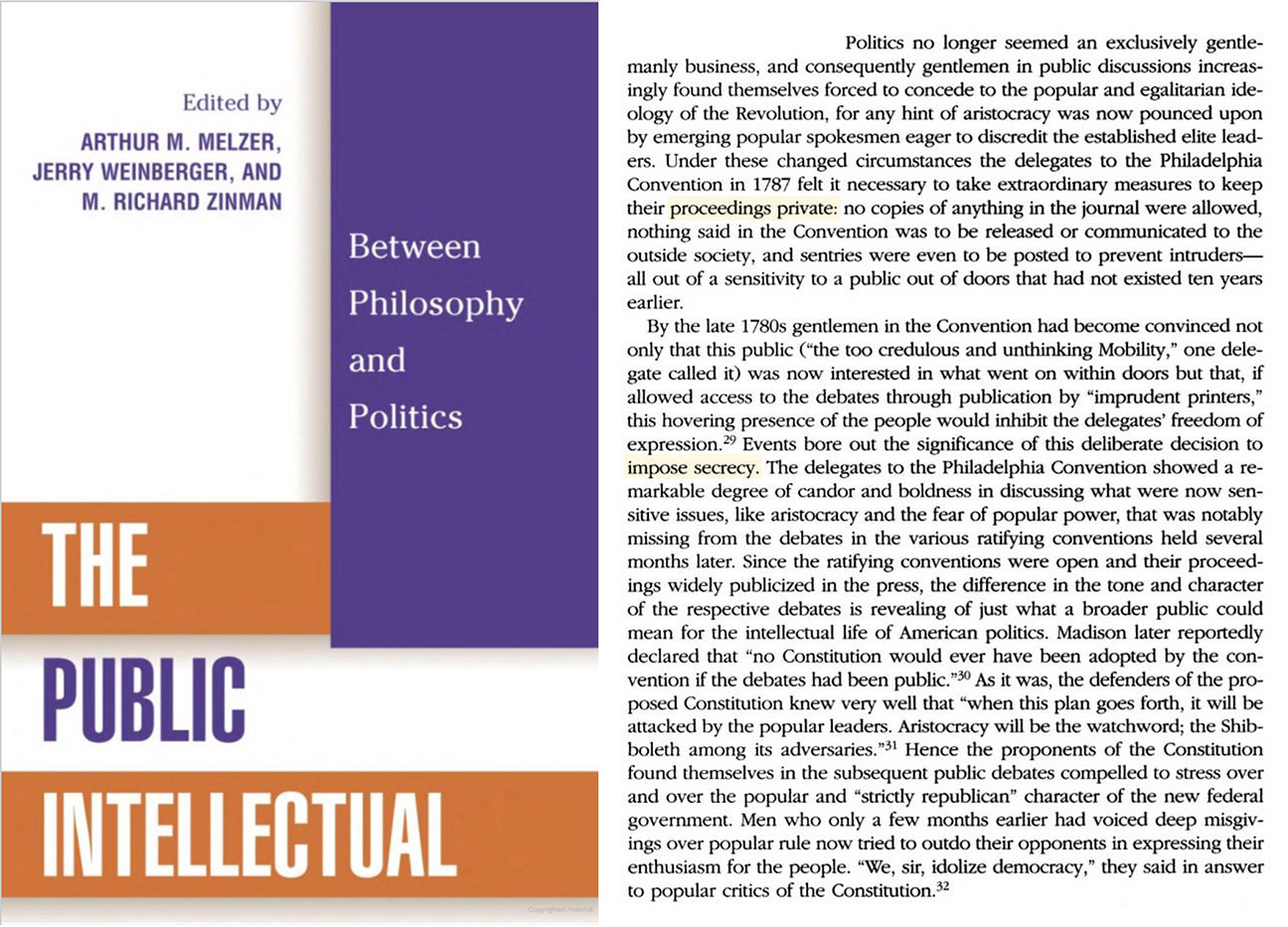
Gordon Wood 2003 – Founding Fathers and Public Opinion
Text: Politics no longer seemed an exclusively gentlemanly business, and consequently gentlemen in public discussions increasingly found themselves forced to concede to the popular and egalitarian ideology of the Revolution, for any hint of aristocracy was now pounced upon by emerging popular spokesmen eager to discredit the established elite leaders. Under these changed circumstances the delegates to the Philadelphia Convention in 1787 felt it necessary to take extraordinary measures to keep their proceedings private: no copies of anything in the journal were allowed , nothing said in the Convention was to be released or communicated to the outside society , and sentries were even to be posted to prevent intruders all out of a sensitivity to a public out of doors that had not existed ten years earlier. By the late 1780s gentlemen in the Convention had become convinced not only that this public (“the too credulous and unthinking Mobility,” one delegate called it) was now interested in what went on within doors but that, if allowed access to the debates through publication by “imprudent printers ,” this hovering presence of the people would inhibit the delegates’ freedom of expression. Events bore out the significance of this deliberate decision to impose secrecy. The delegates to the Philadelphia Convention showed a remarkable degree of candor and boldness in discussing what were now sensitive issues, like aristocracy and the fear of popular power, that was notably missing from the debates in the various ratifying conventions held several months later. Since the ratifying conventions were open and their proceedings widely publicized in the press, the difference in the tone and character of the respective debates is revealing of just what a broader public could mean for the intellectual life of American politics. Madison later reportedly declared that “no Constitution would ever have been adopted by the convention if the debates had been public.” As it was, the defenders of the proposed Constitution knew very well that “when this plan goes forth, it will be attacked by the popular leaders. Aristocracy will be the watchword; the Shibboleth among its adversaries.” Hence the proponents of the Constitution found themselves in the subsequent public debates compelled to stress over and over the popular and “strictly republican “ character of the new federal government . Men who only a few months earlier had voiced deep misgivings over popular rule now tried to outdo their opponents in expressing their enthusiasm for the people. “We, sir, idolize democracy,” they said in answer to popular critics of the Constitution.

Gordon Wood 2003 – Founding Fathers and Public Opinion
Transparency is no longer primarily a vehicle of civil society, but is fueled and ruled by markets and states. Arthur P.J. Mol 2014
The Lost Innocence of Transparency in Environmental Politics
Markets and states jostle to capture transparency arrangements for their own diverse ends, which are not necessarily aligned with assumed normative linkages between transparency, democracy and participation, as well as environmental reform… Transparency has “lost its innocence” as an arbiter of democratic and environmental gains.Arthur P.J. Mol 2014
The Lost Innocence of Transparency in Environmental Politics
We focus on the dynamics of representation that emerged out of the 1970 Legislative Reorganization Act. On balance these moves toward transparency have had tremendously negative consequences. Consistent with the theory, increases in transparency were followed by increased narrow-interest lobbying, wasteful and pernicious legislative gamesmanship, increased partisanship, and more.David King (Harvard) 2017
MPSA submission abstract
Effective government in democratic societies involves two oft competing incentives: successfully campaigning to win office on the basis of grand promises and officeholders’ ability to compromise to achieve meaningful legislative goals. At times, these come into conflict, requiring trade-offs. Politicians must compromise their stated campaign platforms in order to achieve wider political objectives. As Otto von Bismark once quipped, “Politics is the art of the possible, the attainable – the art of the next best.” When making difficult compromises, it behooves all parties to have them occur in committee, behind closed doors. Not doing so runs the risk of having compromising parties labeled as “traitors” or “sellouts.” The consequences of this may seem frivolous, but they could be dire. In the future, individuals who are excoriated by constituents are likely to avoid making concessions to enact meaningful policy, regardless of the success or failure of the policy itself.Edward Hearn 2020
How Much Transparency Is Too Much?
Committee deliberations were gradually opened up to public view, thus distributing information to all interested parties and facilitating the work of senator-interest group alliances… An increasing number of decisions were pushed to the Senate floor – resulting in more roll calls, more floor amendments offered and passed by non-committee members and junior members (Sinclair 1985). While the committees certainly retained the larger share of influence, the balance between the committee rooms and the floor as arenas of decision making changed markedly… A major indicator of the changed balance was the commonplace exercise of the cherished senatorial right to talk – reflected in more “extended debate” on more subjects, more filibusters and threats of filibusters, and more cloture votes as efforts to cut off debate (Sinclair 1985). What was once regarded by most senators as an ultimate right to be invoked sparingly for the good of the community became an everyday weapon in the fight to gain a temporary advantage over one’s colleagues.Richard Fenno 1989
The Senate through the Looking Glass - The Debate over Television
Committee members believe, for example, that closed executive sessions are necessary to protect Committee deliberations from pressure generated through publicity which would, in their view, increase appropriations and prevent them from protecting the Treasury. Similarly, they believe that the flow of information to House members must be carefully guarded to prevent the leakage of information that would precipitate a raid on the Treasury. They acknowledge House resentment: They think we’re a powerful committee. And they’re a little jealous. They think we are high-handed — maybe high-handed isn’t the word for it — but they think we are too much of a closed corporation, because of our executive sessions. But the Committee continues this practice, nonetheless.Richard Fenno 1966
The Power of the Purse: Appropriations Politics in Congress (Debt)
A significant escalation in external influence occurs when the position of the chamber is stated via a roll-call vote.Richard Fenno 1966
The Power of the Purse: Appropriations Politics in Congress (Debt)
Secrecy or confidentiality of deliberation in meetings inside the government enables full and fair deliberation that would be curbed or chilled by ongoing publicity. This is true in the executive branch (where such deliberations are protected from FOIA disclosure), and it is a serious concern that members of Congress and congressional staffers express in resisting the opening of markup sessions and some other committee and subcommittee deliberations to the press and the public.Michael Schudson 2014
The Rise of Right to Know
Secrecy protects vulnerable populations. A case in point would be the Supreme Court decision (NAACP v. Alabama, 1958) that found the Alabama chapter of the NAACP to be within its rights to withhold its membership lists from the state of Alabama. In the 1950s, for a black person to be a member of this leading group of civil rights activists was asking for trouble – harassment, threats, bullying, firing from a job, physical violence, even murder. To a significant degree, Alabama sheltered white terrorist organizations; forcing the NAACP to be transparent about its membership rolls would have exposed its members to dangerous white citizens. To take a much simpler example, parents withhold information from children that would upset, confuse, or traumatize them. This is the classic meaning of paternalism (or what we might better call "parentalism"). All parents learn or instinctively adopt some version of it – not everything the parent knows can be or should be communicated to their children.Michael Schudson 2014
The Rise of Right to Know
(By opening up the Senate to television) we are no doubt making the most far reaching change here that has been made in a long long time with reference to the possibility of the practices on this floor … we are just opening up a Pandora’s box, and we can very easily carry on all the traditions and needs of the place without this.Senator John Stennis 1982
Congressional Record, 3 Feb. 347
Imagine a situation where the issues we are voting on are very controversial and sensitive and a Member may not have the courage to stand out during roll call and tally; could we rather not have provided for secret voting as was in the previous rules especially to do with issues of constitutional amendments?Monicah Amoding 2017
Parliament House, Kampala, Uganda July 20, 2017
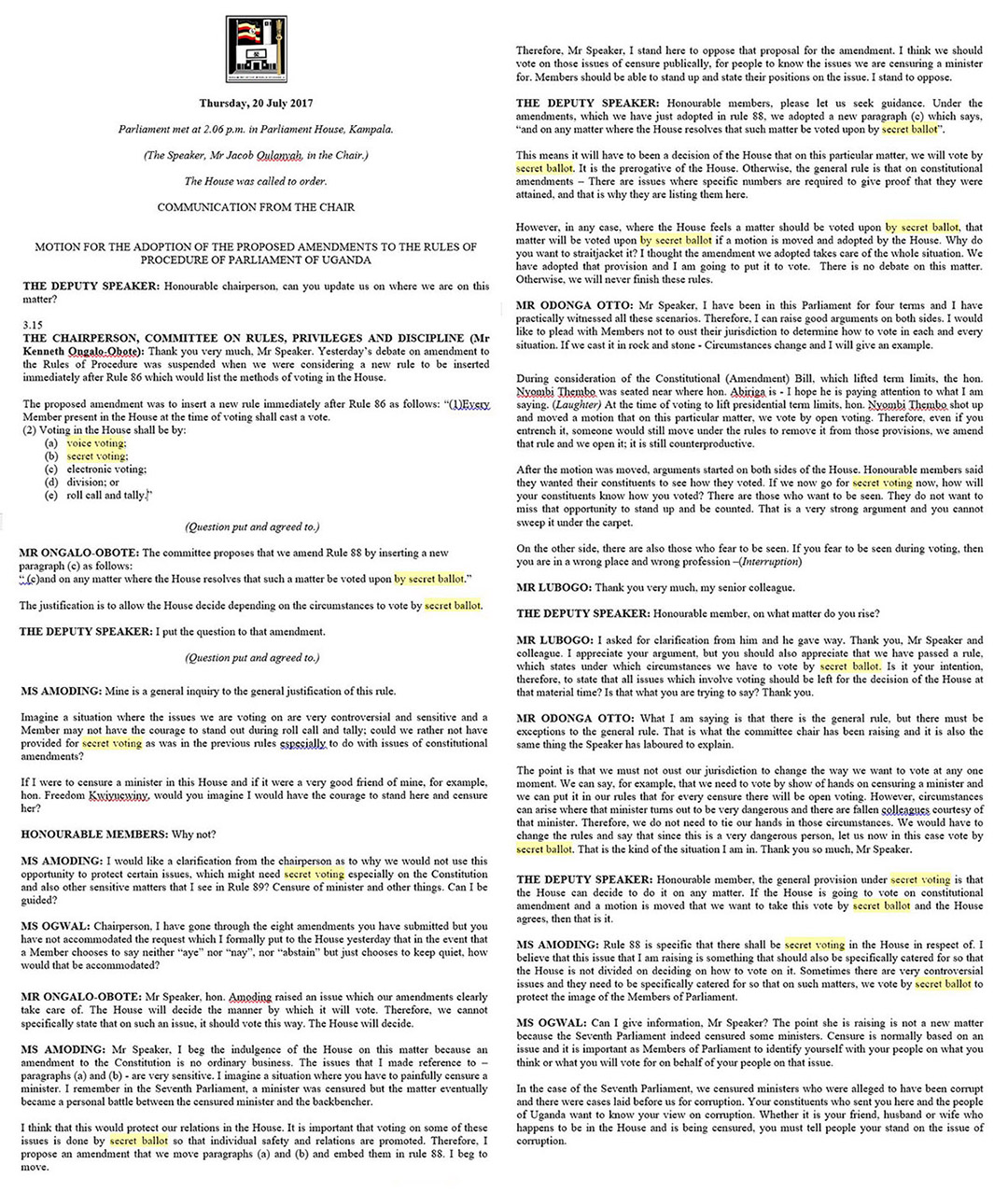
Uganda Parliament 2017 - Secret Ballots Prevent Intimidation
Note: For the full text pdf see link in above citation referencing Monicah Amoding

Uganda Parliament 2017 - Secret Ballots Prevent Intimidation
Singaporean Prime Minister Lee Kuan Yew, who presided over Singapore during a period of tremendous economic growth in that nation and throughout much of East Asia, notes that some of the most effective antipoverty initiatives were pursued "behind closed doors" by governments that were illiberal regimes by Western standards. Thus, while transparency may be an important path to better governance , it may not be the only path.Gregory Porumbescu, Albert Meijer, Stephan Grimmelikhuijsen - 2022
Government Transparency - State of the Art and New Perspectives
I can imagine two rebuttals to [the pro-transparency] argument. One is that people ought to be able to petition elected officials secretly, because disclosure can have a chilling effect. For example, in the present climate, Members of Congress might be less likely to meet with Muslim groups if they had to reveal every meeting. But Muslim groups, like all groups, have a constitutional right to petition the government for redress of grievances. Tester’s schedule shows meetings with many mom-and-apple-pie associations, such as “parents of children with disabilities” and the “Inter-Tribal Bison Cooperative.” It is conceivable that he wouldn’t want to show contacts with more controversial organizations and would therefore refuse to see them at all. The second argument is that secrecy actually protects elected officials from undue pressure from lobbyists.Peter Levine 2007
Sunlight, the best disinfectant
Starting with the Legislative Reform Act of 1970 to require a public record of all votes to amend bills in the House, continuing through the trumped-up “scandal” of House Bank overdrafts in 1991, and culminating in the almost-total abolition of earmarks in 2012, generations of high-minded public servants have labored to make the Congress more transparent, more accountable, and more democratic (with a lower-case “d”). Young idealists rebelled against the party elders, men like the Southern Democrats who had stood in the way of civil rights, or for that matter like the great bully Lyndon Johnson, who got the Civil Rights Act passed. The power of committee chairmen to trade favors and make back-room deals declined. And, at the same time, Congress kept getting more partisan, more ideological, and more dysfunctional.Sydney J. Freedberg Jr. 2013
Against Integrity: Why A More Corrupt Congress Could’ve Fixed The Fiscal Cliff
It is important, as we review the Muskie legacy, to understand several things: First, as I noted before, there were no federal laws of any kind on any subject which had deadlines, statutory standards, mandatory requirements or citizen enforcement rights. There was very little opportunity for the public to participate in policy decisions. There was very little government outreach. There was very little sunshine, a lot of darkness, and most public policy was at the discretion of the political appointees or bureaucrats. Second, consensus was a more effective tool for advancing public policy than was a confrontation. Members of Congress, House and Senate, actually got things done by working with their colleagues across the aisle. It was commonplace to have major policies cosponsored by members of both parties. Third, before 1973, the Committees of the Congress met behind closed doors. The concept of open decisions openly arrived at simply didn't exist. Fourth, there were very few "lobbyists" - people who plied the trade of influencing Members of Congress on behalf of specific clients. That is not to say they didn't exist. There just weren't that many. Fifth, campaigns were financed very differently. Senator Muskie's last campaign for United States Senate, in 1976, cost less than $160,000. Senator Muskie spent virtually none of his time raising money or calling contributors. He literally hated asking for money. While he had done that to a degree when he was a candidate for President, even then most of the fundraising was done by third parties. Sixth, political action committees, as we now know them, didn't exist. Business contributions to Members of Congress came from the pockets of the businessmen themselves, not their political committees. Corporate money could not be spent to create PACs and corporations could not contribute to federal campaigns (or to state campaigns in 22 states). It was the philosophy of elected Members of the Senate and the House which dictated the nature of the legislative initiative rather than the influence of the special interests who had endeared themselves to a Member through campaign largesse. Seventh, there were very few staff. The initial work by the Air and Water Pollution Subcommittee was done with personal staff assisted by bureaucrats seconded from the Public Health Service. The contributions of the Senator's Administrative Assistant Don Nicoll and his colleague Caleb Boggs' (R-DE) legislative assistant Bill Hildenbrand was critical to his early success. The 1970 Clean Air Act was the product of staff work of no more than 15 people and most of the staff recommendations were the responsibility of four key staff. Members were Members; staff were staff. And we were frequently reminded if we forgot the distinction.Leon J. Billings 2005
The Muskie Legacy (Climate)
A trade-off between transparency and effectiveness of parliamentary legislative activity does exist: a sort of ‘transparency trap’ for legislatures, having its main point of reference in the impairment of legislative committees’ decision-making capacity. Indeed, increased levels of transparency favor an institutional move towards assigning an overarching importance to the most sensational declarations and to populist tones, which can have an immediate echo in the media. Such a move, however, needs to fit in with the activity of bodies such as legislative committees, specialized by subject matter, in charge of drafting or amending legislative acts, often dealing with highly technical issues and within which compromises and negotiations are essential.Cristina Fasone & Nicola Lupo 2015
Transparency vs. Informality in Legislative Committees
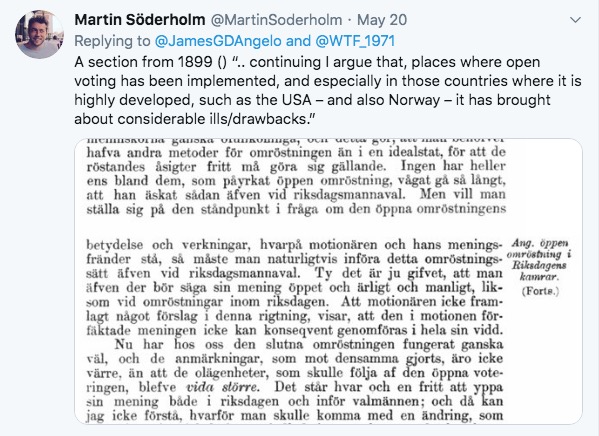
Swedish Parliament 1899 via Martin Söderholm (Sweden)
Text: A section from 1899 () "... continuing I argue that, places where open voting has been implemented, and especially in those countries where it is highly developed, such as the USA – and also Norway – it has brought about considerable ills/drawbacks"

Swedish Parliament 1899 via Martin Söderholm (Sweden)
A further argument against opening deliberations is that it will discourage candor and the proceeding will degenerate into selfserving speeches designed to cater to viewing voters. Senators, it is argued, will be more honest, reasonable and open-minded in private. Closed deliberations allegedly allow them more time to ponder the ramifications of their decisions before they commit themselves to an unwise course which would be difficult to reverse once publicly declared… Finally, some senators argued that opening deliberations would unduly politicize the discussions in the Clinton trial. They feared the Democrats would use them as a platform to attack Kenneth Starr and expose unpopular sentiments in favor of Clinton's removal. Alexander Hamilton warned us 200 years ago that impeachments were by their very nature political. It was for that reason the Founding Fathers lodged the impeachment power in the legislative branch. Marjorie Cohn 2000
Open-and-Shut: Senate Impeachment Deliberations Must Be Public
The article argues that increasing levels of transparency can impair committees’ lawmaking performance, so also undermining the lawmaking ability of their legislatures. In three very different legislatures (the US House of Representatives, the Italian Chamber of Deputies and the European Parliament), both in institutional architecture and committees’ legislative powers, the growing transparency of their legislative activity has caused a shifting of the legislative decision-making away from committees or, even, outside the legislature.Cristina Fasone & Nicola Lupo 2015
Transparency vs. Informality in Legislative Committees
As long as it is also believed that representatives should exercise a degree of independent judgement, then transparency can also have costs. I have argued that recent discussions of transparency in government have often overlooked this fact… With regard to polarization, while one might think that the institutional changes of the past forty years to promote openness in government should logically have reduced opinion polarization, the theoretical model presented here suggests why they may have actually had the opposite effect.David Stasavage 2006
Polarization and Publicity
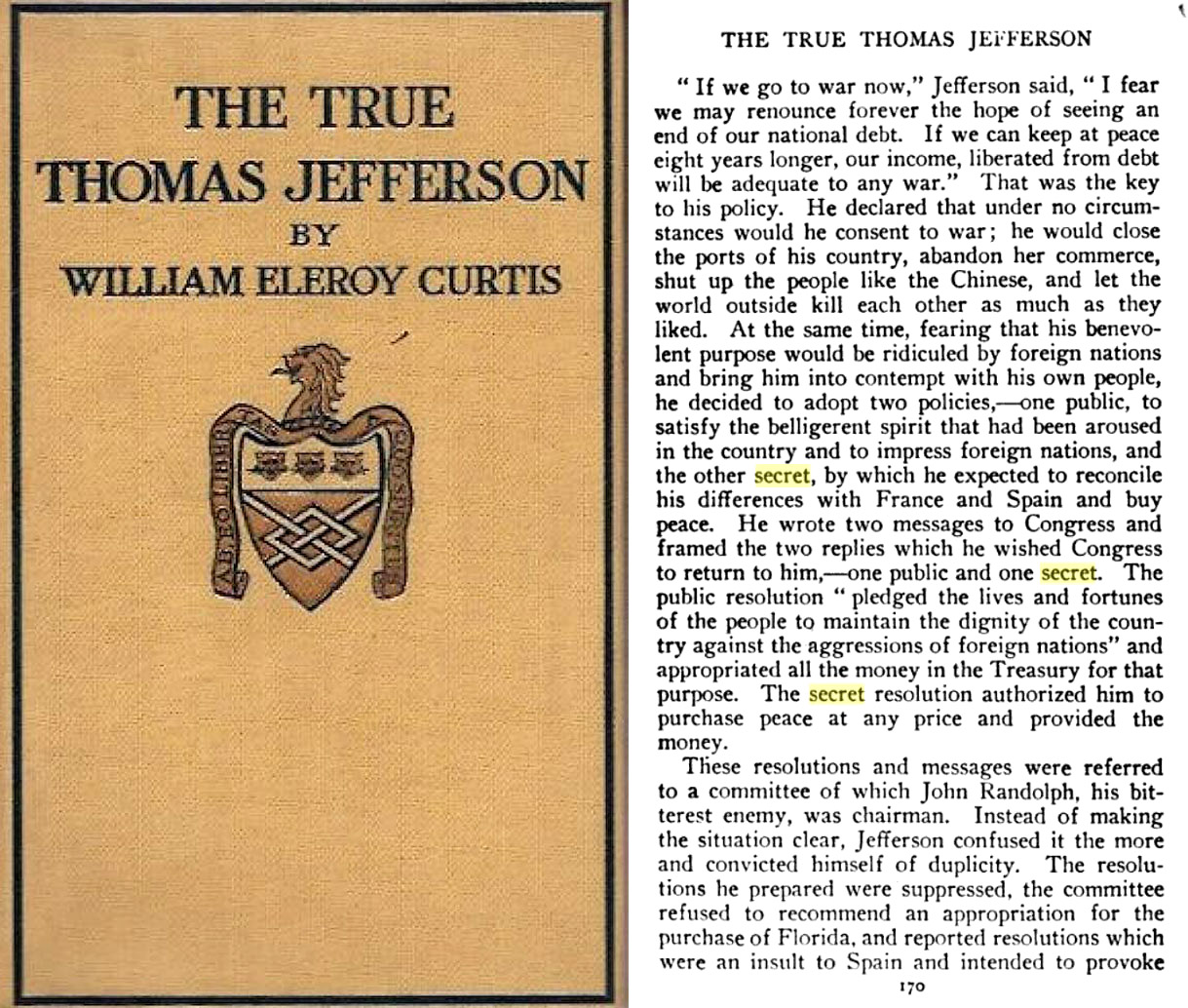
William Eleroy Curtis 1901 – The True Thomas Jefferson

William Eleroy Curtis 1901 – The True Thomas Jefferson
FDR put together a committee to come up with a plan to create a basic social safety net, but committee members could not make up their minds how to move forward. Perkins continued to hammer on the idea they must come up with a final plan, and finally locked the members of the committee in a room. As she recalled: “Well, we locked the door and we had a lot of talk. I laid out a couple of bottles of something or other to cheer their lagging spirits. Anyhow, we stayed in session until about 2 a.m. We then voted finally, having taken our solemn oath that this was the end; we were never going to review it again.”Heather Cox Richardson 2021
Letters from an American (Beginnings of Social Security)
Publicity of debate may prompt representatives to use their actions or statements as signals that they are being faithful to constituent interests. Under these conditions, publicity has the advantage of disciplining representatives, but it also implies that constituents will learn little from a debate in which representatives always take actions or make statements that are expected of them.David Stasavage 2006
Polarization and Publicity
First, we discuss different theories of decision making from which plausible causal mechanisms that may drive a link between transparency and legitimacy may be derived. We find that the common notion of a straightforward positive correlation is naïve and that transparency reforms are rather unpredictable phenomena.Jenny De Fine Licht, Daniel Naurin, Peter Esaiasson, Mikael Gilljam 2012
When Does Transparency Generate Legitimacy?
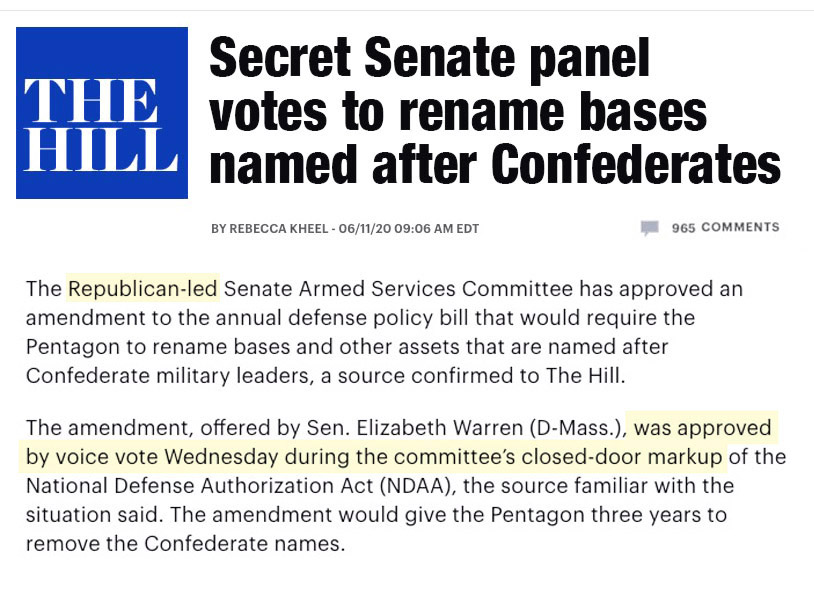
Rebecca Kheel 2020 – Republican Secret Senate Panel Endorses Elizabeth Warren Proposal to Rename Confederate Bases

Rebecca Kheel 2020 – Republican Secret Senate Panel Endorses Elizabeth Warren Proposal to Rename Confederate Bases
Too much publicity does not lead to more democracy. I think it's a basic human right that in order to become more wise every debate is an attempt to be to become more intelligent more knowledgeable and you have to be able to do that without everybody listening in order to do it right because you have to discuss difficult questions you have to have the right to make a mistake in order to learn how to overcome this mistake. When everybody is looking all the time you are so afraid to make a mistake that you don't really touch the real issues you don't touch the real way and you are not coming out of yourself you're playing a role you're an actor and not a citizen.Swiss Parliamentarian Andreas Gross 2010
How Much Democracy is Too Much?
And in another country, thought of as just as much a democracy, they will not have all their committee meetings…all open to the public. They will recognize that a certain amount of dialogue has to occur between representatives to reach a consensusAttorney George Kieffer 2010
How Much Democracy is Too Much?
Though openness in government has obvious benefits, recent scholarship has devoted less attention to the possibility that it might also have costs. I use a formal framework to investigate the effect of public versus private decision making on opinion polarization. Existing work emphasizes that public debate helps to reduce polarization and promote consensus, but I argue that when debate takes place between representatives the opposite may be true.David Stasavage 2006
Polarization and Publicity
The reforms of the 1970s opened up Congress so that instead of a few powerful people receiving lobbyists we had lots of independent entrepreneurs doing business. We suddenly had a huge bidding war, with 535 people vying for campaign money from special interest groups… What Vietnam and Watergate did was help destroy the public’s confidence in government itself. But I think the institutional forces that I mentioned are more central.Jonathan Rauch 1997
Sidebar to “Running Scared”
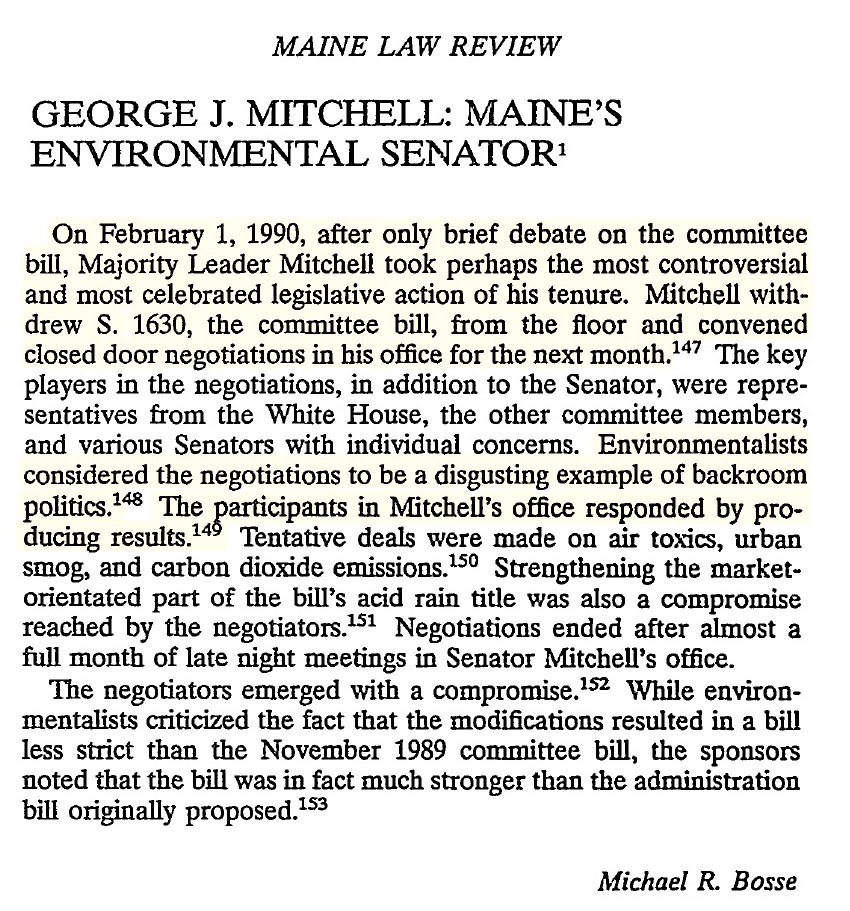
Michael Bosse 2018 – George Mitchell - Maine’s Environmental Senator (Climate)

Michael Bosse 2018 – George Mitchell - Maine’s Environmental Senator (Climate)
As though this were not enough, voters would know precisely who to blame for any price or tax rises that cook place: the politicians in Washington who voted for them. The decision to raise prices or taxes would be every elected politician’s worst fear – “traceable.”Anthony King 1997
Running Scared
Our results suggest that enhancing the transparency of politics may not be a desirable thing to do. In particular, our analysis has pointed out a particular mechanism that may generate a perverse relationship between the transparency of politics and the quality of politicians.Andrea Matozzi & Antonio Merlo 2007
The Transparency of Politics and the Quality of Politicians
It will be a fraud that can only lead to greater public disillusionment, however, if members fail to explain that all the sunshine reforms in the world cannot (and should not) put the totality of legislative politics on public display.Richard Fenno 1977
Congress Reconsidered – 1st Ed
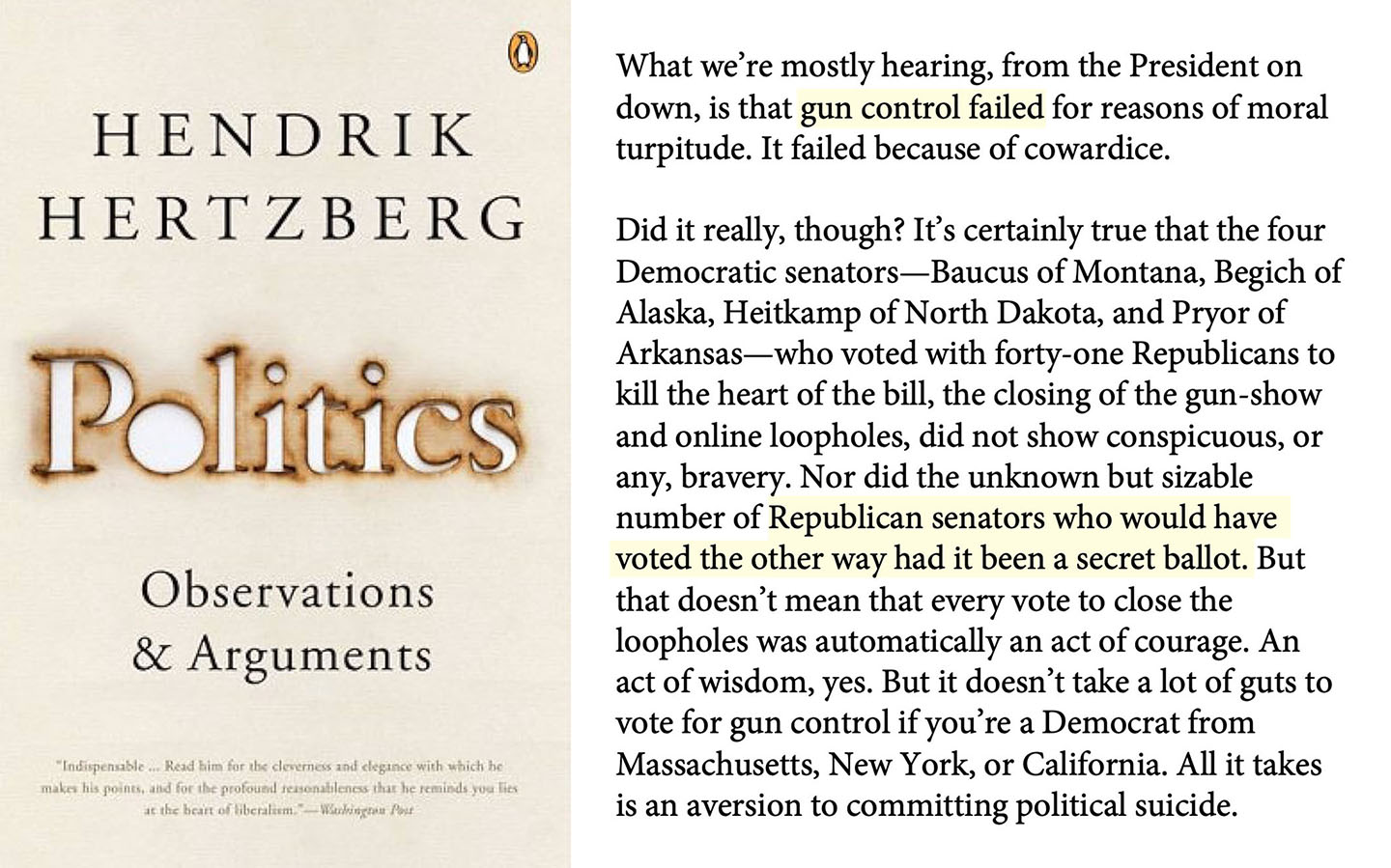
Hendrik Hertzberg 2014 - Gun Shy
Text: It’s certainly true that the four Democratic senators—Baucus of Montana, Begich of Alaska, Heitkamp of North Dakota, and Pryor of Arkansas—who voted with forty-one Republicans to kill the heart of the bill, the closing of the gun-show and online loopholes, did not show conspicuous, or any, bravery. Nor did the unknown but sizable number of Republican senators who would have voted the other way had it been a secret ballot. (gun control)

Hendrik Hertzberg 2014 - Gun Shy
While the two streams of reform may enhance the representative possibilities of Congress, we should also acknowledge that they will probably slow down the productivity of Congress. The greater the fragmentation of influence, the harder it is to develop or assert internal leadership. And the more open the internal operation, the easier it is for external groups to interpose their wishes at all stages of the process. That is, the weaker the leadership and the more the external demands, the slower will go the lawmaking. If what we want from Congress is action, neither type of reform can be viewed as a blessing.Richard Fenno 1977
Congress Reconsidered – 1st Ed
Others have made attempts to discredit what is described as “secret diplomacy,” without reflecting that negotiation, if it is to be successful, cannot be carried oon upon the housetops… Nothing is to be gained by taking the world prematurely in the confidence of governments in regards to matters of high policy.Ernest Satow 2011
A Guide to Diplomatic Practice
Open negotiations incline negotiators to consider their own prestige and to maintain the arguments… with undue obstinacy and prevent them from giving way to the frequently superior arguments of the occasion.Louis XIV 1680
Efficient Secrecy (Kurizaki)
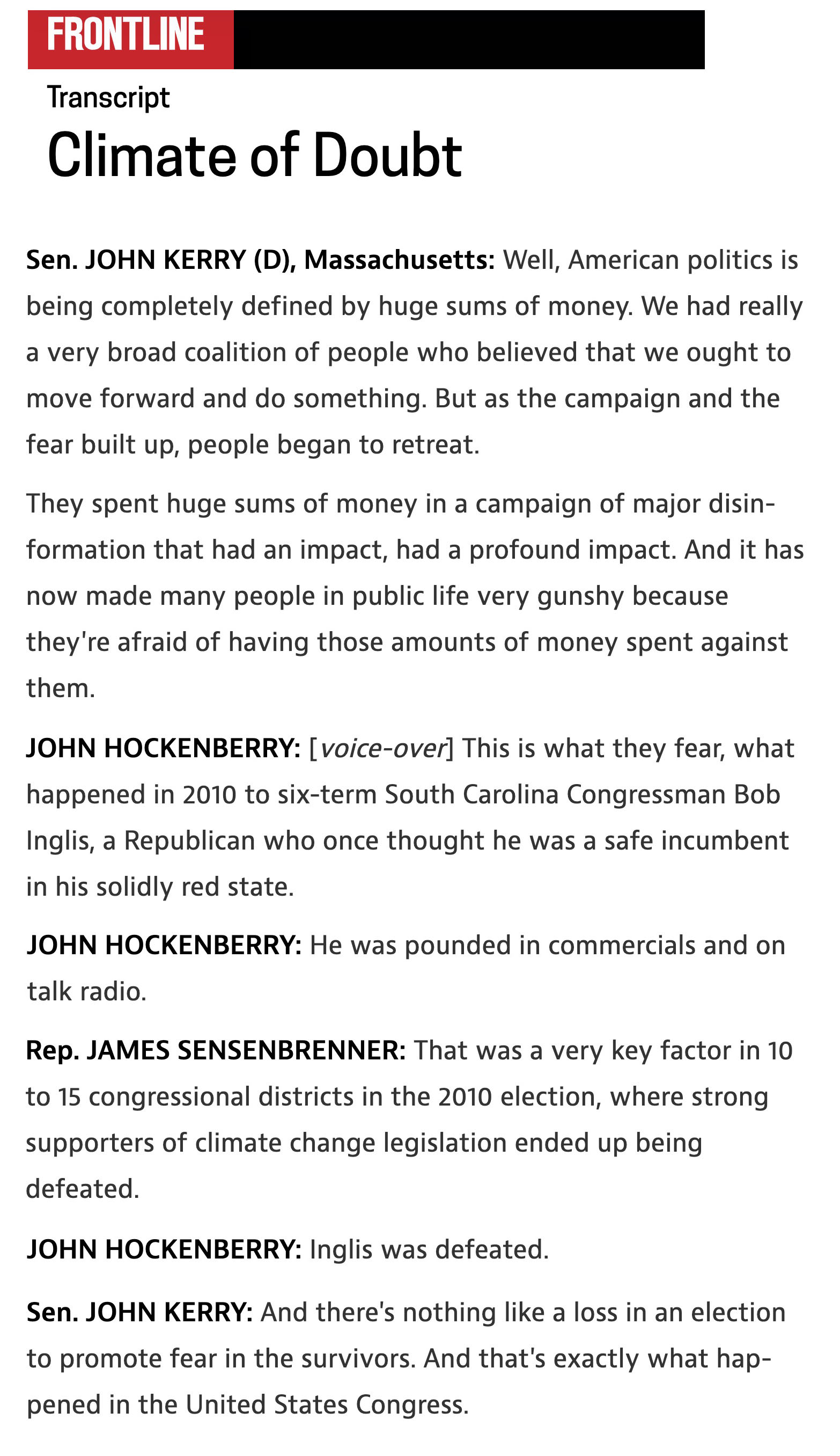
Frontline 2012 - Climate of Doubt
Note: Bob Inglis was a revered Republican congressman and a presidential hopeful, until he began to address climate change. Big oil (Tea Party) destroyed him in the primaries via negative ads that had little to do with climate. This terrifying message reverberates still through all modern day Republican primaries - “make a move on climate change you moderate Republican and big oil will gun you down!” Given that all of Inglis’ congressional votes and committee actions were required to be public actions, he had little alternative but to address the problem of climate head on. But in years past this wasn’t the case. Republicans were able to vote secretly about climate issues in both 1970 and 1990 and powerful environmental laws were passed. Ironically, global warming may be the the result of too much congressional sunshine.

Frontline 2012 - Climate of Doubt
Rhode Island’s Claiborne Pell feared that “the presence of television will lead to more, longer, and less relevant speeches, to more posturing by Senators and to even less useful debate and efficient legislating than we have today.”… Russell Long from Louisiana also argued against the proposal, claiming that senators would posture in front of the cameras and that television would attract senators to the chamber floor when they should be doing the important work in committee meetings. Others feared that some senators, in an effort to compete with their House colleagues, would enlist the services of elocution coaches and even makeup experts. William Proxmire from Wisconsin, another opponent of televised proceedings argued that television would make if harder for Senators to reach compromises in private because “senators will find that the positions they took in their opening statements have been engraved in film.” “Television thrives on the dramatic,” Proxmire said, and “any additional incentives to confrontation can only mean more argument – and probably worse legislation.”David B. Frost 2017
Classified - History of Secrecy
Secrecy, like openness, remains an essential prerequisite of self-governance. To be effective, even many of the most mundane aspects of democratic rule, from the development of policy alternatives to the selection of personnel, must often take place behind closed doors. To proceed always under the glare of the public would cripple deliberation and render government impotent. And when one turns to the most fundamental business of democratic governance, namely, self-preservation—carried out through conduct of foreign policy and the waging of war—the imperative of secrecy becomes critical, often a matter of survival. Even in times of peace, the formulation of foreign and defense policies is necessarily conducted in secret.Gabriel Schoenfeld 2011
Necessary Secrets
All these [sunshine] reforms were made with good intentions in mind, but did come with one downfall; now, not only did American citizens have access to their representatives, unlike before, but so too did lobbyists. More often than not, representatives of special interests, not US citizens, took advantage of open congressional committee meetings and submitted Freedom of Information Act requests (Kennon & Rogers 1989, Pozen 2017). Furthermore, Congress members favored special interest donations over individual contributions in the campaign finance amendments, which “diminished the character of Congress but now seem impervious to change by a Congress elected under them” (Herbers 1982, para. 15).
With this newfound transparency to members of Congress and legislative proceeding s, lobbying increased exponentially throughout the 1970s. Between 1968 and 1978, the number of corporations with public affairs offices in Washington, DC multiplied by five, from 100 offices to over 500 (Ranalli et al 2018). Additionally, between 1971 and 1982, the number of registered lobbyists located in Washington, DC grew from 175 to 2,445 (Drutman 2015). In a similar vein, the total number of lobbyists for corporations in Washington, DC grew from roughly 8,000 in 1974 to near 15,000 in 1978 (Wilson 1981). Even with the rise of lobbying in Congress, members still found loopholes to get around the transparency found in the Sunshine Law. For example, members found “they could conduct important business in closed, informal sessions in which they could speak confidently and get around the law” (Herbers 1982, para. 15).
Since the government implemented Sunshine laws, scholars now understand that “open door committees and public roll-call votes lead to gridlock, partisanship, legislative warfare, soaring campaign finance, and special interest capture” (D’Angelo & Ranalli 2020, par. 1). Prominent congressional scholars have also been critical of the impact of Sunshine laws (Arnold 1990; Binder 2006; Fenno 1977; Wolfensberger 2000). For example, Arnold wrote: “Two decades later, after the advent of sunshine laws, we know better. Open markup sessions often given organized interests a powerful advantage over inattentive citizens, for they can monitor exactly who is going what to benefit and hurt them” (1990, p. 131 ).
Kaylar Recker 2023
Congressional Corruption and Reform Efforts:
A Tale of Two Efforts Gone AwryNOTE: This article is just one of many in a book edited by Michael J. Pomante II titled Scandal and Corruption in Congress. Oddly the book appears focused on rethinking corruption and taking in new ideas, yet finds itself grounded in the discredited narrative of venal legislators. The book makes over a 100 references to bribery (though scholars continue to show that bribery is not a driving factor), while it entirely ignores intimidation, something which is cited endlessly by scholars and others.
In the early seventies, Public Works Committee staffers conceived some of the Clean Water Act’s more radical features and helped channel the ecological knowledge that inspired them. Even so, the final product grew out of an extended conversation among the senators themselves behind closed doors. During their colloquy, they vetted the feasibility of the legislation’s objectives…Party affiliation certainly colored individual opinions, but the senators’ cooperative efforts and collective identity as legislative policy specialists tended to trump partisan differences. The result was a water pollution bill whose content surprised both sides of the political divide… Yet, much to his chagrin, in 1972, Muskie found himself defending the Clean Water Act’s provisions from both its foes as well as its putative friends.Paul Charles Milazzo 2016
Unlikely Environmentalists: Congress and Clean Water, 1945 - 1972 (Climate)NOTE: This next citation is from book introduction and highlights how legislative action preceded public action: “Environmental activism has most often been credited to grassroots protesters, but much early progress in environmental protection originated in the halls of Congress. As Paul Milazzo shows, a coterie of unlikely environmentalists placed water quality issues on the national agenda as early as the 1950s and continued to shape governmental policy through the early 1970s, both outpacing public concern and predating the environmental movement.”
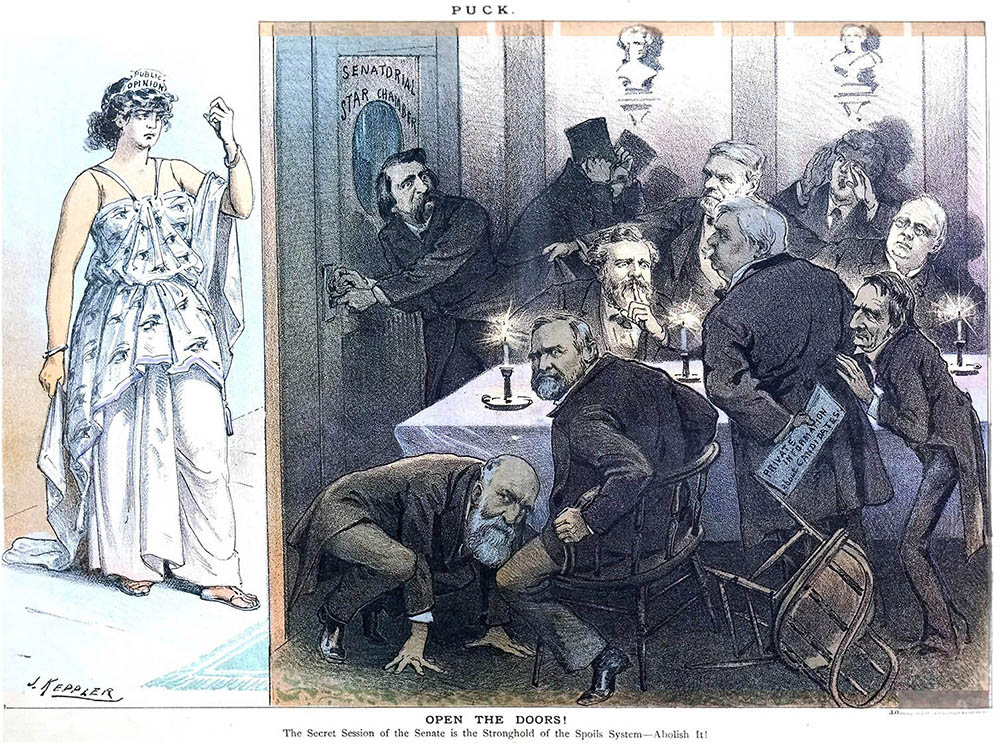
Joseph Keppler 1886 - Open The Doors: The Secret Session of the Senate is the Stronghold of the Spoils System - Abolish It!
Note: According to author Donald Ritchie in the book "Press Gallery" 1991, the newspapers (including Puck via this 1886 cartoon) constantly ridiculed Congress for their secret sessions. But, as he notes, the very newspapers that were so excited to remove the secrecy failed to show up to observe Congress when the doors were opened. The galleries remain to this day mostly empty with a scattering of lobbyists.

Joseph Keppler 1886 - Open The Doors: The Secret Session of the Senate is the Stronghold of the Spoils System - Abolish It!
[Fearful of lobbyists from both sides of the issue, members wrote environmental policy behind] closed doors during the summer and fall of 1971. Senate staff members had deliberately limited access to external petitioners. The committee's relationship with industrial organizations in particular was often antagonistic, but Leon Billings and Tom Jorling also kept environmentalists at arms length to avoid “endless sub-negotiations” over the “smallest details.”Paul Charles Milazzo 2016
Unlikely Environmentalists: Congress and Clean Water, 1945 - 1972 (Climate)NOTE from book introduction: Environmental activism has most often been credited to grassroots protesters, but much early progress in environmental protection originated in the halls of Congress. As Paul Milazzo shows, a coterie of unlikely environmentalists placed water quality issues on the national agenda as early as the 1950s and continued to shape governmental policy through the early 1970s, both outpacing public concern and predating the environmental movement.
I was calling in simply because I had been for a long time, the minority staff director of one of the congressional committees and I was going to offer a comment on this issue of open versus closed meetings. Prior to the adoption of the rule requiring open markups and open conferences, I think that the process of a executive session for the consideration of a bill was a far more meaningful process because the members came in and really, honestly debated many of the issues. Whereas, I think today the tendency is to resolve most of the more controversial questions before you get to the markup. And it in turn becomes almost a pro-forma show for the audience without any real serious hard give-and-take among the members when they're standing there in front of the audience. They're playing to the audience. Whereas in a closed session, they tended to really be addressing each other seriously on the issues. I can recall back when, for example, we held markups on some of the early environmental laws on NEPA, for example, the Endangered Species Act and various other environmental bills. This is in the house Merchant Marine Committee. If we had been having an open session it would have been a disaster.CSPAN caller
Jacqueline Calmes 1987 Closed Door Meetings C-SPAN (Climate)
Getting the bill through committee hearings meant dodging hundreds of lobbyists – Mr. Packwood once called them “assassins” – who dogged his path for two months. It also meant dealing with bickering Senators on the committee. When it looked as if the bill would be killed by special interests, Mr. Packwood ordered members behind closed doors. The panel finally voted 20-0 for the measure and gave the chairman a standing ovation.UPI/NY Times 1987
Tenacious Packwood Saved Tax Bill
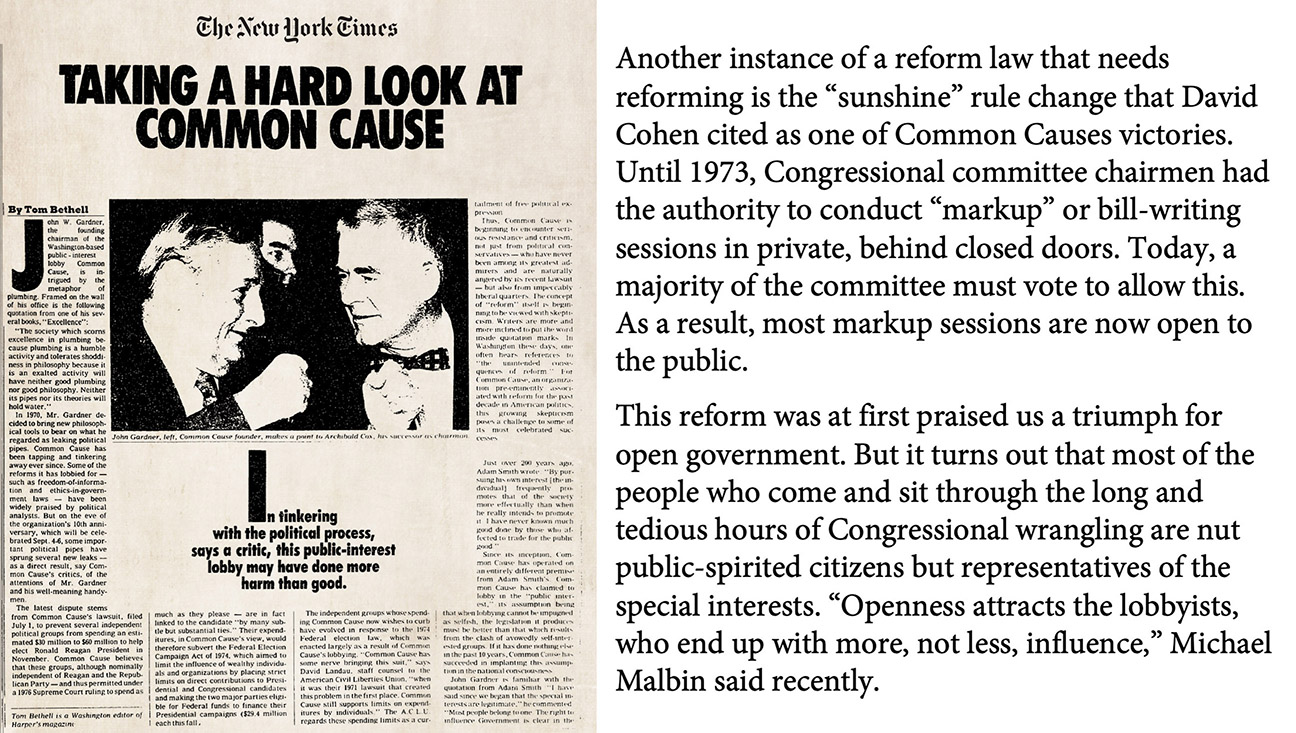
Tom Bethell 1980 - Taking a Hard Look at Common Cause
Written in bold under the photo: In tinkering with the political process, says a critic, this public-interest lobby (Common Cause) may have done more harm than good.

Tom Bethell 1980 - Taking a Hard Look at Common Cause
Another instance of a reform law that needs reforming is the “sunshine” rule change that David Cohen cited as one of Common Causes victories. Until 1973, Congressional committee chairmen had the authority to conduct “markup” or bill-writing sessions in private, behind closed doors. Today, a majority of the committee must vote to allow this. As a result, most markup sessions are now open to the public. This reform was at first praised us a triumph for open government. But it turns out that most of the people who come and sit through the long and tedious hours of Congressional wrangling are nut public-spirited citizens but representatives of the special interests. “Openness attracts the lobbyists, who end up with more, not less, influence,” Michael Malbin said recently.Tom Bethell 1980
Taking a Hard Look at Common Cause
Too much sunshine actually burns and I think in some cases we’ve got to be concerned about how much transparency there is because it has had a very stilting affect. It has caused a constraining environment in regards to Members’ ability to express themselves in an honest and candid way as discussions are held on legislation.Tom Daschle 2014
C-SPAN Tom Daschle on Bipartisanship (18 minutes 29 seconds)
In this climate, the first nationwide air pollution standards were crafted with Billings, typewriter at the ready. Provision by provision, negotiated behind closed doors – as was legal then – with Democrats and Republicans.Jayme Fraser 2016
Progressive era inspired Clean Air, Clean Water acts (Climate)
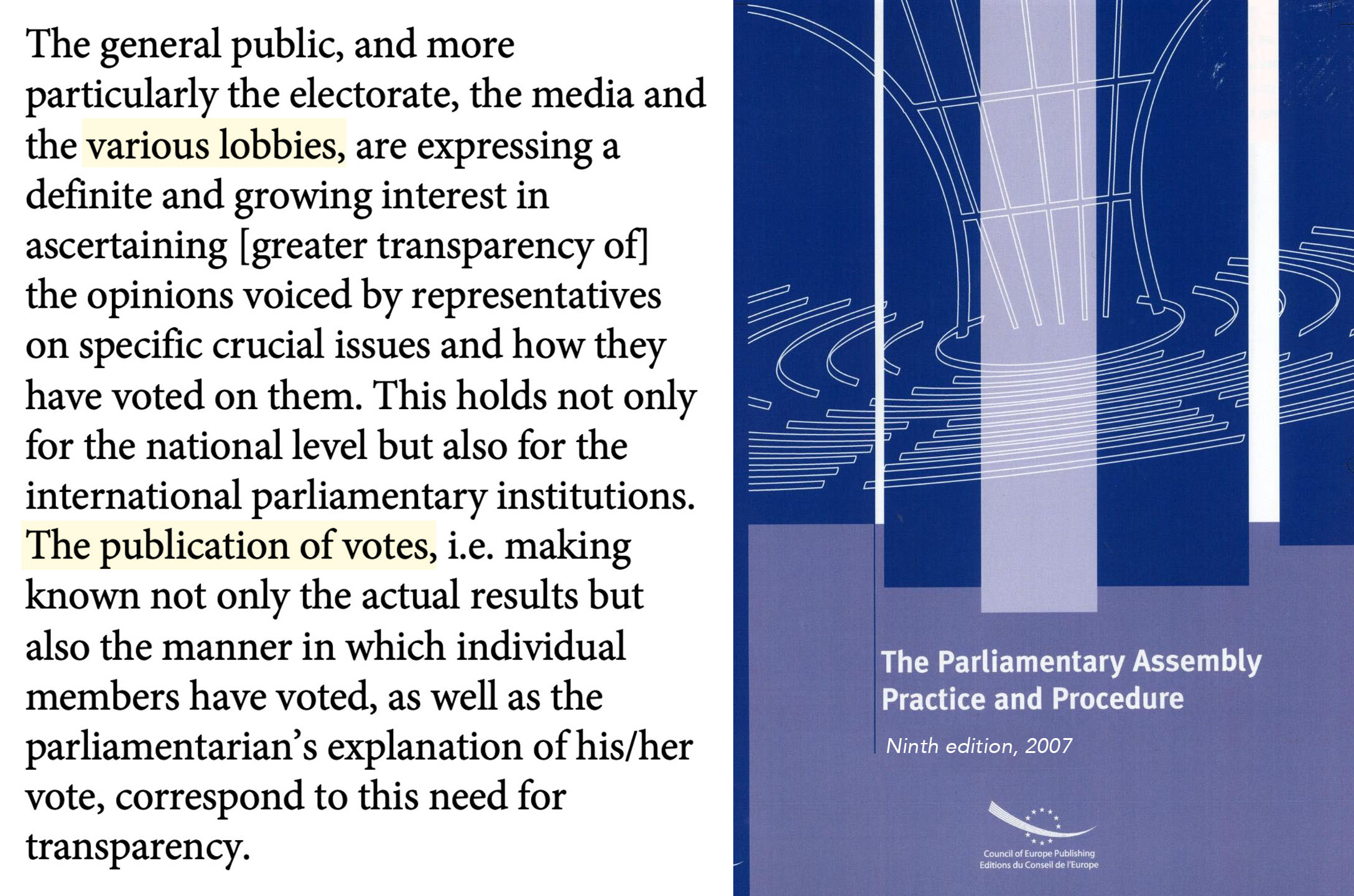
Parliamentary Assembly 2007 - European Union Lobbies Seek Transparency
Text: The general public, and more particularly the electorate, the media and the various lobbies, are expressing a definite and growing interest in ascertaining [greater transparency of] the opinions voiced by representatives on specific crucial issues and how they have voted on them. This holds not only for the national level but also for the international parliamentary institutions. The publication of votes, i.e. making known not only the actual results but also the manner in which individual members have voted, as well as the parliamentarian’s explanation of his/her vote, correspond to this need for transparency.

Parliamentary Assembly 2007 - European Union Lobbies Seek Transparency
A legislator can hardly turn around or make a move in the corridors of the State House without being confronted with a veiled threat of the effect on his political fortunes of a vote for or against a particular proposition. Sometimes the threat is not very well veiled.Henry Parkman, JR 1938
Lobbies and Pressure Groups: A Legislator's Point of View
The clear merit of the position in favor of maintenance of high standards… almost went down before the intensity and the violence of an organized onslaught, conducted largely by methods of terrorism under the cloak of opening the door of opportunity to the poor man.Henry Parkman, JR 1938
Lobbies and Pressure Groups: A Legislator's Point of View
Most important — and completely ignored by the champions of transparency — is the fact that even the most conscientious citizens, dedicated to following public affairs, have but one vote to weigh in on myriad issues. Most of the time, citizens cannot vote up or down any specific program. Exceptions include some local or state initiatives, such as bonds for schools or referenda on social issues like gay marriage. However, most of the time, especially at the national level, voters cannot be in favor of, say, much more funding for climate change, only a little more funding for ocean exploration, and less funding for bombers (or any such other combination). Rather, all they can do is vote up or down their representative, who, in turn, votes on many scores of programs. Amitai Etzioni 2014 – Atlantic
Transparency is Overrated
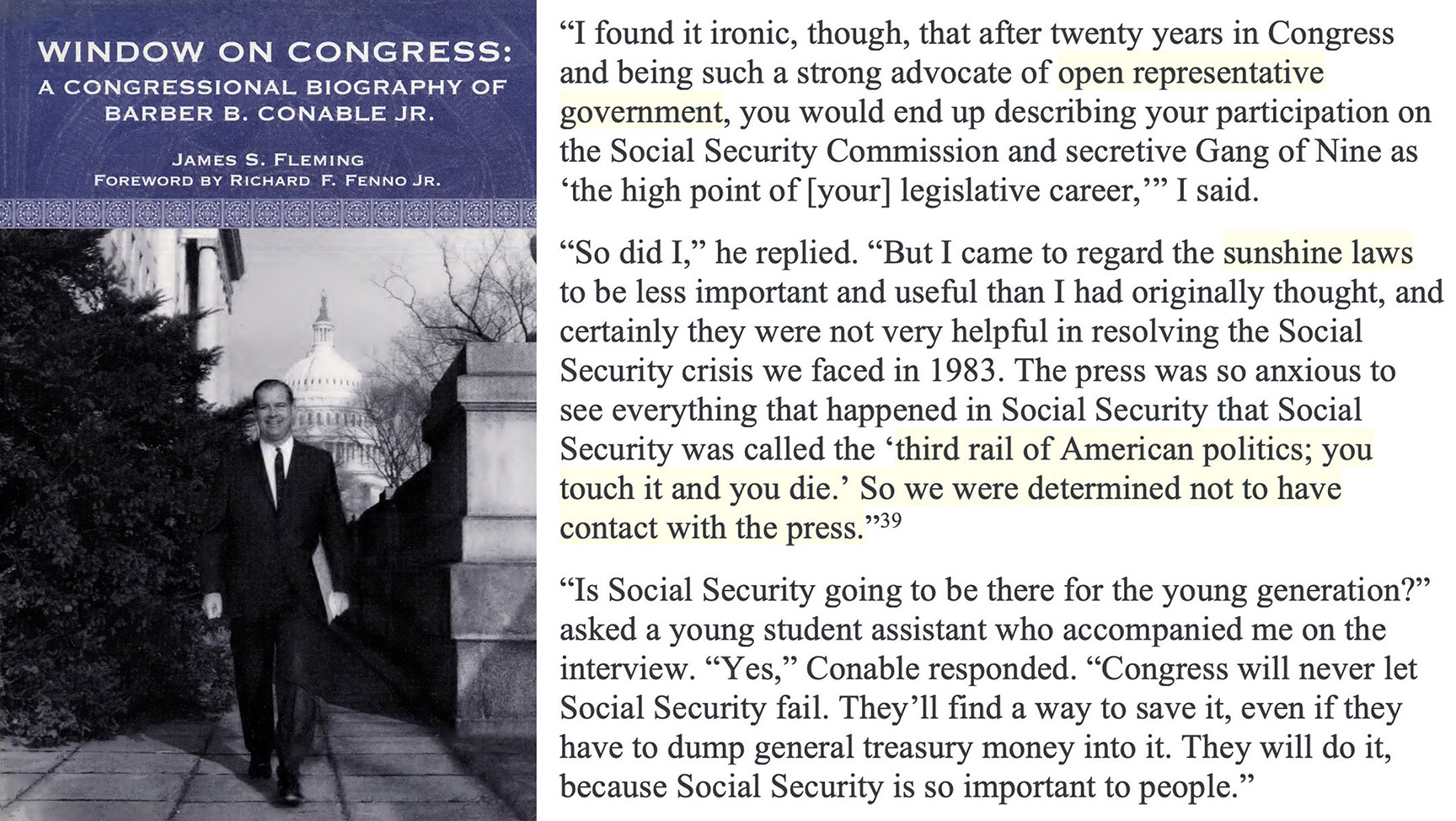
Barber B. Conable, Jr 2004 - Pitfalls of Sunshine Laws
TEXT: “I found it ironic, though, that after twenty years in Congress and being such a strong advocate of open representative government, you would end up describing your participation on the Social Security Commission and secretive Gang of Nine as ‘the high point of [your] legislative career,’” I said. “So did I,” he replied. “But I came to regard the sunshine laws to be less important and useful than I had originally thought, and certainly they were not very helpful in resolving the Social Security crisis we faced in 1983. The press was so anxious to see everything that happened in Social Security that Social Security was called the ‘third rail of American politics; you touch it and you die.’ So we were determined not to have contact with the press.” “Is Social Security going to be there for the young generation?” asked a young student assistant who accompanied me on the interview. “Yes,” Conable responded. “Congress will never let Social Security fail. They’ll find a way to save it, even if they have to dump general treasury money into it. They will do it, because Social Security is so important to people.”

Barber B. Conable, Jr 2004 - Pitfalls of Sunshine Laws
If the collegial body were to open such meetings to the public, their effectiveness, in terms of the free flow of ideas and exchange of views, would be crippled… Candid debate shrinks from the public gaze, with grandstanding a frequent substitute… The Sunshine Act should tolerate more darkness.Bevis Longstreth 1983
A Little Shade, Please
If administrators had to do everything in the open, they might be forced to express only safe and uncontroversial views, and thus to bypass creative or still tentative ideas. As a result, they might end by assuming hasty and inadequate positions. Chances to learn might be lost; premature closure with respect to difficult issues would become more likely. In order to create a pattern out of chaos and avoid haphazard choices, administrators must be able to consider and discard a variety of solutions in private before endorsing some of them in public; the process of evolving new policies requires a degree of concealment. For these reasons, unfinished drafts and memoranda and bargaining positions in negotiations are often kept secret, though the final statements are not. Sissela Bok 1982
Secrets - On the Ethics of Concealment
Since the markup session involves the refinement of language, resolving conflict on concepts, and differences of opinion on the ultimate intent of a bill under consideration, the markup sessions are usually closed to the general public and to lobbyists. This has caused some consternation among lobbyists, since they think that the “give and take” inherent in these sessions should be subject to public scrutiny and to their influence… [But] those not familiar with the inner workings of the legislative process often misinterpret the markup sessions as “closed” sessions in the sense of secret deliberations. All members of Congress know that the markup session is deliberation in its finest form.Thomas Bradford Curtis, Donald L. Westerfield 1992
Congressional Intent
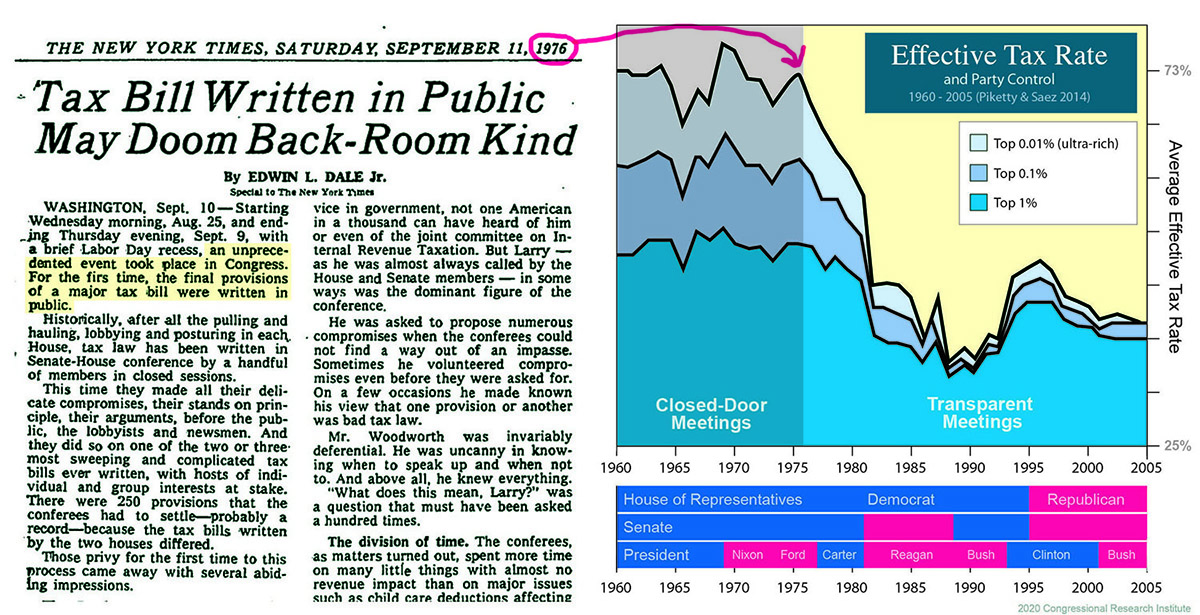
Edwin L. Dale Jr 1976 - Tax Bill Written in Public May Doom Back-Room Kind
TEXT: Starting Wednesday morning, Aug. 25, and ending Thursday evening, Sept. 9, with a brief Labor Day recess, an unprecedented event took place in Congress. For the first time, the final provisions of a major tax bill were written in public. Historically, after all the pulling and hauling, lobbying and posturing in each House tax law has been written in Senate-House conference by a handful of members in closed sessions. This time they made all their delicate compromises, their stands on principle, their arguments, before the public, the lobbyists and newsmen. And they did so on one of the two or three. most sweeping and complicated tax bills ever written, with hosts of individual and group interests at stake. There were 250 provisions that the conferees had to settle—probably a record—because the tax bills written by the two houses differed. (Article written precisely at the beginning of open committees in Ways and Means, Senate Finance and confrence committees. It corresponds precisely with the massive drop in effective taxation on the wealthy. Just after Wilbur Mills was ousted.)

Edwin L. Dale Jr 1976 - Tax Bill Written in Public May Doom Back-Room Kind
When Rupert Murdoch’s Boston Herald offended Massachusetts Senators Kennedy and Kerry, they conspired behind closed doors with liberal and conservative legislators from both parties to pass, without debate, a bill that required Murdoch to sell the paper or lose his Boston television station.Michael McMenamin 2008
The '80s Will Be Remembered (Fox News)
As the British Francks Committee wrote in 1972, ministers and administrators must, in order to present clear issues to Parliament and to the electorate, be able in some instances and at some stages ‘to argue out all the possibilities with complete frankness and free from the temptation to strike public attitudes.‘Michael Dougan 2012
Empowerment and disempowerment of the European Citizen
In the eighteenth century, the sovereigns in question were usually individuals. Today they are hundreds of legislators, millions of newspaper readers, radio listeners, or television viewers. Particularly, our sovereigns are voters and they are the subject of every kind of mass appeal and mass flattery by those who want their votes. In such circumstances the inflexibility which open negotiation encourages is apt to harden into complete rigidity.Lester B. Pearson 1955
Democracy in World Politics
Almost everyone connected with the process agrees the legislation being written would be even more riddled with gifts to special interests if it were being done in public. Supporters of closed sessions argue that it speeds the process since members don’t feel as much need to posture on issues for an audience and that it provides protection from lobbyists for special interests.Lea Donosky 1985
Tax Reform Behind Closed Doors
With the media, ordinary citizens, and campaign contributors watching, they must take care to protect their electoral flanks. Increasingly, committees have resorted to “executive” or “informal” sessions, held prior to official meetings, where the members can talk freely and develop compromises without the intrusive presence of outsiders. In formal meetings legislators may do little more than ratify agreements reached in private. Rep. Bill Frenzel (R-Minn.), who began his legislative service as a self-proclaimed “open meeting freak,” observed that “since our meetings have been closed, our work has been less flawed… and our consensuses much stronger. I think it’s the only way to fly.” The presence of lobbyists and administrative officials at public sessions – where they can monitor members’ behavior, offer the texts of amendments, and notify their employers when and where to apply pressure – may have made it more difficult for committees to act decisively, to be responsible.
The rise of single-interest groups and PACs during the reform era may have made legislators less willing to risk offending any potentially decisive electoral force. Prudent lawmakers may feel obliged to resist party or presidential calls for support. Previously, members could affirm their support undetected, in the quiet of the committee room, or in a standing or teller vote on the floor, but at present there are dangers in doing so. Members may be loath to act at all, preferring to entrench themselves as ombudsmen and claiming credit for serving the district; or they may limit their policy making to “position taking” – choosing sides on substantive questions only when it is safe to do so. They may even obfuscate their stands to minimize the danger of being caught on the wrong side of a policy issue that turns out to be controversial.Larry Rieselbach 1994
Congressional Reform
There are times, perhaps, when issues are better resolved in a more private and orderly environment than in the committee room open to the media and the public. This is accomplished, however, through “executive sessions” of the full committee, and not with lobbyists approaching congressmen one by one, separate and apart. Quiet diplomacy and compromise are hard to accomplish in the glare of news cameras and when parties to the hearing are competing for the public spotlight. Curtis & Westerfield 1992
Congressional Intent
May a Senate Vote to Remove by Impeachment be Taken by Secret Ballot? In theory yes, but it would be poor constitutional practice. The Rules of Procedure currently stipulate that each senator announce his or her vote on each Article of Impeachment. Two-thirds of the Senate (67 senators) would need to approve an amendment or suspension to this rule. Thus, in theory the Senate could specify that the impeachment vote be conducted by secret ballot. As an historical matter, Congress twice broke Electoral College gridlock by the House picking the president by secret ballot, electing Thomas Jefferson in 1800 and John Quincy Adams in 1824. Article 1, Section 5, of the Constitution states that one-fifth of the senators present can oppose a secret ballot on “any questions,” defined as “[a]ny matter on which the Senate is to vote, such as passage of a bill, adoption of an amendment, agreement to a motion, or an appeal,” but makes no mention of impeachment proceedings. But just before this requirement is the language: “Each House shall keep a Journal of its Proceedings, and from time to time publish the same, excepting such Parts as may in their Judgment require Secrecy,” which might be construed to permit secret balloting. Insofar as the Senate has relatively untrammeled power to make its own rules governing each impeachment proceeding, in theory those rules could include a secret ballot. Russ Feingold (D) and Chuck Hagel (R) 2019
Presidential Impeachment Trial
An appropriations committee member explains how disagreements are handled in the mark-up session when members retire behind closed doors to work out their recommendations. “If there’s agreement, we go right along. If there’s a lot of controversy we put the item aside and go on. Then, after a day or two, we may have a list of ten controversial items. We give and take and pound them down till we get agreement.”Wildavsky, Aaron B 1964, 1974
The Politics of the Budgetary Process
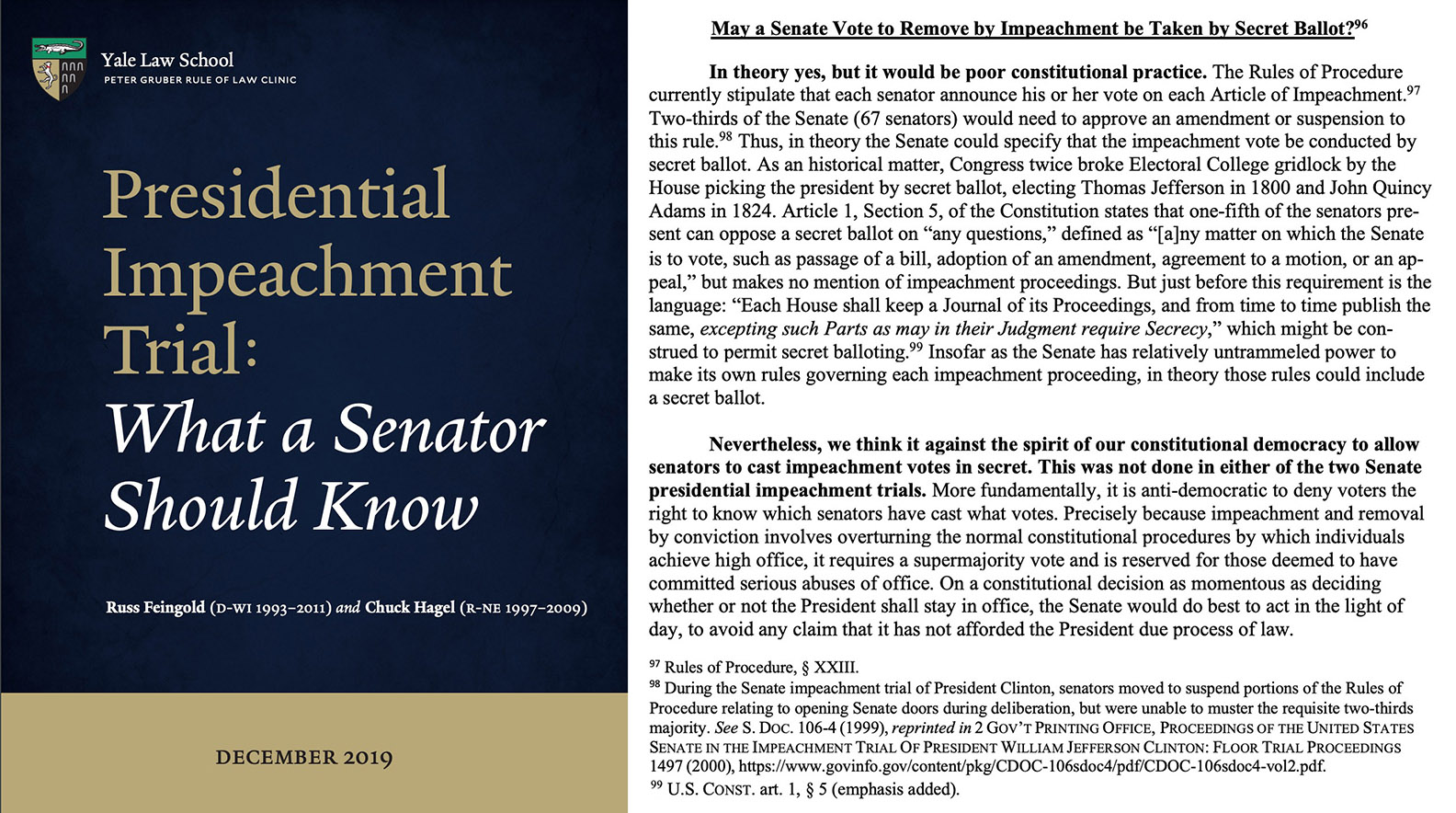
Russ Feingold (D) and Chuck Hagel (R) 2019 – Presidential Impeachment

Russ Feingold (D) and Chuck Hagel (R) 2019 – Presidential Impeachment
In my study of committee assignments in the U.S. House of Representatives (Shepsle 1978), I encountered a practice among committee makers on the Committee on Committees (CC) known as peeking. In the CC each member was responsible for a geographic zone, and sought to get “good” committee assignments for legislators from his or her zone. This typically involved bargains and deals among CC members, viz., “I’ll support your person for committee x if you support mine for committee y.” But balloting in the CC for committee assignments was done secretly; the only public information was the total number of votes for each committee-assignment candidate, not which CC members voted for whom. Members therefore wondered whether “deals struck stayed stuck.” There developed the practice of asking, at the time of a vote, “Did you vote for my person as you promised? Show me your ballot (let me peek at it).” It was surely possible in practice to obtain another CC member’s support, so feasibility was not at issue. But his or her statement of intent, without an ability to monitor compliance, cast a shadow on such deals (alleviated at least occasionally by the glare of peeking).Kenneth Shepsle 1996
Political Deals in Institutional Settings
If transparency has no meaningful effects, then the idea of transparency can lose its purpose. If corrupt practices continue after they have been made transparent, “public knowledge arising from greater transparency may lead to more cynicism, indeed perhaps to wider corruption.”Mike Ananny & Kate Crawford 2016
Seeing without knowing: Limitations of the transparency ideal
The imagined marketplaces of total transparency have what economists would call perfect information, rational decisionmaking capabilities, and fully consenting participants. This is a persistent fiction.Mike Ananny & Kate Crawford 2016
Seeing without knowing: Limitations of the transparency ideal
Transparency does not necessarily build trust: Although transparency is often thought to engender trust of organizations and systems, there is little conceptually rich empirical work confirming this.Mike Ananny & Kate Crawford 2016
Seeing without knowing: Limitations of the transparency ideal and its application to algorithmic accountability
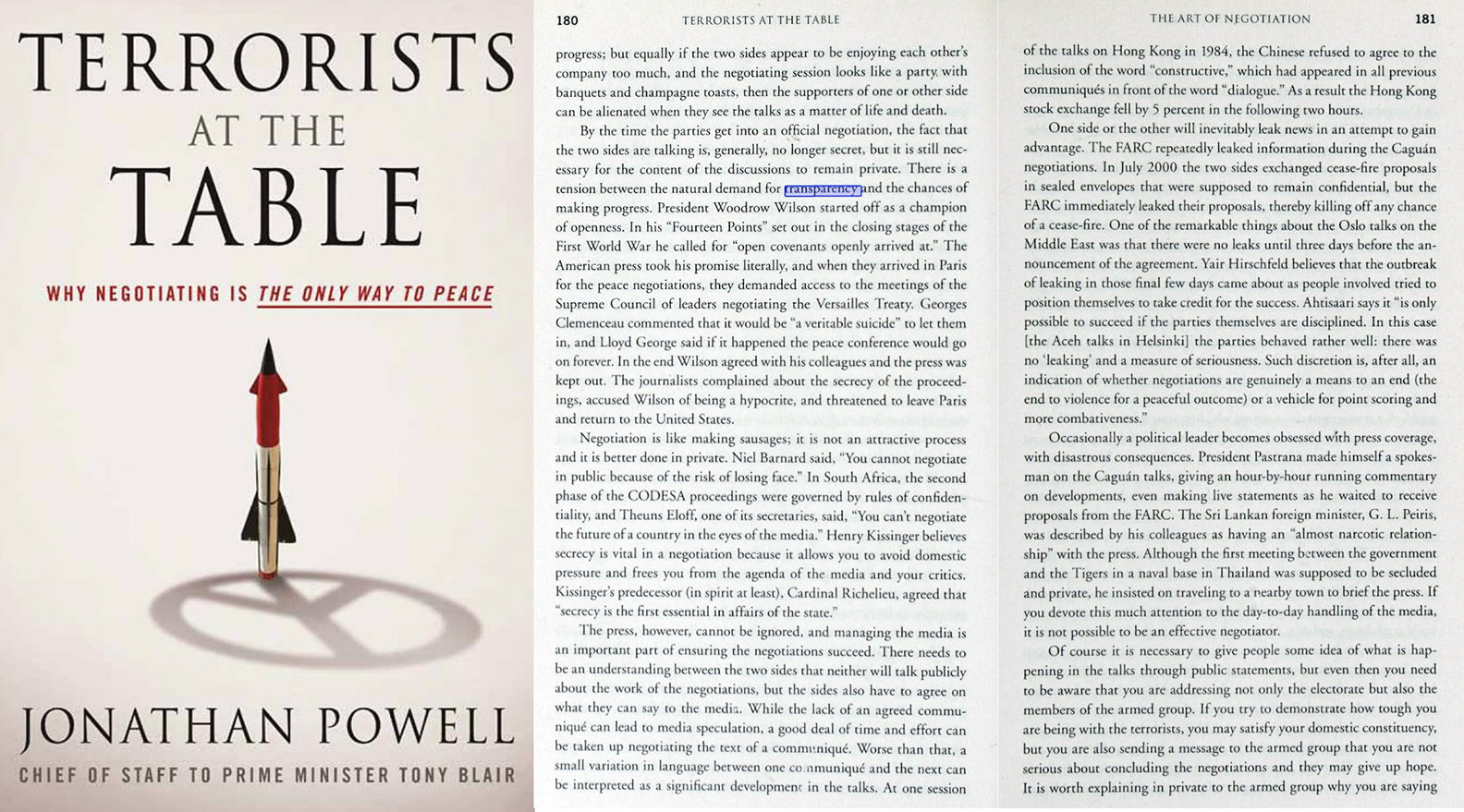
Jonathan Powell 2015 - Terrorists at the Table
Text: By the time the parties get into an official negotiation, the fact that the two sides are talking is, generally, no longer secret, but it is still necessary for the content of the discussions to remain private. There is a tension between the natural demand for transparency and the chances of making progress. President Woodrow Wilson started off as a champion of openness. In his “Fourteen Points” set out in the closing stages of the First World War he called for “open covenants openly arrived at.” The American press took his promise literally, and when they arrived in Paris for the peace negotiations, they demanded access to the meetings of the Supreme Council of leaders negotiating the Versailles Treaty. Georges Clemenceau commented that it would be “a veritable suicide” to let them in, and Lloyd George said if it happened the peace conference would go on forever. In the end Wilson agreed with his colleagues and the press was kept out. The journalists complained about the secrecy of the proceedings, accused Wilson of being a hypocrite, and threatened to leave Paris and return to the United States. Negotiation is like making sausages; it is nor an attractive process and it is better done in private. Niel Barnard said, “You cannot negotiate in public because of the risk of losing face.” In South Africa, the second phase of the CODE A proceedings were governed by rules of confidentiality, and Theuns Eloff, one of its secretaries, said, “You can’t negotiate the future of a country in the eyes of the media.” Henry Kissinger believes secrecy is viral in a negotiation because it allows you to avoid domestic pressure and frees you from the agenda of the media and your critics. Kissinger’s predecessor (in spirit at least), Cardinal Rithelieu, agreed that “secrecy is the first essential in affairs of the state.” (Refers to peace negotiations in Ireland, Colombia etc)

Jonathan Powell 2015 - Terrorists at the Table
The views of Common Cause activists epitomize elite distrust of a basic element of politics, and of Democratic politics in particular: the bartering and trading of votes, favors, jobs, and other benefits, often behind closed doors, which make the negotiation and resolution of much larger issues possible, facilitating those compromises essential to the operation of government, particularly in the pluralistic, nonideological politics of the United States.Thomas Edsall 1984
The New Politics of Inequality
The new aim was to clean up government, to impose a system of ethical norms on elected officials,… to insure public access to official proceedings… These changes unquestionably increased public access to both the legislative and executive branches of government, although it is curious to note that there are still no representatives of the general-interest press and television at the overwhelming majority of congressional committee sessions. Instead, public access to these meetings is used primarily by lobbyists and publications catering to special-interest groups. Similarly, the Freedom of Information Act is used far more by corporations seeking to gain an advantage over, or information about, competitors than for the disclosure of governmental activity to the general public. Along the same lines, campaign reforms have made information on sources of political financial support more accessible, but these reforms have given institutional legitimacy to many of the practices reformers were struggling to restrict.Thomas Edsall 1984
The New Politics of Inequality (FOIA)
From time immemorial, human beings have been bargaining with each other under challenging and complex circumstances—both external-contextual and internal -psychological. One factor in particular combines both attributes: the presence of a “salient audience.” Audiences, the negotiator’s ‘public’, ‘constituency’ or other group, exert enormous pressure on negotiator behavior simply by existing. In international conflicts, audiences do more than simply exist: they mobilize to shape a leader’s agenda, affect the process, conduct and substance of negotiations, and sometimes they try to exercise control over the political and even physical survival of the negotiator. This is the ‘audience effect’ … The mutual dependence between leader/negotiator and public/constituency is well known. And yet it can work against the interests of the negotiator. Rubin & Brown noted a marked tendency for negotiators to make moves damaging to the negotiator’s and constituents’ interests, ironically, because of the audience effect. Walton & McKersie observed that in labor management negotiations, principal negotiators would sometimes deliberately resort to secrecy to keep their own side in the dark about concessions. Between the negative effects of publicity and the positive advantages of bargaining in the shadows, it is a wonder that more negotiations are not conducted in this manner.Anthony Wanis-St.John 2004
Back Channel Diplomacy: Implications for Practice and Theory
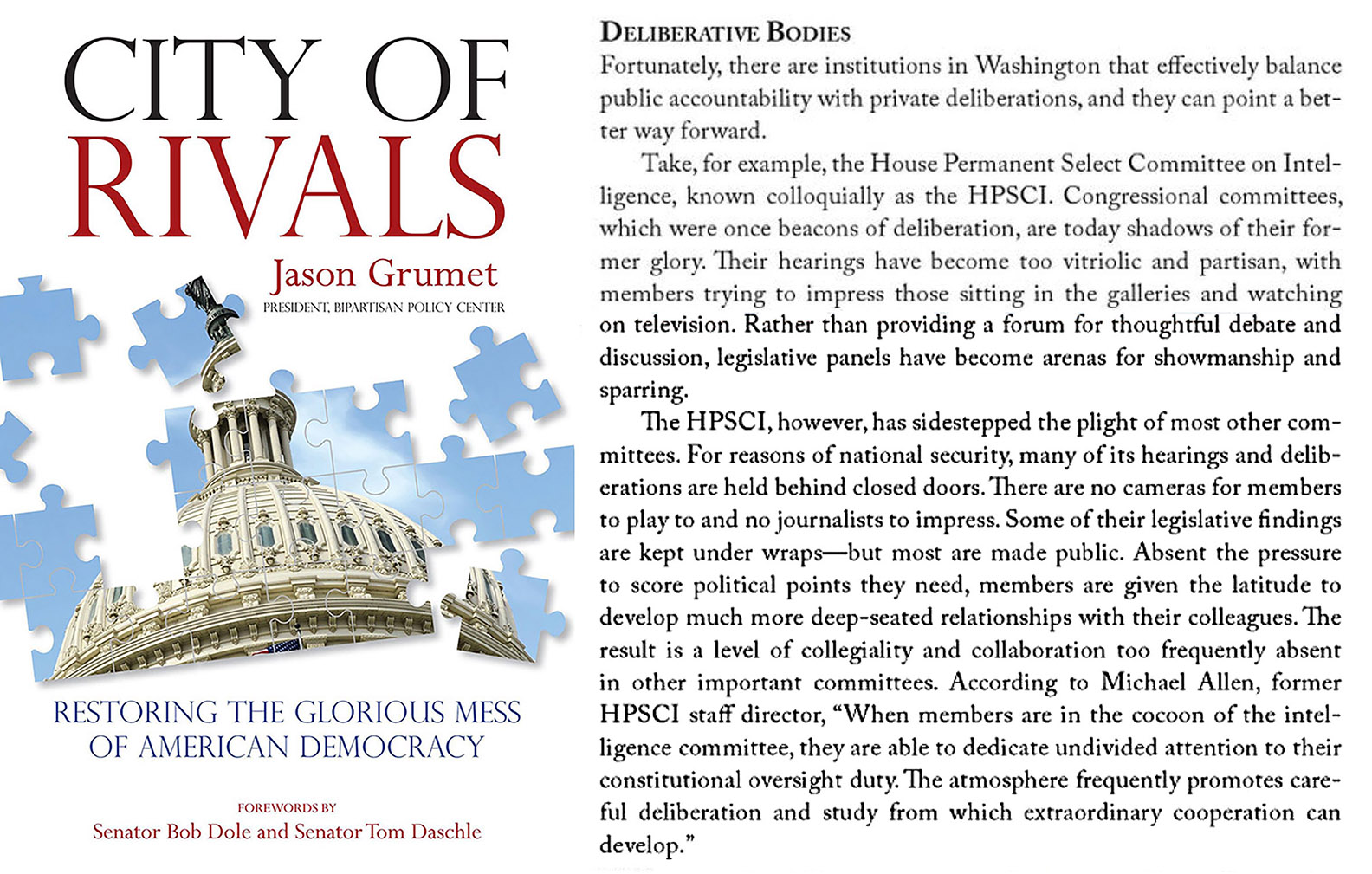
Jason Grumet 2014 – The Dark Side of Sunlight (pdf)
Text: Congressional committees, which were once beacons of deliberation, are today shadows of their former glory. Their hearings have become too vitriolic and partisan, with members trying to impress those sitting in the galleries and watching on television. Rather than providing a forum for thoughtful debate and discussion, legislative panels have become arenas for showmanship and sparnng. The HPSCI [House Permanent Select Committee on Intelligence], however, has sidestepped the plight of most other committees. For reasons of national security, many of its hearings and deliberations are held behind closed doors. There are no cameras for members to play to and no journalists to impress. Some of their legislative findings are kept under wraps – but most are made public. Absent the pressure to score political points they need, members are given the latitude to develop much more deep-seated relationships with their colleagues. Tbe result is a level of collegiality and collaboration too frequently absent in other important committees. According to Michael Allen, former HPSCI staff director, “When members are in the cocoon of the intelligence committee, they are able to dedicate undivided attention to their constitutional oversight dury. The atmosphere frequently promotes careful deliberation and study from which extraordinary cooperation can develop.”

Jason Grumet 2014 – The Dark Side of Sunlight (pdf)
The secrecy that is present in back-channel-diplomacy… produces a ‘package’ of benefits for the political decisionmaker. The benefits of secrecy are evident throughout these cases: secrecy helps the parties manage four categories of uncertainty that affect negotiations. These are: 1. Uncertainties regarding the cost of entry into negotiations – concerning the preconditions set by one or both parties prior to negotiations 2. Uncertainties regarding the actions of ‘spoilers’ –parties who can act to destroy an emerging peace arrangement 3. Uncertainties about information needed to negotiate – the true preferences of parties, the feasibility of solutions 4. Uncertainties concerning outcome – leaders prefer not to negotiate in front channels when they deem the risk of failure to be high.Anthony Wanis-St.John 2004
Back Channel Diplomacy: Implications for Practice and Theory
During the past generation many of the gatekeepers of the old political order were swept aside. The governmental process became more permeable as political institutions and processes became increasingly open to popular participation and increasingly subject to popular influence. The 1960s protesters demanded “power to the people,” and apparently they got it. The great irony, then, is that after this explosion of openness and the transfer of power to the people, turnout in elections fell and trust in government plummeted. Against all natural expectations, Americans liked their government better, trusted their leaders more, and voted in higher numbers in the bad old days when party bosses chose nominees in smoke-filled rooms; when several dozen old White men (mostly Southerners) ran Congress; when it was more difficult to get a hearing in court; when legislatures, agencies, city councils, and local boards made decisions behind closed doors; when big business, big labor, and big agriculture dominated the interest group universe; and when politicians didn’t have the tools to figure out what their constituents wanted. Why?Mo Fiorina 2011
Disconnect: The Breakdown of Representation
Overall, our review [of transparency and accountability studies] found that much of the current evidence relies on untested normative, positivist assumptions and under-specified relationships between mechanisms and outcomes. Much of the empirical work reviewed is based on poorly articulated, normatively-inspired ‘mixes’, that draw unevenly from the concepts of transparency, accountability, good governance and empowerment. Virtually none of the literature gathered explores possible risks or documents negative effects or arising from TAIs, although some begins to note these at an anecdotal or speculative level.Gaventa & McGee 2011
Impact of Transparency & Accountability (evidence)
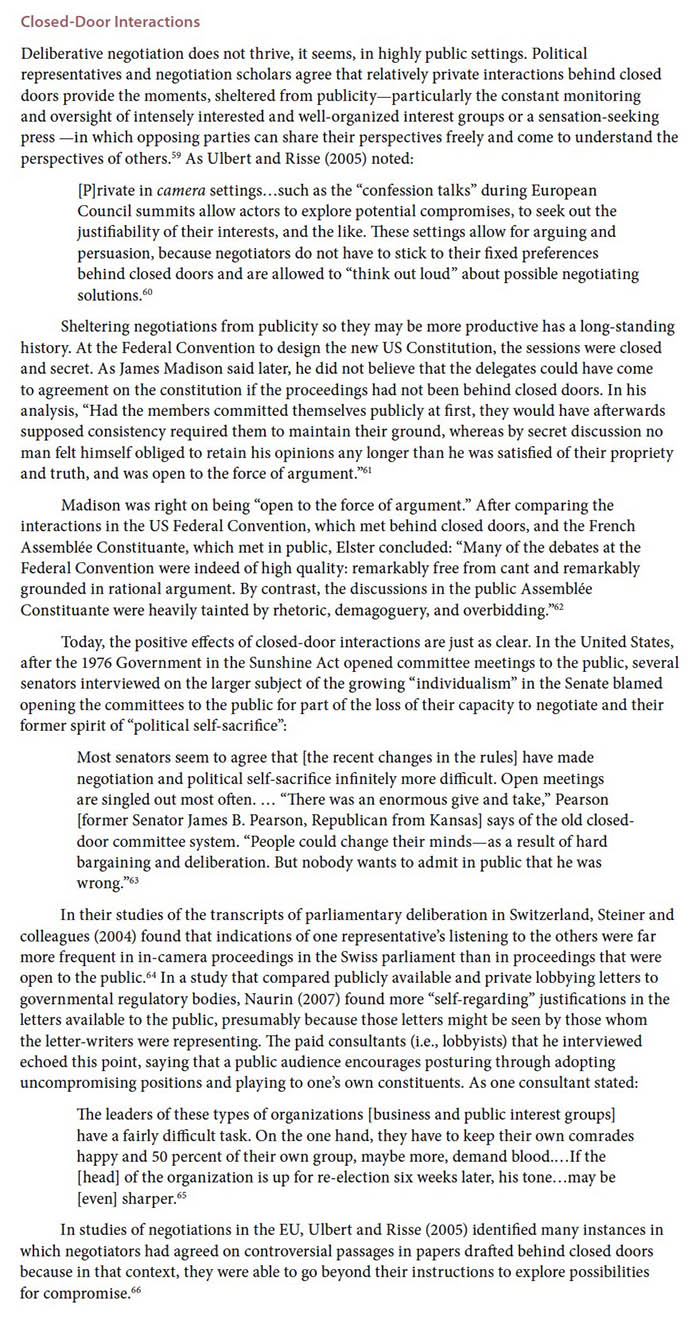
Mark E. Warren & Jane Mansbridge 2013 – Negotiating Agreement

Mark E. Warren & Jane Mansbridge 2013 – Negotiating Agreement
Nothing in the Constitution requires public sessions of Congress, let alone public hearings of its committees or public votes. In fact, the Constitution makes no mention of committees at all. One of the first decisions of the First Continental Congress in September of 1774 was to keep its proceedings secret, the custom of the colonial assemblies. Likewise, the Constitutional Convention’s proceedings in 1787 were secret. However, one of the rules proposed for the Convention would have permitted any member to call for the yeas and nays on any matter voted and the printing in the minutes of the names for and against. According to James Madison’s notes, Rufus King of Massachusetts objected to the rule on grounds that it was unnecessary since acts of the Convention were not binding on constituents. Moreover, he argued that such a record of votes would be “improper as changes of opinion would be frequent in the course of the business and would fill the minutes with contradictions.” George Mason seconded King’s objection. A record of the opinion of members “would be an obstacle to a change of them on conviction,” and, when promulgated in the future, “must furnish handles to the adversaries of the Result of the Meeting.” The rule was subsequently dropped by unanimous consent.Donald Wolfensberger 2000
Congress and the People
The constitutional provision for obtaining a recorded vote by a demand for the “yeas” and “nays” is not construed as applying to the committees of the House, even to one consisting of all House members (the Committee of the Whole). The policy of nonrecorded votes in the Committee of the Whole remained part of House rules until 1971 [due to the Legislative Reorganization Act signed by President Nixon in late 1970]Donald Wolfensberger 2000
Congress and the PeopleNote: Wolfensburger refers to the constitution Article 1, Section 5 which states: Each House shall keep a Journal of its Proceedings, and from time to time publish the same, excepting such Parts as may in their Judgment require Secrecy; and the Yeas and Nays of the Members of either House on any question shall, at the Desire of one fifth of those Present, be entered on the Journal.
It is expected our doors will be shut, and communications upon the business of the Convention be forbidden during its sitting. This, I think, myself, a proper precaution to prevent mistakes and misrepresentation until the business shall have been completed, when the whole may have a very different complexion from, that in which the several crude and undigested parts might, in their first shape, appear if submitted to the public eye.George Mason 1789
The Constitutional Convention
In addition, “secrets,” as an instrument of power, are more safely hidden in a general ledger of private companies than in the files of the government offices [Behörde]. Therefore, during the capitalist era, the Behörde’s influence on the economy is very limited and the state’s regulations cause unintended and unforeseen “train wrecks.” Likewise, these regulations, coming from public Behörde, often are illusory because of the superior factual knowledge of the people in commerce.Max Weber 1921
Bureaucracy and Secrecy
The conventional wisdom among judges, legislators, the public — and especially the media — is that “open meetings” are a good thing. As a generalization, it is certainly a superficially attractive proposition. On closer examination… open meetings laws of the federal government and forty-eight other states, have only made the inherent problems worse. To capture all discussions merely because they are called deliberations is an impossibility. To try to do so only guarantees that fewer discussions and deliberations will take place, and that fewer wise decisions will be made.Nicholas Johnson 1994
Open Meetings and Close Minds
Newspapers and television corporations and their litigation and lobbying organizations are the most vigorous proponents of openness of meetings unless, of course, it is the media’s records or meetings that are at stake.Nicholas Johnson 1994
Open Meetings and Close Minds
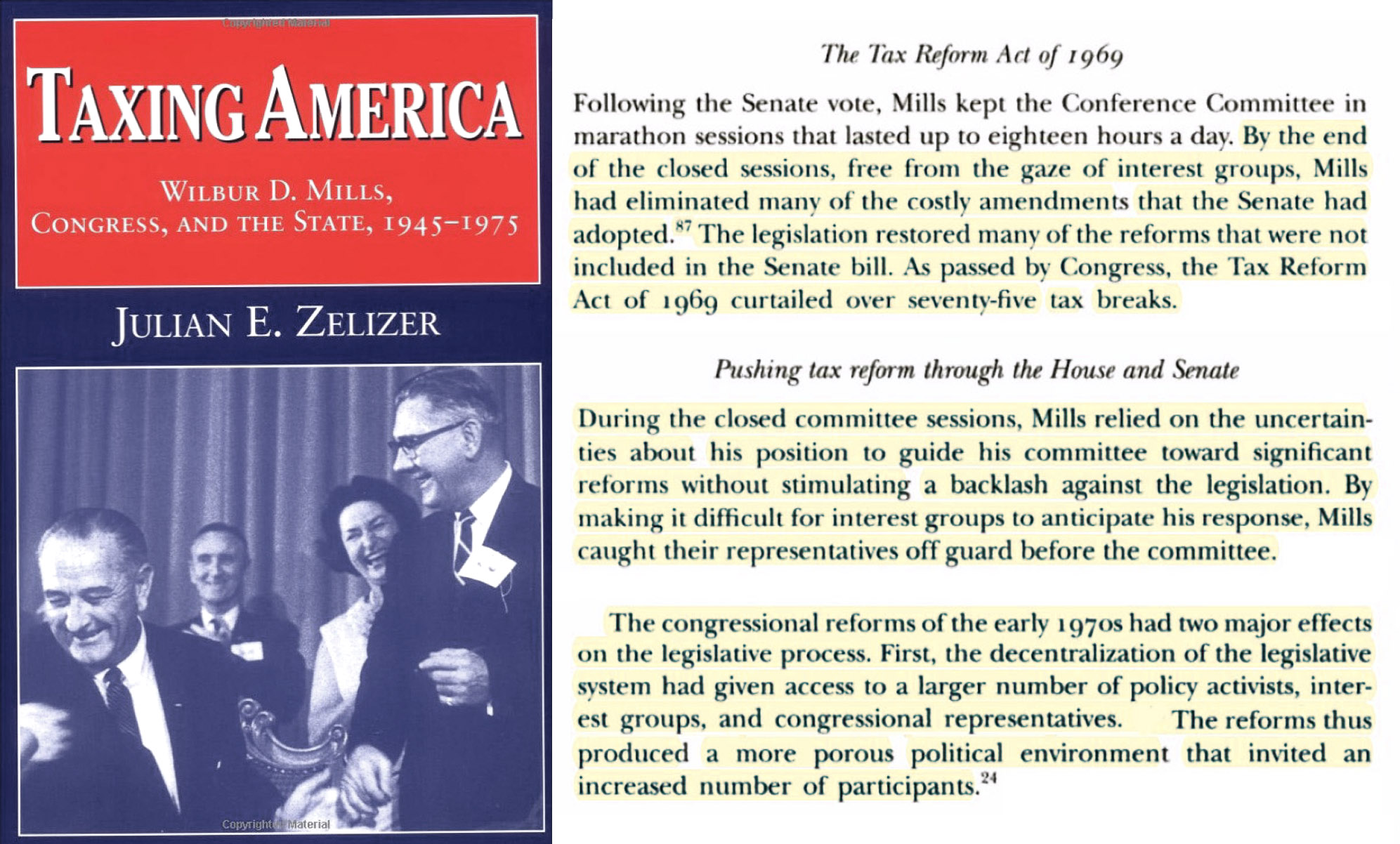
Julian Zelizer 1998 – Taxing America
Text: By the end of the closed sessions, free from the gaze of interest groups, Mills had eliminated many of the costly amendments that the Senate had adopted. The legislation restored many of the reforms that were not included in the Senate bill. As passed by Congress, the Tax Reform Act of 1969 curtailed over seventy-five tax breaks.

Julian Zelizer 1998 – Taxing America
Lobbyists… have a kind of nuisance impact. They can make life somewhat unpleasant for officials who do not go along with them: It is embarrassing to vote against someone who is watching.Lester Milbrath 1963 - The Washington Lobbyists
A staff assistant to one of the labor committees in Congress reports that he has seen committee members switch their vote according to whether it was a voice or a roll-call vote.Lester Milbrath 1963 - The Washington Lobbyists
The major reason for the difference In ratings and for the low rating given by most lobbyists is that publicizing voting records is a powerful and dangerous political tactic open only to groups with considerable power at the polls.Lester Milbrath 1963 - The Washington Lobbyists
Sarah Binder 2015 - Closed Markup Sessions Curb Lobbying
Evolution and Future of Congress 2015 - Bipartisan Policy Center. Here, Sarah Binder, referring to work by Colleen Shogan, once again comments on the pitfalls of transparency - specifically having journalists and lobbyists in the room. Oddly Biner feels embarrassed mentioning this in front of the lobbyists and journalists - as seen in this clip – and she has historically fought researchers who advocate for more secrecy with respect to solving partisanship, gridlock, lobbying influence etc. What gives?
Sarah Binder 2015 - Closed Markup Sessions Curb Lobbying
To appreciate one of the central virtues of secret balloting, consider the fact that in a number of organizations, the leadership, for obvious reasons, insists that the preferences and opinions of the rank and file be revealed through a hand count instead of a secret ballot. Transparency, in that case, is of way of controlling the membership.Albert Breton 2007
The Economics of Transparency in Politics
Leaders and members regularly set up roll-call (transparent) votes in full knowledge that these votes will have no effect on policy outcomes, but they nevertheless stage them for messaging purposes – that is, to define the differences between the parties in hopes of making their party look more attractive to voters or key constituencies than the opposition. (intentionally driving partisanship)Frances Lee 2016
Insecure Majorities
Why would [representatives] make their actions more easily monitored when, by all accounts, the result is to induce them to take actions (e.g., showing up for roll call votes) that they would refrain from otherwise? Surely such contracts make agents worse off, by reducing their opportunities to act on their own preferences, out of the public glare. It seems at least a little surprising from the agency theory perspective that the political process has increasingly been “opened up” to external view and the politicians have made themselves more and more vulnerable to criminal punishment (among other forms) over time. Why would agents behave this way?John Ferejohn 1999
Accountabiliy and Authority
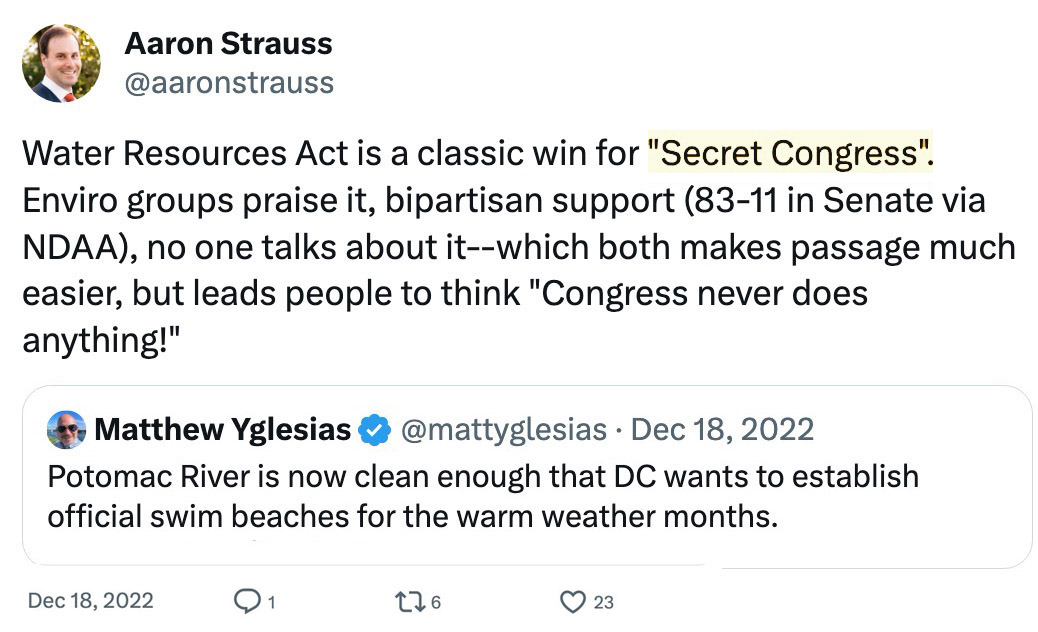
Aaron Strauss 2022 Secret Congress and the Environment (Climate)

Aaron Strauss 2022 Secret Congress and the Environment (Climate)
All three approaches combined to form the Clean Air Act, as the legislation came to be called. What would it take, Muskie asked, for an automobile not to pose a threat to the public’s health? One answer, provided by the director of the National Air Pollution Control Administration, was to reduce its emissions by 90 percent. Liking that answer, Muskie modified the (Climate) bill to require carmakers to reduce toxic emissions by 90 percent in their 1975 and 1976 models—much sooner than anyone had expected. Urged on by Muskie and Baker, the members of the subcommittee approved the more stringent requirements. The vote, like the meetings, was held behind closed doors, which was standard procedure at the time.Susan Dudley Gold 2012
Clean Air and Clean Water Acts
It seems possible that the opening of congressional processes to public view lies behind the relentless decline in public approval of congressional performance over roughly the same period. It is true the decline in approval is not confined to Congress, but then the increasing public access to previously closed processes is not confined to Congress either. John Ferejohn 1999
Accountabiliy and Authority
A number of factors may have contributed to the explosion of corporate lobbying. An onslaught of environmental and consumer regulations in the late 1960s and early 1970s provoked an antiregulatory backlash, and the authorization of political action committees in 1974 encouraged business to take sides in elections. But the most compelling explanation is the revolution in transparency that unfolded at the same time. Before the sunshine reforms, lobbyists could rarely tell for sure whether their targets were voting as intended. That lack of assurance proved crucial to keeping special interests on the back foot. During the deliberations that led to the Tax Reform Act of 1969, for example, members of Congress approved all kinds of special giveaways in open session, but when the conference committee met behind closed doors to draft the final language, it quietly stripped the pork away, dashing the hopes of scores of special interest groups. As the political scientist Lester Milbrath had noted in the early 1960s, “A lobbyist who thinks about using bribery... has no assurance that the bribed officials will stay bought.”James D’Angelo & Brent Ranalli 2019
The Dark Side of Sunlight (Foreign Affairs Magazine)
I feel the committee produces a better bill behind closed doors. There is less posturing, less playing to the audiences. We are able to move much more quickly and I think, in the end, we do a better job.Rep. Gradison 1985
Rewriting Tax Code (Fessler)
The Issue of Transparency In deliberations, there must be an opportunity for private discussions between member states before their positions are made public. If not, compromises become hard to achieve; too much sunshine can freeze positions and reduce flexibility.
Moreover, the more sensitive deliberations of governments in the Security Council should be held in private. When it comes to discussions about peace and security, weapons of mass destruction, and peacekeeping, governments need to work in private, without pressure from special interests as positions are worked out. Governments can be more candid behind closed doors, assured that what they say in private will not be front-page news the next day. I do believe that the Council’s formal negotiations and final decisions must be transparent and that members of the Council should justify their votes to the world.
In the General Assembly, measures can be adopted by acclamation, which means there is no recorded vote, and no one to be held accountable for voting contrary to expectations. But this is standard practice in many democratic fora. Recording every vote in the United Nations system would not be feasible.Kim R. Holmes (US Dept of State) 2003
Democracy and International Organizations
With a closed markup you can always say to lobbyists or constituents that you fought like a tiger for their position and asked for a record vote, but not enough members raised their hands. Members almost feel obligated to demand a record vote in public, and then you have members voting in a way they don’t really want.Rep. Don Pease 1985
Rewriting Tax Code (Fessler)
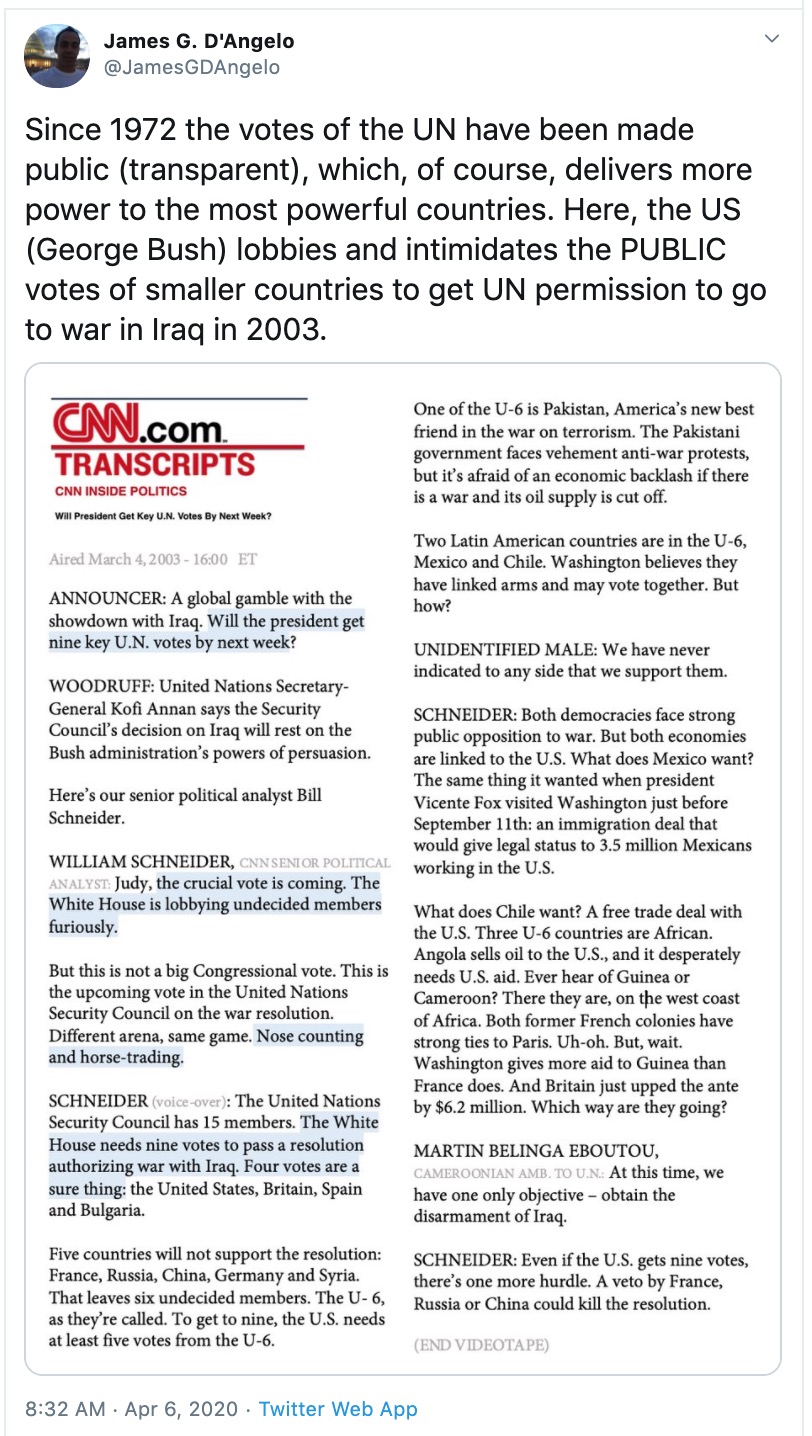
George Bush twisting arms for votes in the UN

George Bush twisting arms for votes in the UN
Perhaps it is not then surprising that public distrust has grown in the very years in which openness and transparency have been so avidly pursued.Onora O’Neill 2002
A Question of Trust (Reith Lectures)
Transparency is expected to strengthen electoral accountability. Yet, initiatives disseminating politician performance information directly prior to elections have reported disappointing results.Guy Grossman, Kristin Michelitch, Carlo Prato 2002
The Effect of Sustained Transparency on Electoral Accountability
Though transparency has political benefits, there are also major political costs to transparency too: within a democracy, transparency incentivizes bullshit.Jimmy Alfonso Licon 2024
In a democracy, transparency incentivizes bullshit*
There is little reason to think that transparency and openness are going to increase trust. Transparency can encourage people to be less honest, so increasing deception and reducing reasons for trust: those who know that everything they say or write is to be made public may massage the truth… Demands for universal transparency are likely to encourage the evasions, hypocrisies and half-truths that we usually refer to as ‘political correctness’, but which might more forthrightly be called either self-censorship or deception.Onora O’Neill 2002
A Question of Trust (Reith Lectures)
The delegates had pledged to keep their deliberations secret—for a term of fifty years—a pledge that worked in favor of men like Madison. And, within the hall, it allowed for a full and frank airing of views.Jill Lepore 2018
These Truths
It is precisely in the committee system that televised transparency has done real damage. The floor of the House and Senate have never really been all that great as venues for deliberation. It’s likely that no one has ever been persuaded of anything on the floor of either house of Congress. But committee work did genuinely have a different character before it was all televised.Yuval Levin 2019
Behind Closed Doors
Queen Victoria once complained of William Gladstone that “He speaks to me as if I was a public meeting.” Time spent with many members of Congress today has this feeling about it too. Too many have just one mode—a performative mode intended to go viral on YouTube — and they employ it even in private conversations, including with one another. A bit more work behind closed doors could help with that.Yuval Levin 2019
Behind Closed Doors
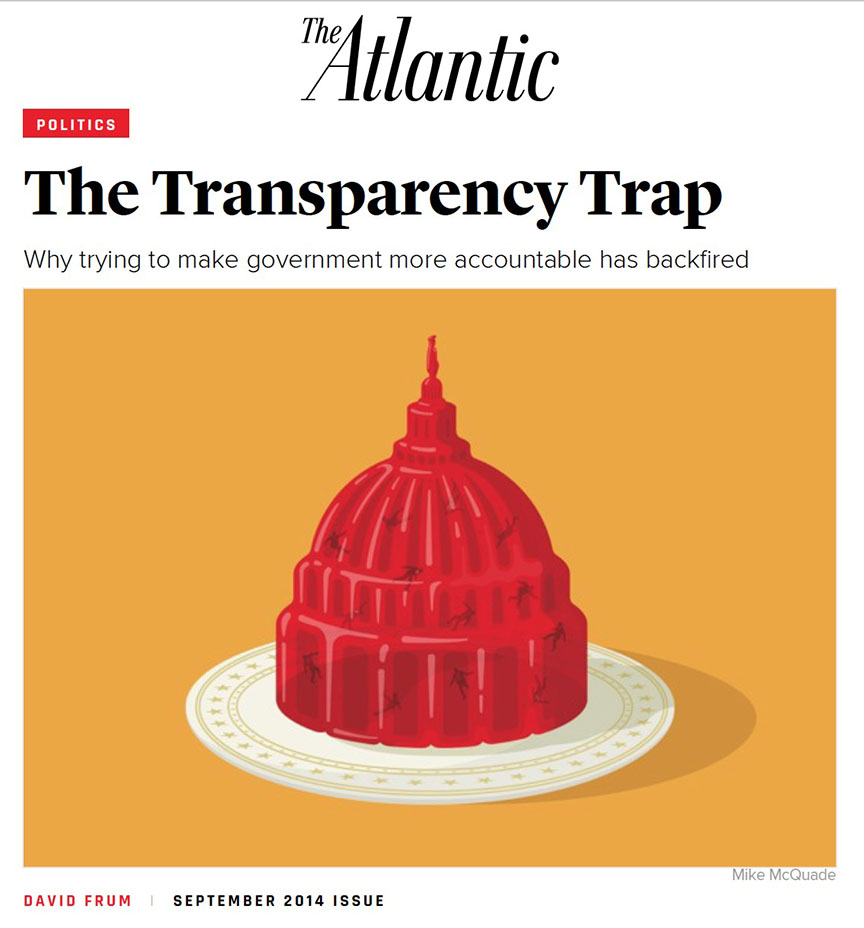
David Frum 2014 - The Transparency Trap

David Frum 2014 - The Transparency Trap
Sunshine Reforms: Progressive reformers, whether Democratic or Republican, have been calling for more “open and democratic” government since at least the 1960s. In fact, the roots of such reform date to Woodrow Wilson and probably even to the Antifederalist concern for more simple, direct democracy. Recently, The Washington Post’s Ezra Klein cited as one of “the 13 reasons Washington is failing,” the idea that “too much sunshine can burn” saying “sometimes, it’s easier to resolve disputes in private.” Madison, of course, would concur. The Constitutional Convention succeeded, in part, because the fifty-five delegates met behind closed doors, under strict confidentiality rules. As witness Madison’s Notes of Debates in the Federal Convention, published only after his death in 1836, delegates were able to repeatedly speak their minds and change their minds across the long summer of 1787. Madison clearly did not think the cure to the ills of democracy is more democracy. He created republican, that is, representative, institutions designed to “refine and enlarge the public views.” Viewing the sausage-making of the legislative process, especially under the unblinking stare of the media, has probably not increased citizen trust in government. The decline in trust of government since the 1960s is coincident with transparency reforms.William F. Connelly, Jr 2013
Partisan, Polarized, Yet Not Dysfunctional?
My bottom line is that closed mark-ups can often produce better legislation and therefore serve the public interest.Rep Don Pease 1984
Opening up Congress
Historically, assemblies have not always granted publicity of their debates. They have often denied the public access to their proceedings and also used secret voting to allow their members to shield themselves from the public, from the executive, or from the political parties to which they belong.Jon Elster 2013
Securities Against Misrule
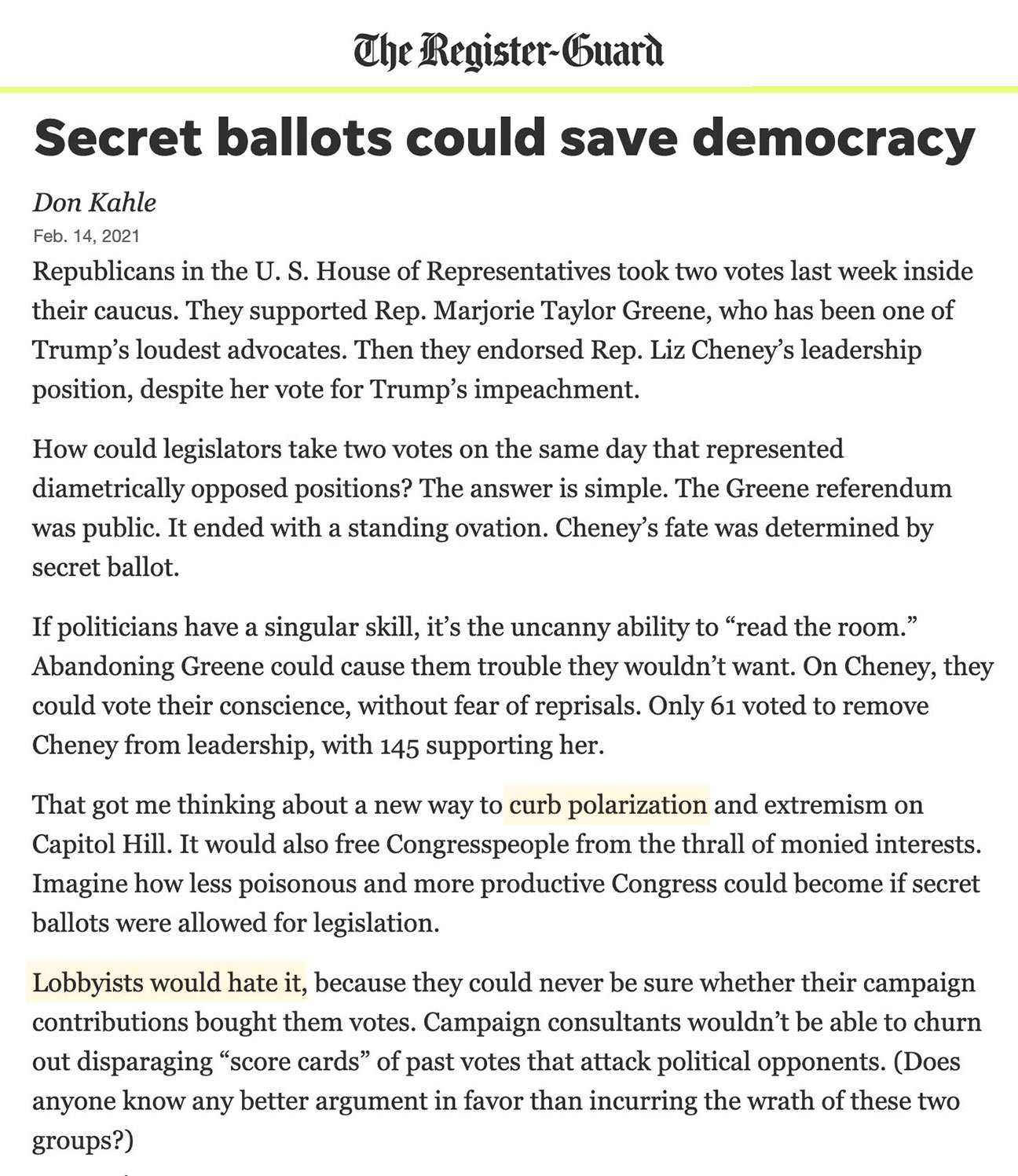
Don Kahle 2021 Secret Ballots Could Save Democracy
Text: Republicans in the U. S. House of Representatives took two votes last week inside their caucus. They supported Rep. Marjorie Taylor Greene, who has been one of Trump’s loudest advocates. Then they endorsed Rep. Liz Cheney’s leadership position, despite her vote for Trump’s impeachment. How could legislators take two votes on the same day that represented diametrically opposed positions? The answer is simple. The Greene referendum was public. It ended with a standing ovation. Cheney’s fate was determined by secret ballot. If politicians have a singular skill, it’s the uncanny ability to “read the room.” Abandoning Greene could cause them trouble they wouldn’t want. On Cheney, they could vote their conscience, without fear of reprisals. Only 61 voted to remove Cheney from leadership, with 145 supporting her. That got me thinking about a new way to curb polarization and extremism on Capitol Hill. It would also free Congresspeople from the thrall of monied interests. Imagine how less poisonous and more productive Congress could become if secret ballots were allowed for legislation.Lobbyists would hate it, because they could never be sure whether their campaign contributions bought them votes. Campaign consultants wouldn’t be able to churn out disparaging “score cards” of past votes that attack political opponents. (Does anyone know any better argument in favor than incurring the wrath of these two groups?)

Don Kahle 2021 Secret Ballots Could Save Democracy
Trying to make government more accountable has backfired… And yet, when government seems to fail, Americans habitually resort to the same solutions: more process, more transparency, more appeals to courts. Each dose of this medicine leaves government more sluggish. To counter the ensuing disappointment, reformers urge yet another dose. After Speaker Tip O’Neill retired from Congress, in 1987, an interviewer asked him how the House of Representatives had changed over his 35 years of service. He memorably answered, “The people are better. The results are worse.” His answer might be generalized across the American system of government: the process is better (at least as better is conventionally defined: more transparent, more participatory), but the results are worse. David Frum 2014
The Transparency Trap
[The 1970s reform] calls for a more open process were not entirely altruistic. Open committee sessions also provided members with a forum for putting themselves on public display for their constituents and for organized interests. Some senior members complained that opening up committee hearings would lead to member grandstanding and hinder the debate necessary to reach compromises. The sunshine reforms also provided organized interests with more opportunities to participate in the legislative process. By some accounts, open meetings did not increase citizen participation, but they did increase the overall influence of organized interests.Marian Currinder 2009
Money in the House : campaign funds and congressional party politics
Sunshine reforms opened committee meetings and hearings to the public and increased the presence and participation of organized interests. As a result, House members were under more pressure to respond to the requests of outside groups that had committeebased interests.Marian Currinder 2009
Money in the House : campaign funds and congressional party politics
Reformers keep trying to eliminate backroom wheeling and dealing from American governance. What they end up doing instead is eliminating governance itself, not just in the White House but in Congress, too.David Frum 2014
The Transparency Trap
Substantial objections can be made to enacting the principle [of open meetings] as a legal requirement. Publicizing proposed governmental action may benefit citizens whose interests are adverse to the general community or harm individual reputations. In some cases, particularly when sharply conflicting interests must be accommodated, freedom from the pressure of public opinion may be desirable; the delegates to the Constitutional Convention, for example, felt constrained to work in secrecy. Even in less unique circumstances “there is something to be said for open covenants, unopenly arrived at.” One public official has remarked that “there are many details, ramifications and opinions that no sound administrator… would care to express in public,” and it appears that officials are often reluctant to request information at open meetings lest they create a public image of ignorance. In addition, public officials are prone to waste time making speeches for the benefit of an audience, while in a closed meeting they “are less on their dignity, less inclined to oratory.” If the meeting is for preliminary consideration of action, there are additional objections. An open meeting requirement will tend to disadvantage subordinate officials by publicizing their disagreement with policies that they must administer. And publicity of proposals put forth during preliminary discussions may frustrate ultimate agreement, for an official hesitates to abandon a view that he has publicly advocated.Harvard Law Review 1962
Open Meeting Statutes: The Press Fights for the ‘Right to Know’
A final objection to an open meeting requirement arises from the tendency of the press toward “sensational” reporting. All too frequently newspaper stories are distorted by the bias of the reporter or his paper. Even when there is no bias, newspapers prefer to emphasize as “newsworthy” only “controversial matters about which there is some conflict or… those items which tend to make legislators appear substantially less than bright.” It has even been contended that the need for “right to know” laws has been exaggerated, as “editorials and news articles on star chamber sessions and the like have long been an easy, inevitably irrefutable, and popularly accepted part of every experienced, and frequently cynical, news editor’s bag of tricks.”Harvard Law Review 1962
Open Meeting Statutes: The Press Fights for the ‘Right to Know’ (Media)
The debates were secret, and fortunately so, for criticism from without might have imperilled [the] work… so great were the difficulties encountered from the divergent sentiments and interests of different parts of the country.James Bryce 1908
The American Commonwealth
Although Gramm’s stated enemy is liberalism, the big losers in a wave of party-switching would be the conservative Democrats, who see not only their party but a whole precious tradition slipping away from them. They discuss the problem more or less sub rosa. because what they believe would not sit well with voters: that a benign, closed-door, businessmen’s oligarchy is the best way to govern a state. That may not sound very noble, but to give the conservative Democrats their due, don’t we envy Japan for being run by just such a bigbusiness-big-government oligarchy?Nicholas Lemann 1985
A Choice Without a Difference
The broadcasting of floor activities would seriously impair the ability of members to perform their legislative duties in an atmosphere of free, open and robust debate.
It is not difficult to envision members scrambling to the floor to get before cameras in order to impress the voters back home instead of persuading other members, producing much oration and little debate.
What is more, oratory would become the chief, if not the only, criterion of legislative ability, to the disadvantage of those members who contribute their valuable skills and knowledge in countless other ways. Not every member of Congress wishes to strut upon the stage of public acclaim.Jesse Helms 1974
Congress Report Asks TV Coverage
The more vigorous activity of interest groups demonstrates their adaptation to changes in the political system. At the start of this chapter we listed several factors which inhibited the power of interest groups, particularly in electoral politics, and which made it wise for lobbyists to adopt a restrained approach. Chief amongst these were the electorate’s ignorance of issues and attachment to party labels, the power structure in Congress, which gave the most power to the least electorally vulnerable, and procedures such as voice votes or closed committee meetings which screened legislators from public scrutiny. Most of these defenses against pressure-group power have been weakened or have disappeared.Graham Wilson 1981
Interest Groups in the United States
The argument has been advanced here that, at times, only through closed-door meetings, omnibus legislative vehicles, and delegation to unelected officials can the public interest be advanced over the narrow interest. Similarly, the notion that legislators are incapable of being responsible and accountable to the electorate because of the use of these procedures would seem to confuse the means and the ends of democracy. In most of these cases, legislators are freeing themselves to be more accountable to certain types of interests—general interests—that are not as well organized and that do not participate in the political process in the same ways. So long as those interests are being represented some of the time, it is fair to conclude that legislators are being responsible and accountable. Indeed, they are behaving as we should hope our elected representatives would. Lawrence Becker 2005
Doing the Right Thing
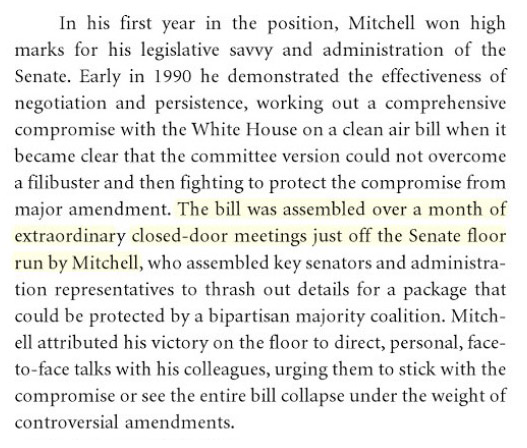
CQ 2013 – How Congress Works
Note: In 1990, Mitchell passed the most significant environmental/climate legislation since the late 1960s. And in order to do it, he reversed the notions of the 1970s transparency.

CQ 2013 – How Congress Works
During the 1980s there was some retreat from the [sunshine] reforms, including votes by a number of key panels to close their doors during consideration of major legislation. Votes to close committees had to be conducted in open session by a roll call with a quorum present. The House Ways and Means Committee, perhaps the most heavily lobbied committee in the House, chose to close its doors to write such landmark legislation as a historic tax-overhaul bill in 1985 and trade and catastrophic illness insurance bills in 1987. Ways and Means chair Dan Rostenkowski, D-Ill., argued: “It’s just difficult to legislate. I’m not ashamed about closed doors. We want to get the product out.” Other panels – notably House Appropriations subcommittees – also met privately to draft legislation. Sometimes committees’ decisions were made by small groups of members behind the scenes and then ratified in open session. Defenders of closed sessions argued that committee members were more candid, markups more expeditious, and better laws written away from lobbyists’ glare.CQ 2013
How Congress Works
Most of the studies of the Congress of the 1950s emphasized additional techniques, which the legislator could use to avoid unwelcome pressure from interest groups. Many of these turned on adroit use of Congressional procedure. Rather than oppose an interest group publicly, thus encouraging retaliation, legislators could have a ‘voice vote’ in which the position of each individual would not be recorded. Legislators could vote for a general position favored by interest groups, but could support amendments undermining the bill. Legislators could acquiesce in the adoption of conference-committee reports which were worded in such a way that they electively sabotaged the bill they supposedly approved.Graham Wilson 1981
Interest Groups in the United States
Judicial nominations have grown exceedingly contentious. In the nineteenth century, Supreme Court nominations went directly to the Senate floor, rather than to committee. Senators debated these nominations behind closed doors to shield the nominees’ privacy and to talk candidly. Donald Ritchie 2010
Congress: A Very Short Introduction
Some members have regretted ever permitting the TV cameras in, blaming television for heightening partisanship and confrontation, since members now felt they had to speak on every issue and answer every charge.Donald Ritchie 2010
Congress: A Very Short Introduction
At first, anyone could wander onto the floor before the House and Senate had convened that day. A senator once complained that he had to elbow his way through a crowd of people to get to his desk, and then found someone already sitting there. Although loath to do anything that might offend constituents, senators finally banned visitors, except for journalists. Reporters were permitted on the Senate floor just before a day’s session to get a briefing from the leadership on the day’s schedule (in the House, similar briefings were held in the Speaker’s offices). Known as “dugout chatter” from the term for a baseball pre-game broadcast, this privilege was also suspended, until even staff needed special permission to get access to the floor. The only other way to get there is by election.Donald Ritchie 2010
Congress: A Very Short Introduction
Clearly, agreement on the costs to be imposed on territorially concentrated industries is not likely to be constructed under conditions of transparency and openness. The fact that the governors of West Virginia, Michigan, California, and Maine were not present at the negotiations hardly seems to matter. Senator Byrd organized the coal-state senators, Senator Mitchell safeguarded the interests of those New England states damaged by acid rain, Congressman Dingell laid out the strategy for the auto industry, and CongressmanWaxman represented the interests of one of the smoggiest districts in the country. Environmentalists, unions, and industry groups lobbied fiercely, but in the end, it was the elected officials who made the trade-offs and decided who would be the winners and the losers. Winners and losers were largely chosen in secrecy. Back rooms rather than the Senate or House floor were the key negotiating fora. Territorial interests, sectoral interests, and secrecy were all intertwined as elected officials engaged in lawmaking.Alberta Sbragia 2004
The United States and the European Union Compared (Climate)
There is a type of transparency project that should raise more questions than it has – in particular, projects…such as the ones (these are the really sexy innovations for the movement) to make it trivially easy to track every possible source of influence on a member of Congress, mapped against every single vote that the member has made. These projects assume that they are seeking an obvious good. No doubt they will have a profound effect. But will the effect of these projects – at least on their own, unqualified or unrestrained by other considerations – really be for the good? Do we really want the world that they righteously envisage? Lawrence Lessig 2009
Against Transparency
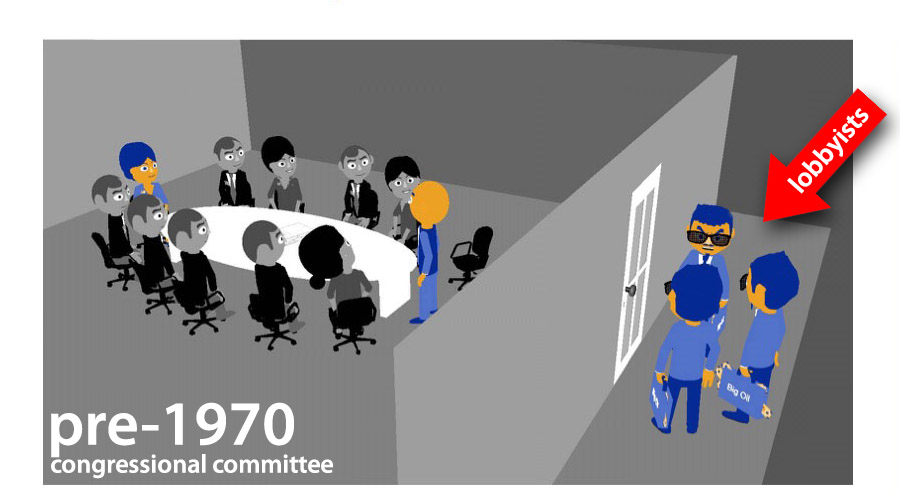
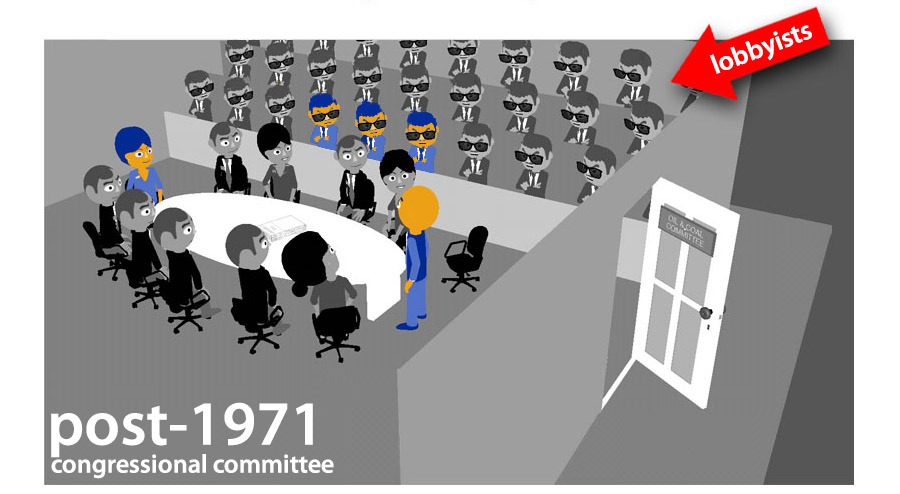
How could anyone be against transparency? Its virtues and its utilities seem so crushingly obvious. But I have increasingly come to worry that there is an error at the core of this unquestioned goodness. We are not thinking critically enough about where and when transparency works, and where and when it may lead to confusion, or to worse. And I fear that the inevitable success of this movement – if pursued alone, without any sensitivity to the full complexity of the idea of perfect openness – will inspire not reform, but disgust. The “naked transparency movement,” as I will call it here, is not going to inspire change. It will simply push any faith in our political system over the cliff.Lawrence Lessig 2009
Against Transparency
Transparency has a dark side that, ironically, has everything to do with a lack of mystery, shadow, and nuance. Behind the apparent accessibility of knowledge lies the disappearance of privacy, homogenization, and the collapse of trust. The anxiety to accumulate ever more information does not necessarily produce more knowledge or faith. Technology creates the illusion of total containment and the constant monitoring of information, but what we lack is adequate interpretation of the information.Byung-Chul Han 2015
The Transparency SocietyNote: Han’s current work focuses on transparency as a cultural norm created by neoliberal market forces, which he understands as the insatiable drive toward voluntary disclosure bordering on the pornographic. According to Han, the dictates of transparency enforce a totalitarian system of openness at the expense of other social values such as shame, secrecy, and trust.
Part way through the meeting [committee meeting on the 1970 Clean Air Act], minority counsel Tom Jorling left the meeting room to use the restroom. On this occasion, he was followed by one of the technical people from General Motors. While standing next to each other at the urinal, the man confided to Jorling: “We can build whatever you tell us to build. If you tell us to build a clean car, we will build a clean car.” There were other instances where manila envelopes were sent anonymously to the Subcommittee with internal documents that undercut positions industry representatives had made to the Committee. Interactions like these did not do any favors for the auto companies.Brigham Daniels, Andrew P. Follett & Joshua Davis 2020
The Making of the Clean Air Act (Climate)Note: Even those who worked for the auto industry wanted cleaner air and were willing to take risks (secretly) to let the legislators know. Clearly they were terrified of thier bosses - GM etc.
Earlier this month, President Trump stood before a joint session of Congress — and more than 36 million television viewers — and called for the CHIPS and Science Act to be repealed. “Your CHIPS Act is a horrible, horrible thing,” he said, referring to the 2022 bill to invest $280 billion in scientific research and semiconductor manufacturing. “We give hundreds of billions of dollars, and it doesn’t mean a thing. They take our money and they don’t spend it.” “You should get rid of the ‘Chip’ Act and whatever’s left over, Mr. Speaker, you should use it to reduce debt,” Trump added. The entire Republican side of the aisle stood up and applauded. This week, the House of Representatives took up a bill to amend the CHIPS and Science Act. Was the Republican-controlled chamber finally following the president’s lead and getting rid of the Biden-era package? Not quite. The United States Research Protection Act — which was approved unanimously — only makes a minor tweak to the bill, strengthening a provision designed to prevent any of the measure’s funding from flowing to countries like Russia, China, Iran, or North Korea. This was hardly a major challenge to Trump’s supremacy in the GOP, but it was still notable: Republicans applauded Trump’s call to repeal the CHIPS Act when the country was watching them, but once the primetime audiences tuned out, they voted for a bipartisan update to the package. That was time that could have been used to repeal (or even partially undo) the package. But Republicans clearly have no intention of doing so. While debating this week’s bill on the House floor, multiple Republican lawmakers praised the funding Trump asked them to kill. “America’s leadership in science and technology is built on the foundation of federal investments and basic research,” House Science Committee Chairman Brian Babin (R-TX) said. “These investments enhance our national security, strengthen our economy, and improve the lives of our citizens.” That was a message unmistakably at odds with the DOGE agenda. The National Science Foundation — a key recipient of CHIPS funding — fired 10% of its staff last month; according to the Washington Post, the White House now wants to cut another 28%. Babin also mentioned the importance of academic research, which the administration has repeatedly moved to defund. ...When the TV cameras are trained on them, most congressional Republicans express their complete support for Trump’s agenda. But when only C-SPAN is left recording, the same lawmakers are continuing to churn out bills expanding — in small ways — programs that Trump is trying to end fully.Gabe Fleisher 2025
How Congress Breaks with Trump in Quiet Ways
Open meetings, open rules, and unlimited recorded votes seemed like good ideas when they were proposed, and they were backed by Common Cause and others who sought to reduce the power of special interests. Unfortunately, these reforms were based on a faulty understanding of the mechanisms that allow for citizens’ control. We now know that open meetings filled with lobbyists, and recorded votes, on scores of particularistic amendments, serve to increase the powers of special interests, not to diminish them.Douglas Arnold 1990 (Princeton)
The Logic of Congressional Action
We have to rein in the flow of money to our candidates and their parties, and control lobbying. Alexander Hamilton had a solution to this kind of corruption in the Federalist Papers when he argued the virtues of a secret ballot. That would stymie the power of donors, lobbyists and partisanship, and allow politicians like Chad Mayes to vote their conscience.David Plummer 2017
Mayes was right with vote on cap and trade
Examples abound of congressional action to serve [special interests] when both conditions [of transparency] are satisfied. In 1980 soft drink bottlers obtained an antitrust exception so that they could have exclusive franchises in specific geographic areas, thus eliminating any competition from alternative suppliers of identical soft drinks. They did so by forcing legislators to stand up and be counted on a bill that was highly salient to local bottlers and yet not even potentially salient to consumers. Members of both House and Senate supported the bottlers overwhelmingly (377 to 34, and 89 to 3). In 1982 used car dealers obtained an exemption from regulation by the Federal Trade Commission by forcing roll-call votes in both House and Senate. Most legislators sided with used car dealers, who were both attentive to congressional action and large financial contributors, rather than with used car purchasers, who were unaware of what was happening and who could hardly be roused by an issue with such indirect effects. Both House and Senate supported the auto dealers (286 to 133, and 69 to 22). The story of the 1981 All Savers Certificate shows a similar deference to attentive publics. Once again the issue was very important to savings banks, but not potentially salient to ordinary voters.Douglas Arnold 1990 (Princeton)
The Logic of Congressional Action
He says secret meetings are good. "We get lobbied to spend money, always more, never less. And if you bring a newspaperman in there, a fellow would be under terrific pressure." That is, he would be under pressure to abdicate his true function, cutting the budget. (Secrecy of meetings helps both to give the committee prestige, but to assist it in performing its function – cutting.Rep. Prince H. Preston 1959
Fenno - Oral Histories and Interviews (spending, budget, debt)
Regarding secrecy: He thinks only congressmen should be in the hearing room, and not all these lobbyists, "cluttering up the hearing room and coming from every town so that they can say they're a big fellow back home." Regarding Public Works.Rep. Michael J. Kirwan 1959
Fenno - Oral Histories and Interviews (lobbyists)
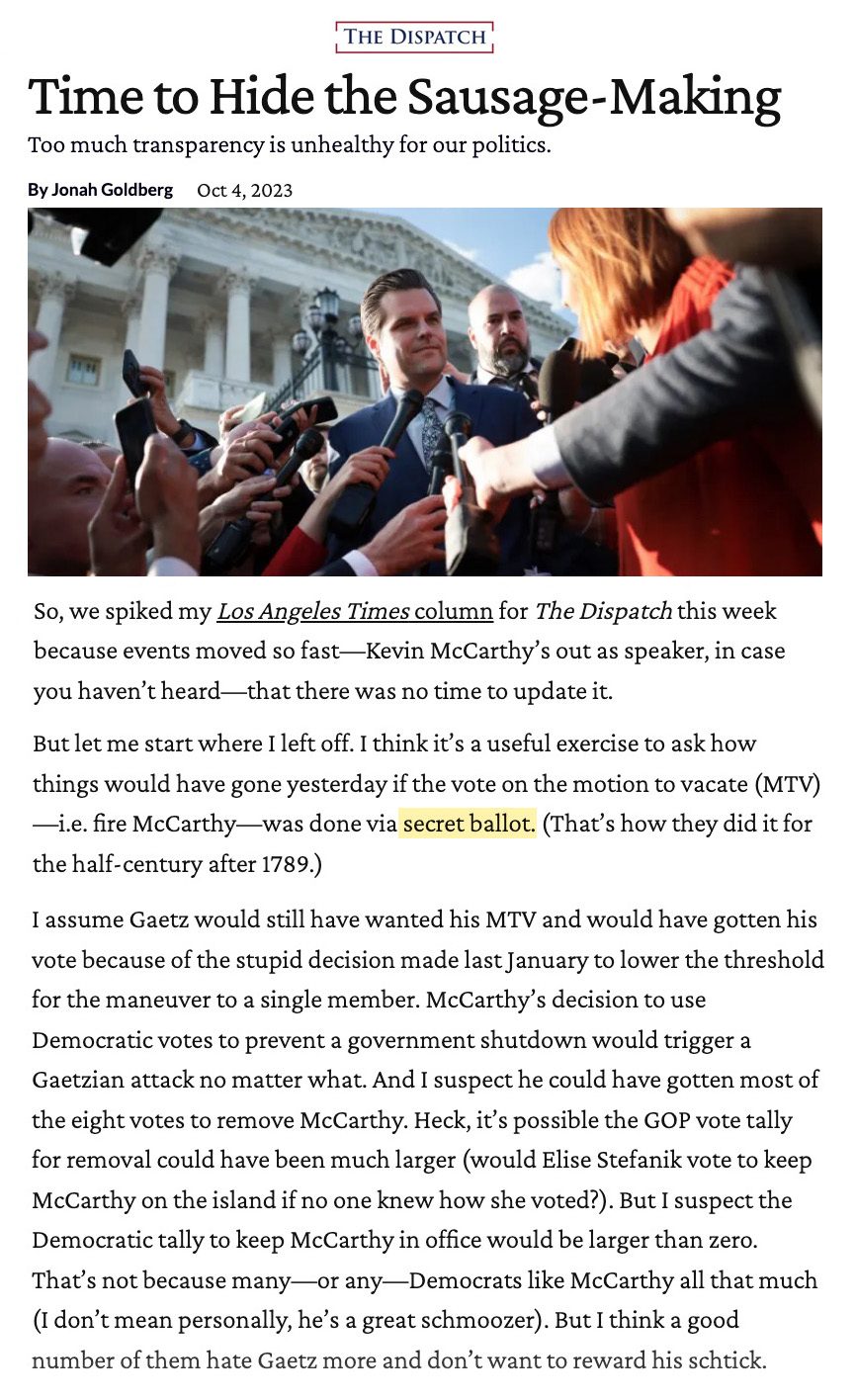
Jonah Goldberg 2023 - Time to Hide the Sausage-Making

Jonah Goldberg 2023 - Time to Hide the Sausage-Making
Without the adroit use of secret and public hearings in the Foreign Relations Committee, there likely would have been no Truman Doctrine.Linda Fowler 2019
Watchdogs on the Hill (oversight)More: Without the adroit use of secret and public hearings in the Foreign Relations Committee, there likely would have been no Truman Doctrine....Three days of executive sessions brought the secretary of state, the State Department’s aid coordinator, and three high-ranking military officers to Capitol Hill. Their assessment of the situation in the two countries was guarded and critical of the corrupt Greek regime, and it fueled members’ concern about wasting U.S. funds on a losing cause. Going public with this information would have not only killed the bill, but also jeopardized the passage of the European Recovery Act, otherwise known as the Marshall Plan...Despite the active leadership of Republican senators, the administration was able to claim the lion's share of the political credit because so much legislative effort was out of public view.
After the The frustration of the young liberals was shared by journalists and writers who covered the Hill. The old Congress was a secretive place. Committee deliberations were nearly always behind closed doors, and no records were kept of committee votes, except for the result. Even votes on the floor were frequently shrouded in mystery. Behind the closed doors, bargains were easier to strike, of course, and members who had to be implacable foes in public could work together, but reporters were understandably cool to the advantages of a system from which they were largely excluded. The organization politicians who dominated congressional life did not trust the press. William M. Lunch 1987
The Nationalization of American Politics
After the Before the Civil War, the Senate had been the forum for great debates, for thoughtful deliberation on the floor, that the Founding Fathers had designed it to be. During the decades after the war—the decades of the Gilded Age—it was, as the historian Matthew Josephson reported, “behind closed doors that the real work of Congress is done. Moving noiselessly through committee rooms, parliamentary leaders perfected the process … known as ‘invisible government.’” Aldrich, it was said, had “but to whisper in the committee rooms” to pass or kill a bill. Since debate mattered less and less, senators spent less and less time on the Senate floor.Robert A. Caro 2002
Master of the Senate - The Years of Lyndon B. Johnson LBJ
After the Robert C. Albright, who covered the Senate for the Washington Post, wrote in 1949 that “You can tread marble miles of Senate Office Building corridors without ever seeing an open door” … a remarkably large proportion of committee sessions then were executive, or closed, sessions.Robert A. Caro 2002
Master of the Senate - The Years of Lyndon B. Johnson LBJ
After the Seniority also governed the Senate in ways that were seldom written about, but that were decisive in the body’s impact on national life. Little journalistic attention was paid, for example, to the “conference committees,” composed of delegations from each house which were appointed ostensibly only to resolve differences between the Senate and House versions of a bill (but in the case of the Senate, its conferees were authorized to insert new material) and to report back to each house an agreed-upon “compromise” version for final ratification. But after the more dramatic floor debates and votes were over, these committees met behind closed doors, generally in the Senate wing of the Capitol, and these secret meetings were often decisive in determining a bill’s final form, since the version reported back to the two houses was generally accepted; as George H. Haynes, author of the most authoritative work on the Senate’s first 150 years, the two-volume The Senate of the United States, asked: “What chance is there, especially in the hectic closing hours of Congress, for members to decide whether they ought to agree to concessions that have been made?”—particularly since reopening the subject would mean reopening debate on the entire bill, thus effectively killing it.Robert A. Caro 2002
Master of the Senate - The Years of Lyndon B. Johnson LBJ
After the “Vote-counting” — predicting legislators’ votes in advance — is one of the most vital of the political arts.Robert A. Caro 2002
Master of the Senate - The Years of Lyndon B. Johnson LBJ
After the In even sharper contrast only nineteen of Johnson’s hearings were open, or about eight per year. (Truman had held about sixty-five open hearings per year.) The rest of the Johnson Subcommittee’s hearings were executive, or closed, sessions, held in its meeting room, SOB 212, with a uniformed Capitol policeman stationed in front of its closed doors to keep out the public. Public hearings, with witnesses’ upraised hands as they took the oath, the rap of the gavel, the popping glare of flashbulbs, the senators and counsel hunching forward for cross-examination, the dramatic moments of testimony, the murmur and hush of the audience, the reporters’ scribbling pencils, the wire service men jumping up and hurrying toward the door to send bulletins—public hearings with their constant potential for the controversy and confrontation that makes news—were one of the surest devices for bringing recognition to a senator, the device used by most senators seeking publicity. But the public hearing is always a risky device, with ample possibilities for mishaps; it is, after all, not only the chairman to whom the committee horseshoe offers a forum: senators can disagree with each other. The witness table, too, can be a forum—a national sounding board for a witness who disagrees with the chairman. Controversy and confrontation do not always play out according to a chairman’s script. Lyndon Johnson didn’t want any mishaps. He wanted to minimize the chance of controversy and confrontation—wanted to have publicity without, so far as possible, the danger of bad publicity. And he succeeded: by making not hearings but reports—the forty-four printed, formal reports issued by his subcommittee during his chairmanship—the basis of his subcommittee’s work.Robert A. Caro 2002
Master of the Senate - The Years of Lyndon B. Johnson LBJ
The reason for the institutional members generating different emotions in the public may in part be found in the institutions themselves. Congress does its work in the open. The public sees almost all of the dirty laundry – both the perceived inefficiency (such as the disagreements, the bickering, the haggling, the obstructions put before the president) and the perceived inequity (such as the alleged influence of special interests, and of selfish concerns on the part of members themselves – scandals, perquisites, and so on). The public feels angry and disgusted at what it sees. The work of the Supreme Court, on the other hand, is done behind closed doors. The media occasionally report on a Supreme Court decision, but even then the public hears only the final summary judgment. What went on in private or even in the courtroom itself remains a mystery to all but a few Americans. This secretive and mysterious process is more likely to generate feelings of uneasiness and fear than anger and disgust. People are not sure what the Supreme Court is doing or what it will do next, but they know what Congress will do next, and they feel angry and disgusted about the whole thing. So the processes of the separate institutions may in fact feed into the emotional reactions people have toward the institutional membershipJohn Hibbing & Elizabeth Theiss-Morse 1995
Congress as Public Enemy
AN ENEMY BECAUSE IT IS PUBLIC
On the basis of both our focus-group sessions and the survey responses, we believe an important element of distaste for Congress either has been missed altogether or at least under emphasized by previous investigators. To wit: Congress embodies practically everything Americans dislike about politics. It is large and therefore ponderous; it operates in a presidential system and is therefore independent and powerful; it is open and therefore disputes are played out for all to see; it is based on compromise and therefore reminds people of the disturbing fact that most issues do nor have right answers. Much of what the public dislikes about Congress is endemic to what a legislature is. Its perceived inefficiencies and inequities are there for all to see.
Focus-group participants and survey respondents are disgusted by what they perceive to be undue interest-group influence in Congress. “Why doesn’t Congress represent real people?” participants would ask. Again, part of Congress’s problem is that perceived inequities are played out in public. People frequently see stories of members of Congress being too cozy with special interests, and they find such behavior disgusting. Moreover, when Congress does take action it is seldom fast. Madison believed this was good. He saw the Senate especially as protecting the people from themselves (Madison, 1964) and their oscillating moods and whims. But the public does not like overly deliberate politics. They would like to see something done quickly when in fact legislatures - particularly legislatures like the U.S. Congress - are not well-equipped for rapid action. Viewed in this context, it should be less than a shock that the public does not like Congress. The public prefers some degree of certainty, and when there is not certainty the public wants to believe that disputes take place on the merits of the issues.
Thus, the very openness of the legislative process, which might otherwise be thought to endear Congress to the people, is much more likely to have the opposite effect. Nasty, visible disputes within the executive branch are fairly rare, and interest-group activity there is seldom reported. Occasionally, cabinet rivalries and leaked position papers give the general public a glimpse of maneuverings at the highest policy levels of the presidency, but such instances are infrequent. For the most part, proposals flow from the White House with apparent unanimity from those involved. Dissenters remain quiet or fall in line after the decision is made, in accord with the structure of a hierarchically organized entity. And the Supreme Court, of course, has been artful at camouflaging its disputes. The Court’s “bickering” takes place behind carefully closed doors. Decisions, even when divided, are announced cleanly, and the public remains largely unaware of dissenting opinions. No open disputes, visible partisan stances, or transparent interest-group machinations can be seen. Decisions are presented as final products, not works in progress.
The public, for the most part, does not like the partisan debates, competing interests, and compromises that many close observers of modem democratic politics believe are unavoidable. Congress is the institution in which these distasteful elements of politics are most readily visible. Thus, while Congress is sometimes viewed by the public as an enemy, we wish to call attention to the fact that it is often viewed as an enemy because it is so public. John Hibbing & Elizabeth Thiess-Morse 1995
Congress as Public Enemy
The alternative route for those who seek to increase citizens’ control of government is to reform congressional procedures… so that legislators are responsive to general interests as well as group interests. Although this was the intent of those who reformed procedures in the 1970s, many of the reforms have had the opposite effect. Reformers demanded that all committee meetings must be open, but all this openness has actually allowed narrowly based interest groups to monitor legislators more closely and has thereby made legislators more responsive to group interests. Reformers demanded an end to the closed rule because it was antidemocratic, but most of the amendments proposed without benefit of the rule have been particularistic proposals that serve group interests. Reformers demanded an end to secret, unrecorded votes, but the increased reliance on recorded votes has actually made it easier for narrow groups to hold legislators accountable because most of these votes are on particularistic amendments. Douglas Arnold 1990
The Logic of Congressional Action
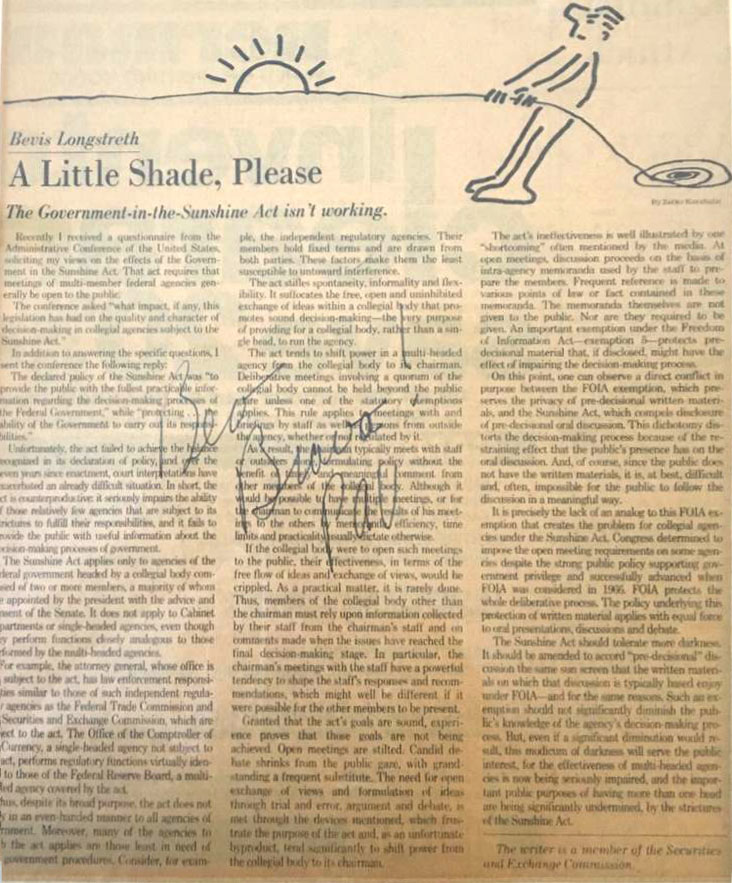
Bevis Longstreth 1983
Washington Post
The Government-in-the-Sunshine Act isn’t working

Bevis Longstreth 1983
Washington Post
The Government-in-the-Sunshine Act isn’t working
Obey, in an interview, blamed much of the push for secrecy on lobbyists. “You have a number of members frustrated because things they have said or done in open markups have been garbled by trade association newsletters and lobby groups,” he said. “Also, you have a feeling that the lobby groups in this country have become so single-minded and so intense that maybe it’s better to operate behind closed doors. You sometimes wonder who is having more influence – the lobbyists or the members.”Rep. David Obey D-Wi 1979
Conference Committees Open Doors (CQ)
Open conferences were an issue as far back as the first session of Congress in 1789. The first conference, on import and tonnage legislation, was held in open session. Non-conferees wandered in and out of the meeting room and the Senate finally had to adjourn for the day because its members, distracted by the conference action, were paying little attention to regular business. The next open conference was not recorded until 1911.CQ Quarterly 1979
Conference Committees Open Doors (CQ)
Transparency has, in recent years, become a mantra for advocates of good government. However, the benefits of transparency vary by context — it should not be seen as a universal ideal. Work in political science and economics suggests that publicizing deliberative processes in legislatures may lead representatives to pander to the public; or may cause potentially beneficial negotiations between countries or legislators to be derailed. Clearly, transparency in certain matters related to national security may have deleterious effects.James Hollyer 2015
What are the consequences of governmental transparency?
The typical American solution to perceived government dysfunction has been to try to expand democratic participation and transparency. Almost all of these reforms failed in their objectives of creating higher levels of accountable government. The reason is that democratic publics are not in fact able by background or temperament to make large numbers of complex public policy choices; what has filled the void are well-organized groups of activists who are unrepresentative of the public as a whole. The obvious solution to this problem would be to roll back some of the would-be democratizing reforms, but no one dares suggest that what the country needs is a bit less participation and transparency.Francis Fukuyama 2014
Political Order and Political Decay
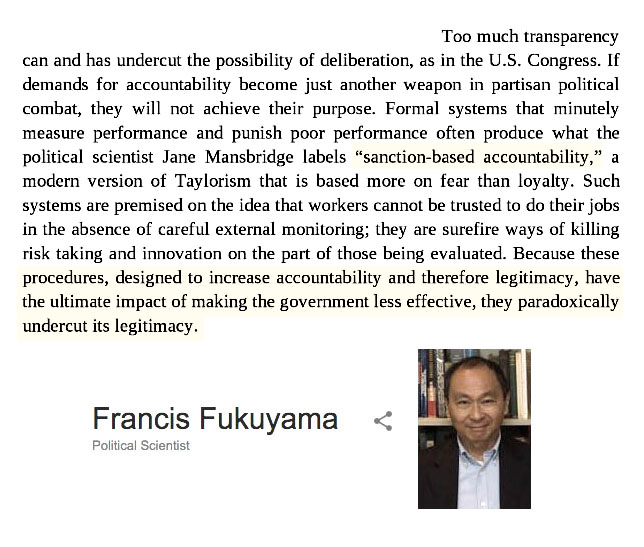
Francis Fukuyama 2014
Political Order and Political Decay

Francis Fukuyama 2014
Political Order and Political Decay
Rolling television coverage of Congress has been linked by many to the decline of deliberation in that body. Rather than debating with colleagues, members of Congress are in fact addressing activist audiences but in the media ether. One former senator I know, who has decried the deterioration of comity in Congress, noted that the most pleasurable moments of his career were spent on the intelligence committee, whose secrecy allowed members to say for once what they honestly believed.Francis Fukuyama 2015
The Limits of Transparency
Sessions were held in complete secrecy, with armed sentinels posted at the doors. Delegates knew that they would generate heated differences, and they did not want to advertise their own dissensions or put the ammunition of harmful arguments into the mouths of the opposition...[Benjamin Franklin] was inclined to be indiscreetly talkative in his declining years. Concerned for the secrecy of their deliberations, the [Framers at the] convention assigned chaperones to accompany Franklin to dinner parties and make sure he held his tongue.David M. Kennedy, Lizabeth Cohen 2018
The American Pageant
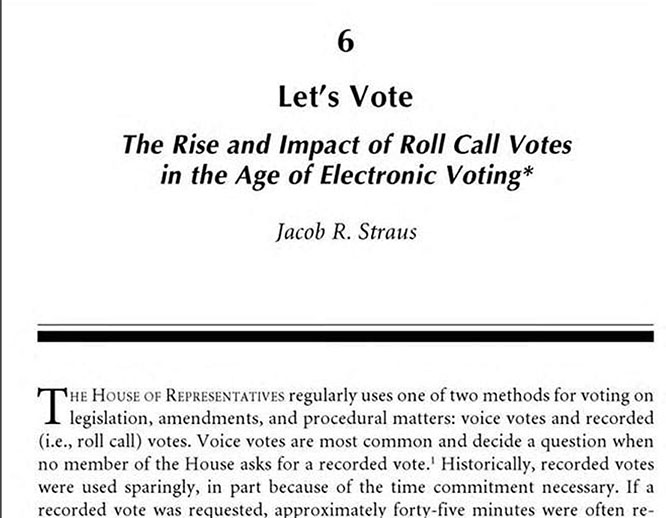
Jacob Straus 2012 – The Rise of Roll Call Votes (pdf)

Jacob Straus 2012 – The Rise of Roll Call Votes (pdf)
For information to be accurate and accessible, transparency requires the kind of regulation that proponents claim it is supposed to replace.Amitai Etzioni 2014
Transparency is Overrated
Transparency provides users with the illusion of openness while actually serving to obfuscate.Amitai Etzioni 2014
Transparency is Overrated
Sometimes the many calls you hear for more transparency in the workings of government may also be wrong… Negotiations cannot be public, as the parties will not be able to talk freely and frankly enough to do the work necessary to reach an integrative solution.Jane Mansbridge 2010
Against Accountability
We compare “open-door” bargaining, in which principals can serve the entire bargaining game as well as its outcome, with “closed-door” gaining, in which they observe only the outcome. We show that agents unambiguously bargain more aggressively with open doors than behind closed doors, which leads to a less efficient bargaining outcome. Their principals therefore prefer to let their agents bargain behind closed doors.John Fingleton & Michael Raith 2005
Career Concerns of Bargainers
The Democrat and other critics are exaggerating, however, when they say it’s “radical’ to negotiate a bill behind closed doors. It has become the norm for a small group of lawmakers and staffers to hash out the details of large, complex pieces of legislation in private, before presenting a final bill to Congress and the public. That’s become particularly true in the age of the 24-hour news cycle that includes dissection of every incremental adjustment or compromise under consideration, and of a political environment that is growing ever more hyper-partisan. Former Republican Senator Trent Lott, who led Senate Republicans through numerous politically charged policy battles, says a lot more can get accomplished in Congress out of the public eye than in it. “When the camera lights go off, the tone of discussion improved markedly,” he recalls of past negotiations.Emily Cadei 2017
Senate Health Care Bill
If the Dayton negotiations on Bosnia had been open to the press and all the terms of the final agreement fully disclosed, the leaders would almost certainly not have been able to reach an agreement. Or if the plans for a sting operation to catch drug dealers were revealed even after it took place, the safety of informers and future operations of a similar kind would be jeopardized. The dilemma of accountability may be thought of as a political version of the Heisenberg uncertainty principle. Just as physicists can't measure a particle's position and momentum at the same time (because the process of mea- suring the position disturbs the momentum), so citizens cannot evaluate some policies and processes because the act of evaluating defeats the policy or undermines the process.Dennis F. Thompson 1999
Democratic Secrecy
This summer’s efforts by White House and congressional budget summiteers to force deep cuts in the deficits have largely preempted the jurisdiction of congressional committees, notably the tax-writing panels. Although the members of the House Ways and Means and Senate Finance Committees would probably have a major voice in writing the details of any tax bill that emerges from a summit deal, they have already largely relinquished their authority to make the broad decisions. Their chairmen-Rep. Dan Rostenkowski, D-Ill., and Sen. Lloyd Bentsen, D-Texas have consented to arrangements that allow a wider group of Members to craft tax policy. “All Members see (raising taxes) as a tar baby, and they want to get rid of it,” a close observer said.
The Senate version of the clean air bill was drafted early this year during a monthlong series of meetings convened and masterminded by Senate Majority Leader George J. Mitchell, D-Maine. The meetings were held in Mitchell’s office, with key Senators and Bush Administration officials attending. This extraordinary step was taken after it had become clear that the Senate would never approve the legislation written by the Environment and Public Works Committee because of the opposition of the Administration and powerful private interests. Even in the House, where the bill was handled largely by the Energy and Commerce Committee, most of the major issues were resolved privately by the committee’s leaders, sparing the full committee and the House from the potentially painful task of choosing sides.
The Senate version of a comprehensive anticrime bill, which was approved in July, came to the floor despite the almost total absence of debate or formal action by the Judiciary Committee and with most of the important decisions made off the floor by party leaders. In the House, where the rules give the majority party added leverage, Judiciary Committee Democrats worked with party leaders on their own of the bill, which has been sent to the floor.Richard Cohen 1990
Crumbling Committees (Climate)
[In the late 1700s] the holding of [the Senate] sessions with closed doors, which in the light of its future development was, perhaps, the most important step taken by the senate at this time, was provided for by no rule and seems to have been entered upon without debate and without question. At that time secret sessions of legislative bodies were not as uncommon as they now are, and consequently the action of the senate attracted less attention than it would now. Prior to 1766, when on the motion of James Otis the general court of Massachusetts yielded to the demand for publicity of debates, no legislative body of America had admitted the public to its sessions; and the congress of the confederation and the convention for framing the constitution had both sat with closed doors.Clara Hanna Kerr 1895
Origin and Development of the United States Senate
In the early days, when all the sessions of the senate were held behind closed doors, the distinction, now very important, of the admission or non-admission of the public to the respective sessions, was absent. While the legislative sessions were soon made public, the executive sessions have constantly tended toward greater secrecy...The rule adopted in 1820 was interpreted as imposing secrecy upon the votes of individuals, since they were the expression of an opinion, but not upon the fact of nomination, confirmation, or rejection, or the state of the vote, nor was it held to contain a prohibition against each senator telling how he had himself voted.Clara Hanna Kerr 1895
Origin and Development of the United States Senate
Legislative secrecy… has been part of the policymaking process from Congress’s very beginning, and it remains an integral aspect of the lawmaking process. The Framers – who drafted the U.S. Constitution in closed meetings – even included a secrecy provision in that document. Article I, Section 5, states, “Each House shall keep a Journal of its Proceedings, and from time to time publish the same, excepting such Parts as may in their Judgment require Secrecy.” Moreover, when the first Senators gathered in New York for their first session [in 1789], they seemed to take it for granted that they would meet behind closed doors.Walter Oleszek 2011
Secrecy and Transparency
Transparency theory’s flaws result from a simplistic model of linear communication that assumes that information, once set free from the state that creates it, will produce an informed, engaged public that will hold officials accountable. To the extent that this model fails to describe accurately the state, government information, and the public, as well as the communications process of which they are component parts, it provides a flawed basis for open government laws.Mark Fenster 2006
The Opacity of Transparency
The enormous unintended consequences of disclosure requirements: First and foremost forced disclosure creates a nation that is more susceptible to security breaches and less able to enforce its own laws because evil-doers will have greater access to information that could be used to threaten the health and safety of the public.Mark Fenster 2006
The Opacity of Transparency
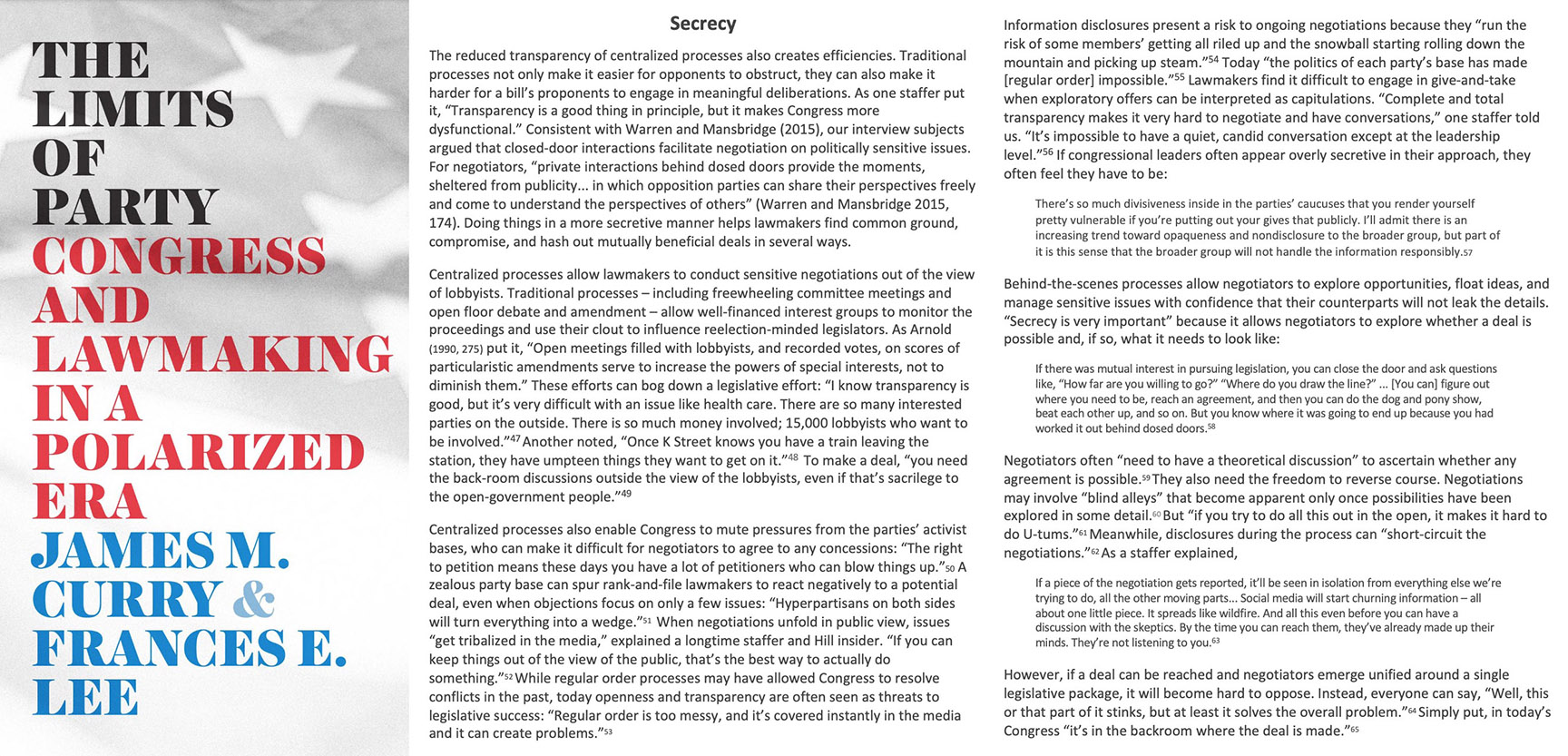
James Curry & Frances Lee 2020
The Limits of Party
Text: The reduced transparency of centralized processes also creates efficiencies. Traditional processes not only make it easier for opponents to obstruct, they can also make it harder for a bill’s proponents to engage in meaningful deliberations. As one staffer put it, “Transparency is a good thing in principle, but it makes Congress more dysfunctional.” Consistent with Warren and Mansbridge, our interview subjects argued that closed-door interactions facilitate negotiation on politically sensitive issues. For negotiators, “private interactions behind dosed doors provide the moments, sheltered from publicity... in which opposition parties can share their perspectives freely and come to understand the perspectives of others”. Doing things in a more secretive manner helps lawmakers find common ground, compromise, and hash out mutually beneficial deals in several ways. Centralized processes allow lawmakers to conduct sensitive negotiations out of the view of lobbyists. Traditional processes – including freewheeling committee meetings and open floor debate and amendment – allow well-financed interest groups to monitor the proceedings and use their clout to influence reelection-minded legislators. As Arnold put it, “Open meetings filled with lobbyists, and recorded votes, on scores of particularistic amendments serve to increase the powers of special interests, not to diminish them.” These efforts can bog down a legislative effort: “I know transparency is good, but it’s very difficult with an issue like health care. There are so many interested parties on the outside. There is so much money involved; 15,000 lobbyists who want to be involved.” Another noted, “Once K Street knows you have a train leaving the station, they have umpteen things they want to get on it.” To make a deal, “you need the back-room discussions outside the view of the lobbyists, even if that’s sacrilege to the open-government people.” Centralized processes also enable Congress to mute pressures from the parties’ activist bases, who can make it difficult for negotiators to agree to any concessions: “The right to petition means these days you have a lot of petitioners who can blow things up.” A zealous party base can spur rank-and-file lawmakers to react negatively to a potential deal, even when objections focus on only a few issues: “Hyperpartisans on both sides will turn everything into a wedge.” When negotiations unfold in public view, issues “get tribalized in the media,” explained a longtime staffer and Hill insider. “If you can keep things out of the view of the public, that’s the best way to actually do something.” While regular order processes may have allowed Congress to resolve conflicts in the past, today openness and transparency are often seen as threats to legislative success: “Regular order is too messy, and it’s covered instantly in the media and it can create problems.”

James Curry & Frances Lee 2020
The Limits of Party
Checking the ways other people vote is likely to be driven by private concerns, not by a concern for the common good. Vote checking, then, is likely to be performed for the wrong reasons.Bernard Manin 2015
Secrecy and Publicity
Some theorists claim that the secret ballot privatizes the vote. Actually, quite the opposite is true. It is only under public voting that the vote may effectively be employed for private gain. The secret ballot is an obstacle to such practice.Bernard Manin 2015
Secrecy and Publicity
Committees now open their proceedings to the public. Many are televised. All of this allows lobbyists to keep a close eye on events—and to confirm that the politicians to whom they have contributed deliver value. In short, in the name of “reform,” Americans over the past half century have weakened political authority. Instead of yielding more accountability, however, these reforms have yielded more lobbying, more expense, more delay, and more indecision.David Frum 2014
The Transparency Trap
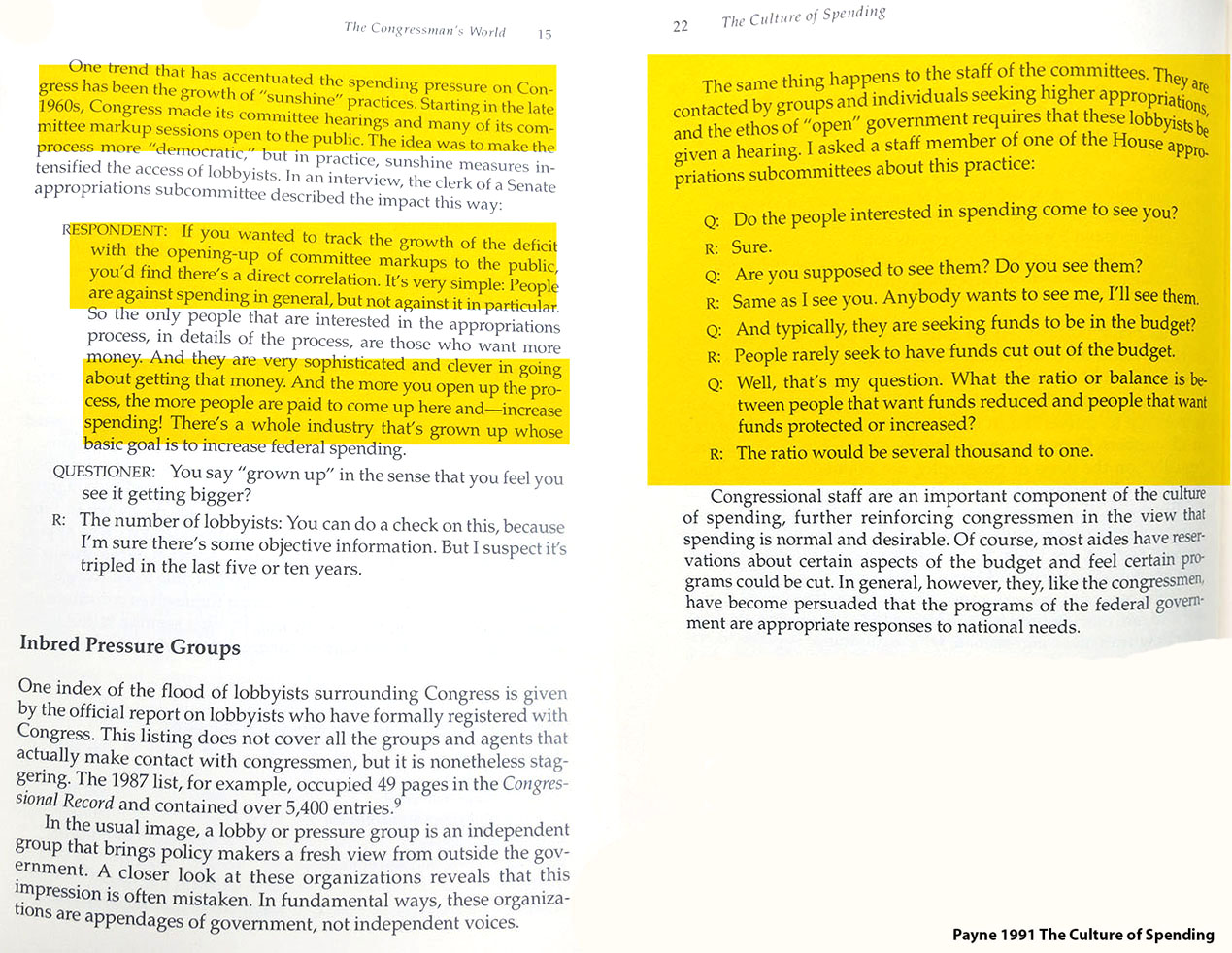
James L. Payne 1991
Culture of Spending
Text: One trend that has accentuated the spending pressure on Congress has been the growth of “sunshine” practices. Starting in the late 1960s, Congress made its committee hearings and many of its committee markup sessions open to the public. The idea was to make the process more “democratic,” but in practice, sunshine measures intensified the access of lobbyists. In an interview, the clerk of a Senate appropriations subcommittee described the impact this way: RESPONDENT: If you wanted to track the growth of the deficit with the opening-up of committee markups to the public, you’d find there’s a direct correlation. It’s very simple: People are against spending in general, but not against it in particular. So the only people that are interested in the appropriations process, in details of the process, are those who want more money. And they are very sophisticated and clever in going about getting that money. And the more you open up the process, the more people are paid to come up here and – increase spending! There’s a whole industry that’s grown up whose basic goal is to increase federal spending.

James L. Payne 1991
Culture of Spending
Since the 1960’s… legislatures, parties and other administrative agencies have sought to make their workings more transparent and responsive to the popular will. Yet the unintended consequence of this “democratization of democracy” is that all these institutions have become prey to the activities of professional lobbyists. Open committee meetings in Congress; primary elections to select delegates to national political conventions; changes to the system of campaign funding; the rise of referendums in state and municipal politics -- together, these well-intentioned innovations have tended to debase the political process.Niall Ferguson 2003
Overdoing Democracy (NYTimes)
MCEVERS: Were people okay with the Senate being a closed body?
ZELIZER: Well, we don’t really have great - we have no popular opinion polls until the 1930s and '40s. And in the period we do have those - the 1950s and '60s, which is really the high point I think of a lot of this secrecy in the middle of the Cold War and when the committees in both the Senate and House were very strong and deliberated on their own - there wasn’t a huge outcry against it. People certainly registered pretty high levels of trust in Congress certainly by the late '60s and early '70s.Julian Zelizer 2017
Congress Has A Rich History Of Legislating In Secrecy
Many of us have a reflexive belief that open political processes are more accountable, but we don’t often ask “accountable to who”? It’s easy to assume that the accountability is to a broader public interest. But in practice, transparency means that focused special interests can keep tabs on each proposal. If the special interests object, they can whip up a storm of protests. They also can threaten attempts at compromise, and push instead toward holding hard lines and party lines. Greater openness means a greater ability to monitor, to pressure, and to punish possible and perceived deviations.Timothy Taylor 2019
When Special Interests Play in the Sunlight
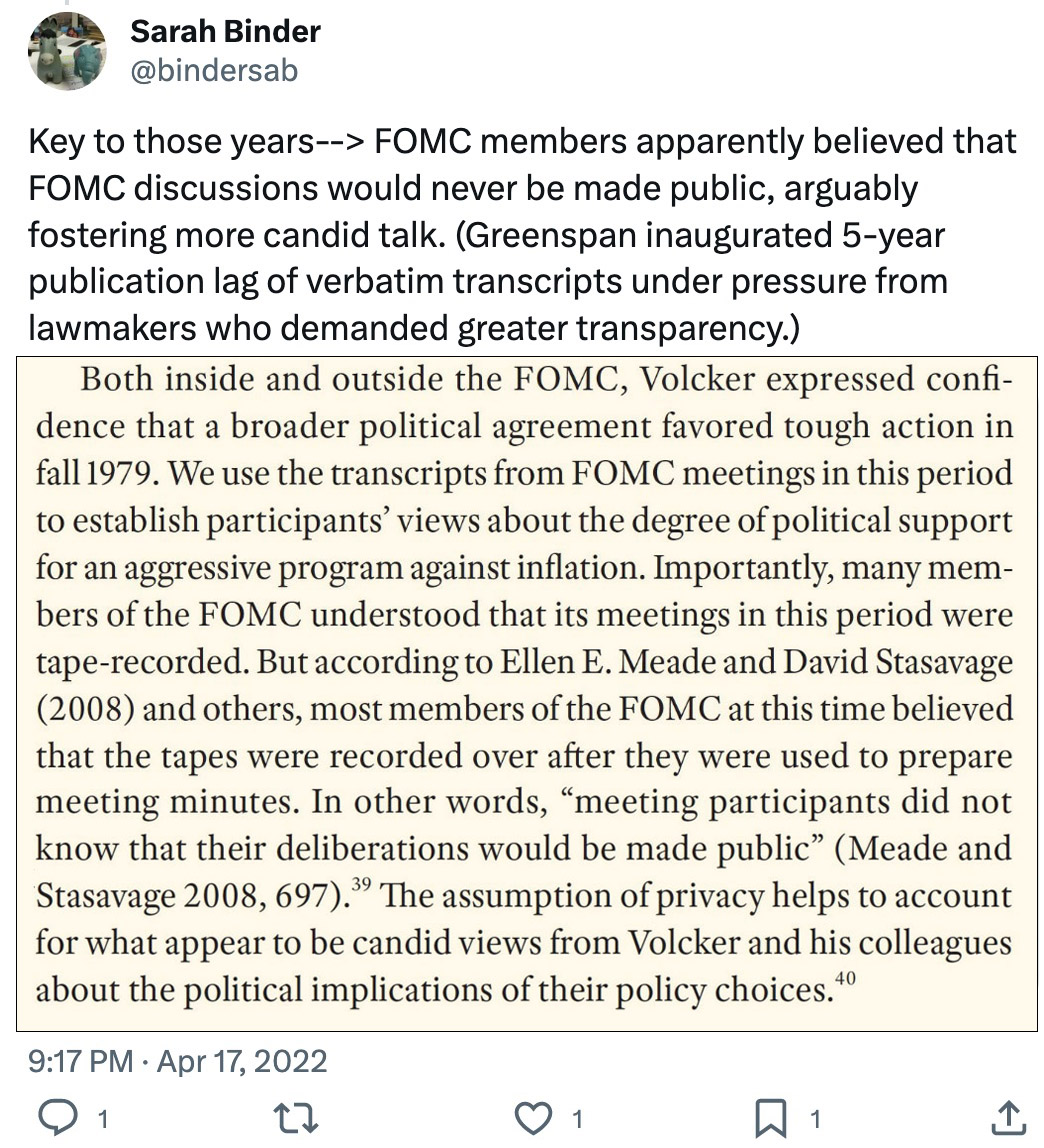
Sarah Binder Mark Spindel 2019
The Myth of Independence How Congress Governs the Federal Reserve
Text: Key to those years -> FOMC members apparently believed that FOMC discussions would never be made public, arguably fostering more candid talk. (Greenspan inaugurated 5-year publication lag of verbatim transcripts under pressure from lawmakers who demanded greater transparency.) Quote from her book: Both inside and outside the FOMC [Federal Open Market Committee], Volcker expressed confidence that a broader political agreement favored tough action in fall 1979. We use the transcripts from FOMC meetings in this period to establish participants' views about the degree of political support for an aggressive program against inflation. Importantly, many members of the FOMC understood that its meetings in this period were tape-recorded. But according to Ellen E. Meade and David Stasavage (2008) and others, most members of the FOMC at this time believed that the tapes were recorded over after they were used to prepare meeting minutes. In other words, “meeting participants did not know that their deliberations would be made public” (Meade and Stasavage 2008, 697). The assumption of privacy helps to account for what appear to be candid views from Volcker and his colleagues about the political implications of their policy choices....We have anecdotal evidence that the threat of transparency can make central bankers more cautious policymakers.

Sarah Binder Mark Spindel 2019
The Myth of Independence How Congress Governs the Federal Reserve
Human experience teaches us that those who expect public dissemination of their remarks may well temper candor with a concern for appearances and for their own interest to the detriment of the decision-making process.Justice Waren Burger 1974
Supreme Court
House and Senate committees conducted most of their hearings and all of their meetings in private during the first century of the Republic based on the parliamentary concept that the work of committees was advisory in nature and was not to be discussed elsewhere, especially by the parent chamber, until the committee had filed a formal report. In the early twentieth century, with the construction of new House and Senate office buildings, more space became available for committees to hold public hearings, and many began the practice on a selective basis. But committee meetings to “mark up” or amend pending bills continued to be held in closed, executive sessions.Donald Wolfensberger 2000
Congress and the People
In a secret meeting a public official can honestly confess ignorance of a subject and seek enlightenment from his fellow committee members and witnesses. He would not be able to bring himself to do this in a public meeting and such reluctance might have an adverse effect on the proceedings.Chief Editorial Writer 1961
Letter From Chief Editorial Writer of Chicago Sun-Times to Harvard Law Review
Members of Congress would have to determine whether the advantages of openness outweigh those of secrecy. Lest anyone think that opening formal meetings of any type will place the entire legislative process out in the open, the experience of committees must be reviewed. After committees opened their doors to the public, much of the key decision making occurred in the hallways, in the anterooms, and at pre-meeting meetings. There is a limit to “sunshine” procedures. Certain issues must be discussed in private. The legislative process would grind to a halt if everything had to be done in public. Just as there is a legitimate “private space” in each of our lives, public officials must be allowed to have some private space to develop policy agreements.Stephen Frantzich & John Sullivan 1996
The C-SPAN Revolution
I think TV is the biggest evil that has come to the House. Speaker O’Neill predicted what would happen… We now have four hundred and thirty-five potential stars of daytime television who are acutely aware that there are cameras in the chamber. They use them to get messages out. They plan for sound bites, things that can be quickly snatched by the evening news. It’s created a nastiness and a level of personal attack that was unheard of.Donnald Anderson 1997
Inside Congress
A group of scholars is now scrutinizing reform shibboleths about transparency, campaign finance, and direct democracy, etc. and finding them wanting.Daniel Stid 2015
Two Pathways for Congressional Reform
Increased openness may yield confusing and misleading information. Open meetings, as one agency member generally in favor of sunshine noted, at times can be marked by “disarray, confusion and misunderstanding that can cause the public to pick up the wrong signals.” To the extent that discussion and debate are guarded or colored by political purposes, the actual basis for decision may remain unarticulated. Puzzlement about the future course of policy may be created to the extent that split votes are caused by inflexibility rooted in public exposure or, as another member suggested, by the barriers raised by the act to negotiating unanimity.David M. Welborn, William Lyons & Larry Thomas 1984
Effects of the Federal Government in the Sunshine Act
The greater access enjoyed by journalists [via the sunshine laws] does not necessarily lead to more extensive or better reporting, it was suggested several times. Stories are enlivened by the opportunity to observe meetings directly and by the color this may yield, but substantive content is not always better than in the pre-sunshine period. Knowledgeable reporters, in this view, provided good and accurate coverage before the act.David M. Welborn, William Lyons & Larry Thomas 1984
Effects of the Federal Government in the Sunshine Act
As might be expected, members of attentive publics (special interests and lobbyists) are much more inclined to associate the Sunshine Act with an improvement in the quality of decisions.David M. Welborn, William Lyons & Larry Thomas 1984
Effects of the Federal Government in the Sunshine Act
A huge percentage of time is spent on how to use the political process to create a vote that will embarrass the other side. You basically have people working to make each other look as bad and stupid as possible.Rep Eric Fingerhut
Kessler 1997 (Inside Congress)
Disclosure also induces policymakers to distort the process of information gathering and evaluation. In contrast, when no information can be disclosed, the government has no incentive to manipulate information. Secrecy is therefore effective at protecting the integrity of the decision-making process.Patacconi & Vikander 2013
Misuse of Info for Public Debate
Members…at one time did not have to choose between the goals of maximizing reelection prospects and legislating in the national interest, the new transparency and interest group attentiveness to voting records, combined with the rewards of campaign contributions for acceptable conduct, forced that choice more and more often.Donald Wolfensberger 2012
Getting Back to Legislating
So where a chamber of the legislature voted against the considered opinion of the people — as represented by a substantial majority of the citizens’ assembly — that assembly could require the chamber to vote again, this time by secret ballot. Had we had such a system in 2013, Australia would not have stumbled into the disastrous climate change policy it has today and, as I’ve argued, Britain would be navigating its numerous and ongoing Brexit dilemmas more conscientiously. Meanwhile, in the US, the Senate might have structured its verdict on the 45th president as a procedural vote followed by a substantive vote. The first procedural vote would be by open ballot, and would determine by a simple majority whether the substantive vote should be by open or secret ballot.I think a majority would have voted for a secret ballot and, having loosed the vice-like grip of party discipline, would have struck a blow for true accountability rather than its tawdry simulacrum.Nicholas Gruen 2021
Saving democracy: one secret ballot at a time
Secrecy has always been the default presumption before the days of freedom of information and the craze for ‘transparency’.Nicholas Gruen 2012
Secrecy by default: How ‘performing government’ is trumping transparency
In some cases, members may request a roll call vote in an effort ot put a political opponent on the record. More often than not, this happens for measures that are politically unpopular for the opposition party. In making these requests (often requests from lobbyists), members are using the electronic voting system to potentially score political points or stop legislation they are opposed to… these measures are often designed to ‘kill’ the underlying piece of legislation if they are adopted.Jacob Straus 2012
The Rise of Roll Call Votes
The Washington establishment has been blown wide open.Lobbyist Tommy Boggs
The Power Game - How Washington Works
Probably the most significant amendment relating to the legislative procedure of the House adopted during debate on the 1970 Act (and nearly the only provision of the measure to generate any notable public interest) was the proposal – sponsored by 182 members – to record House members’ names on teller votes, either by House tally clerks or electronic equipment, with publication of the voting in the Congressional Record as has been done with roll-call votes. Under the prior procedure, dating back to early British parliamentary practice, only the total votes on each side of a teller vote, which takes place in the Committee of the Whole House on the State of the Union, were published. Since any amendment defeated while the House sits in Committee of the Whole cannot be the subject of a later record vote when the Committee rises, members could vote anonymously to defeat an amendment
they might feel obligated to support if their position were to be made public . Most amendments to legislation adopted in the House are decided by voice, standing, or teller votes, all – until the 1970 act – unrecorded. With recordation of teller votes, the number of members voting and thus participating in the amending process has been increased, and the outcome of the vote occasionally changed. Bruce Hopkins 1972
Congressional Reform: Toward a Modern Congress
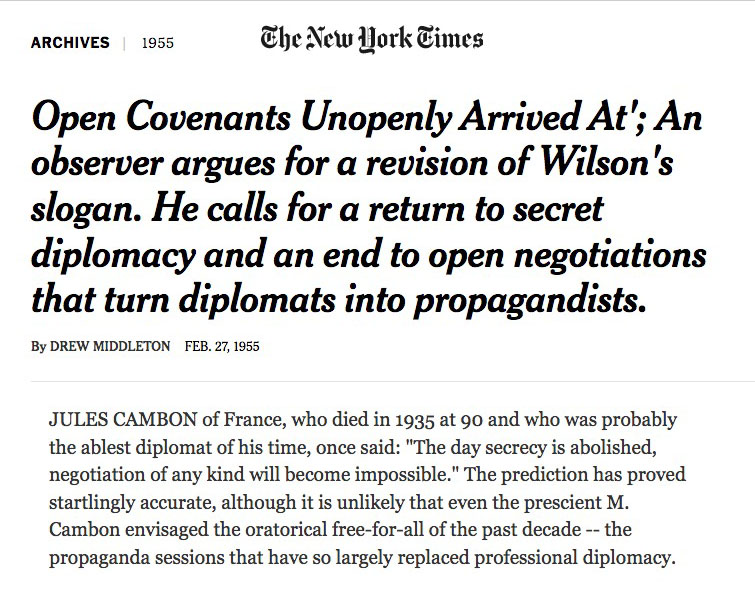
Drew Middleton 1955
Open Covenants Unopenly Arrived At

Drew Middleton 1955
Open Covenants Unopenly Arrived At
One principle surely is that the Government’s case for a measure of secrecy is not altogether frivolous or self‑serving. “The Federalist” is generally worth consulting on these matters; and its authors clearly specified two fields where secrecy seemed to them essential. The first was diplomatic negotiation: “It seldom happens in the negotiation of treaties, of whatever nature, but that perfect secrecy and immediate dispatch are sometimes requisite.” Woodrow Wilson, it is true, later appeared to repudiate this doctrine when he said that “diplomacy shall proceed always frankly and in the public view” and called for “open covenants of peace, openly arrived at.” Before World War I the French Assembly did not know the secret clauses of the Franco‑Russian alliance; nor did the British Foreign Secretary inform even his own Cabinet of the military understandings between the British and French General Staffs. This is what Wilson hoped to abolish.
But, as he himself made clear at Versailles, he really meant by “diplomacy” not the processes but the results of negotiation. In practice he favored plenty of talk out of “the public view” but no concealment of results—i.e., open covenants secretly arrived at. As for the negotiating process, Jules Cambon, who was French Ambassador to Berlin before World War I and whom that acute student of diplomacy Harold Nicolson regarded as perhaps the best professional of the century, was only mildly exaggerating when he wrote, “The day secrecy is abolished, negotiation of any kind will become impossible.” His recent trans‑Atlantic shuttling suggests that Henry Kissinger would agree. Whether blowing the secrecy destroys his capability for future private negotiations is a problem that one hopes Mr. Kissinger has pondered.
A second field noted in “The Federalist” as requiring secrecy was that of intelligence: “There are cases where the most useful intelligence may be obtained, if the persons possessing it can be relieved from apprehensions of discovery.” Contemplation of these two fields led “The Federalist” to conclude: “So often and so essentially have we heretofore suffered from the want of secrecy and dispatch, that the Constitution would have been inexcusably defective, if no attention had been paid to those objects.” In such terms “The Federalist” vindicated the right of the executive branch to conduct negotiations and, by inference, intelligence operations, without any immediate obligation to supply Congress or the people the detail of what it was doing. So from the start the American Government has been into secrecy… You can’t run a Government if every important secret is going to be handed over to the press.Arthur Schesinger Jr. 1972
The Secrecy DilemmaNote: Despite his comments, Wilson was hardly a fan of transparency. As President he conducted many of his most celebrated actions in secret, using guards at the doors of meetings to insure executive deliberations. Wilson also authored these words which embrace secret deliberations in Congress: “Rather than imprudently expose to the world the differences of opinion threatened or developed among its members, each party hastens to remove disrupting debate from the floor of Congress, where the speakers might too hastily commit themselves to insubordination, to quiet conferences behind closed doors, where frightened scruples may be reassured and every disagreement healed with a salve of compromise or subdued with the whip of political expediency.” Worth noting however that Wilson was one of the most disgusting presidents in history.
Official plans and decisions which, if prematurely disclosed, would lead to speculation in lands or commodities, preemptive buying, private enrichment and higher governmental costs.Arthur Schesinger Jr. 1972
The Secrecy Dilemma
Reform efforts to open state governments create a public that is somewhat more satisfied with those governments, but less knowledgeable about them. That is, transparency strengthens the public’s confidence that government is working on its behalf without actually changing the public’s likelihood of monitoring politicians’ choices. This “illusionary” effect of transparency provides legislators with no real incentive to adapt their behavior, the policymaking environment, or the provision of representation. Moreover, it opens the door for other actors – namely interest groups – to observe and apply pressure to lawmakers. Thus, we ultimately conclude that by falsely reassuring the public while exerting no effect on legislators, open meetings laws have largely failed to live up to their stated goal of improving political representation. They do not strengthen accountability, but instead facilitate the capacity of unrepresentative interest groups to seek access and influence in state governments.Justin H. Kirkland, Jeffrey J. Harden 2022
The Illusion of Accountability: Transparency and Representation in American Legislatures
Senator Russel Long argued that “every senator is going to change his pattern of conduct if the Senate is on television” (Congressional Record 15 April 1982, 3582). His prediction was that individual senators, given their ambitious nature and their political goals, would be more attracted than ever to the opportunities for garnering favorable publicity on the Senate floor. “There is no way, in my judgment, and I am positive I am right about his,” he argued, “that we can put the Senate of the United States on live television without greatly increasing the amount of time that Senators are going to spend making speeches here in the U.S. Senate” (Congressional Record 2 Feb. 1982, 279). “Every Senator is a prima donna in one degree or another,” he told the Rules Committee, “and everyone of them is going to be tempted to make himself a speech for the folks back home … And for those who are motivated to take an interest in being President of the United States, hoping lightning might strike them some day [and he estimated 61 such senators] what better opportunity to appear just as often as possible, say something that they think would have some appeal to people across the country” (U.S. Senate 1981, 146). The scenario he saw was one of ever increasing individualism. More political speechmaking (grandstanding), he argued, would diminish the Senate’s capacity to conduct its normal legislative business. “The people don’t send us here to wage a campaign for our reelection or wage a campaign for some other office,” he said. “They elect us here and send us to legislate and pass laws that are in their interest” (U.S. Senate 1981, 76)… Long also predicted more publicity inspired amendments and roll calls ( Congressional Record, 3 Feb. 1982, 345). He further predicted that debate would be less than ever internally focused – senator to senator – and more directed to the outside audience, thus trivializing and atomizing deliberations. Richard Fenno 1989
The Senate through the Looking Glass - The Debate over Television
Trevor: Do you think maybe the court should jump into the era of tv and broadcast what you’re doing? Sonia Sotomayor: No. You walk into our courtrooms and we’re not made for tv, and I think if our arguments were televised, it might change the dynamic, and we’re human beings and the draw to play to tv affects every human being. Trevor: Now that you’ve said that, I feel like no part of the u.s. government should be on TV. Sonia Sotomayor: Actually, that’s what some senator said to me, that the partisanship in the senate started the senate room. those senate rooms now are completely empty. It’s the chair of the senate, it is the senator speaking and some members of his staff. there is no one else in the room but the camera, and they’re speaking to the camera, not to each other. But many senators told me that they felt that much of the collegiality died when they stopped getting together in that room and were forced to listen to each other and were forced to sit next to each other and talk to each other. So I think you said a joke, but some might think it might be a good idea to return to those days.Sonia Sotomayor 2019 (Supreme Court Justice)
The Trevor Noah Show
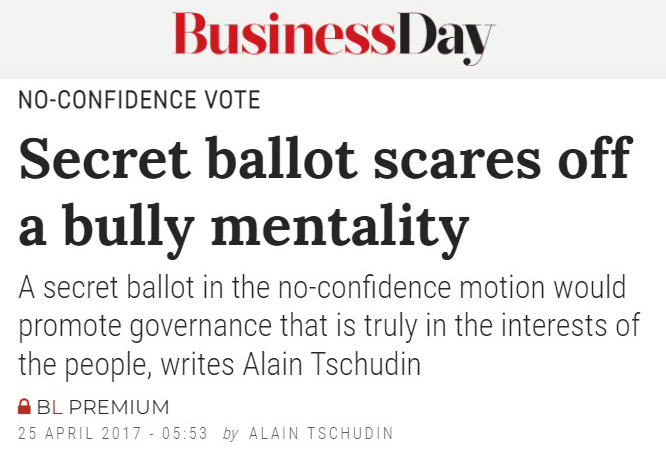
Alain Schudin 2017 - Secret ballot in Parliament scares off a bully mentality (South Africa)

Alain Schudin 2017 - Secret ballot in Parliament scares off a bully mentality (South Africa)
Everything that is special about the Senate, said Senator Russell Long, “is foreign to the idea of putting the matter on television, which would tend to make the Senate easier to stampede and make the difficult job of statesmanship, that type of statesmanship which requires enormous courage on the part of a senator, a great deal more difficult” (Congressional Record 15 Apr. 1982, 3582). In Long’s view, the scheme to pack the Supreme Court would not have been stopped and the Panama Canal Treaty would not have been ratified in the presence of television (Congressional Record 2 Feb. 1982, 280). Nor would Long have been as likely to have defended fellow Senator Thomas Dodd, nor would Daniel Inouye have been as likely to have defended Senator Harrison Williams, he speculated. “You need a Senate of the type we have known,” he told his colleagues, “where statesmanship can prevail, and you should not be doing things that are going to make it more difficult for statesmanship to prevail in this body” (Congressional Record 15 Apr. 1982, 3582). That is exactly what he believed television would do.Richard Fenno 1989
The Senate through the Looking Glass - The Debate over Television
In 2006, the new Democratic majority in the U.S. Congress, having campaigned against “earmarks” (targeted expenditures),began to publish which lawmakers had voted for and obtained them. Here transparency, not secrecy, yielded perverse results: earmarks increased, in part because legislators saw what other legislators were getting and demanded more, in part because interest groups could more easily monitor whether legislators were delivering the goods.Adrian Vermeule 2010 (Harvard Law)
Open-Secret Voting
In the Italian Parliament of the 1970s and 1980s, the practice was that bills designated as issues of confidence by the government would be voted upon first by open ballot, then by secret ballot. The results frequently differed. In 1986, Bettino Craxi’s government (widely regarded as one of the most corrupt and intimidating in history) won the open vote of confidence by a margin greater than 100, only to be defeated on the secret ballot. Craxi was forced to resign...Successive votes by the same body under different transparency regimes sometimes reach strikingly different outcomes.Adrian Vermeule 2010 (Harvard Law)
Open-Secret Voting (ITALY)
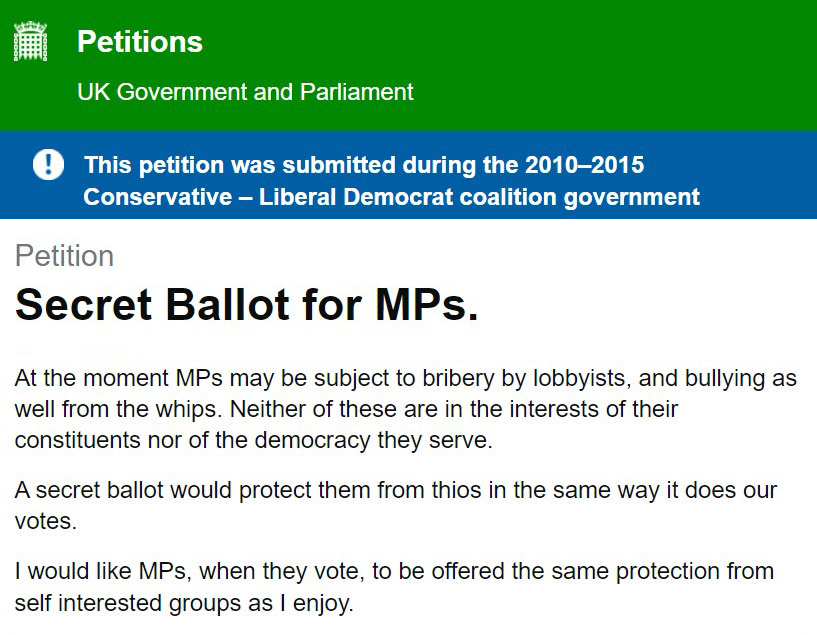
Petition 2012 - Prevent Bullying of MPs by employing secret ballots in Parliament (UK, England)

Petition 2012 - Prevent Bullying of MPs by employing secret ballots in Parliament (UK, England)
Lindsey Graham was pissed. The whole thing was “crap,” “a charade” and “despicable,” the South Carolina Republican said. By the fifth day of Senate hearings for Supreme Court nominee Brett Kavanaugh, Graham was done with Democrats harping on what he considered to be a slanderous sexual assault allegation. “This is the most unethical sham since I’ve been in politics,” Graham said, pointing a finger across the dais of the Judiciary Committee. The clip went viral. Fox News ate it up. And for Graham, the soundbites paid off handsomely. During the next month, his campaign received $319,000 in large donations (more than $200) – or five times what he raised the previous month. More than 80 percent of the money came from people outside Graham’s home state. For the senator, who’s seeking a fourth term next year, the takeaway is clear: Full-throated histrionics, when broadcast live for millions and replayed for days on cable news, can turn into easy money. But for those focused on how Congress is stymied by partisanship and consumed by fundraising, the moment delivered this counterintuitive message: While putting Congress on TV has brought transparency to the legislative process, it has also created a prime venue for the sort of grandstanding that galvanizes a political base, divides a country and raises a whole lot of money.Geoff West 2019
Cameras as Cash Machines
Open voting can induce posturing, political correctness, or, what is equally bad, bending over backwards to signal that the voter is not politically correct; it also makes possible credible commitments to corrupt bargains with other voters or third parties (special interests or other members of Congress).Adrian Vermeule 2010 (Harvard Law)
Open-Secret Voting
The ways in which positions can be registered are numerous and often imaginative. There are floor addresses ranging from weighty orations to mass-produced “nationality day statements.” There are speeches before home groups, television appearances, letters, newsletters, press releases, ghostwritten books, Playboy articles, even interviews with political scientists. On occasion congressmen generate what amount to petitions; whether or not to sign the 1956 Southern Manifesto defying school desegregation rulings was an important decision for southern members. Outside the roll call process the congressman is usually able to tailor his positions to suit his audiences. A solid consensus in the constituency calls for ringing declarations… Division or uncertainty in the constituency calls for waffling; in the late 1960s a congressman had to be a poor politician indeed not to be able to come up with an inoffensive statement on Vietnam (“We must have peace with honor at the earliest possible moment consistent with the national interest”). On a controversial issue a Capitol Hill office normally prepares two form letters to send out to constituent letter writers – one for the pros and one (not directly contradictory) for the antis.
Yet it is on roll calls that the crunch comes; there is no way for a member to avoid making a record on hundreds of issues, some of which are controversial in the home constituencies. Of course, most roll call positions considered in isolation are not likely to cause much of a ripple at home. But broad voting patterns can and do; member “ratings” calculated by the Americans for Democratic Action, Americans for Constitutional Action, and other outfits are used as guidelines in the deploying of electoral resources. David Mayhew 1974
The Electoral Connection
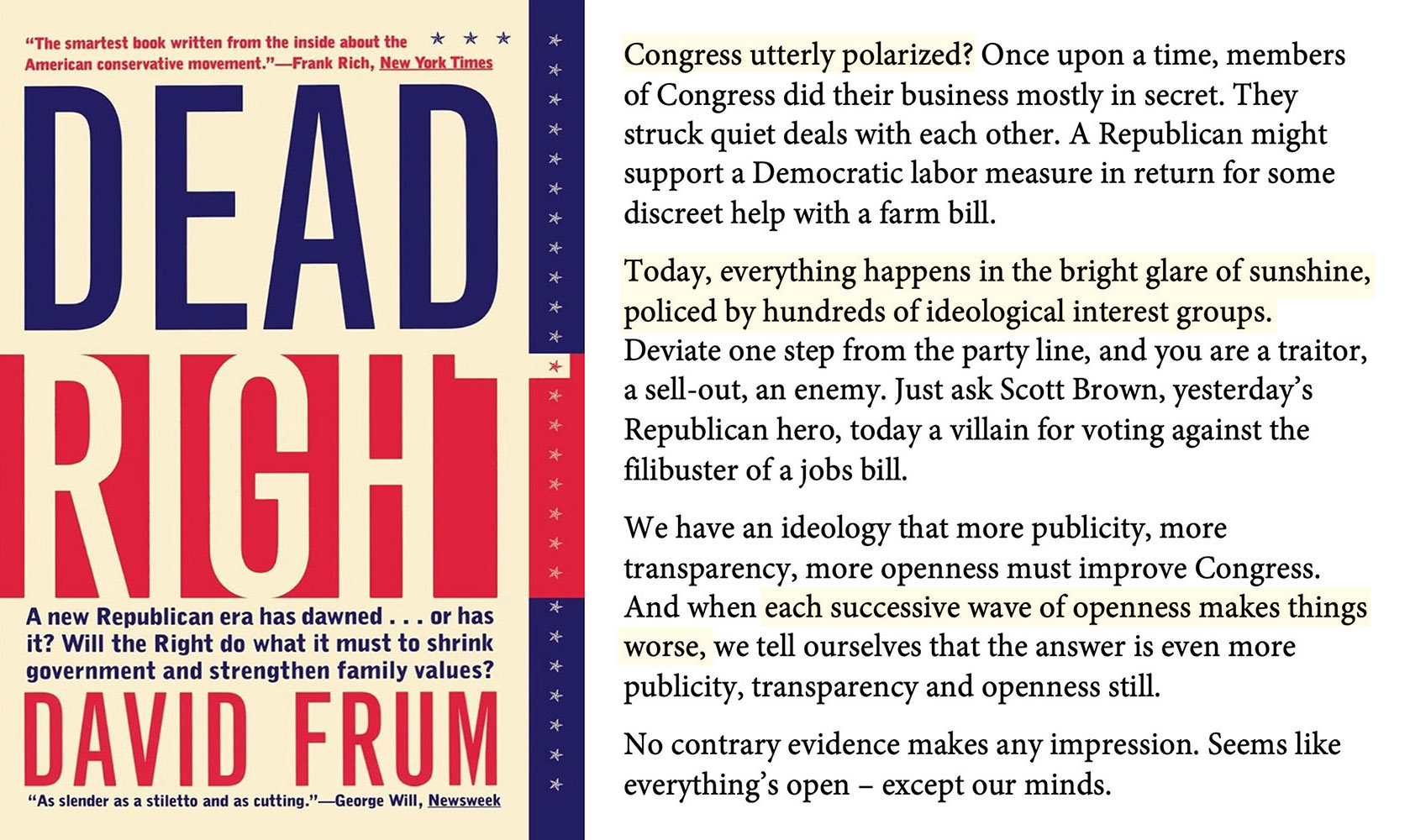
David Frum 2010 - Dead Right

David Frum 2010 - Dead Right
Committee meetings are held behind closed doors, which means that neither the public nor the media can attend. This allows members to discuss sensitive political issues without outside listeners. The idea is that this should provide better opportunities for reaching agreements and compromise solutions between the parties.Sveriges Riksdag 2020
Official Swedish parliament website
“The free debate in the Senate will have to go if the television comes in.” “Television will kill it,” Senator Russell Long argued, “for the simple reason that television will make such a complete demand for unnecessary speeches for the benefit of the constituency back home that you won’t have free debate any more”. The sheer increase in speech making would necessitate a whole new set of rules “to accommodate it,” including “a closed rule… similar to that in the House,” he prophesied.Richard Fenno 1989
The Senate through the Looking Glass - The Debate over Television
While our empirical results seem unexpected, they are generally consistent with predictions of recent and elaborated models (Fox 2007; Prat 2005) which highlight the potential negative impacts of transparency of individual votes on the quality of political representation.David Stadelmann, Marco Portmann and Reiner Eichenberger 2014
Transparency Does Not Increase the Quality of Political Representation
The congressional sunshine initiative became a tool for the very special interests whose power the reforms were supposed to dilute. Corporations and lobbying groups have seized on the open hearings to help them hold legislators accountable as never before.Martha Hamilton 1984 – The Washington Post
Opening Up Congress
During the closed House Ways and Means Committee mark-up, the action was brisk and lobbyists and the press were kept outside, littering the halls of the Longworth House office building with candy wrappers and cigarette butts. On the (open) Senate side, mark-up sessions were long and sometimes chaotic. The drafting took weeks. Everything was subject to change, with lobbyists reversing key votes. What took weeks on the (open) Senate side took two days in (closed) Ways and Means. And what took the better part of a week on the Senate floor and ended at dawn after a punishing 19-hour session, took just hours on the House floor. Hamilton 1984 – The Washington Post
Opening Up Congress
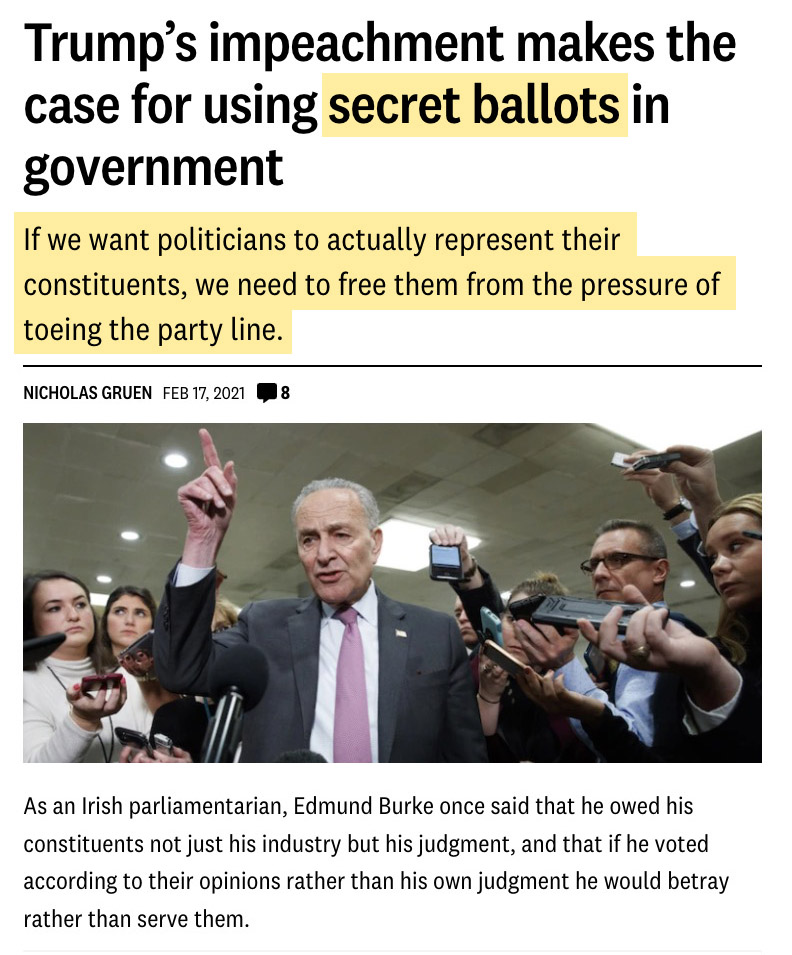
Nicholas Gruen 2021 - Impeachment makes case for secret ballots in government

Nicholas Gruen 2021 - Impeachment makes case for secret ballots in government
That transparency checks corruption is an article of faith among reformers, but its benefits are elusive. This paper offers five core arguments: First, most transparency policies miss much of what many citizens regard as corrupt. Second, even for the sorts of corruption directly targeted by transparency reforms, effects will often be minimal. Third, transparency can actually make corruption worse. Fourth, transparency can help powerful interests protect their advantages while weakening countervailing forces. Fifth, for transparency to check corruption, the data it reveals must be used in organized and sustained ways. While transparency will always have a place as an aspect of good governance, when it comes to corruption the alternatives may be counterintuitive – for example, “blinding” some processes that are now publicly disclosed. Understanding these problems is essential if we are to improve on the indifferent results of reform and address the political malaise afflicting many liberal democracies.Michael Johnston 2018 (draft)
The Sunlight Paradox
The deliberation and the decisions have to happen someplace. And in the 1970s when the conference committees would rule between the House and the Senate they have to take a bill and make it identical, they use to be private. They became public under a law in the 1970s and then more people wanted to be on these committees and the cameras were there, the press was there. So, they ended up having to make decisions, where? During the bathroom breaks. And the decisions were made in the Senators only bathrooms. And they would just huddle in there…so all this distortion happens. Increasingly what we see, on TV, is just for public consumption. Because everybody’s watching, so they just grandstand. You don’t get the same kind of deliberation…I also resonate with the idea that trust is central to it all.David King 2014
Tensions in Transparency (Harvard talk)
On their face, these sunshine reforms of the 1970s—open procedures, campaign finance regulations, and ethics codes—and their periodic fine-tuning since then, were designed to make it possible, although not necessarily easy, for the public to assess the degree to which members of Congress pursue their own interests at the expense of the public’s. But in adopting even such praiseworthy reforms as increasing congressional visibility, and thus accountability, the lawmakers may have had less readily defensible intentions. Although little noted in the press or by the public, there were clear implications for the political parties in the requirement that Congress perform in public. The more visible any action, the more that competing pressures – from the president, interest groups, and the public generally – come into play; the greater the extent and intensity of such pressures, the less likely members will be to defer to party leaders and support party line.Larry Rieselbach 1994
Congressional Reform
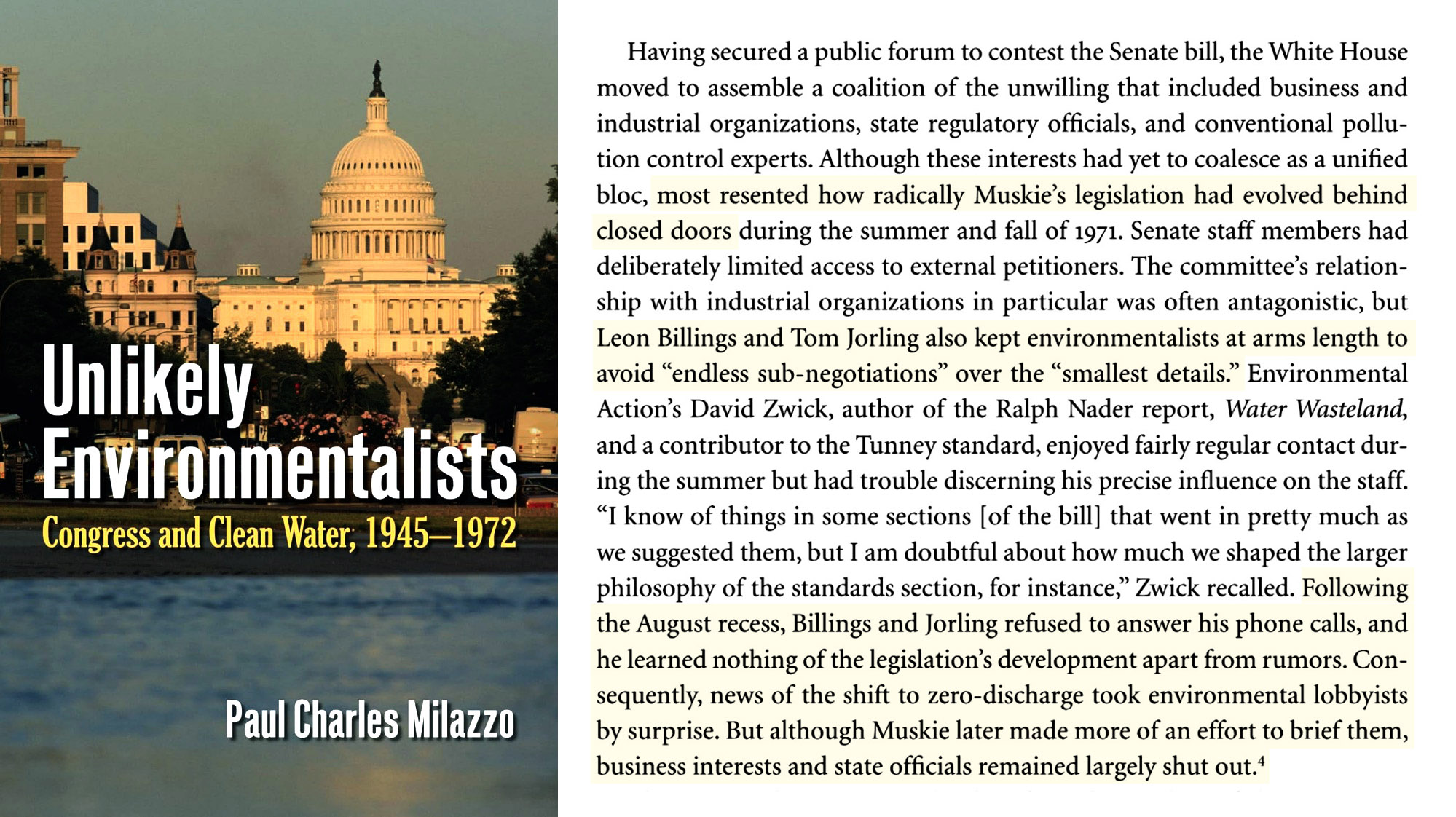
Paul Milazzo 2006 - Unlikely Environmentalists: Congress and Clean Water, 1945 - 1972 (Climate)
[Fearful of lobbyists from both sides of the issue, members wrote environmental policy behind] closed doors during the summer and fall of 1971. Senate staff members had deliberately limited access to external petitioners. The committee's relationship with industrial organizations in particular was often antagonistic, but Leon Billings and Tom Jorling also kept environmentalists at arms length to avoid “endless sub-negotiations” over the “smallest details.”

Paul Milazzo 2006 - Unlikely Environmentalists: Congress and Clean Water, 1945 - 1972 (Climate)
Too much transparency can and has undercut the possibility of deliberation, as in the U.S. Congress. If demands for accountability become just another weapon in partisan political combat, they will not achieve their purpose. Formal systems that minutely measure performance and punish poor performance often produce what the political scientist Jane Mansbridge labels “sanction-based accountability,” a modern version of Taylorism that is based more on fear than loyalty. Such systems are premised on the idea that workers cannot be trusted to do their jobs in the absence of careful external monitoring; they are surefire ways of killing risk taking and innovation on the part of those being evaluated. Because these procedures, designed to increase accountability and therefore legitimacy, have the ultimate impact of making the government less effective, they paradoxically undercut its legitimacy.Francis Fukuyama 2014
Political Order and Political Decay
At a Rose Garden ceremony on May 19, 2009, President Obama announced an “historic agreement” between automakers, the International Union, United Automobile, Aerospace and Agricultural Implement Workers of America (UAW), the State of California, and the Obama Administration to set fuel economy/ GHG standards through 2016, hereinafter referred to as the “historic agreement.” Unfortunately, this agreement is quite literally the product of secret, closed door negotiations, led by Assistant to the President for Energy and Climate Change, also known as the Energy and Environment Czar, Carol Browner. According to the New York Times, Ms. Browner imposed a “vow of silence” over the negotiations on vehicle fuel economy [standards]. California Air Resources Board Chairman Mary Nichols even bragged that “We put nothing in writing, ever.” Due to this unusual imposition of secrecy, any conversations between individuals in the automobile industry and members of the Administration, which led or contributed in any way to the historic agreement, shall be hereinafter referred to as the “secret negotiations.”Representative Darrell E. Issa & Lamar Smith 2010
Request for Information on Secret Negotiations (Climate)
With committee proceedings and voting matters of public record, lawmakers can no longer hide behind closed doors and unrecorded votes; they must take care to protect their political futures. The presence of lobbyists and administrative officials at public sessions – where they can monitor members’ behavior, offer texts of amendments, and notify their employers when and where to apply pressure – may make it more difficult for committees to act decisively. Increasingly, they have resorted to “executive” or “informal” sessions, held prior to official meetings, where members can talk freely and develop compromises without the intrusive presence of outsiders. Larry Rieselbach 1994
Encyclopedia of Policy Studies
However, other data — especially evidence assembled by behavioral economists — strongly indicate that people are neither as able to process information nor as likely to act on it as transparency theory presumes. Hence, in situations in which adverse outcomes have a relatively high disutility (e.g., there is a high probability that they will cause death, serious bodily damage, or loss of one’s home or life’s savings) or the information is complex (e.g., medical information), drawing on other sources of regulation in addition to transparency seems called for. Administrative reform cannot, however, deliver on transparency’s metaphoric promise. The state’s large, organizationally and physically dispersed public bureaucracies perform a variety of functions and make a staggering number of decisions of varying importance, not all of which can be viewed before the fact or even easily reviewed later. The state is too big, too remote, and too enclosed to be completely visible. The very nature of the state, in other words, creates the conditions of its obscurity. It can never be fully transparent, at least not in the sense that the term and its populist suspicions of the state require. Overinvestment in transparency as a metaphor leads open government advocates to lament insufficiently effective administrative laws, while the debate over how best to make the government open too often focuses on how to make the state permanently and entirely visible rather than on devising means to improve public oversight and education. Amitai Etzioni 2010
Is Transparency the Best Disinfectant?
For Henry Kissinger, the quiet resolution of the Cienfuegos crisis and subsequent visits by Soviet submarines to Cuba, testing the Nixon administration’s resolve, showed how successful the back channel could be: “All this, it must be remembered, was handled almost entirely by private diplomacy. The process was essentially a series of messages in the presidential Channel, backstopped by interagency coordination in the WSAG. Rather than a dramatic confrontation on the order of 1962, we considered that quiet diplomacy was best suited to giving the USSR an opportunity to withdraw without humiliation.”Richard A. Moss 2017
Nixon’s Back Channel to Moscow
It was in the Rules, Discipline and Privileges Committee that I was again [in Uganda in 2005] confronted with the issue of amending the constitution to remove the presidential term limits. Originally, according to the rules, voting on the removal of the term limits was supposed to be by secret ballot. However, the government quickly moved to seek an amendment of the rules of procedures so as to make voting on this issue open, whereby each individual member would be required to verbally and openly declare YES or NO to the lifting of the term limits. My suspicion was that this change of procedure was sought that members who had been bribed to support the constitutional amendment would be intimidated and publicly vote in favour of the motion. As a member on that Rules Committee, I vehemently opposed the amendment of this rule of procedure.Miria Matembe 2019
The Struggle For Freedom & Democracy Betrayed (Uganda)
President Museveni has shed off all pretense of niceties and its now brute force at work. At the height of the removal of age limit debate dubbed Togikwatako, the opposition MPs put up a spirited fight in parliament to defend the sanctity of the constitution. The regime was not having any of it and on 27th September, 2017 a gang (believed to be members of the elite presidential guard) invaded the house and beat up MPs leaving some of them hospitalised and others like Hon Betty Nambooze with permanent disabilities. Unfortunately, Museveni eventually got his way and the age limit was scrapped by Parliament.Miria Matembe 2019
Struggle For Freedom & Democracy BetrayedNote: During a Parliamentary discussion over the age-limit clause of the President of Uganda, one that if maintained would remove the aging President Museveni from power, bullies entered Parliament and began to beat the members. The opposition groups in Parliament, seeking to maintain the age-limit, were also seeking to have a secret ballot parliamentary vote on the question. President Museveni did everything in his power to prevent that. He suceeded, the vote was open, and he (and his armed gangs) won by over 90% of the vote. Yet most agree that if the vote had been secret he would have lost. Matembe continues “[President Musevini] pitched camp in the Parliament’s chamber to personally see to it that the MPs voted as instructed.”
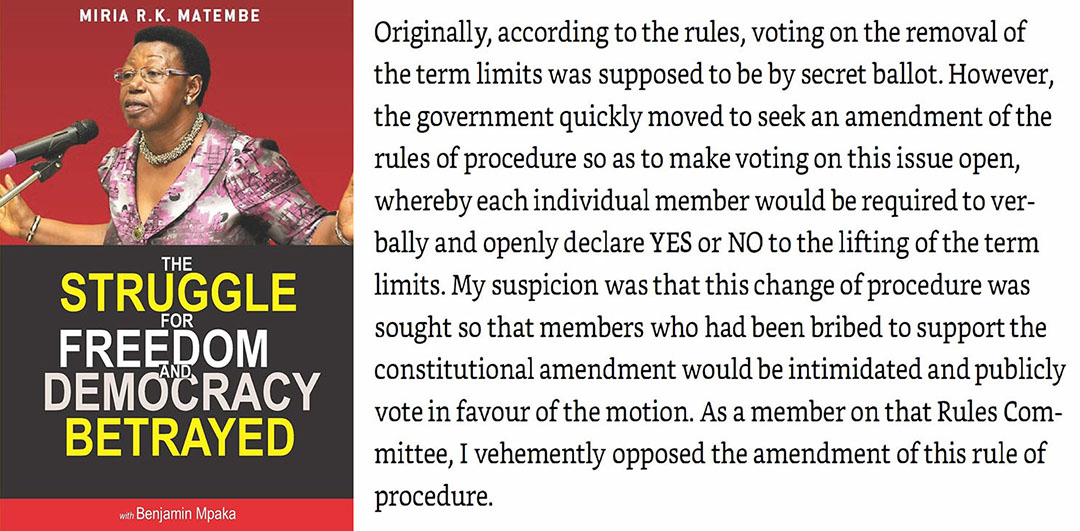
Miria Mutembe 2019 - Struggle For Freedom & Democracy Betrayed (Uganda)

Miria Mutembe 2019 - Struggle For Freedom & Democracy Betrayed (Uganda)
Legislative confidentiality (secrecy) may facilitate negotiation and deal making, foster staff independence and forthrightness, protect government employees from harassment, and enable representatives to be creative and vigorous leaders.Steven F. Huefner 2003
The Neglected Value of the Legislative Privilege in State Legislatures
Legislative openness may operate adversely... [It may] prompt legislators to say what they believe the public or a key constituency wants to hear, and even to commit themselves to an ultimately inferior policy position, rather than allowing them carefully to develop a superior course of action and then go about marketing it to colleagues and constituents.Steven F. Huefner 2003
The Neglected Value of the Legislative Privilege in State Legislatures
Government incentives and intimidation extended beyond [President] Museveni’s interaction with individual MPs or political elites. The ruling party [in Uganda] also changed the process of amending the constitution to increase pressure on those MPs who might have remained uncertain about their vote. In an exercise of selective transparency, the NRM declared that the Parliamentary vote on third term would be changed from a secret ballot to prevent dissenters’ identities to a public roll call vote in which all those opposing the measure would be publicly known. The confluence of financial incentives, the threat of incarceration or dismissal, and the inability to dissent under the radar were short-term methods to marginalize the opposition.Ben Armstrong 2011
Ne Touche Pas Ma Constitution: Pressures and Presidential Term LimitsNote: During a Parliamentary discussion over the age-limit clause of the President, one that if maintained would remove the aging President Museveni from power, bullies entered Parliament and began to beat the members. The opposition groups in Parliament, seeking to maintain the age-limit, were also seeking to have a secret ballot parliamentary vote on the question. President Museveni did everything in his power to prevent that. He suceeded, the vote was open, and he (and his armed gangs) won by over 90% of the vote. Yet most agree that if the vote had been secret he would have lost. Miria Matembe writes “[President Musevini of Uganda] pitched camp in the Parliament’s chamber to personally see to it that the MPs voted as instructed.”
Then came the 2006 debate [on Presidential term limits in Nigeria]. To illustrate the gravity of the issue to him, [President] Obasanjo reportedly offered MPs $400,000 each for their support of term limits repeal. The bribes complemented threats that those who opposed the third term would be investigated. Notwithstanding these pressures and temptations, Nigerian MPs rejected the third term bid. Lewis claims that Parliament became a venue for those who opposed Obasanjo and had political ambitions of their own to prevent the president from clinging to power. From this perspective, it does not seem as if the opposition was about constitutionalism as much as it was about the elite pact that promised the rotation of power. However, Lewis also notes the independent stand that the President of the Senate – a neutral figure and member of the ruling party – took to secure a fair debate in Parliament, even though Obasanjo’s allies sought to rig the vote. One of the key differences was that Nigeria’s third term vote was on a secret ballot; this is in sharp contrast to the public Ugandan vote where presidential pressure on MPs was more effective. Thus, while the Nigerian case does not offer a model of pressure from Parliament as an institution, it does show how an Assembly allowed to obtain some independence can help organize opponents and allow them to challenge presidentialism. This is a clear departure from the Ugandan and Namibian experiences.Ben Armstrong 2011
Ne Touche Pas Ma Constitution: Pressures and Presidential Term LimitsNote: In Uganda, President Museveni fought and won a public vote over presidential term limits and won by a landslide. In Nigeria, even despite some of the most lavish bribe offers in history, combined with threats amounting to jail time, President Obasanjo lost - but in this case, the vote in the Nigerian Parliament was conducted by secret ballot.
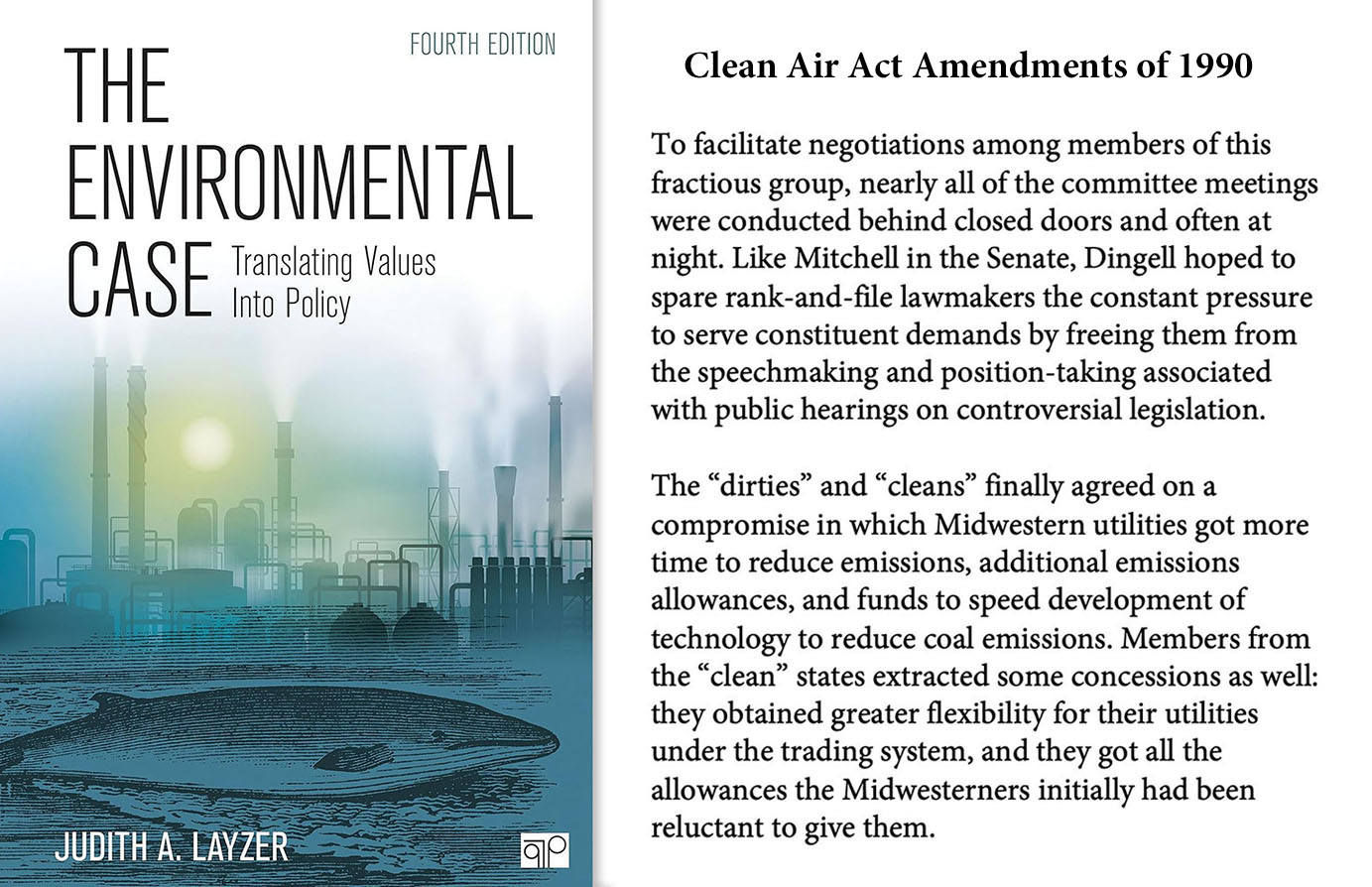
Judith Layzer & Sara Rinfret 2023 - The Environmental Case (Climate)
Text: To facilitate negotiations among members of this fractious group, nearly all of the committee meetings were conducted behind closed doors and often at night. Like Mitchell in the Senate, Dingell hoped to spare rank-and-file lawmakers the constant pressure to serve constituent demands by freeing them from the speechmaking and position-taking associated with public hearings on controversial legislation. The “dirties” and “cleans” finally agreed on a compromise in which Midwestern utilities got more time to reduce emissions, additional emissions allowances, and funds to speed development of technology to reduce coal emissions. Members from the “clean” states extracted some concessions as well: they obtained greater flexibility for their utilities under the trading system, and they got all the allowances the Midwesterners initially had been reluctant to give them.

Judith Layzer & Sara Rinfret 2023 - The Environmental Case (Climate)
After a decade of delay, the Clean Air Act Amendments passed by overwhelming majorities in both chambers, making manifest both the power of well-placed opponents to maintain the status quo against a popular alternative and the importance of legislative leaders in facilitating a successful policy challenge… Congressional leaders, particularly Mitchell and Dingell, brokered deals that were crucial to building a majority coalition. Their willingness to hold meetings behind closed doors, away from the scrutiny of lobbyists, was particularly crucial.Judith A. Layzer & Sara R. Rinfret 2023
The Environmental Case (Climate)
Since it requires only 20 members to force the new procedure of “tellers with clerk,” votes on all important amendments will henceforth be recorded. This means that the folks back home will always know how their representatives have voted not just on bills as finally amended, but on amendments, which often tell the story of a congressman’s record more accurately. So Members of the House must now be “more responsive to the popular will” than they have been in the past. They cannot hide as they once could in the underbrush of defensive rules. The House will thus be “a more democratic body.” These combinations of words are almost as mellifluous as “liberal reform.” All this is presumed to be as good as it sounds. But is it? Not necessarily: Not unless the voters to whom representatives are responsible are well enough informed to make wise choices. Not If representatives are always prevented from relying on their own judgment. Not if the consequences are government by opinion poll. Not if only the accomplished demagogue can hope to win a place in the House and keep it.Kenneth G. Crawford 1971
Is “Liberal Reform” All to the Good?
[The rules of secrecy sheltered] members from the hot-and-cold blowing winds of popular pressures. The founding fathers themselves were similarly sheltered. James Madison is authority for the conclusion that the Constitution could never have been written had its authors’ deliberations been public. In the more recent past it is doubtful whether civil rights legislation now on the books could have passed the House had votes on amendments been public. The majorities necessary to pass amendments were sometimes contrived only because cooperative opponents were persuaded to make themselves scarce when teller votes were taken.Kenneth G. Crawford 1971
Is “Liberal Reform” All to the Good?
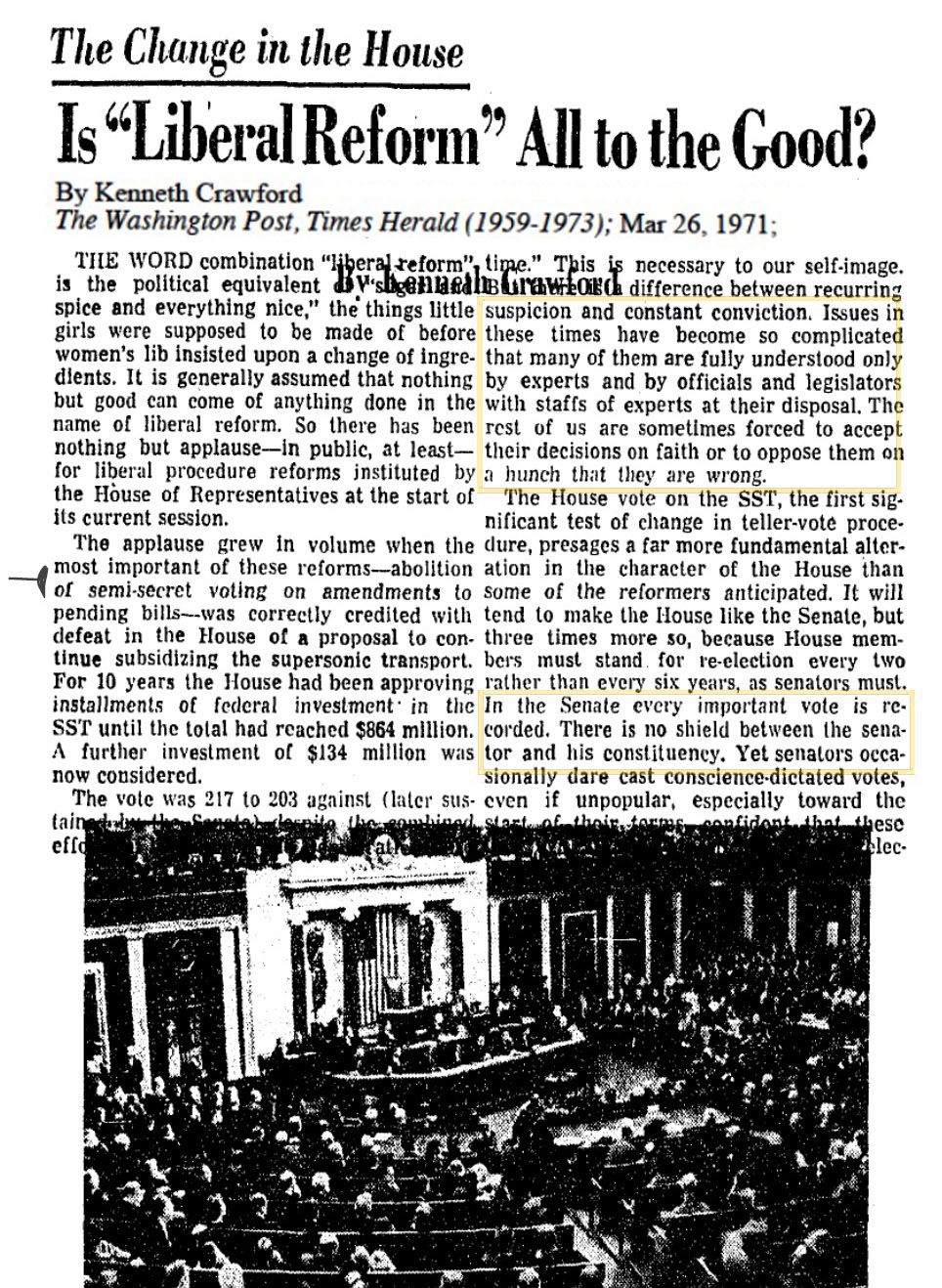
Kenneth G. Crawford 1971
Is “Liberal Reform” All to the Good?

Kenneth G. Crawford 1971
Is “Liberal Reform” All to the Good?
Thomas Paine most probably published Common Sense anonymously because he didn’t want anyone to know it was him or he would be putting his life at risk.Socratic.org 2017
Thomas Paine originally published Common Sense anonymously
Reform of House rules, much as some change was needed, universal as the demand for it was, will not be an unmixed blessing. The reformers, in their zeal to make the House more responsive to the public may only have made it less responsive to the real needs of the time. These needs are emergent. Some of them will not wait until the public opinion pollsters discover what 51 per cent of the people want so that 51 per cent of the national legislators can act. Liberal reform, like sugar and spice, may taste good in the eating but produce stomach aches in the digesting.Kenneth G. Crawford 1971
Is “Liberal Reform” All to the Good?
Mr. Garrett. I wish you could have been present in this very room when we made the motion to open up the meetings of the Government Operations Committee. You would have heard most of the arguments and maybe some more that you made here today, that if you open up those meetings, there is no way that you are going to have a free and full and frank discussion. Everyone is going to have to stand for the press. Everyone is going to be open for lobbying pressure and the lobbyists will sit like hawks on the rail looking at everything you do. Each of those arguments was made, and sincerely so, by members of the committee that felt that that was going to—that would be the case.Senator Lawton Chiles 1971
Government in the Sunshine
Democracies end when they are too democratic...Over the centuries, however, many of these undemocratic rules have been weakened or abolished. The franchise has been extended far beyond propertied white men. The presidency is now effectively elected through popular vote, with the Electoral College almost always reflecting the national democratic will. And these formal democratic advances were accompanied by informal ones, as the culture of democracy slowly took deeper root. For a very long time, only the elites of the political parties came to select their candidates at their quadrennial conventions, with the vote largely restricted to party officials from the various states (and often decided in, yes, smoke-filled rooms in large hotel suites). Beginning in the early 1900s, however, the parties began experimenting with primaries, and after the chaos of the 1968 Democratic convention, today’s far more democratic system became the norm.Andrew Sullivan 2016
America Has Never Been So Ripe for Tyranny
Most Americans consider détente – the reduction of tensions between the United States and the Soviet Union – to be among the Nixon administration’s most significant foreign policy successes. The diplomatic back channel that national security advisor Henry Kissinger established with Soviet ambassador Anatoly Dobrynin became the most important method of achieving this thaw in the Cold War. Kissinger praised back channels for preventing leaks, streamlining communications, and circumventing what he perceived to be the US State Department’s unresponsive and self-interested bureaucracy. Nixon and Kissinger’s methods, however, were widely criticized by State Department officials left out of the loop and by an American press and public weary of executive branch prevarication and secrecy.Richard A. Moss 2017
Nixon’s Back Channel to Moscow
These lessons remain important as back-channel diplomacy persists today. For example, recent back channels probably have played a role in brokering the agreement to curb Iran’s nuclear program in exchange for the relief of international sanctions, and also in the reestablished diplomatic relations between the United States and Cuba. President Barack Obama’s back-channel diplomacy has had effects on today’s U.S. foreign policy machinery similar to those that resulted from the back-channel diplomacy of the Nixon era. The opening to Cuba echoes Nixon’s opening to China with the surprise it generated inside the Beltway, among foreign-policy watchers, the government bureaucracy, and the military, which has viewed Havana as a potential adversary for more than five decades.Admiral James Stavridis 2017
Nixon’s Back Channel to Moscow
In some cases, particularly when sharply conflicting interests must be accommodated, freedom from the pressure of public opinion may be desirable. Moreover, public scrutiny of the government’s decision-making process might have an adverse effect on government decisionmakers. Officials might be reluctant to request information lest they create a public image of ignorance.Justice Department Spokesman 1978
George Kennedy
Advocates of Openness
Gingrich in 1997, like Speaker Boehner in 2011, worked secretly with a Democratic president to get a major but surprising compromise on important policy challenges – social security and Medicare reform in the case of Gingrich and Clinton, taxes, spending, and debt limit in the case Boehner and Obama. In both cases, secrecy was required because, once disclosed, House Republicans would object to serious negotiations and rally conservatives everywhere against any compromises with a Democratic president. Only final deal, backed by both Republican speaker and Democratic president, had any chance of success.Steven S. Smith 2021
Gingrich and the Polarization of Congressional Parties
In a classic discussion of international negotiation Fred Iklé observed that “secrecy has two major effect s in diplomacy. Firstly, it keeps domestic groups ignorant of the process of negotiation, thereby preventing them from exerting pressures during successive phases of bargaining . Second, it leaves third parties in the dark and thus reduces their influence” (Iklé, 1964, p. 134).
Implicit in this is that lack of secrecy allows domestic groups to exert pressure and allows third parties to increase their influence. Iklé’s insight can be profitably placed in a broader theoretical context.
In analysing the workings of the American political system, E.E. Schattschneider argues that political conflict can be thought of as a fight: “Every fight consists of two parts: (1) the few individuals who are actively engaged at the centre and (2) the audience that is irresistibly attracted to the scene … the outcome of every conflict is determined by the extent that the audience becomes involved in it.”
Hence, “if a fight starts, watch the crowd [since] the outcome of all conflict is determined by the scope of its contagion. The number of people involved in any conflict determines what happens; every increase or reduction in the number of participants, affects the result.” The consequence is that “the most important strategy of politics is concerned with the scope of the conflict… So great is the change in the nature of any conflict likely to be as a consequence of the widening involvement of people in it that the original participants are apt to lose control of the conflict altogether” (Schattschneider, 1960, pp. 2-3 ).
Conflicts which are liable to spread have a dynamic of their own, with the original parties un able to control the outcome (Schattschneider, 1960, pp. 2-3). As more people become aware that a decision is to be taken or a ‘fight’ is in progress, more people have the opportunity to seek to exert influence or to join the conflict. Such a process will not be neutral: the make-up of the audience will determine who benefits from such a process of expansion.
Iklé’s advocacy of secrecy can be seen as a particular form of the control of scope. Limiting the range of parties both simplifies negotiation and excludes particular groups . Defining the scope of a negotiation and managing the reaction of those not at the table is a part of any negotiation. The problem is that the result of the information explosion is a ‘Schattschneider effect’: in a shrinking world it becomes increasingly difficult to maintain the secrecy that Iklé recommends. Negotiations will increasingly be carried out in the glare of publicity, so that it becomes easier for domestic political groups or third parties to exert pressure on the negotiators, who in turn must work harder to deal with the third dimension . Robin Brown 2012
Negotiation in Three Dimensions
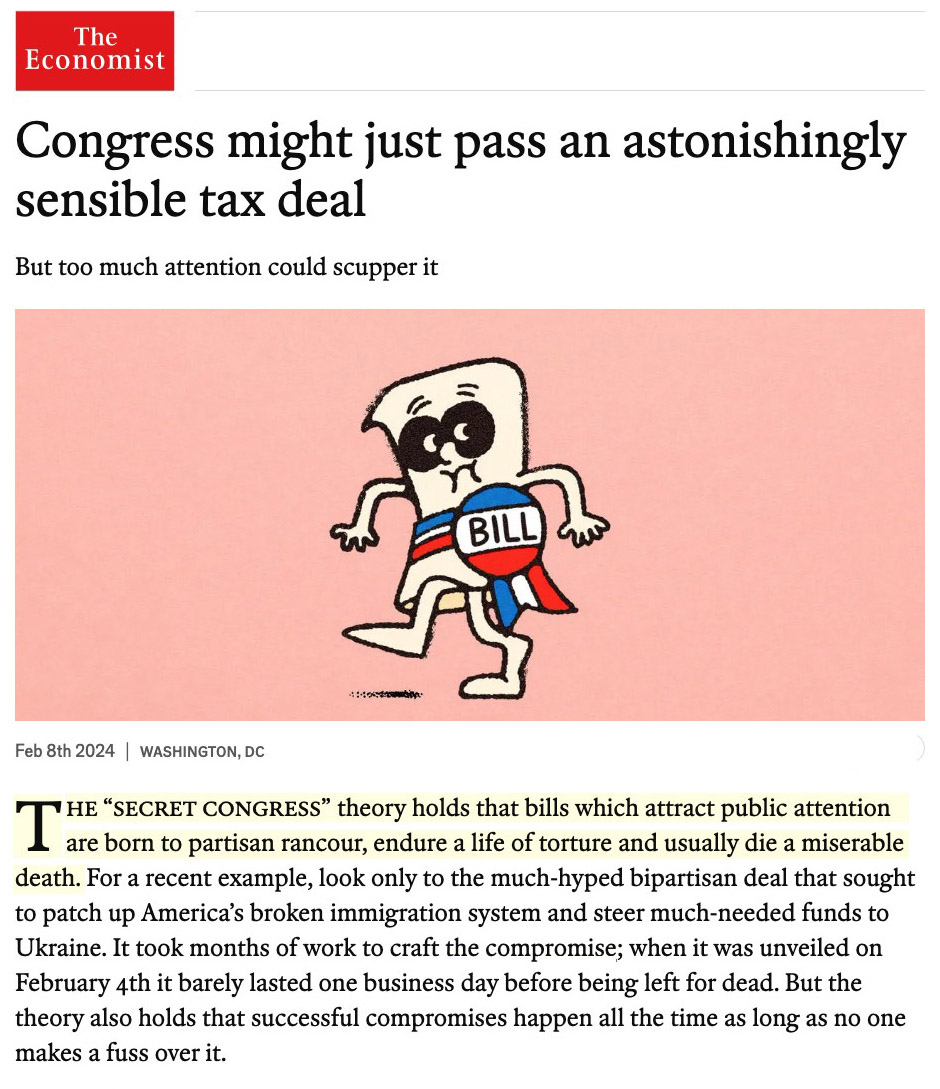
Economist 2024 - Congress might just pass an astonishingly sensible tax deal

Economist 2024 - Congress might just pass an astonishingly sensible tax deal
Congress’s deliberations are more accessible and transparent to the public than those of perhaps any other kind of organization.Walter Oleszek 2014
Congressional Procedures and the Policy Process
Until the mid-1970s, conference committees almost always met in secret sessions with no published record of their proceedings. The conference committee reports they produced revealed the results of the secret negotiations but the bargaining and deliberations that led to these results were not formally disclosed… The conference committee is one of the most critical points in the legislative process.Walter Oleszek 2014
Congressional Procedures and the Policy Process
Beginning with the 1982 bill, the House Ways and Means Committee reverted to closed-door sessions to enhance its freedom of action when items of particular sensitivity were put on the chopping block.Timothy Conlan 1989
Taxing choices: the politics of tax reform
The difficulties of constructing committee majorities on key issues of tax reform became apparent as soon as the committee took up its first item of business: establishing a set of rules to govern the markup process. In accord with the political maxim that “he who writes the rules, rules,” these procedural guidelines would determine the ease or difficulty of amending the staff proposal. In the end, four issues proved significant: whether the markup would be “open” to the press and interest groups or held behind closed doors; whether the committee would use current tax law or the staff proposal as its working document; whether amendments had to be revenue neutral; and the order in which issues would be considered by the committee. In its easiest votes, the committee decided to write the tax bill in closed session to permit free deliberations and limit the influence of interest groups, the press, and constituents. After experimenting with open markups during the 1970s and early 1980s, the committee had routinely turned to closed markups since 1983. It was a “dilemma for liberal reformers” who believed in open government, but they were forced to admit that “the best [tax] bills have come out of closed sessions.” The committee also voted to begin with the easier issues, leaving costly and divisive topics like deductibility and fringe benefits until later. By this approach, Rostenkowski hoped to build enough momentum to propel H.R. 3838 through more difficult times to come.Timothy Conlan 1989
Taxing choices: the politics of tax reform
At other key points, organized interests were completely shut out of the development of tax-reform legislation or were kept off balance by the degree of secrecy. This was most clearly true at the beginning and the end, at TRA’s initiation in the Treasury Department and during the closed conference. Virtually no one outside of a small group of Treasury officials – including the White House, the cabinet, members of Congress, and most interest groups – was privy to the content of Treasury I as it was being developed. During conference, most conferees were often in the dark after responsibility for producing a report was delegated to the two chairmen. Secrecy also often prevailed in between these key events. Finding it difficult to write tax legislation in the “sunshine,” Ways and Means Committee members voted to close each markup session to the public. Key meetings of the Senate “core group” excluded not just the public, but committee members’ staffs as well. Although most major interests still had a (more or less reliable) pipeline to the inside through some supportive committee or staff member, the scope of the legislation and the speed with which it proceeded often limited the utility of such connections. Rostenkowski’s task forces typically prepared their recommendations overnight, giving groups little time to organize and respond to concrete proposals. In the Senate, the entire Pack II bill was composed in private in the astonishingly brief span of just twelve days. Timothy Conlan 1989
Taxing choices: the politics of tax reform
During the Cuban Missile Crisis, President Kennedy went on TV and publicly confronted Chairman Khrushchev with military threats and a blockade. Eight years later, when the United States discovered that the Soviet Union was constructing a submarine base in Cuba, Henry Kissinger and President Nixon settled the Cienfuegos Submarine Base Crisis through diplomacy that was almost entirely private. Kissinger (1979,651) later wrote, “Rather than a dramatic confrontation on the order of 1962, we considered that quiet diplomacy was best suited to giving the USSR an opportunity to withdraw without humiliation.” This incident could have escalated to a second Cuban crisis, but secret diplomacy successfully persuaded the Soviet Union to concede without raising the risk of war.Shuhei Kurizaki 2007
Efficient Secrecy
Leaders might also lie to cover up a controversial policy that they believe is strategically sound, but that they want to hide from their own public and possibly other countries as well. . . . President John F. Kennedy’s efforts to bring the Cuban Missile Crisis to a peaceful conclusion provide a good example of a leader lying to cover up a controversial policy. To end that crisis before it escalated into a war between the superpowers, Kennedy agreed to the Soviet demand that the United States pull its nuclear-armed Jupiter missiles out of Turkey in return for the Soviets pulling their missiles out of Cuba. The president understood that this concession would not play well with the American public, especially with the political right, and would also damage Washington’s relations with its NATO allies, especially Turkey. So he told the Soviets that they could not speak openly about the deal, or else he would deny it and ultimately renege on it. Still, there were suspicions in the West that such a deal had been cut, and the Kennedy administration was queried on the matter. The president and his principal advisors lied and denied that there had been an agreement to take the Jupiters out of Turkey. In retrospect, it appears to have been a noble lie, since it helped defuse an extremely dangerous confrontation between two states armed with nuclear weapons.John Mearsheimer 2011
Why Leaders Lie
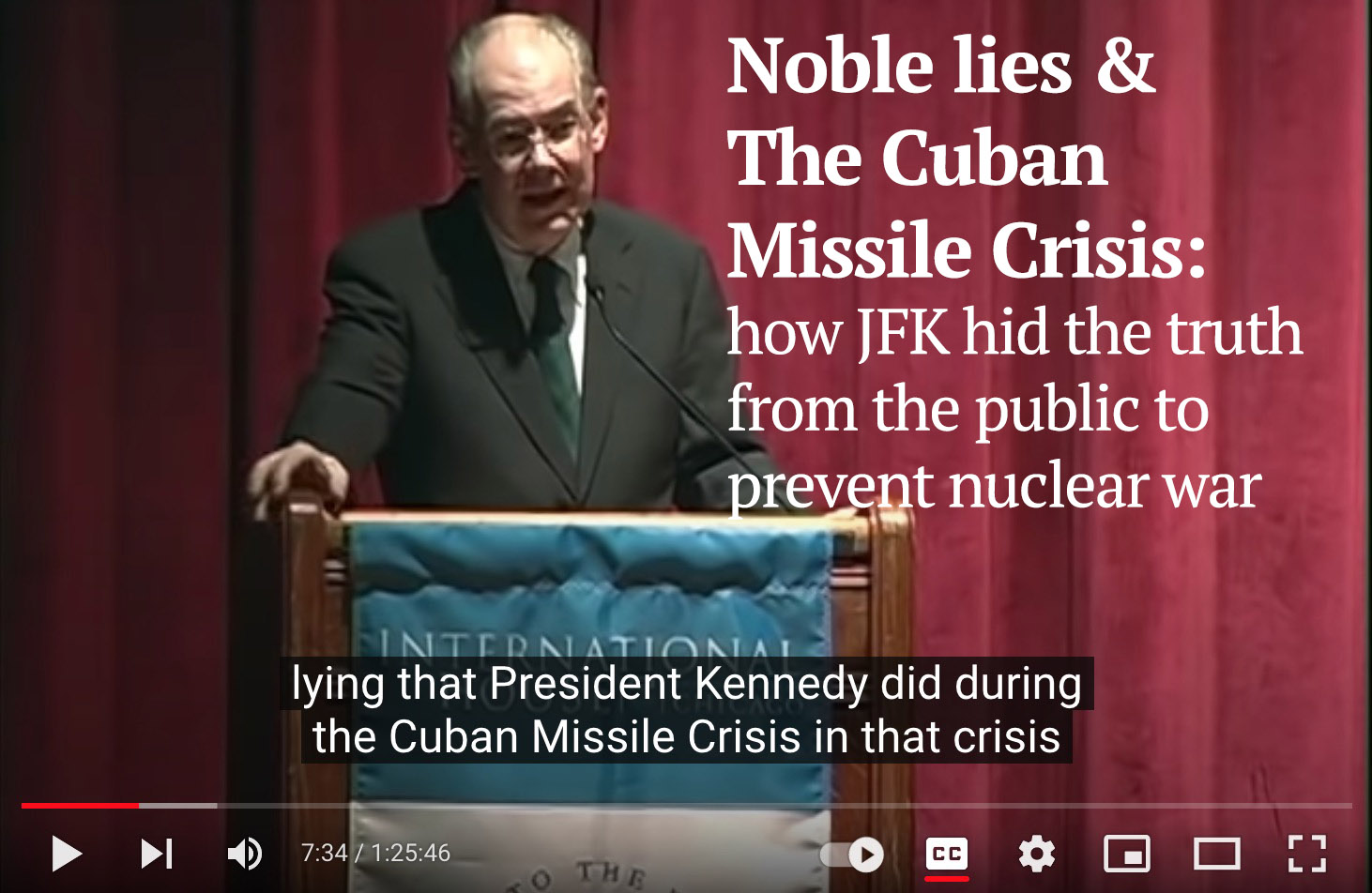
John Mearscheimer (U.Chicago) 2012 Noble Lies - JFK and Cuban Missile Crisis

John Mearscheimer (U.Chicago) 2012 Noble Lies - JFK and Cuban Missile Crisis
Secrecy is necessary to enable governments which have taken extreme positions in public to compromise in private, and to be protected against the consequences of disclosure until the terms of agreement are final and can be defended successfully against domestic critics. Charles W. Freeman Jr. 1993
Ambassador of the United States to Saudi Arabia
Both Republicans and Democrats probably agree that you cannot run a government if every internal memorandum is promptly handed to the press. Arthur Schlesinger 1972
The Secrecy Dilemma
Secrecy allows a diplomat to rationally make a private concession, which is not attainable in public diplomacy. Historical norms are that state leaders employ secrecy as face-saving tactics in order to facilitate co-operative outcomes and tension reduction. For example, during the final phase of the Cuban Missile Crisis, President Kennedy wanted to make sure that “Every opportunity was to be given to the Russians to find a peaceful settlement which would not diminish their national security or be a political humiliation” (Kennedy 1969, 81). Contrary to the popular perception that transparency or “open diplomacy” carries beneficial effects in the age of democracy (Finel and Lord 1999; Nicolson 1963), efficient secrecy posits that the private equilibrium is a more valuable mechanism for almost any type of players, as it can lead to better bargaining outcomes than the public equilibrium can. Moreover, inefficient bargaining failures due to players’ incentives to “go public” and signal to an outside audience are ubiquitous not only in international disputes (Kydd 2006) but also in labor bargaining (Cai 2000) as well as legislative politics (Groseclose and McCarty 2001).Shuhei Kurizaki 2007
Efficient Secrecy
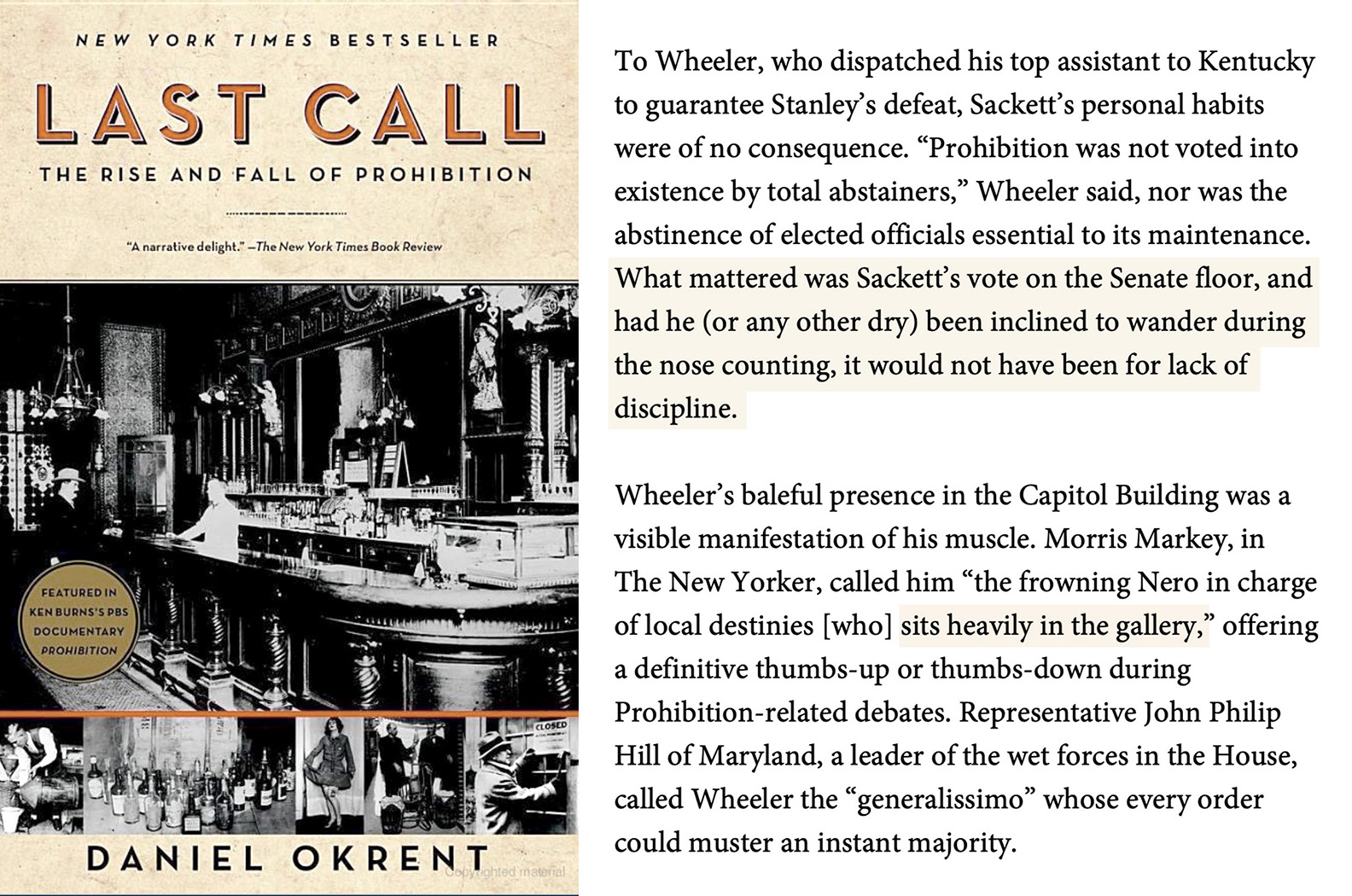
Daniel Okrent 2010 - Last Call (nose counting from the gallery)
During the debates and passage of the prohibition amendment, the most powerful special interest in the country, Wayne Wheeler of the Anti-Saloon League, sat in the gallery and watched members’ votes - ready to punish them for any ‘mistakes.’

Daniel Okrent 2010 - Last Call (nose counting from the gallery)
It is probably not sufficiently realized that although secrecy in government is generally considered inimical to democracy, its positive importance was recognized very early in the history of this country. In his address to the Constitutional Convention (held in secret) James Wilson noted as one of the main disadvantages of democracy that it promoted the “disclosure of publick counsels.” He referred also to Tacitus as the “profound politician Tacitus.” The meaning here is fairly clear. Tacitus helped inspire an extensive literature in the seventeenth century devoted to reason of state or the concept of public necessity. It is reasonable to suppose that Paine’s dictum “nations can have no secrets; and the secrets of courts, like those of individuals are always their defects” did not find a universal response at the Convention. If we follow Henry Adams and his discussion of the acquisition of Louisiana during Jefferson’s administration, it is clear that Jefferson, although fairly close to Paine ideologically, momentarily set aside his constitutional scruples in order to acquire this immense territory for the United States. He had previously believed that the only method of acquisition consistent with democratic principles was by means of constitutional amendment; but the pluralism at work during that period would have set in motion strong regional forces which had the power to defeat an amendment. In letters to Paine as well as to other close friends Jefferson advised them that he intended to depart from his well known views and proceed sub silentio. He enjoined secrecy on their part. Acquisition was completed without an amendment. Jefferson had acted for posterity.Stanley T. Gabis 1962
The Dilemma of the Goldfish Bowl
Advocates of OpennessNote: This is from a book review of Secrecy and Publicity: Dilemmas of Democracy, by Francis E. Rourke. Johns Hopkins Press, 1961.
Secrecy is unavoidable but, if improperly used, can devitalize public opinion and public participation. Likewise, extensive publicity is necessary to carry on modern governmental functions but it too can be twisted into an instrument of great power to mislead, aggrandize, and destroy.Stanley T. Gabis 1962
The Dilemma of the Goldfish BowlNote: This is from a book review of Secrecy and Publicity: Dilemmas of Democracy, by Francis E. Rourke. Johns Hopkins Press, 1961.
What emerges from this study is a theoretical rationale for secret diplomacy. Existing studies commonly suggest that quiet diplomacy is ineffective and secondary to military might in crisis. This is puzzling when one considers the fact that secrecy has been a central feature of diplomatic institutions ever since the establishment of diplomacy in the seventeenth century or perhaps earlier (Nicolson 1954, 75). The model shows that an extension of the conventional audience costs story helps explain why secrecy can be rational.Shuhei Kurizaki 2007
Efficient Secrecy
First came plain old diplomacy, from the Greek word for a letter that has been folded over so that its contents cannot be readily seen. Not until 1973 did the word diplomacy find a new [secretive] mate, and the matchmaker was Henry A. Kissinger, who let it be known he preferred quiet diplomacy, a formulation that diplomats liked because it seemed to describe action and promised results from behind-the-scenes maneuvering. And yet, access, the insider’s noun, is formed from the verb accede, based on the Latin cedere , “to yield.” That’s what the government official is supposed to be doing, and it is the ability to induce such sweet surrender that the sellers of access are selling.William Safire 1985
On Language: Public Diplomacy
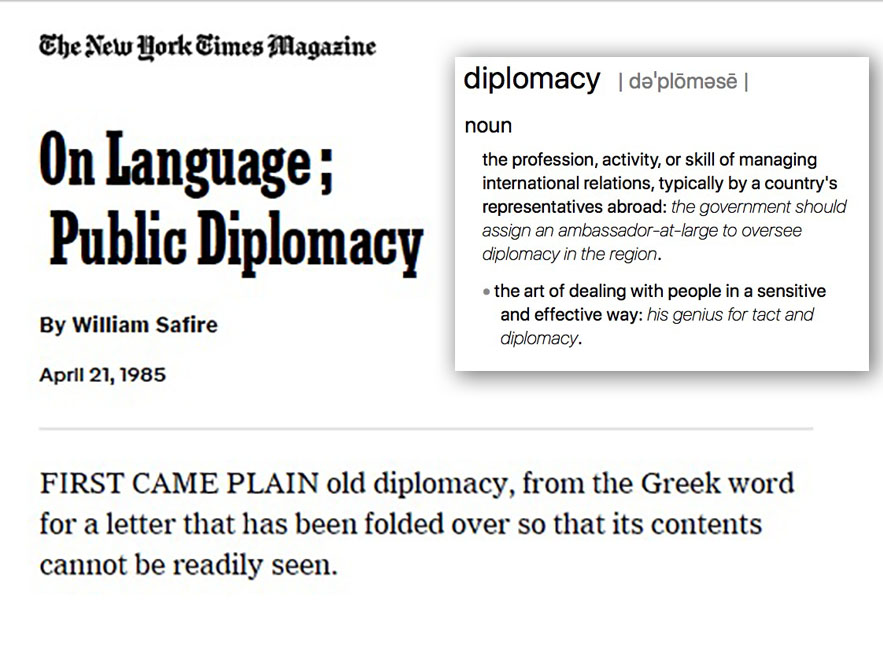
William Safire 1985
On Language: Public Diplomacy

William Safire 1985
On Language: Public Diplomacy
Mediators may wish to make use of opportunities for informal exchange as a way of getting things unstuck. If the formal process of offer and counteroffer, as it takes place at the negotiating table, is being used to state extreme positions in public, and the disputants have reached an impasse, it may be wise to create opportunities for more informal arrangements. UNEP Executive Director, Mustafa K. Tolba, appears to have done just this during the Montreal Protocol negotiations on the depletion of the ozone layer. Tolba made extensive use of “informal consultations” designed to help narrow the gap between the divergent views of negotiators on central issues, and accomplished this away from the plenary session. (Climate and Environment)Gunnar Sjostedt 1992
International Environmental Negotiation: Insights for Practice
Without reporters or lobbyists in the room, senators are free to debate difficult decisions and make deals without the pressures to posture or conform to narrow ideological or parochial views.Colleen Shogan 2012
(Jacob Straus) Party and Procedure
Four reasons explaining the National Defense Authorization’s repeated successes were mentioned repeatedly throughout the staff interviews: bipartisanship, routine committee processes, staff interactions, and closed markups.Colleen Shogan 2011
The Senate’s Last Best Hope
By far the most significant anti-secrecy provision in the 1970 act dealt with disclosure of House members’ votes in Committee of the Whole. The House often makes its most important policy decisions in that committee, but for 180 years its precedents had forbidden the recording of names in these votes. Under the new rule, each member’s name and vote was to be recorded upon the demand of 20 or more members.Walter Kravitz 1990
Legislative Reorganization Act of 1970
Shortly thereafter, Davidson predicted that the possibility of recorded votes on many amendments would bring more challenges to committee bills, perhaps reduce committee influence over legislation, and protract floor debate. Eventually, he suggested, House leaders might turn to more frequent use of closed rules to counter such a development. As Bach and Smith (1988) have documented, this is almost precisely what happened. Far larger numbers of members did come to the floor for recorded votes, because their absence would now be a matter of public record. By denying members the anonymity they previously enjoyed, the new rule encouraged them to vote on amendments as they believed their constituents wanted them to, even if this meant defying committee leaders. Moreover, since committees were less able to protect their bills from floor amendments, members offered more of them. Deference to committee positions eroded still further, Bach and Smith assert, as the reforms of the 1970s dismembered the powers and influence of committee chairs. The subcommittee chairs who replaced them as floor managers did not inherit that influence because many of them were less experienced leaders, with lesser procedural skills and subject expertise. The confluence of these and other developments made floor activity and decisions more time consuming and less predictable. Party leaders fretted because the increased floor time spent on bills created a backlog of measures they were anxious to bring up. Unpredictability also made coalition building more difficult and disrupted members’ schedules. Furthermore, leaders, and members too, often had to face unanticipated amendments on controversial issues, sometimes deliberately offered to force them into politically dangerous votes. In 1974, the Rules Committee proposed to increase the number of supporters required to obtain a recorded vote in Committee of the Whole, but a coalition of Democrats and Republicans defeated it. As the consequences of recorded votes became clearer, however, opposition to this approach declined. Five years later, the necessary support for recorded votes was increased from 20 to 25 (H. Res. 5, 96th Cong., 1st sess.). By this time, however, party and committee leaders had turned to the Rules Committee for special rules to protect their bills from unanticipated or unpredictable dangers. That protection was provided sometimes by closed rules, but increasingly by a wide variety of restrictive rules that prevented unwanted proposals or manipulated the amending process in ways that gave procedural advantages to the majority party and its leaders. Perhaps the most fascinating of these is the so-called “King-of-the-Mountain” device: it permits votes on a series of versions of a measure, but if a majority votes for more than one of the options, the last version to earn a majority wins. In this fashion, the successful anti-secrecy movement of 1970 provoked a reaction that led to more frequent severe restrictions on the amendment process, precisely the opposite of what was intended. Perhaps there is some truth to Samuel Taylor Coleridge’s axiom: “Every reform, however necessary, will by weak minds be carried to an excess, that itself will need reforming.” There is an additional measure of irony in these developments. In 1970, many Democrats hoped that recorded votes would help them amend bills controlled by conservative committee chairs. It did. Within a few years, however, the powers of committee chairs were largely dismantled and their influence dispersed among the large number of subcommittee chairs. Many of the 1970 reformers now occupied these positions, and they were the ones who now faced the hazards of floor action and sought the protection of restrictive rules against the consequences of recorded votes.
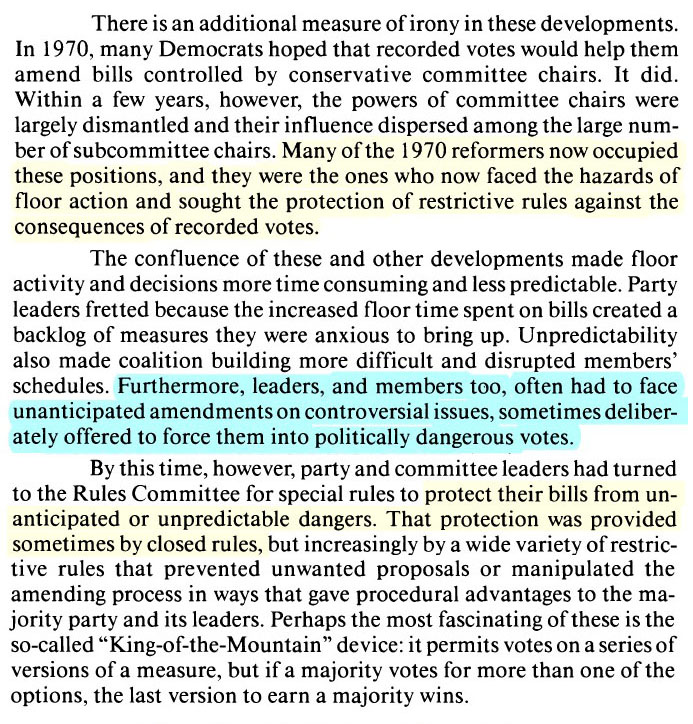
Walter Kravitz 1990 – Legislative Reorganization Act 1970

Walter Kravitz 1990 – Legislative Reorganization Act 1970
It is somewhat surprising that “transparency”, one of modernity’s most conspicuous current tropes, has received so little sustained analytic attention. All the more so when we notice that, in the real world, modernity and transparency rarely march hand in hand… To provide but one example, the IMF, in the interests of promoting democracy, has continually insisted on radical economic restructuring across the globe, calling for the decentralisation and privatisation of staterun enterprises. In persistently asking probing questions about who controls what economic resources, to what ends and for whose benefit, developers aim to make visible an underlying market-run rationality, to make “transparent” the everyday workings of local and global economies.Todd Sanders 2003
Invisible Hands and Visible Goods
If the United States is to correct the harm caused by the recent secrecy culture, advocates who favor greater government openness must acknowledge that there are legitimate secrets. Transparency proponents must better understand the rationales for legitimate secrets.Frederick Schwarz 2015
Democracy in the Dark
Transparency is one of the buzzwords of the 21st century (at least in political economy). Whether we are talking about good governance at home or exporting democratic ideals abroad, the new conventional wisdom is “the more transparency, the better.” I argue that, under many conditions, secrecy can be efficient from a social welfare point of view… The diversity of interests in democracies results in a strategic situation in which individual interest groups have incentives to engage in behavior that may prevent social improvements… Like Sunstein, I come to the conclusion that shielding representatives from “constituent pressures, including interest groups, in the hope that they will deliberate more effectively on the public good” (1985: 34-5) is also optimal under certain conditions… The main point of this paper is that transparency is not always good; rather, it is a variable of institutional design and should be treated as such. At the least, we are forced to consider that, like most conventional wisdom, the choice between secrecy and transparency is more complicated than we think.Barbara Koremenos 2010
Open Covenants, Clandestinely Arrived At
The Founders faced a paradox at the heart of democracy. For the government to be effective, it needs to be able to act secretly—in some cases, to protect democracy from its enemies, both external and internal… Congress exercises oversight over the executive’s secret activities, including military and intelligence actions. But it cannot do so publicly without compromising those very activities, and so instead a limited number of lawmakers receive secret briefings on a regular basis… The normal means for deterring government abuse—oversight, transparency, institutional competition—are inconsistent with the premise that secrecy is necessary.Eric Posner 2013
Before You Reboot (New Republic)
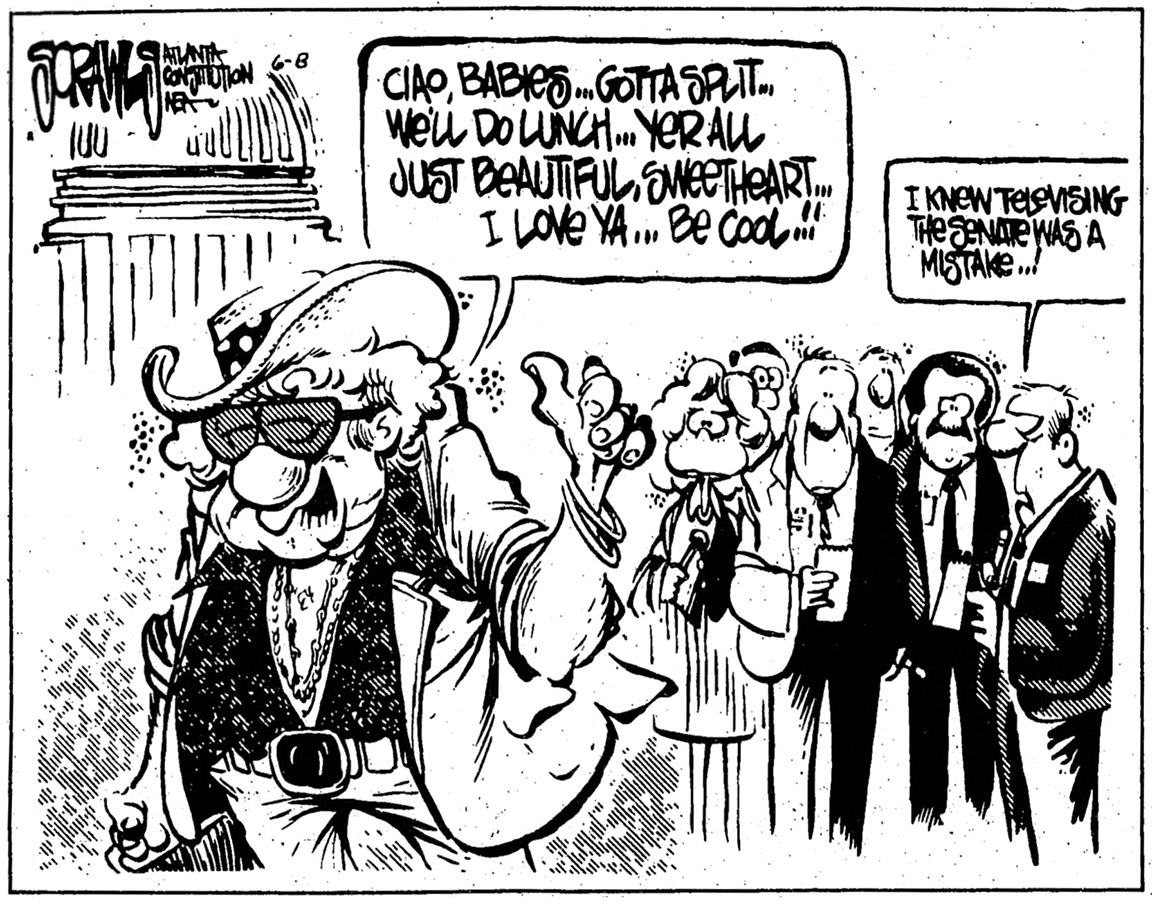
Sam C. Rawls 1986 - Senate Televises Committees and Sessions

Sam C. Rawls 1986 - Senate Televises Committees and Sessions
The question raises a real paradox. If government can keep secrets, then the public cannot hold it to account for its actions. But if government cannot keep secrets, then many programs - including highly desirable ones - are impossible.Eric Posner 2013
The Secrecy Paradox
The reform of longest lasting significance provided that House votes in the Committee of the Whole be recorded on request, which ended the secrecy often surrounding members’ votes on important measures.David King 1995
Encyclopedia of the US Congress
Many liberals believe that an unfair and corrupt political system controlled by privileged interests represents the chief obstacle to the realization of an otherwise popular left-wing agenda. Enacting reforms to the electoral and legislative process, they argue, would effectively remove this barrier, quickly producing a decisive leftward shift in the trajectory of national policy. Yet history does not support this view. Liberals in the 1970s also believed that institutions were holding back the advancement of their favored policies. They sought and achieved reforms in campaign finance, party nominations, government transparency, and congressional organization that were designed to depose moderate and conservative Democratic leaders while bolstering the influence of liberal activists at the expense of “establishment” interest groups. Rather than usher in a period of ambitious liberal achievements, these reforms in fact coincided with the close of an era of left-of-center policy change.Grossman & Hopkins 2005
The Liberal Failure of Political Reform
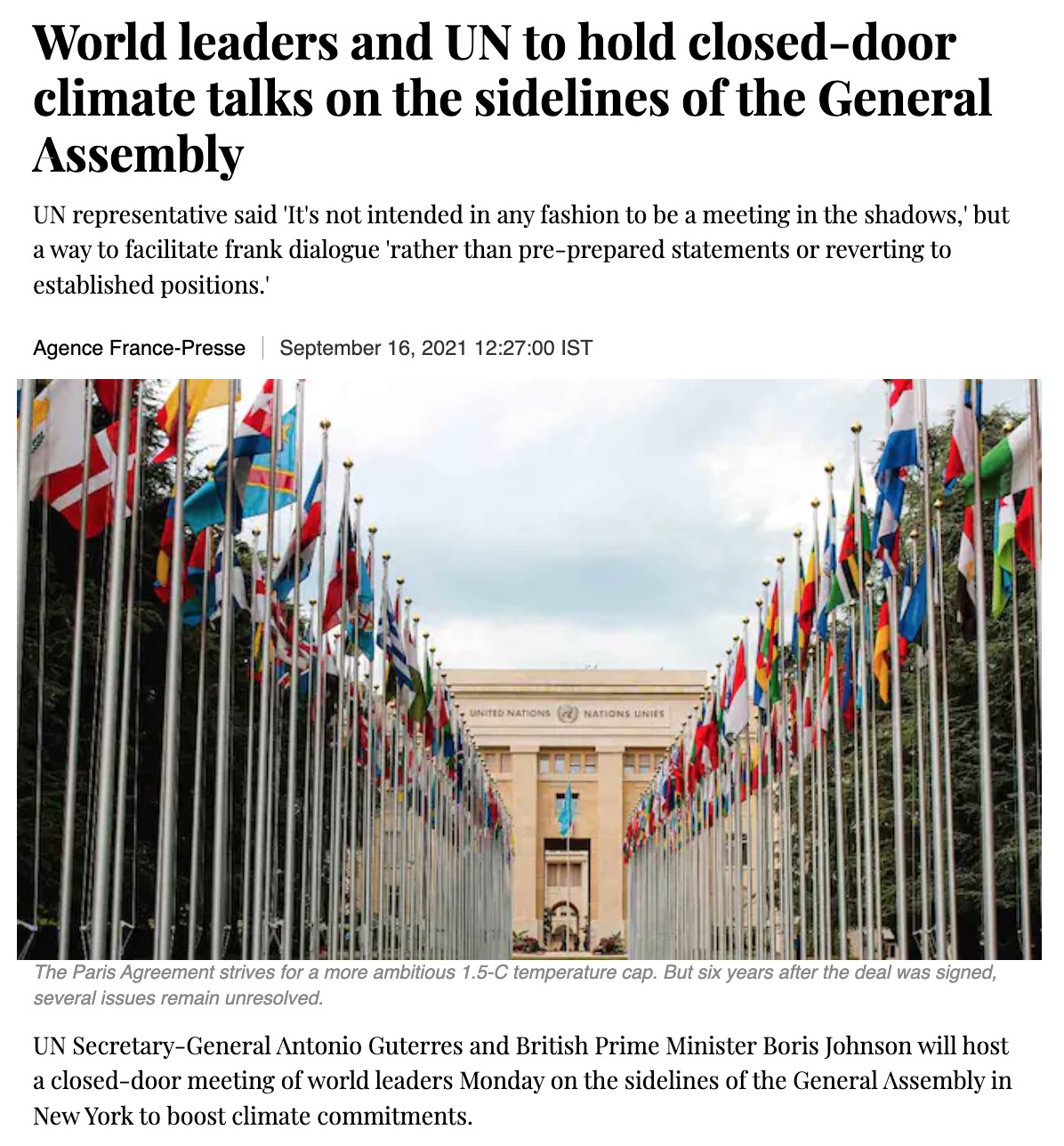
Agence France-Presse 2021 – World leaders and UN to hold closed-door climate talks

Agence France-Presse 2021 – World leaders and UN to hold closed-door climate talks
If legislators had been personally opposed to tax reform, all they had to do was insist that the sun must shine on any tax bill, knowing that sunshine would have destroyed tax reform.Arnold 1990
The Logic of Congressional Action
Consider how the Senate Finance Committee handled the Tax Reform Act of 1986. At first it held its markup sessions in a huge hearing room, where lobbyists could watch every decision and every vote. Quite predictably committee members voted to save most tax preferences, and even invent some new ones. Eventually senators decided to abandon all public sessions and to draft a new reform plan in total secrecy. All of a sudden the special interests were at a serious disadvantage, for they could no longer see who was responsible for terminating their favorite tax provisions.Douglas Arnold 1990
The Logic of Congressional Action
For every example… where transparency seemed to produce more accountable and effective governance — there is another where transparency either had no effect or produced a backlash that further insulated public officials from accountability to citizens.Kosack & Fung 2013
Does Transparency Improve Governance?
Just making important data available won’t cause political change. Justice Brandeis’s clever aphorism to the contrary, sunlight is not in fact the best disinfectant; actual disinfectant is. Sunlight just makes it easier for people to look at the pus.Aaron Swartz 2006
Disinfecting the Sunlight
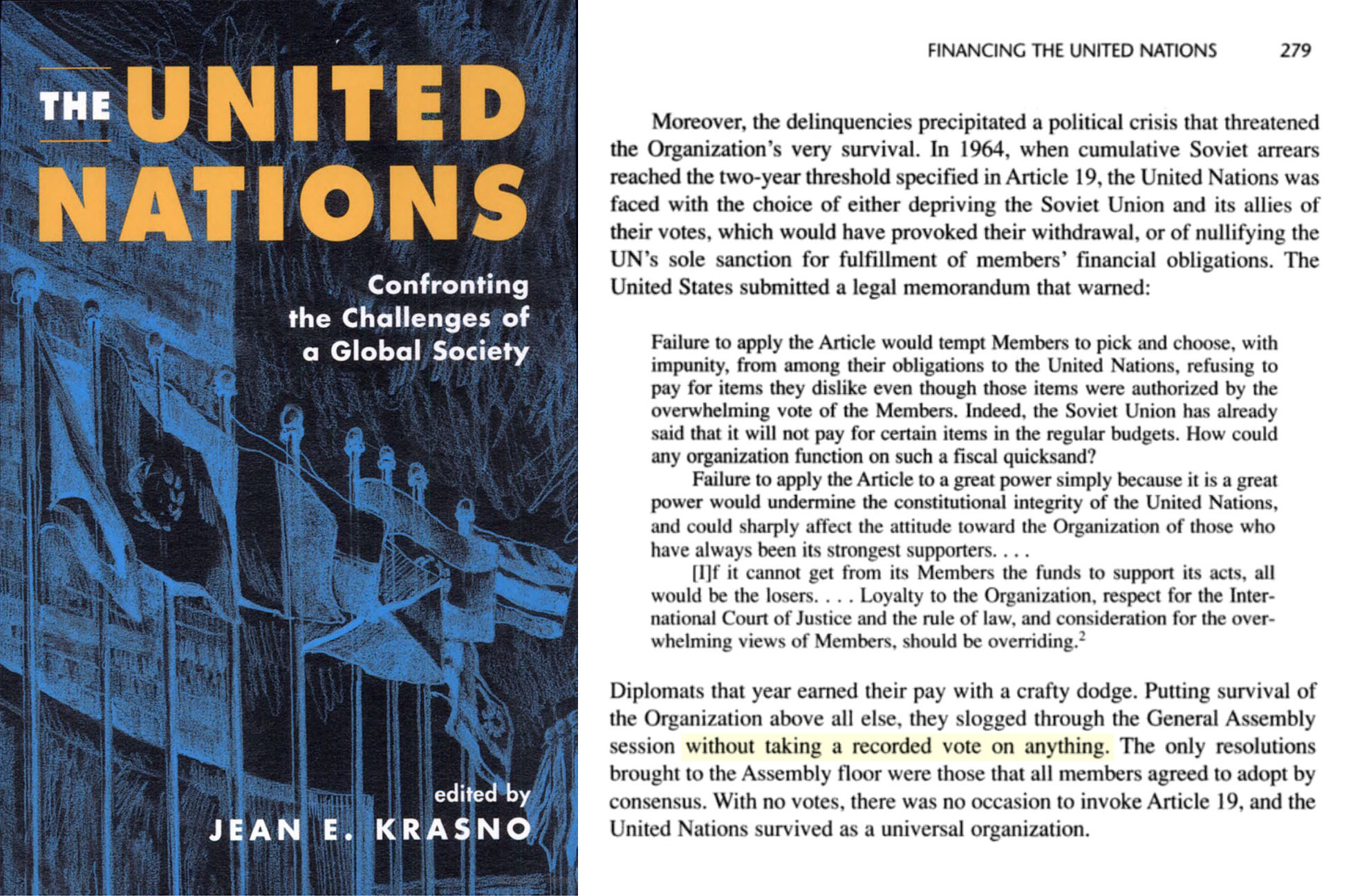
Jean E. Krasno - United Nations
Note: The survival of the United Nations was in doubt, but saved by secret voting of the diplomats.

Jean E. Krasno - United Nations
Every negotiation consists of stages and a result; if the stages become matters of public controversy before the result has been achieved, the negotiation will almost certainly founder. A negotiation is the subject of concession and counter-concession: if the concession offered is divulged before the public are aware of the corresponding concession to be received, extreme agitation may follow and the negotiation may have to be abandoned. The necessity of negotiation remaining confidential has never been more forcibly expressed than by M. Jules Cambon, perhaps the best professional diplomatist of this century. “The day secrecy is abolished,” writes M. Cambon, “negotiation of any kind will become impossible.” Sir Harold Nicolson 1953
The Evolution of Diplomatic Method
[In Greece] negotiations were exposed to the decisions, at once cumbrous and volatile, of a body of citizens, who were extremely ill-informed, subject to gusts of anger, sentimentality, fear or suspicion, inclined at any moment to reverse previous attitudes, and disastrously slow at coming to any decision. The sole remedy for such defects would have been the creation of a body of trained negotiators, independent of party allegiances and passions.Sir Harold Nicolson 1953
The Evolution of Diplomatic Method
Secrecy has an ancient tradition in diplomacy… the secret formed the undisputed paradigm of international negotiation, both for its process as for its result: it is in all legitimacy that secret deals led to treaties intended to remain secret… Pecquet devotes a complete section of his opus (How much secrecy is necessary for success) to secrecy; like any political action, a negotiation can be jeopardized because third parties will have heard of it: “whoever lacks secrecy destroys his work while building it.” (1737: 35) – “quiconque manque au secret détruit son ouvrage en même temps qu’il l’édifie.”… There appear three distinct and successive fonfigurations of international negotiation: that in which the process as the result of the negotiation is secret; then the one where the process remains secret but the result is supposed to be public; finally, the one – today – where an injunction of transparency weighs on both the process and the result.Aurélien Colson 2009
La négociation diplomatique au risque de la transparence
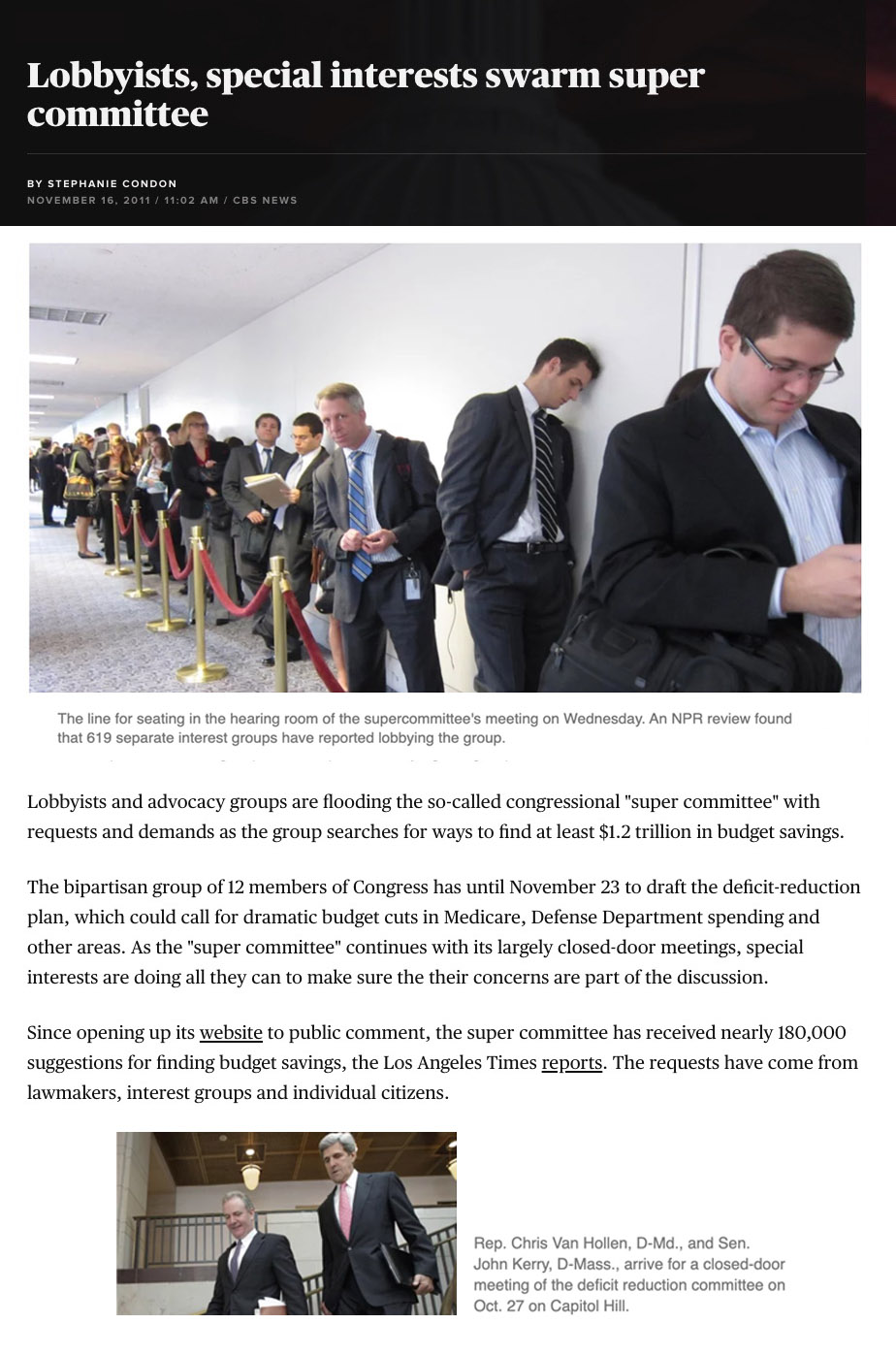
Stephanie Condon 2011 – Lobbyists, special interests swarm super committee (supercommittee)

Stephanie Condon 2011 – Lobbyists, special interests swarm super committee (supercommittee)
It’s hard to think of any good examples of transparency work accomplishing anything, except perhaps for more transparency.Swartz 2006
When is Transparency Useful?
Because of familiar collective action problems, well-organized groups, who monitor legislative activity closely, are much better situated than the mass electorate to secure real accountability from incumbent legislators. And these groups have more resources for demanding accountability; they have not just individual votes with which to threaten lawmakers, but the ability to aggregate many votes and to withhold or deploy resources like lobbyist assistance, contributions, and the threat of independent spending. Unorganized groups do not enjoy these advantages and often lack the ability even to push their issues on to the agenda. All of this suggests that the rhetoric of widespread accountability may obscure the reality of too much accountability for some and not enough for many.Jane Schacter 2006
Political Accountability
Given members’ contention that a main reason for closed committee sessions was to bar lobbyists, it was no surprise that Ways and Means was the one panel that had unquestionably retreated from openness. With wide-ranging authority over taxes, trade, Social Security, health and welfare programs, it was perhaps the most heavily lobbied committee in the House.
Committee Chairman Dan Rostenkowski, D-Ill., asked critics of closed sessions, “Are you disappointed in the legislation that’s come out of the Ways and Means Committee?”
Many conceded they were not. “I hate to say it, but members are more willing to make tough decisions on controversial bills in closed meetings,” said Democrat Don J. Pease of Ohio, a former newspaper editor who usually cast the only vote against closing Ways and Means sessions. “In a closed meeting, you can come out and say, ‘I fought like a tiger for you in there, but I lost.’”
Representatives of the self-described citizens’ lobby, Common Cause, which campaigned for the open-meetings rules approved by the House in 1973 and the Senate in 1975, also recognized that closed sessions, particularly in Ways and Means, at times produced legislation less weighted with special-interest provisions. By 1987, the group had stopped monitoring committees to see which were closing meetings and had stopped protesting when they found violations.Jaqueline Calmes 1987
CQ – Fading Sunshine Reforms
Most senators seem to agree that the recent changes in the rules (political action committees, increased roll-call voting and open meetings) have made negotiation and political self-sacrifice infinitely more difficult. Open meetings are singled out most often… “There was an enormous give and take,” Pearson [former Senator James B. Pearson, Republican from Kansas] says of the old closed-door committee system. “People could change their minds – as a result of hard bargaining and deliberation. But nobody wants to admit in public that he was wrong.”Alan Ehrenhalt 1982
CQ – Team Spirit of Days Gone By Evades the Senate
Even if voters were smothered with “costless” information, it is doubtful that they would pay attention and process detailed information about the complexities of public policy they do not care much about. In contrast, special interests are “naturally” better informed; compared to the general public, they get costless information as a by-product of their specialized activities, and they have stronger incentives to invest in costly information gathering, to pay costly attention to complex information, and to invest in costly expertise that allows them to understand such information. Susanne Lohmann 1998
Information Rationale For the Power of Special Interests
Institutional design might fail to increase accountability if it overlooks the fact that even behind closed doors, the actors might attempt to conceal their position, in particular when they negotiate.Stephanie Novak 2015
Secrecy and Publicity
Publicity does not necessarily increase accountability.Novak 2015
How Publicity Creates Opacity
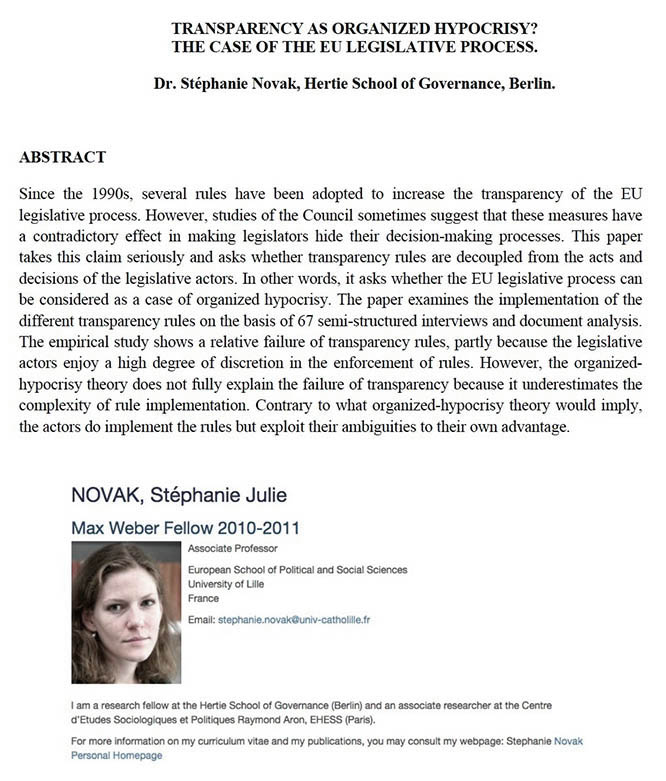
Stephanie Novak 2013 – Transparency as Organized Hypocrisy

Stephanie Novak 2013 – Transparency as Organized Hypocrisy
A representative of a member state X explained that (negative) votes trigger media attention while journalists usually overlook measures adopted without opposition.Stephanie Novak 2015
How Publicity Creates Opacity
Forcing the publication of votes in an institutional setting that relies on diplomatic practices can have deleterious effects on accountability: In some cases, the publication of votes might operate as a window-dressing device, prompting the public belief that ministers are accountable since they publish their votes, while real monitoring of the decision makers’ stances is not possible.Stephanie Novak 2015
How Publicity Creates Opacity
Decision makers used to voice their disagreement more frequently when they knew their votes would not be published.Stephanie Novak 2015
Secrecy and Publicity
The publication of votes – which was supposed to increase the accountability of ministers- actually became an additional incentive for opponents to silence themselves and join the majority.Stephanie Novak 2015
Secrecy and Publicity
Interviews reveal that the different actors in the legislative process make strategic use of transparency rules over the course of negotiations. In some cases, actors tend to convert transparency rules as they use publicity to put pressure on their opponents.Stephanie Novak 2013
Transparency as Organized Hypocrisy
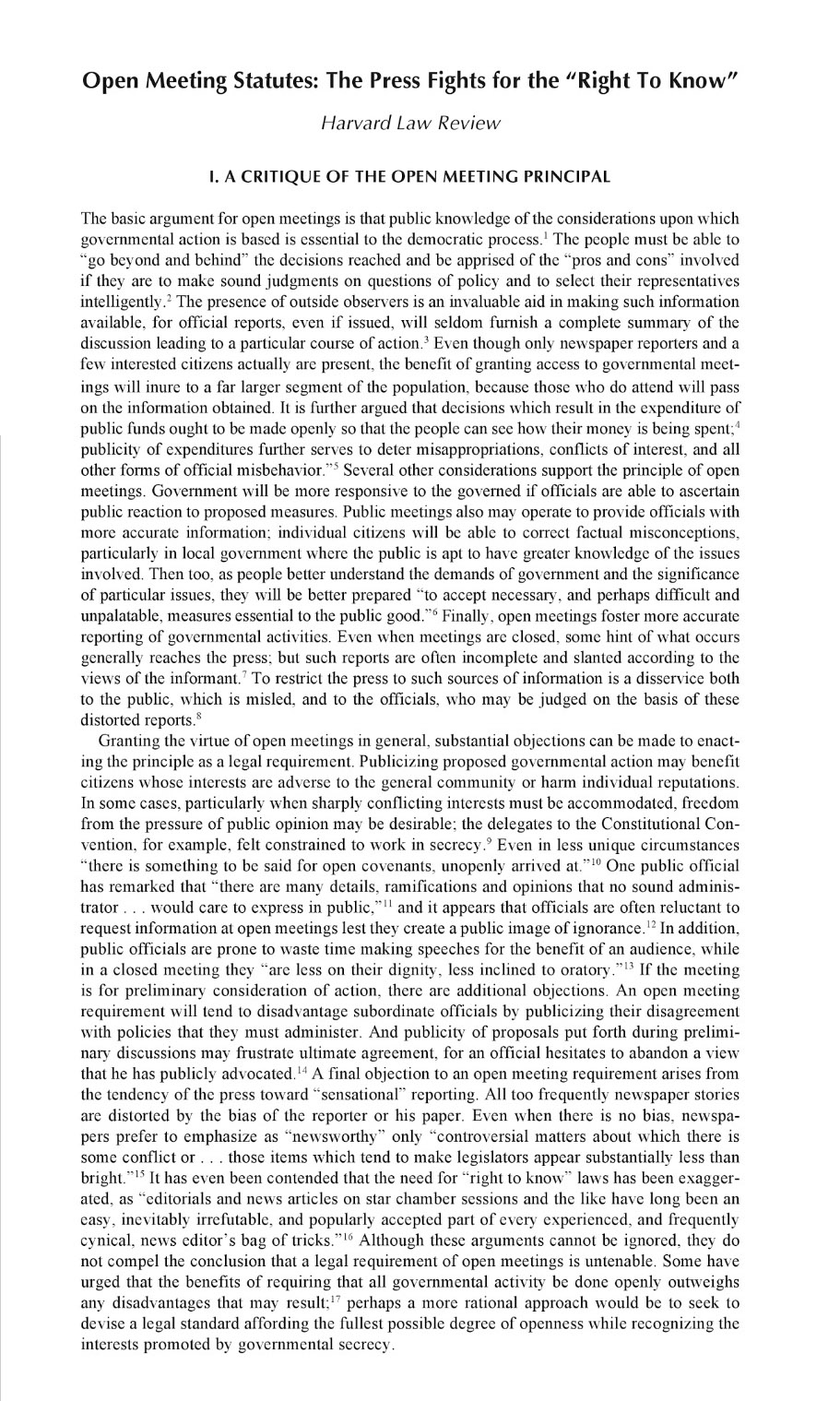
Piotrowski 2010 – Transparency and Secrecy

Piotrowski 2010 – Transparency and Secrecy
Perhaps the most fundamental driver of this ideological drift, however, is the most easily overlooked: the diminishing marginal returns to governmental transparency. As public institutions became subject to more and more policies of formal openness and accountability, demands for transparency became more and more threatening to the functioning and legitimacy of those institutions and, consequently, to progressive political agendas. David Pozen 2018
Transparency’s Ideological Drift
There is no doubt in my mind that if we are to have gavel-to-gavel coverage of the U.S. Senate, it will require a great deal of additional Senate oratory and Senate discussion. One of my distinguished colleagues, whom I admire greatly, whom all of us admire, a very good Senator [said that] while today he makes only about one speech a month, he would have to make at least one speech a week. Why is that? Well, the reason is that the folks back home will be asking: “Why don’t we hear from our Senator? Where is he? Where is the guy? Why isn’t he up there talking?” Even if the TV camera shows that he is in his seat while others in that area are speaking and they know he is there, they will say, “Why doesn’t my Senator get up and say something? He just sits there like a bump on a log. I want the Senator up on his feet, talking, and getting into the thick of things, saying something.” A friend of mine, a friend of all of us, a thoughtful, and scholarly, and studious Senator, said he thinks he will have to vote for TV in the Senate, reluctantly. I said, “Why?” He said, “Because the people back home don’t think I’m doing anything. One of my colleagues in the House is on TV all the time. They see him every time they turn on the TV. There he is. He is working, they say. They don’t think I’m doing anything. I have to get on that boob tube, and the only way I know how to do it is to vote for this thing and be on TV.”Senator Russell Long 1984
Congressional Record 1984
A growing body of empirical evidence and analysis points to the mixed results of transparency and accountability initiatives (TAIs) in terms of improved outcomes. For all of the widely touted success stories, similar interventions have had poor results or even negative consequences in other contexts. For example, participatory budgeting in Porto Alegre, Brazil, has resulted in increased investment in services for the poor (Ackerman 2004), but it has not been successfully replicated elsewhere (Baiocchi, Heller, and Silva 2011). Social audits in the Indian state of Andhra Pradesh have contributed to combating corruption; however, they have been largely unsuccessful in the state of Bihar (Srinivasan and Park 2013; Dutta and others 2014). In Uganda, community scorecards for health services helped reduce under-5 mortality by one-third (Bjorkman and Svensson 2009), but community monitoring of health providers in Sierra Leone had limited results in light of accountability gaps up the chain of command (Grandvoinnet, Aslam, and Raha 2015). Interpreted from the perspective of this Report, TAIs seek to reshape the policy arena by enhancing contestability and, when successful, effectively changing the incentives of decision makers in favor of certain outcomes.Helene Grandvoinnet 2017
Transparency to Accountability (World Bank)
The United States is an especially interesting example of how transparency complicates political bargaining. Committee meetings in the House of Representatives and the Senate were long held behind closed doors, but in the 1970s, procedural changes adopted by the House and the Senate opened committee meetings to the public and the press (
Rieselbach 1994). There are strong indications that these procedural changes had detrimental effects on lawmaking, reducing the willingness of House members and senators to seek political compromises. Ehrenhalt (1982) (cited in Warren & Mansbridge 2013
Political Negotiation) argues that the new rules “made negotiation and political self-sacrifice infinitely more difficult” and Binder and Lee (2015, 253) argue that the “move toward greater transparency in congressional operations” has become a “double-edged sword,” offering several examples of how transparency has undone negotiations over important policy decisions in Congress. Johannes Lindvall 2017
Reform Capacity
The value of secrecy was in reducing the number of actors, widely recognized as an obstacle in negotiations...Some of the key issues debated over the past 20 years were resolved in Paris in secret meetings among a few countries. Six working groups on the key issues were established during the second week. One of them concluded its work without a single formal session because everything was settled privately. I participated in a small “invisible” meeting regarding a secret deal between the US and Saudi Arabia. The meeting took place in a small room of 5 by 5 meters, among only 10 individuals. My delegation was asked to accept or reject the bilateral deal, without rights to negotiate or modify. No record was kept, there was no paper copy of the legal text in question that was only displayed on a small screen, and we were explicitly told not to take photos. We endorsed the deal, and so did other ‘key players.’Radoslav S. Dimitrov 2016
The Paris Agreement on Climate Change: Behind Closed Doors
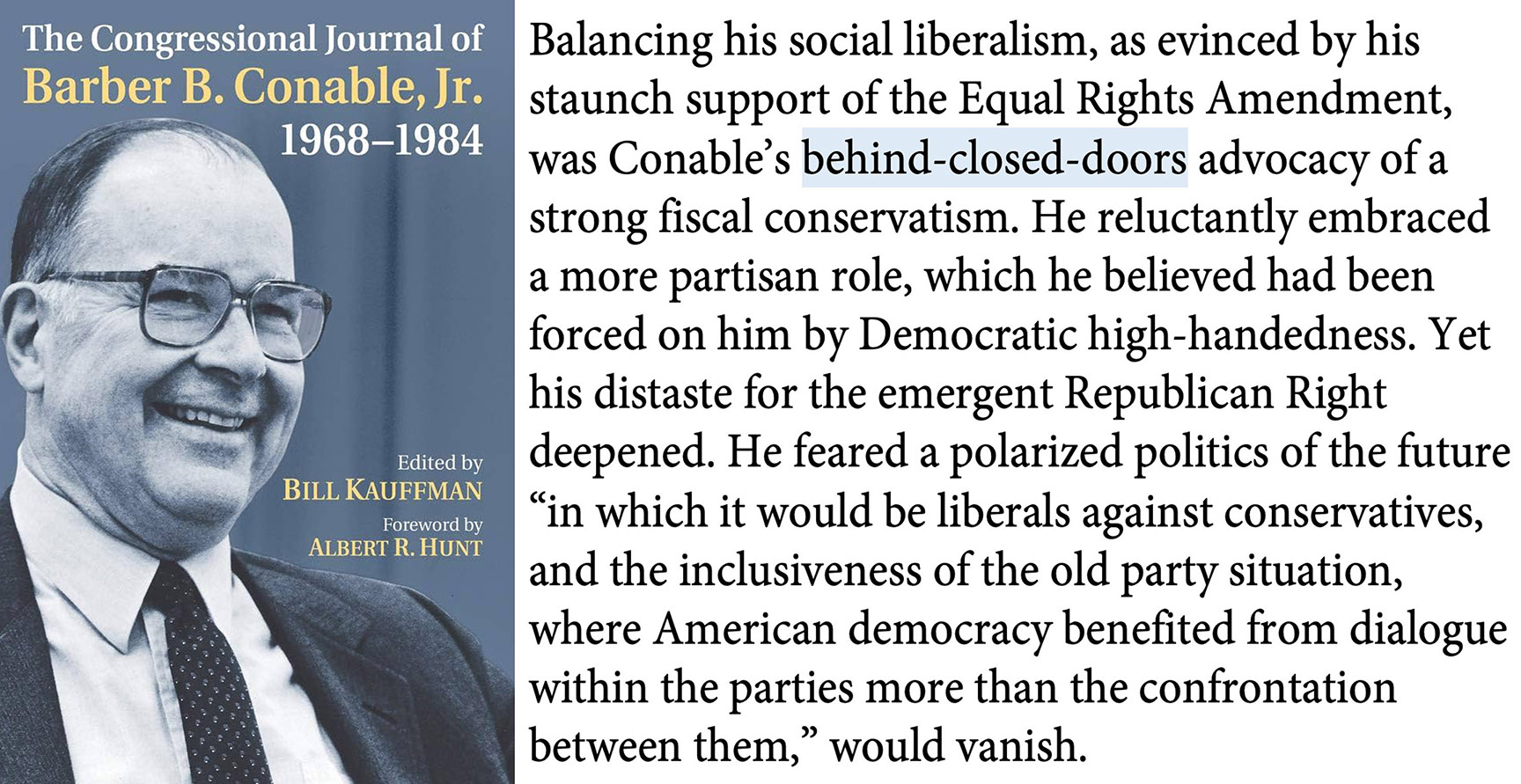
Barber B. Conable, Jr 2004 - Sunshine Drives Partisanship
TEXT: Balancing his social liberalism, as evinced by his staunch support of the Equal Rights Amendment, was Conable’s behind-closed-doors advocacy of a strong fiscal conservatism. He reluctantly embraced a more partisan role, which he believed had been forced on him by Democratic high-handedness. Yet his distaste for the emergent Republican Right deepened. He feared a polarized politics of the future “in which it would be liberals against conservatives, and the inclusiveness of the old party situation, where American democracy benefited from dialogue within the parties more than the confrontation between them,” would vanish.

Barber B. Conable, Jr 2004 - Sunshine Drives Partisanship
Previous studies have noted that states prefer to close negotiations when the issues under discussion are sensitive (Depledge 2005; Raustiala 1997; Stasavage 2004).Naghmeh Nasiritousi & Björn-Ola Linnér 2016
Open or closed meetings? Explaining nonstate actor involvement in the international climate change negotiations
There is one more type of cost that is left to discuss: the audience costs that decision-makers suffer if agents outside the political decision-making process – such as interest organizations and important groups of voters react negatively to the deals that political decision-makers are striking. In political science, the term “audience costs” was first used in the field of international relations, referring to costs that” arise from the action of domestic audiences concerned with whether the [country’s] leadership is successful or unsuccessful at foreign policy” (Fearon 1994, 577), but I am using it here in the context of domestic politics, referring to the potential consequences of having groups that are not involved in the bargaining process witnessing the bargaining process itself (as opposed to the outcome of the bargaining process) (see Groseclose and McCarty 2001). Audience costs are likely to be lower – and reform capacity is likely to be higher – in systems where political decision-makers can negotiate in secret. This may seem like a paradoxical argument to make, since we typically think of openness and transparency as virtues, not vices. But it is an argument that has been made before. If political decision-makers face “audience costs,” they become reluctant to reveal information and make arguments that they would have been happy to reveal and make in secret communications.Johannes Lindvall 2017
Reform Capacity
[The scoring of public votes began as a] lobbying tactic with an electoral edge, intended to produce legislative results by threatening hostile lawmakers with the prospect of electoral retribution. Scorecards were meant to wean group members off party labels as their sole guide in the voting booth, under the theory that greater influence could be secured through nonpartisanship. Instead, members should support a group’s true “friends”—lawmakers who reliably backed favored measures, as shown by their record, not their rhetoric—and punish those “enemies” who did not…Legislators did not take kindly to this scrutiny and its coercive flavor. They “looked upon it as black-listing,” she explains. Some rank-and-file members were also troubled by its imperative quality regarding their own vote.
ADA and ACA scores have been heavily utilized in political science as proxies for liberalism and conservatism and used to demonstrate the growing polarization of the congressional parties. Archival evidence suggests, however, that those scores were intended to create the very phenomenon they have been used to measure. They were deeply political rather than objective metrics, which the ADA and ACA used to guide their electoral activities in accordance with an increasingly partisan strategic plan. Each group directed campaign resources toward incumbent lawmakers they rated highly, but they did so unevenly—with the ADA favoring liberal Democrats over Republicans and the ACA showing a preference for conservative Republicans over time. By rewarding favored lawmakers in their preferred party, and using scores to highlight and discourage ideological outliers, they hoped to reshape the parties along more distinct and divided ideological lines.Emily Charnock 2018
Interest Group Ratings
A main reason for adopting secrecy…has always been the desire to protect voters and jurors from bribery and intimidation. In his statistical analysis of the adoption of the secret ballot in national elections, Przeworski finds that both the extension of the suffrage and the introduction of the secret ballot seem to have resulted from the elites yielding to revolutionary threats by the lower classes, but to some extent also from the desire to protect opposition voters from intimidation by incumbents…As Giannetti shows in her chapter, another effect is that deputies cannot be held accountable by party leaders…Bentham defended the practice of secret voting in the Polish parliament at a time when Poland was under Russian domination. Under certain conditions, it may be more important to prevent an autocrat from punishing representatives than to ensure that the voters can punish them by non-reelection…Jon Elster 2015
Secrecy and Publicity
The “secret congress” theory holds that bills which attract public attention are born to partisan rancour, endure a life of torture and usually die a miserable death. For a recent example, look only to the much-hyped bipartisan deal that sought to patch up America’s broken immigration system and steer much-needed funds to Ukraine. It took months of work to craft the compromise; when it was unveiled on February 4th it barely lasted one business day before being left for dead. But the theory also holds that successful compromises happen all the time as long as no one makes a fuss over it.Economist 2024
Congress might just pass an astonishingly sensible tax deal
[In secret, closed-door sessions] opposing parties can share their perspectives freely and come to understand the perspectives of others.Mark Warren & Jane Mansbridge 2013
Political Negotiation (partisanship)
Rep. Jeff Jackson 2023 - Angry artisanship in open meetings, cordiality in closed
“I’m still brand new to Congress—I’ve only been there 100 days—and I don’t know if I’m not supposed to say this out loud, but it’s true and important. And if you don’t know this, you need to. It’s really clear from working there for just a few months that most of the really angry voices in Congress are totally faking it. These people who have built their brands around being perpetually outraged? It’s an act. I’ve been in committee meetings that are open to the press and committee meetings that are closed. The same people who act like maniacs during the open meetings are suddenly calm and rational during the closed ones. Why? Because there aren’t any cameras in the closed meetings, so their incentives are different.” LINK TO TWEET
Rep. Jeff Jackson 2023 - Angry artisanship in open meetings, cordiality in closed
Transparency, disclosure and gaming by small cadres of organized actors can go together. Need to consider the whole… I know of many cases where transparency massively backfired. Without other institutions & safeguards, the powerful can benefit more.Zeynep Tufekci 2017
Transparency and Disclosure
A good two-minute speech can, and often does, take a half-hour for a politician with a national television audience.Senator Dale Bumpers 1999
How Sunshine Harmed Congress
It is not difficult to understand why the concept of secret deliberations, out of earshot of the King, would have special appeal in the colonial assemblies, the Continental Congress, the Congress of the Confederation and the Federal Convention to frame the Constitution. And, indeed, it was frequently utilized in all of these legislative assemblies in early American history.Donald Wolfensberger 1992
Committees of the WholeNote: The first known secret committees were conducted in England in the 1600s. And the committee of the whole (which voted and deliberated in secret) was developed expressly to prevent intimidation from the King
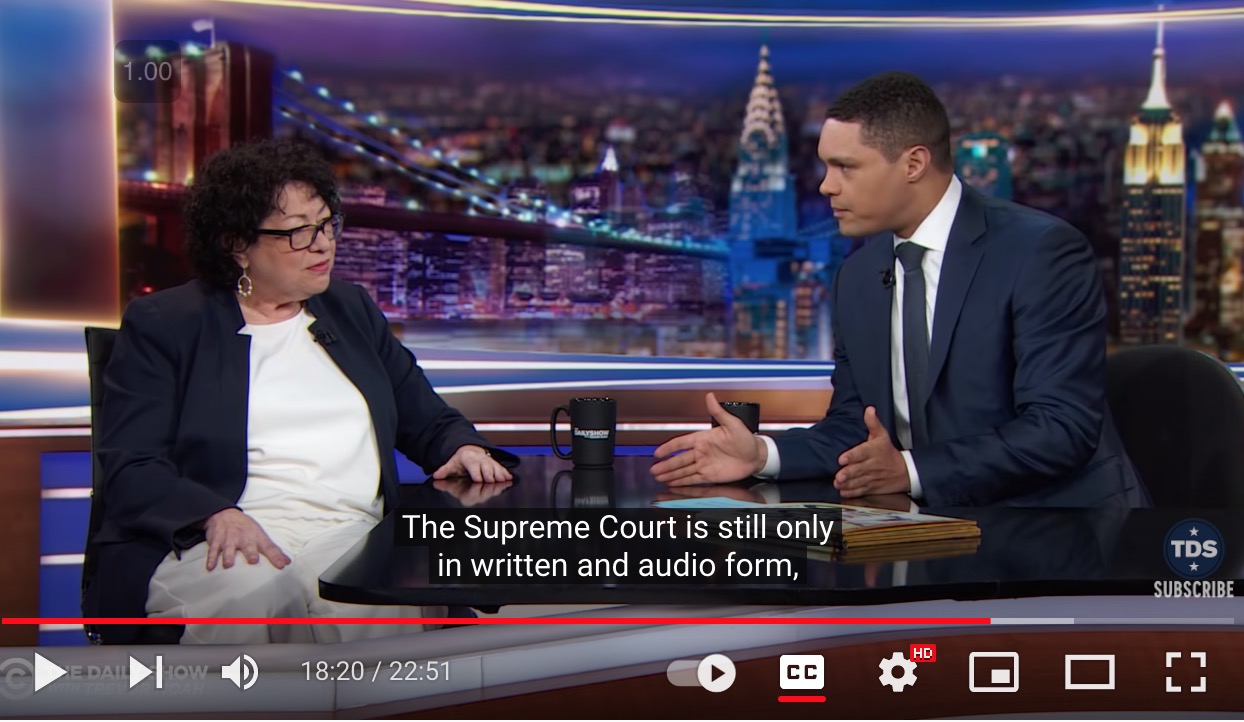
Sonia Sotomayor & Trevor Noah 2019 - Why Cameras would hurt the Supreme Court
Note: At 18:16 in the conversation, Sotomayor launches into a thoughtful discussion on the benefits of less transparency. She pushes back on Noah’s idea of introducing more cameras into the judicial process. Unfortunately the discussion and its importance flies over Noah’s head (he is usually thoughtful). Nevertheless, the discussion which starts at 18:16, continues until the end of the video, and is full of various thoughts on why sunshine can be harmful.

Sonia Sotomayor & Trevor Noah 2019 - Why Cameras would hurt the Supreme Court
De Alva Stanwood Alexander, a former Member of the U.S. House of Representatives, in his History and Procedure of the House of Representatives, observes of this birth of the Committee of the Whole concept in England that: It originated in the time of the Stuarts, when taxation arrayed the Crown against the Commons, and suspicion made the Speaker a tale-bearer to the King. To avoid the Chair’s espionage the Commons met in secret, elected a chairman in whom it had confidence, and without fear of the King freely exchanged its views respecting supplies.Donald Wolfensberger 1992
Committees of the WholeNote: The first known secret committees were conducted in England in the 1600s. And the committee of the whole (which voted and deliberated in secret) was developed expressly to prevent intimidation from the King
A healthy debate on this topic is long overdue. There is shockingly little empirical research to date in political science about transparency, open meeting laws, disclosure rules and related topics.Francis Fukuyama 2015
The Limits of Transparency
The main case against excessive transparency is simple and has three components. First, it undercuts deliberation (have you seen many reasoned open debates in Congress lately?); second, the kinds of disclosure and compliance rules we impose on public officials deters many good people from entering government, and imposes huge burdens on those who do; and finally, it makes very difficult the kind of deal-making that our decentralized system of budgeting requires.Francis Fukuyama 2015
The Limits of Transparency
Secret negotiations were a motif this week. U.S. and Chinese negotiators began meeting last July trying to bridge their differences on emissions reductions, symbolically at the Great Wall. The Guardian broke news of the meetings on Monday, reporting that senior Bush administration advisers and several current Obama advisers met with Chinese officials. The back-channel talks led in March to an unsigned memorandum of understanding, which participants hope will embolden the world’s two largest national emitters to find a common ground in addressing the causes of climate change.Josh Wilson 2010
Scaling the Great Wall of Climate Change
Arguing geared to a reasoned consensus is more likely in private in camera settings and behind closed doors given the considerable risks, which actors face when they expose their interests or even identities to arguing (Jeffrey Checkel 1999). Thus, arguing in front of a public would rarely result in a true dialogue, but more likely lead to ritualistic rhetoric and purely strategic reasoning… private in camera settings during negotiations work particularly well in cases of what game theory calls ‘mixed motive games,’ that is, instances in which actors hold fixed preferences to maximize their egoistic interests, but would also prefer mutual cooperation under specific circumstances. In such instances institutionalized ‘in camera settings’ such as the ‘confession talks’ during European Council summits allow actors to explore potential compromises, to seek out the justifiability of their interests, and the like. These settings allow for arguing and persuasion, because negotiators do not have to stick to their fixed preferences behind closed doors and are allowed to ‘think out aloud’ about possible negotiating solutions… We found many instances, where controversial passages in drafted papers were negotiated within a smaller group of negotiators behind closed doors… In moments like these, arguing behind closed doors and ‘in private’ permits skilled diplomats to go beyond their instructions and to explore possibilities for compromise.Cornelia Ulbert & Thomas Risse 2005
Deliberately Changing the Discourse: What Does Make Arguing Effective?
[T]ransparency entails tradeoffs, imposing direct costs on successful dealmaking. This is especially true given today’s exceptionally polarized and competitive political parties and given the information environment in which lawmakers work. …greater public attention to Congress today combined with polarized parties increases the incentives of lawmakers to adhere to party messages. Such partisan constraints on lawmakers are rarely conducive to setting aside differences and negotiating a deal. Bass et. al. also argue that “backroom wheeling and dealing is just as possible now as it ever was.” We suspect that the opposite is true. Pressures on politicians are more immediate and intense than they were in the past. That makes it harder (though surely not impossible) for lawmakers to engage with each other directly, especially across party lines. And as we argue, such interactions out of the public eye are critical for crafting integrative policy deals, agreements in which the negotiating coalitions care unequally about different parts of the deal.Sarah Binder 2014
The Limits of Legislative Transparency
The Commons met in secret… and without fear of the King freely exchanged its views respecting supplies (claiming that the reason for secrecy in legislatures was to remove the intimidating pressure of the King).Donald Wolfensberger 1992
Committees of the Whole
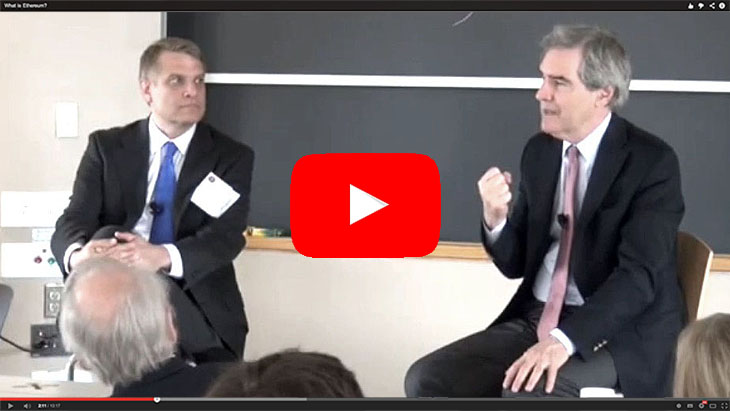
David King & Michael Ignatieff 2014 – Tensions in Transparency (Harvard)

David King & Michael Ignatieff 2014 – Tensions in Transparency (Harvard)
The idea that private negotiations to cut the deficit are somehow bad is fatuous and ill-considered.Joshua Green 2011
Against Supercommittee Transparency
What I did was politics. And to do politics you have to have rooms where what goes on in Vegas stays in Vegas. And then you take it out of the room and you either sell it (present the final legislation) and you either succeed or you fail. But unless you have a deliberative space which is safe, you can’t do what you were sent there to do…Transparency takes us to trust and it takes us to actually what representative democracy is.Michael Ignatieff 2014
Tensions in Transparency (Harvard talk)
Nobody was in the room, nobody knows what was said, but they got the thing done. That’s politics. And we look back on both of those leaders, one democrat and one republican with a lot of nostalgia.Michael Ignatieff 2014
Is Transparency Bad for Politics? (Interview by Matt Cadwallader)
Paradoxically, democracy needs a certain amount of secrecy at the heart of it.Michael Ignatieff 2014
Is Transparency Bad for Politics? (Interview by Matt Cadwallader)
Peace talks are often a climax — coming after months of preparation, secret negotiations and a degree of confidence-building.Sanam Naraghi Anderlini 2014
Peace Negotiations and Agreements
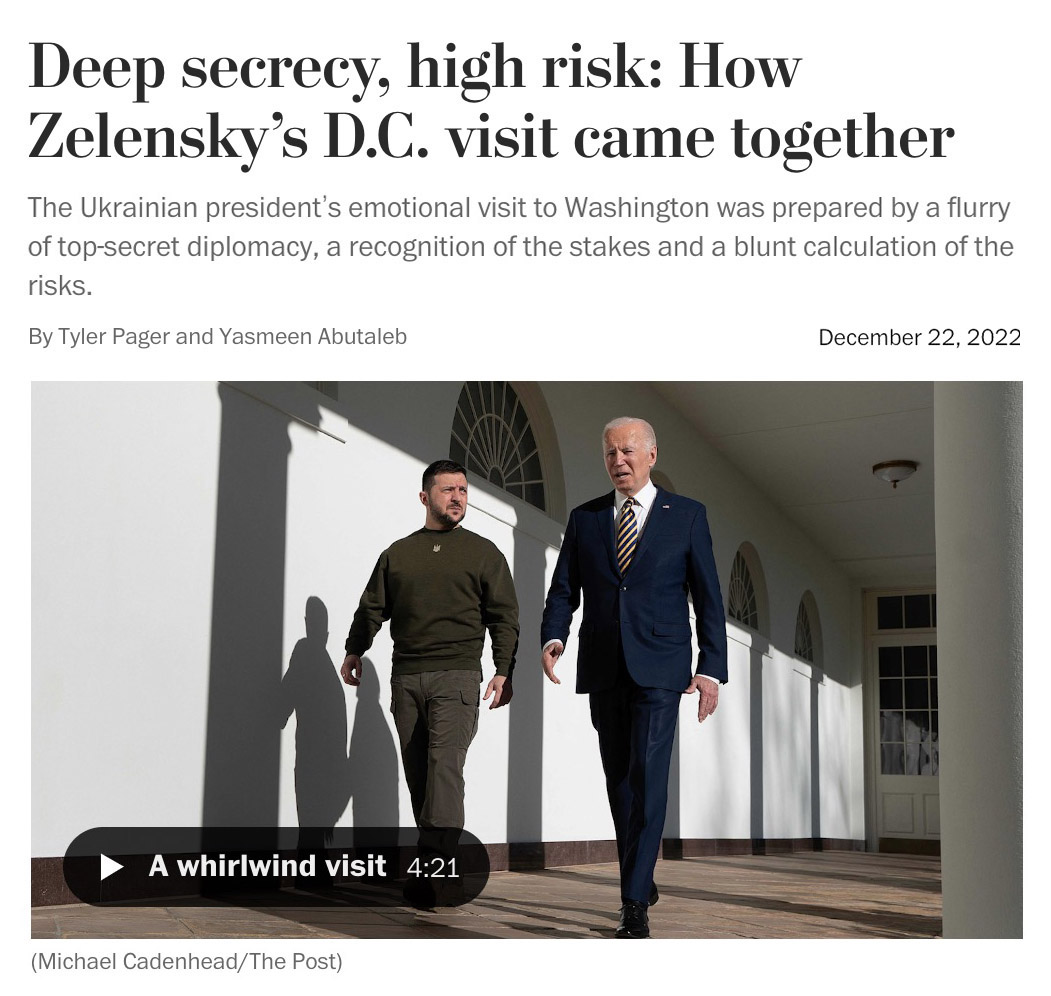
Tyler Pager & Yasmeen Abutaleb 2022 – Deep Secrecy and High Risk

Tyler Pager & Yasmeen Abutaleb 2022 – Deep Secrecy and High Risk
If legislators hide their tracks by delegating authority to the executive, by combining all actions into a single omnibus bill, by meeting behind closed doors, or by acting without a recorded vote, then citizens cannot reward or punish their legislators for their individual actions. In contrast, if legislators are forced to take public positions on specific programs, citizens can hold their legislators accountable for the positions they take.Douglas Arnold 1990
The Logic of Congressional Action
Even when everyone involved had only the best of intentions, being observed distorted behavior instead of improving it. My findings… suggest that more-transparent environments are not always better. Privacy is just as essential for performance… Total transparency heightens the risk that our irreverence will come back to haunt us—and thus has a chilling effect on experimentation. It it’s also critical for leaders to mitigate transparency with zones of privacy, enabling just the right amount of deviance to foster innovation and productivity.Ethan Bernstein 2014
The Transparency Trap
Whether the vote-buying or vote-options approach is used, presumably legislators get paid sufficiently, through some combination of carrots and sticks.David King & Richard Zeckhauser 2003
Vote Buying Requires Transparency
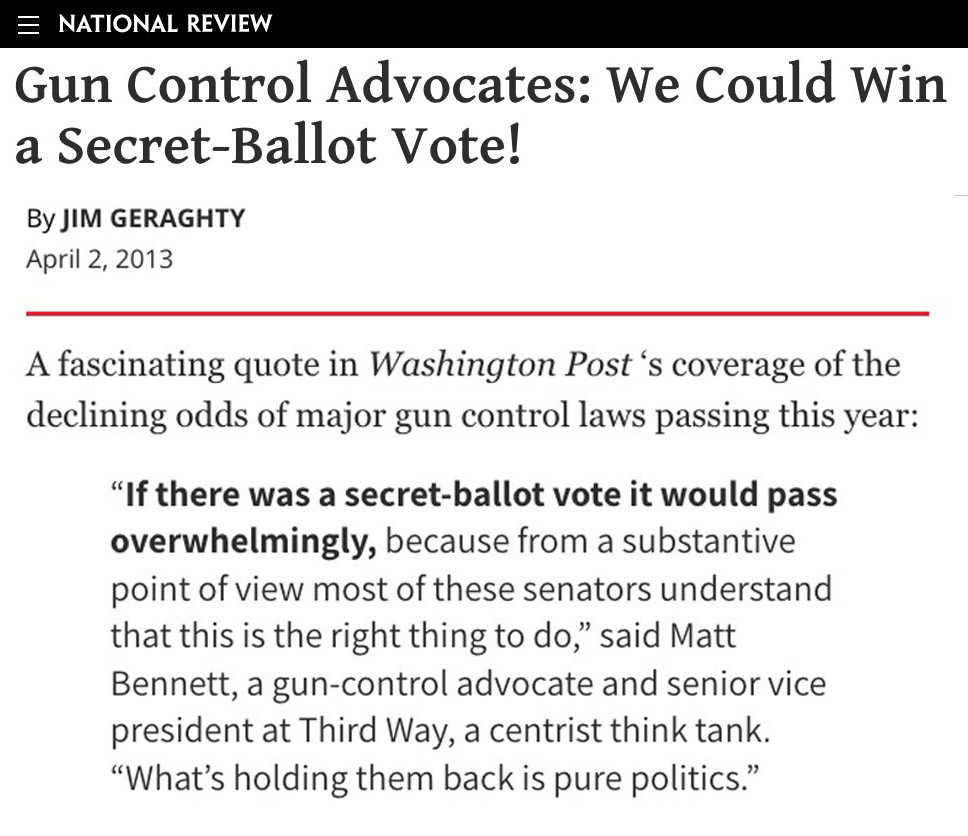
Jim Geraghty 2013 - Gun Control Advocates: We Could Win a Secret-Ballot Vote!

Jim Geraghty 2013 - Gun Control Advocates: We Could Win a Secret-Ballot Vote!
In Woodstock, Vermont, which voted via secret ballot, the non-binding resolution [for tighter gun control] passed overwhelming, with 707 voters calling for more stringent rules on guns, and 186 saying no, according to town clerk Jay Morgan.Jack Thurston 2014
Vermont Towns Tackle Gun Control
Pennsylvania Governor Ed Rendell also said that in a secret ballot, sensible gun control would get 300-350 votes in Congress, and he concluded that “I think we can all agree on what reasonable gun control is and what responsible and reasonable gun ownership is and they both can coexist.”Will Bunch 2009
What’s Next for Governor Ed Rendell?
In a recent column in the Philadelphia Inquirer, an unnamed Pennsylvania legislator said that in a secret ballot in the General Assembly, one gun a month [gun control] would pass by a 3-to-1 margin.Legislative Journal of Pennsylvania 2007
191st Session
Leach introduced a bill in the Pennsylvania Senate this year that would have legalized marijuana. Passage remains unlikely, but if there were a secret ballot, he said, “it would pass overwhelmingly.” A conservative lawmaker who was publicly opposed to the bill, Leach said, told him privately, “I hope it passes so I can stop smoking pot in my living room and start on my front porch.”David Freelander 2013
The New Politics of Pot: The 2014 Candidates Who Want to Legalize It (Marijuana)
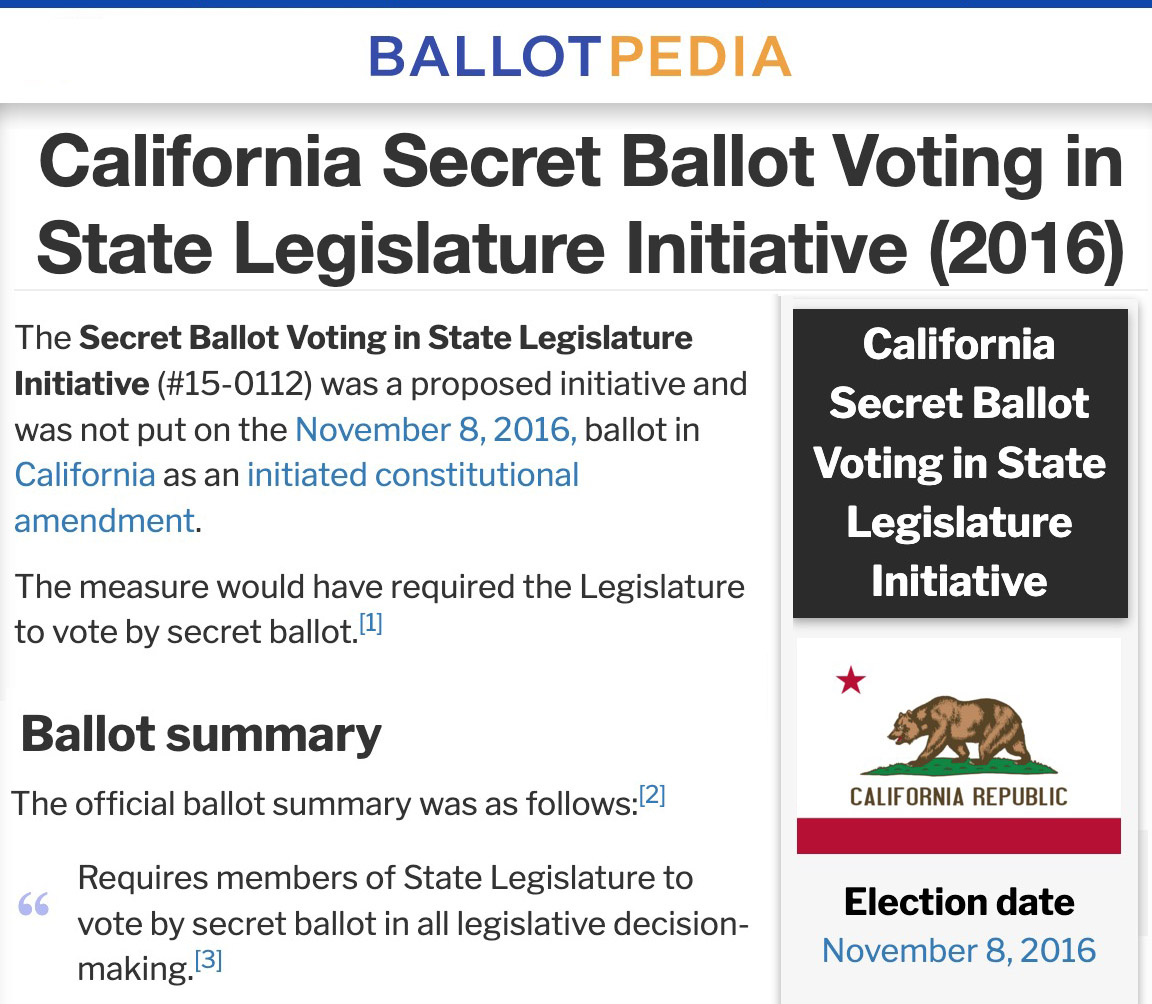
Initiative California 2016 - Requires members of State Legislature to vote by secret ballot in all legislative decision-making.

Initiative California 2016 - Requires members of State Legislature to vote by secret ballot in all legislative decision-making.
“If the gas tax could be voted up or down on a secret ballot, it would get 285 yes votes in the House and 85 or 90 in the Senate,” says Rendell. “Everyone knows we need new revenue, everyone knows we can’t let the trust fund go broke … Everyone knows this is one of the most embarrassing chapters in the history of the U.S. Congress.”Alec MacGillis 2015
How the ‘Embarrassing’ Gas Tax Impasse Explains Washington
Sen. Joe Manchin said Thursday if the National Rifle Association hadn’t interfered by telling [threatening] lawmakers their votes on background checks would be factored into its grading system, the bill would have passed. “If they hadn’t scored it, we’d have gotten 70 votes,” Manchin said. Mark Kelly, Gabby Giffords’ husband, said fear lead senators to vote “no” on the bill. “If that [gun control] vote had been a secret ballot, I bet you it would have passed with 80 votes… A lot of the senators that we met with over the past days and weeks–you know, we discussed this legislation with them, we talked about how it would work, what it would do, and most of them – actually, almost all of them – said that they were in favor of the policy on the merit.” Gabby Giffords, herself a victim of gun violence, called out the “cowardice” of senators in a New York Times op-ed following Wednesday’s gun vote.Sarah Muller 2013
The NRA ‘made a big mistake’ on gun bill
When votes look as though they may be close, clever leaders seek out those members, often cross-pressured already, whose votes might be tipped in their direction most cheaply. Leaders then induce them - through compromises, side payments, and threats – to pledge their votes should they be needed.David King & Richard Zeckhauser 2003
Vote-Buying Requires Transparency
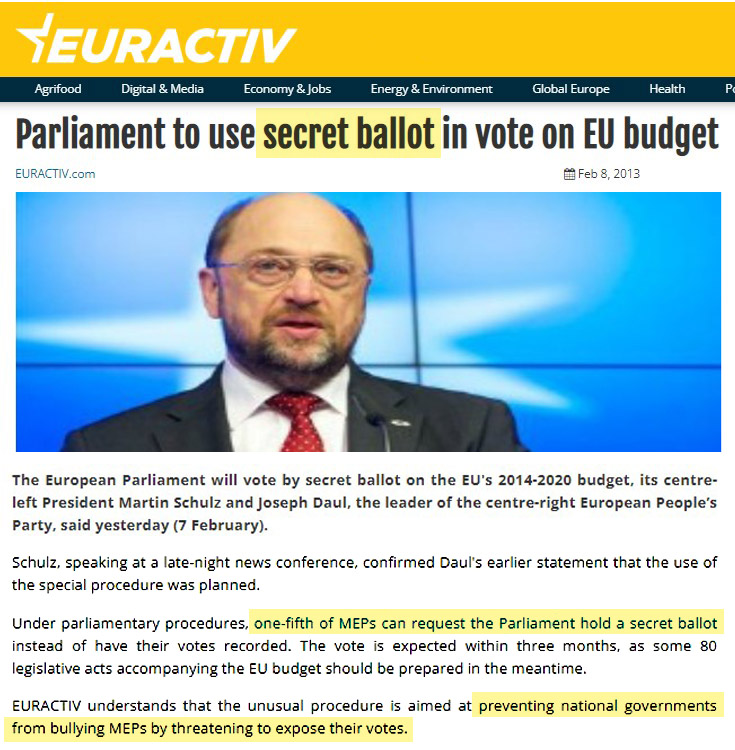
Eurpean Union Parliament to use secret ballot in vote on EU budget to prevent bullying

Eurpean Union Parliament to use secret ballot in vote on EU budget to prevent bullying
Nearly 80% of the 108 Climate Assembly UK members agreed in a secret ballot that government steps to boost the economy should be designed to help achieve net-zero emissions by 2050 — a target enshrined in British law last year.Megan Rowling 2020
UK Citizens’ Assembly on Climate Change Backs a Green Coronavirus Recovery
Conversations between assembly members are private and never live streamed to ensure they feel able to have full and frank discussions.Climate Assembly UK 2020
The Path to Net Zero
The UK, New Zealand and Australia have no provisions for voting by means of a secret ballot in motions of no confidence. In addition, there are no exceptional mechanisms to enable such a vote. In all three of these jurisdictions, there is a strong sense that Parliament has the sole discretion to determine its own procedures. One explanation for this is that these jurisdictions have strong traditions of parliamentary sovereignty, it is unlikely that any constitutional framework would interfere with parliamentary rules. However, in all these jurisdictions, there is no express prohibition on voting by secret ballot.University of Oxford 2017
Secret ballot voting by the National Assembly in motions of no confidence
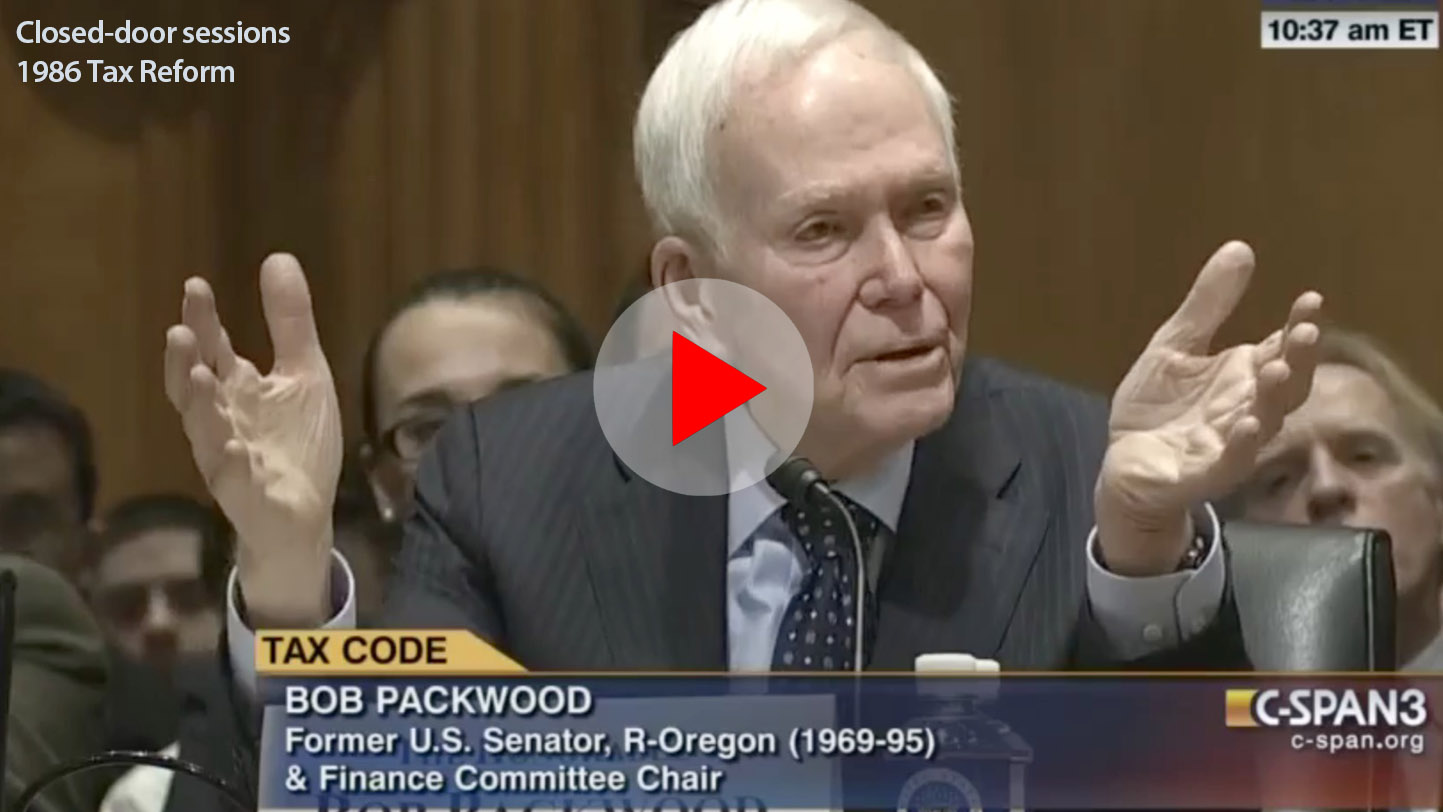
Rep. Senator Bob Packwood - The Closed Door Sessions 1986 Tax Reform
TRANSCRIPT PACKWOOD: Then on Thursday, I presented to the committees at the same time, our committee, just the outlines – we have no bill – just the outlines of what might be possible, and they seemed to like that. So I thought to myself – the meeting was over and I was getting toward the weekend, and I was thinking at this stage, “How are we going to do this?” And I thought the only way it could be done was bipartisan, quickly, and behind closed doors. Bipartisan because I could see any bill that was utterly partisan on the Republican side would have no success with the House Conference. Any bill that was not done quickly, but hung out like the House bill had been, would pick up enemies all along the way. And it would have to be done behind closed doors. It was helpful to have the President on board at the start. It was not critical, but it was helpful to have him basically tilting the same way we were going to go in the Senate. On that weekend, on Saturday and Sunday, I called six Senators – Bill Bradley, George Mitchell, Pat Moynihan, Jack Danforth, John Chafee, Malcolm Wallop – and I said, “Would you be willing to meet in my office starting next Tuesday at 8:30 to see if we can work out a bill that will be satisfactory to us and the President?” Every one of them said, “yes.” And then passed, starting that Tuesday, the most extraordinary experience in my life in politics. We met from Tuesday to Tuesday, and Bill was at every meeting. In fact, they were all at every meeting, every morning at 8:30. I would meet with staff at 7:30 and this core group, a cabal as I called it, at 8:30, and we would work out what we thought should be in the bill. We had one or two open committee meetings, but basically the committee was just marking time waiting for us to finish. And you could tell, although the meetings were behind closed doors, there are no secrets in this town and word was getting out we were having the meetings, but no one exactly knew what it was we were doing. But on the Thursday between these two Tuesdays came a phone call that became very important in this whole process, and I will read it to you because it is from the diary. “Back again to tax reform in closed session. Was interrupted by a phone call from Danny Rostenkowski. Bless his soul, he said, `Pal, I’ve been thinking of coming over there and without fanfare, without press, just to say I’ve been through it. I know every day you go through troughs and on hills and I’ve been bleeding for you. But I think what you’ve got in terms of tax reform is the best thing Congress has seen in 10 years. You get this through the Senate and between the two of us, we’re going to put out a bill that for a generation of Americans will look like a pinnacle.’ God, I appreciated it.” What he was saying, what the Ways and Means Committee chairman was saying was, write this bill in the Senate, which Ways and Means does not say very often. We continued our meetings through Friday and then we had a public meeting Friday afternoon, and I said to everybody, “We are done, and we are not going to meet this weekend.” By this time, the hallway was packed with lobbyists. We had speakers out there. “Committee, we are done, we are not meeting at all this weekend” – cheers and huzzahs. And then I said to the core group, “But we will meet tomorrow.” Bill had already planned – you went to Kentucky that night for a speech, canceled your trip to the Kentucky Derby, and came back to be with us the next day. On that Saturday, the seven of us met all day, from about 8:30 to around 4:30 or 5 in the afternoon, and that tied up all the last of the things we needed. Joint Tax needed a couple of days to get it together, but they would have it for us Monday or Tuesday, and we were ready to go on Tuesday night, until I finally had to make an odious deal with the oilies to get their support – not in committee, we could have beaten them in committee, but to get their support for something we needed desperately on the floor, and if we lost this particular issue on the floor, the bill was dead. And that was it. We voted that night. Most of the committee had not ever seen the whole outline of the bill or the whole bill until that night. And so from Tuesday to Tuesday, the seven of us worked. That night the bill was adopted 20-0. Now, can you do the same thing now in this committee? Here are the things that would be critical. It is helpful to have the President on board, to have him with you from the start. But at a minimum, you have to make sure that he is not against you or gives the impression that he is not sure if he is going to support it or he has some questions, because you are not going to get your members to take tough votes on things that the President might veto if you put them in the bill. So at a minimum, he must say, “I am open; send me a good bill.” Two, I think you are going to have to do it in much the same way we did, which is behind closed doors, but that is not uncommon in the House and the Senate even today. Do it behind closed doors and try to do it quickly and present it in one grand bill. We did it combining both corporate and individual into one bill and then used the money we raised from them to lower tax bills for everybody else. If you look on the last page of the statement, you will see who the major groups were we hit. It was almost all corporations and rich individuals. And do it in one bill so that people do not have to pick out a particular thing that they do not like and are forced to vote against. You give them this. You give them the whole bill, and I think they will go for it. So that is what we succeeded in doing, and, believe it or not, by hitting business as hard as we did, raising their taxes about $140 billion, we managed to lower the corporate rates from 48 percent to 34 percent, lower the individual rates from 50 percent to 27 percent, and keep the bill revenue-neutral. You can do it.

Rep. Senator Bob Packwood - The Closed Door Sessions 1986 Tax Reform
This special procedure was utilised by a request of one-fifth of MPs when the Vote on the EU Budget 2014 – 2020 took place back in February 2013. In that instance, the special procedure was aimed at preventing national governments from bullying MPs by threatening to expose their [secret ballot] votes in this sensitive matter.University of Oxford 2017
Secret ballot voting by the National Assembly in motions of no confidence ( UK, European Union)
On Thursday, the NRM's Central Executive COmmittee (CEC) approved an amendment of the party's constitution to rid voting by secret ballot and instead allow voting by queuing in the internal elections. No candidate is expected to oppose the president in a move that will tighten his grip on the ruling party. Party electoral commission chairperson Dr. Tanga Odoi says the queue voting seeks to streamline violent and shoddy primaries and 'bad manners' which leave the pary divided every electoral season.Jonathan Kamoga 2020
NRM to endorse Museveni for another termNote: In Uganda members of parliament sought secret voting in the legislature to diminish the intimidating presence of the president - who actively opposed secrecy. Clearly open voting diminishes partisanship as it allows for leaders to intimidate their rank and file.
Arguing in front of a public would rarely result in a true dialogue, but more likely lead to ritualistic rhetoric and purely strategic arguing.Cornelia Ulbert, Thomas Risse & Harald Müller 2004
Arguing and Bargaining
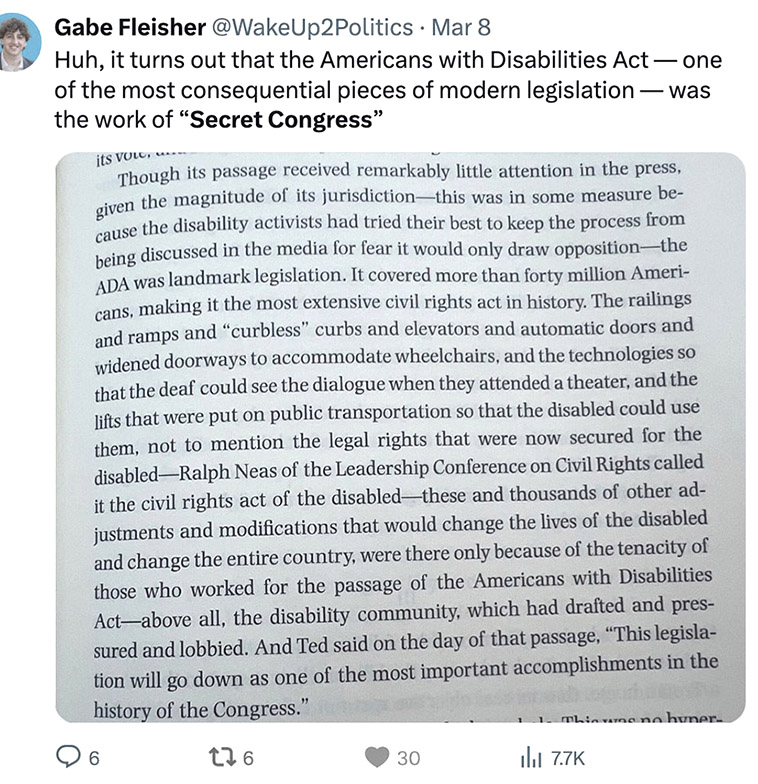
Gabe Fleisher & Neal Gabler 2024 – Secret Congress on Americans with Disabilities Act - Against the Wind

Gabe Fleisher & Neal Gabler 2024 – Secret Congress on Americans with Disabilities Act - Against the Wind
Arguing geared to a reasoned consensus is more likely in private in-camera settings and behind closed doors given the considerable risks which actors face when they expose their interests or even identities to arguing.Cornelia Ulbert, Thomas Risse & Harald Müller 2004
Arguing and Bargaining
The history of secret diplomacy, under Republican and Democratic administrations alike, clearly illustrates its benefits. The most important diplomatic breakthrough of the Cold War, the opening to China, began with secret negotiations between Henry Kissinger, then President Richard Nixon’s national security adviser, and Chinese Premier Zhou Enlai. Kissinger’s top-secret trip to Beijing in 1971 laid the groundwork for Nixon’s historic visit the following year. And the warming of Sino-US relations helped widen divisions between China and America’s Cold War adversary, the Soviet Union. Likewise, President Barack Obama’s signature diplomatic achievement, the 2015 Iran nuclear deal, could not have been achieved without secret talks. In March 2013, Obama sent two senior State Department officials, William J. Burns and Jake Sullivan, to begin secret conversations with the Iranians in Oman. Given that diplomatic relations between the two countries had been severed for more than 30 years, and that each country was radioactive in the domestic politics of the other, holding preliminary negotiations in public would have been a non-starter. Soon enough, the secret conversations led US officials to conclude that the Iranians were serious about entering into formal talks.Graham Allison 2018
The Case for Secret Diplomacy
Scholars argue that secrecy was essential to Communist China and the US opening diplomatic relations, Israel and the Palestinian Liberation Organization (PLO) negotiating key parts of the Oslo Accords, and the Soviet Union (USSR) demonstrating its willingness to escalate conflict in Angola.Raymond Kuo 2019
Secrecy Among Friends
All laws are born of negotiations. The settings and contexts for these negotiations contrast sharply with those for labor leaders and business executives, who are usually blessed with quiet negotiation rooms, reasonably unified principals, and the task of completing deals one at a time. Politicians often negotiate in a bubble, with interests groups and the media watching… Votes are visible and easily monitored by principals, but the art of negotiation lies strongly in shaping legislation before a vote.David King & Richard Zeckhauser 2002
Punching and Counter-Punching in the U.S. Congress
Revealing the agent’s action leads to conformism. (A component of partisanship)Andrea Prat 2005
The Wrong Kind of Transparency
Excessive transparency may create incentives for the [legislator] to behave in ways that damage the [voter]. If that is the case, the [voter] would want to commit not to observe certain variables in order to avoid the damaging behaviour. Andrea Prat 2006
Transparency: The Key to Better Governance?
The concepts of transparency and accountability are closely linked: transparency is supposed to generate accountability. This article questions this widely held assumption. Transparency mobilizes the power of shame, yet the shameless may not be vulnerable to public exposure. Truth often fails to lead to justice.Jonathan Fox 2007
Uncertain Relationship
We should avoid the common habit of thinking of individuals as the principal users and beneficiaries of transparency. Instead, professionals and organizations often constitute the most important users of public disclosures.Archon Fung 2013
Infotopia
If the deal is to pass, future discussions might have to happen sotto voce.Economist 2024
The "Secret Congress" Theory
Lobbyists learn about legislators. They study their biographies, their voting records, and the predilections of their constituents. They examine members’ policy agendas and how they may be changing, their political situation, their constituents’ views on issues, and the strength (and identity) of their likely opposition in the next election. They scour such vital information as the legislator’s religious affiliation, previous employment, and spouse’s name and occupation, all in an effort to understand how best to persuade the legislator. Federal Elections Commission records and financial disclosure forms provide names of contributors and personal information (such as stocks owned and clubs joined) that can aid the lobbyist in finding ways to influence the member. Lobbyists target members for lobbying by identifying key “swing” votes: legislators who are capable of being persuaded. They then use voting records, election statistics, public statements, and information about the member and the district to find the right “hook” to persuade the right member, including grassroots mobilization that reinforces their inside lobbying efforts. Barry R. Rubin 2000
Guide to Politics in America
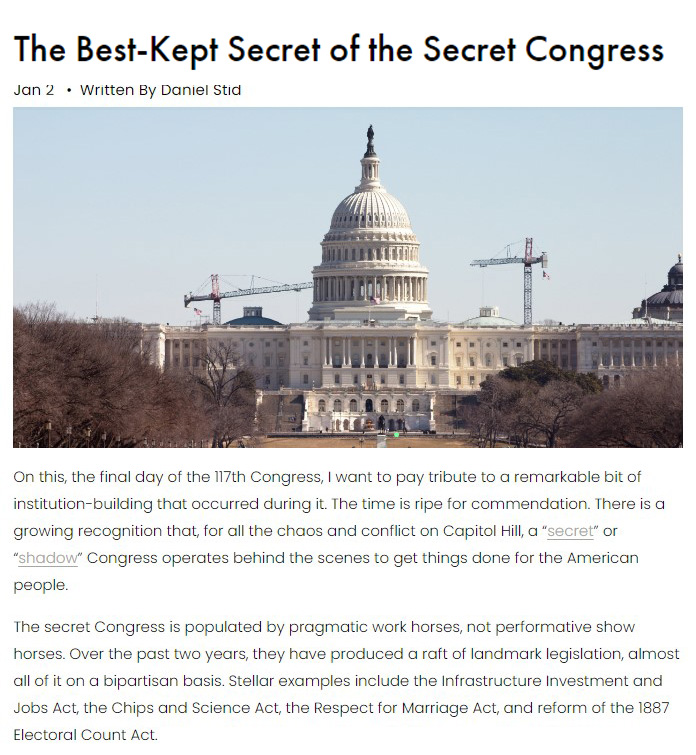
Daniel Stid 2023 - The Best-Kept Secret of the Secret Congres
TEXT: There is a growing recognition that, for all the chaos and conflict on Capitol Hill, a “secret” or “shadow” Congress operates behind the scenes to get things done for the American people. The secret Congress is populated by pragmatic work horses, not performative show horses. Over the past two years, they have produced a raft of landmark legislation, almost all of it on a bipartisan basis.

Daniel Stid 2023 - The Best-Kept Secret of the Secret Congres
First, the actual evidence on transparency’s impacts on accountability is not as strong as one might expect. Second, the explanations of transparency’s impacts are not nearly as straightforward as the widely held, implicitly self-evident answer to the ‘why’ question would lead one to expect. To evoke the power of sunshine is both intuitive and convincing. Indeed, these principles have guided my past 15 years’ work. Nevertheless, recently, after reviewing the empirical evidence for the assumed link between transparency and accountability, I have come to the conclusion that one does not necessarily lead to the other. Jonathan Fox 2007
Uncertain Relationship
Reputational concerns lead to the loss of socially valuable information.Stephen Morris 2001
Political Correctness
Transparency on action can induce the agent to disregard useful private information and act in a conformist manner. As a consequence, the principal can be better off by committing not to observe the action.Andrea Patacconi & Nick Vikander 2013
On Management of Public Opinion
(referring to work of Andrea Prat)
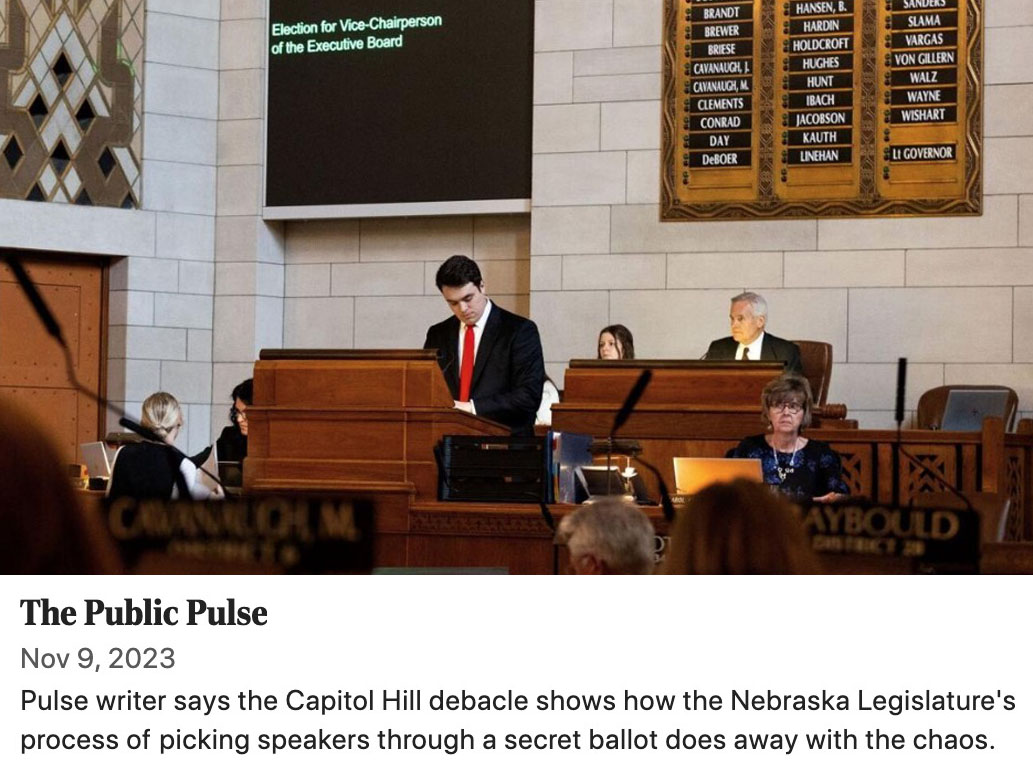
Peter Gadzinski - Partisan Clown Show
Partisan clown show: The frustrating exercise that we watched in the House of Representatives in regard to choosing our next speaker is a prime example of some of the things we need to fix in our electoral and governing processes. First, the debacle of choosing a speaker shows how the Nebraska Legislature’s nearly century-old process of picking speakers through a secret ballot does away with the partisan clown show that we have seen in Washington, D.C. Is it really wiser for us to change our rules so we have to go through the same party purity tests and shenanigans we are seeing in D.C.? Nebraska Legislature's process of picking speakers by secret ballots does away with the chaos.

Peter Gadzinski - Partisan Clown Show
The big problem with congressional capacity is that voters hate it – they don’t hate the idea of Congress being well informed, but they hate the idea of members spending money on themselves… And if you ever live in a swing district, you can hear whatever you want about policy issues, but two weeks before the election, every palm card that comes home, “Look how much money he spent on his own salary, or look what he did” And constituents just hate the idea of members of Congress spending any money on themselves. And so, members are loath to take any votes that show them spending any money on their own salary, on their staff salaries, on fixing up the hill, or anything like that. I was a staffer at leg branch appropriations. And this was a horrible mess, trying to get members and the capital complex would be crumbling, and members would say “We got to do something about this, but… ugh… can we make it really invisible so I don’t have to show people I voted for this.” And so that’s a huge problem… .One way that members can compensate their staff more without having to take any tough votes, is by putting more staff benefits off budget… .With that said, I don’t think there’s a huge appetite on the hill to follow through on radically increasing staff or salary. You talk to any member, off the record, in private, and of course they’d like to pay their staff more, and, of course, they’d love to have more staff. But the votes are extremely difficult to take, and that’s kind of the price of a representative democracy.Casey Burgat & Matt Glassman 2018
On Legislative CapacityNote: We highlight the sections where it seems clear that increased transparency drives worsening conditions for members of Congress, which, indirectly result in diminished outcomes for constituents. Too much constituent pressure can be bad.
Washington has become subject to what psychologists call the “observer” effect, whereby subjects who know they are being watched alter their behavior. Many predicted this result long before C-SPAN became a Washington institution. In the Senate, Howard Baker, the longtime majority leader, faced broad opposition to allowing cameras in the Senate chamber. His colleagues feared that senators would begin to talk to cameras instead of each other. Predictably, members of Congress now pay little to no attention to their colleagues’ statements. C-SPAN hasn’t simply exposed dialogue that was once partially shrouded; it has entirely changed the substance of the conversation itself… Floor debate had transitioned from being a tool of internal deliberation to a platform for political posturing.Jason Grumet 2014
The Dark Side of Sunlight (City of Rivals)
While transparency, access, and oversight are crucial to any working democracy, their unencumbered embrace has also encouraged a vicious cycle that has undermined governing effectiveness and legitimacy.Jason Grumet 2014
The Dark Side of Sunlight (City of Rivals)
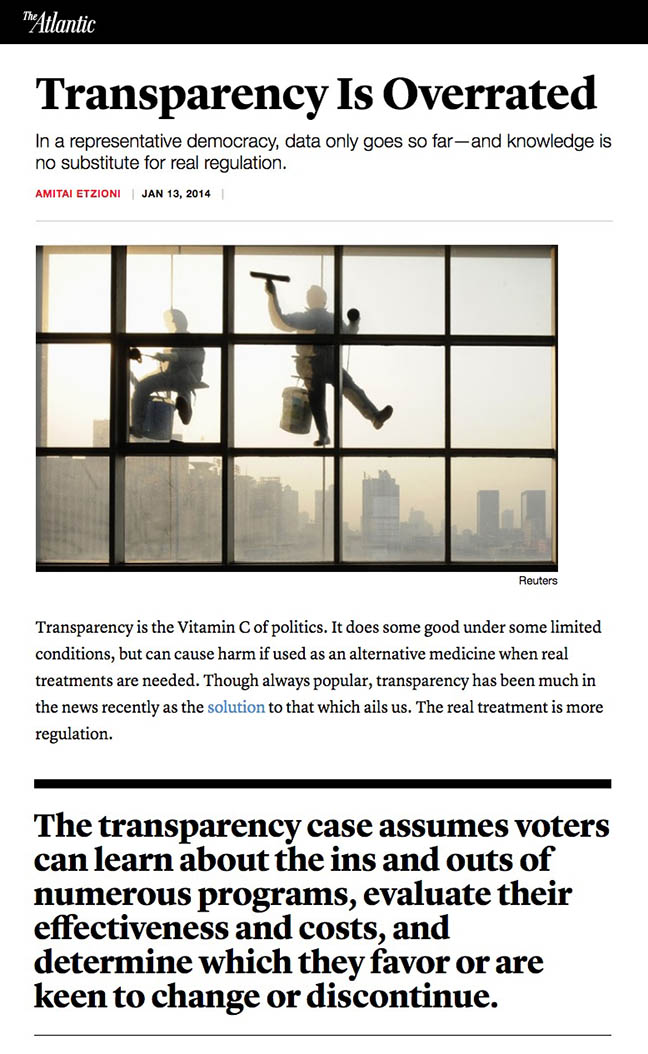
Amitai Etzioni 2014 - Atlantic Magazine

Amitai Etzioni 2014 - Atlantic Magazine
Our results show that transparency decreases embezzlement while it has no significant effect on bribery.Daniel Parra, Manuel Muñoz-Herrer, Luis A. Palacio 2021
The Limits of Transparency in Reducing Corruption
Too much transparency may inflict damage on organizations by making them conflicted and vulnerable.Vladislav Valentinov, Gert Verschraegen, Kristof Van Assche 2019
The Limits of Transparency: A Systems Theory View
Transparency provisions often seem to result in more centralized control of official information than before, in spite of the protest rhetoric of “openness”Vladislav Valentinov, Gert Verschraegen, Kristof Van Assche 2019
The Limits of Transparency: A Systems Theory View
Moreover, “the individuals in each group announced their choice orally, one by one, to the teller, or rogator. How individuals voted was therefore a very public affair”; the combination of voting procedures and social realities ensured the upper classes a powerful influence over the voting assemblies.Alexander Yakobson 1995
The Secret Ballot and its Effects
First, while there are benefits to transparency – and final votes on all legislation should always be on the record – there are also benefits to nontransparency. In the current political climate, for example, we would likely get better results – and more of the essential compromise on which a populous democracy depends – if legislators were permitted to negotiate privately without fear of being pummeled for “selling out” if they seek ways to advance their principles and still allow government to function. That same concern allowing government to function – is a strong argument for electing a Speaker by secret ballot, as is done in the British House of Commons. This would allow every member of the House to vote for that candidate he or she actually believes would best perform the functions of Speaker, without being exposed to retaliation for lack of fealty to one’s club.Mickey Edwards 2012
Parties Versus the People
The Hays group, knowing it was on thin ice, did no stomping around in the Senate, where the bill was passed overwhelmingly without a record vote. Barkley arranged to waive a roll call so he could keep both the friendship of the movies and of the reform organizations.Kenneth G. Crawford 1939
The Pressure BoysNote: Here, ‘the Hays Group’ and ‘the movies’ refers to the pro Hollywood corporate lobbyists who were protecting the motion picture industry. Hollywood was under fire for acting as an oligarchy and so there was antitrust legislation in the works. The reformers were fighting back against Hollywood. They included many religious groups and citizen organizations. The situation was heated. But Congress pushed the matter behind closed doors in order to prevent further polarization and to open up the conscience of many members who were afraid to stand up against the might of the industry.
Republican newspapers railed against Senate secrecy. “Are you freemen who ought to know the individual conduct of your legislators,” editor Philip Freneau challenged readers of the National Gazette, “or are you an inferior order of beings incapable of comprehending the sublimity of Senatorial functions, and unworthy to be entrusted with their opinions?” The longer the Senate’s doors remained closed the more suspicion they generated. In 1794, when Federalists questioned the credentials of Republican Senator-elect Albert Gallatin, they feared that a secret debate might raise accusations of a Star Chamber proceeding. They agreed to open this one debate to the public, but the doors never completely shut. The Senate ordered construction of a gallery, which it opened in December, 1794 – for legislative debates. All treaties and nominations continued to be debated in secret until the twentieth century.
A fickle press showed little interest in the Senate’s open sessions. Freneau’s National Gazette closed down before it could cover the Senate. The Philadelphia Aurora sent a reporter to the Senate gallery but found the show too staid. Newspapers admired the dignity of the senators but devoted more space to the rambunctious House. “Henceforth you will read little of me in the Gazettes,” one representative advised his wife after his election to the Senate in 1804. “Senators are less exposed to public view than Representatives.Donald Ritchie 1991
Press Gallery: Congress and the Washington CorrespondentsNote: The very newspapers that were so furious about secrecy failed to show up to observe Congress when the doors were opened. The galleries remain to this day mostly empty with a scattering of lobbyists.
Leaks of secret documents triggered even louder outbursts. In 1844, the Senate censured one of its own members, Ohio abolitionist Benjamin Tappan, for supplying the press with confidential documents about a treaty to annex Texas. Two years later, the Senate investigated the Washington correspondents of the New York Tribune and Philadelphia North American for unauthorized publication of the Oregon boundary settlement. By 1848, emotions reached fever pitch when the Senate imprisoned a New York Herald reporter for publishing the still secret treaty of GuadalupeHidalgo, which ended the Mexican War.Donald Ritchie 1991
Press Gallery: Congress and the Washington CorrespondentsNote: The Senate imprisoned a reporter for publishing a secret treaty! How times have changed.
Secrecy fit the ambience of the late nineteenth-century Senate, which resembled something of a private gentleman’s club. Through seniority and increased party regularity, a handful of committee chairmen controlled its proceedings and exercised enormous influence over the workings of the federal government. Senators insisted upon the necessity of secret sessions to protect national interests during treaty debates and to preserve the reputations of presidential nominees; but secrecy also strengthened the Senate’s power over treaties. Closed doors fostered an atmosphere that encouraged the Senate to amend, revise, and reject treaties at will…Whenever the Senate shifted from legislative to executive business, it cleared spectators from the galleries – including the press gallery – and bolted the doors behind them. In the informality of their executive sessions, senators unbuttoned their vests, lit up cigars, and stretched out on the chamber’s leather couches. Some senators felt that the relaxed nature of the closed-door sessions reduced friction and avoided the posturing that slowed down their public proceedings.Donald Ritchie 1991
Press Gallery: Congress and the Washington CorrespondentsNote: Ritchie in his book often argues that the press found out all necessary secrets and votes, but this is entirely doubtful and appears to be little more than speculation on his part, in part based on the bombast of the journalists themselves.
The United States House of Representatives is among the most transparent and representative legislative bodies in the world. All citizens have the right to call or visit their representative’s offices and offer their opinions. Television cameras record and TV stations (and now the Internet) disseminate a variety of speeches, votes, debates, committee meetings, and other legislative actions of lawmakers. Records of representatives’ opinions, statements, votes, and finances are publicly available and searchable. The floor of the House of Representatives is a manifestation of majority ruled politics. Yet even with these transparent building blocks, the House of Representatives, like many other systems, has procedures so complex and evolving that few individuals are able to fully grasp the entirety of what goes on and to imagine how to impact the process. Trevor Corning, Reema Dodin & Kyle Nevins 2017
Inside Congress
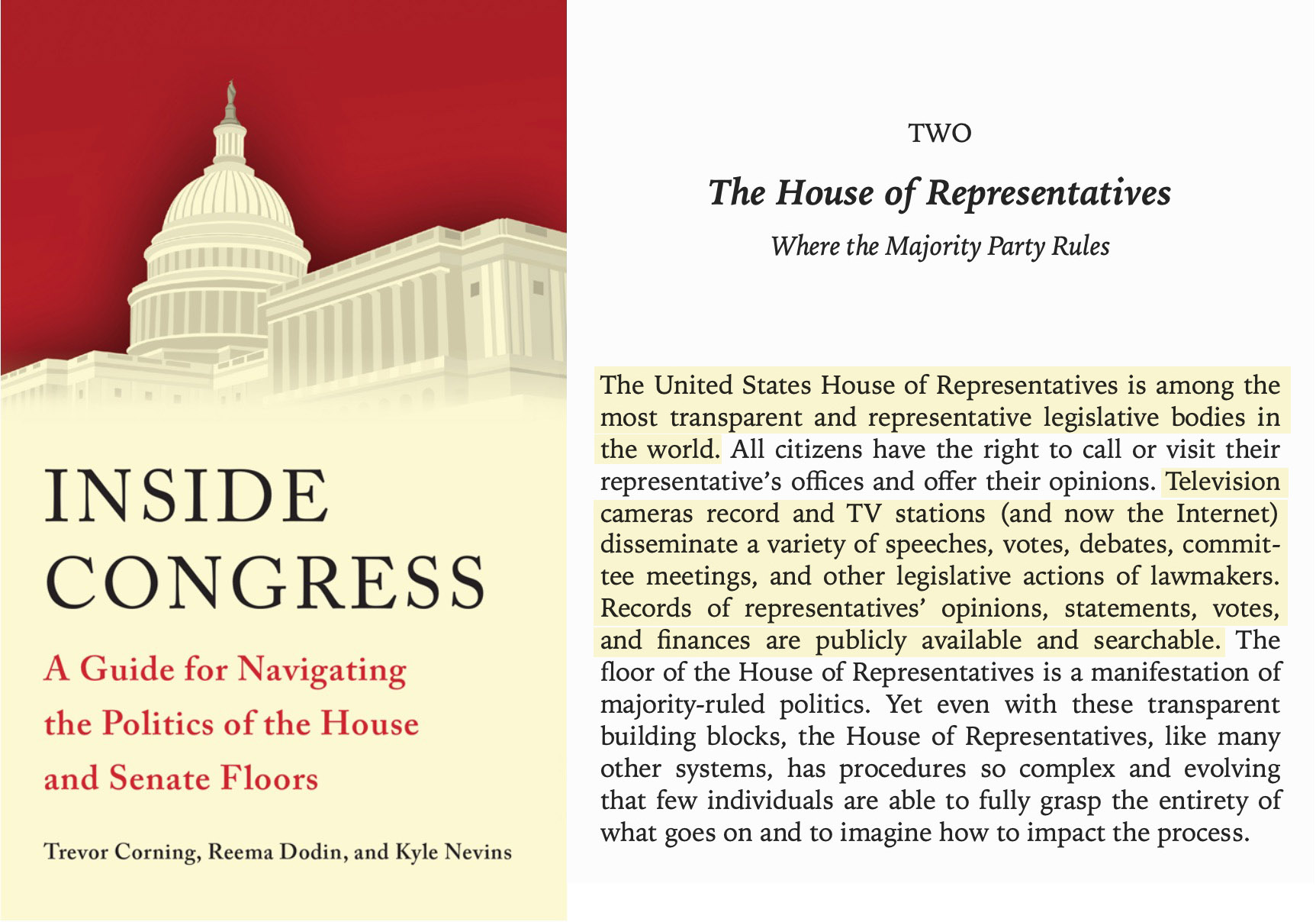
Trevor Corning, Reema Dodin & Kyle Nevins 2017 - Inside Congres

Trevor Corning, Reema Dodin & Kyle Nevins 2017 - Inside Congres
Transparency requirements exacerbate “career concerns”, in which politicians may have an incentive to pander to the public, or they may allow third parties to incentivize behavior not in the public interest.Ronen Gradwohl & Timothy Feddersen 2015
Persuasion and Transparency
Think twice before implementing anything like radical transparency… Requiring transparency may actually yield less information than allowing deliberations to go on in private.Ronen Gradwohl & Timothy Feddersen 2015
The Downside of Transparent Decision Making
Gersbach and Hahn (2001), Fingleton and Raith (2005), Stasavage (2004) and Sibert (2003) focus directly on the comparison between secretive and transparent mechanisms. They all show that secrecy may induce better decisions because it reduces the incentives of an individual to distort her actions in order to signal her type.Gilat Levy 2005
Decision Making in Committees: Transparency, Reputation and Voting Rules
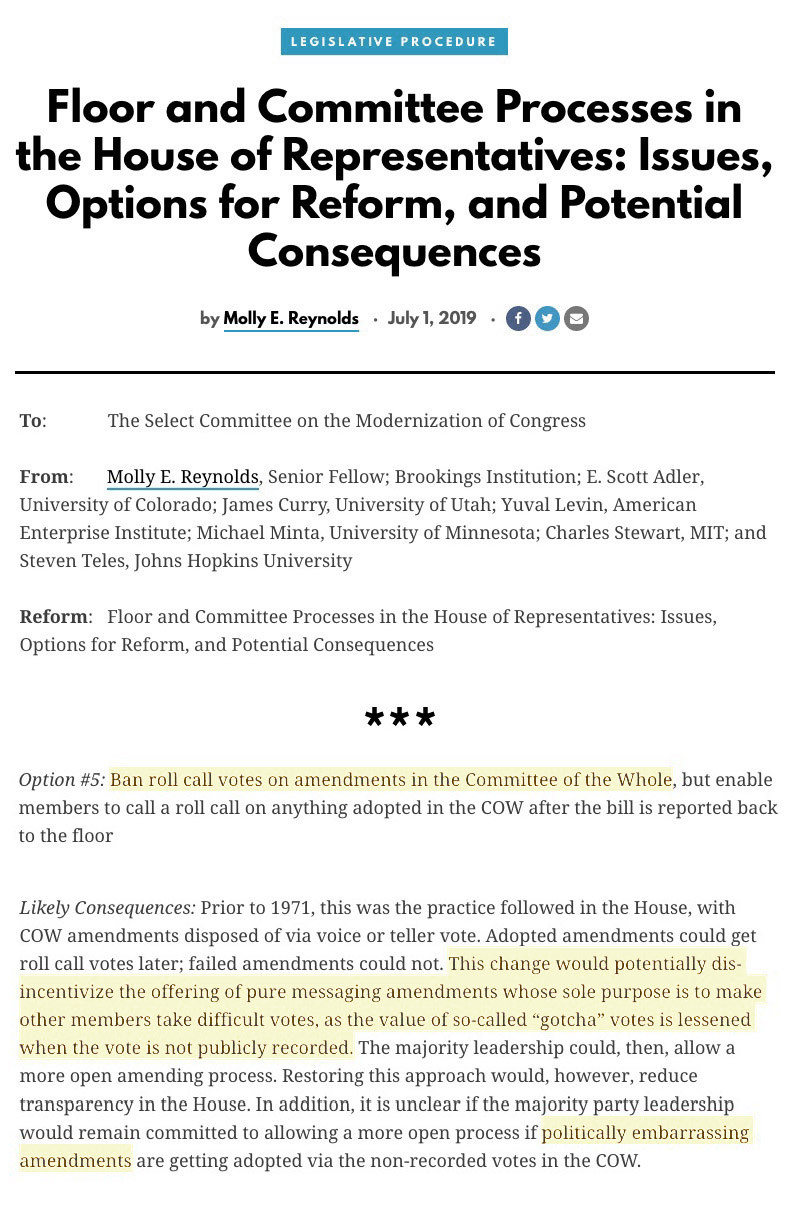
Molly Reynolds et al 2019
Proposal to Ban Roll Call Amendments in the Committee of the Whole
Option #5: Ban roll call votes on amendments in the Committee of the Whole, but enable members to call a roll call on anything adopted in the COW after the bill is reported back to the floor Likely Consequences: Prior to 1971, this was the practice followed in the House, with COW amendments disposed of via voice or teller vote. Adopted amendments could get roll call votes later; failed amendments could not. This change would potentially dis-incentivize the offering of pure messaging amendments whose sole purpose is to make other members take difficult votes, as the value of so-called “gotcha” votes is lessened when the vote is not publicly recorded. The majority leadership could, then, allow a more open amending process. Restoring this approach would, however, reduce transparency in the House. In addition, it is unclear if the majority party leadership would remain committed to allowing a more open process if politically embarrassing amendments are getting adopted via the non-recorded votes in the COW. --- From: Molly E. Reynolds, Senior Fellow; Brookings Institution; E. Scott Adler, University of Colorado; James Curry, University of Utah; Yuval Levin, American Enterprise Institute; Michael Minta, University of Minnesota; Charles Stewart, MIT; and Steven Teles, Johns Hopkins University

Molly Reynolds et al 2019
Proposal to Ban Roll Call Amendments in the Committee of the Whole
Option #5: Ban roll call votes on amendments in the Committee of the Whole, but enable members to call a roll call on anything adopted in the COW after the bill is reported back to the floor Likely Consequences: Prior to 1971, this was the practice followed in the House, with COW amendments disposed of via voice or teller vote. Adopted amendments could get roll call votes later; failed amendments could not. This change would potentially dis-incentivize the offering of pure messaging amendments whose sole purpose is to make other members take difficult votes, as the value of so-called “gotcha” votes is lessened when the vote is not publicly recorded. The majority leadership could, then, allow a more open amending process. Restoring this approach would, however, reduce transparency in the House. In addition, it is unclear if the majority party leadership would remain committed to allowing a more open process if politically embarrassing amendments are getting adopted via the non-recorded votes in the COW. --- From: Molly E. Reynolds, Senior Fellow; Brookings Institution; E. Scott Adler, University of Colorado; James Curry, University of Utah; Yuval Levin, American Enterprise Institute; Michael Minta, University of Minnesota; Charles Stewart, MIT; and Steven Teles, Johns Hopkins University
Furthermore, the secret ballot, normally employed in such cases, makes it impossible for any external observer to tell whether voting commitments are honored or not. Under circumstances such as these, the individual voter will make his voting decision in accordance with his own preferences on the single question posed.
In this model each voter indicates his preference, and the preference of the majority of the whole group is decisive. The defect in this procedure (a serious one that has already been mentioned in Chapter 9) is that it ignores the varying intensities of preference among the separate voters. A man who is passionately opposed to a given measure and a man who is slightly favorable but does not care greatly about it are given equal weight in the process of making final decisions. It seems obvious that both of these individuals could be made better off, in terms of their own expressed preferences, if the man strongly opposed should be permitted in some way to “trade” or exchange something with the relatively indifferent supporter of the proposed measure.
Applying the strict Pareto rules for determining whether one social situation represents an improvement over another, almost any system of voting that allows some such exchange to take place would be superior to that system which weights all preferences equally on each issue.James M. Buchanan & Gordon Tullock 1962
The Nobel Prize winning work on benefits of congressional vote buying
Since the time of Newt Gingrich’s speakership, wedge issues have been a significant part of partisan efforts to use House debates not just to advance legislative policy but to drive a wedge between a congressperson of the other party and his or her constituents by forcing votes on amendments on which the views of constituents and party leaders are at odds. Before the 1970s, votes on amendments were generally not recorded – House members voted by voice, by raising hands, or by walking down the center aisle to be counted. When small groups of members began to insist that votes on amendments, even those that reflected intentionally divisive wedge issues, be “on the record,” Congress became more transparent and its members became more accountable, but at the cost of turning the House into a battleground for partisan advantage. Mickey Edwards 2012
Parties Versus the People
As attractive as the notion may be that “sunshine is the best disinfectant” when it comes to politics, conducting negotiations in the open often leads to a hardening of partisan positions and a refusal to talk honestly about the political constraints affecting any deal. When done in the open and in view of a media likely to characterize negotiations as zero-sum, partisans feel compelled not to show any weakness. As a result, the entire give-and-take of a negotiation is likely to disintegrate into a game of chicken, as opponents view the process more as a way to win political points than to solve problems.Nathaniel Persily 2014
Solutions to Political Polarization in America
It is no secret that negotiations are best done in private. James Madison remembered that, in writing the Constitution [and] the same principles of successful negotiation hold more than two centuries later. Examples of the White House and Congress strategically engaging in quiet negotiations to produce important legislation include the Clean Air Act Amendments of 1990, the budget agreement of 1990, and the No Child Left Behind Act of 2001… Low-keyed, good-faith negotiations began shortly after the president submitted his FY 1998 budget, and senior White House officials held a series of private meetings with members of Congress. Unlike the political posturing in late 1995 and early 1996, neither side focused on moving the negotiations into the public arena.
Staying private made it easier for both sides to compromise, and they each gained from doing so. For Republicans, the budget agreement capped a balanced-budget and tax-cutting drive that had consumed them since they had taken over Congress in 1995. They won tax and spending cuts, a balanced budget in five years, and a plan to keep Medicare solvent for another decade. Thus, although they did not achieve a radical overhaul of entitlement programs, they did make substantial progress toward their core goals… The decision of President Clinton and the Republican congressional leaders to seize on the opportunity provided by the surging economy and the groundwork laid by the budgets of 1990 and 1993 and to quietly negotiate and compromise, letting everyone claim victory, made the budget agreement possible.George C. Edwards 2015
Staying Private - Solutions to Polarization (Climate, Persily)
The same principles of successful negotiation [via secrecy] hold more than two centuries later. Examples of the White House and Congress strategically engaging in quiet negotiations to produce important legislation include the Clean Air Act Amendments of 1990, the budget agreement of 1990, and the No Child Left Behind Act of 2001.George C. Edwards 2015
Staying Private - Solutions to Polarization (Climate, Persily)
This seemingly counterintuitive opinion — that outcomes would improve if the process is obscured — is catching on in Washington among political elites of both parties as a way of making a dysfunctional Congress work again. Zeke Miller 2013
Bring Back the Smoke Filled Room (Time Magazine)
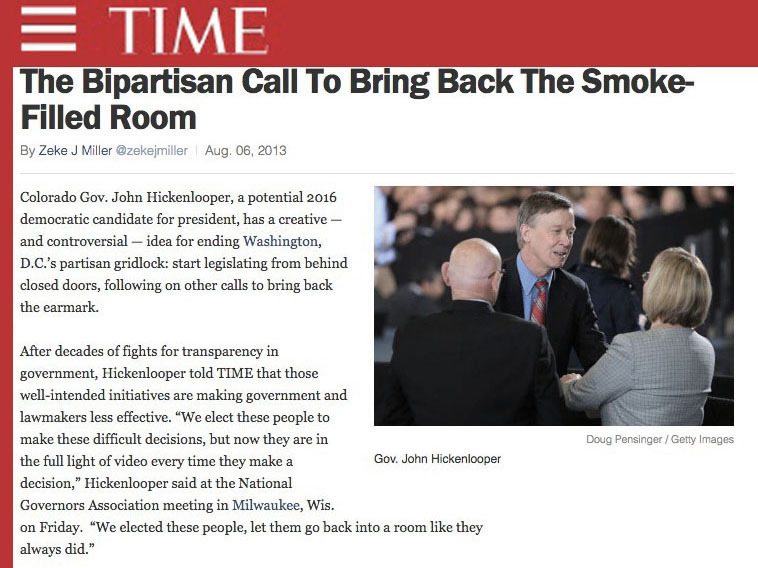
Zeke Miller – 2013 Bring Back the Smoke Filled Room

Zeke Miller – 2013 Bring Back the Smoke Filled Room
Common Cause simply has everything upside down when they advocate ‘sunshine’ laws. When we’re in the sunshine, as soon as we vote, every trade association in the country gets out their mailgrams and their phone calls in twelve hours, and complains about the members’ votes. But when we’re in the back room, the senators can vote their conscience. They vote for what they think is good for the country. Then they can go out to the lobbyists and say: “God, I fought for you. I did everything I could.”Sen. Robert Packwood 1988
Showdown at Gucci Gulch
Modern scholars have long regarded the change (to secret voting) as a democratic one, lessening the control of the upper classes over the electorate, and enhancing the voters’ effective freedom of choice.Alexander Yakobson 1995
The Secret Ballot and its Effects
Roll call votes can be a useful tool to examine certain aspects of legislative behavior. Scholars who choose to use roll call voting as the basis of their studies, however, must consider how electronic voting has changed member behavior. Prior to 1973, members were at the mercy of party leadership, the media, and their own observations when determining how other members were voting. Today, all a member has to do is look up at the display boards and see what color dot appears next to their colleague’s name. The increase in information available in real time to members has undoubtedly changed voting strategies.Jacob Straus 2012
The Rise of Roll Call Votes
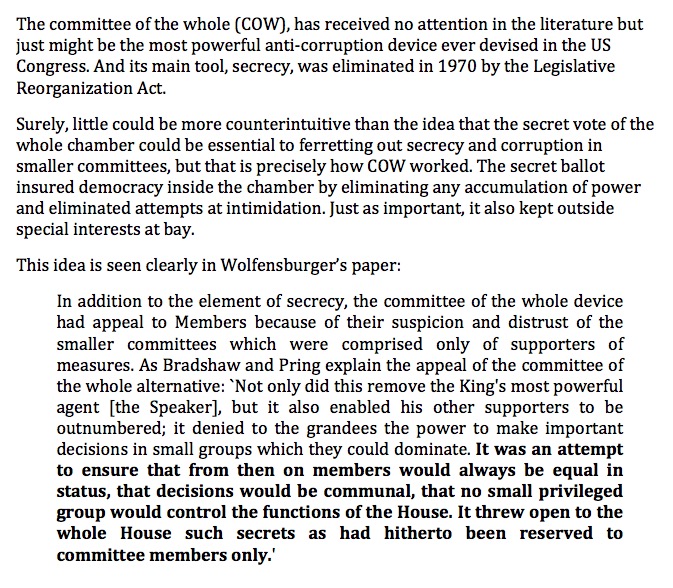
James D’Angelo 2016 – On Committee of the Whole

James D’Angelo 2016 – On Committee of the Whole
It is possible to have full transparency on the supply side of the equation and… much less than full transparency on the demand side.Albert Breton 2007
The Economics of Transparency in Politics
(This quote highlights a number of the ways for a congressman to ‘sell’ their vote for fame or fortune, all of them relying on transparent/public voting) Different congressmen pursue quite different goals – reelection, power and prestige in the House, the approval of the editorial writers of The New York Times, a good shot at a seat in the US Senate, the framing of policy in the national interest – but congressmen do have goals and try to use their votes on the floor of the House to enhance the probability of attaining them. A few ‘bad’ votes may not significantly alter the congressman’s chances for successful goal attainment, but the innate prudence of ambitious men dictates strenuous efforts to avoid mistakes and to calculate the consequences of their actions and votes as much as possible.Matthews & Stimson 1975
Yeas and Nays
If ‘more visibility [aka transparency]’ is displayed, as it is being displayed, as a universal panacea, it is likely to produce far more ills than it cures. To the extent that visibility hampers responsible behaviour, instigates image-selling and demagogy, intensifies conflicts, leads to decisional paralysis or, in international politics, to defeat, to the same extent external risks are best looked after by other means and ways of control. Let alone that the efficacy of a searchlight diminishes with its diffusion. Too much visibility, on too many things, drowns visibility.Giovanni Sartori 1975
Will Democracy Kill Democracy
We all know why some senators would want a secret ballot; plenty of Republican senators who privately can’t stand Trump and who would strongly prefer a President Pence would vote to remove Trump from office if they knew they wouldn’t face punishment in a subsequent GOP primary. In a 75-25 vote in favor of removal, all 53 Republican senators could insist they were among the “no” votes, with no official record to contradict them. (This might apply to relatively Trump-friendly red state Democratic senators like Joe Manchin, too.)Jim Geraghty 2019
A Secret Ballot for Impeachment
If there was a secret-ballot vote it [gun control] would pass overwhelmingly, because from a substantive point of view most of these senators understand that this is the right thing to do.Matt Bennett 2013
Washington Post - Firearm advocates target gun-control measures
Colorado Gov. John Hickenlooper, a potential 2016 democratic candidate for president, has a creative — and controversial — idea for ending Washington, D.C.’s partisan gridlock: start legislating from behind closed doors, following on other calls to bring back the earmark. After decades of fights for transparency in government, Hickenlooper told TIME that those well-intended initiatives are making government and lawmakers less effective. “We elect these people to make these difficult decisions, but now they are in the full light of video every time they make a decision,” Hickenlooper said at the National Governors Association meeting in Milwaukee, Wis. on Friday. “We elected these people, let them go back into a room like they always did.” One Republican governor in attendance endorsed the idea on the condition he not be named. This seemingly counterintuitive opinion — that outcomes would improve if the process is obscured — is catching on in Washington among political elites of both parties as a way of making a dysfunctional Congress work again.Zeke Miller 2013
The Bipartisan Call To Bring Back The Smoke-Filled Room
For instance, [secrecy] protects the freedom of the voter. Conversely, [transparency] distorts when it imposes ‘image selling’ to the detriment of ‘responsible behaviour’. Furthermore, [transparency] can well enhance, if not create, conflicts; so much so that ‘removal from [transparency]’ is the most usual way of lessening tensions. The latter two aspects can be illustrated by the actual proceedings of the Italian parliament, where most legislation is enacted by the parliamentary commissions and is possible only because these commissions are truly invisible committees.Giovanni Sartori 1975
Will Democracy Kill Democracy
Special interest groups often target lawmakers for their voting records.Nick Reynolds 2021
Gun bills playing outsized role
It is difficult, if not impossible, to isolate the effects of closing markup sessions. However, interviews with committee members suggest that the return to closed sessions may have reduced the influence of particular interests and clientele groups in committee decisionmaking and may have also encouraged members to take a broader view of the issues at stake in recent tax legislation.Randall Strahan 2011
The New Ways and Means
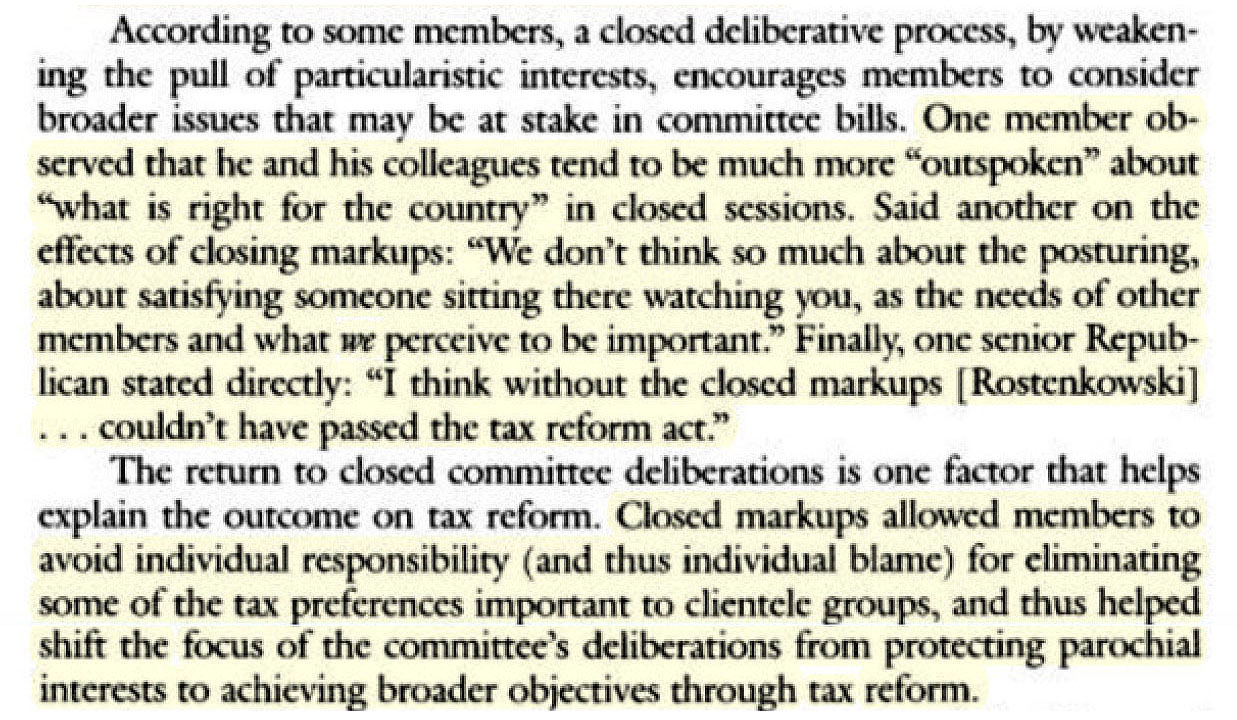
Randall Strahan 2011 – The New Ways and Means

Randall Strahan 2011 – The New Ways and Means
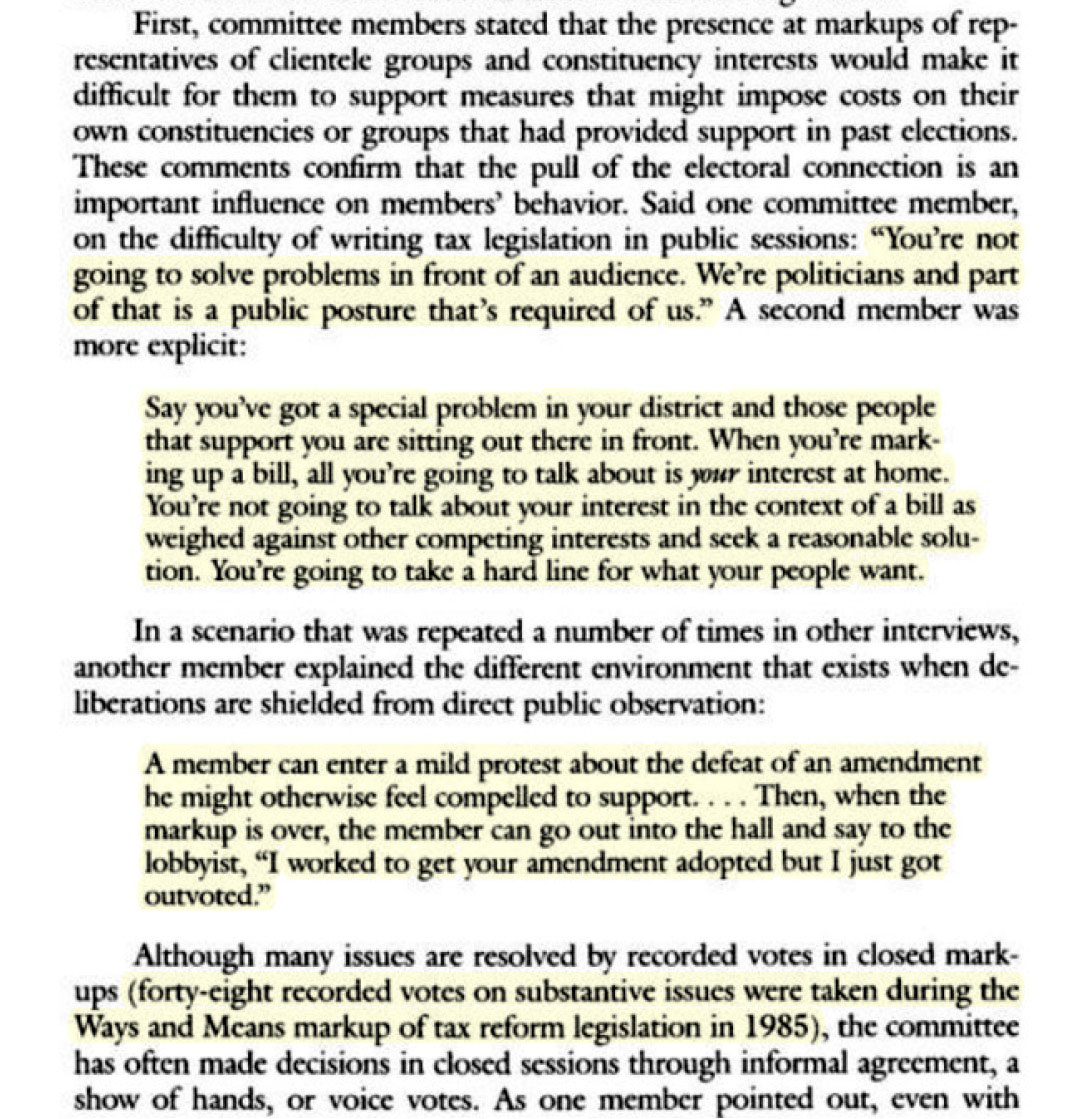
Randall Strahan 2011 – The New Ways and Means

Randall Strahan 2011 – The New Ways and Means
Transparency, unlike other forms of regulation, has a major disadvantage: it assumes that those who receive the information released by producers or public officials can properly process it and that their conclusions will lead them to reasonable action. However, the well-known and often-cited findings of behavioral economics demonstrate that very often the public is unable to properly process even rather simple information because of “wired in,” congenital, systematic cognitive biases.Amitai Etzioni 2014
Transparency is Overrated
The secrecy generally associated with nontraditional processes can facilitate lawmaking. Closed-door sessions have certain advantages over public meetings. For example, they enable Members to raise creative or “trial balloon” ideas without worry of public condemnation from partisan commentators for subverting party principles. A congressional aide said, “Regular order is too messy and it’s covered instantly in the media and it can create lawmaking problems,” such as the disintegration of Member support for a measure. In contrast, the presumption embedded in the “regular order” is the formal requirement for transparency during committee and floor proceedings. Consider that C-SPAN (the Cable Satellite Public Affairs Network) provides coverage of numerous committee sessions and virtually all floor (gavel to gavel) proceedings. Today’s 24/7 media environment is replete with journalists, analysts, and lobbyists who monitor and publicize Capitol Hill proceedings. Nearly 100 years ago, a House lawmaker made an observation about legislative secrecy that remains relevant to this day: “Behind closed doors compromise is possible; before spectators it is difficult.” Recall from history, the many compromises reached during closed door proceedings of the Constitutional Convention of 1787.Walter Oleszek 2020
The “Regular Order”: A Perspective
Given the Senate’s difficulty in creating conference committees, the two chambers turned to the exchange of amendment process to resolve their bicameral differences. This change has important consequences. For example, it strengthens the hand of the top House and Senate party leaders and places them in the “driver’s seat” in negotiating bicameral agreements. They meet in secret, along with other invited participants, to devise agreements acceptable to each chamber. Walter Oleszek 2020
The “Regular Order”: A Perspective
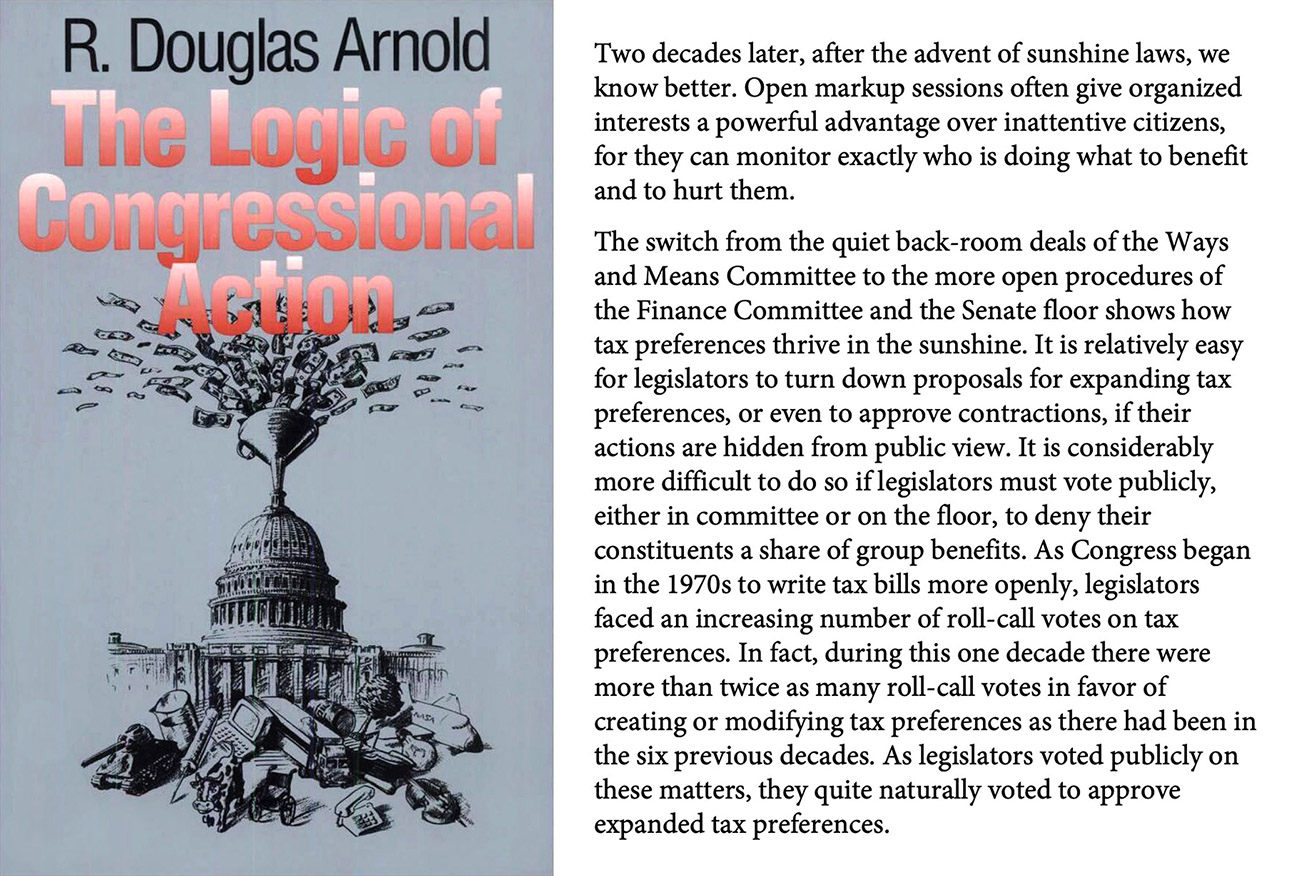
Douglas Arnold 1990 (Princeton) - Logic of Congressional Action
Text: Two decades later, after the advent of sunshine laws, we know better. Open markup sessions often give organized interests a powerful advantage over inattentive citizens, for they can monitor exactly who is doing what to benefit and to hurt them.

Douglas Arnold 1990 (Princeton) - Logic of Congressional Action
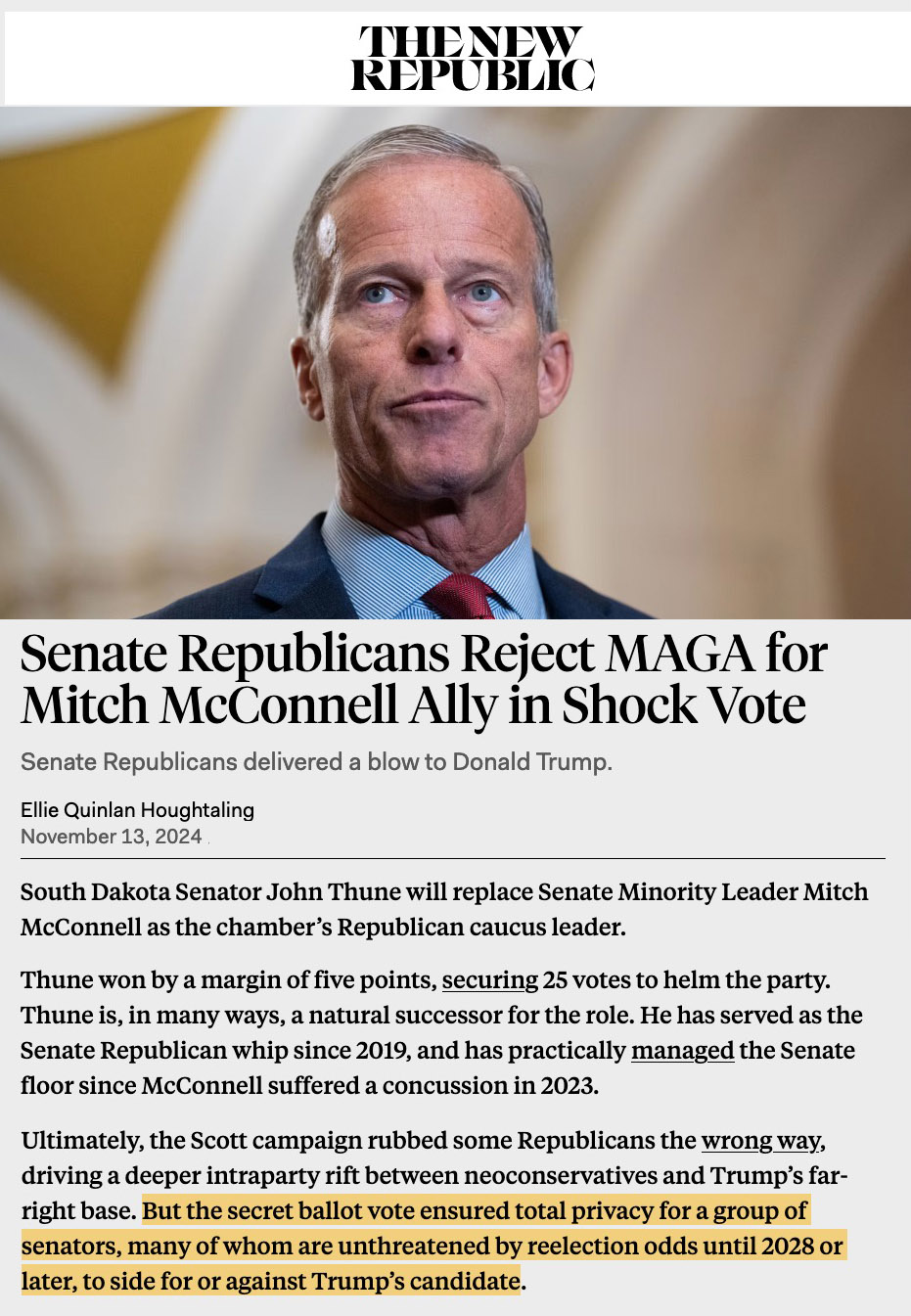
Ellie Quinlan Houghtaling 2024 - Senate Republicans delivered a blow to Donald Trump
Text: But the secret ballot vote ensured total privacy for a group of senators, many of whom are unthreatened by reelection odds until 2028 or later, to side for or against (in this case against) Trump’s candidate.<

Ellie Quinlan Houghtaling 2024 - Senate Republicans delivered a blow to Donald Trump
There is, moreover, another way in which the changes of recent years have jeopardized deliberation within Congress. Congressmen are now much more accountable for their actions. There is less they can do in secret. Nearly all committee markup sessions and conference committee meetings are now open to public scrutiny. Votes within committees must be recorded in ways not required a decade ago. The institution of the recorded teller vote on the House floor has reduced the likelihood that important decisions will be made without a record of each congressman’s vote. Largely overlooked, however, in this drive for accountability has been the effect on deliberation. Reasoning on the merits of public policy is not the same thing as registering constituent opinion at each stage of the legislative process. Deliberation requires both some measure of independent judgment by the legislator and a degree of flexibility in the decision-making process that allows for evolving opinion and changes of mind. This is particularly difficult if the public is looking over the legislator’s shoulder at each step in the process. Joseph Bessette 1982
Is Congress A Deliberative Body?
In reality, transparency allows interest groups with different constituencies across the Atlantic to create transnational alliances and dominate the negotiating process.Fernanda Nicola 2015
The Paradox of Transparency
The recent claims towards greater transparency in the EU are the result of pressures by businesses not being able to access initial drafts of legislation made by the EU Commission and presented to the Parliament and Council under the primary legislative procedure. In addition, US industry argued they were unable to make comments on secondary regulation, and received individual feedback through obscure regulatory processes in Brussels. More interestingly, this participatory limitation has been portrayed as a lack of transparency rather than an attempt to limit the influence of lobbies in Brussels.Fernanda Nicola 2015
The Paradox of Transparency
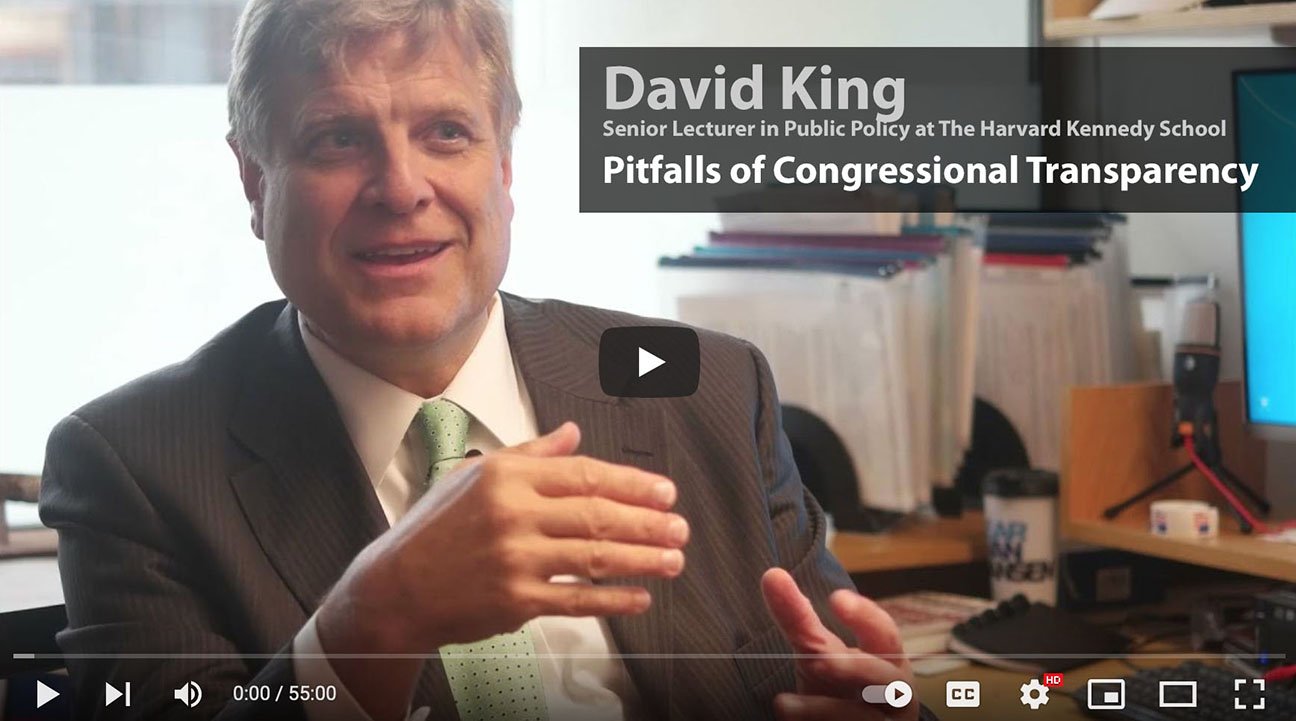
David King (Harvard) 2019 - Pitfalls of Congressional Transparency
Text: If we go back to the world before the 1970 Act, amendments weren't publicly shown. You could vote on an amendment, and no one would know what side you were on. And that's because amendments were explicitly for negotiations. It was to try and come up with a compromise. The point of an amendment was to advance a compromise, period. We could see how people voted on final passage, but the whole idea of an amendment changed when it became weaponized. When transparency becomes weaponized, when you can now display to the folks back home, display to the lobbyists, display to your party leadership, display to somebody who might challenge you in a primary or a general election. We can use an amendment strategically, not to build compromise, but to advance your personal, your financial, your lobbyist interests. Weaponizing transparency destroyed the art of compromise.

David King (Harvard) 2019 - Pitfalls of Congressional Transparency
Among politicians and policy-makers it is almost universally assumed that more transparency in government is better. Until now, philosophers have almost completely ignored the topic of transparency, and when it is discussed there seems to be an assumption (shared with politicians and policy-makers) that increased transparency is a good thing, which results in no serious attempt to justify it. In this book Brian Kogelmann shows that the standard narrative is false and that many arguments in defence of transparency are weak. He offers a comprehensive philosophical analysis of transparency in government, examining both abstract normative defences of transparency, and transparency's role in the theory of institutional design. His book shows that even when the arguments in favour of transparency are compelling, the costs associated with it are just as forceful as the original arguments themselves, and that strong arguments can be made in defence of more opaque institutions.Brian Kogelmann 2021
Secret Government: The Pathologies of Publicity
Visible legislative operations, for example, have had repercussions that some observers find disturbing. For one thing, there is little if any persuasive evidence that citizens, in fact, do pay greater attention to Congress. For another, with committee proceedings and voting now matters of public record, lawmakers can no longer hide behind closed doors and unrecorded votes; they must act in the open. With constituents and campaign contributors watching, they must take care to protect their electoral flanks. As single-issue groups and PACs become more numerous and more forceful, sitting legislators may be less willing to risk offending any potentially decisive electoral force. Prudence dictates caution, and lawmakers may feel obliged to resist party or presidential calls for support. Where previously members could help out undetected, in the quiet of the committee room or on a standing or teller vote on the floor, at present there are dangers in doing so. The observer, more likely a group than a citizen, has greater influence in the more public setting of contemporary congressional politics. Members may be loath to act at all, preferring to entrench themselves electorally by being ombudsmen, by claiming credit for serving the district, or by limiting their policy making to “position taking,” choosing sides on substantive questions only when it is safe to do so or obfuscating their stands to minimize the risk of being caught on the wrong side of a policy issue that turns out to be controversial.Leroy N. Rieselbach 1982
Is Congress A Deliberative Body?
A variety of post-Watergate reforms opened most congressional committee meetings to the public, while also increasing the power of subcommittees. As the power that once was concentrated in each party's leadership became more diffuse, opportunities to directly lobby more members increased. Many new lobbyist groups were created, and others became even more powerful.Chuck McCutcheon 2014
Regulating Lobbying
There is no reason to think that the information emanating from the political environment will be unbiased or naturally lead members to support Pareto-improving reforms.Sarah Binder 2006
Governing in a Polarized Age
Simply making information available is not sufficient to achieve transparency. Large amounts of raw information in the public domain may breed opacity rather than transparency.Transparency Initiative 2016
website
And perhaps most important, the partisan character of amending activity changed suddenly with the advent of recorded electronic voting. With new voting procedures in the 1970s, [the minority party] could force [the majority party] to go on the record, often repeatedly, on divisive amendments. [The minority] actively sought ways to challenge committee products, raise ideologically charged issues, and force recorded votes… in order to compel [the majority] to take politically dangerous public positions. The effect, quite naturally, was to heighten the personal and partisan conflict on the floor.Steven Smith 1989
Call to Order
After a few experiments with open conferences in 1974, the House and Senate adopted identical rules requiring conference meetings to be open to the public…The House went a step further in 1977 when it required that the House itself must approve a motion to close a conference’s meetings…As a result, members, lobbyists, journalists, and others may observe most formal sessions of most conferences.Steven Smith 1989
Call to Order
The budget resolution was the first bill of genuinely national import to come to the floor after the cameras were turned on. To Speaker O’Neill’s chagrin, the resolution faced forty-one first- and second-degree amendments and the debate stretched over three weeks, setting records for budget resolution debates in the House. O’Neill attributed the multitude of amendments to the presence of television cameras. There is little doubt that several amendments were offered for symbolic purposes… The effects on amending activity of televised sessions, which began in March 1979, were never given a chance to materialize fully. Beginning in late 1979, the shift to more restrictive special rules for major bills prevented the members from fully exploiting the opportunities created by House television.Steven Smith 1989
Call to OrderNote: Smith claims, and it seems evident, that the massive rise of restrictive special rules and closed rules (two dangerous and anti-democratic turns of the mid-late 1970s) were driven by the rise of 1970 transparency.
On many vital issues, such as civil rights, policy outcomes were controlled by a conservative majority or at least a sizable obstructionist conservative minority. The conservative coalition also controlled decisions on several key committees and so was in a position to block committee action on legislation important to many Democratic liberals. Norms of committee deference and apprenticeship served to reinforce the power of the conservative oligarchy. For his part, [Lyndon B.] Johnson attempted to avoid open intraparty splits by refusing to bring up highly divisive legislation to the floor until he had the votes, and even then he worked to avoid amendments and recorded votes on which party factionalism would surface. Thus, much to the dismay of some liberal Democrats, Johnson’s deliberate strategy reduced the number of controversial bills brought to the floor, the number of filibusters, and the volume of amending activity.Steven Smith 1989
Call to OrderNote: What Smith is saying here, is that even before the Legislative Reorganization Act of 1970 there was a conscious effort by some to avoid divisive roll call votes. And so, to pass the civil rights bills and avoid partisan pressures, Johnson increased the level of secrecy.
But anonymous publication has been an essential feature of American democracy since its beginning. It has long allowed vulnerable voices to participate in public politics and speak truth to power. Indeed, anonymous debate was at the center of the revolutionary politics that led to American independence, the U.S. Constitution and the Bill of Rights, which enshrined the press freedoms that continue to protect anonymous speech today. In the late 18th century, pseudonyms and anonymous sources filled the pages of newspapers. In fact, some of the most prominent Founding Fathers regularly used the shield of pseudonyms in political essays during the era of the American Revolution: Thomas Paine, John Dickinson, Alexander Hamilton, Arthur Lee, John Jay, Benjamin Franklin, Thomas Jefferson and James Madison. Influential texts such as “Common Sense,” the Federalist essays and the “Letters from a Farmer in Pennsylvania” essays were all published without an author's byline.Jordan E. Taylor 2018
Anonymous criticism helped make America greatNote: Madison and Hamilton wrote the Constitution, Federalist Papers, Bill of Rights and even their nullification acts under the shelter of anonymity
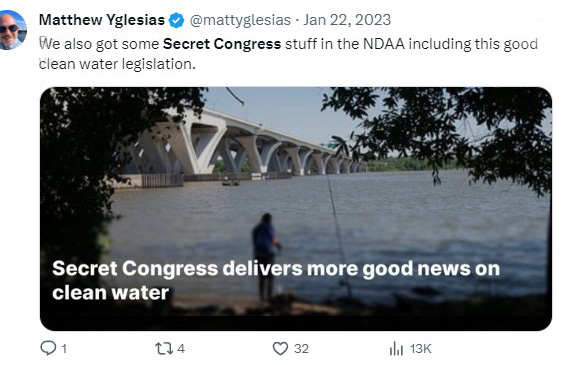
Matthew Yglesias 2023 Secret Congress Delivers More Good News on Clean Water
Note: Climate legislation of both the IRA (Inflation Reduction Act) and NDAA (National Defense Authorization Act) had high levels of secrecy to prevent lobbying - even from foreign governments, etc - and to prevent the standard political backlash for any publicly announced environmental legislation.

Matthew Yglesias 2023 Secret Congress Delivers More Good News on Clean Water
All Congress used to be “secret.” When a piece of legislation receives a lot of coverage, that coverage is likely to be tilted in a negative direction. It’s simply not possible to have a bill that makes any kind of meaningful changes that doesn’t generate some complaints — either from people who don’t like the changes or else from people who think the changes don’t go far enough...the main thing to remember is that in the pre-internet era, Secret Congress was the norm — there just wasn’t that much national news coverage (22 minutes per night on network television), and a lot of that coverage wasn’t political. People got their information through locally focused outlets that mostly weren’t in very competitive markets, so you’d get stories about interesting scandals but not a lot of gripping white-knuckle coverage of actual legislation. That didn’t mean members would always reach agreements on things, but it did mean that if they wanted to reach an agreement, they could do so in relative obscurity and then announce it to the world...The news flow you’re exposed to is very disproportionately negative, both because negative stories are more likely to be written but also because the people who you follow on social media are more likely to share them, and also because you yourself are frankly more likely to click on them.Matthew Yglesias 2022
Secret Congress delivers more good news on clean waterNote: Yglesias is oddly missing a lot of historical context on the benefits of secrecy. So he kind of gets it, but without all the proper backdrop, he is missing the full power of his ideas. James D'Angelo respond to him, addressing some of this issue, here in this tweet. Secrecy appears to be essential to climate and environmental legislation.
As one author noted in 1764, if essayists were forced to print their names, “The Cause of Liberty would often be left to suffer” because they would have made themselves vulnerable to the “Clamour of Party, or the Resentment of Power.” This applied to many of those who argued against the ratification of the Constitution in 1787 and 1788 and against Publius. Despite pressure to reveal their names, they used pseudonyms to protect themselves. In that polarized climate, more than one writer suggested that it was “unsafe to be known to oppose” the proposed Constitution, so true anonymity was necessary to participate in politics.Jordan E. Taylor 2018
Anonymous criticism helped make America greatNote: Madison and Hamilton wrote the Constitution, Federalist Papers, Bill of Rights and even their nullification acts under the shelter of anonymity
In the post-Watergate atmosphere, almost no congressman wanted to go on record as opposing open decision making in the federal government. A vote against government in the sunshine could become a centerpiece of a challenger’s campaign in 1976. [And] a vote against sunshine laws would lead to… hostile newspaper and television editorials. The media, by its very nature, is strongly supportive of open meetings in government. Thus, almost all members of Congress voted for sunshine bills, which passed 86-0 in the Senate in November 1975 and 390-5 in the House in July 1976.Andrew S. McFarland 1984
Lobbying in the Public Interest (Common Cause)
It is difficult to demonstrate with hard data that taking a position in favor of a reform measure sponsored by Common Cause tended in the 1970s to impress favorably many more voters than it repelled. Perhaps it is more precise to say that opposing a measure such as the regulation of lobbyists or an ethics code for congressional officials would be a vote difficult to explain to voters in many congressional districts. My hypothesis is that on some measures advocated by Common Cause, a member of Congress would fear to go on public record in opposition because such a vote might be criticized by electoral opponents in forthcoming campaigns. Such a hypothesis is needed to explain the behavior of members of Congress in regard to the bill to regulate lobbyists, for example. Versions of this legislation passed both the House and the Senate in nearly unanimous floor votes in 1976, although the legislation failed when a conference committee was unable to agree on a joint version of the legislation before the 94th Congress adjourned. From the floor votes, one might suppose that regulation of lobbyists was a measure enthusiastically supported by members of both Houses. In fact, one prominent member of the House told me that many representatives did not want the legislation to pass. And this group got their way. Accordingly, one can observe a difference between the public behavior of some members of Congress (voting for the measure) and their private behavior (hoping that the measure would fail). My inference is that such members are (1) concerned about their reelection and (2) believe that a vote against certain reform measures will hurt their electoral chances. This inference is congruent with the view of Congress put forth in such works as Mayhew’s Congress: The Electoral Connection and Richard Fenno’s Home Style: House Members in Their Districts (Boston: Little, Brown, 1978).Andrew S. McFarland 1984
Lobbying in the Public Interest (Common Cause)
If reverse FOIA effectively shrinks the Act’s disclosure mandate in an industryprotective manner, a late-1990s revision expands it toward the same end. The Shelby Amendment (named after its Senate sponsor) provides that FOIA requesters may access “all data produced” by private entities that receive federal research grants – but only when those entities are universities and other nonprofits, not when they are similarly situated for-profit firms. Scholars have suggested that the goal of this amendment, which was championed by the tobacco lobby and the Chamber of Commerce, was to hamstring the EPA by letting critics inspect environmental “scientists’ work down to the smallest detail, giving them myriad new opportunities to discredit studies’ assumptions, methods of analysis, and conclusions, fairly or not.”David Pozen 2017
Freedom of Information Beyond the Freedom of Information Act (Climate)
Congress’s refusal to discriminate among different classes of FOIA requesters except at the margins is not as “egalitarian” as it appears, but rather tilts the production of information toward business interests. And Congress’s refusal to modify the FOIA entitlement has led to a steady decay in its worth to everyone else...FOIA can also make it more difficult for agencies to work with private parties on a cooperative basis. As the initial version of the Act began to move through Congress, some agencies complained that it would increase their contracting and procurement costs by revealing what they were willing to accept or expend in contract negotiations and other transactions.David Pozen 2017
Freedom of Information Beyond the Freedom of Information Act
Obfuscation is thus compatible with omitting information, transmitting information beyond the possibility of using it or, clearly, transmitting false information.Giorgio Brosio 2007
Cases For and Against Transparency/Obfuscation in Intergovernmental Relations
Congress can now be monitored and influenced as never before. As a result, lobbies, which do most of the monitoring and influencing, have gained power compared with the target of their efforts – the government.Zakaria 2003
Future of Freedom
The theory was that many lobby groups would profit from open sessions and votes… “We got a big lobby effort going,” Conlon said “But it is what you would call a ‘public interest lobby.’ They understand that this bill, with our revisions, is really going to revolutionize this place”… “Now just one minute,” interjected peppery Wayne Hays (D.Ohio). “If you want to write up a bill with a lobbyist sitting at every Member’s elbow, some of you… are going to have a rude awakening” Bibby & Davidson 1972
On Capitol HillNote: Richard Conlon was a principal 1970 advocate of congressional transparency, and it was he (along with the support of lobbyists) who focused the push for the 1970 Legislative Reorganization Act (LRA) and its amendments focusing on increased transparency of lawmaker’s votes.
The view is widespread that more transparency in institutions leads to better outcomes. That, however, is surely too enthusiastic a view. To illustrate, a sine qua non of popular democracy is the secret ballot — the suppression of transparency. To appreciate one of the central virtues of secret balloting, consider the fact that in a number of organizations, the leadership, for obvious reasons, insists that the preferences and opinions of the rank and file be revealed through a hand count instead of a secret ballot. Transparency, in that case, is a way of controlling the membership.Albert Breton 2007
The Economics of Transparency in Politics
Whatever happened to the Class of 1974? That was the 75 freshman Democrats elected to the House of Representatives in the post-Watergate era. They helped to weaken the time-honored seniority system in Congress, and generally fostered a climate that has resulted in a less authoritarian, more open, legislative process. Many of those 1974 freshmen are still here, having acquired a few gray hairs and several years of seniority. And now, several of the young Turks of yester-year are beginning to wonder if the processes of the House have become too open to the point of near-chaos. Louis Peck 1979
‘Inviting anarchy’ into the House
Many African countries have recently adopted legislation on accessing government information in order to attract foreign direct investment (Azubuike 2008, pp. 89–92).Tero Erkkila 2012
Paradoxes and Unintended Consequences of Transparency
Sunshine rules, which open once-secret meetings to public scrutiny, were mentioned - although substantially less frequently - by our respondents as having similar effects: creating new opportunities for influence [lobbying and pressure groups]… Kay Lehman Schlozman & John T. Tierney 1983
More of the Same: Pressure Group Activity
In a teller vote representatives file quickly past two tellers and vote “aye” or “nay,” without any record of who voted which way. The device originated in the British House of Commons and has been used on this side of the Atlantic from the early days of the Republic. It is used only on amendments and only when the House is sitting as a Committee of the Whole. But the House almost always sits as a Committee of the Whole for serious consideration of legislation, and so the most significant votes have often been cast in unrecorded teller votes. The technique has been attractive because it is quick and simple and allows members to vote without worrying about public repercussions.John Bibby & Roger Davidson 1972
On Capitol Hill
There are cases in which all the information about a policy is freely available to all, and even fully reported in the media, and, nonetheless, the policy smacks of opacity – or, rather here, of obfuscation. Obfuscation works, not by hiding anything, but in the way the policy and especially its objectives are formulated or framed.Salmoon & Wolfelsperger 2007 The Economics of Transparency in Politics
While it is frustrating to stand outside the committee room trying to guess what is going on inside, he thinks everyone benefits in the long run. ‘In a public session there are so many different interest groups eyeballing the congressmen that they’re so torn they end up doing something nonsensical… that’s how we got where we are.’Harold Scoggins Jr. – Lobbyist for the Oil Industry
Fessler – Rewriting Tax Code (CQ Quarterly 1985)
It’s a real dilemma for liberal reformers. When you look at recent tax bills, the best ones have come out of closed sessions. You take what you can get and hope someday you can get a good bill at an open meeting.Jeff Drumtra – Ralph Nader representative
Fessler – Rewriting Tax Code (CQ Quarterly 1985)
The Constitution makes clear that the Senate may convict an impeached president with the “concurrence of two-thirds of the Members present.” But it is silent as to the exact procedure that the Senate should follow at the trial’s end to determine whether two-thirds concur. Ideally, the Senate should abandon the public, roll-call procedure that it adopted in 1868 for President Andrew Johnson’s trial and instead require the senators to vote anonymously at trial’s end to acquit or convict. The idea might seem anachronistic in the age of C-SPAN and sunshine laws, but it is well in line with the principle that “the arguments and votes of jurors… are secrets, protected from disclosure unless the privilege is waived,” a notion that the Supreme Court once called an “immemorial tradition.” The good thinking behind this tradition is the desire for verdicts that are uninfluenced by bribery, harassment and blackmail. Of course, the risk of improper influence is especially great when the president is on trial, as President Andrew Johnson’s impeachment trial demonstrated. The Johnson administration bribed senators in backroom dealings with the promise of appointing a secretary of war of their liking. Johnson’s opponents pressured the senators with threats ranging from political ostracism to assassination. In the end, Johnson’s opponents made good on at least one threat: None of the Republicans who voted for acquittal was ever re-elected to the Senate. Who doubts that the pressures are less severe in 1999? Some argue that such pressures are appropriate because the process is political by design. After all, the delegates to the Constitutional Convention chose the Senate rather than the Supreme Court as the trier of presidential impeachments. This view of history mistakenly assumes that today’s Senate is the same Senate that the framers envisioned. It is not, and the record of the debate on September 8, 1787, makes that clear. The delegates who favored the Senate as the place of trial thought the Supreme Court would be more biased and corruptible than the Senate. Today most Americans would say that those delegates got it backwards, but that viewpoint says more about how much the Senate has changed than it says about the framers’ wisdom. When the framers chose the Senate to be the trier of presidential impeachments, they did not expect senators to be popularly elected, they did not foresee the ascendance of powerful political parties, and they may well have expected secrecy to be the norm in the Senate, as it was during its first six years. Anonymous voting by legislatures is hardly unprecedented. Parliaments in many countries vote anonymously for the unseating of a member. In our own country, when no presidential candidate received a majority of the votes in 1800 and 1824, the House of Representatives voted by secret ballot to elect our president (and thus we got Presidents Thomas Jefferson and John Quincy Adams). The real question at this juncture is whether the Senate has the political will to shield the senators from public opinion, an act which might appear undemocratic. Alexander Hamilton didn’t see it that way. Writing in Federalist Paper No. 65, Hamilton suggested that in impeachment matters, the House of Representatives would represent public opinion, but the Senate trial would be independent of and insulated from public opinion. Hamilton’s view makes sense even today if we remember the basic civics lesson about the Senate. Because each state has two votes, the Senate by design does not accurately reflect national public opinion. Instead, it favors public opinion in small states. In legislative matters, this is not so troubling because the vast power that small states wield in the Senate is checked by the House of Representatives and the President’s veto. But in an impeachment trial, the verdict of the senators is final, so a public, on-the-record vote would not subject the senators to national public opinion so much as it would implement the will of public opinion in the smaller states, unchecked by a more representative body. As a rule, I strongly believe that accountability means better government. In the exceptional case of a Senate impeachment trial, however, accountability doesn’t accomplish the good that it normally does. The reason is simple: the fact that a public Senate vote will favor opinion in the small states unchecked by proportionally representative institutions means that an on-the-record vote may well produce a result inconsistent with national public opinion and the national interest. Indeed, as it stands now, public opinion in Maine, Rhode Island and Vermont will have three times the influence over the president’s fate as public opinion in New York, even though New York has six times the combined population of those states. In the most extreme case, if the only Americans who favored conviction were a slim majority of citizens in the 34 least populous states, and those states’ senators voted the will of those majorities, then the President would be expelled at the behest of 16 percent of Americans, with 84 percent of Americans supporting acquittal! The question we ought to ask is not whether the Senate should be accountable, but whether the Senate vote will better reflect the national interest fairly and justly in an open environment or in a closed environment. It just might turn out that a public Senate vote will produce a verdict inconsistent with the national interest. That is exactly what the nationally-minded Alexander Hamilton had in mind when he defended the Senate as the trier of presidential impeachments in Federalist Paper No. 65: a body that would be less accountable to public opinion in the several states. With the changes in the Senate since its inception in 1787, the best way to accomplish that is through secret ballot. Steve Tidrick 1999 (Harvard Law)
Senate Should Vote in SecretNote: A number of people speculate about whether Article I, Section 5 permits a secret ballot vote in Congress, and if so for how long. Well, surprisingly the constitutional text, though dated, is fairly clear and wildly permissive of secrecy. Article I states (in its entirety): Each House shall keep a journal of its proceedings, and from time to time publish the same, excepting such parts as may in their judgment require secrecy; and the yeas and nays of the Members of either House on any question, shall, at the desire of one fifth of those present be entered on the journal. ------ The final phrase is key in that it calls for the printing of the yeas and the nays - which in the Framers’ time was not a printing of the names of the members who voted and their votes, but instead just the final counts – how many people voted for each side. So while this clause requires that the votes shall be printed, it does not require names to be attached to each vote. Further the first phrase allows for Congress to hold the Journal until they decide to publish it, which even the Framers’ day and age could mean up to fifty years of delay (as in the case of Madison publishing the notes of the 1787 convention in 1826.
“We ought to be willing to look the lobbyists in the eyes and make those decisions right out there in public.’” But: “‘In at least some circumstances, you probably get better legislation from closed sessions. Clearly in the type of atmosphere we worked in recently we had to enact some tax provisions that people don’t like, and I think it’s easier to do that in closed session.’ ‘With a closed mark up you can always say to lobbyists or constituents that you fought like a tiger for their position and asked for a record vote, but not enough members raised their hands. Members almost feel obligated to demand a record vote in public, and then you have members voting in a way they don’t really want.’ Fessler 1985
Rewriting Tax Code Behind Closed Doors
It is not hard to imagine what happened: The substantive conversations that were once held in the House and Senate chambers were moved to the cloakrooms, or at least to private deliberations held away from C-SPAN’s cameras. At one point the franker debates were still held in committee hearings – though eventually even many of those were put on C-SPAN as well. The real negotiations began to be held in leadership offices. Rather than expand access to decision-making to a wider range of viewers, C-SPAN has in fact done the opposite: It has inadvertently pushed real deliberation further into the shadows by centralizing power among a smaller group of leaders.Jason Grumet 2014
The Dark Side of Sunlight (City of Rivals)
Even if we wanted to compromise, the question was how. Budget negotiations could not take place in the normal legislative process, not with the television cameras on, not with every proposal subject to attack. The negotiations had to be secret, giving the President and Congress a chance to hammer out an agreement before the interest groups could move. It had to be outside normal procedures.Paul Light 1985
Artful Work: The Politics of Social Security Reform
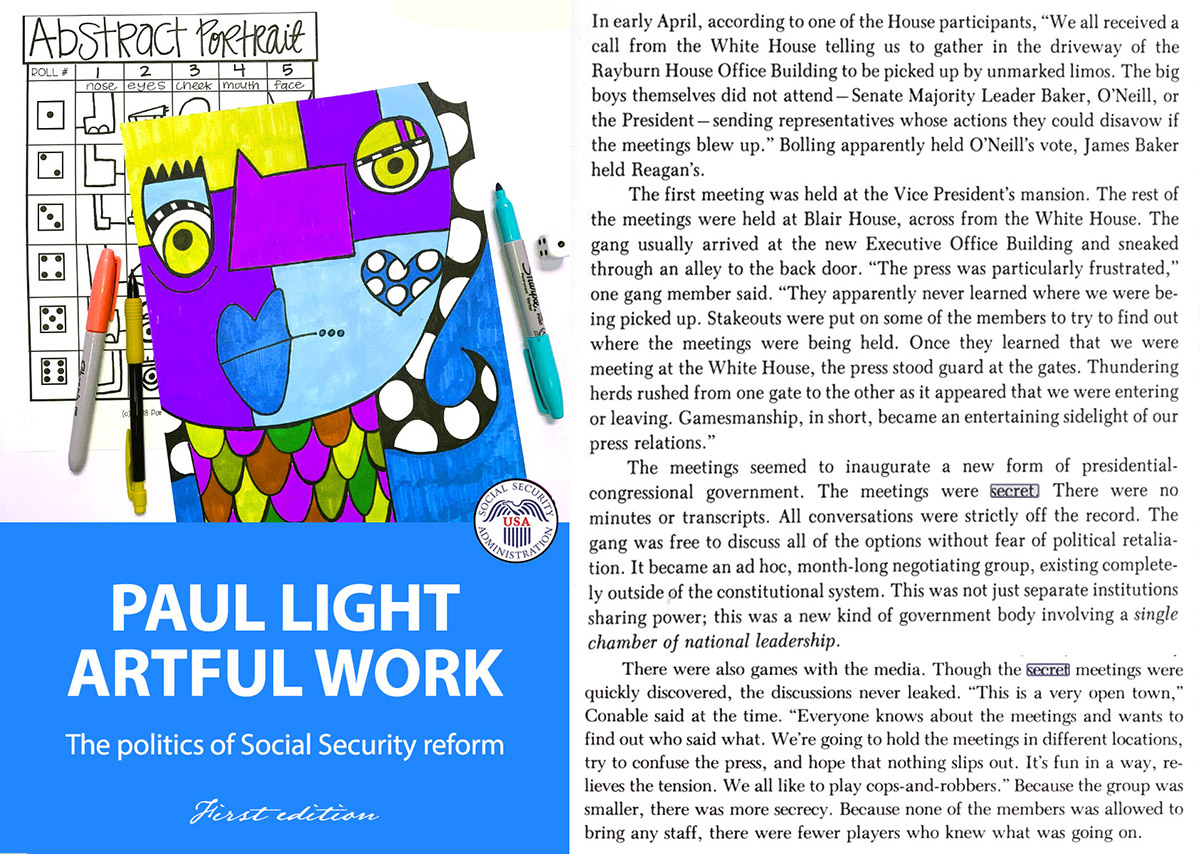
Paul Light 1985 - Artful Work
Text: In early April, according to one of the House participants, “We all received a call from the White House telling us to gather in the driveway of the Rayburn House Office Building to be picked up by unmarked limos. The big boys themselves did not attend - Senate Majority Leader Baker, O’Neill, or the President - sending representatives whose actions they could disavow if the meetings blew up.” Bolling apparently held O’Neill’s vote, James Baker held Reagan’s. The first meeting was held at the Vice President’s mansion. The rest of the meetings were held at Blair House, across from the White House. The gang usually arrived at the new Executive Office Building and sneaked through an alley to the back door. “The press was particularly frustrated,” one gang member said. “They apparently never learned where we were being picked up. Stakeouts were put on some of the members to try to find out where the meetings were being held. Once they learned that we were meeting at the White House, the press stood guard at the gates. Thundering herds rushed from one gate to the other as it appeared that we were entering or leaving. Gamesmanship, in short, became an entertaining sidelight of our press relations.” The meetings seemed to inaugurate a new form of presidential congressional government. The meetings were secret. There were no minutes or transcripts. All conversations were strictly off the record. The gang was free to discuss all of the options without fear of political retaliation. It became an ad hoc, month-long negotiating group, existing completely outside of the constitutional system. This was not just separate institutions sharing power; this was a new kind of government body involving a single chamber of national leadership. There were also games with the media. Though the secret meetings were quickly discovered, the discussions never leaked. “This is a very open town,” Conable said at the time. “Everyone knows about the meetings and wants to find out who said what. We’re going to hold the meetings in different locations, try to confuse the press, and hope that nothing slips out. It’s fun in a way, relieves the tension. We all like to play cops-and-robbers.” Because the group was smaller, there was more secrecy. Because none of the members was allowed to bring any staff, there were fewer players who knew what was going on.

Paul Light 1985 - Artful Work
Moreover, with every word on the record, it is more difficult to sit down and negotiate on most issues. As one reaction to Watergate and the Vietnam War, Congress opened many of its once secret hiding places. By bringing “sunshine” into the legislative process, many reformers hoped to make Congress more accountable. There would be no more smoke-filled rooms. The only problem was that Congress and the President still needed an occasional hiding place, particularly on dedistributive issues. Sunshine was a noble goal, generating greater public access, but it also put Congress on the spot. It was diificult to vote for spending cuts or tax increases with every interest group watching. Paul Light 1995
Still Artful Work: The Continuing Politics of Social Security Reform
Following a decade of reform. Congress must now work in the sunshine. As Congress opened its workings to the public and interest groups, the smoke-filled rooms began to disappear. Unfortunately, so did many of the closed rooms that are so important to legislative action. Under the hot lights of television, with every word in a transcript and every vote on the record, members of Congress became less willing to take a stand on painful issues. And with so many open meetings, leaders had fewer chances to sit down and talk. No one wanted to make the first move, especially if it might become an issue in the next campaign.Paul Light 1995
Still Artful Work: The Continuing Politics of Social Security Reform
In many respects, conference committees were the very first secret negotiating groups in American history. They were not mentioned in the Constitution but quickly became the central tool for resolving House-Senate differences. Because conference committees were originally closed to all but a handful of members, they also became a device for stopping important bills and making secret deals. Though conference committees were opened to the public in 1974, they still provided rare opportunities for private negotiation. They still had closed-door caucuses and back-room meetings. At least for social security in the early 1980s, conferences offered some protection from the sunshine.Paul Light 1995
Still Artful Work: The Continuing Politics of Social Security Reform
Although the commission also agreed on a host of smaller recommendations – to remove social security from the unified federal budget, create a stabilizer in the event of future crises, add two public members to the board of trustees that governs social security, and eliminate windfall benefits for certain beneficiaries – it was unable to reach a compromise on solving the problem. Though it tried mightily in the coming weeks to reach accommodation on a package of alternatives, its primary achievement was in setting the targets for other negotiators. This is not to denigrate the commission’s work, for everything in the subsequent legislation flowed from those targets, not to mention the commission’s staff work. Rather, the politics of social security reform required even greater protection from the sunshine; if not the old smoke-filled rooms, then at least the opportunity to lay all the cards on the table without public inspection. Paul Light 1995
Still Artful Work: The Continuing Politics of Social Security Reform
[The secret commission “The Gang of Nine”] had turned back the clock on Congress, providing some shade from the sunshine. By giving the leaders a chance to lead, by putting politics back into politics, the commission had provided the political cover needed for compromise.Paul Light 1985
Artful Work: The Politics of Social Security Reform
Although sunshine is still an important part of the congressional process, the opportunity for closed-door negotiation needs to be returned to Congress. There must be room for politics on Capitol Hill. Building a legislative compromise is not a neat, rational process, and it cannot be sterilized to the point where hard choices are no longer made.Paul Light 1985
Artful Work: The Politics of Social Security Reform
By hiding the tough choices form the public and interest groups, Congress and the President could finally talk. Since bargaining rarely starts with the last, best offer, the intricate process of give and take had to be protected from endless political sniping. Democrats and Republicans had to be able to make offers and counteroffers without worrying about the morning headlines.
In many ways, the secret process helped diffuse any blame for the final package. It was difficult to tell who was responsible for what. Who was to blame for taxation of benefits? For the COLA cuts? For the increased retirement age? Most of the package could be blamed on a secret gang or a long-dead National Commission.
Though congressional sunshine has many advantages – more accountability, less hidden influence, fewer abuses of power, more access for the unrepresented – it also brings problems, particularly on dedistributive issues. Leadership is clearly more difficult in an open congressional system. There are more players fighting for attention, more delays in the legislative process, and more pressure points for interest groups. As Congress faces more and more dedistributive choices, negotiating gangs may well become the standard device for resolving party differences outside the public spotlight.Paul Light 1985
Artful Work: The Politics of Social Security Reform
Perfect secrecy and immediate despatch are sometimes requisite… So often and so essentially have we heretofore suffered, from the want of secrecy and despatch, that the constitution would have been inexcusably defective, if no attention had been paid to those objects… Thus we see, that the constitution provides that our negotiations for treaties shall have every advantage which can be derived from talents, information, integrity, and deliberate investigation, on the one hand, and from secrecy and despatch, on the other.John Jay 1788
The Federalist Papers
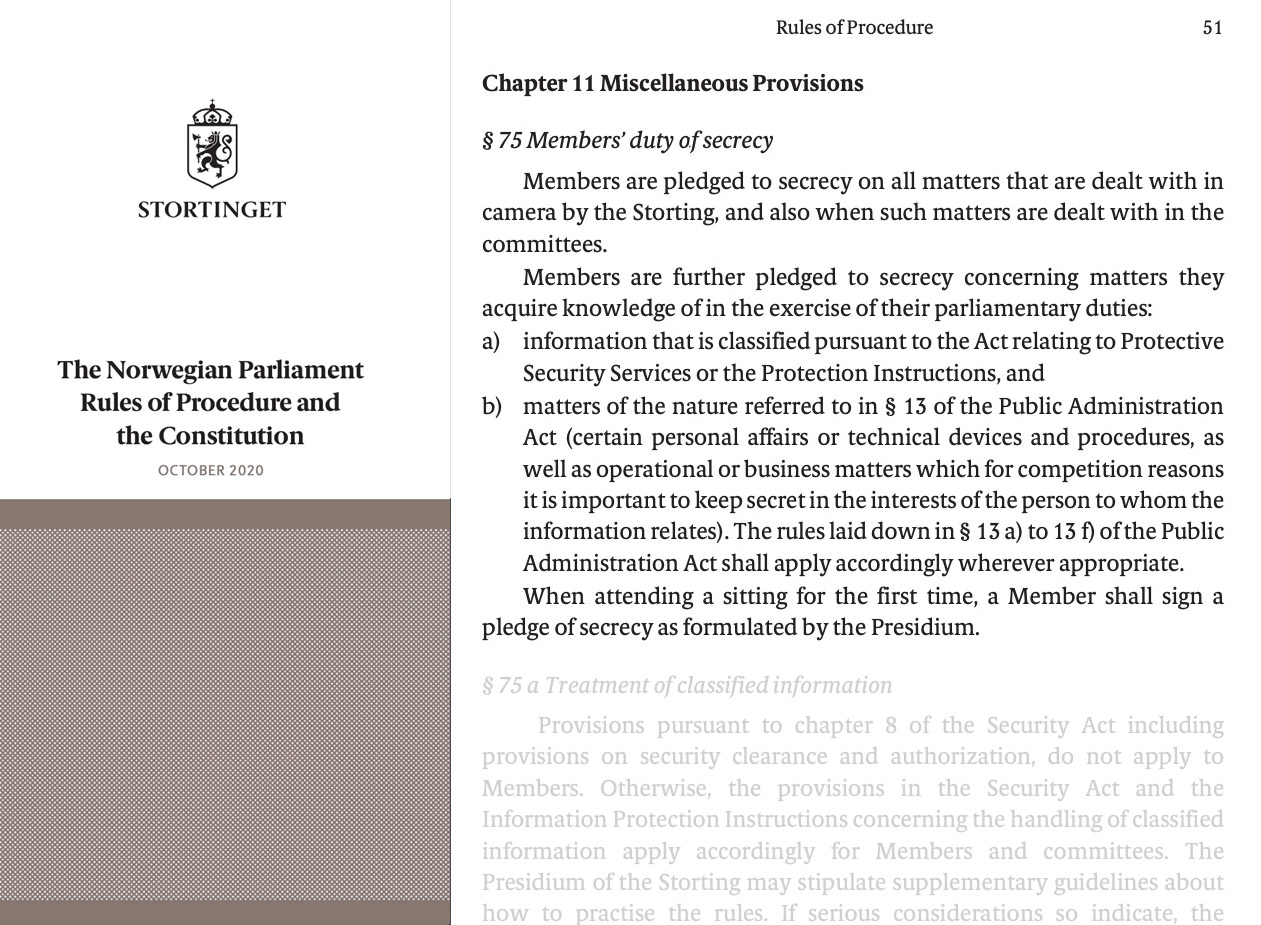
Constitution of Norway 2020 - Extreme Secrecy Provisions in Parliament
The Constitution of Norway - governing their Parliament, Stortinget, reads: Members’ duty of secrecy Members are pledged to secrecy on all matters that are dealt with in camera by the Storting, and also when such matters are dealt with in the committees. Members are further pledged to secrecy concerning matters they acquire knowledge of in the exercise of their parliamentary duties: a) information that is classified pursuant to the Act relating to Protective Security Services or the Protection Instructions, and b) matters of the nature referred to in § 13 of the Public Administration Act (certain personal affairs or technical devices and procedures, as well as operational or business matters which for competition reasons it is important to keep secret in the interests of the person to whom the information relates). The rules laid down in § 13 a) to 13 f) of the Public Administration Act shall apply accordingly wherever appropriate. When attending a sitting for the first time, a Member shall sign a pledge of secrecy as formulated by the Presidium.

Constitution of Norway 2020 - Extreme Secrecy Provisions in Parliament
Why has government been instituted at all? Because the passions of men will not conform to the dictates of reason and justice, without constraint. Has it been found that bodies of men act with more rectitude or greater disinterestedness than individuals? The contrary of this has been inferred by all accurate observers of the conduct of mankind; and the inference is founded upon obvious reasons. Regard to reputation, has a less active influence, when the infamy of a bad action is to be divided among a number, than when it is to fall singly upon one. A spirit of faction, which is apt to mingle its poison in the deliberations of all bodies of men, will often hurry the persons, of whom they are composed, into improprieties and excesses, for which they would blush in a private capacity.Alexander Hamilton 1788
The Federalist Papers #15
We do not, however, embrace transparency in all aspects of government. Citizens vote by secret ballot to protect their votes from outside influence. The Federal Reserve meets in secret to avoid causing turmoil in financial markets. Most international diplomacy is conducted in secret...Kogelman claims that a certain amount of opacity in government is necessary to realize political equality.Astral Codex 2023
Book Review: Secret Government
If legislators voted by secret ballot, this resolution mechanism would cease to function. Say that a lobbyist makes a contribution to a legislator hoping for an amendment to be inserted into a bill. The legislator can promise up and down to vote in favor of that amendment, but will have no way to actually prove it. With no way to verify that the exchange took place, the lobbyist would soon give up.Astral Codex 2023
Book Review: Secret Government
Critics would argue that enhanced transparency in prisons could actually be harmful. Michael Campbell and Heather Schoenfeld argue that the current mass incarceration boom was due in part to the politicization of crime within a federal-state incentive loop. Voters across the nation passed variations of “three strikes” laws and state legislatures supported mandatory sentences. That politicization fostered special interest groups and enhanced the groups’ influence on crime legislation. In a national poll of voters for their revenue and reduction preferences, 48% supported reducing funding for state prisons over raising property or business taxes. Defendants and prisoners are not necessarily the most sympathetic population and perhaps greater transparency in prison operations would actually lead to worse prison conditions.Andrea C. Armstrong 2018
No Prisoner Left Behind: Enhancing Transparency of Penal Institutions
Part of the reason the administration of President George W. Bush and those of other governments are able to put the clamps on such information is that transparency is not always good. If people do not agree on what constitutes good or bad behavior by a government or corporation, revealing that behavior may just spark conflicts over competing views of the public good. Some institutional secrets are legitimately worth protecting – there is no inherent right for one corporation to know its rival’s trade secrets, and military disclosure can allow adversaries to find weaknesses and locate targets. Misinterpretation, accidental or deliberate, can transform disclosure from an opportunity for public accountability to an exercise in scapegoating.Ann Florini 2003
The Coming Democracy
Public meetings under the Act often lack meaningful substantive exchange of ideas and real collective deliberation on issues being decided. Among the reasons given for the inhibiting effect of public meetings on collective decisionmaking are the following: concern that providing initial deliberative views publicly, without sufficient thought and information, may harm the public interest by irresponsibly introducing uncertainty or confusion to industry or the general public; a desire on the part of members to speak with a uniform voice on matters of particular importance or to develop negotiating strategies which might be thwarted if debated publicly; reluctance of an agency member to embarrass another agency member, or to embarrass himself, through inadvertent, argumentative, or exaggerated statements; concern that an agency member’s statements may be used against the agency in subsequent litigation, or misinterpreted or misunderstood by the public or the press, as for example, when the agency member is testing a position by “playing devil’s advocate” or merely “thinking out loud” ; and concerns that a member’s statements may affect financial markets. In addition, the Committee has received extensive and credible testimony that the restrictions imposed by the Act have had the effective of not only diminishing discussions on the merits of issues before agencies, but also preventing debate concerning agency priorities and the establishment of agency agendas, even though such discussions of a preliminary nature may not technically constitute a “meeting” otherwise required to be held in public under the Act. - ACUS (Administrative Conference of the United States) ACUS 1995
Reform of the Government in Sunshine Act
Progressive reformers, whether Democratic or Republican, have been calling for more “open and democratic” government since at least the 1960s. In fact, the roots of such reform date to Woodrow Wilson and probably even to the Anti-Federalist concern for more simple, direct democracy. Recently, The Washington Post’s Ezra Klein cited as one of “the 13 reasons Washington is failing,” the idea that “too much sunshine can burn” saying “sometimes, it’s easier to resolve disputes in private.” Madison, of course, would concur. The Constitutional Convention succeeded, in part, because the fifty-five delegates met behind closed doors, under strict confidentiality rules. As witness Madison’s Notes of Debates in the Federal Convention, published only after his death in 1836, delegates were able to repeatedly speak their minds and change their minds across the long summer of 1787. Madison clearly did not think the cure to the ills of democracy is more democracy. He created republican, that is, representative, institutions designed to “refine and enlarge the public views.” Viewing the sausage-making of the legislative process, especially under the unblinking stare of the media, has probably not increased citizen trust in government. The decline in trust of government since the 1960s is coincident with transparency reforms. William F. Connelly 2013
Partisan, Polarized, Yet Not Dysfunctional?
Impeachment votes should be held in secret. They’re too ripe for intimidation.Matthew Cooper 2022
Should Impeachment Votes Be Cast in Secret?
Should we have a secret ballot for impeachment. Would a secret vote in the Senate have led to Trump’s conviction? There’s no way to know what might have happened had the Senate voted in secret. It’s been widely asserted that a clique of Republican senators, many still publicly enraged at Trump over the January 6 attack, wanted to convict but didn’t do so out of fear—not only political trepidation but anxiety over physical reprisals after the near-death experience of the Capitol attack. If 10 additional Republicans had joined the 57 Senators (all 50 Democrats, including Joe Manchin of West Virginia, and seven Republicans) who voted “Guilty,” Trump would have been impeached and forbidden from running again for federal office. Democratic Senator Ed Markey of Massachusetts, who publicly advocated for a secret ballot at the time, has speculated that more Republicans would have joined the vote. Republican Senator Jeff Flake of Arizona, who was out of office by then, has suggested as many as 35 Republicans would have offed Trump. In the House, Liz Cheney, the Wyoming Republican, has said that she thought a majority of Republicans would have joined her and ten other GOP Conference members to impeach Trump were there a secret ballot.Matthew Cooper 2022
Should Impeachment Votes Be Cast in Secret?
The whole point of the supercommittee is that it works outside the ordinary process -- to my mind, that's a feature not a bug. By shielding the negotiators from scrutiny, they're spared from having to posture for their respective bases, and will have room to offer concessions they wouldn't dream of making publicly. Personally, I'm skeptical that they'll succeed (pressure from outside will diminish; it won't disappear). But I'm not worried about shady dealings, a la Cheney and oil companies, because the deliberations will focus on removing, rather than giving away, tax breaks, loopholes, and favors. That's incredibly hard to do in the current political climate. If you want the negotiators to succeed in striking a deal where both sides sacrifice something, a private supercommittee is probably the best bet. And if they do strike a deal and it's terrible, there will be ample opportunity to press members of Congress to vote against it.Joshua Green 2011
Why Open Government Is Occasionally Undesirable
The solution? Anonymous Congress. With anonymous Congress, we can turn every tormented congressional leaders dream into reality. The premise is simple: members of the House and Senate are allowed, periodically, to vote completely anonymously.Ben Krauss 2024
The Take Bakery: Anonymous Congress
The American public generally valorizes representatives who publicly “votes their conscience.” But there are valid political reasons why many refuse to do so. Maybe there’s a special interest group breathing down their neck and threatening to fundraise for a primary challenger. Maybe their district is significantly conservative or liberal, and they just can’t be seen collaborating on bipartisan legislation. Maybe they can’t stomach taking an ideological stand that will jeopardize their regular appearance on Jesse Waters or Rachel Maddow’s show. Whatever the reason, I believe we can get the courageous and principled leadership we desperately crave, as long as they have the freedom to demonstrate that legislative bravery in private.Ben Krauss 2024
The Take Bakery: Anonymous Congress
Get rid of television. Yes, that means less “transparency” in the confirmation process — but it may also salvage what little dignity remains in one of the Senate’s most important constitutional duties.Joe Ferullo 2022
Eliminate television coverage from Supreme Court
Gridlock in the American Congress has been exacerbated by the “sunshine laws,” that opened up committee deliberation to the public, but also to lobbyists and other special interests. Adding openness in this instance has not increased legitimacy.Cathie Jo Martin 2013
Conditions for Successful Negotiation
Forcing (transparent/public) votes on divisive “hot-button” issues provides campaign ammunition to party colleagues and supporters back home.Walter Oleszek 2015
Congressional Procedures and the Policy Process
Even proponents of openness admit that members can reach compromises and make tough decisions more easily when they are away from the glare of lobbyists sitting in the audience.Walter Oleszek 2015
Congressional Procedures and the Policy Process
Senators may over several days “cast back-to-back votes on a dizzying array of dozens of amendments,” many designed to provide campaign ammunition (so-called gotcha amendments) for the next election.Walter Oleszek 2015
Congressional Procedures and the Policy Process
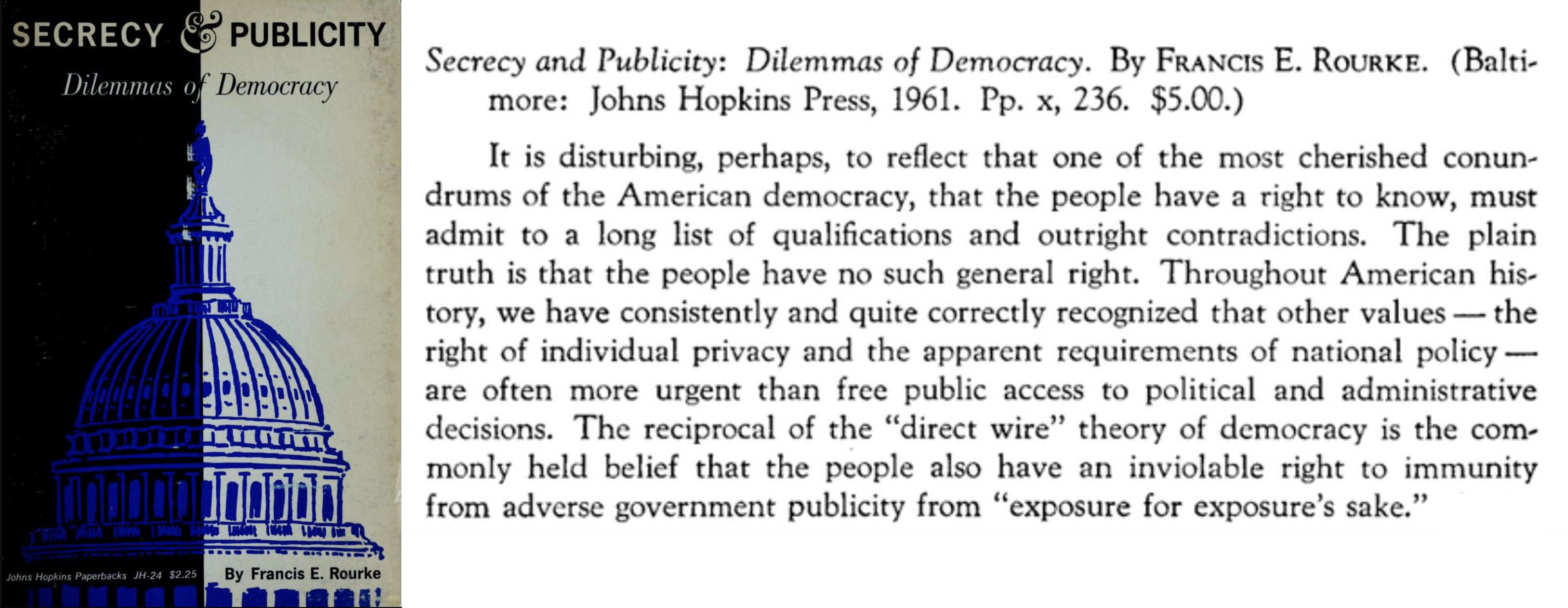
William P. Irwin 1961 on Secrecy and Publicity by Francis E. Rourke
Note: Francis E. Rourke is not a fan of transparency or secrecy, he is more concerned with how government uses the bully pulpit by exposing some things publicly and keeping others quiet.

William P. Irwin 1961 on Secrecy and Publicity by Francis E. Rourke
The fact that members are on record much more often now than before has strengthened adversary democracy by making legislators’ behavior more visible to constituents. On the other hand, the interpretation of members’ votes is not always easy and can be misleading, even for those more attentive to the process than the typical citizen is. Representatives may vote against a measure in the form in which it is presented even though they favor the general concept. Or they may oppose particular parts of a measure but vote for it because they think on balance it merits support. They may vote on the basis of procedural considerations – for example, to oppose a closed rule – even though they favor the substance of the legislation that rule pertains to. They may oppose abortions personally but not want to amend the Constitution to ban them. In short, members can appear to stand on both sides of an issue, either as a result of careful thought or in order to obscure their position for political reasons, such as an effort to placate a divided constituency. While recorded votes facilitate citizens’ ability to hold representatives accountable, these possibilities suggest caution in doing so. The inattention and ignorance of most constituents, however, mean that such caution will rarely be exercised by most citizens. Because of limited public attention, members are sometimes confronted with a choice of voting in a way they consider best but would have a hard time explaining, or voting in a way that is easier to explain even though they would prefer to be on the other side. David Vogler & Sidney Waldman 1985
Congress and Democracy (Strategic Voting)
Roll-call votes are typically not requested randomly by a disinterested party; they are selected by a purposive actor (such as a party leader) with a vested interest in what the vote will reveal about legislative behavior to a particular audience. Thus, we cannot be confident that we can infer behavior on the unobserved (non-roll-call) votes from the roll- call votes. This disjunct has negative implications for the use of roll- call votes to estimate legislators’ ideal points, the dimensionality of the policy space, and party influence on legislative voting.Carrubba, Gabel & Hug 2008
Legislative Voting Behavior
Each committee first attempted to write a reform bill in public but soon discovered that sunshine was incompatible with reform.Arnold 1990
The Logic of Congressional Action
How can citizens control legislators when most citizens pay scant attention to public affairs? Why should legislators worry about citizens’ preferences when they know most citizens are not really watching them?Douglas Arnold 1993
Can Inattentive Citizens Control Representatives?
A House rules change in 1993 may have increased the chances that the discharge procedure would succeed – at least on high-visibility issues. Previously, names on a discharge petition – and thus the names of those who had not signed – were kept confidential until 218 was reached. The rules change specified that the list of who had signed would be public from the first signature, making it easier to pressure members to sign on hot-button issues.Barbara Sinclair 2006
Unorthodox Lawmaking
Sunshine rules instituted in the mid-1970s require that conference committee meetings be open to the public. However, because a public forum inhibits the hard bargaining that is often necessary, much negotiation takes place informally behind the scenes. To reach a compromise, members may need to retreat from positions they have advocated, often ones they have argued for strongly and ones with ardent interest group and constituency support; that is easier done behind closed doors.Barbara Sinclair 2006
Unorthodox Lawmaking
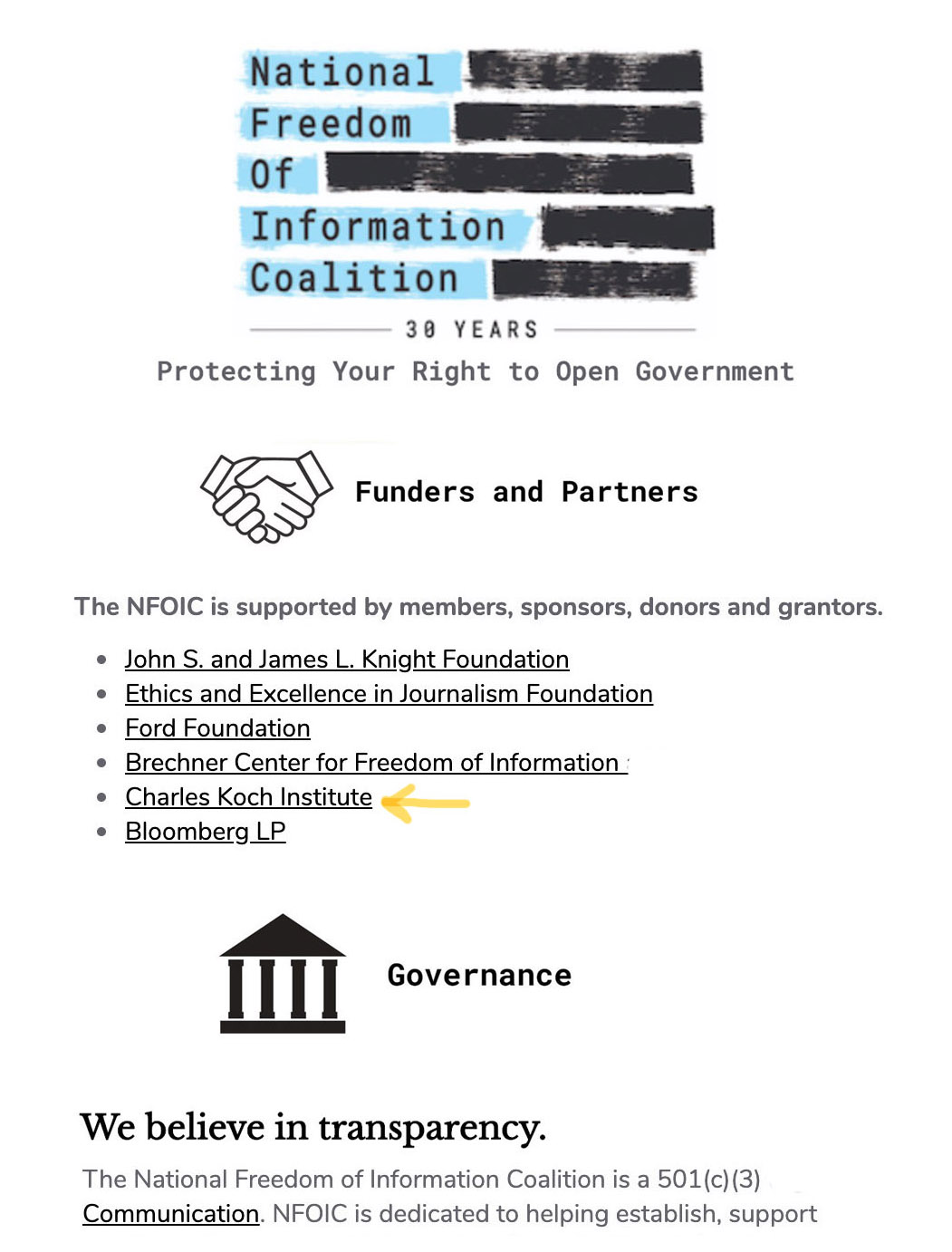
One of many Koch sponsored transparency organizations 2020

One of many Koch sponsored transparency organizations 2020
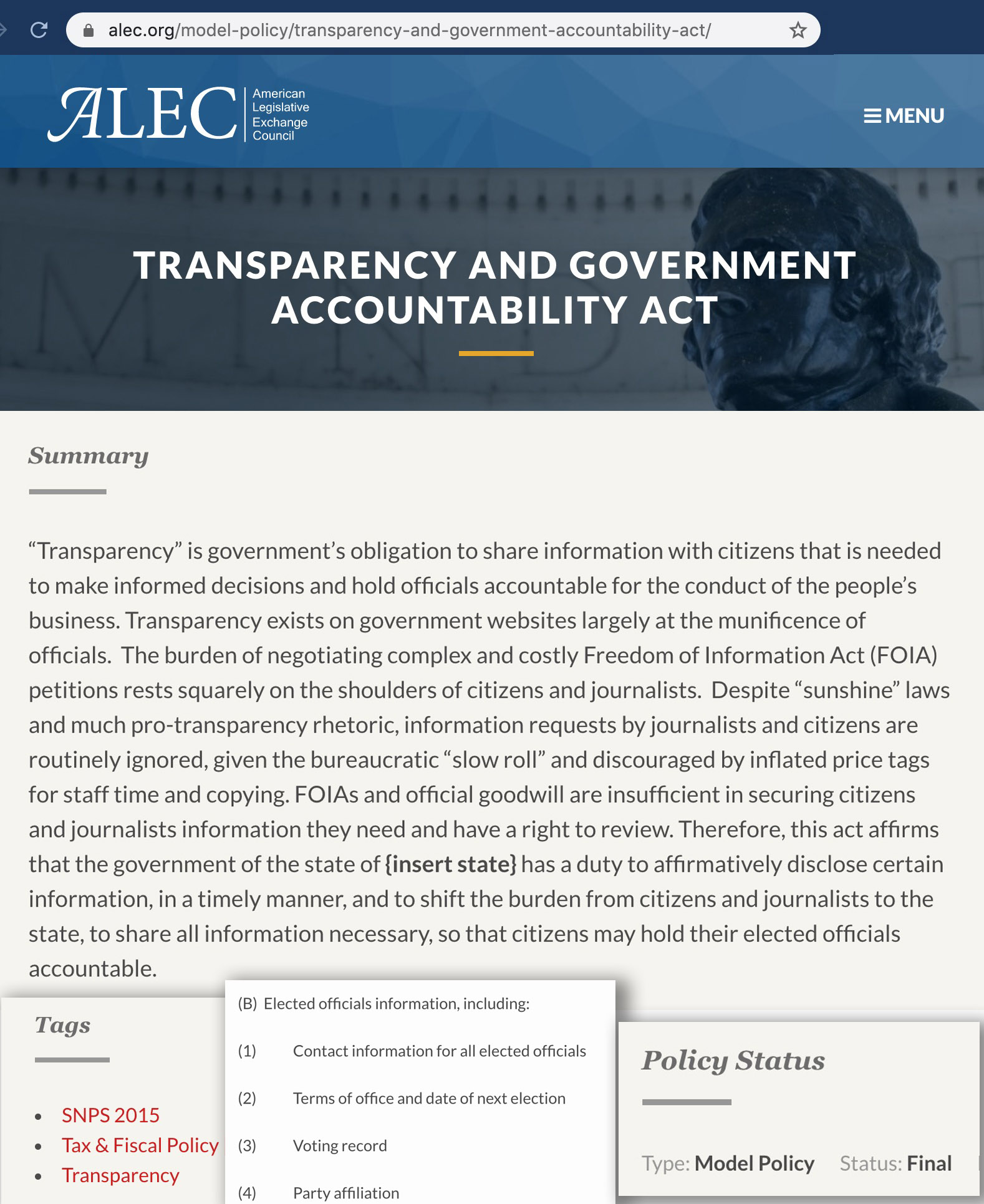
Koch funds ALEC to push for legislative transparency in state legislatures, especially with regard to taxation

Koch funds ALEC to push for legislative transparency in state legislatures, especially with regard to taxation
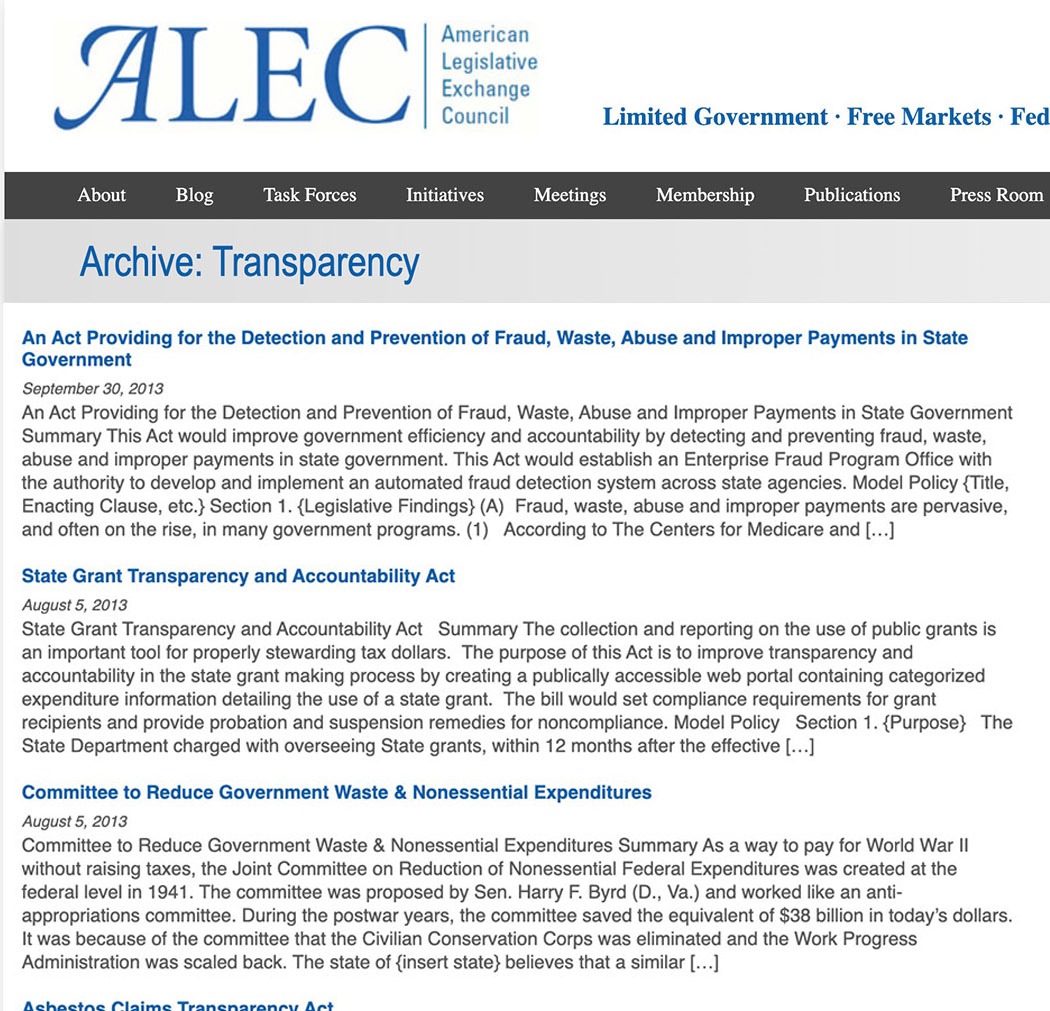
Koch funds ALEC to push for legislative transparency in state legislatures

Koch funds ALEC to push for legislative transparency in state legislatures
Greater transparency is not an unmitigated good. In all likelihood, the trend toward greater transparency will be at once positive and pernicious. More information about other societies may reveal conflicting values and interests as well as shared ones. More information about the military capabilities of other states may show vulnerability and encourage aggression by the strong against the weak. Greater transparency can highlight hostility and fuel vicious cycles of belligerent words and deeds. It can highlight widespread prejudice and hatred, encourage the victimization of out-groups and by showing broad acceptance of such behavior without repercussions, legitimize it. Greater transparency can undermine efforts at conflict resolution and, when conflicts do break out, it can discourage intervention by third parties. Transparency sometimes can make conflicts worse.Kristin M. Lord 2006
Perils and Promise of Global Transparency
Greater transparency will not necessarily promote democracy and good governance… In some cases, more transparency may actually strengthen illiberal regimes and increase their legitimacy. To a large extent, the effects of transparency depend on what transparency reveals, who benefits, and how people interpret the information they receive in a more transparent global society. Transparency may reveal positive trends and an environment conducive to peace; but it may also reveal negative trends and an environment of suspicion and hate.Kristin M. Lord 2006
Perils and Promise of Global Transparency
Of the Committees that reported meeting 50 or more times during the 1960 session, House Ways and Means showed the highest secrecy percentage, 81 percent. The Committee, which has the responsibility of processing all tax measures introduced in Congress, spent much of its time working out a compromise bill providing health care for the aged. It also considered legislation extending certain excise taxes and providing an increase in the national debt limit and bills extending tax relief to companies making investments abroad and organizations engaged in lobbying. The Ways and Means Committee closed the doors to the press and public for 57 of 70 meetings during 1960.Congressional Quarteryl 1960
Congressional Secrecy Increases in 1960
Republican senators today elected John Thune of South Dakota to be the next Senate majority leader. Trump and MAGA Republicans had put a great deal of pressure on the senators to back Florida senator Rick Scott, but he marshaled fewer votes than either Thune or John Cornyn of Texas, both of whom were seen as establishment figures in the mold of the Republican senators’ current leader, Mitch McConnell of Kentucky. Scott lost on the first vote. The fact that the vote was secret likely helped Thune’s candidacy. Senators could vote without fear of retaliation.Heather Cox Richardson 2024
Secret Vote blocks Trump candidate
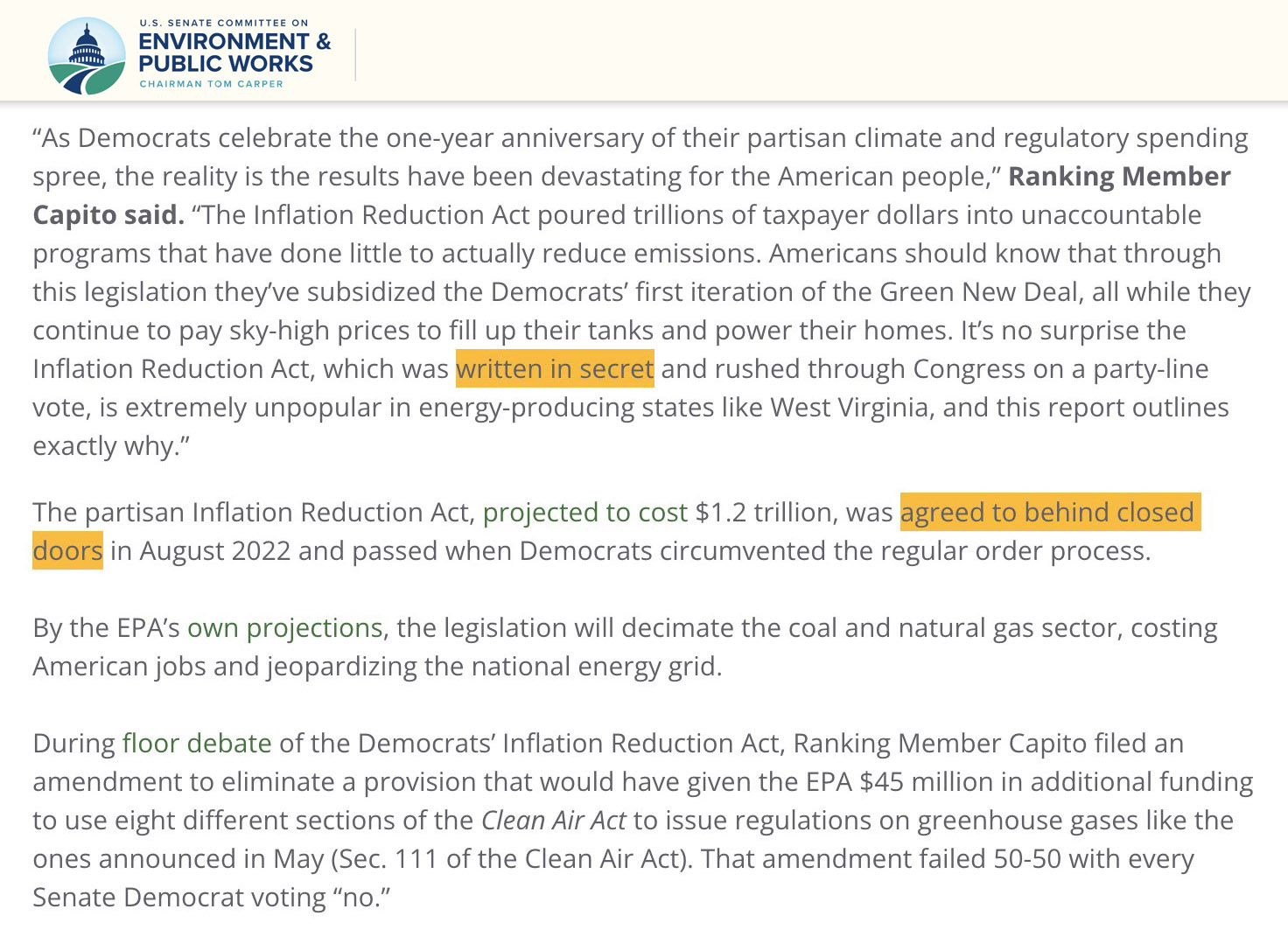
Shelley Moore Capito 2023 - Capito One-Year Report
Text: It’s no surprise the Inflation Reduction Act, which was written in secret and rushed through Congress on a party-line vote, is extremely unpopular in energy-producing states like West Virginia, and this report outlines exactly why. ”The partisan Inflation Reduction Act, projected to cost $1.2 trillion, was agreed to behind closed doors in August 2022 and passed when Democrats circumvented the regular order process. [environment, clean air]

Shelley Moore Capito 2023 - Capito One-Year Report
The House Appropriations Committee, probably the busiest of all Congressional committees, traditionally holds all of its meetings in private and reports none of them. [It goes] over money requests in private because Chairman Clarence Cannon (D Mo.) believes they get more work done this way...Congressional Quarteryl 1960
Congressional Secrecy Increases in 1960
As we reformed politics, usually in the name of democracy, we made it less democratic and accountable in respects. The Founders closed the doors at the 1787 constitutional convention - as we had when it came to writing legislation to represent the public interest in the Senate - before we reformers opened them. It is often easier to represent the public interest in secret. The founders closed the doors and went one step farther. The delegates were pledged to secrecy.Adlai Stevenson 2016
The Black Book
Senators... retreated behind closed doors to draft legislation in mark up sessions and represent[ed] the public interest with impunity, as the founders did at the Constitutional Convention. We opened the doors. Senators then retreated to closed Conference Committee meetings to reconcile legislation passed by both Houses. [They] represent[ed] the common interest by removing concessions adopted in public for grateful supplicants and constituents, knowing they would disappear in secret. When their doors were opened, Senators had nowhere remaining to represent the public interest without fear of retribution from interest groups.Adlai Stevenson 2011
The Black Book
We opened up the legislative process, increased the staffing and, in redistributing power, broadly left it vulnerable to pressures at many more points from think tanks, industry, financial, and farm groups, environmentalists, gun control, and abortion advocates, religionists, and advocacy groups of all kinds. [All of these] proliferated to take advantage of reform and the mounting vulnerability of the politicians. The unintended results were due in part to the new mass media which took advantage of the reforms, [opting] to be adversarial and superficial instead of availing the public of its new access [via transparency] to political process and politicians, as we reformers had naively expected.Adlai Stevenson 2011
The Black Book
This Congress bears little resemblance to the Congress in which I served from 1970 to 1981. There was little partisanship. We divided over issues not along party lines. The regular order should be restored, cloture reformed. We held our "mark-up" sessions behind closed doors to write legislation line by line. When doors were opened to let in the “sunshine,” the lobbyists were let in – and the money.Adlai Stevenson 2019
Our political system needs an overhaul
Transparency is often viewed as sunlight, and people tend to reflexively agree that more is always better. More is not always better-sometimes more is just more. Occasionally there is an unintended dark side to transparency for its own sake. Clay Fuller 2019
American Leadership in the Age of Authoritarian Corruption
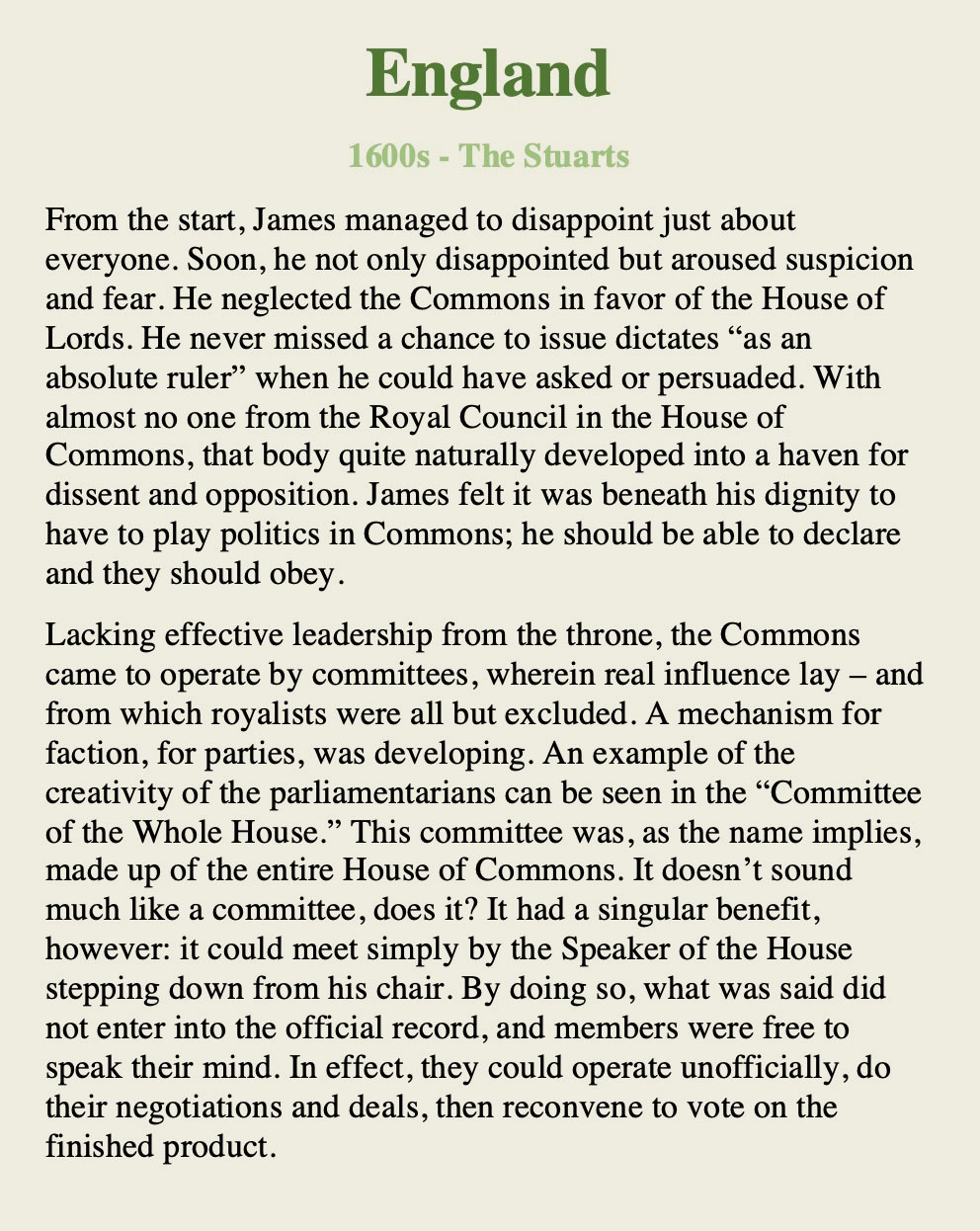
England - UK - 1600s Stuart England Secrecy & the Committee of the Whole House
Text: England: The Stuarts: From the start, James managed to disappoint just about everyone. Soon, he not only disappointed but aroused suspicion and fear. He neglected the Commons in favor of the House of Lords. He never missed a chance to issue dictates “as an absolute ruler” when he could have asked or persuaded. With almost no one from the Royal Council in the House of Commons, that body quite naturally developed into a haven for dissent and opposition. James felt it was beneath his dignity to have to play politics in Commons; he should be able to declare and they should obey. Lacking effective leadership from the throne, the Commons came to operate by committees, wherein real influence lay – and from which royalists were all but excluded. A mechanism for faction, for parties, was developing. An example of the creativity of the parliamentarians can be seen in the “Committee of the Whole House.” This committee was, as the name implies, made up of the entire House of Commons. It doesn’t sound much like a committee, does it? It had a singular benefit, however: it could meet simply by the Speaker of the House stepping down from his chair. By doing so, what was said did not enter into the official record, and members were free to speak their mind. In effect, they could operate unofficially, do their negotiations and deals, then reconvene to vote on the finished product.

England - UK - 1600s Stuart England Secrecy & the Committee of the Whole House
The negotiations for the health care bill were supporse to be televised on C-Span. The president [Obama] made that claim over and over again, and the negotiations were conducted behind closed doors (at least the negotiations between the Senate and the House).Ken Rudin 2010
Political Junkie
The secret ballot was known in the nineteenth century as the “Australian ballot” after South Australia and Victoria instituted it in 1856 to prevent citizens being intimidated into voting against their will. So it’s fitting that we take the Australian ballot further and use it to loose the bonds of careerist intimidation within our Parliament. I’d give any super-majority of the people’s chamber the power to compel a secret ballot of the other chamber(s) on the matter in question. In fact, a secret ballot isn’t unknown to Parliament today. The Speaker of the House and President of the Senate are elected by secret ballot, and that fact has changed outcomes.Nicholas Gruen 2017
Detoxing Democracy
Senator Roger Wicker from Mississippi came up with this idea on a Thursday to have all the Senate get together in the august old Senate chamber behind closed doors to try to hash this out on a Monday night. So they all came in from out of town. Around 6:30 they adjourned to old Senate chamber. They closed the doors. Reporters are just milling around outside for hours and hours while one by one the senators kind of have a vent session. They all get up and stand and say you just don't understand us. They talk it through. And then they emerge with a deal. And that deal had actually been cut over the weekend when Senator John McCain of Arizona pleaded with Senator Chuck Schumer of New York to come back to the table and step back from the nuclear brink. That deal was - there was one small face-saving measure that - the Republicans hate the National Labor Relations Board. They feel like the NLRB always tilts to the unions - which it kind of does. They wanted some kind of face-saving measure. They said withdraw President Obama’s - two of President Obama's NLRB - National Labor Relations Board - nominees. Give us two new ones. The twist was we don't care who those new two ones are. They could be - they could be put up by the unions. They could be as liberal or as in-your-face as the two guys that you're going to remove. Just give us two new nominees and we’ll give you all seven, carte blanche. That’s what they did.Jonathan Weissman (New York Times) 2013
As Summer Recess Looms, Congress Remains Inactive
In my book Data and Goliath, I write about the value of privacy. I talk about how it is essential for political liberty and justice, and for commercial fairness and equality. I talk about how it increases personal freedom and individual autonomy, and how the lack of it makes us all less secure. But this is probably the most important argument as to why society as a whole must protect privacy: it allows society to progress… People need the space to try alternate ways of living without risking arrest or social ostracization. People need to be able to read critiques of those norms without anyone’s knowledge, discuss them without their opinions being recorded, and write about their experiences without their names attached to their words. People need to be able to do things that others find distasteful, or even immoral. The minority needs protection from the tyranny of the majority. Privacy makes all of this possible. Privacy encourages social progress by giving the few room to experiment free from the watchful eye of the many. Even if you are not personally chilled by ubiquitous surveillance, the society you live in is, and the personal costs are unequivocal.Bruce Schneier 2018
target="_blank"Surveillance Kills Freedom by Limiting Experimentation
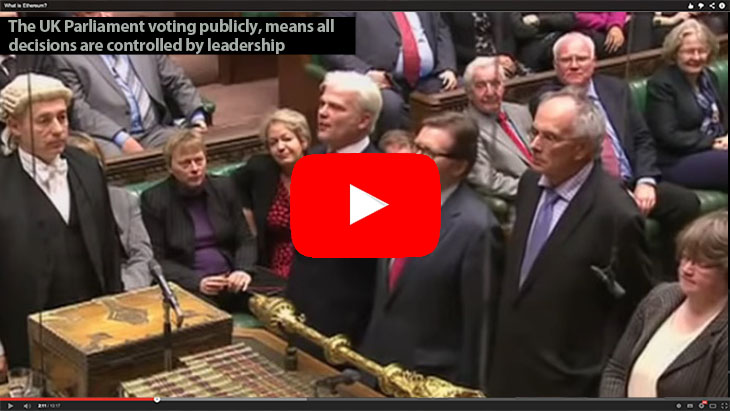
Jay Foreman 2015 – Humorous Look at Open Voting

Jay Foreman 2015 – Humorous Look at Open Voting
It’s always better in our industry to have transparency, we’re all the stronger for it.Conall McDevitt (Lobbyist) 2017
Hume BrophyThroughout history there is scant (if any) evidence of lobbyists or powerful groups resisting transparency. But there is gobs of evidence that they embrace it.
Oft-times in order to get anything out it is necessary to compromise way below what the public stand of the member would be. To have than open to the public would greatly hamper, I am afraid, the successful reaching of a consensus by compromise which is the essence of the finalization of legislation.Sen. Mike Monroney (Oklahoma) 1967
Advocates of OpennessNote: This citation, from a member of Congress, takes place three years before Congress opened all its committees.
Socrates says he has often heard Charmides give excellent advice to public leaders in private conversation. Charmides replies that “a private conversation is a very different thing from a crowded debate.”I.F. Stone 1989
The Trial of SocratesNote: This conversation comes from Xenophon and not Plato and it highlights Socrates' clear ignorance to the pressures of working in the sunlight. The conversation continues as follows. SOCRATES: “In your intercourse with public men. Whenever they take counsel with you, I find that you give excellent advice, and whenever they make a mistake, your criticism is sound.” CHARMIDES: “A private conversation is a very different thing from a crowded debate, Socrates.” SOCRATES: “But, you know, a man who is good at figures counts as well in a crowd as in solitude; and those who play the harp best in private excel no less in a crowd.” CHARMIDES “But surely you see that bashfulness and timidity come natural to a man, and affect him far more powerfully in the presence of a multitude than in private society?”
Once Bobby became Attorney General I had to really pour the whiskey in Senator Richard Russell because he had the votes to kill it. Vice President Johnson called and said, “Bobby, this will be the most humiliating defeat I, as Vice President, could suffer if I don’t have enough influence in the Senate to confirm the President’s nominee, even though it’s his brother.” So I took Senator Russell over to the Secretary of the Senate’s office and I really poured heavy drinks in him. I said, “Your best friend and my best friend is pleading with me to talk to you to see if you’ll let us have a voice vote.” Between my persuasion and the booze, he agreed. That’s the only way he was confirmed. He would have been defeated if there had been a roll-call vote. The Republicans and Southern Democrats had enough votes to defeat Bobby Kennedy to be Attorney General...But had it had a roll-call vote, Bobby Kennedy would have never been Attorney General. He would have been lucky to get 40 votes.Robert Bobby Baker 2009
Interview by Donald RitchieNote: This example highlights how differnt confirmations were just a few decades ago. Bobby Kennedy as contentious as a choice he was, was easily (and quietly) confirmed by voice vote. Today, the votes are public and fiercely debated along partisan lines.
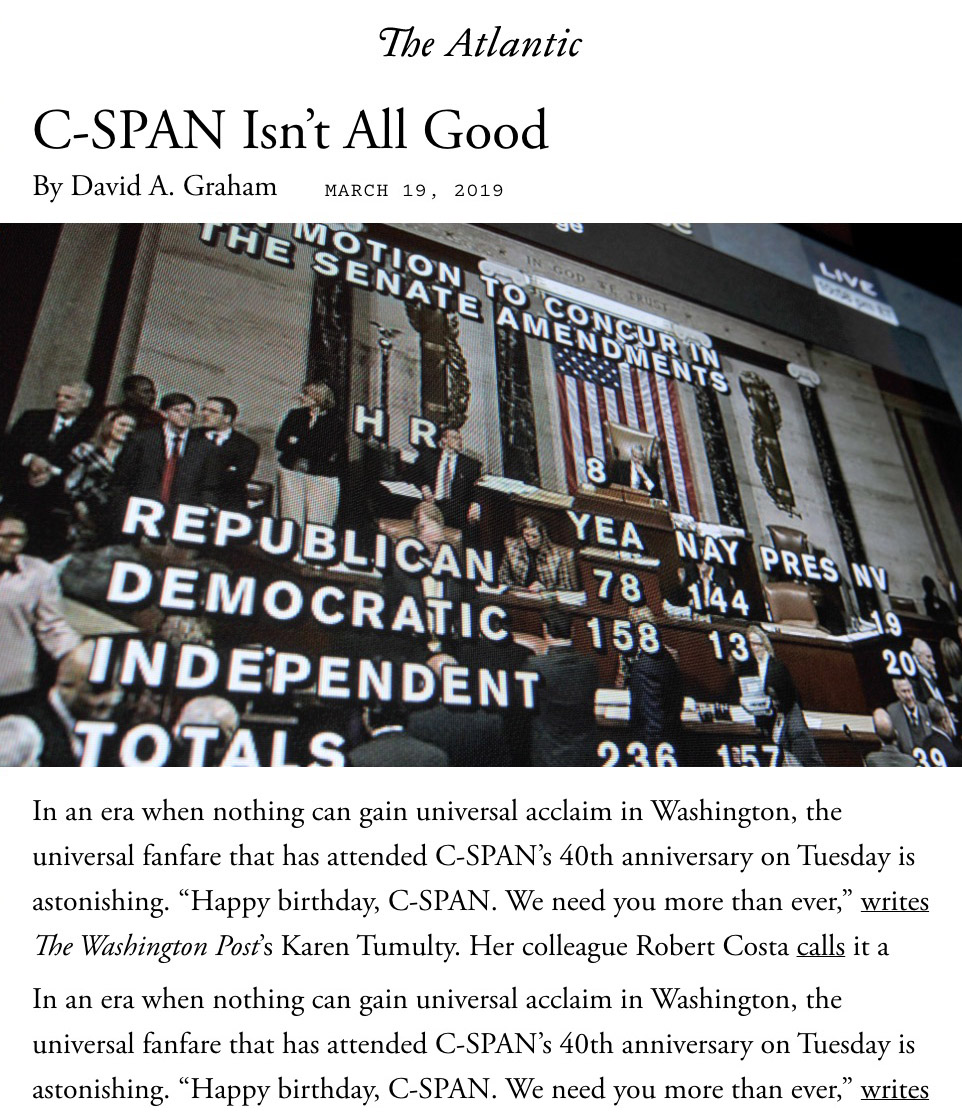
David Graham 2019 - C-Span Isn’t all Good

David Graham 2019 - C-Span Isn’t all Good
C-SPAN didn’t just create a way for politicians to vault out of the sleepy back benches of the House. It also changed the way things worked within the chamber. The most effective legislators are not always the most telegenic, and Congress’s work is sometimes unsavory. As Jonathan Rauch, a senior fellow at the Brookings Institution, has written in The Atlantic, well-meaning reforms have in fact weakened some parts of the American political system. That includes greater transparency for legislation, of which C-SPAN is a part. “Congress functioned better and people were happier with it when it was less exposed to public view,” he told me in a recent interview.David Graham 2019
C-Span Isn’t all Good
Throughout the nineteenth century, the Senate routinely debated treaties and nominations in secret. House and Senate committees regularly convened in executive session, beyond public scrutiny.Donald Ritchie 1991
Press Gallery: Congress and the Washington Correspondents
But what if the conventional wisdom about C-SPAN is wrong, and the problem is not that too few people are watching it, but too many? What if C-SPAN is not an anachronism, but an author of today’s political chaos?David Graham 2019
C-Span Isn’t all Good
Demagoguery has always been with us. And television isn't the only medium that can elevate politicians and other leaders more interested in rousing passions and attracting eyeballs than in doing good or acting as public servants; talk radio and social media do a pretty good job as well. But television sits at the center of our public life to a unique degree, and not always for the better. So Sasse is right to urge justices to keep cameras out of the Supreme Court. We might think about getting rid of them in the House and Senate, too. Frankly, our democracy could use a lot less jackassery.Joel Mathis 2022
Ted Cruz checked his Twitter mentions and a little bit of our democracy died
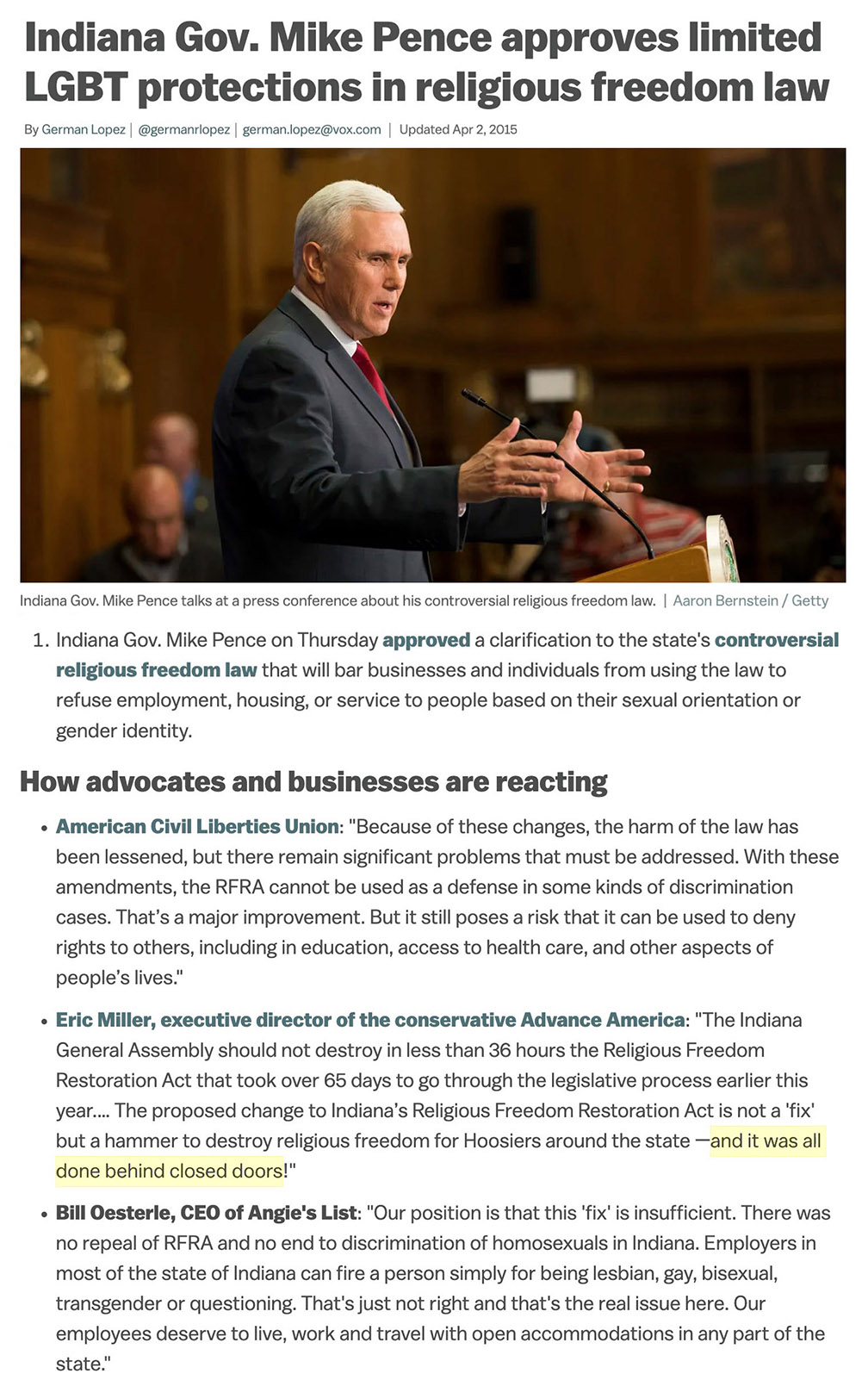
German Lopez 2015 - LGBT Protections Crafted Behind Closed Doors

German Lopez 2015 - LGBT Protections Crafted Behind Closed Doors
In the period immediately after Watergate, Congress seemed willing to forgo its habitual secrecy. Disclosure laws bared not only amounts and sources of campaign funding but the personal finances of members. Committees opened their hearings and critical markup sessions where bills are amended for floor consideration. Under Chairman Al Ullman of Oregon even the Ways and Means Committee opened its doors. Since then, however, the trend has been reversed. Ullman’s successor, Dan Rostenkowski, put together the big tax bills of the 1980s in executive session, and this has once again become standard operating procedure.
Opening meetings and releasing documents may not increase public respect for the institution in any immediate or direct way. Indeed, after an initial round of laudatory editorials, there might well be adverse consequences. The public would likely see staged markups, with members voting to ratify deals reached in private before the meeting. The public would also see committee rooms filled with lobbyists, whose presence may well tip votes in favor of special interests. Members frequently justify closed meetings by saying they want to talk to each other with “the lobsters” out of the room.Ronald Elving 1994
Brighter Lights, Wider Windows
In particular, I think the words like transparency, how could you be against it? It's transparent. It's clear. There is a valorization that's built into these words and I think that's extremely compelling, often. And so I think to say that I am against transparency makes me sound sleazy, but in fact, I am against transparency and that's a critical problem in bureaucracy. People want to have a paper trail and that's often the reason why we are happy to say bureaucracies are inefficient. But in fact, bureaucracies are inefficient precisely because we want them to be transparent. And that turns out to be one of the drivers of a lot of red tape. So I'm often skeptical of transparency.Abhijit Banerjee 2022 (Nobel Prize Winner)
Putting Our Assumptions to the Test
A lot of cynics say the clean air act was a copout; that it was slapped together by the special interests, the little guy was shut-out, we caved-in to big business lobbyists – all behind closed doors, in some smoke filled room: well, this was the clean air act – we did everything they said we did... But without the smoke... Speaking of “closed doors” I was pretty mad when I tried to get into one of those closed door meetings and found out that the door was locked tight. I pounded and pounded but the door never - opened. I found out later sununu had the locks changed! Hard to believe, because the meeting was in my office!!Muski, Cranston, Cohen & Dole 1990
A Tribute to Senate Majority Leader George Mitchell (Climate)
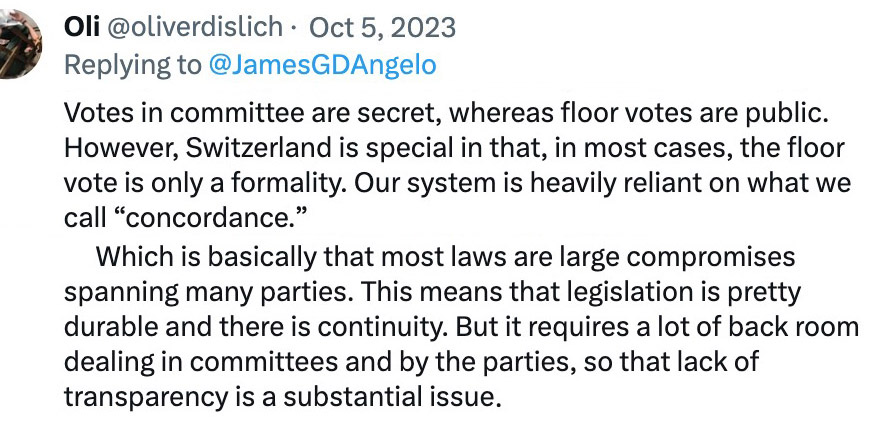
Oliver Dislich 2023 - Switzerland Secrecy and Transparency
Text: Votes in committee are secret, whereas floor votes are public. However, Switzerland is special in that, in most cases, the floor vote is only a formality. Our system is heavily reliant on what we call “concordance” Which is basically that most laws are large compromises spanning many parties. This means that legislation is pretty durable and there is continuity. But it requires a lot of back room dealing in committees and by the parties, so that lack of transparency is a substantial issue

Oliver Dislich 2023 - Switzerland Secrecy and Transparency
Potential negative effects that transparency might have on bargaining efficiency…[When] certain special interest groups have undue influence over a decision, then secrecy can have the useful effect of shutting such groups out of the initial stages of the process.David Stasavage 2005
Does Transparency Make a Difference?
A closer investigation reveals that transparency may also have important costs. When representatives know that their individual bargaining positions and/or votes will become part of the public record, they may have a greater incentive to take positions that will demonstrate loyalty to a constituency, even if this means taking an action that they know is less likely to produce the policy outcome they think is best.David Stasavage 2005
Does Transparency Make a Difference?
As the U.S. government has become larger and more open, groups that petition it – lobbyists – have become Washington’s greatest growth industry.Fareed Zakaria 2003
Future of Freedom
Looking back, it is my honest belief that secrecy was crucial for the positive result from our negotiations.Ahmed Qurei 2006
From Oslo to Jerusalem: The Palestinian Story of the Secret Negotiations
In sum, although congressional activity is certainly more accessible to citizens, as the reformers hoped, the weight of the accumulated evidence suggests that the sunshine reforms have had limited effects. In fact, visibility may contribute to legislative inertia. Ever aware that they are, in a real sense, on display, members may conclude that concern for constituents and policy caution, inaction, is the wisest course. Rather than risk alienating constituents and groups whose reelection support they feel is vital, they may avoid controversy and decline to act. Thus, by increasing the possibility for external actors to participate in congressional politics, the accountability reforms may have made Congress not only more democratic but also more permeable – more open to pressures from voters and organized interests that reduce the institution’s ability to make effective public policy. Steps to increase accountability, like those to promote decentralization (responsiveness), may have inadvertently undercut congressional responsibility.Larry Rieselbach 1994
Congressional Reform
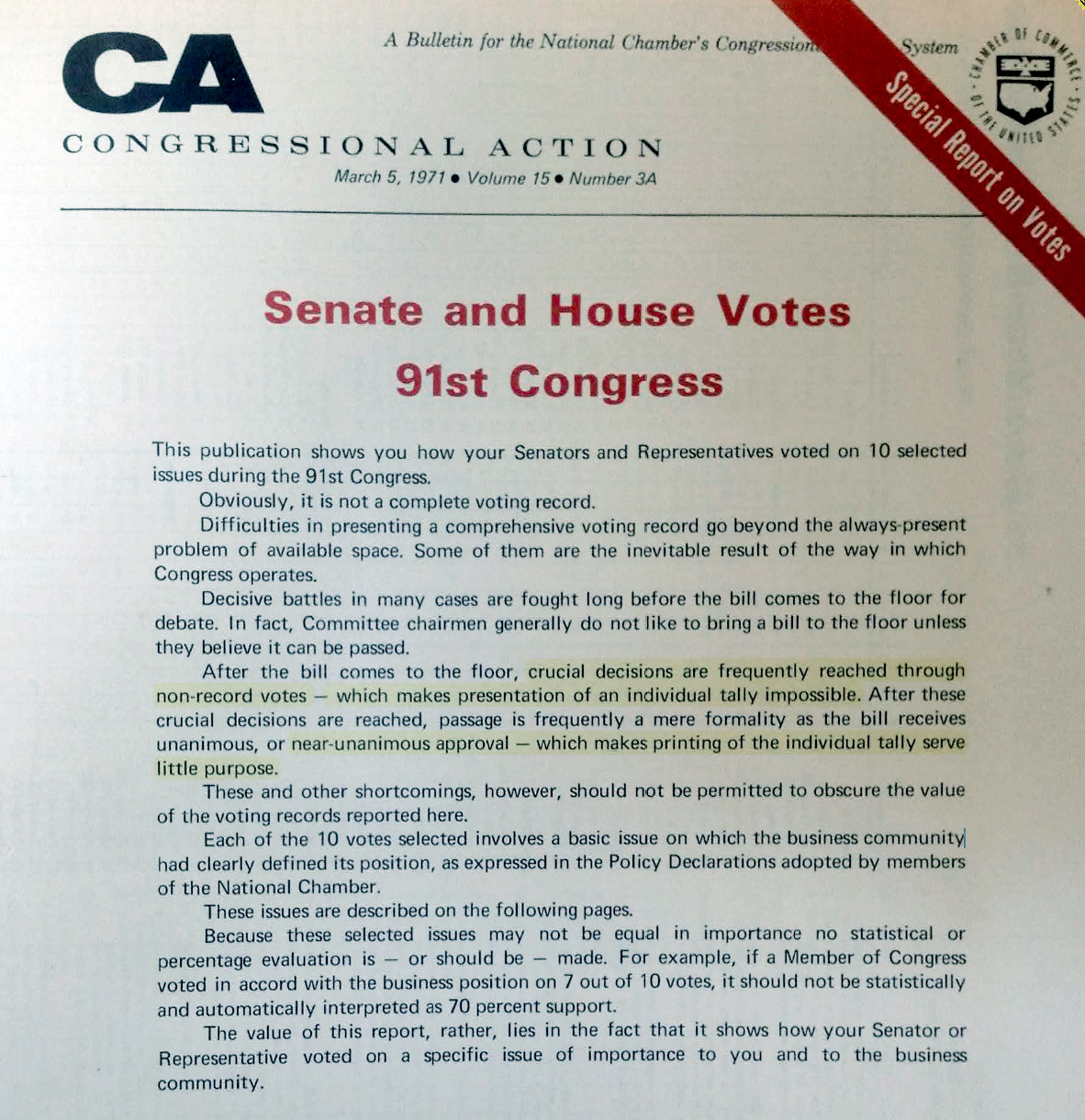
Chamber of Commerce 1971 - Special Report on Votes

Chamber of Commerce 1971 - Special Report on Votes
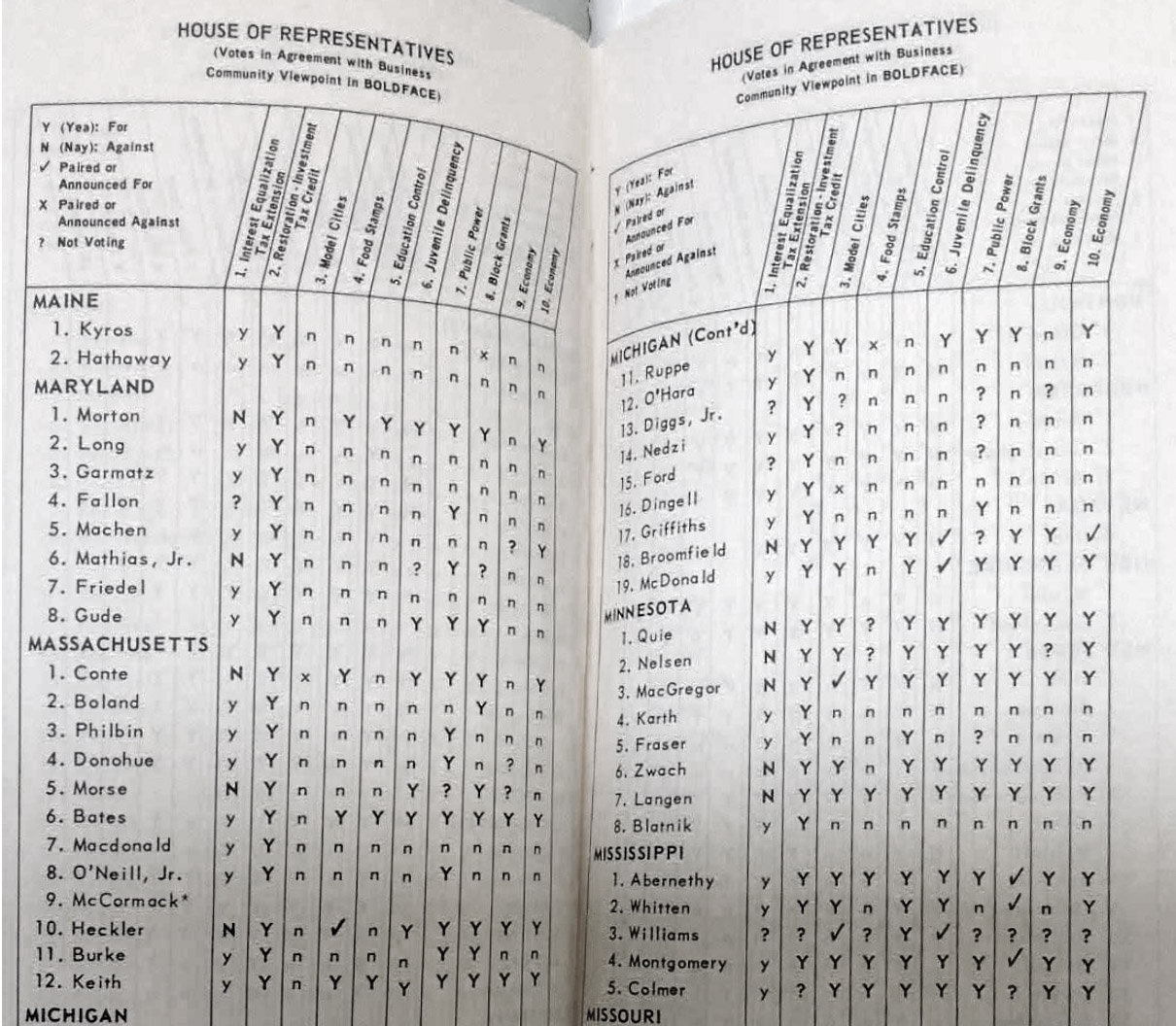
Chamber of Commerce 1967 - Scoring Legislator’s Votes

Chamber of Commerce 1967 - Scoring Legislator’s Votes
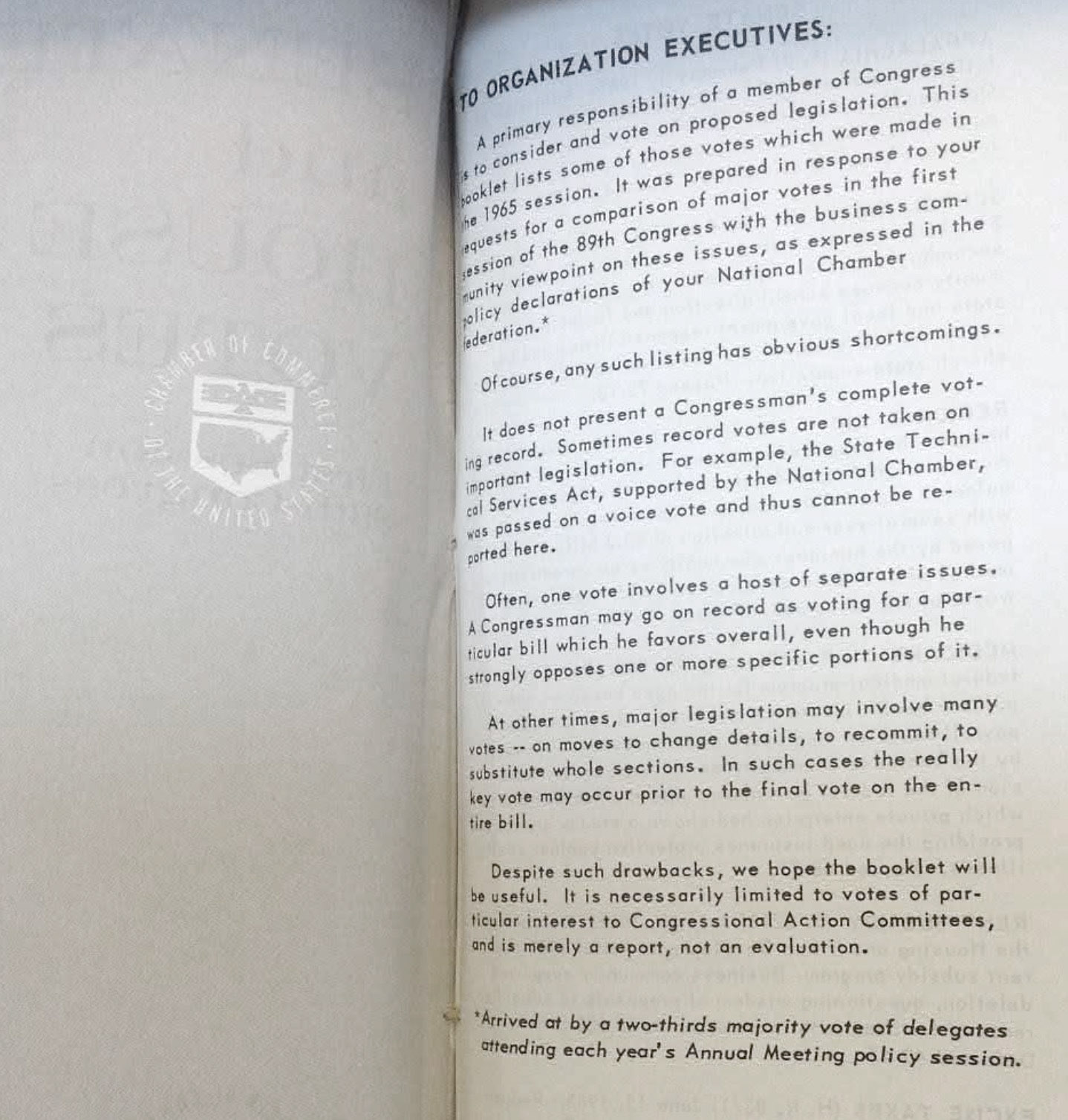
Chamber of Commerce 1966 - Senate and House Votes 89th Congress

Chamber of Commerce 1966 - Senate and House Votes 89th Congress
The first of the Fourteen Points of January 8, 1918 provided that in future there should be nothing but ‘open covenants of peace openly arrived at’, and that ‘diplomacy should proceed always frankly and in the public view’. On reaching Paris, President Wilson quickly decided that by ‘diplomacy’ he had not meant ‘negotiation’, but only the results of that negotiation, namely treaties. He also decided that the phrases ‘openly arrived at’ and ‘for the public view’ were relative only and contained nothing that need deter him from conducting prolonged secret negotiations with Lloyd George and Clemenceau, while one American marine stood with fixed bayonet at the study door, and another patrolled the short strip of garden outside. I can well recall how startled I was, on first being admitted to the secret chamber, to discover how original was the President’s interpretation of his own first rule. Today, being much older, I realize that the method he adopted was the only possible method which, in the circumstances, could have led to any result. The general public, however, were not similarly constrained to test the validity of the President’s pronouncements against the hard facts of international intercourse. They continued to assume that by ‘diplomacy’ was meant both policy and negotiation, and to conclude that, since secret treaties were demonstrably evil things, negotiation also must never be secret but conducted always ‘in the public view’. This is perhaps. the most confusing of all the fallacies that we owe to President Wilson.Sir Harold Nicolson 1953
The Evolution of Diplomatic Method
Bills are increasingly crafted behind closed doors, and on two major pieces of legislation – the Medicare and energy bills – few Democrats were allowed into the critical conference committee meetings, sessions that historically have been bipartisan. The energy bill – a sweeping package meant to lay out a national energy policy – started in closed-door meetings held by Vice President Dick Cheney’s Energy Task Force and was written in private sessions on Capitol Hill that excluded all Democrats. On the Medicare negotiations, only two Democrats – both already supportive of the bill – were included… Senator Pete Domenici, a New Mexico Republican who was one of the bill’s leading negotiators, said the exclusive conference process was the only way to get a bill written, given all of the regional and ideological disagreements.Susan Milligan 2004
Back-Room Dealing a Capitol TrendNote: Just a couple years later, in 2007, when Domenici’s Republican party lost power in Congress, his opinion on transparency flip-flopped in a way that apparently all legislators do when in the minority. Speaking of a new energy bill, Domenici said: “I am extremely disappointed to hear that Speaker Pelosi has decided against holding a conference committee to finalize an energy bill and will instead attempt to write a new energy bill through a closed-door process.” He continued, “I know from experience how difficult it is to put together an energy bill. When I was chairman of the Energy Committee in 2005, I made sure that we had an open, bipartisan process that included a real conference.” Pelosi, once again in the minority, did the same thing. Suddenly becoming a powerless advocate for transparency – not because she believes in transparency – she doesn’t – but because it is one of the many ways minority legislators seek to discredit the majority. From another source “Senate Budget Committee Chairman Pete Domenici, R-N.M., held two closed-door meetings Monday with divided Senate Republicans to try to resolve their dispute over the budget and whether to raise taxes next year.”
Most of these meetings occur behind closed doors so lawmakers can escape pressures from lobbyists and reporters, who have made it more difficult for them to handle business “in the sunshine.” This procedure was an integral feature of the 1990 Clean Air Act: virtually none of its major sections resulted from votes on the Senate or the House floor.Richard Cohen 1994 p88
Washington at Work: Back Rooms and Clean Air (Climate)
Why, then, were nearly all the House committee’s meetings and decisions on the clean-air bill conducted behind closed doors, often in the middle of the night? Why, for that matter, were the Senate’s negotiations likewise in back rooms? (The legendary “smoke-filled rooms” of Congress are a virtual relic – few lawmakers or their aides smoke cigarettes at work. The surviving traditionalists often are the target of social pressure from non-smoking colleagues.) The answer, said participants in each chamber, was that, despite some personal doubts about the process, they had no other way to build the consensus and gain the votes required for such a controversial bill.Richard Cohen 1994 p88
Washington at Work: Back Rooms and Clean Air (Climate)
An interest group with a specific issue will be very motivated to make its views known and learn what happened. The general public is not so motivated… But behind closed doors, lobbyists don’t know everything that is going on.Republican Thomas Tauke 1992
Washington at Work: Back Rooms and Clean Air (Climate)
The Madrid conference stalemated and was largely superseded by the secret negotiations in Oslo. Far away from the attention of the media and domestic political pressures, the parties succeeded in devising a framework for a future settlement of their long-standing dispute.Justus R. Weiner 1996
An Analysis of the Oslo II Agreement - Israel and Palestine
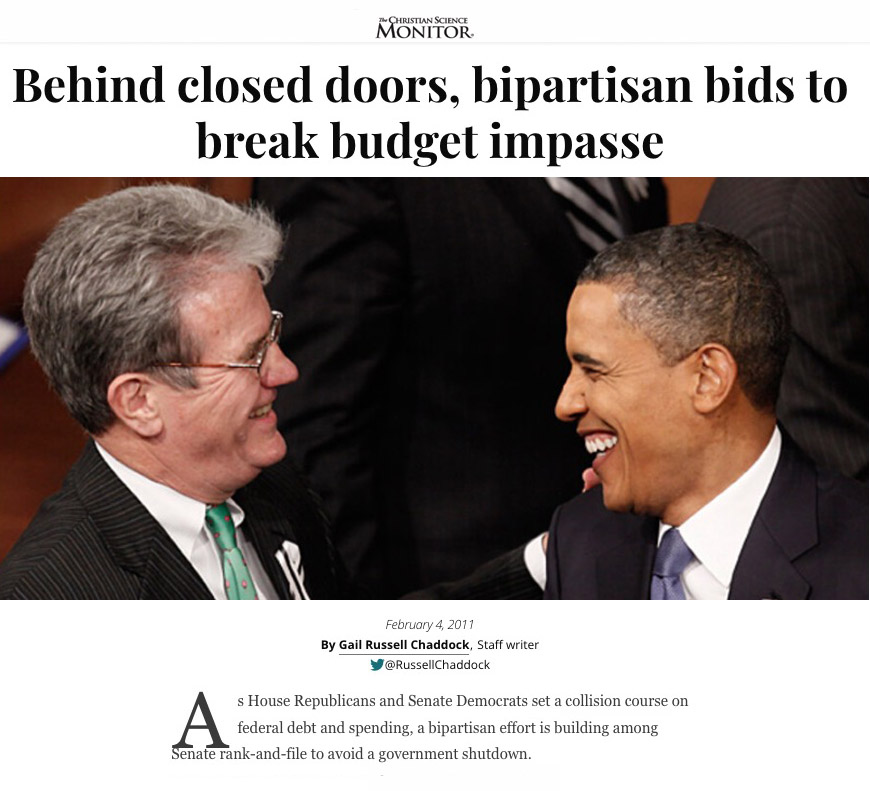
Gail Russell Chaddock 2011 - Behind closed doors, bipartisan bids to break budget impasse

Gail Russell Chaddock 2011 - Behind closed doors, bipartisan bids to break budget impasse
Pozen has argued in recent work that FOIA’s request-and-respond model— identified by Gregory Michener (chapter 13) as an archetype of the Transparency-as-Leverage Paradigm—“empowers opponents of regulation, distributes government goods in a regressive fashion, and contributes to a culture of contempt surrounding the domestic policy bureaucracy while insulating the national security state from similar scrutiny.” Some of these effects, as Sam Lebovic demonstrates (chapter 1), were anticipated by agencies such as the Department of Health, Education, and Welfare in the early 1960s when the law was still being conceived in Congress. Over time, Pozen suggests, FOIA may have come “to legitimate the lion’s share of government secrecy while delegitimating and debilitating government itself.” Even if FOIA represented a progressive breakthrough at its creation, the rise of mass communications technologies, statutory reporting requirements, whistleblower protection laws, external watchdog groups, and internal oversight mechanisms, among other developments, has changed the act’s practical and normative meaning.David Pozen & Michael Schudson 2018
Troubling Transparency
At the same time, a growing number of scholars, advocates, and regulators have begun to raise hard questions about the costs and limits of the transparency movement. Some of these commentators accept the movement’s standard premises and prescriptions but worry that open government measures are not actually delivering the openness they promise due to inadequate legislative funding, bureaucratic resistance, or cramped judicial interpretations. Others wonder whether traditional open records and open meetings laws are well suited to twenty-first-century transparency challenges, or whether these laws need to be reimagined for the digital age. A third group of commentators has thrown a harsh light on transparency’s political and administrative effects, emphasizing its potential to facilitate “neoliberal” agendas or to undermine deliberation, deal-making, and institutional capacity.David Pozen & Michael Schudson 2018
Troubling Transparency
By using the term “secret law” to describe what Congress is doing here, I do not mean to suggest anything nefarious. Having served in all three branches of government, including in the Intelligence Community, I have the greatest regard for the public servants who draft and implement secret law, and for the very real national security considerations that drive its creation. I mean only that there is a body of law that meets the following definition: legal authorities that require compliance that are classified or otherwise unpublished.Dakota S. Rudesill 2016
Classified Legislation: Tracking Congress’s Library of Secret Law
The House elected the Speaker via secret ballot for the first half century of its history. Until the onset of viva voce balloting for Speaker (and other House officers, such as Clerk and Printer) in 1839, the House left no direct evidence about who supported whom at any step in the process.Jeffery A. Jenkins, Charles Stewart III 2013
Fighting for the Speakership
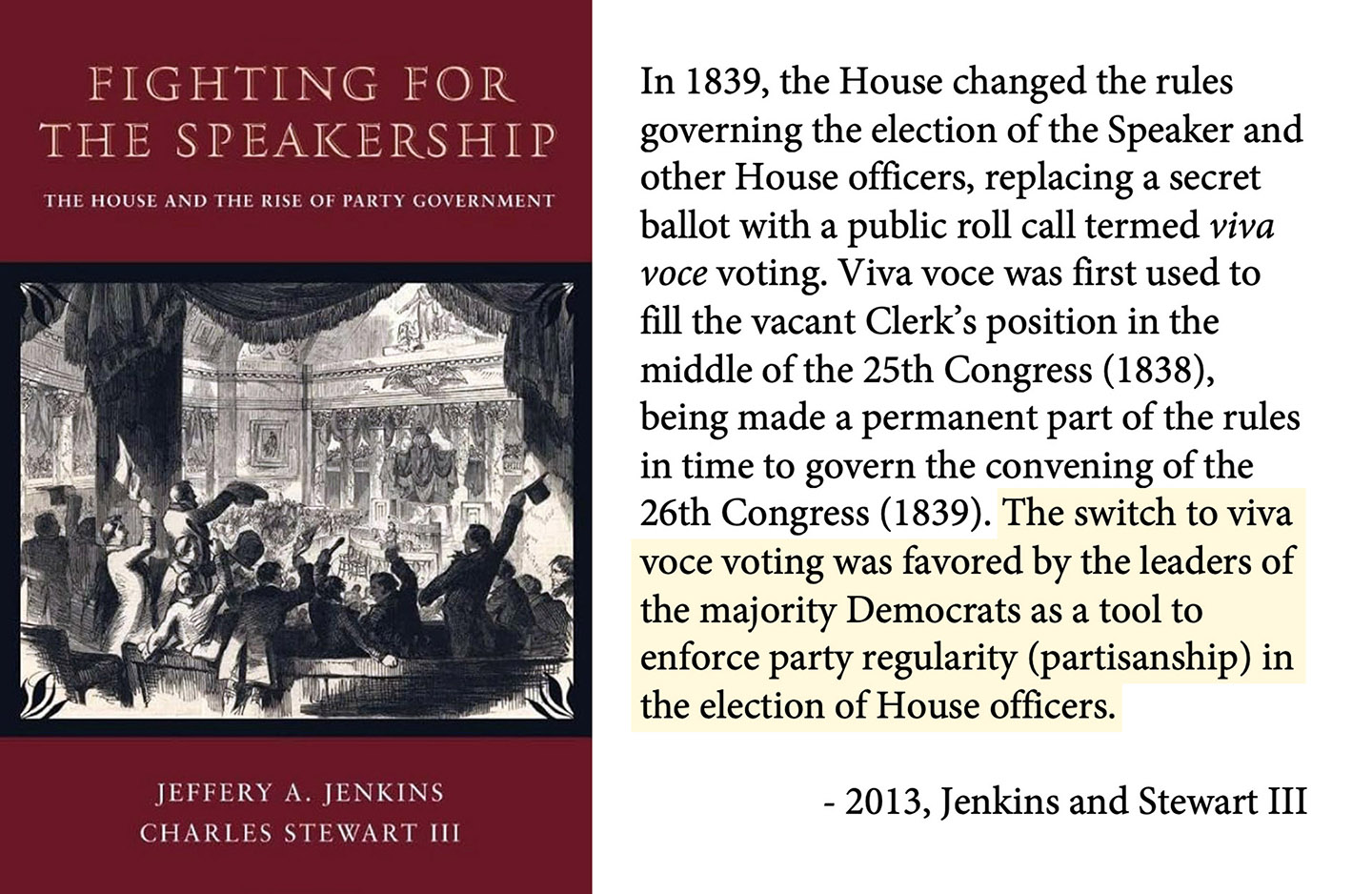
Jeffery A. Jenkins, Charles Stewart III 2013 - Fighting for the Speakership
In 1839, the House changed the rules governing the election of the Speaker and other House officers, replacing a secret ballot with a public roll call termed viva voce voting. Viva voce was first used to fill the vacant Clerk’s position in the middle of the 25th Congress (1838), being made a permanent part of the rules in time to govern the convening of the 26th Congress (1839). The switch to viva voce voting was favored by the leaders of the majority Democrats as a tool to enforce party regularity (partisanship) in the election of House officers. The viva voce mechanism worked as predicted for a few Congresses, but in the end became one of the best examples of the Law of Unintended Consequences in the history of the House. If party leaders could now observe how the rank-and-file voted, so, too, could constituents and activists who cared more about the most pressing social issue of the day, slavery, than the smooth functioning of a spoils-based party system.

Jeffery A. Jenkins, Charles Stewart III 2013 - Fighting for the Speakership
Deals that could have been cut within the major party in the secret ballot days no longer worked in the viva voce (roll call) voting days (1840s), as members were afraid of losing their constituents’ trust by voting for a candidate from the other region (based on slavery).Jeffery A. Jenkins, Charles Stewart III 2013
Fighting for the Speakership
In exploring news organizations’ FOIA requests to fourteen federal departments and agencies, however, I find that journalists’ use of FOIA has been declining over time. Who is doing the requesting is also changing. FOIA requests by local newspapers are down significantly, and those by other media such as niche outlets that cater to specific participants in the business of governing (such as lobbyists, interest group leaders, agency and congressional staff, and government affairs specialists in companies) are on the rise. James T. Hamilton 2018
Troubling Transparency
A decade after Congress voted to open all committee sessions to the public in the interests of “government in the sunshine,” some of its most important committees have started closing legislative voting sessions, saying they can get more done behind closed doors…Such closed sessions are held because members have expressed the feeling that they can arrange compromises more easily when lobbyists cannot watch their every move and every decision does not have to recorded formally. Spencer Rich 1985
Washington Post
From 1581 onwards, brief summaries of [Parliamentary] debates, though without rude comments, appear in the Commons’ Journals. As Crown and Members clashed, however, this became dangerous, and eventually in 1628 the Commons ruled that “the entry of the Clerk, of particular men’s speeches, was without warrant at all times, and, in that Parliament, by Order of the House, rejected”. A little later, Sir Edward Dering summed it up: “he did not dream we should tell stories to the people”. This remained the rule for the Commons, and indeed also for the Lords, from then onwards for nearly two centuries. But there were Members busily jotting down notes; and also members of the public extremely anxious to find out what was going on. A slight concession from the House came during the Popish Plot scare in 1680 when Votes and Proceedings were first ordered to be printed and issued to the public. This publication was, however, somewhat dry fare, and the Commons did not face the issue of “letting the public know” until 1738. Opinions were then mixed. Wyndham thought the public ought to be able to judge of the merits of their representatives; but Pulteney refused to be made accountable without doors for what he said within; and Walpole was certain that if speeches were published no Member would be safe against misrepresentation.Maurice Bond & Horace King 1966
The History of Parliament
After the decisions that counted turned on informal agreements and unwritten understandings.William M. Lunch 1987
The Nationalization of American Politics
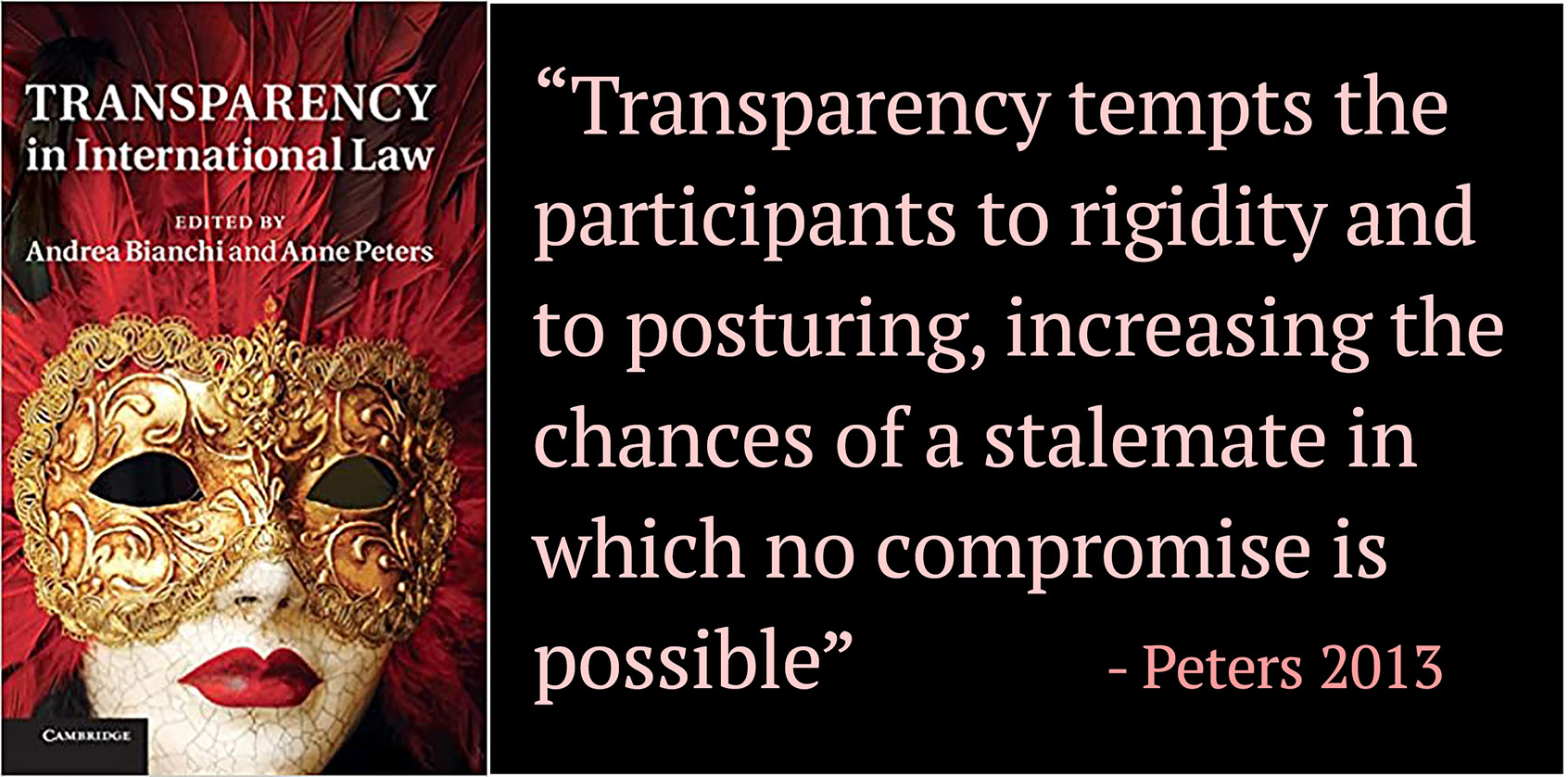
Anne Peters 2013 - Transparency in International Law

Anne Peters 2013 - Transparency in International Law
The ‘Transparency Turn’ in Global Governance
Transparency has been called ‘an overused but underanalysed concept’. This certainly holds true for contemporary international law. In all major fields of international law – e.g. [climate] environmental law, economic law, human rights law, international humanitarian law, health law, peace-and-security law – demands for more transparent institutions and procedure. have recently been voiced by civil-society actors, by States, and within the international institutions themselves.
Negative Effects of Transparency
Han Morgenthau warned against ‘the vice of publicity’ in diplomatic negotiation : ‘[i]t takes only common sense derived from daily experience to realize that it is impossible to negotiate in public on anything in which parties other than the negotiators are interested.’ In a judgment relating to the Watergate scandal, the US Supreme Court stated: ‘[h]uman experience teaches that those who expect public dissemination of their remarks may well temper candour with a concern for appearances and for their own interests to the detriment of the decision-making process.’
Therefore, in order to mitigate the negative effects of transparency on deliberations, transparency laws and policies will typically contain ‘deliberative exceptions’. For example, in the European Union [EU], access to an institutional document ‘which relates to a matter where the decision has not been taken by the institution, shall be refused if disclosure of the document would seriously undermine the institution’s decision-making process, unless there is an overriding public interest in disclosure.’ Luis Miguel Hinojosa Martinez quotes the World Bank’s justification for secret deliberations: ‘if the view of each ED [Executive Director] is immediately known to the public, it may put undue pressure on EDs, and could also politicize the Bank’s decision-making process’ – and above all for those executive directors who represent several constituencies.
Are deliberation exceptions justified? What exactly are the inhibiting effects of allowing non-participants to listen to deliberations? Sissela Bok has described these as follows: when deliberating before an audience, the deliberants tend to become more inflexible, more radical, and/or they lose candour, becoming averse to risky or innovative opinions. Transparency tempts the participants to rigidity and to posturing, increasing the chances of a stalemate in which no compromise is possible, or alternatively, of a short-circuited and hasty agreement. To pull back from a bargaining position, often done solely for strategic purposes, might be interpreted, if done in full view of the public, as giving in to an opponent. The public gaze tempts deliberators to bypass creative or still tentative idea and leads to premature closure. In sum, the chances for collective learning are diminished.
Concomitantly, the beneficial effect of excluding the public from deliberation is that this allows for fuller consideration of the matter at hand. Deliberators dare to express controversial views behind closed doors, but they also feel as if they have greater freedom to change their minds. They can engage in a tentative process of learning and of assimilating information, considering alternatives and weighing consequences – all of which is needed to arrive at a coherent position. In sum, deliberation behind closed doors can proceed through a process of trial and error, through proposal and counterproposal, through persuasion and bargaining, and sometimes through threat. This is impossible with pressure from the public, including that exerted by special interest groups.
The judicial deliberation and drafting of decision is usually shielded from scrutiny in the sphere of international adjudication, and the rule of various international courts show ‘a considerable degree of uniformity’ in this respect. Neumann and Simma mention a number of reasons why the secrecy of deliberations in international adjudication is even more important than in the domestic realm – notably to prevent government from controlling judges.
In international law-making (treaty negotiation), an aggravating factor of transparency is that the inflexibility and posturing of participants as well as the public pressure of domestic constituencies or special interest groups may frequently lead to a complete breakdown of negotiations so that no desirable outcome results. In fact, these were the reasons given by the representatives of the Great Powers at the opening of the 1919 Paris Peace Conference: ‘[O]pen proceedings would lead to premature public controversy, not only within the interested state, but between the interested nations, render infinitely more difficult the process of give and take, so essential to the negotiations, and hinder the unanimity of agreement which is vital to success’.Anne Peters 2013
Towards Transparency as a Global Norm
The paper’s conclusion is that there is a very broad tendency towards transparent government all over the world, which has not been seriously called into question by the current rise of security concerns.Anne Peters 2010
Transparency, Secrecy, and Security: Liaisons Dangereuses
Senator Mitchell has repeatedly said that he has conducted the back-room negotiations because without them he would be unable to block or end a filibuster.Philip Shabecoff 1990
Mitchell Set to Move a Clean Air Bill to Senate Floor
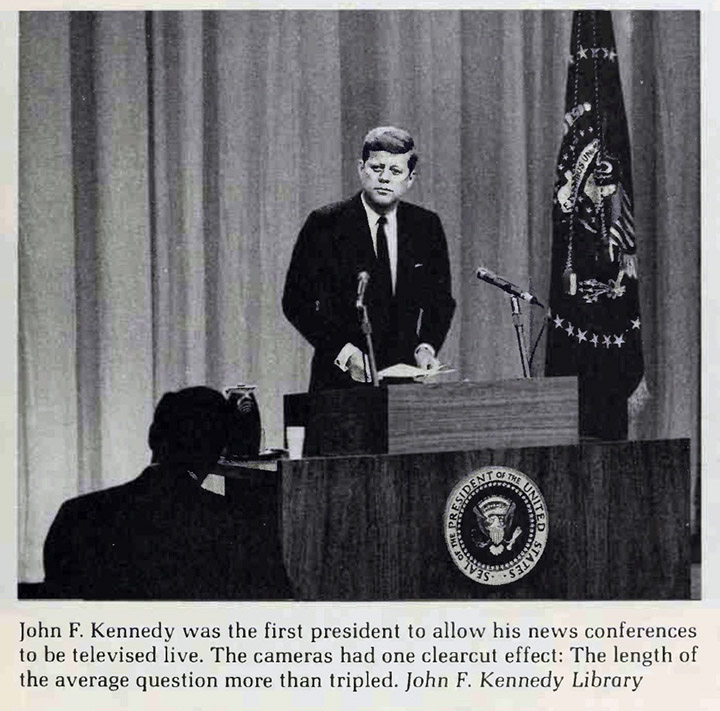
Stephen Bates 1991 - If No News, Send Rumors

Stephen Bates 1991 - If No News, Send Rumors
Reformers in the 1970s also sought to increase transparency in Congress through “sunshine laws” so that the public could more easily observe the actions of members and hold them accountable for their decisions. These changes may have had the unintended consequence of making it more difficult for members to reach compromises and negotiate solutions. Congress adopted a series of important sunshine laws in the 1970s (Rieselbach 1986, Wolfensberger 2000). Previously, committees had routinely met behind closed doors, allowing members to hash out their differences in private. The Legislative Reorganization Act of 1970 opened committee proceedings to media broadcasts to make them visible to the public. The House and Senate also required that committee sessions, including critical mark-ups of legislation, be open to the public unless the panel voted to close them. A second reform targeted voting. The House ended its practice of reporting vote tallies rather than the votes of individual members. Reporting tallies allowed members to keep their vote secret from their constituents. Reformers wanted member votes to be public in order to ensure members could be held accountable for their actions. Finally, the House and the Senate both allowed the proceedings on the floor to be televised on C-SPAN. Sunshine laws are generally regarded as a public good on the grounds that transparency allows the public to hold politicians accountable for their actions. However, some research finds that transparency may actually harm democratic deliberation by making it more difficult to reach compromises. Congressional scholars Sarah Binder and Frances Lee observe that transparency in Congress is a “double-edged sword” that raises the costs of deal-making and interferes with the search for solutions (Binder and Lee 2013, 63-64). It is costly for members to compromise on a position important to interest groups and voters, and public negotiations may undermine the horse-trading common to successful agreements. From this perspective, secrecy and privacy are required for members to resolve their differences, and sunshine laws may have had the unintended consequence of making the passage of appropriations bills more difficult.Peter C. Hanson 2015
Restoring regular order in congressional appropriations
If open talks between states are politically impossible, negotiators and their backers sometimes resort to [secret] “back-channel diplomacy.” When discussions focus on contentious issues, or avowed enemies are searching for a path to peace, back channels can offer a space to pursue unorthodox solutions and long shots, to build trust (or at least get to know one another), and to float ideas without major political or public consequences.Peter Jones 2018
Chasing the Impossible Dream
Back-channel [secret] negotiations have been used in numerous conflicts across the globe, including the Israeli-Palestinian peace process from 1994 to 1996 and the Iranian hostage crisis in 1979–1980. In 1985, the imprisoned Nelson Mandela conducted back-channel negotiations with South Africa’s minister of justice, Hendrik Jacobus Coetsee, that laid the groundwork for the end of the apartheid era. And back-channel negotiations helped to resolve the New York City transit strike negotiations of December 2005.Harvard Law 2023
The Pros and Cons of Back-Channel Negotiations
Political scientists have argued that reducing transparency in Congress could improve negotiating conditions and aid the passage of legislation. I am skeptical that members would view this step to be in their electoral interest, but it is possible that giving members a greater degree of insulation from the intense gaze of interest groups and the public would improve their ability to negotiate and pass spending legislation in regular order. Effective negotiations require privacy that is hard to come by in the wake of the sunshine laws passed in the 1970s. Committee meetings are now routinely open to the public, and floor proceedings are broadcast on C-SPAN. Most controversial votes are recorded. Members who stray from the party line to work with the other side in this environment are immediately criticized. Arguably, one of the reasons Congress may have turned to the creation of omnibus bills is because they are informally negotiated behind closed doors. They may offer exactly the kind of flexibility and privacy members need to make compromises. It is possible that members could more easily reach agreement on bills in the regular order if there were more opportunities for private negotiation or fewer recorded votes. For example, each chamber could report vote tallies on appropriations bills rather than the votes of individual members. Members might be more likely to cast tough votes if their decisions were shielded from direct view. The primary problem with this approach is that transparency is highly valued by numerous stakeholders who are likely to strongly oppose any effort to allow members to make decisions in secret. With a few notable exceptions such as the limits placed on disclosure requirements in campaign finance laws by the Supreme Court, the political system has moved toward greater rather than less transparency. Sites like Congress.gov make bills, reports and votes immediately accessible to the public. Members and party organizations use Twitter to blast out links to information and to take positions on a continuing basis. The lack of transparency in creating an omnibus bill is one of the key criticisms that members, journalists, interest groups and scholars have made of the process. Transparency is generally valued as a way to prevent corruption, while secrecy is equated with inappropriate influence and shady dealings. It is likely that members advocating fewer recorded votes or closing committee meetings would be subject to strong criticism, and for that reason would perceive it to be against their electoral interests.Peter C. Hanson 2015
Restoring regular order in congressional appropriations
Before government was conducted out in the sunshine, senators could vote as they pleased, good or bad, with little voter retribution on individual issues. But in the 1970’s national associations by the dozens were setting up shop in Washington, right down to the beekeepers and mohair producers, and with them came a new threat to the integrity of the legislative process: “single issue” politics. These groups developed very harsh methods of dealing with those who crossed them. Suddenly, every vote began to have political consequences. Congress began to finesse the tough issues and tended to straddle every fence it couldn’t burrow under. Consequently, Congress is failing to get its work done.Senator Dale Bumpers 1999
How Sunshine Harmed Congress
Enhanced secrecy helps Congress mute lobbyist pressure.James Curry & Frances Lee 2019
Can America Govern Itself?
Viewing open meeting laws in the context of the First Amendment [raises] concerns, especially when the state imposes criminal penalties [or other punishments] on violators. Christopher J. Diehl 2010
Open Meetings and Closed Mouths
The more you open up the process, the more people are paid to come up here and – increase spending!James L. Payne 1991 (interview)
Culture of Spending
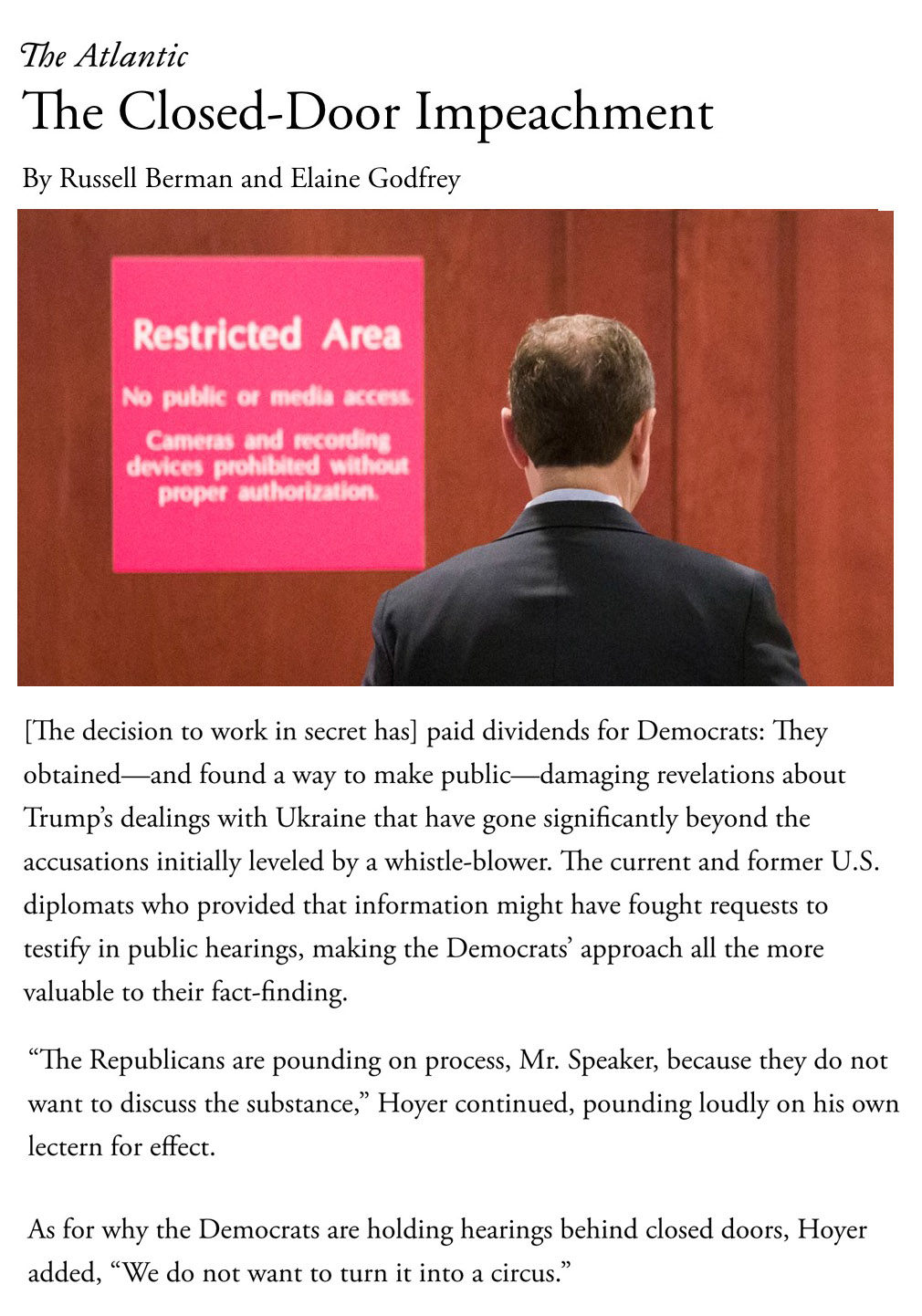
Russell Berman, Elaine Godfrey 2019 - Closed-Door Impeachment
Text: [The decision to work in secret has] paid dividends for Democrats: They obtained—and found a way to make public—damaging revelations about Trump’s dealings with Ukraine that have gone significantly beyond the accusations initially leveled by a whistle-blower. The current and former U.S. diplomats who provided that information might have fought requests to testify in public hearings, making the Democrats’ approach all the more valuable to their fact-finding. “The Republicans are pounding on process, Mr. Speaker, because they do not want to discuss the substance,” Hoyer continued, pounding loudly on his own lectern for effect. As for why the Democrats are holding hearings behind closed doors, Hoyer added, “We do not want to turn it into a circus.”

Russell Berman, Elaine Godfrey 2019 - Closed-Door Impeachment
[Wilbur] Mills tried to constrain the growth of the tax-break system. He often closed meetings to insulate Ways and Means from the demands of clientele groups and other lawmakers and he used special rules to protect carefully crafted tax packages from particularistic amendments on the floor. But Mills was thrown from power in 1974 after a sex scandal, and Watergate-era congressional reforms weakened the power of subsequent committee chairmen. The effect was to open the tax writing system to broader public participation and political influences. The immediate winners from these changes were lobbyists, who found it easier to obtain special tax benefits for their clients.Eric Patashnik 2018
Reforms at Risk
Lawmakers have been striking important deals lately. The lack of fanfare is intentional.Russell Berman 2022 Atlantic Magazine
Shadow Congress
Most of these meetings occur behind closed doors so lawmakers can escape pressures from lobbyists and reporters, who have made it more difficult for them to handle business “in the sunshine.” This procedure was an integral feature of the 1990 Clean Air Act: virtually none of its major sections resulted from votes on the Senate or the House floor.Richard Cohen 1994 p88
Washington at Work: Back Rooms and Clean Air (Climate)Note: This citation refers to the successful passage of the 1990 Clean Air Amendments (the most powerful environmental legislation in the past 40 years), which were brokered almost exclusively behind closed doors by Mitchell and others expressly to avoid the pressure of lobbyists. Full citation can be found here.
[Open government] creates a “transparency illusion,” promising consequential accountability that transparency cannot deliver.Mike Ananny & Kate Crawford 2016
Seeing without knowing: Limitations of the transparency ideal and its application to algorithmic accountability
Secrecy ultimately protected everyone’s freedom.Filippo Di Vivo 2007
Information and Communication in Venice
The obsession with transparency is the tip of the spear of excessive democratization ... No serious person would argue that generals should plan military maneuvers on C-SPAN.Jonah Goldberg 2023
Representation vs. Democracy
For very understandable reasons, we tend to confuse or conflate democracy and representation. The thing about representation — or republicanism — is that it leaves room not just for things like compromise, buy-in, etc. It leaves room for better arguments to win. Everyone hates closed-door-meetings and backroom deals. We’re told that transparency is always better. But if the Constitutional Convention — the mother of all smoke-filled-room meetings—had been open to the public, they’d never have written the Constitution. The obsession with transparency is the tip of the spear of excessive democratization. To have a serious argument or negotiation you can’t have voters watching your every move. You need the freedom to offer concessions that your voters won’t like in the abstract in exchange for concessions your opponents’ voters won’t like. Behind closed doors, representatives can entertain new ideas and compromises. Hyper transparency and democracy removes agency from the people tasked with doing what’s best for the country. We all understand this about all sorts of other important endeavors. No serious person would argue that generals should plan military maneuvers on C-SPAN. Who would want a surgeon to check with voters mid-operation? There’s a reason why judges will often meet with lawyers in their chambers and not in front of the jury. Every editorial board that spews out demands for more democracy and more transparency meets behind closed doors to debate the contours of the editorial. But for some idiotic reason we think politicians should behave like video game avatars of the most engaged and interested voters and viewers. The people who disagree with me on this stuff will often get very pious about the righteousness of politicians doing whatever “the voters” want them to do. That’s democracy! Don’t you understand!? But most voters aren’t in fact paying close — or even any — attention to what happens in Washington. The “will of the voters” is a high-minded term for the will of a tiny sliver of voters and interests who want to keep politicians on their leash. Let politicians have the power to make deals and decisions. Let them haggle. Give them the room to do what they think is best for the country and for the voters not paying much attention. In short, let them represent the interests of the country as they see them. And if—or when—they ultimately screw it up, vote them out. That’s what democracy is for. Jonah Goldberg 2023
Representation vs. Democracy
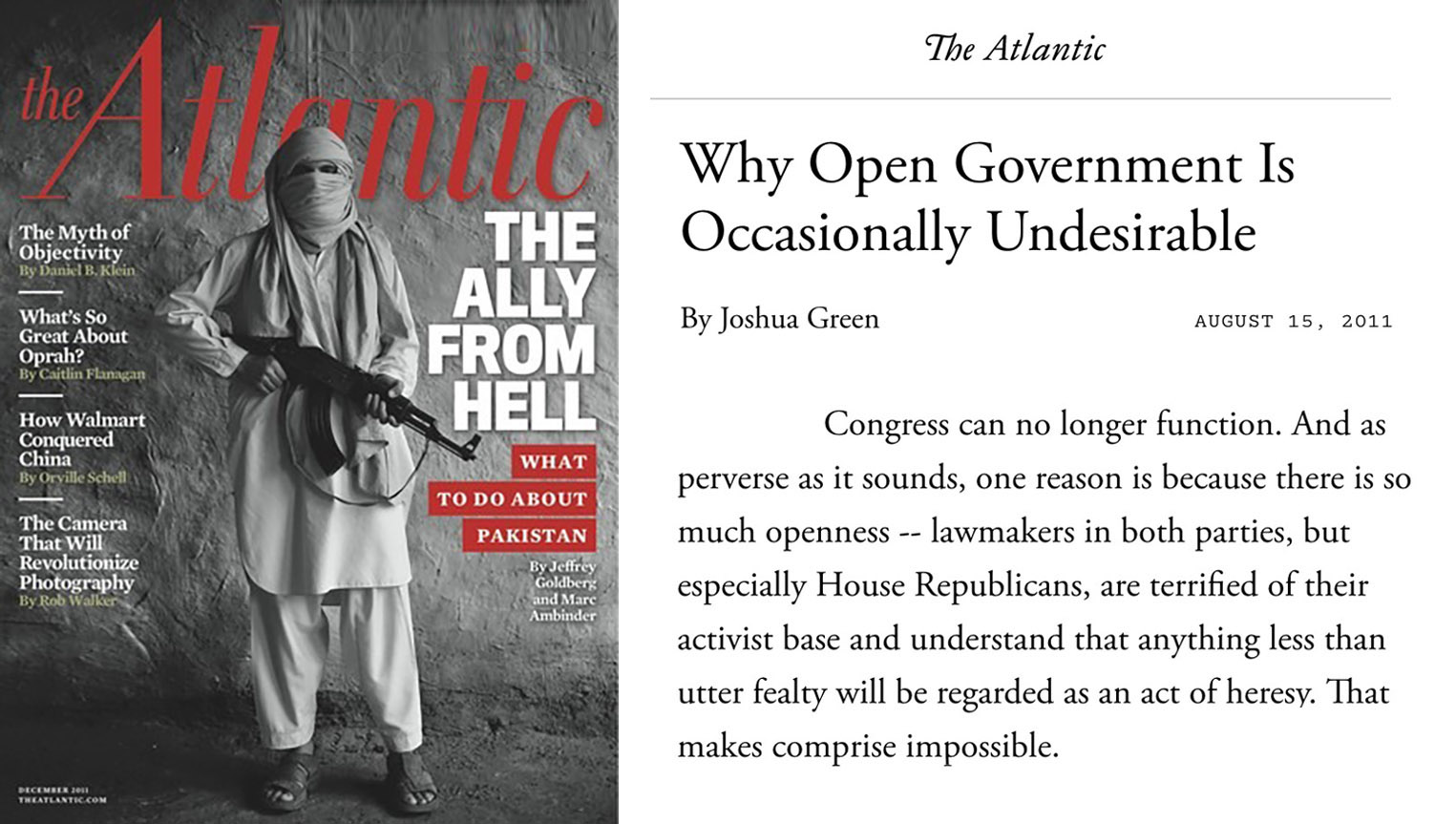
Joshua Green 2011 - Why Open Government Is Occasionally Undesirable

Joshua Green 2011 - Why Open Government Is Occasionally Undesirable
Congress can no longer function. And as perverse as it sounds, one reason is because there is so much openness -- lawmakers in both parties, but especially House Republicans, are terrified of their activist base and understand that anything less than utter fealty will be regarded as an act of heresy. That makes comprise impossible.Joshua Green 2011
Why Open Government Is Occasionally Undesirable
The [sunshine] reforms also increased the number of recorded votes and opened up committee meetings… making it easier for constituents and interest groups to bring pressure to bear.David Vogler & Sidney Waldman 1985
Congress and Democracy
Transparency in government has gone too far. Jonah Goldberg 2023
AEI Fellow 'In No Particular Order'
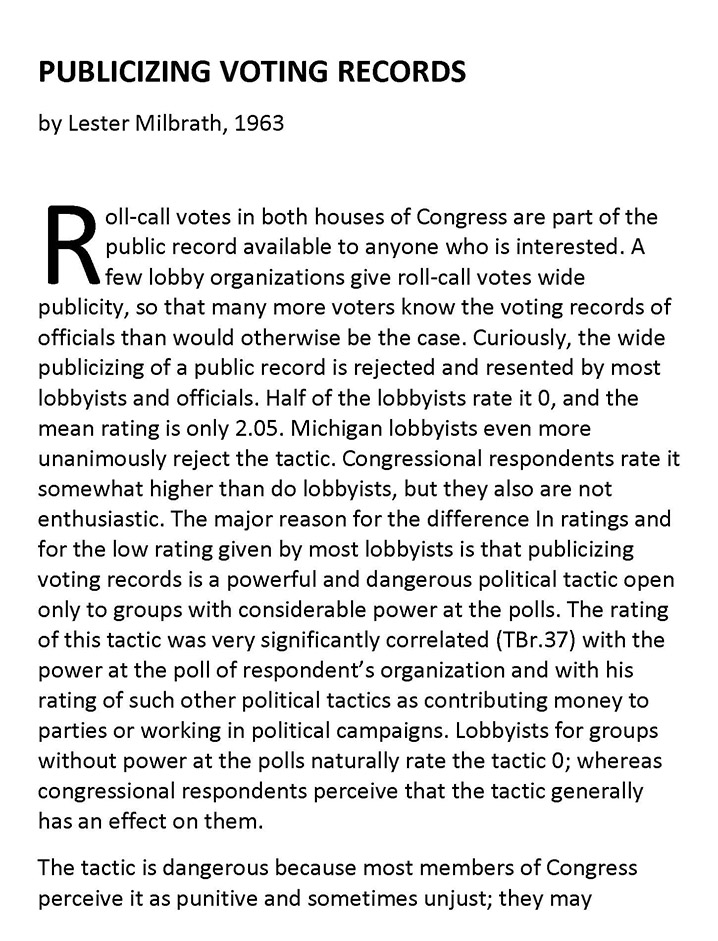
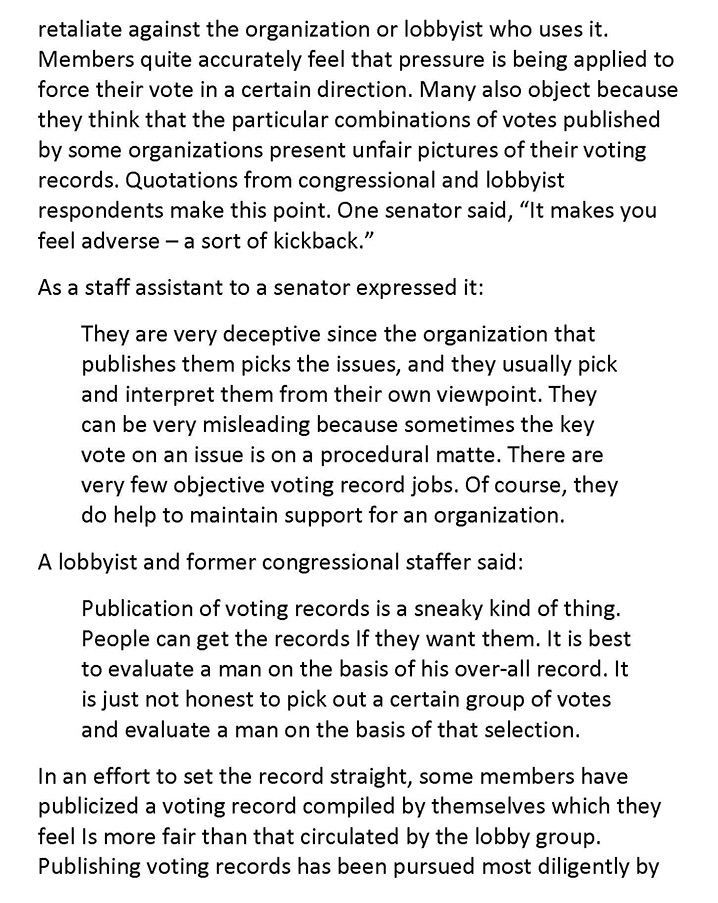
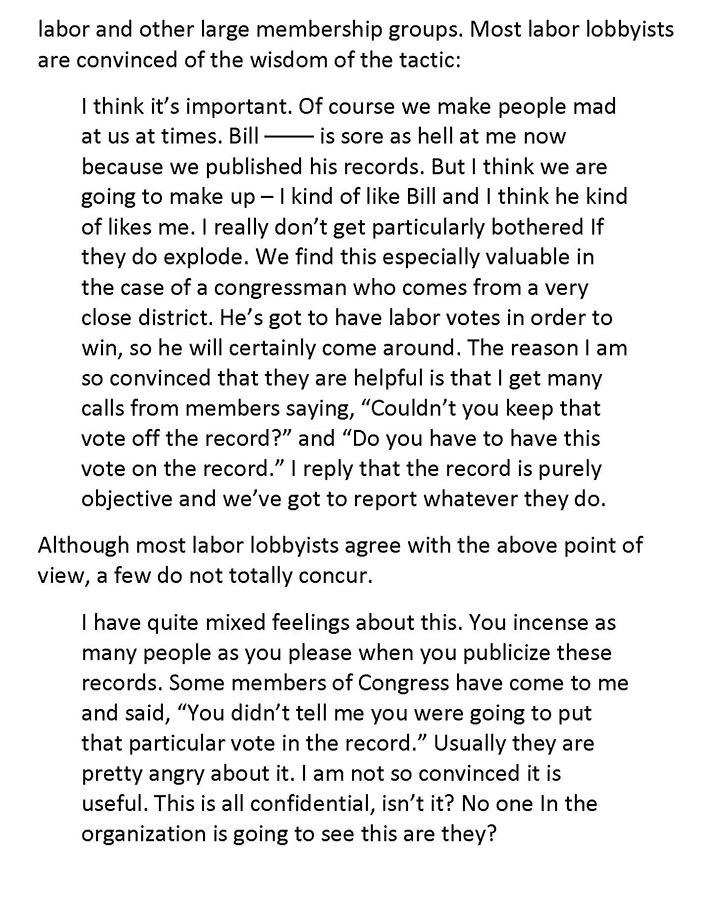
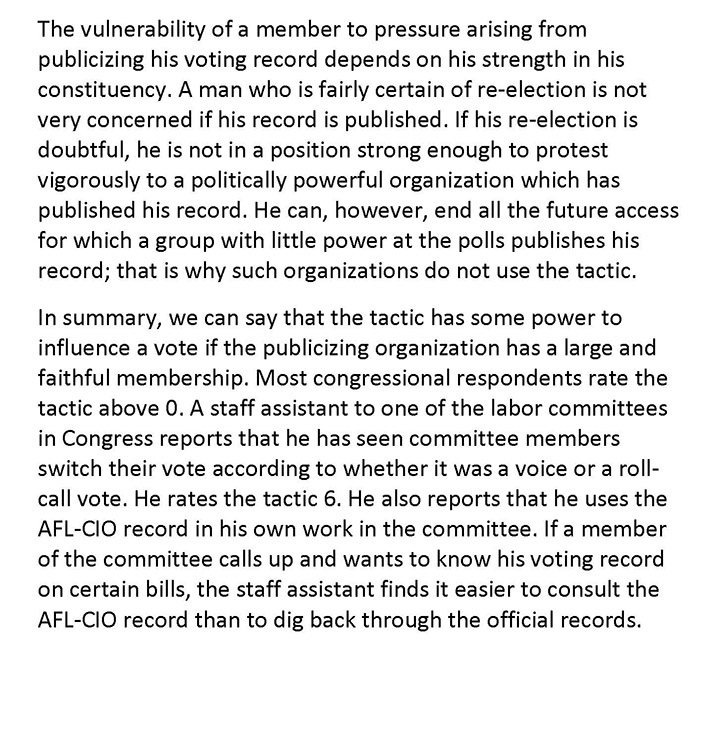
Lester Milbrath 1963 - The Washington Lobbyists (Scoring)

Lester Milbrath 1963 - The Washington Lobbyists (Scoring)
Mandated disclosure may be the most common and least successful regulatory technique in American law.Omri Ben-Shahar & Carl E. Schneider 2014
More Than You Wanted to Know: Failure of Mandated Disclosure
There is no question that the fact that teller votes are not recorded is beneficial to some Representatives on certain issues. Anonymity is assured and they can vote without fear of interest groups or constituents finding out…this may allow the Member to vote his conscience without fear of retribution…Rep Bill Steiger 1970
Congressional Record - House
Transparency makes it easier for lobbyists to monitor and pressure Congress.Frances Lee (Princeton) 2019
Select Committee on the Modernization of Congress
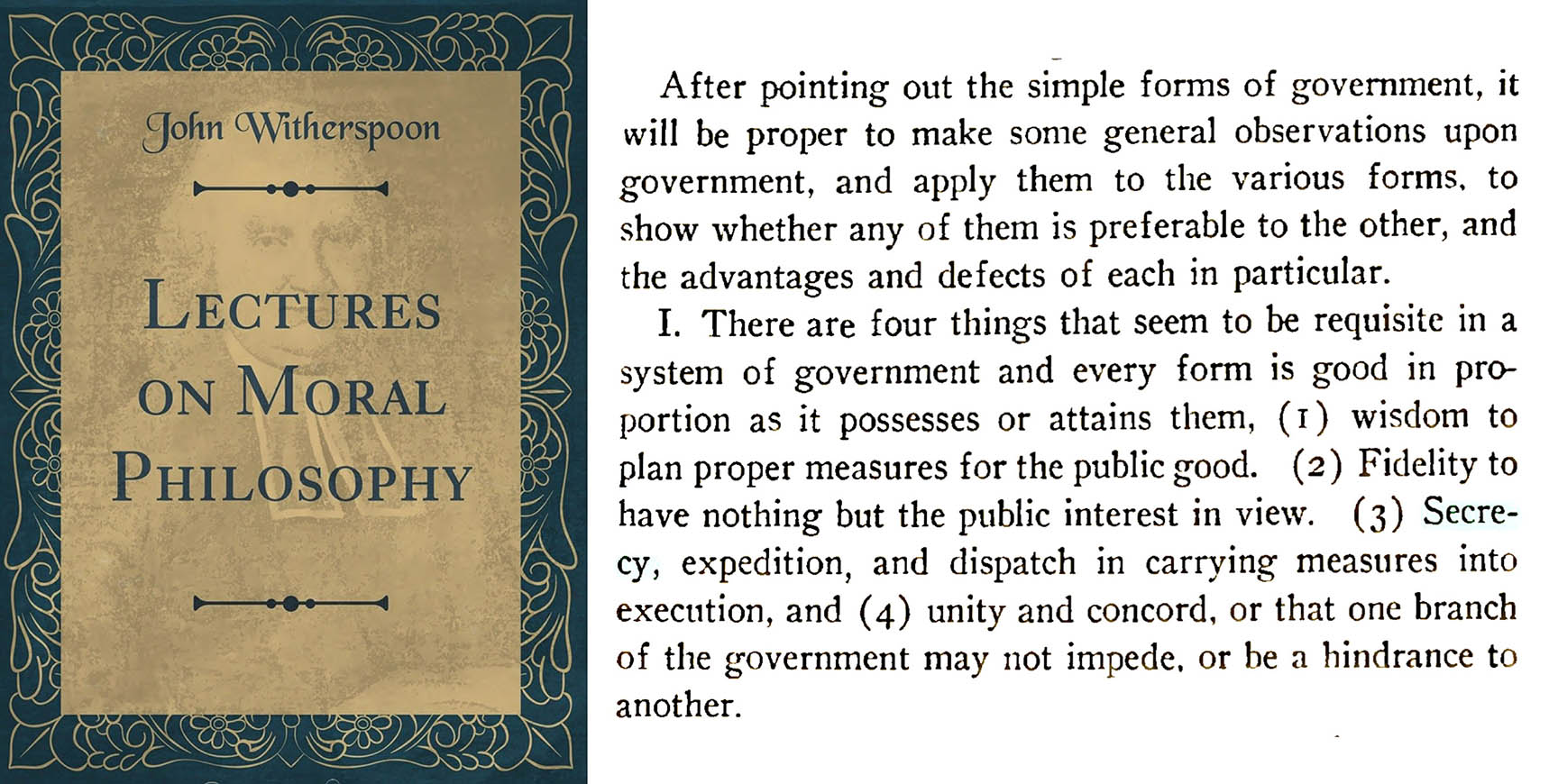
John Witherspoon (Signer of Declaration & Madison’s professor) 1700s - Importance of Secrecy
Text: After pointing out the simple forms of government, it will be proper to make some general observations upon government, and apply them to the various forms, to show whether any of them is preferable to the other, and the advantages and defects of each in particular. I. There are four things that seem to be requisite in a system of government and every form is good in proportion as it possesses or attains them, (1) Wisdom to plan proper measures for the public good. (2) Fidelity to have nothing but the public interest in view. (3) Secrecy, expedition, and dispatch in carrying measures into execution, and (4) unity and concord, or that one branch of the government may not impede, or be a hindrance to another.

John Witherspoon (Signer of Declaration & Madison’s professor) 1700s - Importance of Secrecy
The end of secrecy would be the end of politics.Byung-Chul Han 2012
The Transparency Society
The relentlessly open quality of congressional procedures is one of the reasons Congress is among the least liked institutions, political or nonpolitical.John Hibbing & Elizabeth Thierse-Morse 2004
Stealth Democracyhttps://twitter.com/JamesGDAngelo/status/1723385391162511804
It is clear that unbounded transparency can trigger negative externalities, such as stifled deliberation and hefty bureaucratic burdens.Gregory Michener 2018
Gauging the Impact of Transparency Policies
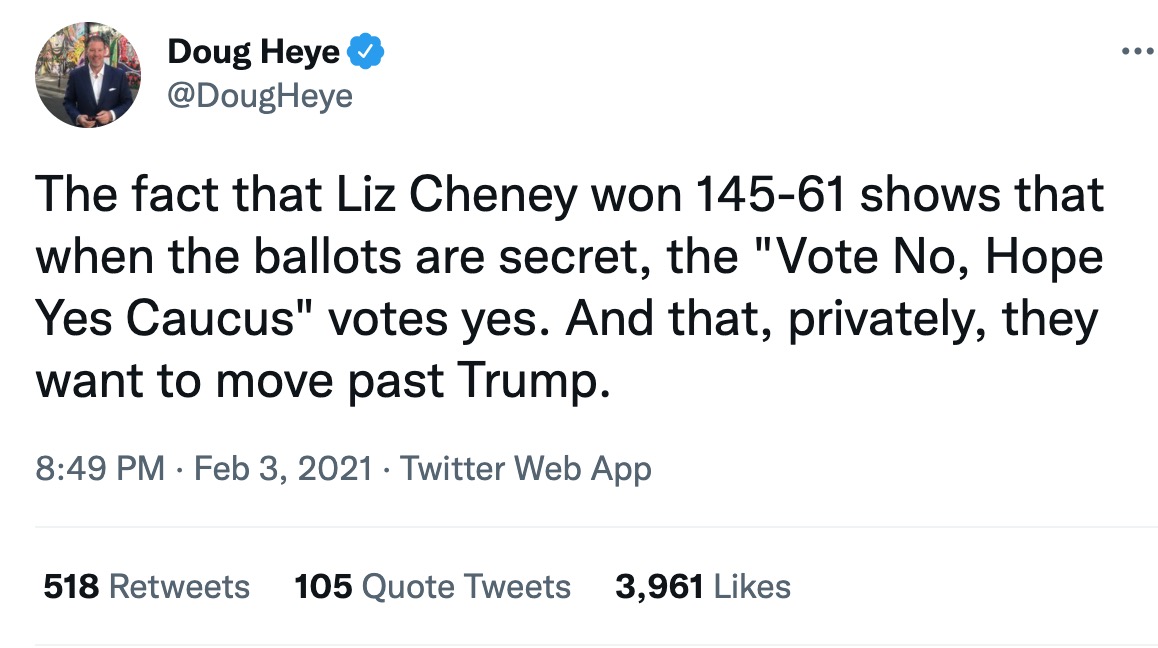
2021 Liz Cheney retains leadership role via secret ballot despite attacks on Trump

2021 Liz Cheney retains leadership role via secret ballot despite attacks on Trump
In the privacy of closed-door sessions, lawmakers are better able to reason on the merits of public policy without fear that their enemies will turn their words against them.Joseph Bessette & John Pitney 2011
American Government and Politics
Sunshine laws – open meetings and recorded votes – resulted in an inability of legislators to not confer favors.John Witte 1982
The American Journal of Tax Policy
“We had open and closed sessions during the Clinton trial,” Daschle said. “Surprisingly, we found that the closed sessions were oftentimes more productive. There was more candor, less public positioning, fewer speeches directed to the cameras. There is a need for both open and closed sessions.”Carl Hulse 2020
NY Times – Impeachment Out Of Public View
The irony is that we’ve come full circle: Efforts to open up government to the public have, by and large, expanded the tool kit and influence of highly organized and well-funded “special” interests. Jason Grumet 2014
The Dark Side of Sunlight (City of Rivals)
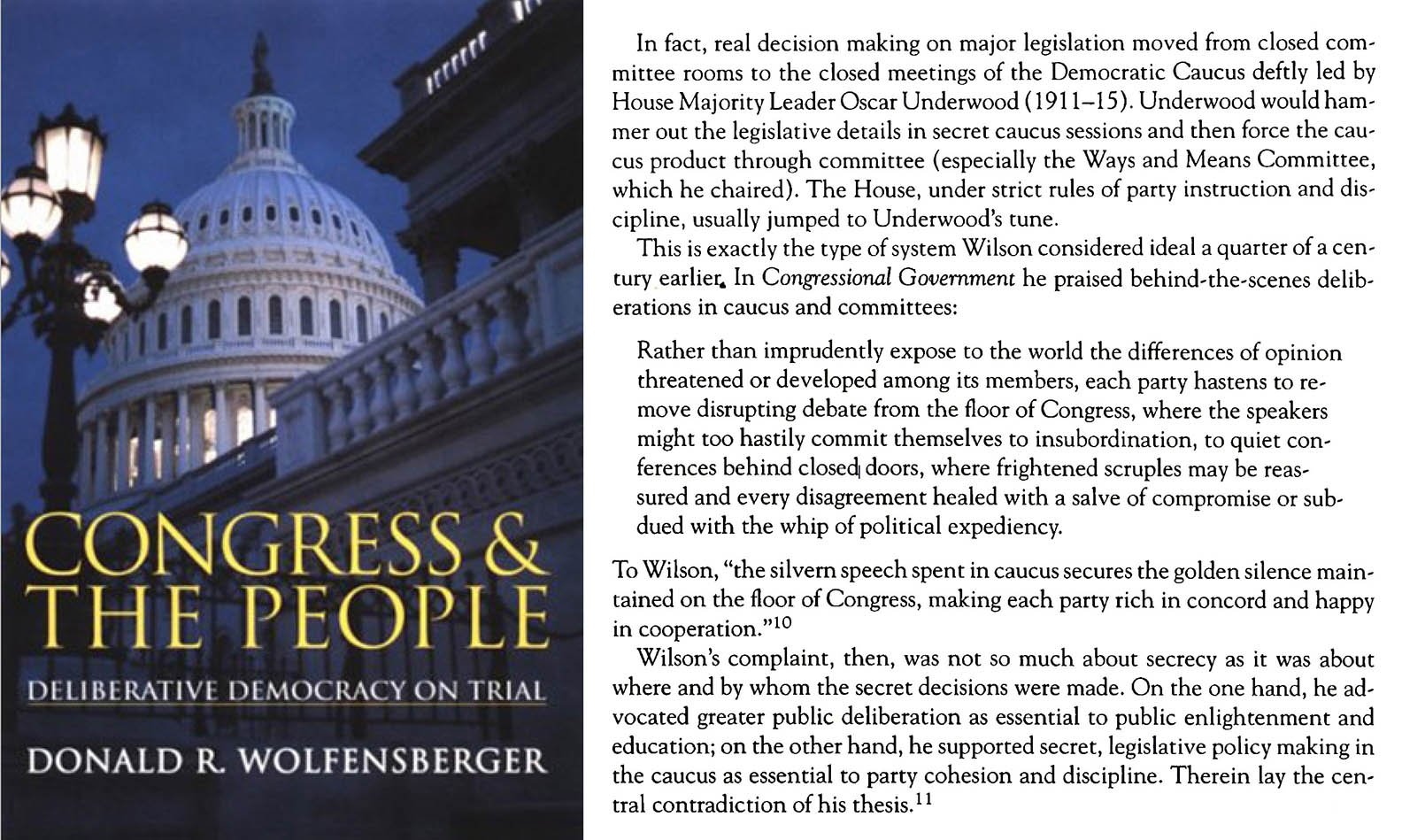
Donald Wolfensburger 2000 – Secret Impeachment Hearings Soften Partisanship Messaging
Text: In fact, real decision making on major legislation moved from closed committee rooms to the closed meetings of the Democratic Caucus deftly led by House Majority Leader Oscar Underwood (1911-15). Underwood would hammer out the legislative details in secret caucus sessions and then force the caucus product through committee (especially the Ways and Means Committee, which he chaired). The House, under strict rules of party instruction and discipline, usually jumped to Underwood’s tune. This is exactly the type of system Wilson considered ideal a quarter of a century earlier; In Congressional Government he praised behind-the-scenes deliberations in caucus and committees: “Rather than imprudently expose to the world the differences of opinion threatened or developed among its members, each party hastens to remove disrupting debate from the floor of Congress, where the speakers might too hastily commit themselves to insubordination, to quiet conferences behind closed doors, where frightened scruples may be reassured and every disagreement healed with a salve of compromise or subdued with the whip of political expediency.” To Wilson, “the silvern speech spent in caucus secures the golden silence maintained on the floor of Congress, making each party rich in concord and happy in cooperation.” Wilson’s complaint, then, was not so much about secrecy as it was about where and by whom the secret decisions were made. On the one hand, he advocated greater public deliberation as essential to public enlightenment and education; on the other hand, he supported secret, legislative policy making in the caucus as essential to party cohesion and discipline. Therein lay the central contradiction of his thesis.

Donald Wolfensburger 2000 – Secret Impeachment Hearings Soften Partisanship Messaging
The camera is the enemy of real discussion and debate.Joe Ferullo 2022
Eliminate television coverage from Supreme Court
Political commentators and others recognize the value of candid exchanges (away from the glare of special interest groups) in informal closed meetings.Walter Oleszek 2014
Congressional Procedures and the Policy Process
Open markups give too much power to special interests.Timothy Kearley 1982
The American journal of tax policy


